Introductory Lectures on the Study of Christian Theology
R ev . J ohn h annah


R ev . J ohn h annah

R EV . J OHN H ANNAH

BY REV. JOHN HANNAH, D.D.
First Fruits Press
ISBN: 9781648173387
Introductory lectures on the study of Christian theology by John Hannah ; to which is prefixed a memoir of the Rev. John Hannah by W.B. Pope First Fruits Press, ©2025
Digital version at http://place.asburyseminary.edu/firstfruitsheritagematerial/5/
First Fruits Press is a digital imprint of the Asbury Theological Seminary, B.L. Fisher Library. Asbury Theological Seminary is the legal owner of the material previously published by the Pentecostal Publishing Co. and reserves the right to release new editions of this material as well as new material produced by Asbury Theological Seminary. Its publications are available for noncommercial and educational uses, such as research, teaching and private study. First Fruits Press has licensed the digital version of this work under the Creative Commons Attribution Noncommercial 3.0 United States License. To view a copy of this license, visit http://creativecommons.org/licenses/by-nc/3.0/us/.
For all other uses, contact:
First Fruits Press
B.L. Fisher Library
Asbury Theological Seminary 204 N. Lexington Ave. Wilmore, KY 40390
http://place.asburyseminary.edu/firstfruits
Hannah, John, 1792-1867.
Introductory lectures on the study of Christian theology [electronic resource] / by John Hannah ; [to which is prefixed a memoir of the Rev. John Hannah by W.B. Pope]. –Wilmore, Kentucky : First Fruits Press, ©2025.
Reprint. Previously published: London : Wesleyan Conference Office, 1872.
1 online resource (412 pages: port.) : digital
ISBN: 9781648173370 (paperback)
ISBN: 9781648173387 (epub)
ISBN: 9781648173394 (Mobi)
OCLC: 1549662414
1. Theology, Doctrinal--Introductions. 2. Theology, Doctrinal--Outlines, syllabi, etc.. I. Title. II. Memoir of the Rev. John Hannah. III Pope, William Burt, 18221903.
BT77.3.H36 2025eb 230
Cover design by Amanda Kessinger

First Fruits Press
Te Academic Open Press of Asbury Teological Seminary 204 N. Lexington Ave., Wilmore, KY 40390 859-858-2236
frst.fruits@asburyseminary.edu asbury.to/frstfruits
BY THE REV.W. B. POPE.

LONDON: WESLEYAN CONFERENCE OFFICE, 2, CASTLE-STREET, CITY-ROAD; SOLD AT 66, PATERNOSTER·ROW. 1872.
MEMOIR OF THE REV. JOHN HANNAH, D.D. .. 1
INTRODUCTORYLECTURES ON THE STUDYOF CHRISTIAN THEOLOGY.
LECTURE
I. CHRISTIAN THEOLOGY DEFINED
II. THE STUDY OF CHRISTIAN THEOLOGY RECOM· MENDED
III. THE SPIRIT, OR TEMPER, IN WHICH CHRISTIAN THEOLOGY OUGHT TO BE STUDIED .•••.•••••••
IV. THE PROPER METHOD OF PROCEEDING IN THE INVESTIGATION OF THE TRUTHS WHICH CHRISTIAN THEOLOGY TEACHES
I. THE TRINITY
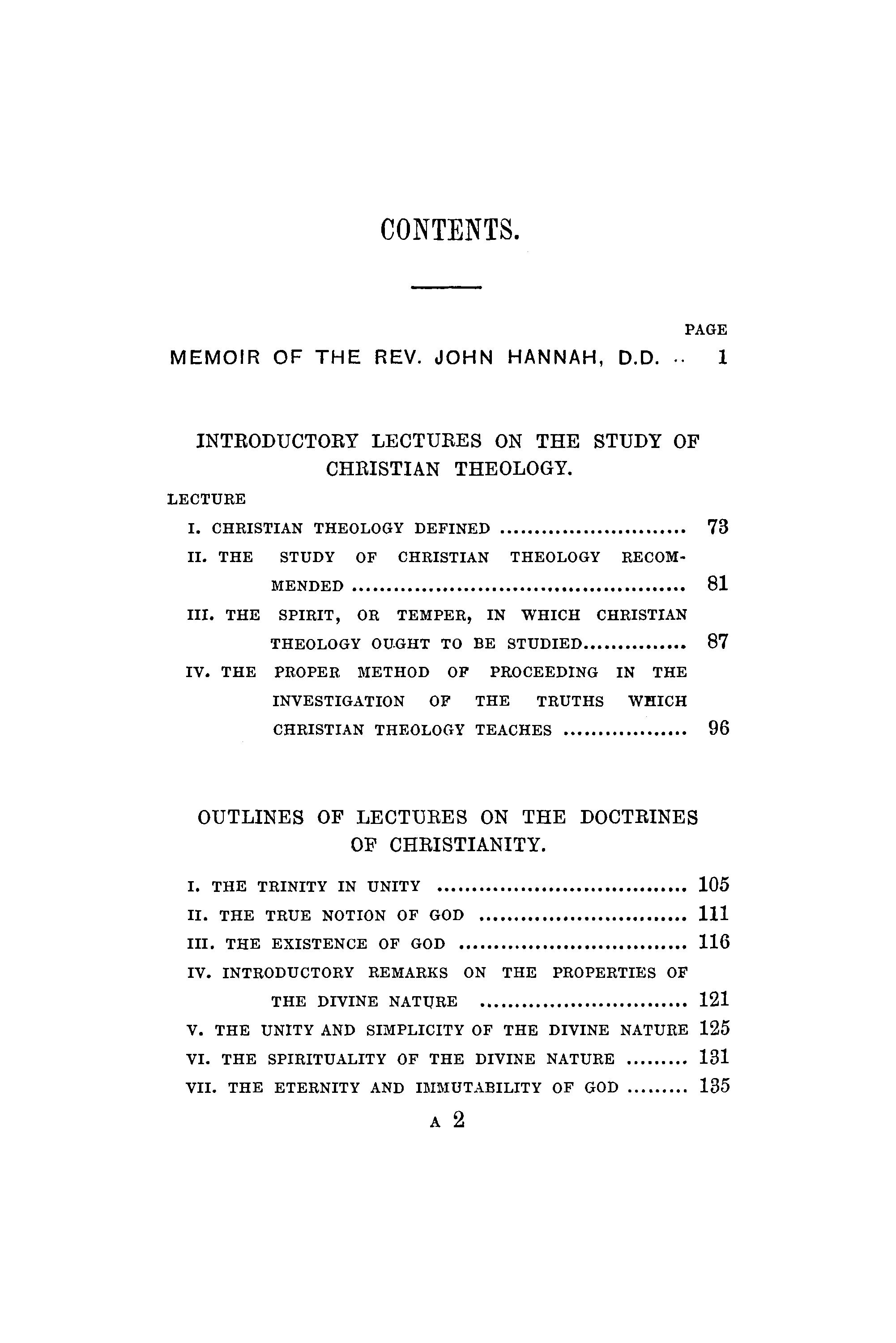
IV. INTRODUCTORY REMARKS ON THE PROPERTIES OF THE DIVINE
V. THE UNITY AND SIMPLICITY OF THE DIVINE NATURE
VI. THE SPIRITUALITY OF THE DIVINE NATURE
VII. THE ETERNITY AND Il\Il\lUTABILITY OF GOD
VIII. THE OMNIPOTENCE OF GOD
IX. THE OMNIPRESENCE OF GOD .............................. 145
X. THE OMNISCIENCE OF GOD ................................. 150
XI. THE ,vISDOM OF GOD....................................... 156
XII. THE GOODNESS OF GOD ................................. 160
XIII. THE SANCTITY, OR HOLINESS, OF GOD ............... 163
XIV. THE JUSTICE OF GOD .................................... 167
XV. THE TRUTH OF GOD ....................................... 171
XVI. THE ALL-SUFFICIENCY OF GOD ........................ 175
XVII. THE DIVINE SONSHIP OF OUR LORD • ..
XVIII. THE PRE-EXISTENCE OF OUR LORD
XIX. DIVINE NAMES AND TITLES ASCRIBED TO OUR LORD :-HE IS CALLED GOD
XX. DIVINE NAMES AND TITLES ASCRIBED TO OUR 185 191 LORD :-HE IS CALLED JEHOVAH ............... 196
XXI. DIVINE ATTRIBUTES ASCRIBED TO OUR LORD :OMNIPOTENCE, OMNIPRESENCE, mJNISCIENCE 203
XXII. DIVINE ATTRIBUTES ASCRIBED TO OUR LORD :ETERNITY ..
XXIII. DIVINE WORKS ASCRIBED TO OUR LORD ••• . . • ..• 213
XXIV. DIVINE WORSHIP PAID TO OUR LORD ............... 218
XXV. l\IISCELLANEOUS PROOFS OF OUR LORD'S DIVINITY
XXVI. THE ANGEL-JEIIOV,UI OF THE OLD-TESTAMENT SCRIPTURES
XXVII. EXAMINATION OF OBJECTIONS
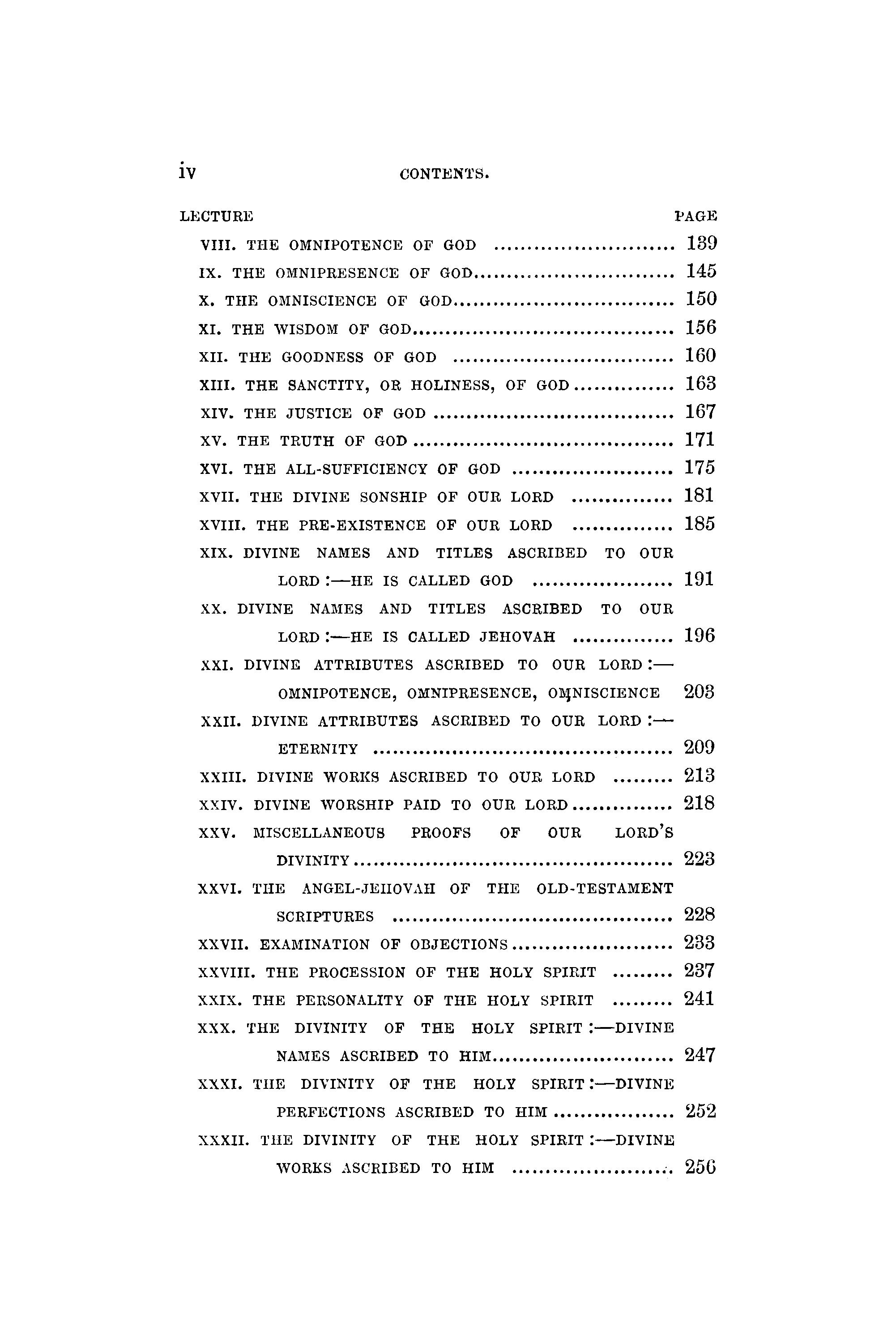
223
228
233
XXVIII. THE PROCESSION OF THE HOLY SPIRIT 237
XXIX. THE PERSONALITY OF THE HOLY SPIRIT 241
XXX. 'fHE DIVINITY OF THE HOLY SPIRIT :-DIVINE NAMES ASCRIBED TO HIM ........................... 247
XXXI. THE DIVINITY OF THE HOLY SPIRIT :-DIVINE PERFECTIONS ASCRIBED TO HIM .. ..
XXXII. THE DIVINITY OF THE HOLY SPIRIT :-DIVINE WORKS ASCRIBED TO HIM
. 252

LECTURE
XXXIII. THE DIVINITY OF THE HOLY SPIRIT :-DIVINE WORSHIP PAID TO HIM
XXXIV. THE AGENCY OF THE HOLY SPIRIT ............... 264
XXXV. THE AGENCY OF THE HOLY SPIRIT :-EXTRAORDINARY GIFTS . .•
XXXVI. THE AGENCY OF THE HOLY SPIRIT :-OFFICIAL GIFTS ...................................................
XXXVII, THE AGENCY OF THE HOLY SPIRIT :-SAVING GIFTS ...................................................
XXXVIII. THE MORE CONSPICUOUS WORKS OF GOD :CREATION .............................................
XXXIX. GOOD ANGELS ..........................................
XL. EVIL ANGELS
XLI. PROVIDENCE ...............
LECTURESON THR STUDYOF THE DOCTRINESWHICHCHRISTIAN THEOLOGY1'F.ACHESCONCERNINGMAN IN HIS PHESENT STATEOF PROBATION.
XLII. THE IMAGE OF GOD, IN WHICH MAN WAS ORI• GIN ALLY CREATED................................... 3Cl
XLIII. THE STATE OF MAN BEFORE THE FALL, COMPREHENDING A VIEW OF HIS COVENANTRELATION TO GOD....................................
XLIV, THE FALL OF MAN .......................................
XLV. EFFECTS OF MAN'S FALL, COMPREHENDING ESPECIALLY THE DOCTRINE OF ORIGINAL SIN ......
XLVI. THE NECESSITY OF REDEMPTION .....................
XLVII. THE NATURE OF REDEMPTION ........................
XLVIII. THE PROVISION OF REDEMPTION MORE PARTICULARLY CONSIDERED
XLIX. THE EXTENT OF REDEMPTION
L. REPENTANCE
LI. FAITH IN JESUS CHRIST

LECTURE
LII. JUSTIFICATION BY FAITH .................................
ACCEPTANCE OR RECONCtLIATION WITH GOD.........
LIII. THE WITNESS OF THE HOLY SPIRIT ..................
LIV. REGENERATION, OR THE NEW BIRTH: ITS IMPORT 358
LV. REGENERATION, OR THE NEW BIRTH: ITS NECESSITY AND RELATION
LVI. THE WITNESS OF OUR OWN SPIRIT ..................
LVII, THE DEGREE OF CHRISTIAN SANCTIFICATION ATTAINABLE IN THIS LIFE ........................
LVIII. THE WAY IN WHICH CHRISTIAN SANCTIFICATION IS OBTAINED, WITH SOME OTHER PARTICULARS RELATING TO THIS SUBJECT ............... 373
LIX. THE PERSEVERANCE OF THE SAINTS..................
LX. THE SEPARATE STATE ..... , ....................
LXI. THE FUTURE RESURRECTION OF THE SAINTS ..
LXII. THE GENERAL JUDGMENT ..
LXIII. THE FUTURE HAPPINESS OF THE RIGHTEOUS
LXIV. THE FUTURE MISERY OF THE WICKED



THERE are some who will think that a memoir of Dr. Hannah ought not to have been condensecl into the preface of a volume, even of his own Theological Lectures. The sentiment does no more than justice to his worth; but it must bow to necessity. Dr. Hannah himself has not permitted any longer memorial ; he made no provision for a biography ; and, in fact, has bequeathed scarcely any material for that purpose beyond his own fine character and the scanty incidents of an uneventful though noble career. What justice may be done to these may be done as well in few pages as m many. It must be remembered that the true memorial of a man is not anything that survivors may say about him : so far as it is on earth at all, it is to be found in the produce of his mind, in the results of his energy, in the effect of his life. Dr. Hannah's record among men is bound up with the work of many whom he helped to train for the ministry, and thus is wrought into the fabric of the religious Society for which he lived. His best monument is one that could not be written or graven : it is an influence diffused

throughout all lands where Methodism is a teacher of Christianity. That portion of his system of theology which is contained in this volume is in a sense his literary monument: one which though not large is precious, and will long preserve his memory in honour among his own people.
This sketch must be accepted therefore as only an introductory memoir. As such it will keep mainly in view the theological position and relations of its subject. It will neither be so long as to be disproportionate, nor so short as to disappoint those who may hereafter read the Lectures without having had a previous acquaintance with their author. Having had little or no documentary help, I have fallen back on the reminiscences of earlier years, relying chiefly however on some more recent conversations with my revered Tutor,-conversations which, I must confess, were not without a secret reference to my present labour of love.
REV. JOHN HANNAH, D.D.
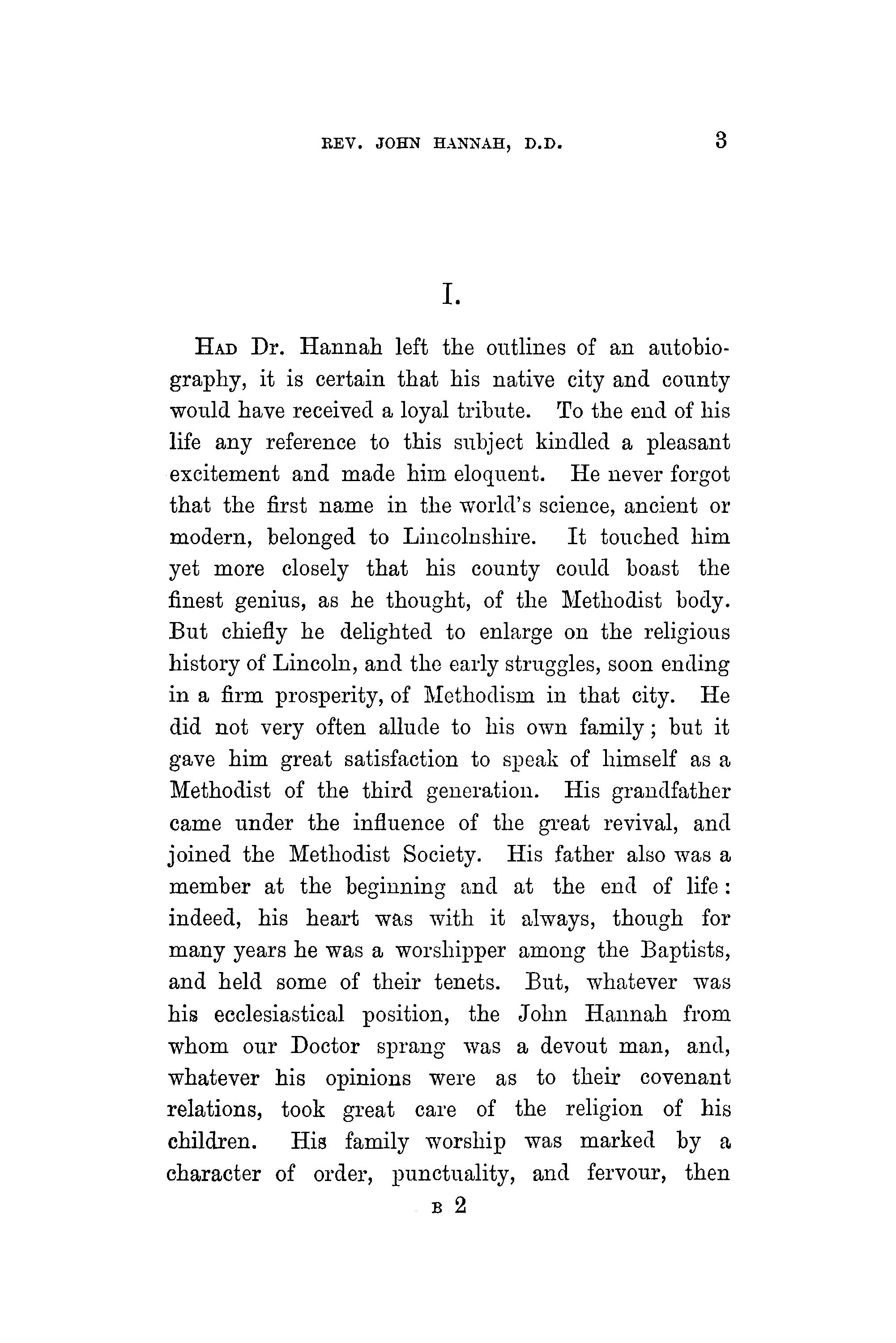
HAD Dr. Hannah left the outlines of an autobiography, it is certain that his native city and county would have received a loyal tribute. To the end of his life any reference to this subject kinclled a pleasant excitement and made him eloquent. He never forgot that the first name in the world's science, ancient or modern, belonged to Lincolnshire. It touched him yet more closely that his county could boast the finest genius, as he thought, of the Methodist body. But chiefly he delighted to enlarge on the religious history of Lincoln, and the early struggles, soon ending in a firm prosperity, of Methodism in that city. He did not very often allude to his own family ; but it gave him great satisfaction to speak of himself as a Methodist of the third generation. His grandfather came under the influence of the great revival, and joined the Methodist Society. His father also was a member at the beginning and at the encl of life : indeed, his heart was with it always, though for many years he was a worshipper among the Baptists, and held some of their tenets. But, whatever was hi£ ecclesiastical position, the John Hannah from whom our Doctor sprang was a devout man, and, whatever his opinions were as to their covenant relations, took great care of the religion of his children. His family worship was markecl by a character of order, punctuality, and fervour, then
B 2

comparatively rare. John, his third son, born in 1792, came early under deep religious impressions ; his heart was gradually and surely won by the Divine Spirit at the very dawn of religious consciousness, so that he could not fix upon any precise date as the time of his conversion. At the age of seventeen he was walking in the comfort and under the guidance of the Holy Ghost. His youthful religion was peculiarly earnest. Those were the days when godly young men were wont to meet in band for the most intimate and unreserved spiritual communion ; and John Hannah consorted with two companions for that purpose at six o'clock on every Sunday morning. After an hour thus spent, another hour was given to the prayermeeting. Then came the Sunday-school, the public services, the more private cottage exercises ; and so the day was crowded with ordinances of edification and charity. All this was a healthy discipline. Continued as it was year after year, it tended to the formation of a thorough and complete Christian character. Principles were thus silently confirmed and habits formed which tolLl their secret afterwards in a long, active, and consistent career. Here at the outset we have the key to Dr. Hannah's excellence in the inward and in the outward life. His early maturity, his deep devotion, his large charity, the steadfast tranquillity of his Christian confidence, rejoicing or rather reposing in " the assurance of faith," his remarkable alacrity to every good word and work, the gravity of his spirit, arn1 his habitual reverent apprehension of Divine rcalities,-all were characteristics of a religion the foundations of which were laid in childhood and youth.

REV. JOHN HANNAH, D.D. 5
Meanwhile, the intellectual culture of the future teacher was not neglected. His father was a judicious man, and discerned the special aptitudes of his son's mind. He could not have made more discreet provision for his education than he did. Young John Hannah, diffident, retiring, thirsting for knowledge, and devout in spirit, was, after suitable preparatory instruction, sent to a clergyman in Lincoln, who was competent to finish his training. The master had nothing but satisfaction in his pupil, whose intellect, slow and bounded, but vigorous and honest, throve exceedingly under his guidance. He made fair proficiency both in classics and mathematics, the former being his favourite study. As if with a presentiment of his coming vocation, the tutor turned his attention to the original languages of Scripture. In Hebrew he did not make, either then or subsequently, much progress; but with the Greek Testament he became familiar, so familiar, at least, as to obtain a good working command of it through life. From the classics proper he in due time diverged to the patristic classics, both Greek and Latin: some few of these, such as Lactantius, Tertullian, and Chrysostom, he early learned to admire, and in subsequent years read with some facility. In mathematics he did not travel far; but far enough to acquire a certain evident intellectual impress from them. There was a closeness of consecutive demonstration, and symmetry of analysis, in all his literary work, great and small, which that study beyond any other tends to promote. It must be added that whatever the youth was taught he was thoroughly taught. Exactitude marked Dr. Hannah's acquire-

ments even where they were limited most in their range.
The Rev. Mr. Gray-for this was the name of his instructor-conferred upon his pupil a greater benefit than could be measured by the quantity of his instruction. He stimulated his thirnt for knowledge, anc1 taught him to seek its gratification in the only legitimate way, by steady, plodding industry. He inured him to early rising and hard work : habits that were never lost. He taught him the importance of being faithful in that which is least, and of doing all that he did with his might. To this may be traced one of Dr. Hannah's intellectual characteristics, that of thoroughly finishing whatever he took in hand : if his achievements were not many or great, nothing that he accomplished was otherwise than perfect in its own order. His early instructor laid him under lasting obligation in many other respects. He accustomed the young student to put confidence in a good memory, training it thus to bear heavy burdens and to be faithful to large trusts; he taught him also the sweet uses of poetry, and thus imparted a taste that was a never-failing solace to himself, and made him a most genial contributor to social pleasme ; he inspired him with an ambition to furnish his mind with general information, and to cultivate diligently his highest and best faculties. So much may be truly said of the human instructor. But a higher Teacher taught him to remember the end of education ; and to dedicate all his studies to the glory of God.
Though his father was half a Baptist, and his

REV. JOHN HANNAH, D.D.
teacher a clergyman, young Mr. Hannah was an unwavering Methodist. All other elements in his education were moulded by the principle of loyalty to the Society of Methodism. This Society has beyond most others the art of laying hold of an earnest young man, and discovering and employing his talents. It took entire possession of John Hannah. It gave him to feel the value of his soul to himself and to others; and this was an obligati,on he never forgot. Young as he was, he was old enough to take a clear view of the value of the religious system to which he himself and his family for three generations had owed so much. No man could have a higher estimate of the importance to the religion of England of the great revival out of which Methodism sprang. From the beginning to the close of life he never faltered in this. At first it was his own experience, and that of his own household, which engaged his heart so deeply to the Society; afterwards he came to the conviction that what had done him and his kindred such good service had been equally beneficial to his land and country, and, directly or indirectly, to the whole world. The early love of the heart that knows no reasoning was reinforced by subsequent reflection that could give good account of its choice.
But an education conducted by a clergyman under the shadows of Lincoln cathedral could not be without its influence on a nature like his. If there be such a thing as a congenital bias or constitutional tendency that pleads for what is old and venerable, it was very strongly marked in Dr. Hannah. His mind was, as it were, naturally catholic and conservative ; predestined

to be on the side of ancient order and long-established tradition. Hence the doctrine and worship, and historical associations, of the English Church seized his heart early, and acquired a hold that they never lost. However much he learned afterwards to deplore the essential or accidental evils that are to be found in the constitution and working of that Church, he never forgot the original obligation. He felt as nearly as possible what John Wesley himself felt at the end of his life. Many have thought that he was too slow to appreciate the significance of changed relations. Be that as it may, he was not a less devoted Methodist on this account: in his own judgment he was on this account all the more faithful. He grew up into Methodism when the filial sympathies with the mother Church were still fresh and strong. He lived to witness the decline of these sympathies ; but he took care that that decline should owe nothing to his influence. In this, as in most other things, he was true to his beginnings. It soon became manifest to all who knew this young man that the Holy Spirit had marked him for the Christian ministry. This gradually also became clear to himself. The Divine vocation did not come upon him at any marked crisis, or by any sudden illapse, but entered with a secret and subtile but effectual influence into his growing consciousness. There never was a time when any other calling had to him anything like reality. He did indeed seem to be attending to his father's business of malting; but he showed by many obvious signs that a higher business of a higher Father engrossed his thoughts.

REV. JOHN HANNAH, D.D.
In fact, the good work of the Christian ministry soon became the object of his deep desire; anc1 his artless nature would not or could not conceal that desire. This very fact showed that his conviction was Divinely implanted; for his natural disposition shrank with more than ordinary sensitiveness from publicity of any kind. He was exceedingly diffident: embarrassed even before his Sunday scholars, the thought of appearing before a congregation was a distress. He could pray in the family only on condition of being allowed to lift up his voice in a room separate from the rest of the worshippers. But the Divine Spirit has often chosen such men for the most public functions : no one was afterwards more prominent, or more resigned to the penalty of prominence, than Dr. Hannah. When a selfdistrusting and retiring young man is day and night haunted by the conviction that he must harden his countenance and stand up before his fellows to proclaim the Gospel, it may be wesumed by himself that he is called of God. And when such a youth vanquishes his reluctance, and, as in the present case, consents to the call of the Church, the evidence of his Divine call is strengthened by the fact of his ready concurrence.
In the Methodist community, young men are employed earlier, and thrust into earlier prominence, than in any other. The approaches to it.s ministry are regulated accordingly : nothing can be more gradual and effectual than the discipline by which a young man is inured to publicity, and taught to stir up and use his gifts. Mr. Hannah went through all the preliminary processes. Adchesses in the Sunday-
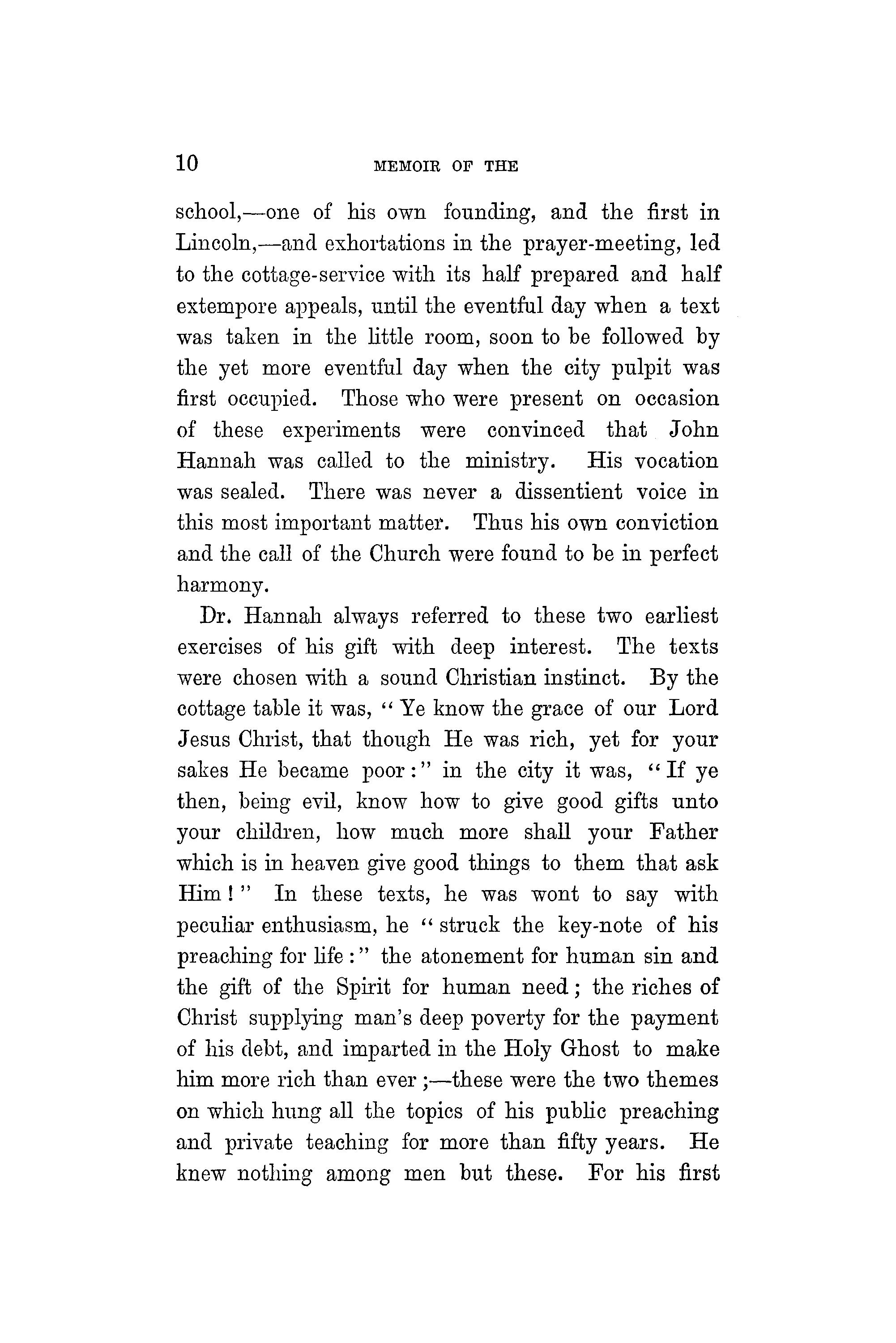
MEMOIR OF THE
school,-one of his own founding, and the first in Lincoln,-and exhortations in the prayer-meeting, led to the cottage-service with its half prepared and half extempore appeals, until the eventful day when a text was taken in the little room, soon to be followed by the yet more eventful day when the city pulpit was first occupied. Those who were present on occasion of these experiments were convinced that John Hannah was called to the ministry. His vocation was sealed. There was never a dissentient voice in this most important matter. Thus his own conviction and the call of the Church were found to be in perfect harmony.
Dr. Hannah always referred to these two earliest exercises of his gift with deep interest. The texts were chosen with a sound Christian instinct. By the cottage table it was, "Ye know the grace of our Lord Jesus Christ, that though He was rich, yet for your sakes He became poor : " in the city it was, " If ye then, being evil, know how to give good gifts unto your children, how much more shall your Father which is in heaven give good things to them that ask Him ! '' In these texts, he was wont to say with peculiar enthusiasm, he "struck the key-note of his preaching for life : " the atonement for human sin and the gift of the Spirit for human need ; the riches of Christ supplying man's deep poverty for the payment of his debt, and imparted in the Holy Ghost to make him more rich than ever ;-these were the two themes on which hung all the topics of his public preaching and private teaching for more than fifty years. He knew nothing among men but these. For his first
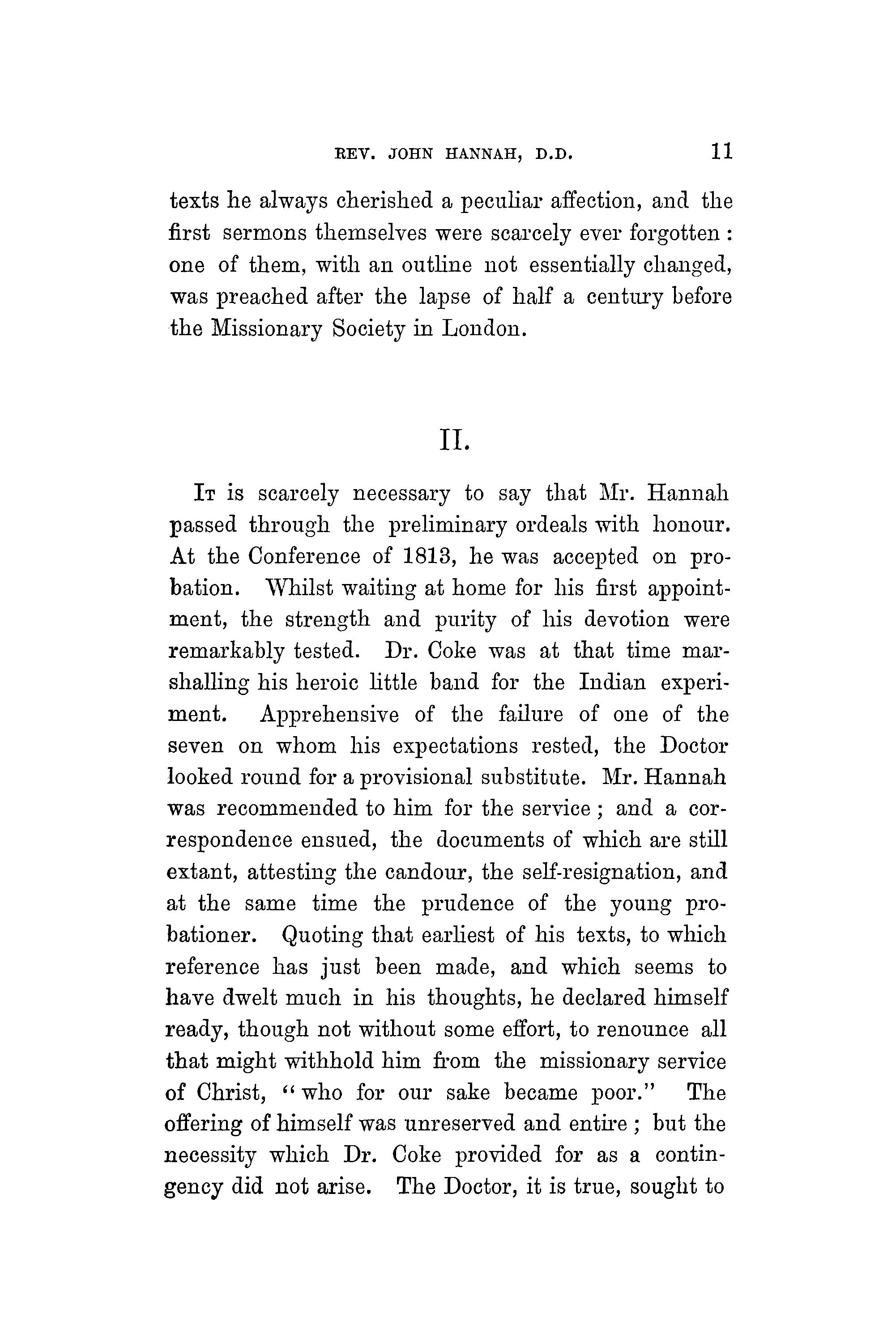
REV. JOHN HANNAH, D.D.
texts he always cherished a peculiar affection, and the first sermons themselves were scarcely ever forgotten : one of them, with an outline not essentially changed, was preached after the lapse of half a century before the Missionary Society in London.
ILIT is scarcely necessary to say that Mr. Hannah passed through the preliminary ordeals with honour. At the Conference of 1813, he was accepted on probation. \Vhilst waiting at home for his first appointment, the strength and purity of his devotion were remarkably tested. Dr. Coke was at that time marshalling his heroic little band for the Indian experiment. Apprehensive of the failure of one of the seven on whom his expectations rested, the Doctor looked round for a provisional substitute. Mr. Hannah was recommended to him for the service ; and a correspondence ensued, the documents of which are still extant, attesting the candour, the self-resignation, and at the same time the prudence of the young probationer. Quoting that earliest of his texts, to which reference has just been made, and which seems to have dwelt much in his thoughts, he declared himself ready, though not without some effort, to renounce all that might withhold him from the missionary service of Christ, "who for our sake became poor." The offering of himself was unreserved and entire ; but the necessity which Dr. Coke provided for as a contingency did not arise. The Doctor, it is true, sought to
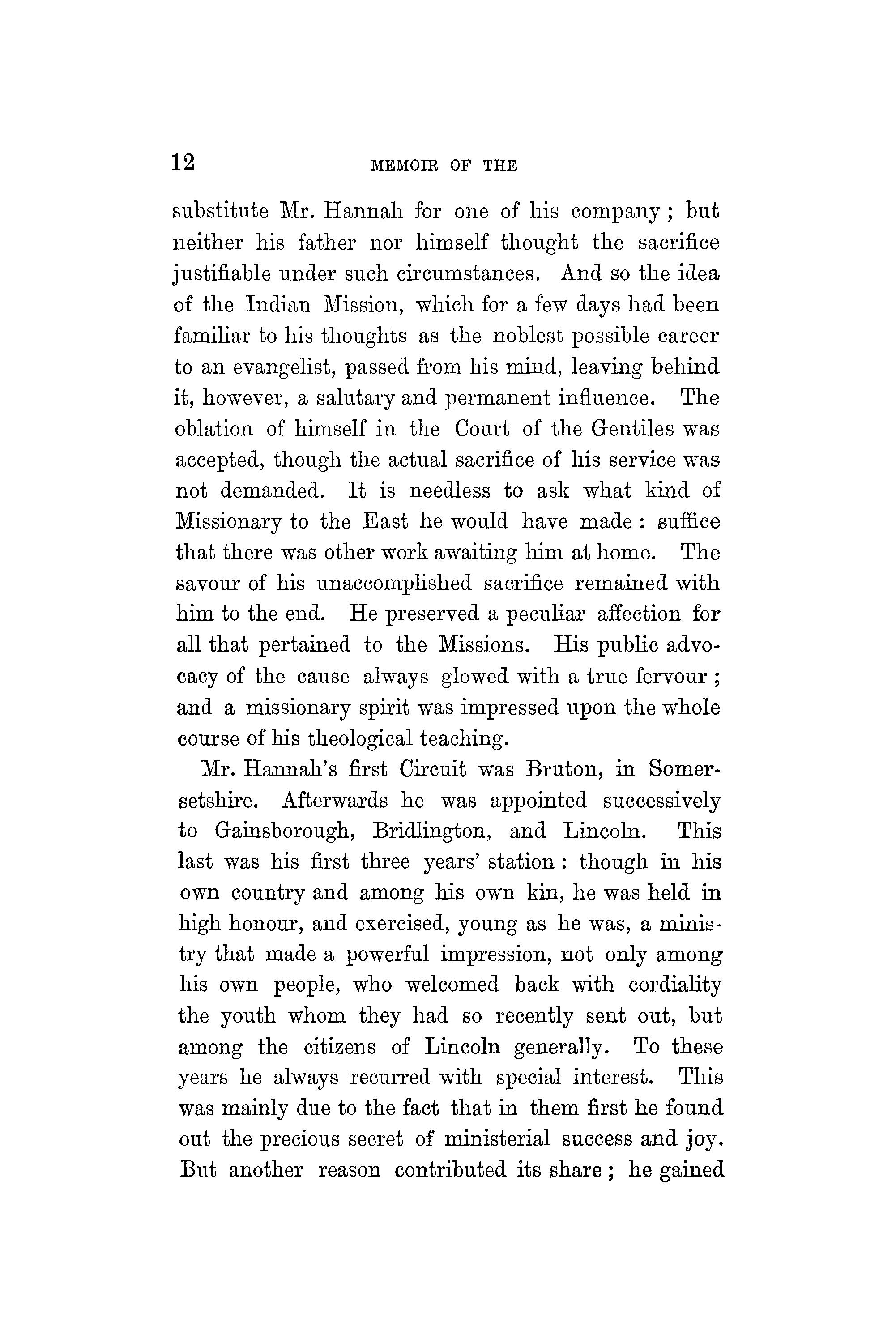
substitute Mr. Hannah for one of his company ; but neither his father nor himself thought the sacrifice justifiable under such circumstances. And so the idea of the Indian Mission, which for a few days had been familiar to his thoughts as the noblest possible career to an evangelist, passed from his mind, leaving behind it, however, a salutary and permanent influence. The oblation of himself in the Court of the Gentiles was accepted, though the actual sacrifice of his service was not demanded. It is needless to ask what kind of Missionary to the East he would have made: suffice that there was other work awaiting him at home. The savour of his unaccomplished sacrifice remained with him to the end. He preserved a peculiar affection for all that pertained to the Missions. His public advocacy of the cause always glowed with a true fervour ; and a missionary spirit was impressed upon the whole course of his theological teaching.
Mr. Hannah's first Circuit was Bruton, in Somersetshire. Afterwards he was appointed successively to Gainsborough, Bridlington, and Lincoln. This last was his first three years' station: though in his own country and among his own kin, he was held in high honour, and exercised, young as he was, a ministry that made a powerful impression, not only among his own people, who welcomed back with cordiality the youth whom they had so recently sent out, but among the citizens of Lincoln generally. To these years he always recurred with special interest. This was mainly due to the fact that in them first he found out the precious secret of ministerial success and joy. But another reason contributed its share ; he gained

REV, JOHN HANNAH, D.D.
in Lincoln a good wife ; a blessing this, precious to all men, but especially precious to a young Methodist preacher. Miss Jane Caparn was the lady of his first and only choice: they were married in 1817, and lived together in pure affection for fifty years. In all respects Mrs. Hannah was perfectly adapted to her husband's character and position: not only a devoted wife but a prudent coadjutor, whether in the pastoral and social duties of a Circuit or in the comparative retirement of college life. None but those who were in habits of friendly intercourse with them could know how invaluable she was to her husband. She reverenced him, served him, lived for him. She studied and understood his peculiarities ; watched him with most beautiful solicitude ; was his judicious counsellor on all points that permitted counsel; regulated his lesser actions like a minor providence ; stood sentry over his good nature, apt to be very importunately assailed and sometimes imposed upon; and in sorrow as well as joy knew no thought or feeling that was independent of him. This perfect love was mutual. Dr. Hannah's tenderness for his wife could not be exceeded; and nothing could be more chivalrous than his courtesy towards her. They had much happiness together; and together they drank of the cup of God's providential severity, sometimes sorely mingled. They had to mourn over the premature departure of seven children out of eight : the loss of some of them being rendered inexpressibly sad by the circumstances of their death. One son alone has remained to follow both to their grave: a son whose piety has been their consolation, and whose distinguished career in the

University of Oxford and in the ministry of the Church of England has been their joy.
This paragraph has been written under the solemn influence produced by Mrs. Hannah's departure from this life, ending a long and keen fight of affliction patiently endured. After three years of widowhood, during which memory and hope have helped her to bear almost uninterrupted pain of no ordinary kind, she has been released, and has gone to meet her husband in the presence of their common Lord. Their long union and fellowship, if it may be said to have been ever suspended, has begun again.
But to return. These early years were spent by Mr. Hannah in comparative retirement. They were years of a kind of discipline peculiar to the Methodist ministry; a severe and effectual test of chara~ter; an ordeal which, whether well or ill sustained, affects permanently the future of the young preacher. Mr. Hannah had several years' experience of the advantages and disadvantages of the rough country Circuits. The advantages few men ever more fully reaped than he: the disadvantaiges he cannot be said to have altogether escaped, but they did not cling so disastrously to him as they do to many.
It was a great benefit in his case to exercise a sequestered ministry in the midst of a rural population. He perceived at once how unsuitable to simple hearers was the elaborate style which he had cultivated, and began to aim steadily at simplicity of diction and clearness of thought. He was wise enough to perceive that it requires the perfection of preaching to make high truth plain to the unlettered. These early
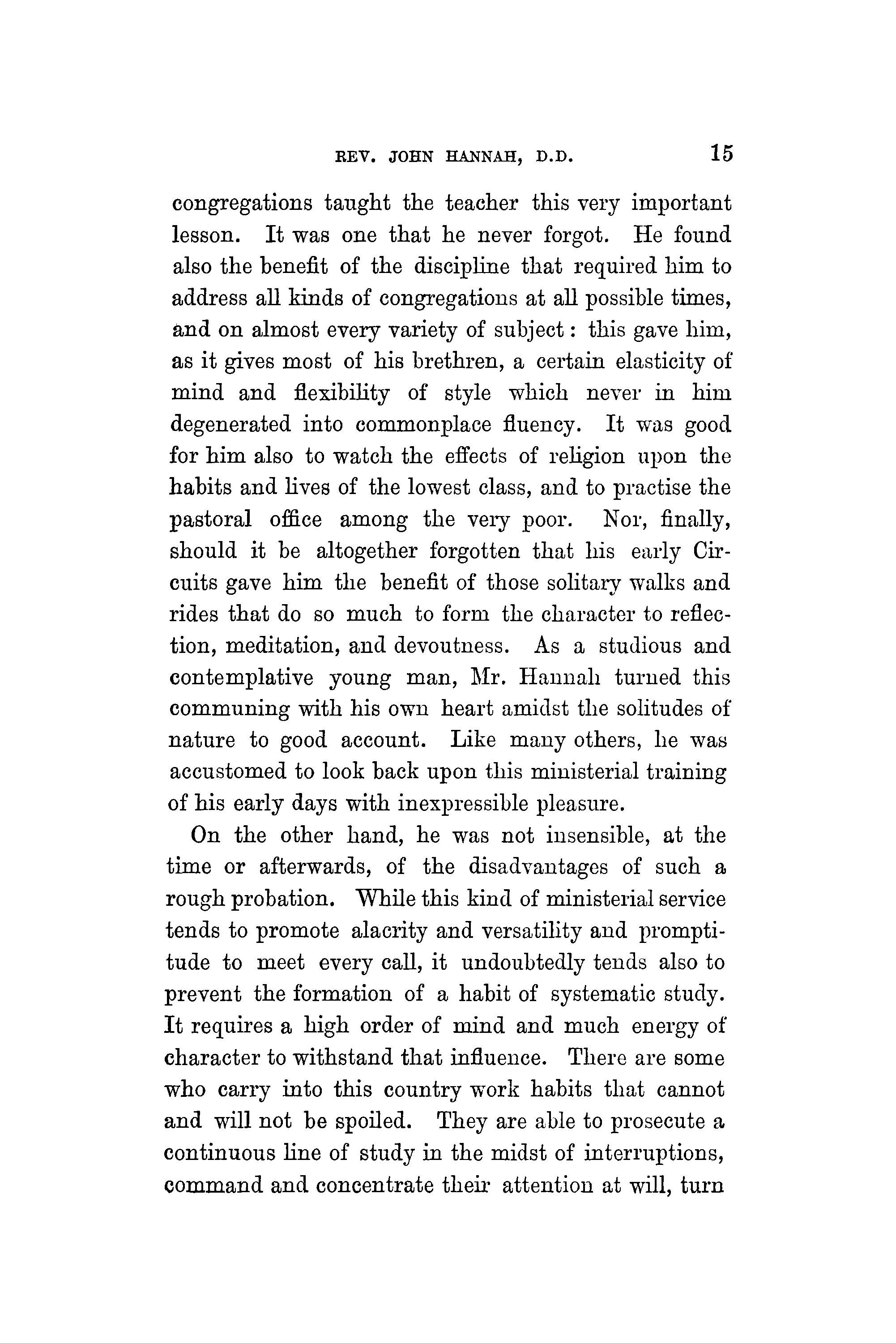
REV. JOHN HANNAH, D.D.
congregations taught the teacher this very important lesson. It was one that he never forgot. He found also the benefit of the discipline that required him to address all kinds of congregations at all possible times, and on almost every variety of subject: this gave him, as it gives most of his brethren, a certain elasticity of mind and :flexibility of style which never in him degenerated into commonplace fluency. It was good for him also to watch the effects of religion upon the habits and lives of the lowest class, and to practise the pastoral office among the very poor. Nor, finally, should it be altogether forgotten that his ea,rly Circuits gave him the benefit of those solitary walks and rides that do so much to form the character to reflection, meditation, and devoutness. As a studious and contemplative young man, Mr. Hannah turned this communing with his own heart amidst the solitudes of nature to good account. Like many others, he was accustomed to look back upon this ministerial training of his early days with inexpressible pleasure.
On the other hand, he was not insensible, at the time or afterwards, of the disadvantages of such a rough probation. While this kind of ministerial service tends to promote alacrity and versatility and promptitude to meet every call, it undoubtedly tends also to prevent the formation of a habit of systematic study. It requires a high order of mind and much energy of character to withstand that influence. There are some who carry into this country work habits that cannot and will not be spoiled. They are able to prosecute a continuous line of study in the midst of interruptions, command and concentrate their attention at will, turn

fragments of time to account, and keep up the daily round of an inner life independently of the outer life and without neglecting its claims. These, however, have not been hitherto the majority; nor, taking all things into account, is it to be wondered at. In some instances the habit of systematic study is broken down for ever ; and a desultory life, so far at least as mental discipline is concerned, follows. It is this, rather than want of time or abundance of pastoral occupation, that accounts for the lack of permanent results in the case of not a few gifted men, especially in past times. Mr. Hannah did not suffer so much as some of his brethren, though he did not altogether go free. Several things combined to shield him from the worst effects. He was an earnest student ; his habits were essentially methodical ; and his theological ardour was something out of the common. He controlled circumstances, and did not yield to them. It was not in the power of external things to make his sober and elevated mind frivolous. He was too ambitious of eminence as a divine to fall into the vice of desultory or aimless reading. Moreover, he was always wise enough to keep around him a few well-selected authors : his devotion to these has been charged against him as a weakness, but it was a weakness in which his strength lay. Finally, he did not long continue among these outposts: he soon found himself in more circumscribed spheres of labour, where his mornings at least were his own.
This was matter of considerable importance to Mr. Hannah, in reference to his future calling. He had entered the ministry without a month's express prepa-

REV. JOHN HANNAH, D.D.
ration for it. He had been left very much to his own discretion in the choice of authors; his own community furnished him with no standard text-book or system of theology ; and his study of the tongues had clonebarely more than put an instrument into his hands which no teacher had shown him how most effectually to use. He had not had the advantage of a two or three years' curriculum of classical, biblical, and theological training. That he felt the lack of this there can be no doubt ; he always alluded to it feelingly, though not without an honest pride in the consciousness of having to so great an extent overcome the disadvantage. He certainly did overcome it : like many other Methodist preachers of his generation, he achieved by singleminded and single-handed hard work, almost without guidance, and in the midst of pressing pastoral engagements, a higher theological position than the majority of those reach who enter into their labours after having enjoyed superior privileges. What he would have been, had the industry of these years been built on a more thorough foundation previously laid, it is needless and perhaps ungrateful to ask. We are very well content that he was what he was. But this he became only as the result of much self-denial and quiet unintermitting diligence.
The twelve years which followed the Lincoln appointment were spent in four important Circuits :Nottingham, Leeds, Manchester, and Huddersfiel<l.. During these years that process of culture went on to which reference has been made, and his character silently ripened into its maturity. As a Christian, as a student of theology, and as a preacher, if he did not
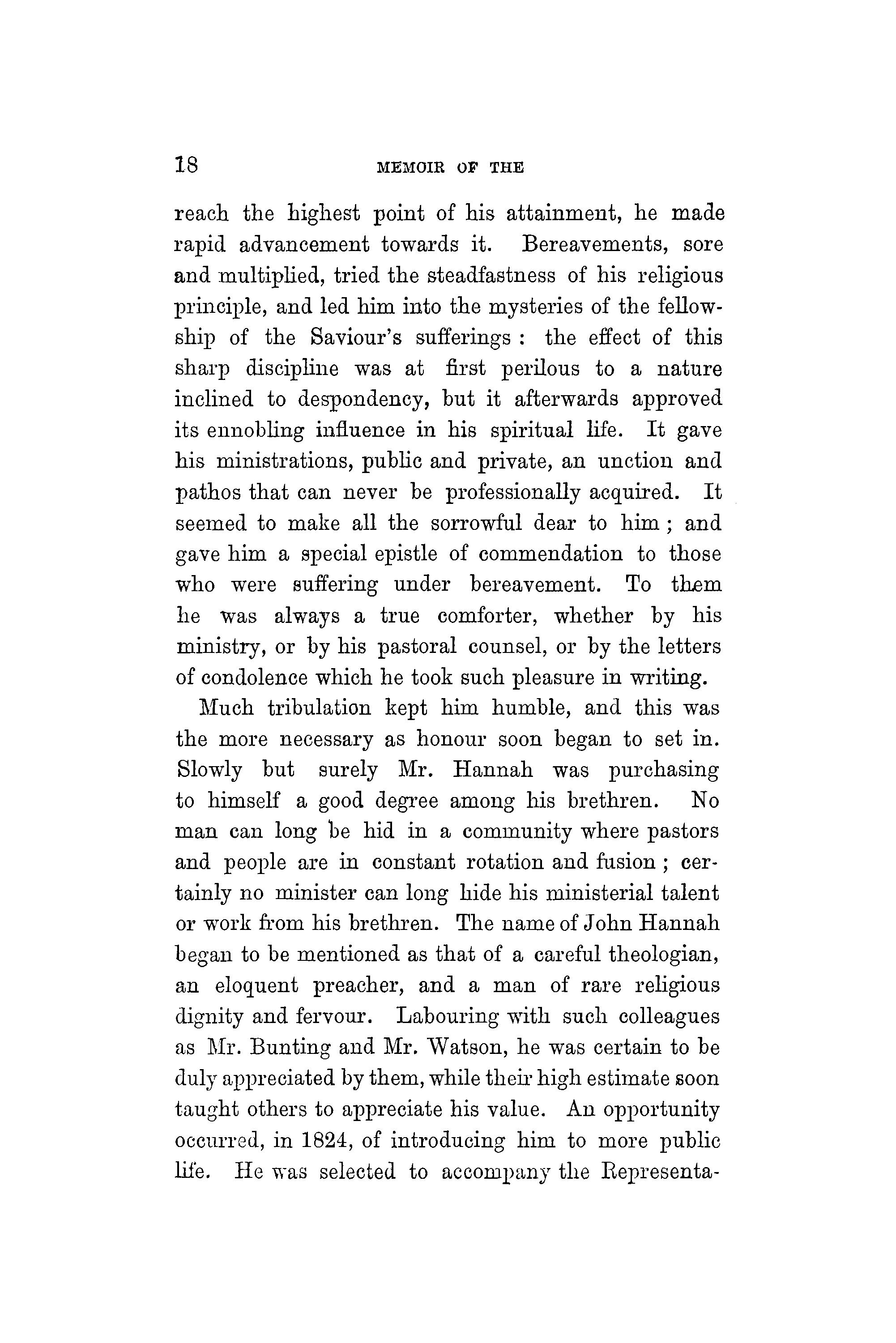
MEMOIR OF THE
reach the highest point of his attainment, he made mpid advancement towards it. Bereavements, sore and multiplied, tried the steadfastness of his religious principle, and led him into the mysteries of the fellowship of the Saviour's sufferings : the effect of this sharp discipline was at first perilous to a nature inclined to despondency, but it afterwards approved its ennobling influence in his spiritual life. It gave his ministrations, public and private, an unction and pathos that can never be professionally acquired. It seemed to make all the sorrowful dear to him ; and gave him a special epistle of commendation to those who were suffering under bereavement. To them he was always a true comforter, whether by his ministry, or by his pastoral counsel, or by the letters of condolence which he took such pleasure in writing. Much tribulation kept him humble, and this was the more necessary as honour soon began to set in. Slowly but surely Mr. Hannah was purchasing to himself a good degree among his brethren. No man can long be hid in a community where pastors and people are in constant rotation and fusion ; certainly no minister can long hide his ministerial talent or work from his brethren. The name of John Hannah began to be mentioned as that of a careful theologian, an eloquent preacher, and a man of rare religious dignity and fervour. Labouring with such colleagues as Mr. Bunting and Mr. Watson, he was certain to be duly appreciated by them, while their high estimate soon taught others to appreciate his value. An opportunity occurred, in 1824, of introducing him to more public life. He was selected to accomp~my the Representa-

REV, JOHN HANNAH, D,D, 19
tive of the Conference to America: a mission of great importance, though Mr. Hannah had only the responsibility of a subordinate. In the fulness of his physical strength, modestly confident in his own mental resources, full of kindness to all men, and with the youthful ardour of enterprise still unabated ·within him, he would have delighted in this expedition, had not providential dispensations chastened his spirit almost to depression. He left a dying child at home, ·whomhe waR not to see again ; and lesser discomforts there were that need not now be dwelt upon. But the mission was highly successful. Mr. Hannah discharged his function honourably. His acceptance among the American Methodists, both in public and in private, was cordial, and in some places demonstrative. The sustained tone and evangelical fervour of his preaching made a deep impression wherever he was heard, -an impression the religious value of which was not lessened by the free criticism provoked by his peculiarities of gesture, emphasis, and cadence. There was in Mr. Hannah's public speaking, at that time, as there always was, a certain indescribable gush of feeling that bore down everything before it. Criticism might re-vive afterwards and assert its rights ; but, for the time being, it was silenced and carried away. The young preacher won the hearts of the Americam, ; and among the fruits of their admiration was a diploma of Doctorship in Divinity that followed him to England: a distinction of which he was theologically worthy, and which, moreover, he may be sai(l to have won by theological exercitations held before the Faculty that bestowed it. Fulfilling these

MEMOIR Oli' THE
conditions, Dr. Hannah honoured the diploma that honoured him.
That the Americans made a favourable impression l:;lilsoon his mind was always evident to those who heard him speak of this visit. He never mentioned it, or referred to the personal kindnesses he received, without a certain peculiar enthusiasm which need not be described to those who knew him. National habits, and republican institutions, and theological tendencies, for which his mental constitution had no natural tolerance, were looked at under the palliation of true love. Where he could not altogether defend the Americans to himself, he would, nevertheless, plead their cause to others. The depth of this feeling, as well as its permanence, was shown by the alacrity with which, above thirty years afterwards, he repeated his visit in the service of the Connexion. Dr. Hannah was in his sixty-third year when this second visit was paid. Many changes had passed over those whom he visited. Many changes had passed over himself. The interval had transformed the youth fast approaching maturity, into the mature man on the threshold of age but hardly conscious that he was so. More than twenty years of theological teaching had given a finish to his doctrinal system, a firmness to his definitions, and an almost oracular precision to his Methodist expositions. In other respects, he was very much the same : exhibiting the same dignity, gravity, and subdued intensity of feeling ; with the same measured diction and peculiar cadence, harmonious always save when the upper notes were strained, harmonious then to the familiar and loving

REV. JOHN HANNAH, D,D. 21
ear. It is much to the honour of the American people, though no more than might be expected from them, that their appreciation of Dr. Hannah was so high : welcomed on his first visit with deep respect, the honour paid him on his second could not be surpassed. He also found Transatlantic Methodism much improved : the doctrinal purity of the system was unimpaii·ed, while its efficiency had been immensely increased, and there were manifest signs of a determination to lift up an energetic protest against ancient and rooted evils. After returning, Dr. Hannah never hesitated to declare that he regarded American Methodism as embodying the most powerful combination of Christian people on the face of the earth. Many of his prognostications with regard to North and South, the suppression of slavery, and the future of the Union, he lived to see strikingly verified as the result of the civil war. It may be added that an account of the two missions to America may be found in Dr. Jobson's Memorial, containing a sermon on " The Beloved Disciple," and an exceedingly graphic and genial introductory memoir. Much both of the comfort and of the success of the second visit was owing to Dr. Jobson's energetic ministry as a colleague and affectionate care as a companion. After his return from the first American mission, Dr. Hannah became much more prominent than before : not, indeed, in public appearances-for those he avoided as much as possible-but in the eye and estimation of the Connexion at large. He became known as one of its best preachers and pastors, and was sought for on all sides accordingly. During the

MEMOIR OF THE
nine or ten years that intervened before his tutorship began, he became almost the model of a Christian minister ; an~ I cannot pass on to his subsequent career without paying a brief tribute to his pastoral ministry. HI.
THE secret of Dr. Hannah's power as a preacher of the Gospel was his habitual and close meditation on the Word of God. His rigid rule was to base the sermon on the exposition of the letter, sought in humble and prayerful study. In the judgment of many, the principle was only too rigidly observed. Not only did the exact interpretation of the text govern the arrangoment of the discourse, but every illustration and every appeal was derived from Scripture. Exegesis, in the literal sense. of the word, was the strength of his preaching : but it was not subtile exegesis; he carefully avoided an error into which most expository preachers fall, that of fatiguing his hearers with minute. disquisitions that should be reserved for the expository essay. This is the more remarkable as he was a student, and an enthusiastic student, of Bengel, whose "Gnomon" is exquisitely minute in its analysis of the text and exhibition of the shades of meaning. It is probable, however, that Dr. Hannah's style as a preacher was formed before his acquaintance with the German commenced. Be that as it may, he limited himself in his sermons to the broad effects of exposition, and sent his people away satisfied but not oppressed by the pains of the expositor.
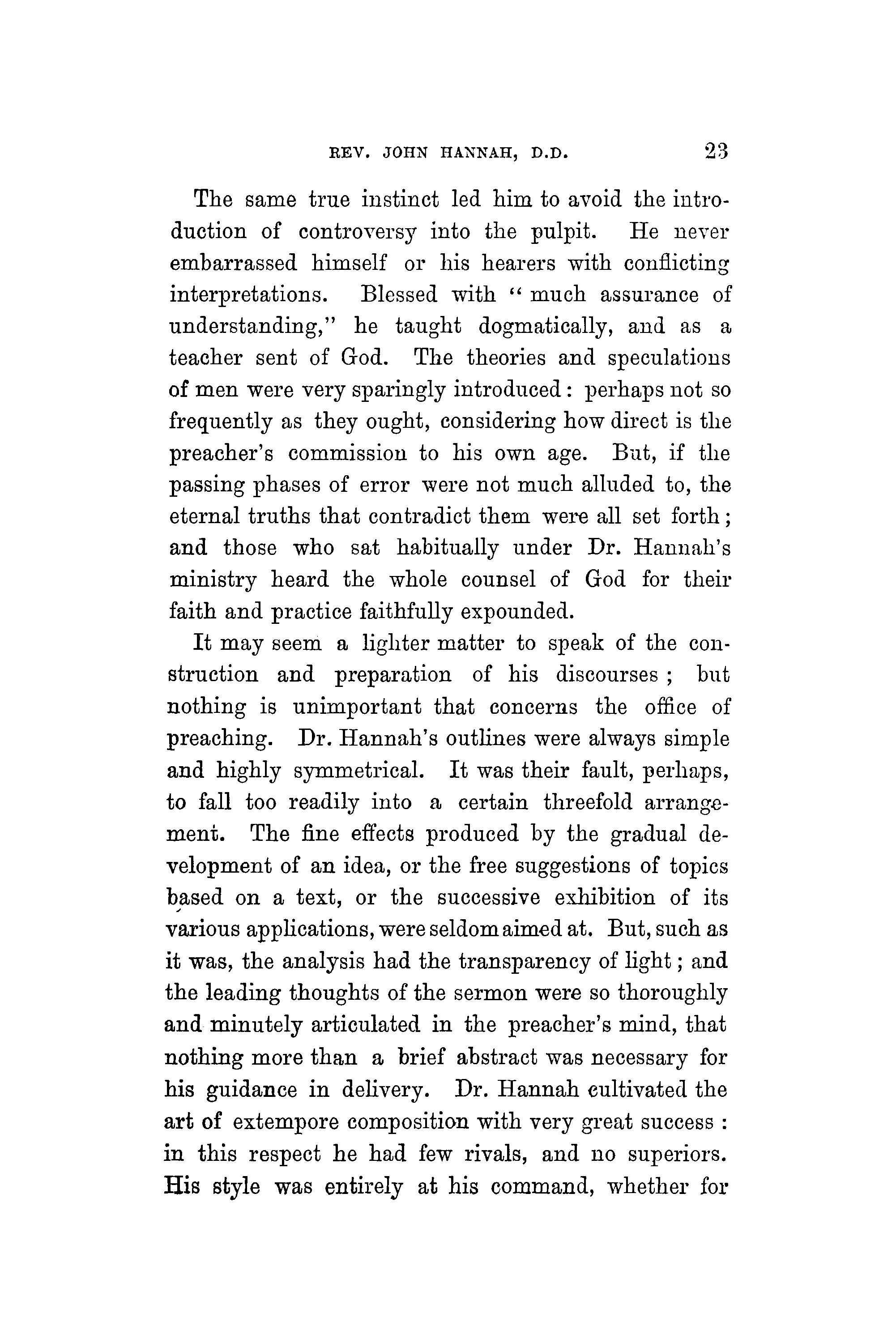
REV. JOHN HANNAH, D.D, 23
The same true instinct led him to avoid the introduction of controversy into the pulpit. He never embarrassed himself or his hearers with conflicting interpretations. Blessed with " much assurance of understanding," he taught dogmatically, and as a teacher sent of God. The theories and speculations of men were very sparingly introduced: perhaps not so frequently as they ought, considering how direct is the preacher's commission to his own age. But, if the passing phases of error were not much alluded to, the eternal truths that contradict them were all set forth; and those who sat habitually under Dr. Hannah's ministry heard the whole counsel of God for their faith and practice faithfully expounded. It may seem a lighter matter to speak of the construction and preparation of his discourses ; but nothing is unimportant that concerns the office of preaching. Dr. Hannah's outlines were always simple and highly symmetrical. It was their fault, perhaps, to fall too readily into a certain threefold arrangement. The fine effects produced by the gradual development of an idea, or the free suggestions of topics b,ased on a text, or the successive exhibition of its various applications, were seldom aimed at. But, such as it was, the analysis had the transparency of light ; and the leading thoughts of the sermon were so thoroughly and minutely articulated in the preacher's mind, that nothing more than a brief abstract was necessary for his guidance in delivery. Dr. Hannah cultivated the art of extempore composition with very great success : in this respect he had few rivals, and no superiors. His style was entirely at his command, whether for

MEMOIR
writing or utterance : with the same ease he composed on paper and into the air, and with equal correctness. His vocabulary was dignified and simple, as becomes theology. Never straining after effect, and not in danger of being seduced by the fantasy of a creative imagination, he pursued his even tenour with a perfect confidence in himself which begat the like confidence in his hearers.
Dr. Hannah's earlier popularity-for he was always popular-was largely aided by his pastoral sympathies and attentions to his flock. He cared for the souls of his people individually ; and, by carrying about the Gospel among them in private, learned better how to adapt his public proclamation. He was in those earlier years a diligent visitor of the people : his society was much courted in the families of the rich, and his visits to them were ministerial visits, in which the spiritual bond was never forgotten ; the poor also found in him and his wife unfailing friends. The circle of his religious acquaintance went on widening from year to year, and from Circuit to Circuit. Separation did not dissolve the pastoral tie: Dr. Hannah pressed epistolary correspondence into the service. He early found the art of making his pen subservient to his usefulness. Thus he became a guide and, in the purest evangelical sense, a director of very many souls, the afflicted and bereaved always having the foremost place. Were all his pastoral letters collected and printed, they would fill many volumes.
Dr. Hannah's conduct of public worship was almost perfect. As to his habits of private devotion, it is not for me to say anything : he drew a closer veil over his
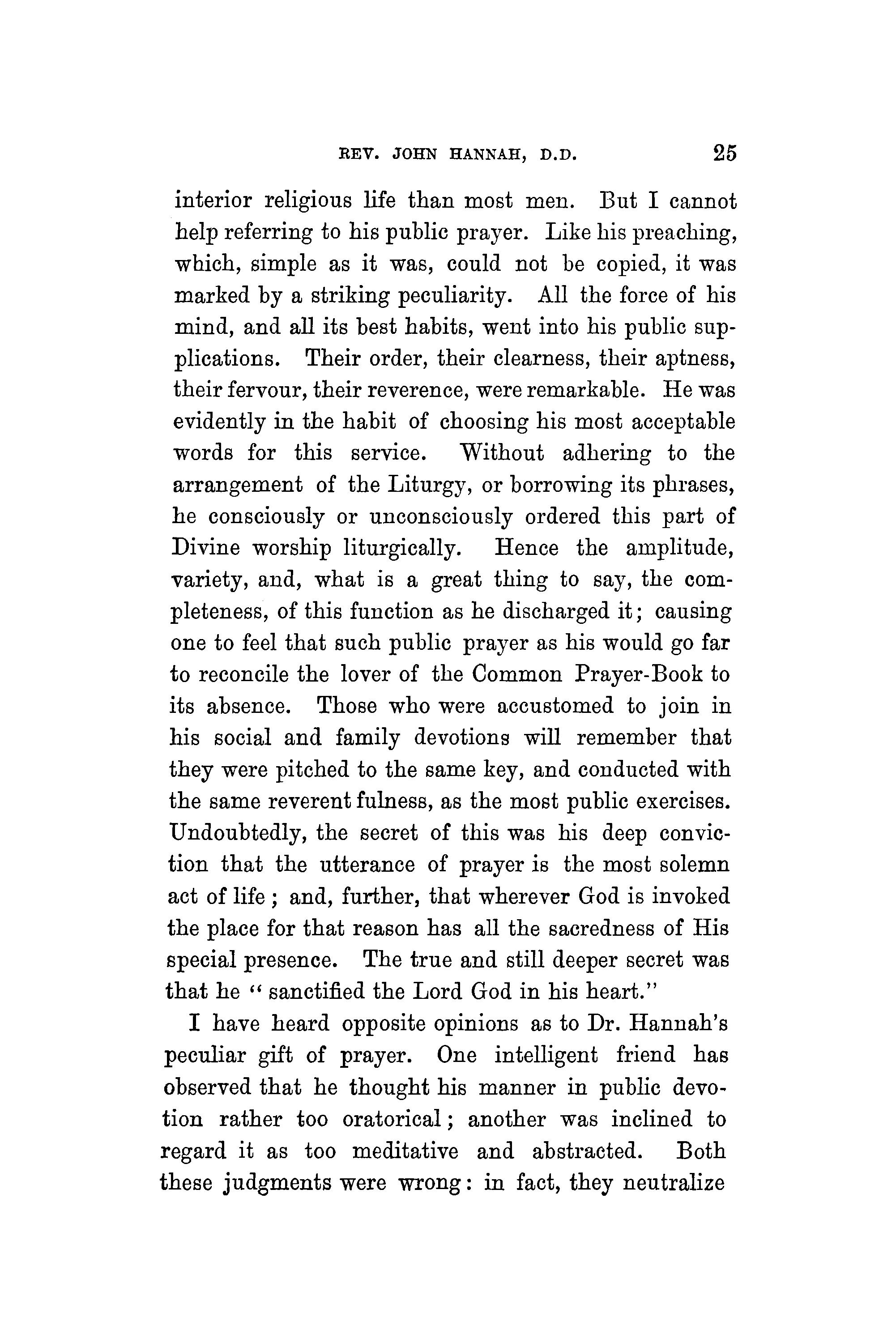
REV. JOHN HANNAH, D.D.
interior religious life than most men. But I cannot help referring to his public prayer. Like his preaching, which, simple as it was, could not be copied, it was marked by a striking peculiarity. All the force of his mind, and all its best habits, went into his public supplications. Their order, their clearness, their aptness, their fervour, their reverence, were remarkable. He was evidently in the habit of choosing his most acceptable words for this service. Without adhering to the arrangement of the Liturgy, or borrowing its phrases, he consciously or unconsciously ordered this part of Divine worship liturgically. Hence the amplitude, variety, and, what is a great thing to say, the completeness, of this function as he discharged it; causing one to feel that such public prayer as his would go far to reconcile the lover of the Common Prayer-Book to its absence. Those who were accustomed to join in his social and family devotions will remember that they were pitched to the same key, and conducted with the same reverent fulness, as the most public exercises. Undoubtedly, the secret of this was his deep conviction that the utterance of prayer is the most solemn act of life; and, further, that wherever God is invoked the place for that reason has all the sacredness of His special presence. The true and still deeper secret was that he " sanctified the Lord God in his heart."
I have heard opposite opinions as to Dr. Hannah's peculiar gift of prayer. One intelligent friend has observed that he thought his manner in public devotion rather too oratorical ; another was inclined to regard it as too meditative and abstracted. Both these judgments were wrong: in fact, they neutralize

MEMOIR OF THE
each other. Those seem nearer the truth who think that the Doctor hit the precise medium between the two errors; and that in his public prayer-understanding by the term his social prayer, public or private-he surpassed himself and nearly every one else. That this was the result of a sound theory, reduced with much care to practice, there can be no doubt. Not that he wrote beforehand, or much premeditated, his extempore liturgies. But he had early established for his guidance a few fixed principles, and accm:tomed his mind to an unwritten formulary of his own creation, and perfect in its kind. The thorough finish of his liturgical diction was the result of a reverent anxiety never to speak to his Maker in words unconsidered. It may be affirmed that there was not the slightest difference between the composition of those solemn effusions which used to be heard in large assemblies, and the composition of those domestic prayers which he offered from day to day as one of two or three in his family. As to the medium between rhetoric, on the one hand, and undue meditation, on the other, Dr. Hannah, as representing his fellows before God in prayer, was a model. It would be invidious to compare him with his brethren in this respect. Methodist worship has given birth to a style of audible prayer unlike any other: without the elaborate preparation which supersedes the old liturgy by an inferior one delivered from memory; and without the licentious freedom, on the other hand, of those who think it the perfection of worship to depend upon the present impulses of the Holy Spirit. Many of its ministers have been distinguished for their gifts of this

REV. JOHN HANNAH, D.D.
order. Some, however, ha-ve marred their excellence by a tendency to oratory: instances of the impairing of eminent power in public prayer by that defect will occur to every one. Some have been too abstracted and meditative ; too evidently making their liturgy a study at the time. The late Mr. William Bunting and Mr. George Steward will long be remembered among these : neither of them was ever surpassed, except perhaps by the other. Mr. Steward, indeed, gave less indication of present study. His supplications and intercessions had more of the effect of spontaneousness. But they were never to be forgotten by those who heard them, especially in private. He used to say that in the pulpit, particularly in the pulpit of large chapels and in the midst of crowded congregations, his deyotional spirit was embarrassed. It was in private, and where the thought of listeners could not possibly intrude, that the outpourings of his lofty and devout mind were heard in their perfection. No sermons and no writings of Mr. Steward ever gave me the impression that his prayers in his own house gave; or had the same charm. But returning from this long digression, I have only to record the very general judgment that Dr. Hannah was, on the whole, an admirable model as an offerer of public prayer. Those who were strangers to Dr. Hannah must not infer from what has been said that he was biassed in favour of an undue ceremonial in religious worship. This was far from being the case. He was very simple in his religious tastes ; and never more truly happy than in his own little class, and in the meetings where two or three join to pray. He used to

the utmost, but never abused, the simple symbols and ceremonies of Christianity. Any addition to them, whether imported by those known as Ritualists, or by some who abuse the name of Revivalists, he viewed with distrust and displeasure : with a displeasure that expressed itself sometimes in no gentle terms, as his old students will well remember. From the beginning to the end of his minisky, he kept aloof from both errors, as much from the one as the other. Where these errors were carried to the extreme, or their tendency was plainly manifest, he failed not to rebuke them. With increasing years his tolerance for misguided good intentions increased : but he never felt or professed any tolerance towards the Ritualism that is bringing in disguised Romish doctrine ; or towards the excesses that bring the sacred cause of religious revival into disrepute. For decent ceremonial, such as the Church of Christ observed in the beginning, and for all judicious efforts to kindle religious excitement, he had, like every true minister of Christ, nothing but approval.
Those of the Doctor's students who sometimes heard his opinions and judgments in private will remember how severely he was wont to condemn many usages and expressions which are current among Christian people, but were inconsistent with his notions of reverence. Some of his judgments were severe, and he sometimes broke a fly on the wheel ; but in all matters involving decorum his instincts were infallible, however exaggerated occasionally their expression. He never showed any toleranc~ for the extravagances of a spurious revival system imported

REV, JOHN IIA..i.'rnAH,D.D.
into Methodism from without. For the genuine revival, of course, he could not but entertain the most profound reverence ; and no methods adopted by those among us who are most successful in winning souls were ever spoken of without respect, even when he could not heartily approve of or use them. I have heard him speak of the outpourings of God's Spirit, resulting in widespread and permanent awakening both in England and America, with solemn enthusiasm. But when man's solicitude to co-operate with the Holy Ghost degenerated into artifice, his soul recoiled ; and no language was too strong for the expression of his displeasure. It would not be just to his memory to omit this. On the other hand, it would not be right to leave the impression that he checked the zeal of those who were ardent in striving to save souls. It was very far otherwise. The remembrance of his tutor never restrained a young minister from the adoption of any legitimate method of winning souls to Christ. As to the less important matter of ourrent phraseology, a hundred instances might be given of his sensitiveness where reverence or good taste seemed to be violated. As attacks on mere phraseology or thoughtless habits, some of the Doctor's strictures might have been considered needlessly severe. But he always regarded these little things as indications of tendency, and never spared them. The bending one knee, the sitting at devotion, whether in God's house or at the table, the " word of prayer," and many such things-the expletives of religious language and the little tokens of irreverence-were denounced with a satire perhaps disproportionate. The true reason was that he mourned

over the signs of a tendency in religious society to recoil too far from the slavery of symbol and ceremony. In later years he did not dwell so much on the petty signs of indifference to religious obligation and want of religious strictness : he thought more of the open and manifest indications of this. He deplored the romance-reading of the-age ; its disposition to efface all notes of distinction between the Church and the world; its indulgence in amusements and recreations formerly interdicted in Christian households ; and, above all, its trifling with law and rule in doing all this. Still more, if possible, did he deprecate a certain frivolity of spirit which takes the liberty of treating venerable truths, certainly believed from the beginning, as open questions, and uses the language of scepticism without knowing anything whatever ab,)Ut its principles. But this is a subject which must not be further dilated on.
Those who knew Dr. Hannah only in his later years will scarcely be prepared to hear that as a Circuit minister he was remarkably ready for all kind of service, and attended to the minutest detail of his obligation. Naturally he had no aptitude for miscellaneous business, and it can hardly be said that special grace was given him for the purpose. It must therefore be attributed to the conscientiousness of an honest and good heart that he was disposed at all times to lend himself to every good cause. It was seldom difficult to secure his services on any reasonable occasion. His good nature was proverbial ; he had at perfect command a flow of courteous feeling and warm-hearted eloquence; and he was always to Le

REV. JOHN HANNAH, D.D.
relied upon to help any meeting of charity or Christian enterprise. Dr. Hannah threw a peculiar dignity, energy, and grace into every service he thus performed; and it became by degrees a matter of course to place him in the forefront of public meetings, that his religious glow and enthusiasm might give them the true tone at the outset.
MEANWHILE, the time was at hand when the foundation of the Theological Institution should assign Dr. Hannah the vocation of the latter half of his life. The prescience of the Founder of the Methodist Society had foreseen the necessity of a ministerial seminary, and of theological and general training for the agents of God's work. Had he lived to control the organization much longer, provision would have been made in his own days. But a quarter of a century passed before the need began to be steadily considered. Several years were spent in looking at difficulties, and providing for their removal. At length, when Methodism had been doing its work for a century, the intelligent men who guided its affairs applied themselves to the matter with an energy and determination that made success certain. They were unanimous in the conviction that the position attained by the community, as well as the tendencies of the times, demanded an educated ministry. And they were resolved that first the Conference and then the people at large should be brought to share that conviction.

This was not so easy as we might now think it would be. Numbers of the best people dreaded the idea of appearing to supersede the office of the Holy Ghost in furnishing ministers for their work. They remembered the wonders that had been wrought by the instrumentality of unlettered men. They pointed with honest pride, but poor logic, to the eminent ministers who lived and laboured among them, replenished with all needful gifts and graces, without having had the benefit of such training. They were not insensible to the danger of intellectual culture to many such young men as yearly pass through the lower courts towards the ministry. Common sense, and sound argument, and wise counsel, prevailed in this case, as they always sooner or later prevail in the Methodist Connexion. These honest opponents gave up their prejudices; entered heartily into the project; and soon showed by their liberality and zeal that the Institution had enlisted their deepest convictions. The last among the Nonconforming bodies to establish colleges for ministerial training, Methodism bids fair to outstrip them all in the number and extent of these establishments. It was Christian principle that triumphed. But the triumph was the more speedy because the promoters of the Institution were able to present to the people men in whom all could confide as Tutors. The fact that Mr. Entwisle was to be the Governor powerfully recommended the project : such a judicious father and pastor taking charge of the religious interests of the students was itself a guarantee that many of the apprehended dangers would be obviated. Not a few ripe theologians could be suggested, in whose keeping
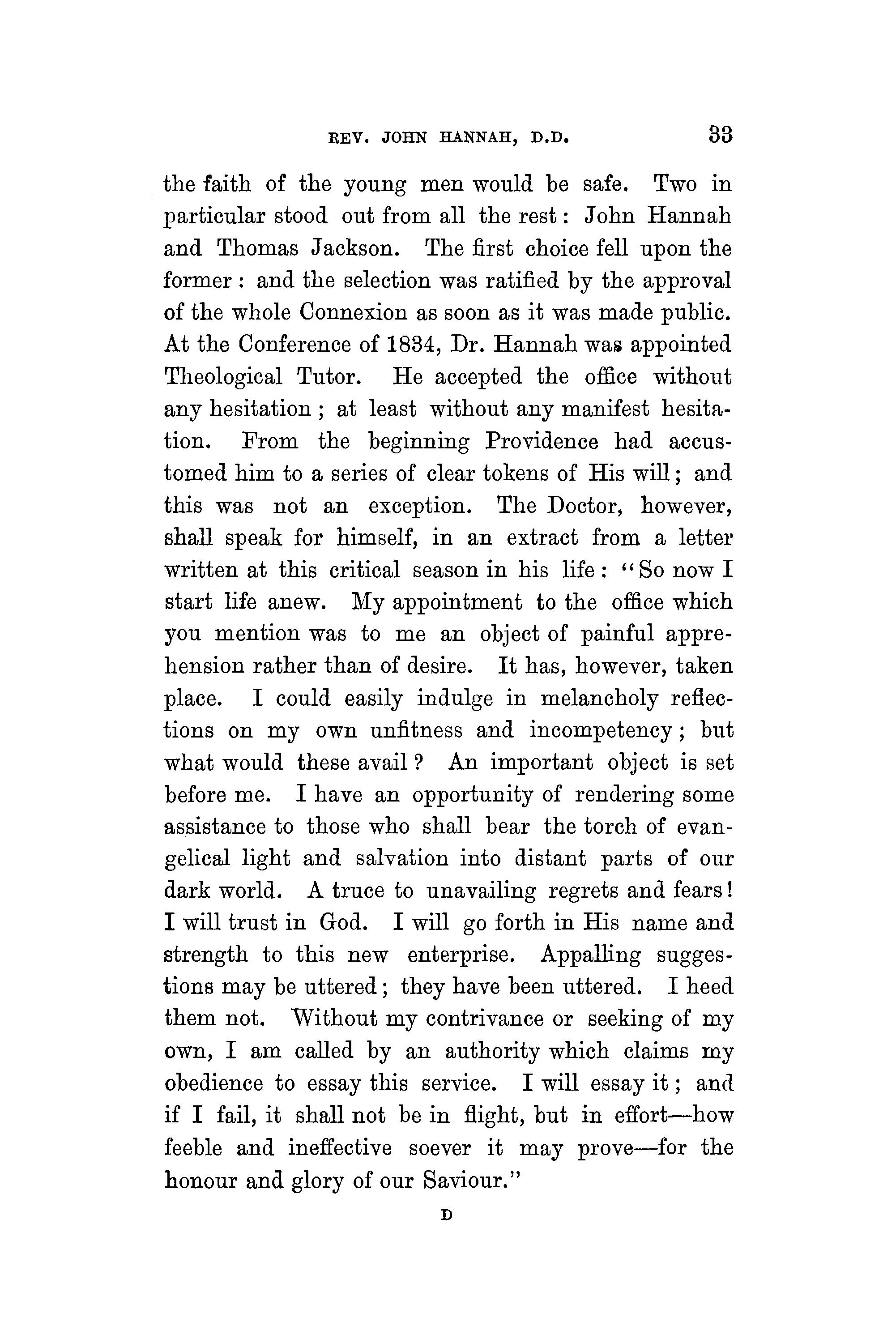
REV, JOHN HANNAH, D,D.
the faith of the young men would be safe. Two in particular stood out from all the rest : John Hannah and Thomas Jackson. The first choice fell upon the former : and the selection was ratified by the approval of the whole Connexion as soon as it was made public. At the Conference of 1834, Dr. Hannah was appointed Theological Tutor. He accepted the office without any hesitation ; at least without any manifest hesitation. From the beginning Providence had accustomed him to a series of clear tokens of His will ; and this was not an exception. The Doctor, however, shall speak for himself, in an extract from a letter written at this critical season in his life : '' So now I start life anew. My appointment to the office which you mention was to me an object of painful apprehension rather than of desire. It has, however, taken place. I could easily indulge in melancholy reflections on my own unfitness and incompetency ; but what would these avail? An important object is set before me. I have an opportunity of rendering some assistance to those who shall bear the torch of evangelical light and salvation into distant parts of our dark world. A truce to unavailing regrets and fears!
I will trust in God. I will go forth in His name and strength to this new enterprise. Appalling suggestions may be uttered; they have been uttered. I heed them not. Without my contrivance or seeking of my own, I am called by an authority which claims my obedience to essay this service. I will essay it; and if I fail, it shall not be in flight, but in effort-how feeble and ineffective soever it may prove-for the honour and glory of our Saviour."

On leaving the Conference of 1834, Dr. Hannah was almost literally, as he said, beginning life afresh. He had no experience whatever of his new function; had never been in the habit of guiding the studies of young men; and was without the advantage of having been himself under a theological tutor, and one of a number of students. Moreover, his course of instruction was yet to seek. Whatever hints he may have had as to probabilities in the future, he had never set to work on methodical preparation. There was no text-book that he could adopt as the basis of his teaching while his own lectures were in course of elaboration. Christian doctrine, as taught by Methodism, is of too definite a type to permit the use of a text-book introduced from without ; and he found none within that would suit his purpose. The sermons, expository notes,. and innumerable theological treatises of Mr. ·wesley were of course not adapted to this purpose : the finest of these treatises, that on Original Sin, is the least systematic of all. ·watson's "Institutes" are a thoughtful and well-reasoned exhibition of some of the most important points in theology. But, as a Body of Divinity, it is far from complete; its arrangement is in a few respects faulty; it is on some subjects very diffuse, on others comparatively meagre ; and it blends dogmatic, controversial, historical, and practical theology together, in a manner that unfits it for use as a text-book. Under these circumstances, Dr. Hannah set to work, as his "Letter to a Junior Methodist Preacher " shows, to make his own system, and weave his own theological course out of the produce of many looms. The process was to him-being at the
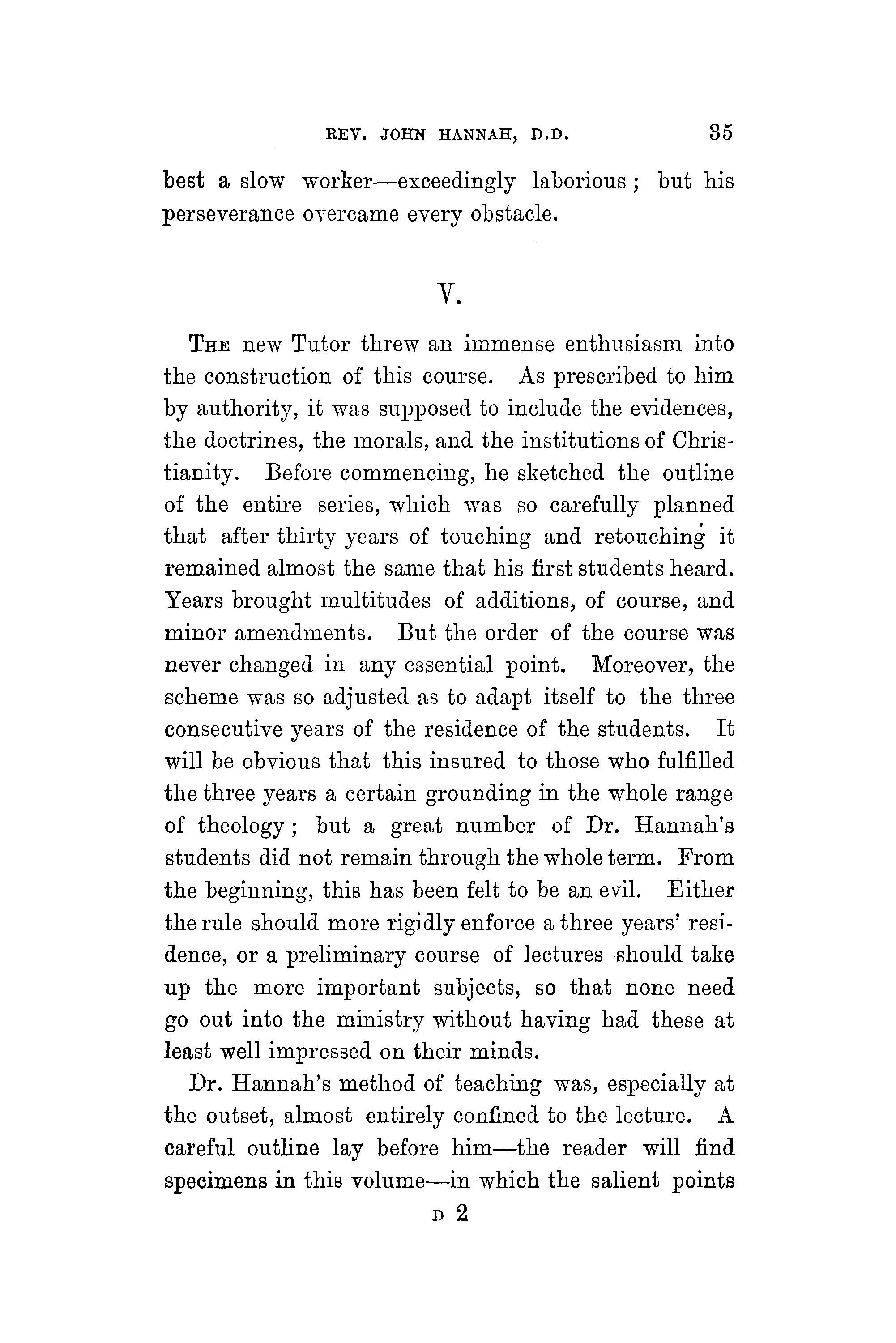
JOHN HANNAH, D.D.
best a slow worker-exceedingly laborious ; but his perseverance overcame every obstacle.
THE new Tutor threw an immense enthusiasm into the construction of this course. As prescribed to him by authority, it was supposec1to include the evidences, the doctrines, the morals, and the institutions of Christianity. Before commencing, he sketched the outline of the entfre series, which was so carefully planned that after thil'ty years of touching and retouching it remained almost the same that his first students heard. Years brought multitudes of additions, of course, and minor amendments. But the order of the course was never changed in any essential point. Moreover, the scheme was so adjusted as to adapt itself to the three consecutive years of the residence of the students. It will be obvious that this insured to those who fulfilled the three years a certain grounding in the whole range of theology; but a great number of Dr. Hannah's students did not remain through the whole term. From the beginning, this has been felt to be an evil. Either the rule should more rigidly enforce a three years' residence, or a preliminary course of lectures should take up the more important subjects, so that none need go out into the ministry without having had these at least well impressed on their minds.
Dr. Hannah's method of teaching was, especially at the outset, almost entirely confined to the lecture. A careful outline lay before him-the reader will find specimens in this volume-in which the salient points
2
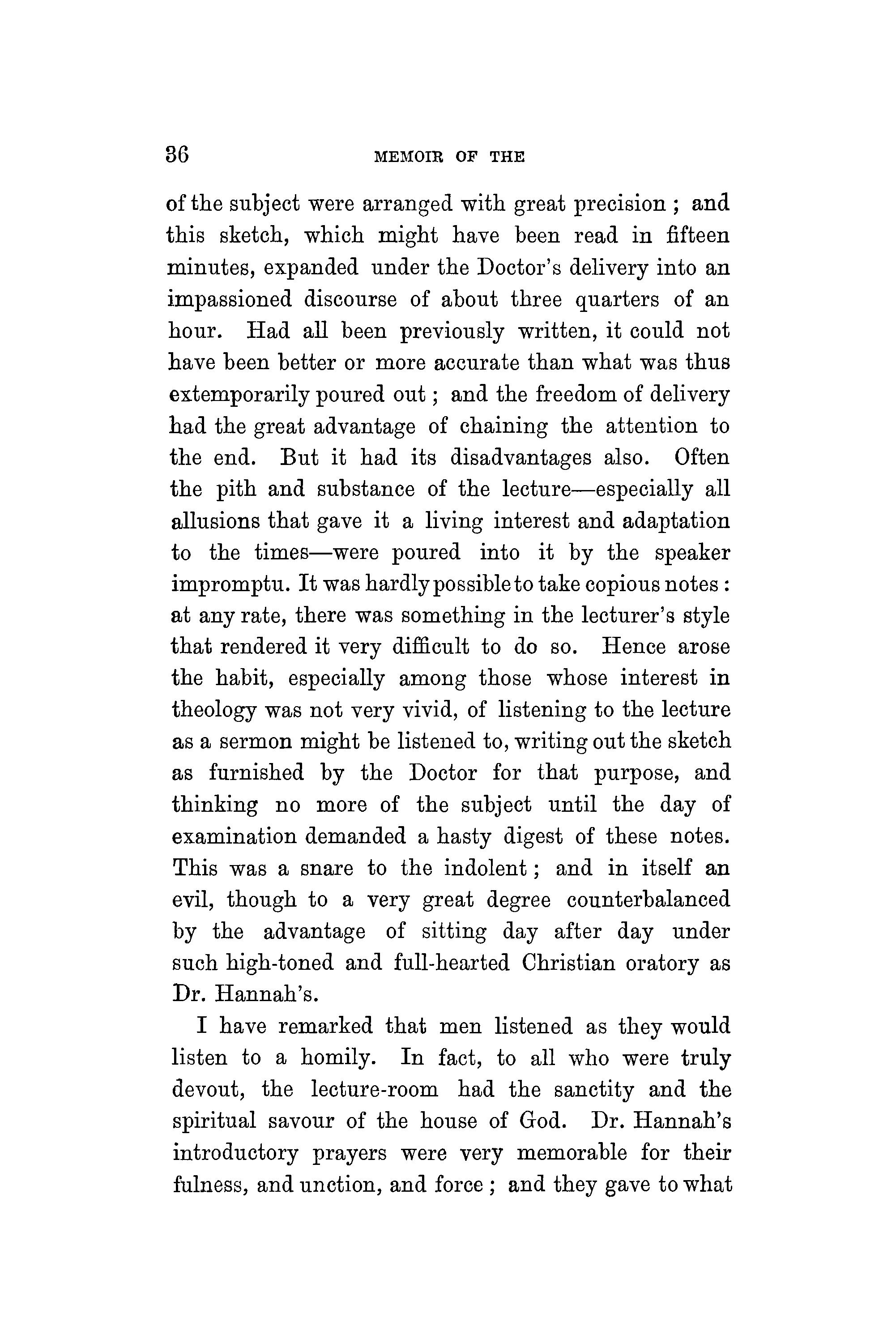
of the subject were arranged with great precision ; and this sketch, which might have been read in fifteen minutes, expanded under the Doctor's delivery into an impassioned discourse of about three quarters of an hour. Had all been previously written, it could not have been better or more accurate than what was thus extemporarily poured out; and the freedom of delivery had the great advantage of chaining the attention to the end. But it had its disadvantages also. Often the pith and substance of the lecture-especially all allusions that gave it a living interest and adaptation to the times-were poured into it by the speaker impromptu. It was hardly possible to take copious notes: at any rate, there was something in the lecturer's style that rendered it very difficult to do so. Hence arose the habit, especially among those whose interest in theology was not very vivid, of listening to the lecture as a sermon might be listened to, writing out the sketch as furnished by the Doctor for that purpose, and thinking no more of the subject until the day of examination demanded a hasty digest of these notes. This was a snare to the indolent; and in itself an evil, though to a very great degree counterbalanced by the advantage of sitting day after day under such high-toned and full-hearted Christian oratory as Dr. Hannah's.
I have remarked that men listened as they would listen to a homily. In fact, to all who were truly devout, the lecture-room had the sanctity and the spiritual savour of the house of God. Dr. Hannah's introductory prayers were very memorable for their fulness, and unction, and force ; and they gave to what
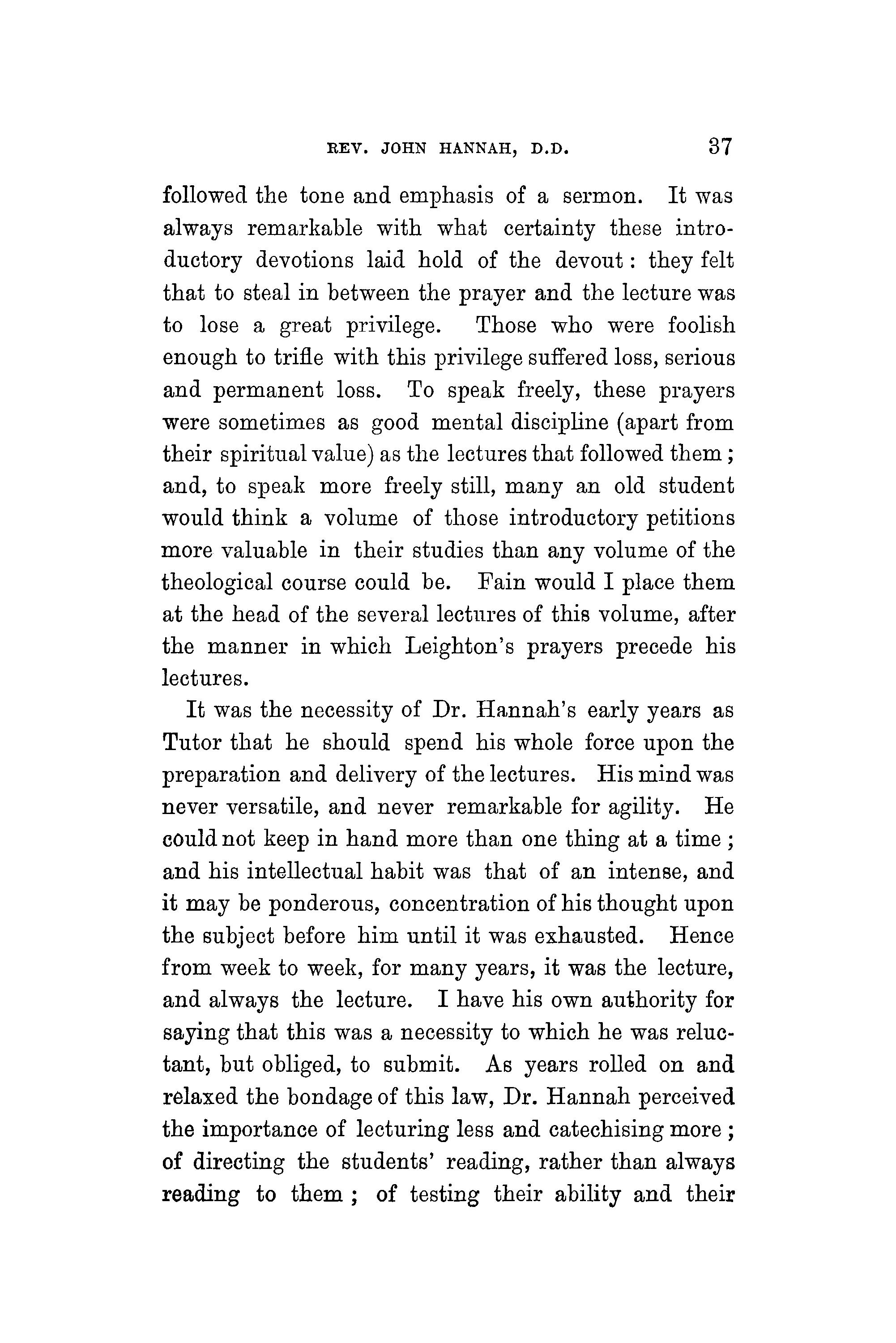
REV. JOHN HANNAH, D.D, 37
followed the tone and emphasis of a sermon. It was always remarkable with what certainty these introductory devotions laid hold of the devout : they felt that to steal in between the prayer and the lecture was to lose a great privilege. Those who were foolish enough to trifle with this privilege suffered loss, serious and permanent loss. To speak freely, these prayers were sometimes as good mental discipline (apart from their spiritual value) as the lectures that followed them ; and, to speak more freely still, many an old student would think a volume of those introductory petitions more valuable in their studies than any volume of the theological course could be. Fain would I place them at the head of the several lectures of this volume, after the manner in which Leighton's prayers precede his lectures.
It was the necessity of Dr. Hannah's early years as Tutor that he should spend his whole force upon the preparation and delivery of the lectures. His mind was never versatile, and never remarkable for agility. He could not keep in hand more than one thing at a time ; and his intellectual habit was that of an intense, and it may be ponderous, concentration of his thought upon the subject before him until it was exhausted. Hence from week to week, for many years, it was the lecture, and always the lecture. I have his own authority for saying that this was a necessity to which he was reluctant, but obliged, to submit. As years rolled on and relaxed the bondage of this law, Dr. Hannah perceived the importance of lecturing less and catechising more ; of directing the students' reading, rather than always reading to them ; of testing their ability and their

progress by paper work; of frequent, and searching, and line-upon-line examinations ; of stimulating impromptu efforts, and generally of attempting to educate as well as to inform, of educating rather than informing, the young theologian. In all these respects there was a gradual and marked improvement in the tutorial function. Expository readings were introduced, essay-writing and the construction of sermons followed, free conversations and even discussions attempted under certain circumstances, and examinations were multiplied. Long after the elasticity of mind which makes new experiments had departed, the Doctor pondered plans which it was too late to adopt. Happily, however, he was able to converse freely with his successor on these subjects, and give him the benefit of his experience in hints, none of which will be forgotten.
There was only one feeling among Dr. Hannah's students as to his kindness and sympathy. His courtesy was unfailing ; his attention was ready for every applicant ; and it was impossible to rely too absolutely on his kindheartedness. Though somewhat reserved and very dignified in his demeanour generally, he was always full of affability to his young men. He had the heart of a father towards every one of them. In his judgments of their performances, in class or in the pulpit, he orred, if he erred at all, on the side of kindness. It was sometimes almost amusing to mark the dexterity with which the Doctor would find out the palliating excellencies and redeeming points of a sermon that every one else thought worthless. That is to say, when the preacher was evidently sincere and earnest

REV. JOHN HANNAH, D.D.
and humble-minded : H he showed anything like presumption, irreverence, or license of thought, or flippancy of speech, he might be very sure that his Tutor would be the severest of his critics. Severe he could be sometimes in feeling, and look, and word, as many a delinquent remembers to this day. But the severity was never undeserved, and its explosion was sudden and soon over. To those who did their duty, and preserved their simplicity and humbleness of mind, he was tenderness itself. Indeed, there was reason to fear that purity of motive and honesty of effort were allowed sometimes too much weight, and atoned, when they ought not, for weakness of spirit and ineompetency of mind.
The first seven years spent by Dr. Hannah in the service of the Theological Institution were spent in London. They were in some sense years of probation, both as it regards the Institution itself and as it regards the teachers. It was a time of transition and comparative unsettlement. At first the Tutor gathered his little company around him in the CityRoad Morning Chapel: a scene very appropriate to the beginnings of so good a work. After a short time the old Congregational College at Roxton was occupied; father Entwisle was installed as Governor; the classical and English department, on which the efficiency of the Institution so largely depends, was organized; and Dr. Bunting, to whose legislative and administrative sagacity this Institution, in common with all others in Methodism, owed so deep au obligation, watched and guided all as its President, and Chairman of its governing Committee. After a

short interval, Abney-House, Stoke-Newington, was added to Dr. Hannah's charge; soon, however, to be handed over to Mr. Thomas Jackson, a thoroughly worthy colleague in the tutorship, besides being by common consent the best living type of a Methodist preacher, and a theologian most extensively read in English divinity. In due course new buildings were provided, more worthy of the dignity of the Institution, and more suitable to its requirements, at Didsbury, near Manchester, and Richmond, near London. In 1842, Dr. Hannah removed to Didsbury, where he spent the remainder of his life, five and twenty years. This London term was regarded by the Doctor with more affection than any other period in his history. Everything connected with these early years had an unrivalled charm to his memory. It was a season of varied experiences that never could be forgotten; days of hope mingled with fear, strength with weakness, difficulty with success, that never could return. Roxton was always invested with a special interest, and all its associations were peculiarly dear. The first successive companies of students had a high place in their Tutor's regard. They were connected in his mind with his first essays in theological teaching ; and none afterwards could come near them. It is true that they were on the whole a high class of men. Some individuals were pre-eminent ; a few that are gone and a few that are still living are not likely to be surpassed, if equalled. But it was not their essential superiority to their successors that made their Tutor so warm in their praise: it was because they were the first-born of his strength.

REV. JOHN HANNAH, D.D.
These years were, like the years that preceded them, marked by much family affliction. He had two sons when he went to Myddelton Square, both rejoicing his heart by their fair promise of life and success. They were the only survivors of a family of eight children. One of these two, Richard Watson, was suddenly taken from him by fever ; and the manner in which he received this dispensation gives evidence better than any other of the ripeness of his Christian character. To the Rev. Lancelot Sharpe, Master of St. Saviour's Grammar School, who had sent him a letter of condolence, he writes : " I cannot ever forget what I owe to you on behalf of my children. But I have no more whom I may have the happiness of placing under your care. Poor Richard ! he is the seventh child that has, in God's merciful chastisement, been taken from us; and there is but one left. May it please God to preserve and bless him ! '' The following pathetic act of surrender preceded the lad's departure: I borrow this, like the former extract, from Dr. Jobson's Memorial volume, as showing what manner of spirit Dr. Hannah had under the heavy chastisement of the Divine Hand.
"A FATHER'S PRAYER OF SURRENDER.
" May Almighty God, the great Father of the whole human family, Who has confided to us the care of this dear child for a season, and Who now calls him from us, receive him in mercy to Himself, and bless him with His own eternal presence, through Jesus Christ our Lord. Amen."
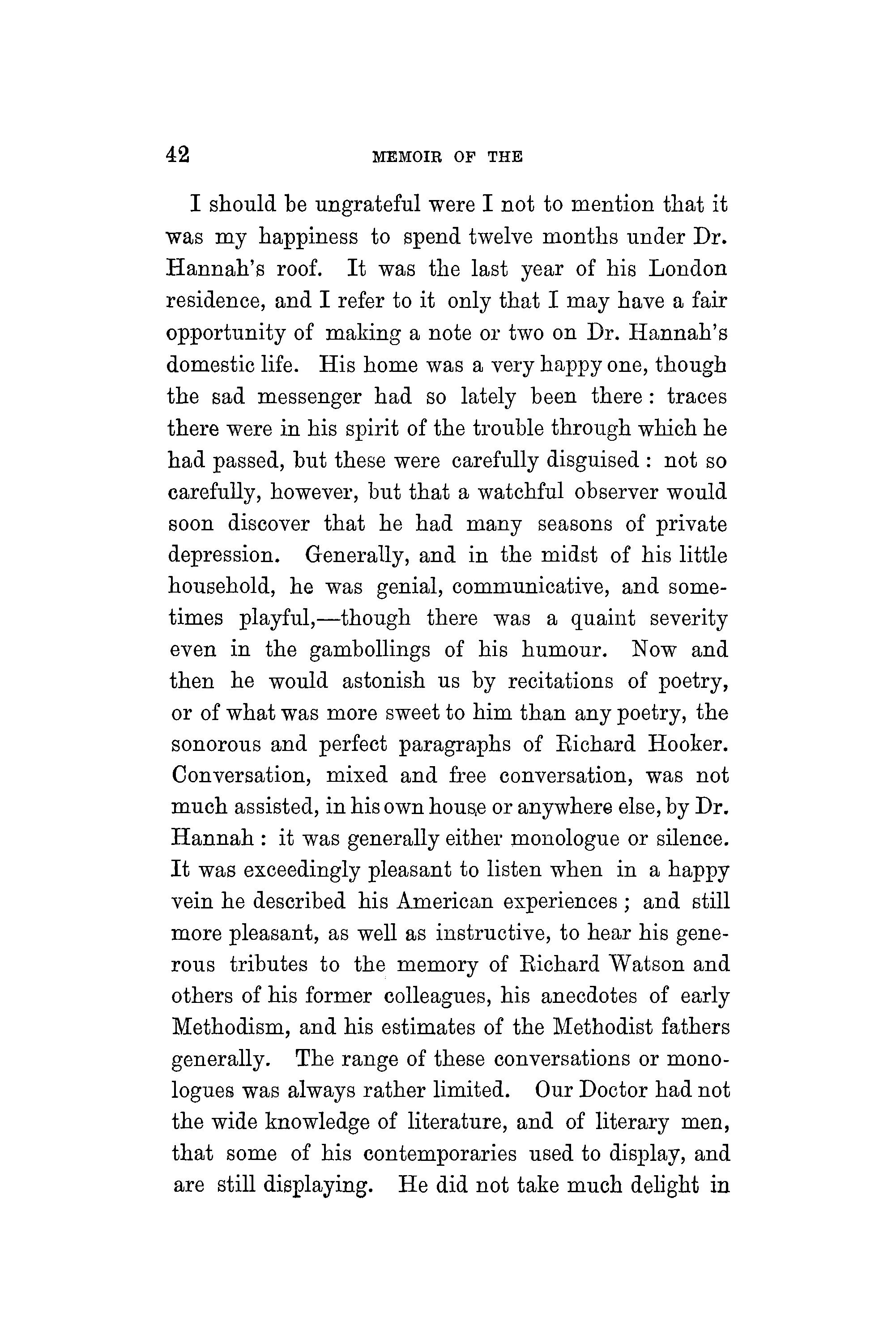
I should be ungrateful were I not to mention that it was my happiness to spend twelve months under Dr. Hannah's roof. It was the last year of his London residence, and I refer to it only that I may have a fair opportunity of making a note or two on Dr. Hannah's domestic life. His home was a very happy one, though the sad messenger had so lately been there : traces there were in his spirit of the trouble through which he had passed, but these were carefully disguised : not so carefully, however, but that a watchful observer would soon discover that he had many seasons of private depression. Generally, and in the midst of his little household, he was genial, communicative, and sometimes playful,-though there was a quaint severity even in the gambollings of his humour. Now and then he would astonish us by recitations of poetry, or of what was more sweet to him than any poetry, the sonorous and perfect paragraphs of Richard Hooker. Conversation, mixed and free conversation, was not much assisted, in his own hous,e or anywhere else, by Dr. Hannah : it was generally either monologue or silence. It was exceedingly pleasant to listen when in a happy vein he described his American experiences ; and still more pleasant, as well as instructive, to hear his generous tributes to the memory of Richard Watson and others of his former colleagues, his anecdotes of early Methodism, and his estimates of the Methodist fathers generally. The range of these conversations or monologues was always rather limited. Our Doctor had not the wide knowledge of literature, and of literary men, that some of his contemporaries used to display, and are still displaying. He did not take much delight in

REV. JOHN HANNAH, D.D.
belleslettres or criticism. But, whatever the excellencies or the defects of Dr. Hannah's conversational powers might be, he never left a company without impressing it by the gravity and purity of his spirit.
In his household and family circle Dr. Hannah had the art of inspiring a very deep affection. More than the usual homage was paid him by his kindred. It was his happiness to be the object of affection to a few of the purest spirits that ever ministered to man. Of his wife's lifelong devotion I have spoken. At the time I was an inmate of the house, his niece, Margaret Parker, was still living, and living apparently only for him-a young lady of excellence so rare that it seems a duty to record it. She was like an adopted daughter, but she also was soon afterwards smitten, and lies in Didsbury churchyard with those who were more than parents. Her place was afterwards taken by her sister Jane, a Christian of the same meek and sacrificing nature, who has just closed a long service of never-weary love by closing Mrs. Hannah's eyes in death. It need not be said, that this love was both won and repaid by love. Dr. Hannah was a blessing to those around him, by his example, and his prayer, and his gentle, undemonstrative, but most thoughtful .affection. Long after the time to which I refer, he began to take great delight in his only granddaughter, whose grace and goodness endeared her to all, especially to him. She, like so many others, has been prematurely removed ; but has left some very striking evidences of the peculiar effect that her grandfather's kindness and prayer had produced in her young heart. It may seem, perhaps, a trite thing to say that a good man
inspired love in his own house ; but, m the case of Dr. Hannah and his household, there was something beyond the ordinary strength of the family bond.

TRANSFERRED to Didsbury, the Theological Tutor continued his work with a tranquil confidence, steadily perfecting his system of dogmatic theology, and adding to his instruction courses of lectures on the interpretation of Scripture, on the Romish controversy, on ecclesiastical history, and some other subjects pertaining to his chair. He was always happy in his colleagues ; and did his utmost to sustain their hands in their department of the common work. It must needs be that difficulties would now and then arise in the adjustment of their respective functions and obligations. Wisdom and mutual forbearance and charity were often peculiarly necessary. Nor were these wanting. The quarter of a century of service in Didsbury passed away in unbroken harmony, and amidst many signs of a sure prosperity. During that long term there were many changes. Mr. Thornton's happy term soon ended at Didsbury. Mr. Jonathan Edmondson took his place: a pure-minded, learned, and hardworking Tutor, between whom and Dr. Hannah there existed a firm friendship. Mr. Geden succeeded him ; and what union of heart and concord in labour existed between the colleagues, from the time of Mr. Geden's appointment, may be inferred from the generous and graceful eulogium appended by him
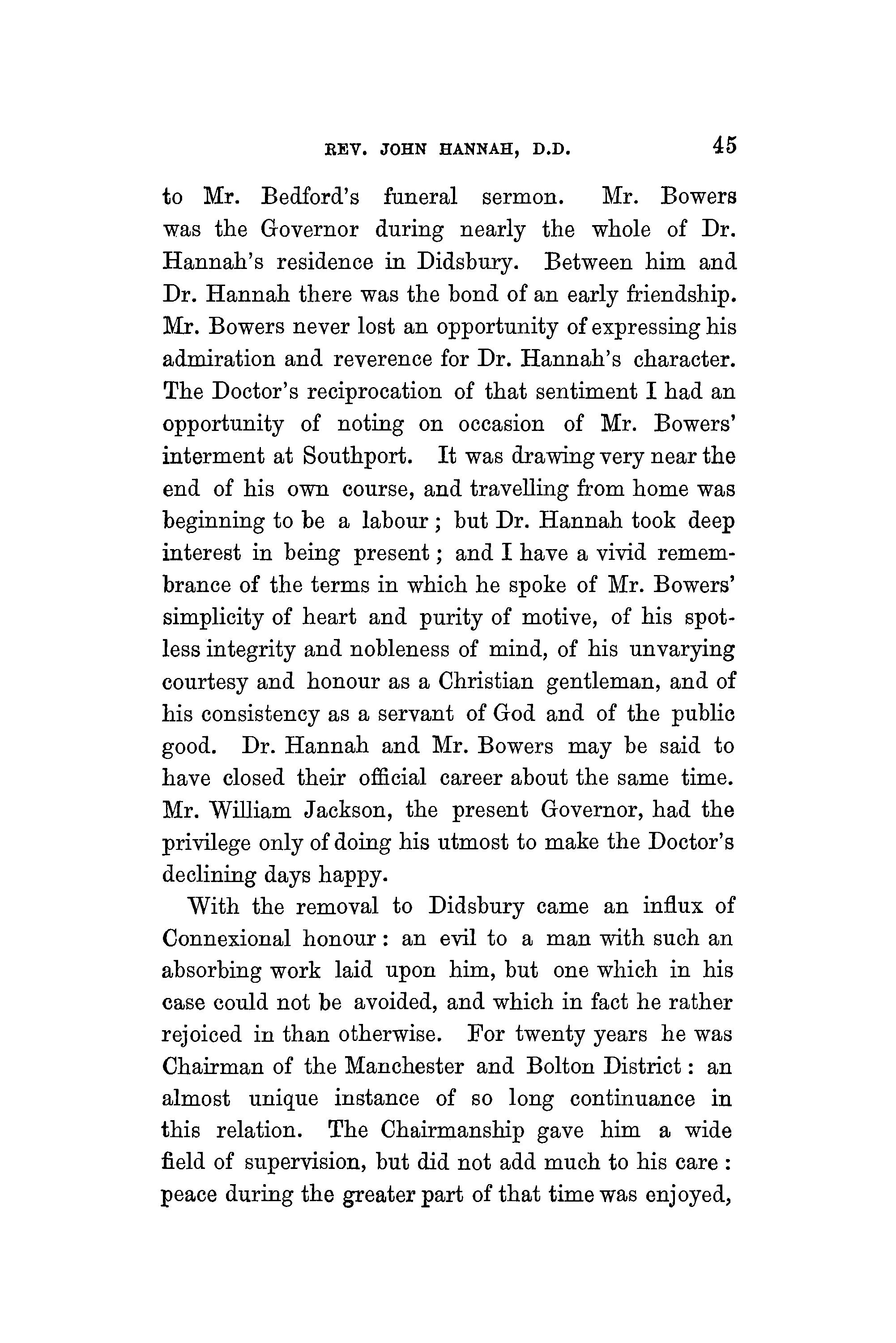
REV, JOHN HANNAH, D.D.
to Mr. Bedford's funeral sermon. Mr. Bowers was the Governor during nearly the whole of Dr. Hannah's residence in Didsbury. Between him and Dr. Hannah there was the bond of an early friendship. Mr. Bowers never lost an opportunity of expressing his admiration and reverence for Dr. Hannah's character. The Doctor's reciprocation of that sentiment I had an opportunity of noting on occasion of Mr. Bowers' interment at Southport. It was drawing very near the end of his own course, and travelling from home was beginning to be a labour; but Dr. Hannah took deep interest in being present; and I have a vivid remembrance of the terms in which he spoke of Mr. Bowers' simplicity of heart and purity of motive, of his spotless integrity and nobleness of mind, of his unvarying courtesy and honour as a Christian gentleman, and of his consistency as a servant of God and of the public good. Dr. Hannah and Mr. Bowers may be said to have closed their official career about the same time. Mr. William Jackson, the present Governor, had the privilege only of doing his utmost to make the Doctor's declining days happy.
With the removal to Didsbury came an influx of Connexional honour : an evil to a man with such an absorbing work laid upon him, but one which in his case could not be avoided, and which in fact he rather rejoiced in than otherwise. For twenty years he was Chairman of the Manchester and Bolton District : an almost unique instance of so long continuance in this relation. The Chairmanship gave him a wide field of supervision, but did not add much to his care : peace during the greater part of that time was enjoyed,

and, when it was disturbed, the Doctor was never a very active participant in conflict. His habits were fast ceasing to be sedentary; literary work was not much to his mind ; hence the variety of engagements in which this office involved him, and the number of meetings he had to preside over, were felt to be a relief and healthy diversion. As chairman in meetings where real business always of the utmost gravity and sometimes of the utmost complexity is transacted, Dr. Hannah had a character of his own. He never governed affairs ; very often seemed as if he did not perfectly understand them ; but always was wise enough to use the services of those who governed while he reigned. It is no disparagement of the Doctor to say this : it is certain that he had no natural bias towards public business, and that no training had ever overcome his natural inaptitude. He sat with dignity in every chair, and invariably gave ~he impression of being at home in it. He was faithful to great principles confided to his charge ; and, if he sometimes showed an indisposition to contest points which deeply interested others, it was less in reality than in appearance that he was wanting. No meeting over which he presided, and no member of any meeting, was ever allowed to forget that there were limits beyond which an apparently phlegmatic temperament must not be urged. Sometimes he has been known to look on patiently while needless discussion was carried on, and things irrelevant introduced, and time wasted; but, the point of forbearance once reached, the meeting has been called back to order in a style not soon to be forgotten.
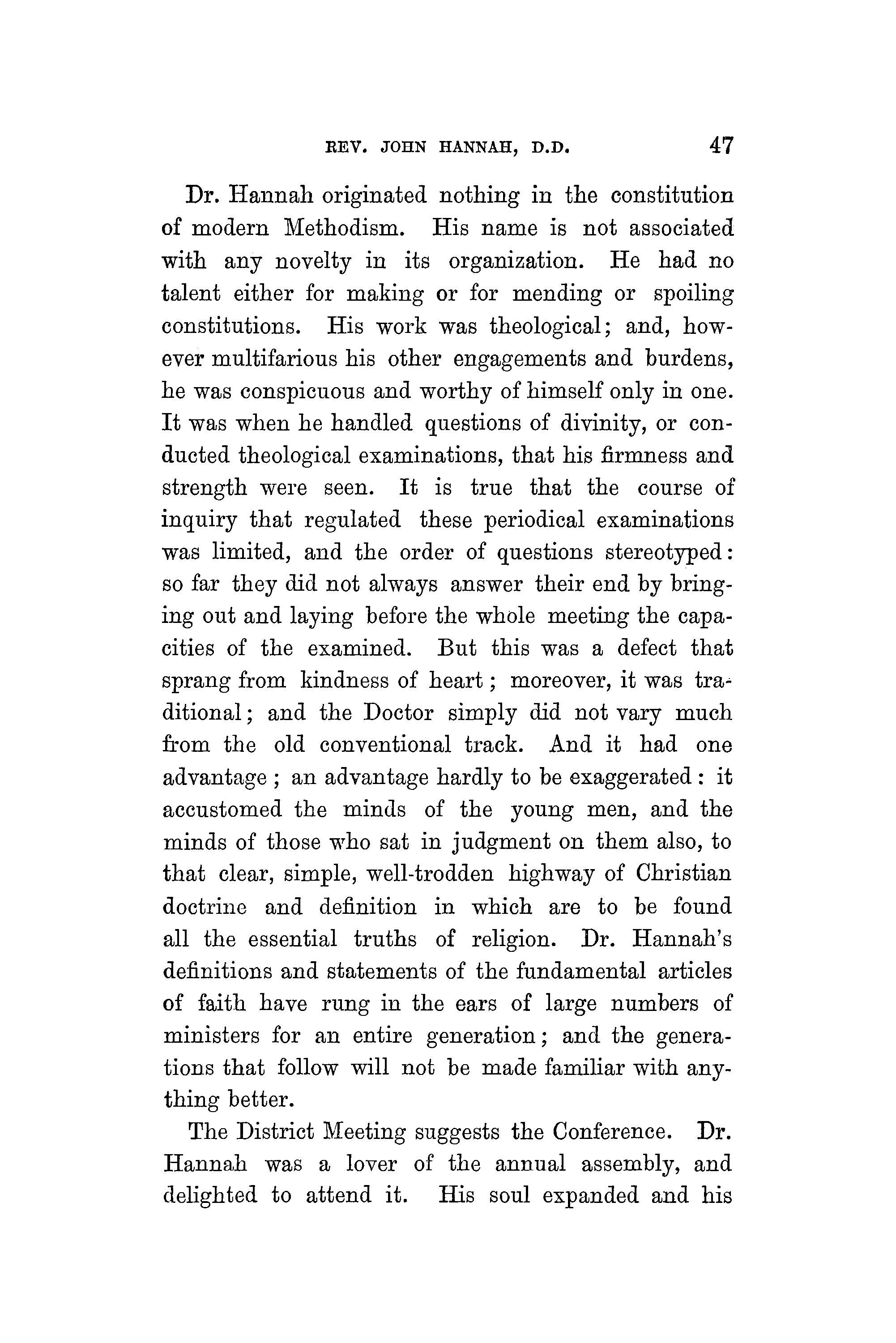
REV, JOHN HANNAH, D.D, 47
Dr. Hannah originated nothing in the constitution of modern Methodism. His name is not associated with any novelty in its organization. He had no talent either for making or for mending or spoiling constitutions. His work was theological; and, however multifarious his other engagements and burdens, he was conspicuous and worthy of himself only in one. It was when he handled questions of divinity, or conducted theological examinations, that his firmness and strength were seen. It is true that the course of inquiry that regulated these periodical examinations was limited, and the order of questions stereotyped : so far they did not always answer their end by bringing out and laying before the whole meeting the capacities of the examined. But this was a defect that sprang from kindness of heart; moreover, it was traditional ; and the Doctor simply did not vary much from the old conventional track. And it had one advantage; an advantage hardly to be exaggerated: it accustomed the minds of the young men, and the minds of those who sat in judgment on them also, to that clear, simple, well-trodden highway of Christian doctrine and definition in which are to be found all the essential truths of religion. Dr. Hannah's definitions and statements of the fundamental articles of faith have rung in the ears of large numbers of ministers for an entire generation; and the generations that follow will not be made familiar with anything better.
The District Meeting suggests the Conference. Dr. Hannah was a lover of the annual assembly, and delighted to attend it. His soul expanded and his

countenance shone when he met his brethren in full conclave. The atmosphere of Conference gave his nature its utmost enlargement. Not that he took much part in its conversations proper, or its conventional business. He made few speeches on any subject: in fact, the Methodist Hansard might be ransacked in vain for one set and elaborate speech. For the business of legislation he had no commission either from God or man. For the noble strife of debate he had no inclination : no inclination, at least, to engage in it; for, that he keenly enjoyed the friendly collision was very evident from the gleam that his shaggy eyebrows scarcely concealed. But he was never wanting on occasions when Connexional principles and theological verities were in peril ; and no one was more prompt, and more graceful, in the deliverance of the speeches of courtesy which are frequent in such an assembly. It was, however, in his own department that he felt most at ease. I have heard it said that his sermons and prayers-especially his ordination prayers-during the sessions of Conference were among the things most worthy of remembrance in his public life.
Dr. Hannah in due time reached the highest honours of the Connexion. Nine times he was elected to the Secretaryship of the Conference : a circumstance not easily to be understood, considering the peculiar qualities required in that office, save on the theory that his brethren delighted to show their confidence in him. That confidence in due course promoted him to the Chair: an honour that he attained first in London, in 1842, and afterwards in Newcastle-on-Tyne, in 1851. On both

REV. JOHN HANNAH, D.D.
occasions he acquitted himself much to the satisfaction of his brethren ; and represented his own communion honomably to other commun.ities and to the world. The number of public meetings which he attended was considerable; and, whatever the subject was, his full and ready mind never failed to do justice to it. The College duties were of course to some extent required to suffer. But Dr. Hannah did his best; and, through the blessing of God on a robust constitution, he could look back on these years, respectively, as amongst the happiest he had known. In the sessions of the Conference itself he was uniformly courteous and impartial, and, it is hardly necessary to add, dignified and able. Though entertaining a rooted aversion to the habit of speech-making for display, as well as to the pugnacity which would allow no discussion to pass undisturbed, he never used his power for the suppression of any man's voice. He has been heard to say, however, that nothing ever so heavily taxed his forbearance.
Dming these five-and-twenty yearn of comparative retirement, Dr. Hannah was still an indefatigable preacher. After his courses of lectures had reached a certain stage of maturity, his mind became more free for external work, and he was ready to yield to every call. It was a relief to the monotony of his Didsbmy life to take appointments in the district around ; and thus he was enabled to do the Connexion good service. He always thought his vocation as a preacher of the Gospel the glory of his life ; and had a true zeal for the good of souls. To the very last he was in the habit of composing new sermons, or at least
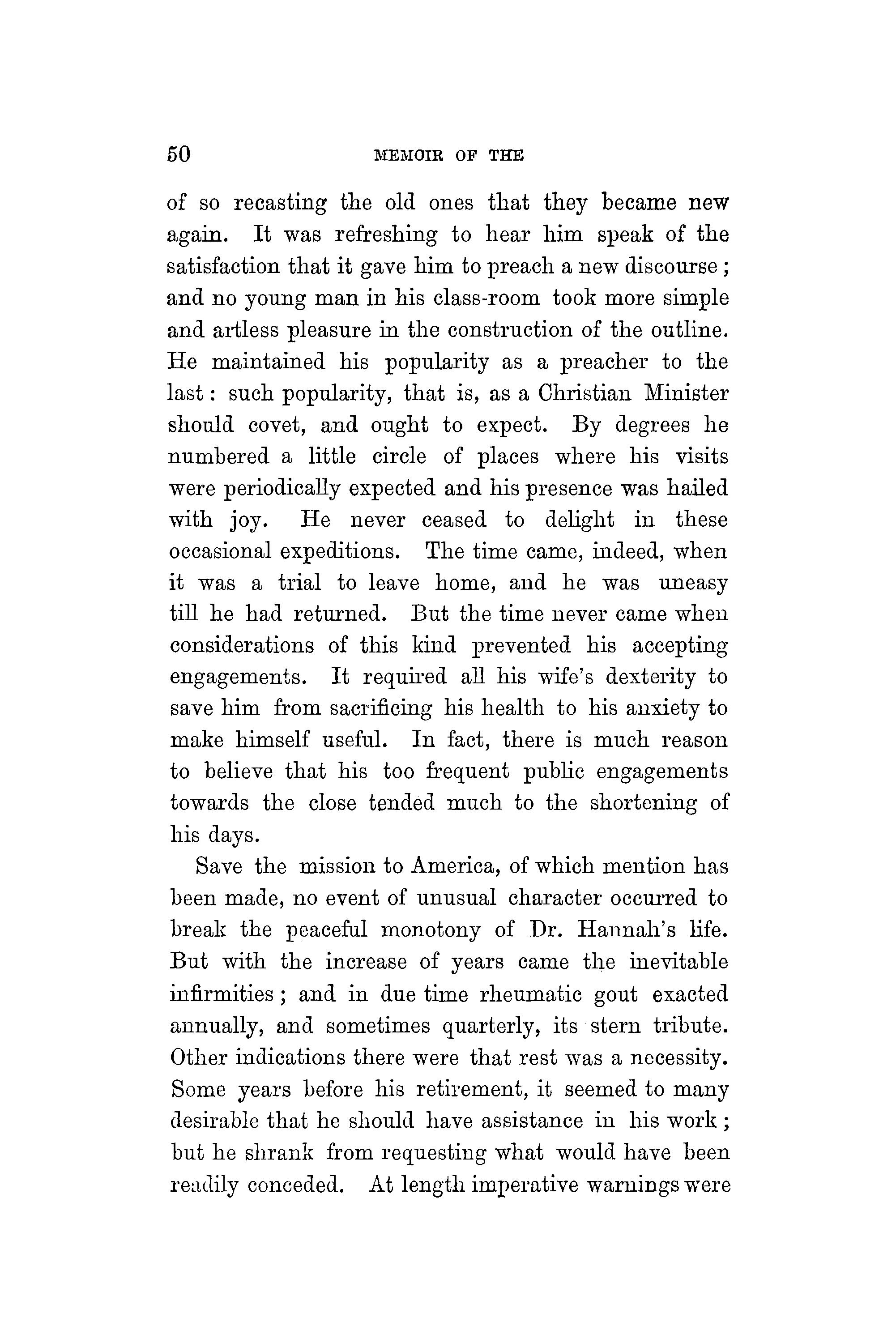
of so recasting the old ones that they became new again. It was refreshing to hear him speak of the satisfaction that it gave him to preach a new discourse ; and no young man in his class-room took more simple and artless pleasure in the construction of the outline. He maintained his popularity as a preacher to the last: such popularity, that is, as a Christian Minister should covet, and ought to expect. By degrees he numbered a little circle of places where his visits were periodically expected and his presence was hailed with joy. He never ceased to delight in these occasional expeditions. The time came, indeed, when it was a trial to leave home, and he was uneasy till he had returned. But the time never came when considerations of this kind prevented his accepting engagements. It required all his wife's dexterity to save him from sacrificing his health to his anxiety to make himself useful. In fact, there is much reason to believe that his too frequent public engagements towards the close tended much to the shortening of his days.
Save the mission to America, of which mention has been made, no event of unusual character occurred to break the peaceful monotony of Dr. Hannah's life. But with the increase of years came the inevitable infirmities; and in due time rheumatic gout exacted annually, and sometimes quarterly, its stern tribute. Other indications there were that rest was a necessity. Some years before his retirement, it seemed to many desirable that he should have assistance in his work; but he shrank from requesting what would have been reatlily conceded. At length imperative warnings were

REV. JOHN HANNAH, D.D, 51
given ; and, at his own request, he was released from the burden of the Tutorship. His retirement gave occasion to such expressions of affectionate and respectful feeling, on the part of his brethren and of all with whom he had been connected, as it falls to the lot of few men to live to receive. Without removing from his house,-which was reserved to him for the remainder of his life,-and still remaining a familiar ancl much revered presence in the College, Dr. Hannah prepared, as we all fondly hoped, to spend a few years in peace before going to his final rest.
That was our hope, and everything seemed to betoken a placid and lengthened evening of his long day. He entered on the first year of his retirement with all that Christian old age could desire. The companion of his life had been spared to him, and no veteran pair could be found more happy in each other than they were. His son, Dr. John Hannah, ·warden of Glenalmond College, was all that a father could wish, whether as to talent and position, or, what he felt to be more important, the right use of talent and position. He had the pleasure of reading and reading again his son's Bampton Lectures on Inspiration; and of observing his noble assertion elsewhere of the rights of theology in relation to science. There can be no purer joy to the departing servant of Christ than to see his own son using his gifts worthily. Dr. Hannah had much calm satisfaction in this. The shadow that was even then beginning to fall upon that son's house the grandfather can be scarcely thought to have seen or feared. Suffice that his only grandson was a Minister of the Church, and his only granddaughter a sincere Christian.
2

In other respects, he was gratified with his heart's desire. His theological chair was filled, if not worthily, yet worthily in his estimation. The officers and students of the College counted him still one of themselves, as their common father. Wherever he went he was received with evident love. And, amidst so many elements of contentment, well might he promise himself a few hours of standing and waiting after the toil of the day.
Our first care, when the Doctor's new leisure had fairly begun, was to urge upon him the preparation of his Lectures for the press. He needed no solicitation, but set to work at once, with his old painful but sure diligence, to re-write the entire course. The question soon pressed upon him, whether or not he should content himself with simply revising the manuscript, or recast those portions of the series which more modern inquiries had rendered partially obsolete. That such a question occupied him for a moment, being as he was more than half through his eighth decade of years, was a remarkable proof both of his mental energy and of his conscientiousness. It was most interesting to find him day after day reading carefully the last works on Inspiration, on the Darwinian Theory of Evolution, and on other subjects touching the earlier Lectures of his course. He was dissuaded, however, from attempting any extensive alterations, and satisfied himself with re-writing. The result of daily diligence soon appeared in the preparation of several sheets for the press. These were prepared in the most literal sense of the word : the poor 11rinter seldom rejoices over such exquisite copy, and

REV. JOHN HANNAH, D.D. 53
nothing was left to editorial care. The Doctor's labour of love was suspended only too soon ; the careful reader will perceive, after the Introductory Lectures, the absence of a certain high polish, and will know how to account for it. The completeness of the course required that many unrevised Lectures should be printed. But these have been left precisely as the Doctor left them.
It must be remembered, therefore, that the Lectures here presented to the public are only a fragment of Dr. Hannah's theological course. As such they labour under an obvious disadvantage. Every part of a series like this owes much of its value to its connection with the whole. Topics which are hastily dismissed in the dogmatic section are reserved for fuller discussion in the ethical : indeed, the doctrines and the morals of Christianity cannot be separated in treatment without injury to both. And neither can be viewed adequately without reference to the Church, and the Bible, and the institutions of Christianity. Dr. Hannah himself would not have preferred to give to the public a portion only of his course. He placed, however, no restriction on his literary executors; and they have yielded to a very general desire that the Lectures containing the central doctrines of Christianity should be made permanent. Multitudes of old students will receive them with gratitude ; they will be exceedingly useful to all who are preparing for the ministry; and not without their value to the religious public generally, as containing the simple elements of a teaching that has moulded for many years much of the doctrinal system of Methodism. No more must be
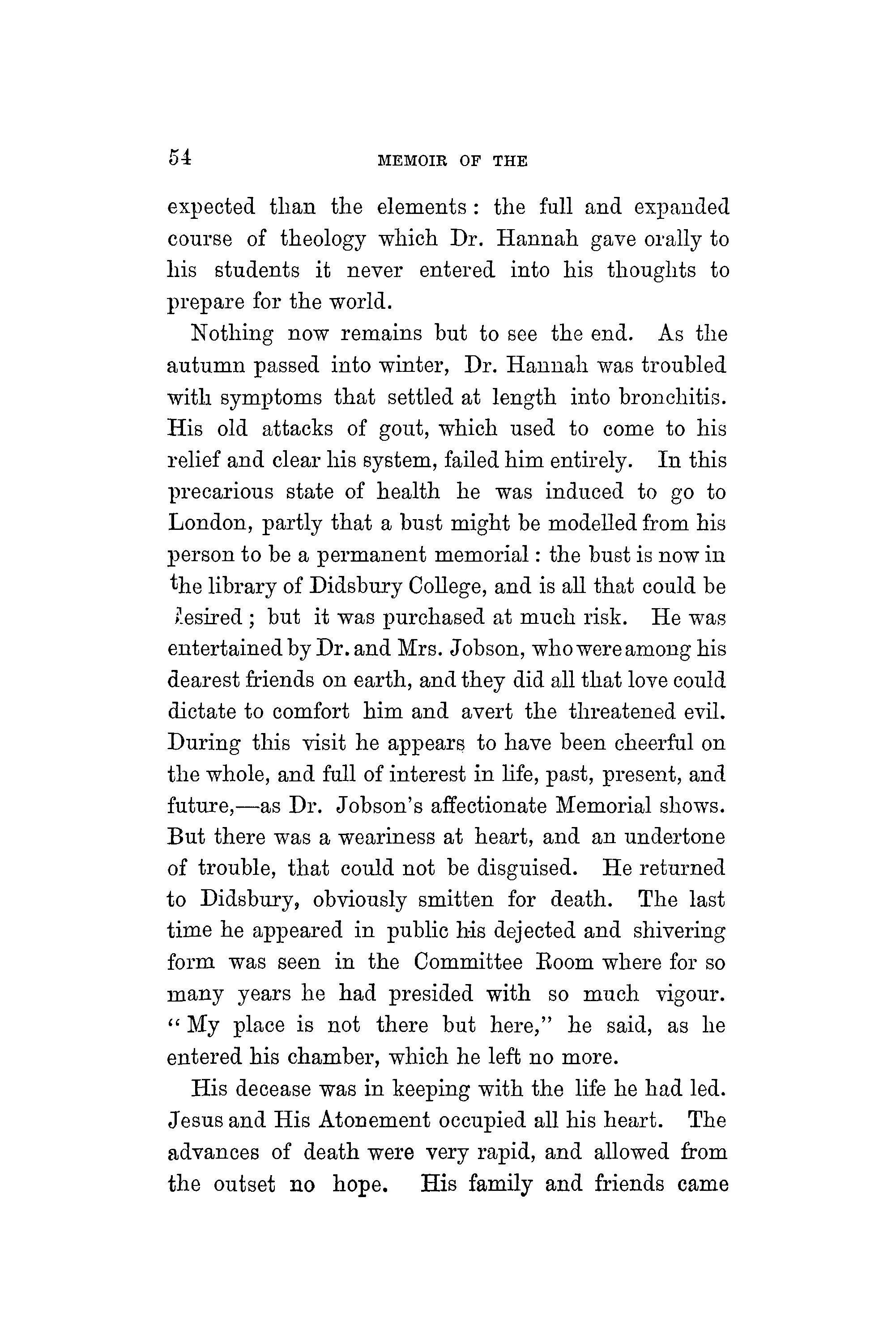
expected than the elements : the full and expanded course of theology which Dr. Hannah gave orally to his students it never entered into his thoughts to prepare for the world.
Nothing now remains but to see the end. As the autumn passed into winter, Dr. Hannah was troubled with symptoms that settled at length into bronchitis. His old attacks of gout, which used to come to his 1·eliefand clear his system, failed him entirely. In this precarious state of health he was induced to go to London, partly that a bust might be modelled from his person to be a permanent memorial: the bust is now in the library of Didsbury College, and is all that could be r.esired ; but it was purchased at much risk. He was entertained by Dr. and Mrs. Jobson, who were among his dearest friends on earth, and they did all that love could dictate to comfort him and avert the threatened evil. During this visit he appears to have been cheerful on the whole, and full of interest in life, past, present, and future,-as Dr. Jobson's affectionate Memorial shows. But there was a weariness at heart, and an undertone of trouble, that could not be disguised. He returned to Didsbury, obviously smitten for death. The last time he appeared in public his dejected and shivering form was seen in the Committee Room where for so many years he had presided with so much vigour. " My place is not there but here," he said, as he entered his chamber, which he left no more.
His decease was in keeping with the life he had led. Jesus and His Atonement occupied all his heart. The advances of death were very rapid, and allowed from the outset no hope. His family and friends came
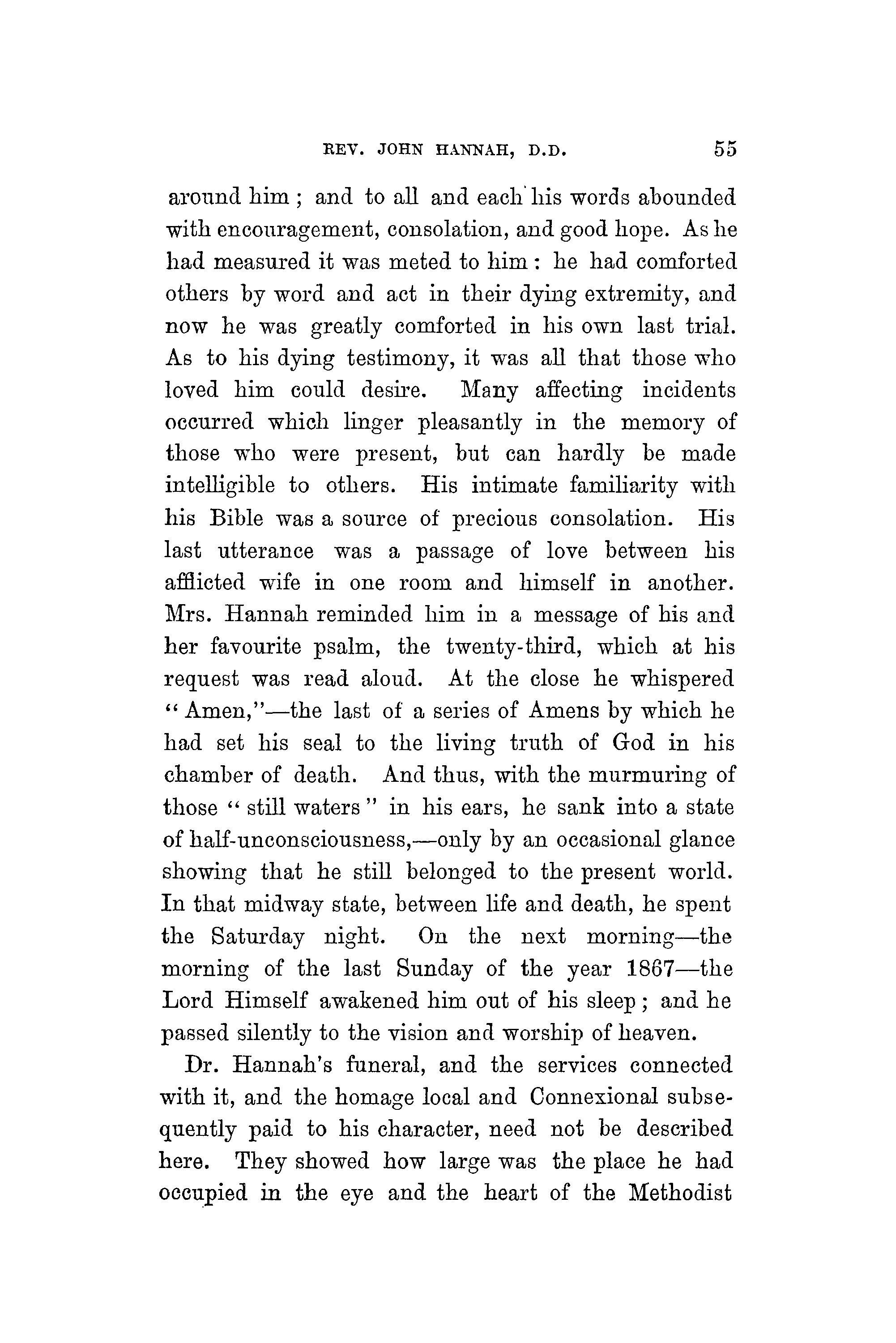
REV. JOHN HANNAH, D.D, 55
around him; and to all and each· his words abounded with encouragement, consolation, and good hope. As he had measured it was meted to him : he had comforted others by word and act in their dying extremity, and now he was greatly comforted in his own last tTial. As to his dying testimony, it was all that those who loved him could desire. Many affecting incidents occurred which linger pleasantly in the memory of those who were present, but can hardly be made intelligible to others. His intimate familiarity with his Bible was a source of precious consolation. His last utterance was a passage of love between his afflicted wife in one room and himself in another. Mrs. Hannah reminded him in a message of his ancl her favourite psalm, the twenty-third, which at his request was read aloud. At the close he whispered "Amen,"-the last of a series of Amens by which he had set his seal to the living truth of God in his chamber of death. And thus, with the murmuring of those " still waters " in his ears, he sank into a state of half-unconsciousness,-only by an occasional glance showing that he still belonged to the present world. In that midway state, between life and death, he spent the Saturday night. On the next morning-the morning of the last Sunday of the year 1867-the Lord Himself awakened him out of his sleep; and he passed silently to the vision and worship of heaven.
Dr. Hannah's funeral, and the services connected with it, and the homage local and Connexional subsequently paid to his character, need not be described here. They showed how large was the place he had occupied in the eye and the heart of the Methodist

community. By every variety of record his memory was honoured during the year. And the Conference confirmed all by one of its most impressive obituary tributes.
THE method adopted in this sketch leaves but little to be added. A few supplementary notes are all that is necessary for such completeness as I am able to give it.
Dr. Hannah's name will always be more closely than any other associated with the success of the Theological Institution. He was the first Theological Tutor ; and the task was confided to him of shaping the course that the training of young Ministers should afterwards take. Not less than four hundred of these have been under his guidance, and had their character as students of theology more or less moulded by him. There can be no hesitation, therefore, in saying that to his fidelity and devotion the establishment and prosperity of our Colleges may be in a great measure ascribed. Not, however, to his only. The time has happily not yet come for publishing a final estimate of the services of Mr. Jackson, who so soon became Dr. Hannah's colleague in the Theological Tutorship. He has not been a whit behind the chiefest in the importance of his labours ; and in some respects has surpassed all. It is impossible to do justice to Dr. Hannah's relation to the College without linking these two names together. Though they have always toiled in different branches, and in many respects have been dissimilar
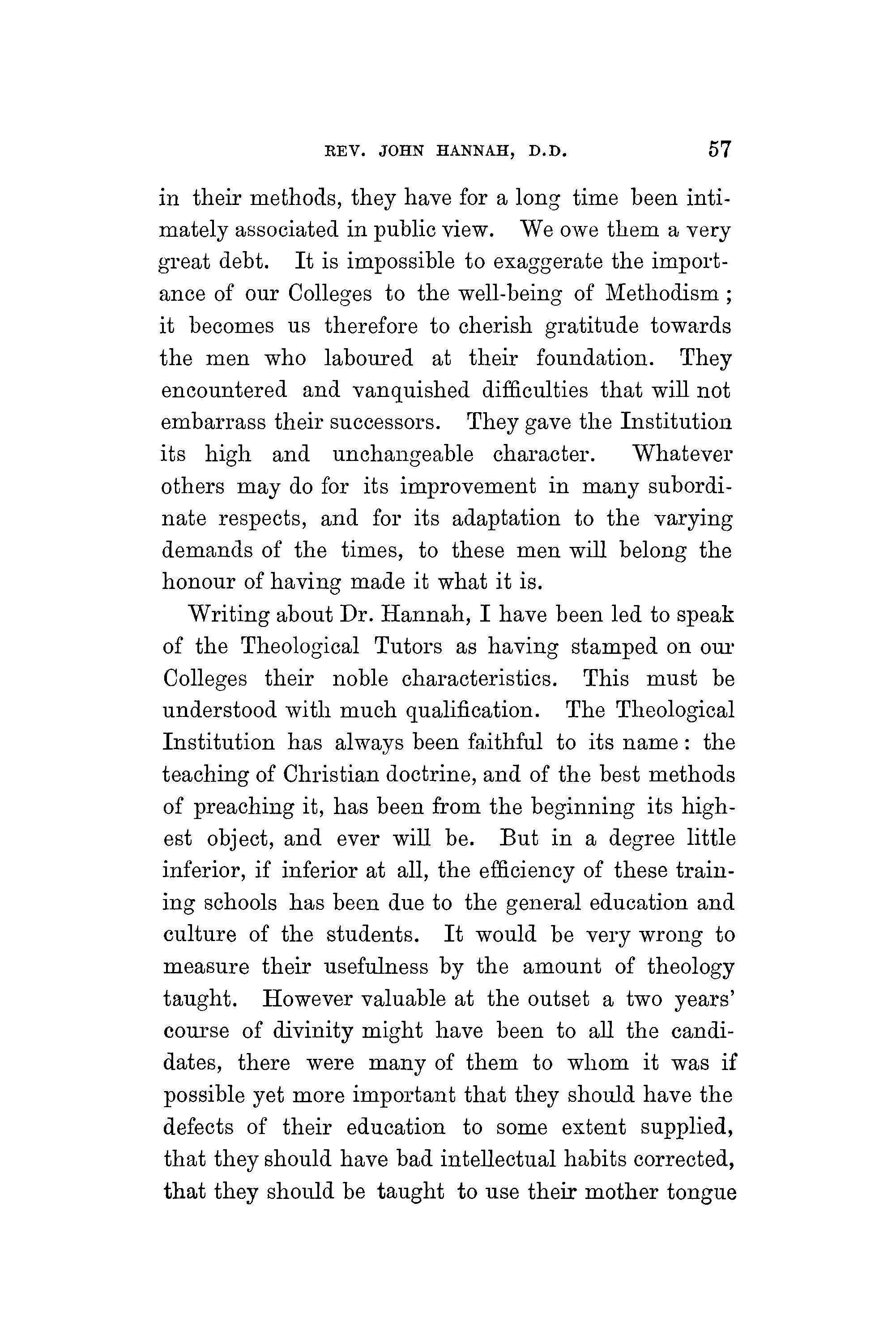
REV. JOHN HANNAH, D.D.
m their methods, they have for a long time been intimately associated in public view. We owe them a very great debt. It is impossible to exaggerate the importance of our Colleges to the well-being of Methodism ; it becomes us therefore to cherish gratitude towards the men who laboured at their foundation. They encountered and vanquished difficulties that will not embarrass their successors. They gave the Institution its high and unchangeable character. Whatever others may do for its improvement in many subordinate respects, and for its adaptation to the varying demands of the times, to these men will belong the honour of having made it what it is.
Writing about Dr. Hannah, I have been led to speak of the Theological Tutors as having stamped on our Colleges their noble characteristics. This must be understood with much qualification. The Theological Institution has always been faithful to its name: the teaching of Christian doctrine, and of the best methods of preaching it, has been from the beginning its highest object, and ever will be. But in a degree little inferior, if inferior at all, the efficiency of these training schools has been due to the general education and culture of the students. It would be very wrong to measure their usefulness by the amount of theology taught. However valuable at the outset a two years' course of divinity might have been to all the candidates, there were many of them to whom it was if possible yet more important that they should have the defects of their education to some extent supplied, that they should have bad intellectual habits corrected, that they should be taught to use their mother tongue

with propriety, that their eyes should be opened to the whole range of studies collateral to theology, that they should have the elements of the tongues imparted to them, and be taught to use their faculties in the acquisition of general knowledge. So long as the Methodist ministry is recruited from the ranks which now supply it, the Colleges of Methodism will owe the full half of their usefulness to their general training as distinguished from their theological.
This being true it still remains that the standard of theological truth maintained in them is of supreme importance. It would not be difficult to show that on this, more than on anything else, has depended and will hereafter depend the orthodoxy and purity of Methodism as a })ranch of the Christian Church. The theology, therefore, of the first professed Tutor, as derived from the fathers who preceded him and by him transmitted to so many sons in the Gospel, is matter of deep interest. Dr. Hannah gave the tone to our collegiate theology as a thoroughly Methodist theologian : that is to say, his entire system was pervaded by a Methodist tone and colouring. He was never an extensive reader ; but all his reading was guided by a regulative principle that declines any other name than that of Methodistic. It could not be called Catholic: for, though his mind delighted in the past, and his theology was faithful to the decisions of the first Councils, he held but little in common with the subsequent traditions of the Church; and with the catholicity that seeks out the truths common to the Eastern and Western and English Churches as a basis of union he had no sympathy. It was not the

REV. JOHN HANNAH, D.D.
Anglican principle : for, though his mind was much under the influence of the Church of England divines, their ecclesiastical tenets he did not hold, or their sacramental theory ; and their comprehensive latitudinarianism had nothing in him. It was not Puritanism: for, though he had a great admiration for some of the Puritan divines, their tone of theology was not in harmony with his mind, their prevalent Calvinism was repulsive to him; and their diffuseness of style, with its infinite fancies and conceits, was perhaps more offensive than it ought to have been to his taste. It was not Arminianism : for, though he was to the centre of his nature an Arminian in Mr. ·wesley's sense, he had nothing in common with the system into which Arminianism afterwards declined, and, moreover, his theology was not the negation of Calvinism, or a negation in any sense whatever. It was not an Eclectic principle that guided him: he was an eclectic in the best meaning of the word, as the founders of Methodism were; proving all things, holding fast that which is good; rejoicing in the sound elements and rejecting the unsound of every theological system from Cyprian and Augustine down to Episcopius and Jansen and Bengel ;-but an Eclectic, as the word is conventionally understood, he never was; his divinity was poured into one mould and only one. If a name must be found, it was the Methodistic type, which he himself has done more than any man to form.
Dr. Hannah's theological research, it has been observed, was not extensive. Many divines of his own communion have far surpassed him in this respect. But what he had read was thoroughly his

own; and what his theological culture lacked in breadth his theological power gained in concentration. On two or three central topics of divinity he spent all his strength ; and in the exposition and defence of these he had no superior. The Person of Christ; the Atonement; and the circle of the things which accompany salvation, from justification by faith to the consummation of holiness, were doctrines which from year to year he expounded with a sure precision. Some of his theological definitions are generally understood to be perfect: if that should prove to be true, it is needless to say that Dr. Hannah will by that evidence have approved himself in his own line-a sharply-limited one but of supreme importance-a high theologian. That his special studies in divinity were confined so much to the doctrines of grace and the exposition of Scripture, was to a great extent the result of his anxiety to be useful to his students in those departments which most concerned their future efficiency. For some years he literally read for them; and as they advanced he advanced. Hence in due time, courses of controversial theology, dealing with Calvinism, Romanism, and Rationalism, were added. But these branches were his necessity, not his delight. The strength of his mind and of his heart was always given to those themes in theology which are hard by the Cross and the throne of grace. By many of those who read these pages, Dr. Hannah will be remembered rather as a preacher than as a theologian. They will think that what has been said on this subject is not sufficient, dealing rather with the sermon-maker; and will expect some further reference
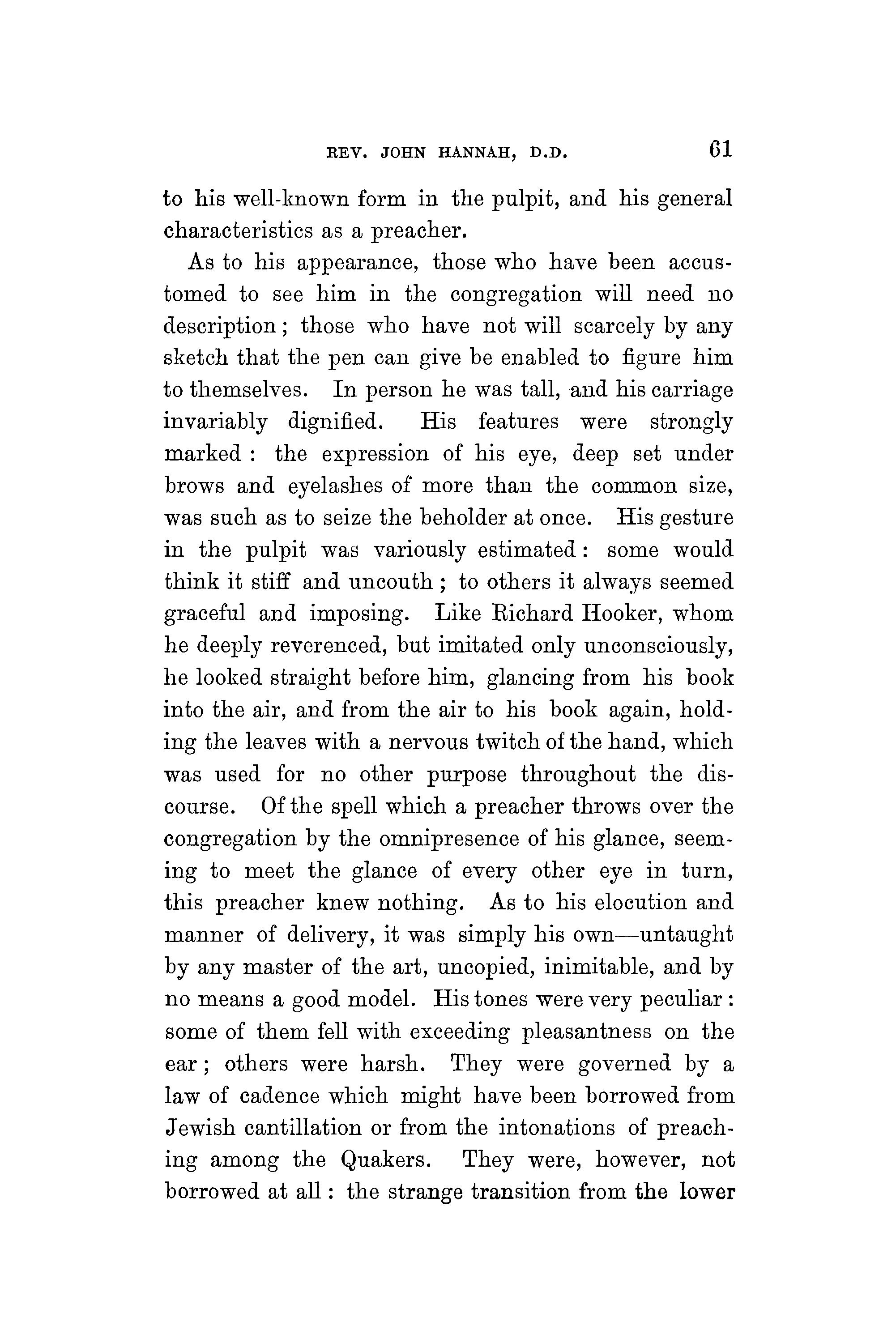
REV, JOHN HANNAH, D.D, 61
to his well-known form in the pulpit, and his general characteristics as a preacher.
As to his appearance, those who have been accustomed to see him in the congregation will need no description ; those who have not will scarcely by any sketch that the pen can give be enabled to figure him to themselves. In person he was tall, and his carriage invariably dignified. His features were strongly marked : the expression of his eye, deep set under brows and eyelashes of more than the common size, was such as to seize the beholder at once. His gesture in the pulpit was variously estimated : some would think it stiff and uncouth ; to others it always seemed graceful and imposing. Like Richard Hooker, whom he deeply reverenced, but imitated only unconsciously, he looked straight before him, glancing from his book into the air, and from the air to his book again, holding the leaves with a nervous twitch of the hand, which was used for no other purpose throughout the discourse. Of the spell which a preacher throws over the congregation by the omnipresence of his glance, seeming to meet the glance of every other eye in turn, this preacher knew nothing. As to his elocution and manner of delivery, it was simply his own-untaught by any master of the art, uncopied, inimitable, and by no means a good model. His tones were very peculiar : some of them fell with exceeding pleasantness on the ear ; others were harsh. They were governed by a law of cadence which might have been borrowed from Jewish cantillation or from the intonations of preaching among the Quakers. They were, however, not borrowed at all: the strange transition from the lower

to the upper notes, and conversely from the upper to the lower, without touching those intermediate, was his own early habit, acquired when no trainer iu elocution was at hand to correct it, never afterwards lost, and which, indeed, no one would have desired him to change. As to the quality of his sermons I have already said enough, and will add only a few words in this summary. The matter of them was the pure Gospel of Christ, which he found everywhere from Genesis to Revelation. The language he used in preaching was simple, chaste, and without much ornament ; not lighted up by any flashes of creative genius, on the one hand, and, on the other, not disfigured by any of those quaint, grotesque, and ill-considered sayings, which express the eccentricity or the irreverence or the bad taste of too many preachers. As to the effect of Dr. Hannah's preaching, that cannot be estimated by man : it was not like that of some of his honoured brethren, manifest and commanding observation everywhere. But his preaching produced in multitudes of hearts some of the purest effects. While he discoursed, the people felt the power of the Gospel and the reality of eternal things : most emphatically God made manifest the savour of the knowledge of Christ by Dr. Hannah's preaching, even though He did not in any demonstrative manner cause him to triumph in Christ. On the whole, and in the best sense of the word, he was a great preacher even among great preachers. The absence of some of the highest qualities may exclude him from the very first class, a very limited class indeed. But outside that he would be among the foremost.
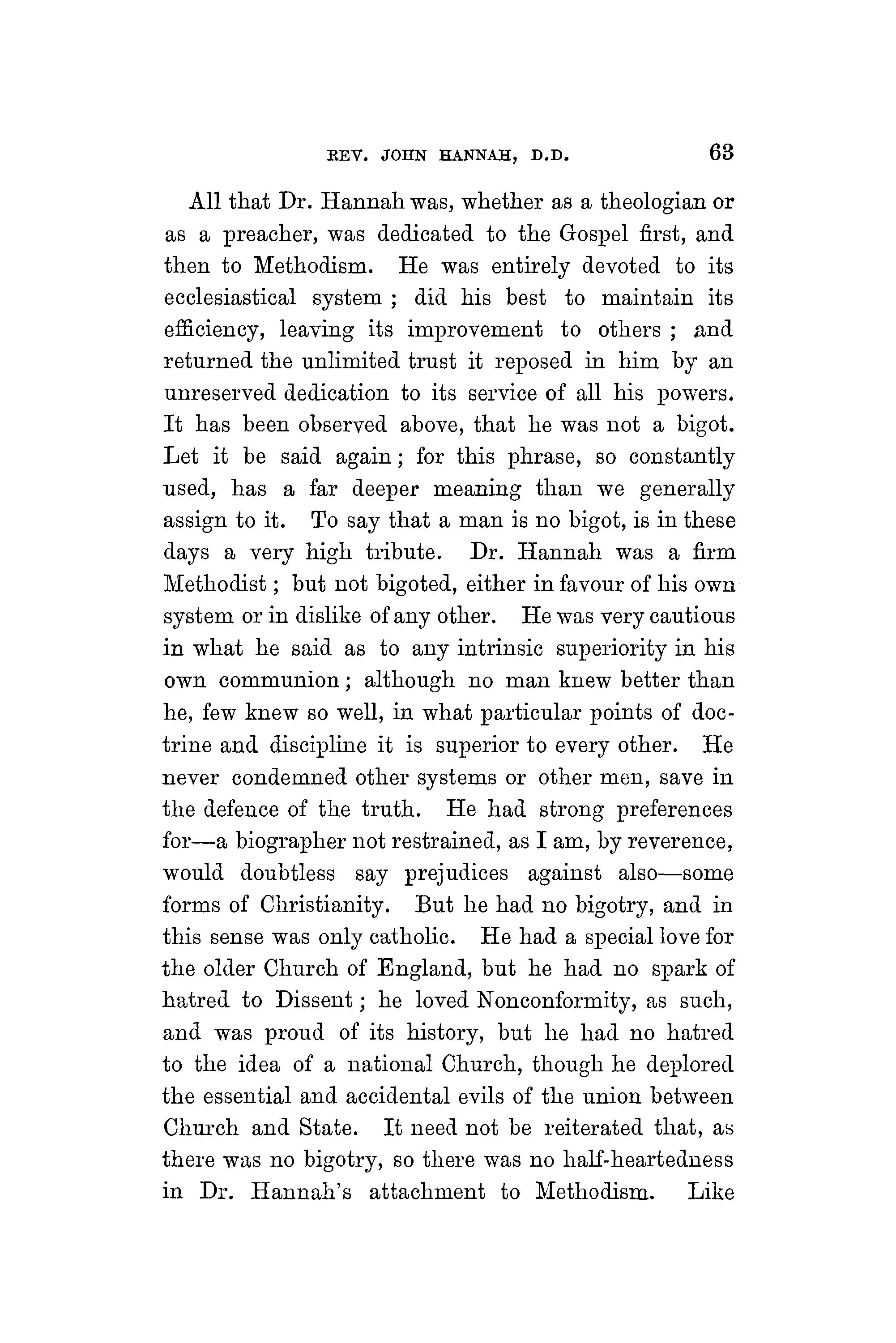
REV. JOHN HANNAH, D.D.
All that Dr. Hannah was, whether as a theologian or as a preacher, was dedicated to the Gospel :first, and then to Methodism. He was entirely devoted to its ecclesiastical system ; did his best to maintain its efficiency, leaving its improvement to others ; and returned the unlimited trust it reposed in him by an unreserved dedication to its service of all his powers. It has been observed above, that he was not a bigot. Let it be said again ; for this phrase, so constantly used, has a far deeper meaning than we generally assign to it. To say that a man is no bigot, is in these days a very high tribute. Dr. Hannah was a :firm Methodist ; but not bigoted, either in favour of his own system or in dislike of any other. He was very cautious in what he said as to any intrinsic superiority in his own communion; although no man knew better than he, few knew so well, in what particular points of doctrine and discipline it is superior to every other. He never condemned other systems or other men, save in the defence of the truth. He had strong preferences for-a biographer not restrained, as I am, by reverence, would doubtless say prejudices against also-some forms of Christianity. But he had no bigotry, and in this sense was only catholic. He had a special love for the older Church of England, but he had no spark of hatred to Dissent ; he loved Nonconformity, as such, and was proud of its history, but he had no hatred to the idea of a national Church, though he deplored the essential and accidental evils of the union between Church and State. It need not be reiterated that, as there was no bigotry, so there was no half-heartedness in Dr. Hannah's attachment to Methodism. Like
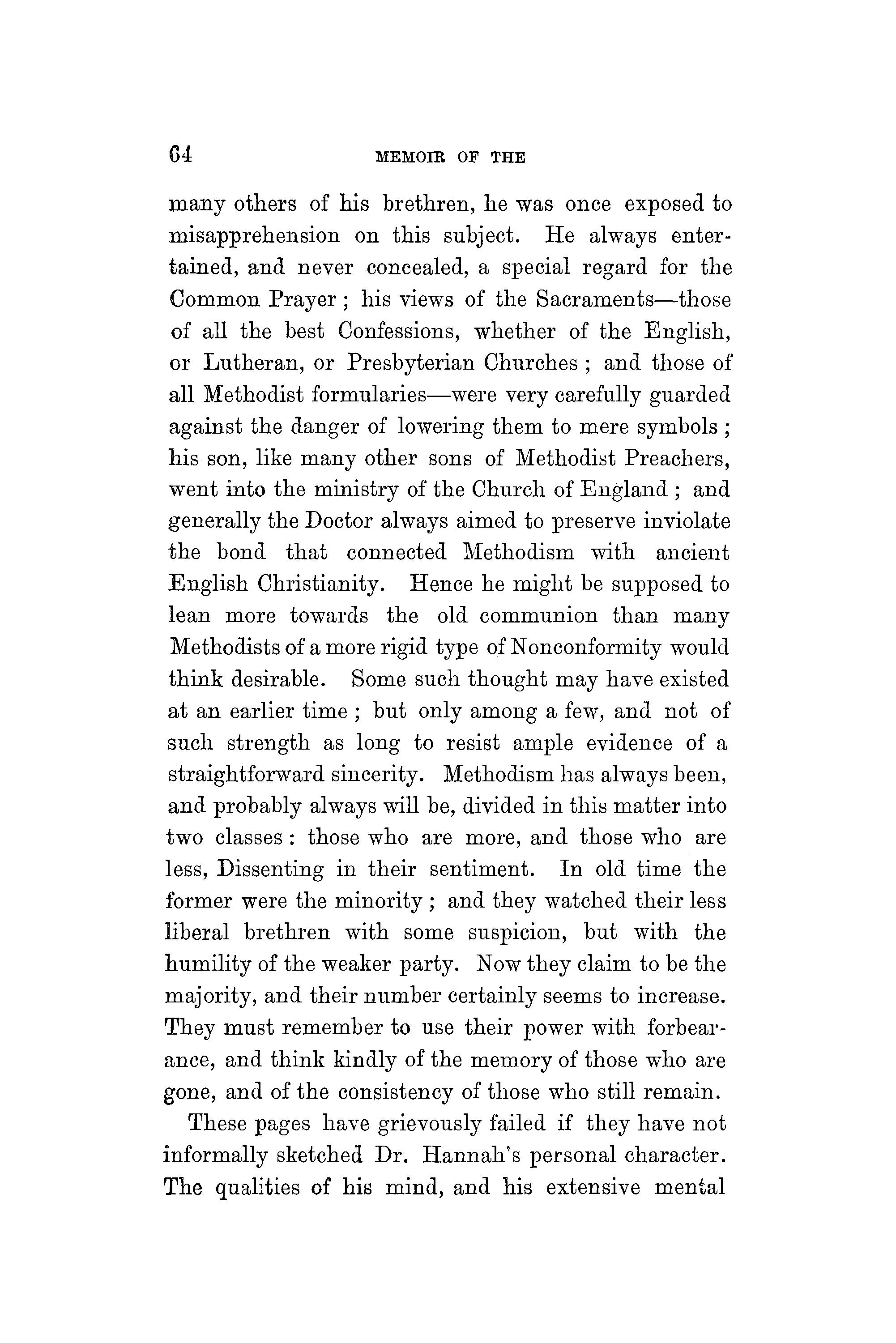
many others of his brethren, he was once exposed to misapprehension on this subject. He always entertained, and never concealed, a special regard for the Common Prayer ; his views of the Sacraments-those of all the best Confessions, whether of the English, or Lutheran, or Presbyterian Churches ; and those of all Methodist formularies-were very carefully guarded against the danger of lowering them to mere symbols ; his son, like many other sons of Methodist Preachers, went into the ministry of the Church of England ; and generally the Doctor always aimed to preserve inviolate the bond that connected Methodism with ancient English Christianity. Hence he might be supposed to lean more towards the old communion than many Methodists of a more rigid type of Nonconformity would think desirable. Some such thought may have existed at an earlier time ; but only among a few, and not of such strength as long to resist ample evidence of a straightforward sincerity. Methodism has always been, and probably always will be, divided in this matter into two classes : those who are more, and those who are less, Dissenting in their sentiment. In old time the former were the minority ; and they watched their less liberal brethren with some suspicion, but with the humility of the weaker party. Now they claim to be the majority, and their number certainly seems to increase. They must remember to use their power with forbearance, and think kindly of the memory of those who are gone, and of the consistency of those who still remain. These pages have grievously failed if they have not informally sketched Dr. Hannah's personal character. The qualities of his mind, and his extensive mental

REV, JOHN HANNAH, D.D.
furniture, and his intellectual habits, have certainly been exhibited with sufficient fulness. I cannot add that they may be better gathered from his works. Dr. Hannah published very little. He never had much ambition for literary eminence ; scarcely enough indeed to give a generous stimulant to the mental faculties. He was also exceedingly fastidious in style; and spent more pains upon the composition, writing, punctuation, and other graces of finish than are generally consistent with extensive result. It was his intention to give the whole course of his Lectures to the world. But, while he was pondering this year after year, the foundations of systematic theology were shifting ; Christian Evidences were undergoing what amounted to a revolution ; Biblical Criticism was beginning afresh; and the Introduction to the Bible was almost re-written. It was impossible to any but a very agile as well as learned writer on theology to keep pace at all points; and so it was that the projected revision was not begun until the end of life. The present volume contains the doctrinal portion of the course as it was left by the author ; only the earlier Lectures having been re-written. Besides what is here given to the public, Dr. Hannah has left other valuable contributions to theology. Dr. Osborn's very useful "Record of Methodist Literature" will indicate them to the reader; but the principles on which that laborious bibliography is compiled shut out the best of the Doctor's writings, such as his sermon on " Wrestling Jacob " in the Magazine, and other sermons, monographs, and essays in the same periodical. The head of every man is Christ ; and the perfection
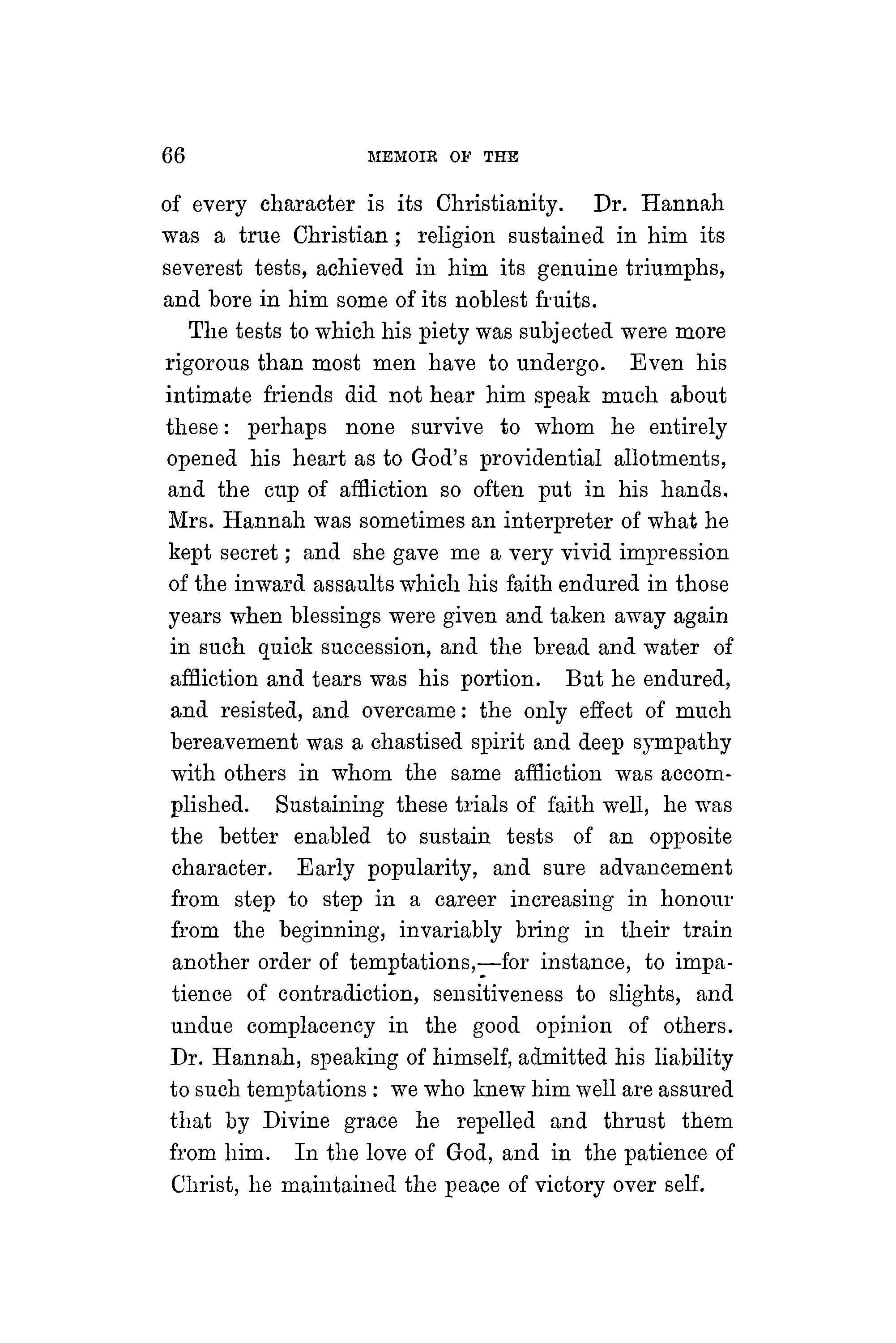
of every character is its Christianity. Dr. Hannah was a true Christian ; religion sustained in him its severest tests, achieved in him its genuine triumphs, and bore in him some of its noblest fruits. The tests to which his piety was subjected were more rigorous than most men have to undergo. Even his intimate friends did not hear him speak much about these: perhaps none survive to whom he entirely opened his heart as to God's providential allotments, and the cup of affliction so often put in his hands. Mrs. Hannah was sometimes an interpreter of what he kept secret; and she gave me a very vivid impression of the inward assaults which his faith endured in those years when blessings were given and taken away again in such quick succession, and the bread and water of affliction and tears was his portion. But he endured, and resisted, and overcame : the only effect of much bereavement was a chastised spirit and deep sympathy with others in whom the same affliction was accomplished. Sustaining these trials of faith well, he was the better enabled to sustain tests of an opposite character. Early popularity, and sure advancement from step to step in a career increasing in honour from the beginning, invariably bring in their train another order of temptations,:-for instance, to impatience of contradiction, sensitiveness to slights, and undue complacency in the good opinion of others. Dr. Hannah, speaking of himself, admitted his liability to such tempta,tions : we who knew him well are assured that by Divine grace he repelled and thrust them from him. In the love of God, and in the patience of Christ, he maintained the peace of victory over self.

REV, JOHN HA.N,NAH, D.D.
Dr. Hannah's religious character was "known and read of all men " with whom he hacl to do. The secret of its force and consistency was the habit of private meditation and prayer. As he threw a veil generally over his interior life, it becomes us to respect his reserve; and speak only of that which coulcl not be hid,-the shining of his inward devotion through his countenance ancl conversation and life. It was manifest to all near observers that he was striving after Christian perfection ; and that he allowed none of the infirmities to which in common with all he was liable, and none of those which might have been his own besetments, to overcome him. Natmally high-minded, and vehement in his anger against what his mind condemned, he was by grace humble, reacly to forgive, and prompt to seek forgiveness. He awakened love towards himself in every one with whom he had to do ; and that, not only by a courteous and gracious demeanour, but also by a beautiful readiness to share with others whatever he had. He was always devising or doing good.
There was much in Dr. Hannah's character that suggested a parallel with St. John. Dr. Jobson only fell in with a common sentiment when he preached his funeral sermon from the text, " The disciple whom Jesus loved." Not to say over again what has been there so well said, I would follow out the hint of the sermon. Our venerable Doctor had drunk deeply of the spirit of the Evangelist : of the spirit of his doctrine, and of the spirit of his devotion. Like St. John, he delighted to contemplate the wonderful Person of Christ: beholding in that Object an ever-deepening
2

mystery, and receiving from the contemplation an ever-increasing joy. Like St. John, also, he never separated the Person of Christ from His atonement ; but dwelt constantly on Him who came by water and by blood, and contended earnestly against those who make the glory of the Incarna.tion eclipse the glory of the Cross. Dr. Hannah's old students will bear record that on no subject was his teaching more full and clear and impassioned than on the mysterious union of our Lord's two natures; and that no errors were more keenly laid bare, and more vehemently assailed, than those which have tended, whether in ancient or in modern times, to obscure the truth of Scripture on this doctrine. Like St. John, he was most vehement in his protests against every form of antichrist: when error was to be denounced,-undeniable error, that is, whether greater or less,-his denunciations were anything but sentimental, showing that with all his sanctity he was a son of thunder still. He felt the Evangelist's anxiety also to keep faith and good works in close alliance : the cleansing from all sin in strict conjunction with the remission of guilt ; a sanctified life in harmony with a justified relation. Dr. Hannah had caught also the spirit of St. John's devotion, which blended masculine energy with feminine intensity and childlike simplicity. Love was the bond of all the excellencies that were in him ; and the spring of all the good deeds of his life. But it was not the love which is of the heart only, and dwells amidst the sensibilities of our nature. It was the love which through the will governs the mind and soul a,ll(l life, and makes the whole a sacrifice to God in

REV. JOHN HANNAH, D.D.
return for the love wherewith He loved us. Whatever love can accomplish for the maturity of the Christian character was found in him before he left us: while he was in a certain sense perfected, like his Master, through suffering, he was perfected in a still deeper sense,-in the love whereby he dwelt in God, and God in him. His whole life was a sacrifice, finished and accepted in death.
But, much as he was like the Evangelist, it is not in the words of St. John that I take leave of my venerable Tutor. His own elect watchword was borrowed from St. Paul : and with it I close, invoking GRACE,MERCY,ANDPEACEupon all who love Dr. Hannah's memory and copy his example.

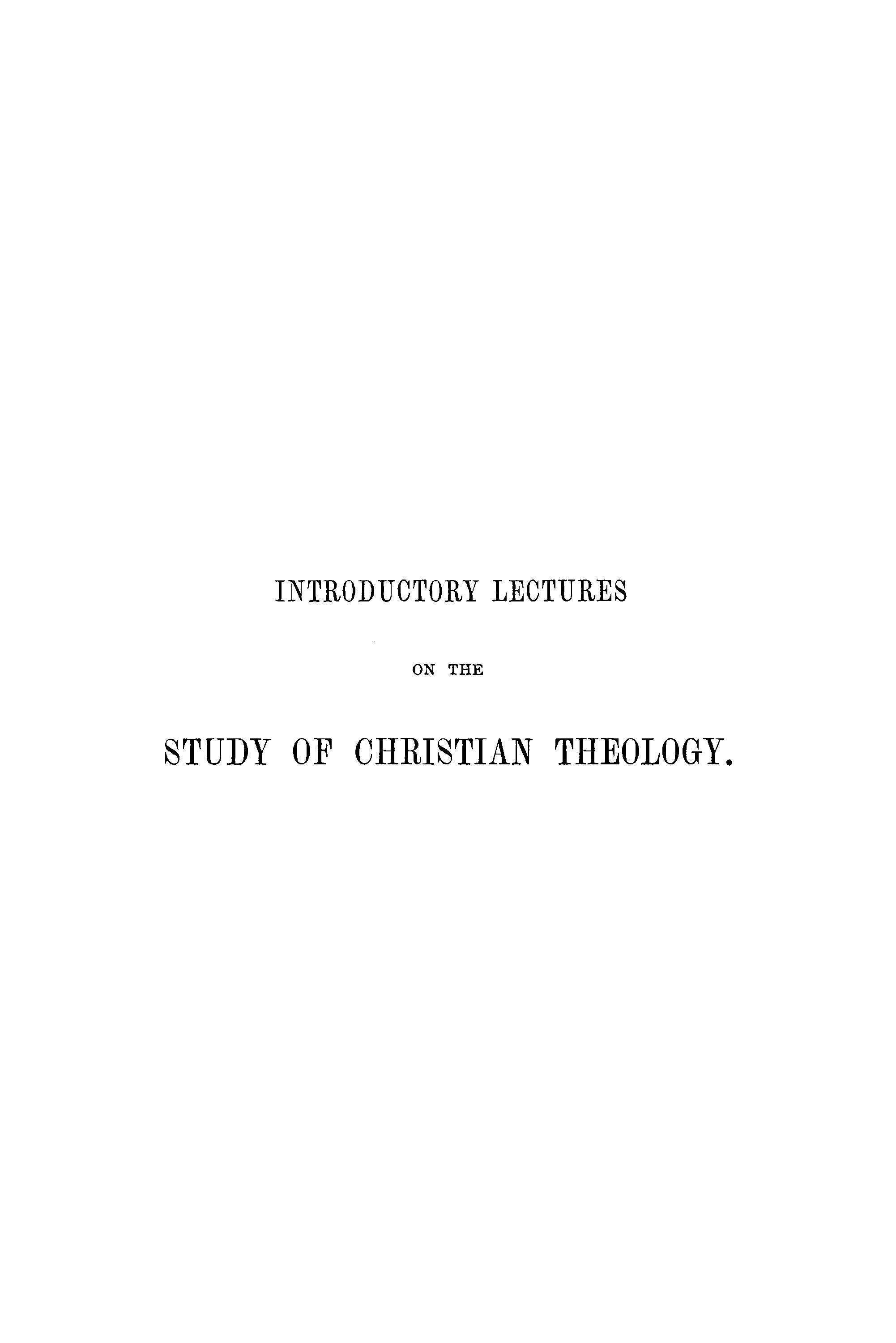

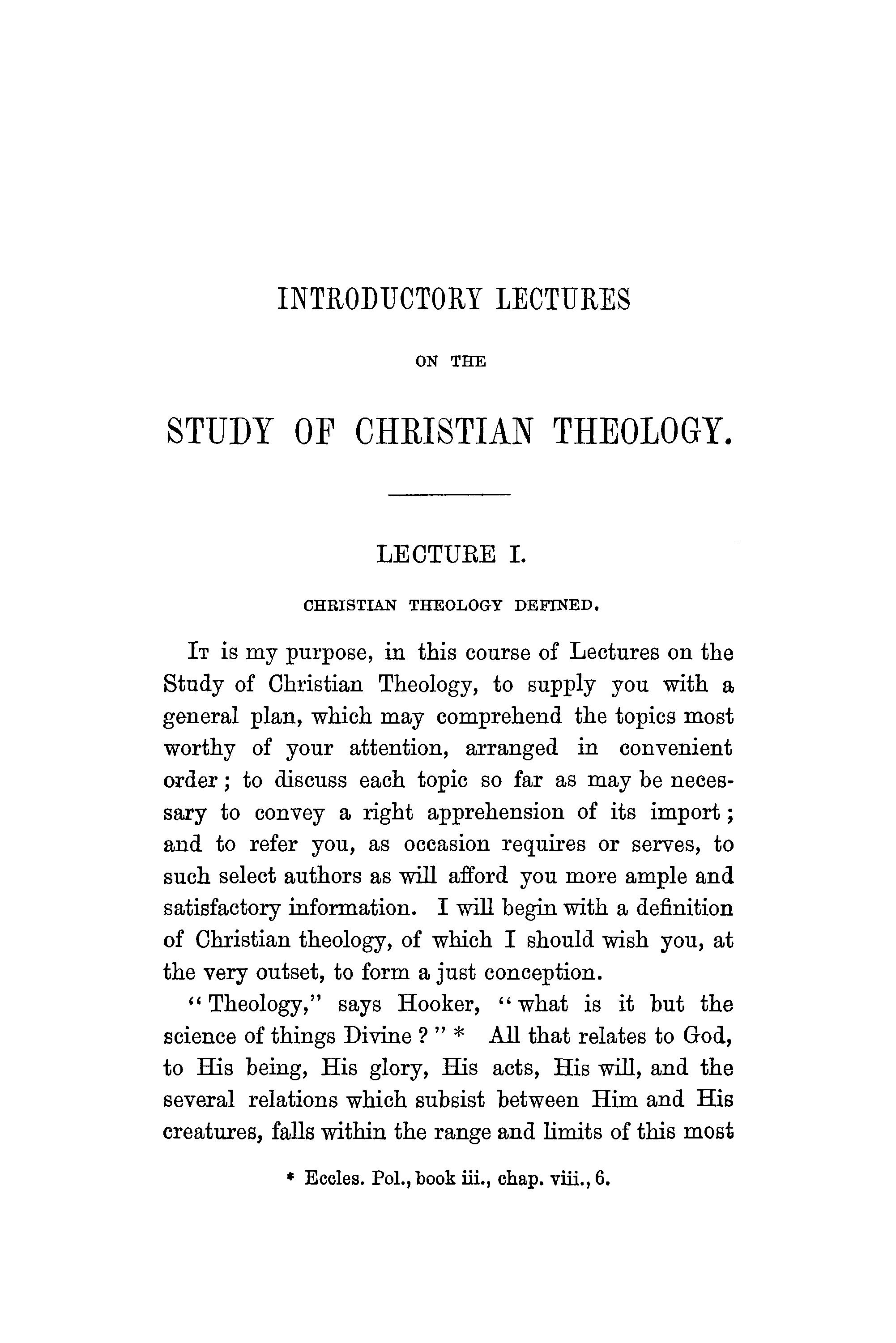
IT is my purpose, in this course of Lectures on the Study of Christian Theology, to supply you with a general plan, which may comprehend the topics most worthy of your attention, arranged in convenient order ; to discuss each topic so far as may be necessary to convey a right apprehension of its import ; and to refer you, as occasion requires or serves, to such select authors as will afford you more ample and satisfactory information. I will begin with a definition of Christian theology, of which I should wish you, at the very outset, to form a just conception. "Theology," says Hooker, "what is it but the science of things Divine ? " * All that relates to God, to His being, His glory, His acts, His will, and the several relations which subsist between Him and His creatures, falls within the range and limits of this most
• Eccles. Pol., book iii., chap. viii., 6.

INTRODUCTORYLECTURES
important province of human inquiry. God, then, 1s the theme of all true theology ; and He is likewise its sole Author. Its light emanates from Him, from Him alone; and it can be effectually imparted to us only by that "inspiration" of His which "giveth understanding."* "In Thy light," says the Psalmist, " shall we see light." t
Our writers usually divide theology into two parts, NATURALand REVEALED,-adivision to which I shall adhere in the present investigation.
I. NATURALTHEOLOGY is the science of things Divine, as that science is unfolded in the great system of nature, or creation.
1. Consider the sources of natural theology. They are two :-the outward and visible works of God, which are plentifully scattered above, around, and beneath us, and which continually declare His power, wisdom, and goodness ; t and the inward and invisible spirit of man, which was originally created in the Divine image, and which, though now so deeply fallen-; still yields many significant testimonies for God.§ Natural theology, then, is nearly allied to the two chief branches of philosophy,-the philosophy of external nature and the philosophy of mind.
2. Mark too the uses of natural theology. These may perhaJ?S be summed up in three points :-Natural theology teaches the existence, the pmjection, and the general claims of " the everlasting God, the LoRD, the
* Job xxxii. 8. t Psalm xxxvi. 9.
t See Psalm xix. 1-6; Isai. xl. 26; Rom. i. 20. See also Wisdom of Solomon xiii. 5.
§ Compare Job xxu. 11; Psalm xciv. 10; Rom. ii. 15.
Creator of the ends of the earth." * Who that explores the works of creation, as they rise before us in matter and in mind, in external forms and spiritual endowments, can doubt that He who made them all exists in the very fulness of being, that He is invested with infinite perfection, and that He has the highest claims on every rank and order of His creatures? They who are taught "that which may be known of God" from " the things that are made," even though it should be only, or chiefly, from these, are "without excuse," if, " when they " thus " know God, they glorify Him not as God, neither are thankful." t But on the subject of natural theology generally, and more particularly on the uses to which it may be applied, I refer you to an able and well-known work, not yet superseded, Dr. Paley's "Natural Theology; or, Evidences of the Existence and Attributes of the Deity, collected from the Appearances of Nature."
8. Attend yet further to the defects of natural theology, viewed as a scheme of truth and guidance to man. These cannot fail to be sufficiently obvious to the thoughtful inquirer. Man indeed was never left, not even in his primitive and unfallen state, to the sole tuition of natural theology ; for he then also heard the voice of God. t But in his present state of sin and degradation, what can natural theology, alone and of itself, avail p.im? Natural theology does not explain our fallen condition ; it does not open to us the mysteries of redemption and of faith; it does not, it cannot, answer that momentous question of awakened
* Isai. xl. 28.

t Rom. i. 19-21.
t Compare Gen. ii. 16, 17 ; iii. 8.

INTRODUCTORYLECTURES
man, " What must I do to be saved ! " * Go to every sun that shines, and every star that glitters ; to every mountain that rises, and every valley that sweeps ; to every forest that waves, and every ocean that rolls: go to nature in all its beauty and magnificence ; listen to its testimonies; what does it declare concerning the way of man's recovery? Its voices are silent; they give no response to man that is a sinner.
II.
is the science of things Divine which the Most High God has conveyed, over and above what has been already named, by extraordinary and authentic communication, discovery, or revelation. Any manifestation indeed which He is pleased to make of Himself and His will, may, with perfect accuracy, be styled a revelation. The term may, therefore, be applied to the instruction which is suggested by His works, as well as to that which is contained in His word. Revelation is confined, however, in the customary dialect of theologians, to the discoveries which He has made by means of His word. 1. These were at first traditionary ; and so they continued to be for several ages. Early in the history of the world, men received communications from God by direct intercourse, and they passed these to their descendants by oral transmission. You find references to this in the more ancient parts of Scripture, the force of which will scarcely be perceived, if this circumstance be disregarded. " For inquire, I pray thee, of the farmer age," says Bildad the Shuhite, " and prepare thyself to the search of their fathers."+ "I will show thee," says Eliphaz the Temanite, " hear me ; and that * Acts xvi, 30. t Job viii. 8.

which I have seen I will declare; which wise men have told from, their fathers, and have not hid it."* "Ask now," says Moses, "of the days that are past:" ...... '' Rerne11iberthe days of old, consider the years of many generations: ask thy father, ancl he will show thee; thy elders, and they il'ill tell thee." t But, in process of time, these traditionary revelations became awfully obscured, perverted, and misapplied. " Consider but only that little of things Divine, which the heathen have in such sort received, ...... so intermingled with fabulous vanities, that the most which remaineth in them to be seen is the show of dark and obscure steps, where some part of the truth hath gone." t
2. These discoveries of truth were afterwards committed to writing, and augmented in the course of ages. It is with revelation as thus written and completed by the manifold accessions and enlargements which God has been pleased to grant, that we have now to do. Written revelation in its gift and progress, from the time of its earliest records to the time when the canon of Scripture was closed, may be traced in the several economies or dispensations of religion which God has bestowed on mankind,-the Patriarchal, the :Mosaic, and the Christian.
Patriarchal theology, as conveyed in written revelation, comprises the great principles of natural theology, and of that revealed theology which was at first the subject of oral and traditionary communication, while it also imparts new and stupendous discoveries. Patriarchal theology is contained in those inestimable
* Job xv. 17, 18. t Deut. iv. 32 ; xxxii. 7.
t Hooker, Eccles. Pol., book i., chap. xiii., 2, text and notP.

monuments of inspiration, which have drawn the attention of earnest men at all times, and perhaps never more than now,-the Book of Genesis and the Book of Job. Seeds of truth are here, which spring up in a rich harvest as revelation advances.
Mosaic theology embodies the patriarchal, and more fully discloses the plan of man's redemption, in harmony with all the truth of God. It is, in fact, the directly preparatory and introductory form of Christianity itself, and is found at large in the several Books of the Old-Testament Scriptures,-historical, doctrinal, devotional, prophetic, practical,-in addition to the Books of Genesis and Job. Never forget that these Scriptures are " they which testify of Jesus ; " * and, in particular, that "the testimony of Jesus is the spirit of prophecy." t
Christian theology is that great form of truth in which the entire system of Divine communications rises before us in all its beauty, fulness, and grandeur. Christian theology consummates and perfects the Patriarchal and Mosaic, and is presented to us, in its mature and finished form, in the Scriptures of the New Testament. Regarding man as fallen and sinful, it teaches him the knowledge of God and of things Divine which is inseparably blended with the incarnation, acts, sufferings, triumphs, and manifestations of His own Son. " The light of the glorious Gospel of Christ, who is the image of God," hath shined unto us. " For God, who commanded the light to shine out of darkness," when, "darkness" being "upon the face of the deep," He " said, Let there be light ; and there was * John v. 39. t Rev. xix. 10.

THE STUDY OF CHRISTIAN
79 light," "hath shined in our hearts, to give "-what we could not possibly receive from nature, or, in the same degree, from any previous revelation-'' the light of the knowledge of the glory of God in the face of Jesus Christ.''*
Christian theology, then, collects, combines, and completes all the revelations of God to man. It is the science of salvation, which teaches the knowledge of God in Christ Jesus our Lord : it is the splendour of that "perfect day," t to which the "shining light" of former dispensations gradually conducted the inquirers of successive ages. "Father," said our Lord, when He hastened to finish and seal the system of His everlasting truth by His death and resurrection, " the hour is come ; glorify Thy Son, that Thy Son also may glorify Thee : as Thou hast given Him power over all flesh, that He should give eternal life to as many as Thou hast given Him. And this is life eternal," the life eternal mentioned in the verse next preceding, " that they might know Thee the only true God, and," in order to this, as the only way to this, intimately one with this, "Jesus Christ, whom Thou hast sent." t
" God," who created all that is, and "who at sundry times and in divers manners spake in time past unto the fathers by the prophets, hath in these last days spoken unto us by His Son." The same God utters His voice in all the oracles of Scripture. It is He who spake in tinie past; it is He who hath spoken
* 2 Cor. iv. 4, 6: compare with Gen. i. 2, 3. t Prov. iv. 18. + John xvii. 1-3. Observe the force of the article in the first clause of verse 3 : Afin1 oi e,nw 71aldwios (w1J.

in these last days: it is He who spake to the fathers; it is He that hath spoken to us: it is He who spake by the prophets; it is He who hath spoken by His Son: it is He who spake at sundry times and in divers manners, or, perhaps, in many parts and many ways; and it is He who hath spoken by His Son in the pe1fection and simplicity of His truth,-for these seem to be implied in the antithesis pursued.* " Therefore we ought to give the more earnest heed to the things which we have heard." t Three teachers, the three prime teachers of the world, once met on the holy mount: JJioses, by whom, under God, the Law was given; Elias, by whom it was revived and maintained in a most degenerate age ; and Jesus, by and in whom it is fulfilled. They all "appeared in glory," and the subject of their mutual conference was also and in reality glorious :-for they "spake of His decease, which He should accomplish at Jerusalem." But Moses and Elias " departed from Jesus," -in a bright cloud indeed, yet they departed :-" and there came a voice, saying, This is My beloved Son: hear Him. And when the voice was past, Jesus was found alone." t To this Supreme Teacher, then, let us steadfastly adhere ; and, sitting with Mary at His feet, deyoutly "hear His word." So shall we too choose "that good part, which shall not be taken away from" us,§ and shall gratefully confess that "even that which was made glorious had no glory in this respect, by reason of the glory that excelleth." II
* Heb. i. 1-3. Weigh the meaning of the first words used in this passage: 7r0A.Vµ£:pwsKal 1ro'A.vrp&m,,s.
t Heb. ii. 1. i Luke ix. 28-36. § Luke x. 39-42. 11 2 Cor. iii. 10.

THE STUDY OF CHRISTIAN THEOLOGY RECOMMENDED.
WHEN Christian theology is defined, the study of it may justly be said to be recommended ; for it possesses, in its own nature, the strongest claims upon our attention. As I deem it, however, of the utmost consequence that you should cultivate an habitual and ardent desire for the attainments which it offers to your acceptance, I subjoin a few particular motives, with a design to encourage your diligent application to its several topics. These motives shall be especially adapted to your circumstances and prospects as candidates for the Christian ministry.
I. One of them flows from the consideration that to Christian Theology, its study, its exposition, and its propagation, you have deliberately consecrated, or offered to consecrate, your lives, under a professed conviction that "a dispensation is committed unto" you by God the Holy Spirit, that " necessity is " thus " laid upon " you, and that " woe is unto " you, if you '' preach not the Gospel.'' * This, then, is your calling, your high and sacred calling. And ought you not, with all possible assiduity, to seek the qualifications which may, by God's blessing, prepare you for the successful discharge of its duties? Particularly, ought you not first to learn what it is to be
* See 1 Cor. ix. 16, 17.

the business of your lives to teach ? Persons who addict themselves to the sciences, professions, and arts of the present life, are commended for setting a right value on their respective pursuits, and for engaging in them with unweariable industry. Yet, if there be reality in things, how far does your case differ from theirs ? They toil for the body, you for the soul; they for time, you for eternity. They follow their own inclinations, the choice of their friends, or, at most, the wise administrations of Divine Providence, which so marvellously direct and regulate the affairs of men; you profess to have received a special vocation from the Spirit of all grace. Is it right, is it in any degree excusable, that you should be less diligent than they?
II. A second motive may be drawn from the transcendent sublimity and irnportance of the subjects which Christian Theology embraces. They exhibit the loftiest themes on which the human mind can dwell,-themes compared with which all others, how much soever they may be esteemed and pursued, sink into utter insignificance. They enlarge and raise our thoughts, stretch them beyond the limits of sense and time, and make them familiar with infinity and eternity. Other sciences are laudably recommended, as tending at once to expand and strengthen the powers of the human intellect ; and they are accordingly pressed into the service of sound mental training. The science of numbers, for example, forms its appropriate scale, prosecutes its regular and interminable calculations, and presents conclusions and amounts which the mind fails to grasp in its utmost range of thought :
the science of quantity also, of which geometry is a principal part, traces the lines and figures of the universe, conducts us from truth to truth by a process the most exact and clear, and forms us to habits of patient investigation and ab.straction. But what are even these in comparison of that sacred science which teaches us to contemplate Him, of whose " understanding there is no number, no searching,"* who fills immensity with His presence, and eternity with His being, who "doeth great things and unsearchable; marvellous things without number." t
III. A third motive is suggested by the deep ancl general interest which marks all the topics of Christian Thoology. They address man, universal man, as fallen ; they disclose to him the ample provisions of redemption and grace ; they offer to his faith the inestimable blessings of pardon, renovation, and peace; and they strive, by invitations the most free, by appeals the mOBt persuasive, and by an agency the most benign, to recover him to his forsaken and neglected, but yet merciful God. Remember that, like the angel who announced our Saviour's birth, every Christian teacher brings "good tidings of great joy, which shall be to all people," t and that his charge is to proclaim. them wherever his voice or his instrumentality can reach. Well may he too, in reference to all the sacred truths which he advances, adopt the words of Moses to the assembled tribes of Israel : " Set
* Psalm cx.Ivii. 5: "His understanding is infinite." Literally, as in the margin, "Of His understanding there is no number." See also Isaiah xl. 28.
t Job v. 9.

t Luke ii. 10.
ON
your hearts unto all the words which I testify among you this day, which ye shall command your children to observe to do, all the words of this law. For it is not a vain thing for you; because it is your life."*
IV. The fourth motive which I shall mention arises from the immensepractical utility of a familiar acquaintance with these subjects in all tho provinces of ministerial service, as confided to you in your future course. When you "preach the word," t when you engage in the pastoral duties which you will owe to the Societies, meeting them apart from the congregations, and conversing personally and individually with them during the quarterly visitations, and when you are called to attend upon the sick, the poor, the aged, the perplexed, what an advantage will you find it to have a thorough intimacy with the doctrinal, experimental, and practical parts of the Christian Scriptures, to be richly imbued with their spirit, and to know how to apply them on every occasion with promptitude and skill, " to speak a word in season " t according to the demands and exigencies of each case! "The priest's lips should keep knowledge, and they should seek the law at his mouth : for he is the messenger of the Lord of hosts." § "Who " indeed " is sufficient for these things ? " He whose " sufficiency is of God." II Yet here also "the soul of the diligent shall be made fat."
V. But, as a fifth motive, I would urge the great benefit
* Deut. xxxii. 46, 47.
t Isai. I. 4.
11 2 Cor, ii. 16; iii. 5.

t 2 Tim. iv. 2.
§ Mal. ii. 7. Prov. xiii. 4.
which may accrue to yourselves from the prosecution of these studies. While others employ their thoughts and cares on things which "perish with the using,"* it is your privilege to attend without distraction to themes which are the very food of our immortal spirits. I know that you are here exposed to a peculiar danger. Some complain that they have not leisure to pay a due regard, for themselves, to " the things which belong unto " their " peace : "t you may be inadvertently led to regard them as matters of merely professional service, not for yourselves, but for others only. Let me affectionately exhort you to guard, with jealous caution and vigilance, against this serious error. Study Divine truth first for yourselves ; and then " out of the abundance of the heart," t and not simply of the mind or memory, you will declare it to others. Apply it, with all possible fidelity, to your own state. Use your various preparations as helps to personal improvement and devotion ; and thus, instead of treating the study of Scriptural Theology as a dry, official task, you will make it your recreation and delight, while it strikes its tincture, and diffuses its savour, through all your tempers, words, and works.
VI. As a last motive on this occasion, allow me to remind you of your especial responsibility to God. You are stewards of the great Proprietor. He supplies you with your stock, whatever it may be ; He gives you opportunities to use and improve it ; and He says to every one of you, " Occupy till I come." § Is it our
• Col. ii. 22. i Matt. xii. 34 ; Luke vi. 45.

t Luke xix. 42. § Luke xix. 13.
expectation that " a man " shall " so account of us, as of the ministers of Christ, and stewards of the mysteries of God ? " Let us at the same time remember that " it is required in stewards, that a man be found faithful."* "As every man," then, "hath received the gift,"-and if we have in any measure received it, we ought by all means to seek an increase ofit,-'' even so minister the same one to another, as good stewards of the manifold grace of God. If any man speak, let him speak as the oracles of God; if any man minisoor, let him do it as of the ability which God giveth: that God in all things may be glorified through Jesus Christ, to whom be praise and dominion for ever and ever. Amen." t
" Give attendance," then, " to reading, to exhortation, to doctrine. Neglect not the gift that is in thee .... Meditate upon these things ; give thyself wholly to them; that thy profiting may appear to all. Take heed unto thyself, and unto the doctrine ; continue in them : for in doing this thou shalt both save thyself, and them that hear thee." t
* 1 Cor. iv. 1, 2.

t 1 Peter iv. 10, 11. t 1 Tim. iv. 13-16.
THE SPIRIT, OR TEMPER, IN WHICH CHRISTIAN THEOLOGY
OUGHT TO BE STUDIED,
FEELING the importance, as I trust we do, of paying a sedulous attention to the study of Christian Theology, we are next to examine with a design to cultivate the proper spirit, or temper, in which that study claims to be prosecuted. " Take heed," says our Lord, "how ye hear."* On this topic, I would strenuously press Solomon's admonition, "Keep thy heart with all diligence," or, according to the literal and emphatic rendering of the margin, " above all keeping ; " "for out of it are the issues of life." t Let us beware lest, like U zzah, we " put forth " a rash and unhallowed hand " to the ark of God," even though we should suppose, as he seems to have done, that the ark is in danger, and needs our support. t
Pursuant to the object which I now contemplate, I purpose to enumerate some of the tempers, disposi. tions, or habits, which constitute the spirit, or character, of which I speak. Practical lessons need no apology. When these are concerned, " a wise man will hear, and will increase learning; and a man of understanding shall attain unto wise counsels." § I. One of these tempers is sincerity. By sincerity,
* Lukeviii. ts, t 2 Sam. vi. 6, 7.
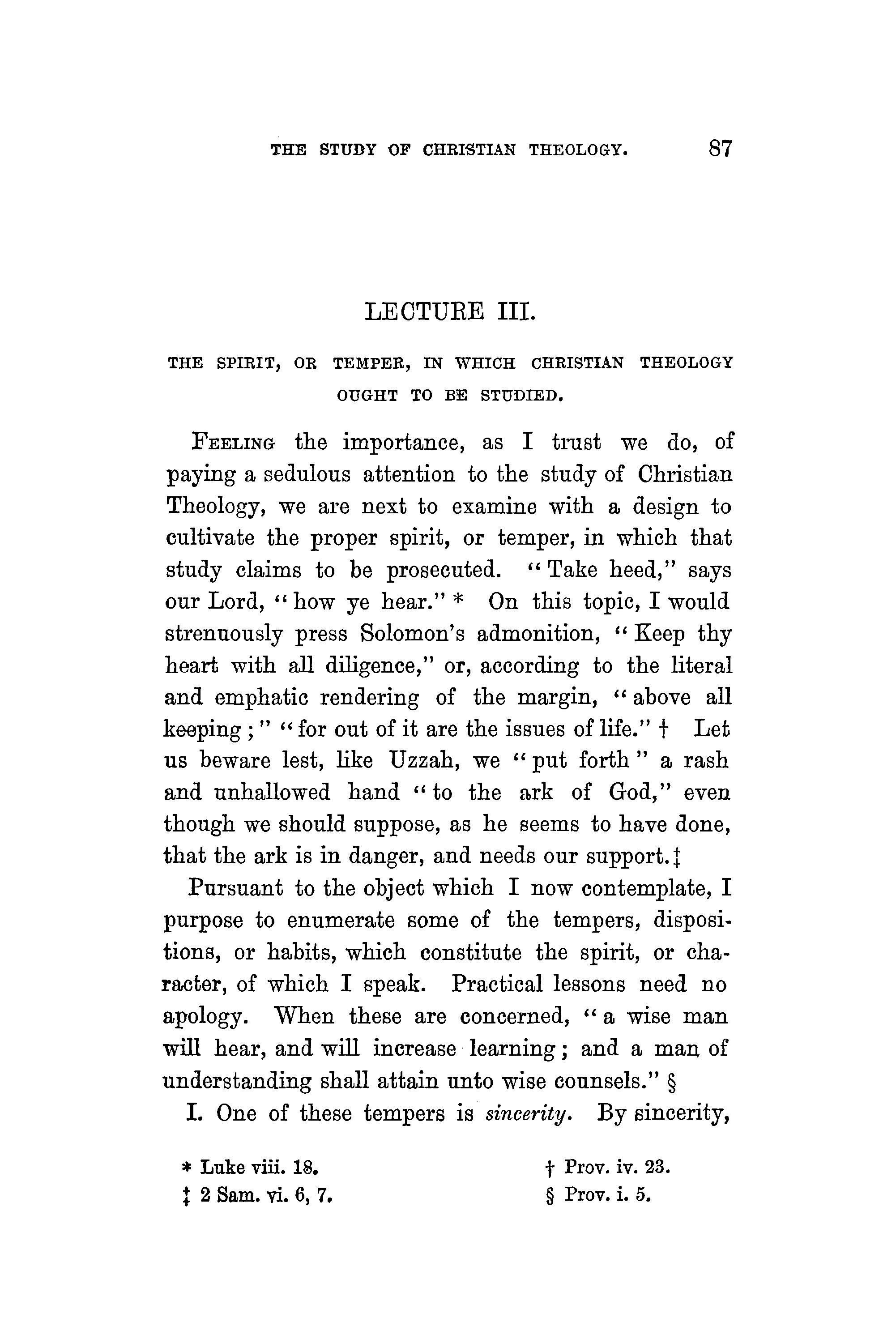
t Prov. iv. 23. § Prov. i. 5.

I mean, in this place, an habitual and predominant desire to discover the genuine mind and will of God, as revealed in the Holy Scriptures, how unacceptable soever such a discovery may prove to flesh and blood, in order that we may believe, experience, and practise accordingly. "If thine eye be single," simply directed to one object, or, as some think, sound, clear, unimpaired in its vision, in opposition to one which is vitiate'd and diseased, "thy whole body shall be full of light."* "If any man will do His," that is, God's " will," if, as the word rightly denotes, he be willing, minded, promptly and sincerely disposed, to do the will of God, " he shall know of the doctrine, whether it be of God, or whether," adds our Lord, "I speak of Myself," as one without sufficient credentials and authority.+ "The wicked shall do wickedly," even when they profess to search into the sacred revelations of the Most High God ; '' and none of the wicked shall understand," their corrupt and wayward hearts close all the avenues by which truth might gain admission: "but the wise," they who in simplicity and sincerity choose the right end, and pursue it in the faithful use of the appointed means, " shall understand." t
II. Closely connected with sincerity is humility. The humility of a Christian disciple arises from a deep consciousness of his own ignorance and liability to err, and from a lively apprehension of the skill and condescension of our Divine Teacher, both of which combine to produce a meek submission to His instruc-
* Matt. vi. 22. See Campbell on the passage.
t John vii. 17, t Dan. xii. 10.
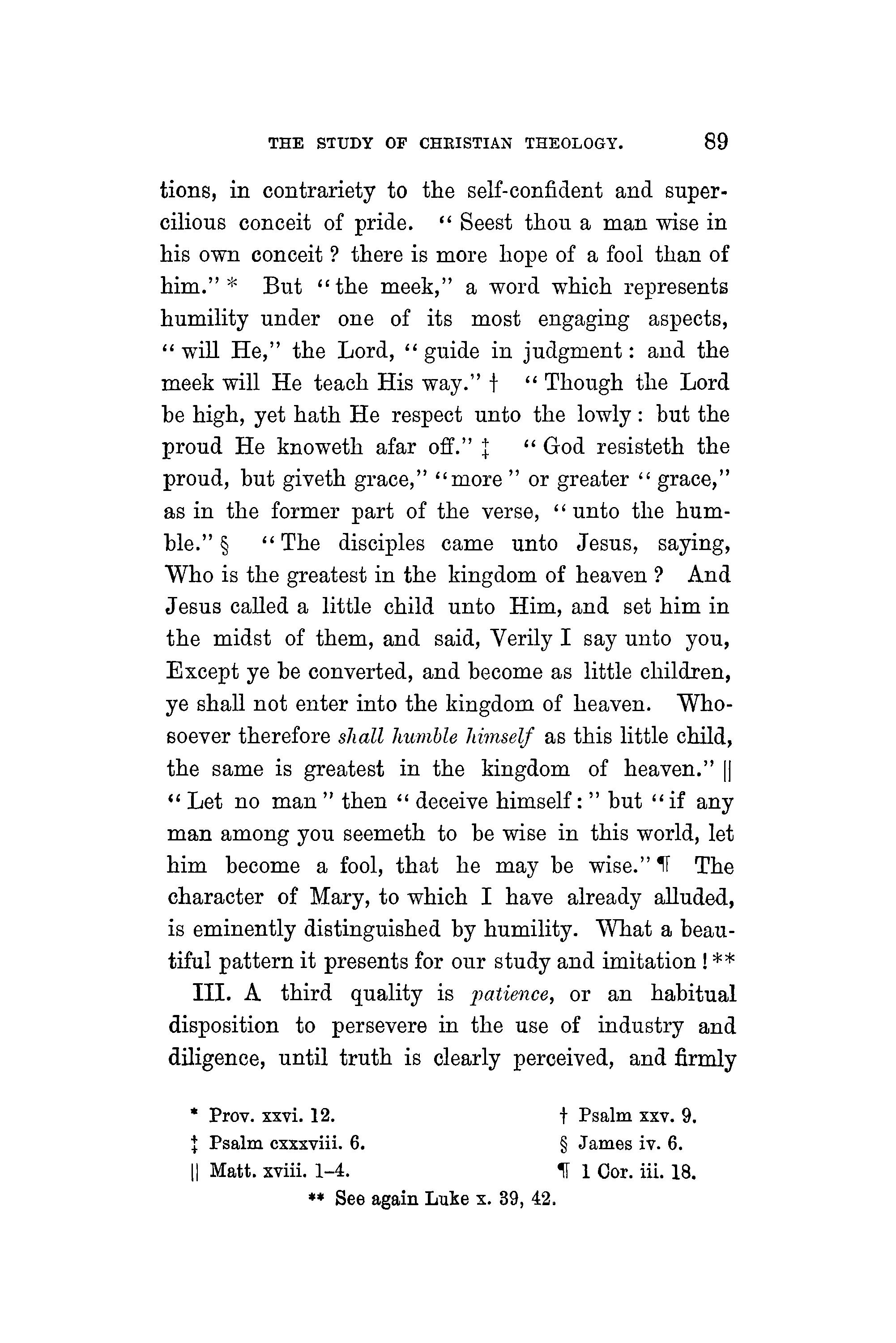
STUDY OF CHRISTIAN THEOLOGY.
tions, in contrariety to the self-confident and supercilious conceit of pride. " Seest thou a man wise in his own conceit ? there is more hope of a fool than of him."* But "the meek," a word which represents humility under one of its most engaging aspects, "will He," the Lord, "guide in judgment: and the meek will He teach His way." t "Though the Lord be high, yet hath He respect unto the lowly : but the proud He knoweth afar off." t " God resisteth the proud, but giveth grace," "more " or greater " grace," as in the former part of the verse, "unto the humble."§ "The disciples came unto Jesus, saying, Who is the greatest in the kingdom of heaven? And Jesus called a little child unto Him, and set him in the midst of them, and said, Verily I say unto you, Except ye be converted, and become as little children, ye shall not enter into the kingdom of heaven. Whosoever therefore shall humble hiniself as this little child, the same is greatest in the kingdom of heaven." II " Let no man " then " deceive himself : " but " if any man among you seemeth to be wise in this world, let him become a fool, that he may be wise."~ The character of Mary, to which I have already alluded, is eminently distinguished by humility. "What a beautiful pattern it presents for our study and imitation!**
III. A third quality is patience, or an habitual disposition to persevere in the use of industry and diligence, until truth is clearly perceived, and firmly
* Prov. xxvi. 12.
t Psalm cxxxviii. 6.
11 Matt. xviii. 1-4.
** See again Luke x. 39, 42. t Psalm xxv. 9. § James iv. 6.
1 1 Cor. iii. 18.

ON embraood. Guard against impatience and precipitancy. " Those who are in haste to know, seldom take the surest road." * It is the character of the successful student in the Divine Word, that " his delight is in the law of the Lord; and in His law doth he meditate day and night." t "Search" then "the Scriptures.'' t The Jews in Berea "were more noble than those in Thessalonica, in that they received the word with all readiness of mind, and searched the Scriptures daily, whether those things were so. Therefore many of them believed." § And St. James, describing the character of a genuine hearer, says that he "looketh into the perfect law of liberty, and continueth therein.'' II One of the greatest impediments to a progress in our Scriptural studies, is an imagination that we are already amply supplied with knowledge, or that we possess minds so quick and discursive as to render slow and patient investigation perfectly unnecessary. Unhappy he who attempts to teach such confident and indocile aspirants! He rolls the stone of Sisyphus. "Truth is the offspring of silence, unbroken meditations, and thoughts often revised and corrected." lt was declared by Sir Isaac Newton, "that whatsoever service he had done to the public was not owing to any extraordinary sagacity, but solely to industry and patient thought." ** So deeply was this great and yet
* Campbell's Third Lecture on Systematic Theology, p. 146. The writer is indebted to Dr. Campbell for other valuable suggestions on sincerity, humility, and patience.
t Psalm i. 2. t John v. 39. § Acts xvii. 11, 12. II James i. 25. "If W0llaston, "Religion of Nature," p. 60.
0 Brewster's" Life of Sir Isaac Newton," chap. xix., p. 329, first edition.
THE STUDY OF CHRISTIAN THEOLOGY, 91
modest man impressed with the smallness of his attainments in those departments of science which he had made his particular study, that a short time before his death he uttered this memorable sentiment : " I do not Jmow what I may appear to the world; but to myself I seem to have been only like a boy playing on the sea-shore, and diverting myself in now and then finding a smoother pebble, or a prettier shell than ordinary, whilst the great ocean of truth lay all undiscovered before me."* And can we suppose that the vast ocean of Scripture, Revelation, is so easily discovered and explored as scarcely to require a thought or effort ? " If any man think that he knoweth any thing, he knoweth nothing yet as he ought to know. But if any man love God, the same is known," or, as some interpret, is made to know, is taught, "of Him."t
IV. To the qualities already enumerated must be added sacreclreverence,or what in Scripture is termed " the fear of the Lord." " The fear of the Lord is the beginning of wisdom." t It is "the beginning," or, according to the marginal reading of that passage, " the principal part," " of knowledge." § The same mirror of ancient wisdom elsewhere adds, that " the knowledge of the holy," of the Lord as holy, and consequently as impressing a sense of supreme veneration on every worshipper, "is understanding." II
* Life, as above, p. 338.
t 1 Cor. viii. 2, 3. See Macknight.
f Psalm cxi. 10.

§ Prov. i. 7.
l1 Prov. ix. 10. The word rendered "holy" is plural in the Hebrew. But this is not adverse to the customary interpretation.

"What man," then, "is he that feareth the Lord? him shall He teach in the way that He shall choose."
For " the secret of the Lord is with them that fear Him; and He will show them His covenant.",:, "But where shall wisdom be found? and where is the place of understanding ?... God understandeth the way thereof, and He knoweth the place thereof .... And unto man He said, Behold, the fear of the Lord, that is wisdom ; and to depart from evil is understanding.'' t
To the want of this may, in a great measure, be traced the rise and progress of many heresies, ancient and modern, and, in not a few instances, of avowed infidelity itself. Be then " in the fear of the Lord all the day long;" t and when you are attracted by the bright and unconsuming flame which marks the revelation of the Lord, when you say, We "will now turn aside, and see this great sight," remember the solemn admonition which was addressed to Moses, "Draw not nigh hither," as with a vain and heedless curiosity; "put off thy shoes from off thy feet, for the place whereon thou standest is holy ground.'' Like him, you will then hide your face ; for you too will be '' afraid to look upon God.'' §
V. Nearly allied to the temper just mentioned is the spirit of prayer for Divine instruction and assistance. God is "the Father of lights." II All light, natural, intellectual, and spiritual, comes from Him. To Him, the.n, we ought constantly to apply. How easily can He, by His secret agency, give a right direction to our
* Psalm xxv. 12, 14. t Job xxviii. 12, 23, 28.
! Prov. xxiii. 17. § Exod. iii. 2, 3, 5, 6.
II James i. 17.

93
thoughts, awaken suitable affections, remove perplexing and apparently insurmountable difficulties, and impress truth, in all its brightness and force, upon our hearts ! " Open Thou mine eyes," says the Psalmist, " that I may behold wondrous things out of Thy law."* To this subject we may apply the encouraging language of St. James : " If any of you lack wisdom, let him ask of God, who giveth to all men liberally, and upbraideth not; and it shall be given him." t Let us then pray " that the God of our Lord Jesus Christ, the Father of glory, may give unto us the spirit of wisdom and revelation in the knowledge of Him: the eyes of our understanding being enlightened; that we may know what is the hope of His calling, and what the riches of the glory of His inheritance in the saints, and what is the exceeding greatness of His power to us-ward who believe, according to the working of His mighty power." t
VI. Faith must also accompany our study of Christian Theology. Are you convinced that the Bible is the Word of God? Have you just ground to believe that, by a legitimate use of the proper sources and rules of Scripture interpretation, you have ascertained the meaning of its particular doctrines, precepts, promises? Here the province of reason ceases; or, rather, it is the highest reason to embrace what you have thus discovered with humble and obedient faith. Take God at His word. " If we receive the witness of men, the witness of God is greater." § Consider the examples of faith which the Scriptures record, and many of
* Psalm cxix. 18.
t Ephes. i. 17- 19.
t James i. 5.
§ 1 John. v. 9.

which are recounted in the eleventh chapter of the Epistle to the Hebrews. Weigh St. Paul's solemn declaration : " For unto us was the Gospel preached, as well as unto them," the ancient Israelites ; or, rather, "unto us the good tidings are published," though in a far clearer and more sublime mann€r, " which were published to them : but the word preached did not profit them, not being mixed with faith in them that heard it."* "Wherefore," as St. James admonishes, " lay apart all filthiness and superfluity of naughtiness, and receive with meekness the en.grafted word," a beautiful description this of docile and submissive faith, " which is able to save your souls." t Happy they who thus believe!
VII. I name one other quality, and, at this time, one other only,-a prompt and faithful obedience in applying all that we may learn to the improvement of our Christian experience, the better regulation of our spirit and conduct, and our more competent preparation for all the sacred duties in which we ma,.y be required to engage. "Whosoever heareth these sayings of Mine," declares our Lord, in the conclusion of His Sermon on the Mount, " and doeth them, I will liken him unto a wise man, which built his house upon a rock : and the rain descended, and the floods came, and the winds blew, and beat upon that house; and it fell not : for it was founded upon a rock. And every one that heareth these sayings of Mine, and doeth them not, shall be likened unto a foolish man, which
* Heb. iv. 2. See Campbell's Preliminary Dissertations to his Translation of the Gospels, diss. i., part ii., sect. 6. t James i. 21.
THE STUDY OF CHRISTIAN THEOLOGY, 95
built his house upon the sand : and the rain descended, and the floods came, and the winds blew, and beat upon that house ; and it fell : and great was the fall of it." * " Why call ye Me, Lord, Lord, and do not the things which I say?" t "Blessed are they that hear the word of God, and keep it." t "If a man love Me," says onr Lord again, "he will keep My words.... He that loveth Me not, keepeth not My sayings.''§ '' Be ye," then, "doers of the word, and not hearers only, deceiving your own selves." He who is "not a forgetful hearer, but a doer of the work, this man shall be blessed in his deed." II
* Matt. vii. 24-27.
§ John xiv. 23, 24.

t Luke vi. 46. t Luke xi. 28. I II James i. 22, 25.
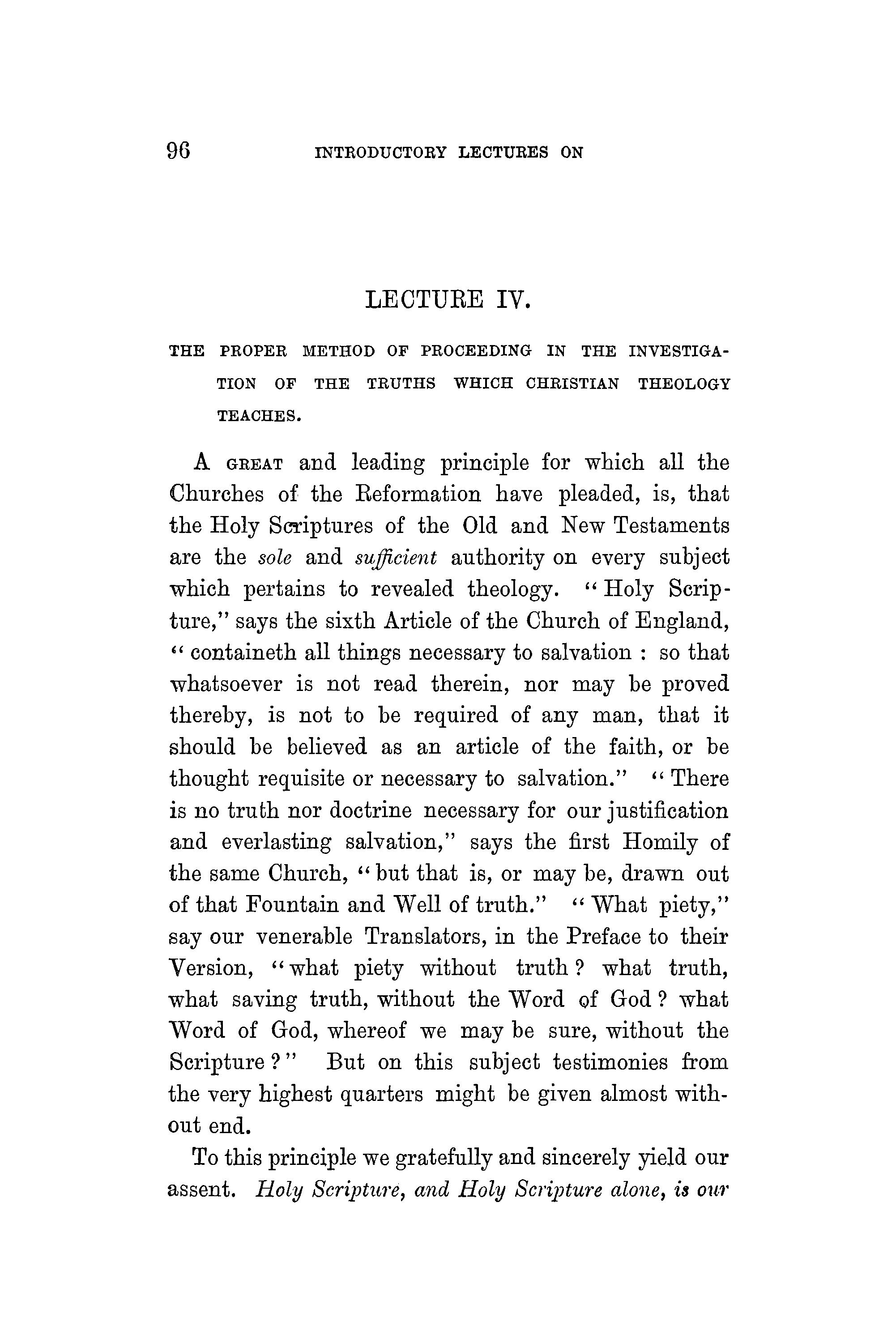
THE PROPER METHOD OF PROCEEDING IN THE INVESTIGATION OF THE TRUTHS WHICH CHRISTIAN THEOLOGY TEACHES.
A GREAT and leading principle for which all the Churches of the Reformation have pleaded, is, that the Holy Scriptures of the Old and New Testaments are the sole and sufficient authority on every subject which pertains to revealed theology. "Holy Scripture," says the sixth Article of the Church of England, "containeth all things necessary to salvation : so that whatsoever is not read therein, nor may be proved thereby, is not to be required of any man, that it should be believed as an article of the faith, or be thought requisite or necessary to salvation." " There is no truth nor doctrine necessary for our justification and everlasting salvation," says the first Homily of the same Church, "but that is, or may be, drawn out of that Fountain and Well of truth." "What piety," say our venerable Translators, in the Preface to their Version, "what piety without truth ? what truth, what saving truth, without the Word of God? what Word of God, whereof we may be sure, without the Scripture?" But on this subject testimonies from the very highest quarters might be given almost without end.
To this principle we gratefully and sincerely yield our assent. Holy Scripture, and Holy Scripture alone, is our

acknowledged text-book in Theology. Conscious indeed of our own ignorance, infirmity, and proneness to mistake, and thankful for the rich stores of Scripture interpretation which the Church has supplied, both in earlier and later times, we would eagerly avail ourselves of all these human helps, as they are, or may be, brought within our reach ; but we would avail ourselves of them simply as helps, helps to a more correct and full apprehension of God's own Inspired Word, not as separate authorities, or as authorities which ought to be in any wise regarded as co-equal or co-ordinate with that which is truly Divine. I venerate the eminent lights whom God has been pleased to raise up in the several ages of the Christian Church. " Leaders of the people by their counsels, and by their knowledge of learning meet for the people, wise and eloquent in their instructions," they " were honoured in their generations, and were the glory of their times . . .. ... Their bodies are buried in peace; but their name liveth." ,:, Yet I would use them, as they themselves would have wished to be used, not as superseding, but as explaining and applying the revealed truth of God. '' To the law and to the testimony : if they speak not according to this word, it is because there is no light," literally, as in the Margin, " no morning in them." t In conformity with these general observations, I will now more particularly consider the proper method of proceeding in our investigation of Christian Theology.
I. Are the Scriptures our sole and sufficient authority here ? Then we ought, first of all, to cultivate an Ecclus. xliv. 4, 7, 14. t Isai. viii. 20.
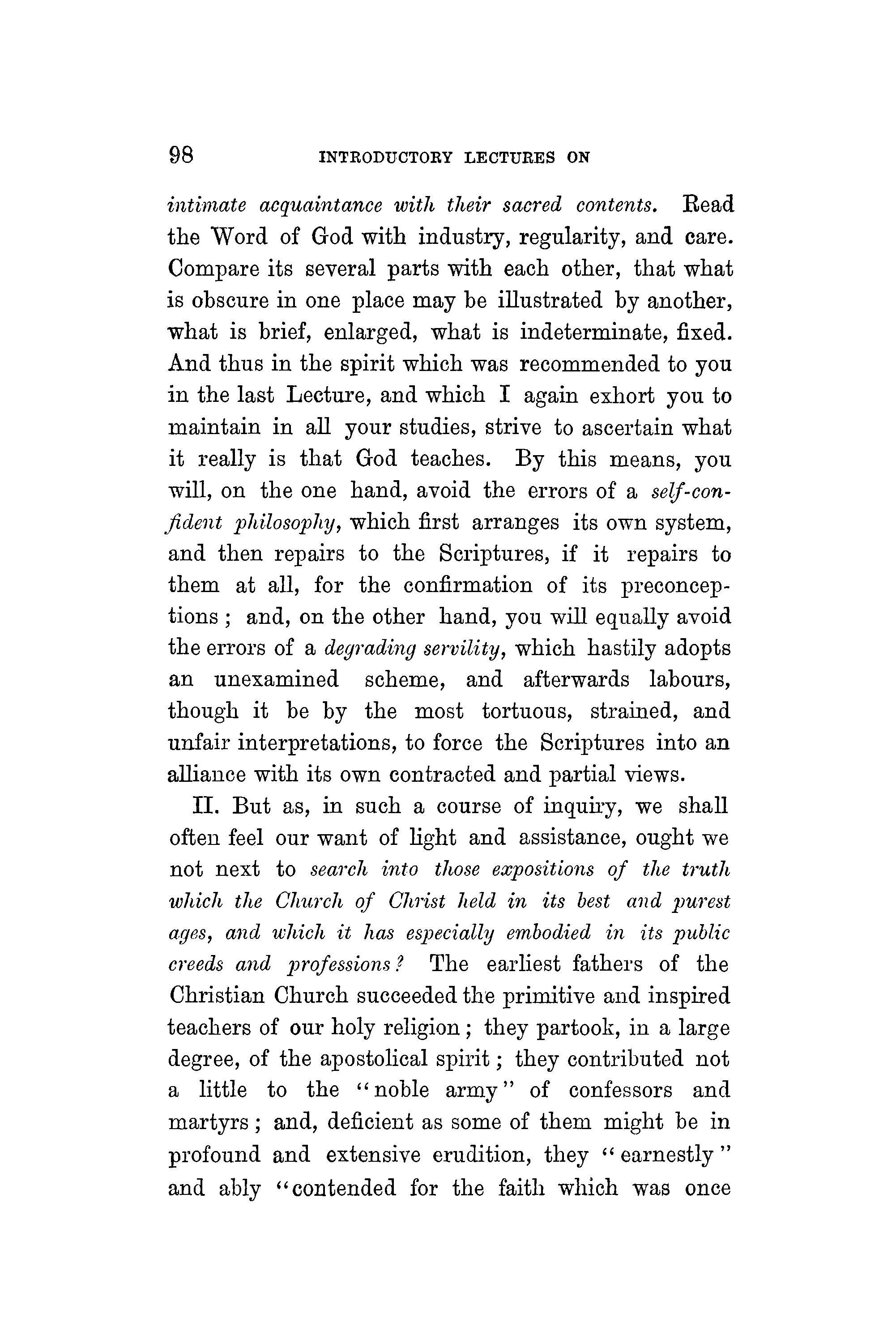
intimate acquaintance with their sacred contents. Read the Word of God with industry, regularity, and care. Compare its several parts with each other, that what is obscure in one place may be illustrated by another, what is brief, enlarged, what is indeterminate, fixed. And thus in the spirit which was recommended to you in the last Lecture, and which I again exhort you to maintain in all your studies, strive to ascertain what it really is that God teaches. By this means, you will, on the one band, avoid the errors of a self-confident philosophy, which first arranges its own system, and then repairs to the Scriptures, if it repairs to them at all, for the confirmation of its preconceptions; and, on the other hand, you will equally avoid the errors of a degrading servility, which hastily adopts an unexamined scheme, and afterwards labours, though it be by the most tortuous, strained, and unfair interpretations, to force the Scriptures into an alliance with its own contracted and partial views.
II. But as, in such a course of inquiry, we shall often feel our want of light and assistance, ought we not next to search into those expositions of the truth which the Church qf Christ held in its best and purest ages, and which it has especially embodied in its public creeds and professions .2 The earliest fathers of the Christian Church succeeded the primitive and inspired teachers of our holy religion ; they partook, in a large degree, of the apostolical spirit; they contributed not a little to the "noble army" of confessors and martyrs ; and, deficient as some of them might be in profound and extensive erudition, they " earnestly " and ably "contended for the faith which was once
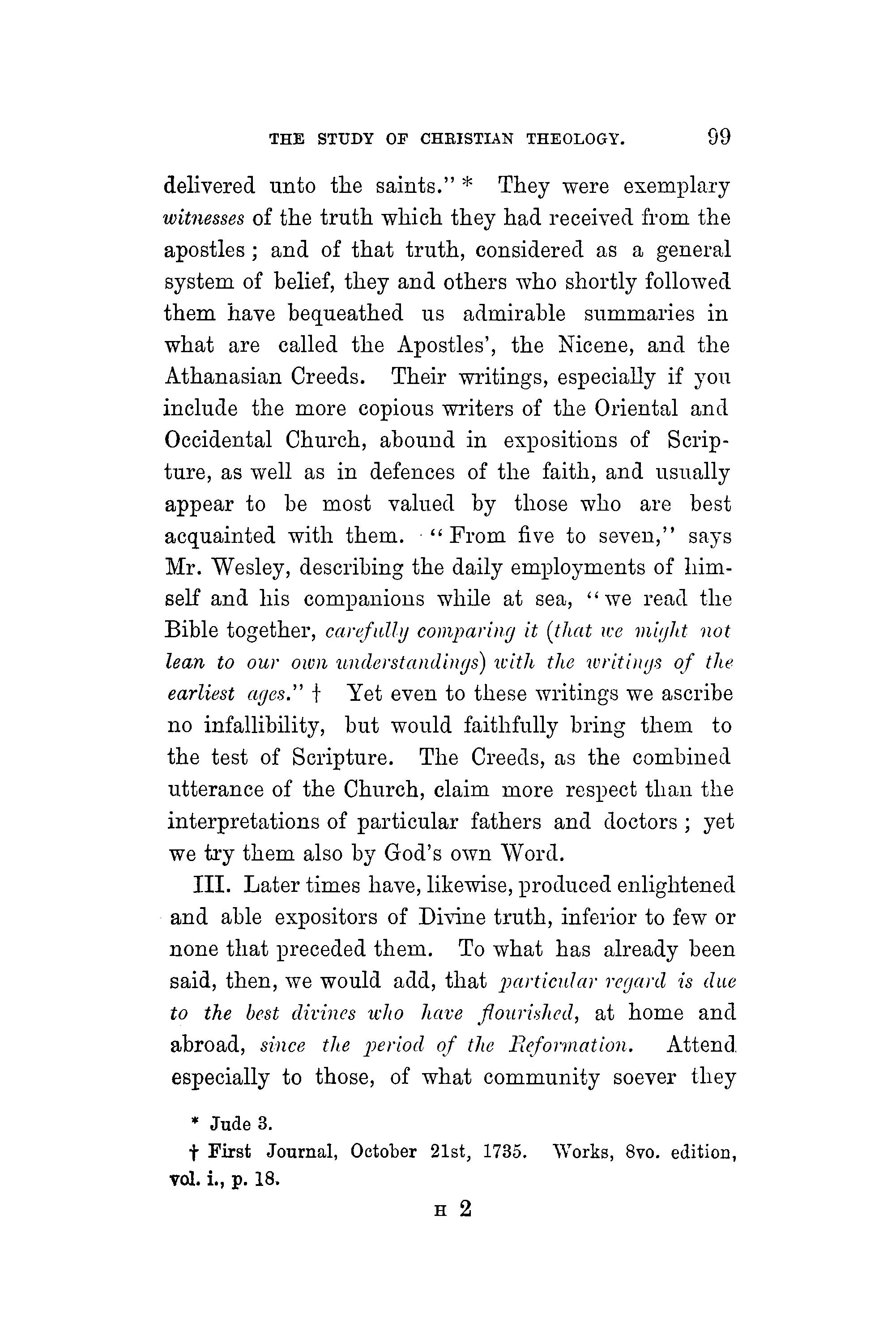
delivered unto the saints."* They were exemplary witnesses of the truth which they had received from the apostles ; and of that truth, considered as a general system of belief, they and others who shortly followed them have bequeathed us admirable summaries in what are called the Apostles', the Nicene, ancl the Athanasian Creeds. Their writings, especially if yon include the more copious writers of the Oriental and Occidental Church, abound in expositions of Scripture, as well as in defences of the faith, and usually appear to be most valued by those who are best acquainted with them. • " From five to seven," says Mr. Wesley, describing the daily employments of himself and his companions while at sea, "we ren,c1the Bible together, carefully comparing it (that we miuht not lean to our own understandings) ii·ith the writi11us of the earliest ages." t Yet even to these writings we ascribe no infallibility, but would faithfully bring them to the test of Scripture. The Creeds, n,s the combined utterance of the Church, claim more respect than the interpretations of particular fathers and doctors; yet we try them also by God's own ·word.
III. Later times have, likewise, produced enlightened and able expositors of Divine truth, inferior to few or none that preceded them. To what has already been said, then, we would add, that particular regarcl is due to the best clirines u·ho have .flourished, at home and abroad, since the period of the Reformation. Attend especially to those, of what community soever they
* Jude 3.
t First Journal, October 21st, 1735. \Yorks, 8vo. edition, vol. i., p. 18.

may be, who are most learned, most pious, most modest, and most observant of the pure and primitive declarations concerning the faith ; who most carefully propound to us the arguments by which they seek to establish their views ; and who thus aim to convince us, not by the interjection of unproved assertions, not by their own assumed or imaginary authority, not by an air of dictatorship, but by the clear, calm evidence of truth. After all that has been done, progress may yet be made in the elucidation of the sacred pages. Bengel divides the past tractation of the New Testament into six diverse ages, which he severally terms the native or natural; the 11wral; the clry; the revivecl; the poleniic, clogrnatic, topical; and the critical, polyglott, antiquarian, homiletic. But he sighs for yet a seventh mode of treatment which shall more nearly answer to the perfection of Scripture, and which he terms manly and regal.* That age is approaching. Men of science, conversant with the Works of Goel, which have been patent and minutely explored so many thousands of years, are discovering, not new principles, but new combinations and uses, from day to day : and may not devout students of the TVorclof Goel hope to find, not indeed new principles, but new combinations ancl uses, in that wonderful treasury of wisdom and grace ?
IV. To all this may be annexed the advantage of conversing with sensible ancl e.rperienceclChristians, whether learned or otherwise. They have embraced the saving doctrines of Christianity with all their hearts ; they enter into their spiritual meaning; they feed on the Word of God as on heavenly manna; and they are
* Gnonwn, Proof.v.

often prepared to give illustrations of His truth, from which the most skilful may draw no small amount of instruction. Christian Ministers, who are accustomed to hold free converse with more matured disciples, whether in cottages or elsewhere, could easily supply examples.
Yet further to commend the subjects which have been brought before you in this and the preceding Lecture, I will quote the language of one whose memory we all so greatly revere. "To candid, reasonable men," says the venerated Wesley, in the Preface to his first Fifty-three Sermons/~ "I am not afraid to lay open what have been the inmost thoughts of my heart. I have thought, I am a creature of a day, passing through life as an arrow through the air. I am a spirit come from God, and returning to God : just hovering over the great gulf; till, a few moments hence, I am no more seen; I drop into an unchangeable eternit.y ! I want to know one thing,-the way to heaven ; how to land safe on that happy shore. God Himself has condescended to teach the way : for this very end He came from heaven. He hath written it down in a Book. 0 give me that Book ! At any price, give me the Book of God! I have it: here is knowledge enough for me. Let me be homo unius libri, a man of one book. Here, then, I am, far from the busy ways of men. I sit down alone. Only God is here. In His presence I open, I read His Book; for this end, to find the way to heaven. Is there a doubt concerning the meaning of what I read ? Does anything appear dark or intricate ? I lift up my
* Works, vol. v., pp. 2-4.
heart to the Father of Lights : ' Lord, is it not Thy word, If any man lack wisdom, let him ask of God ! Thou givest liberally, and upbraidest not. Thou hast said, If any be willing to do Thy will, he shall know. I am willing to do, let me know, Thy will.' I then search after and consider parallel passages of Scripture, 'comparing spiritual things with spiritual.' I meditate thereon with all the attention and earnestness of which my mind is capable. If any doubt still remains, I consult those who are experienced in the things of God; and then the writings whereby, being dead, they yet speak. And what I thus learn, that I teach."
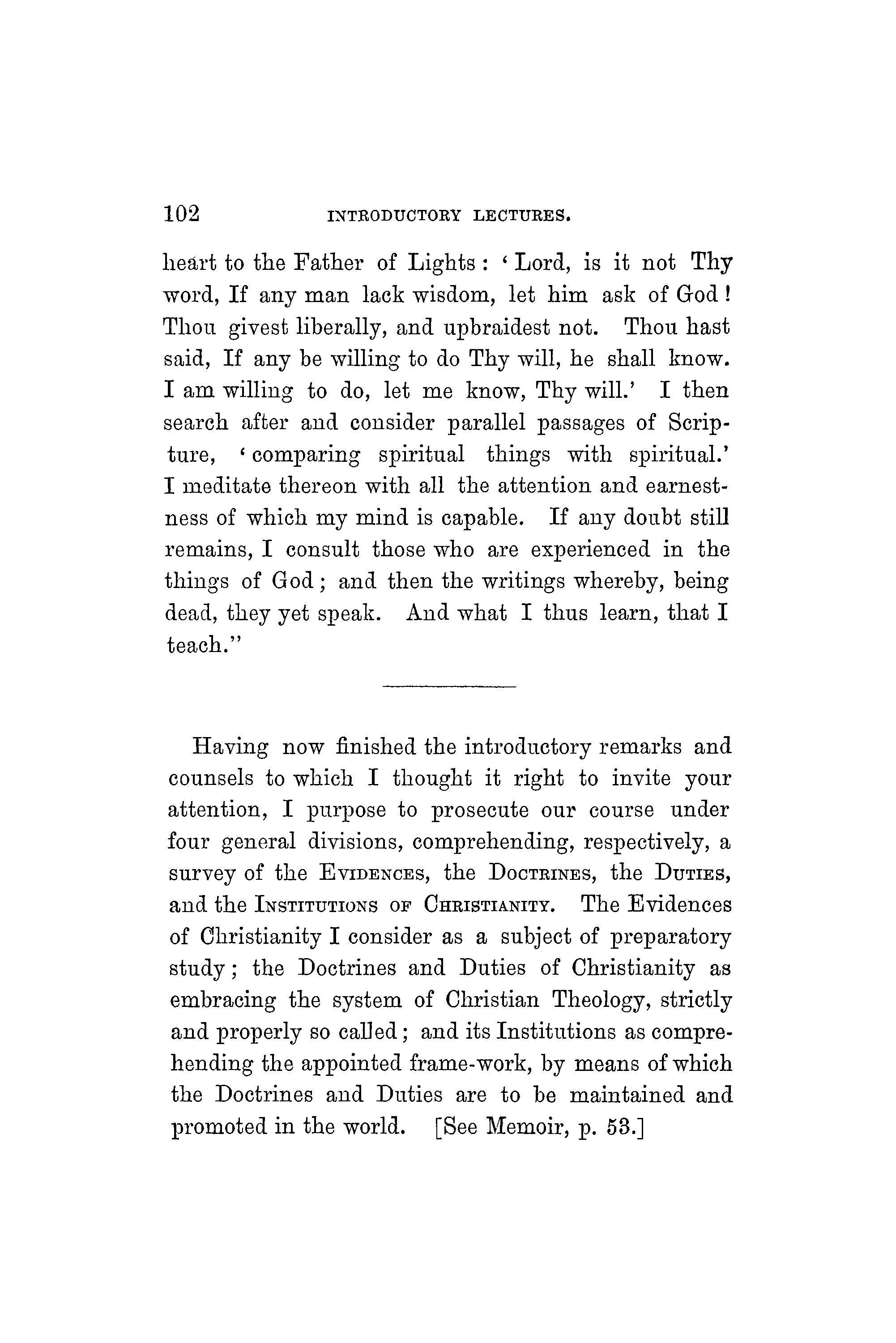
Having now finished the introductory remarks and counsels to which I thought it right to invite your attention, I purpose to prosecute our course under four general divisions, comprehending, respectively, a survey of the EvrnENCEs,the DocTRINES,the DUTIES, and the INSTITUTIONS oF CHRISTIANITY.The Evidences of Christianity I consider as a subject of preparatory study ; the Doctrines and Duties of Christianity as embracing the system of Christian Theology, strictly and properly so called; and its Institutions as comprehending the appointed frame-work, by means of which the Doctrines and Duties are to be maintained and promoted in the world. [See Memoir, p. 53.]
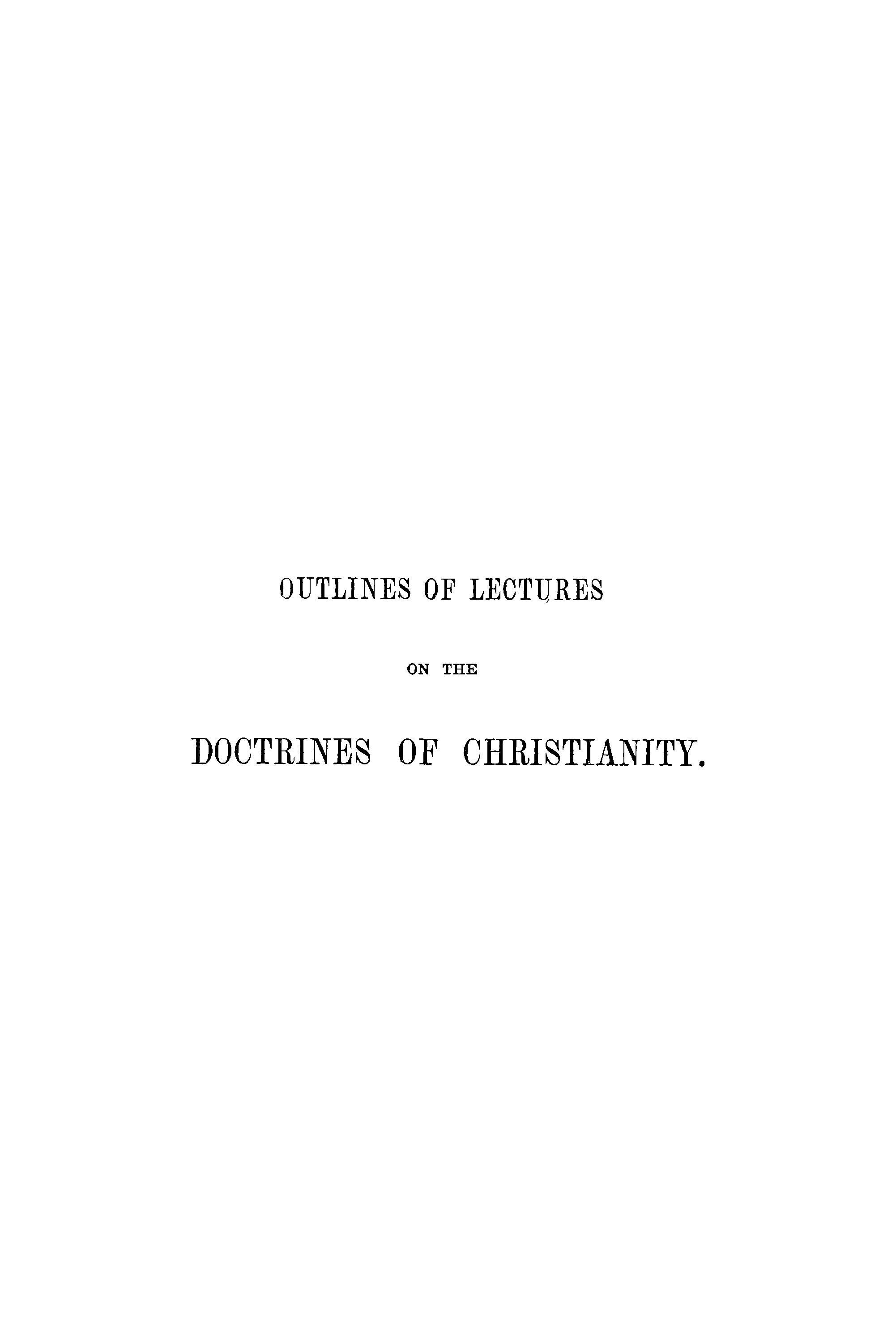


WHEN our Lord, after His resurrection, gave the Apostles their commission, He said : " All power is given unto Me in heaven and in earth. Go ye therefore, and teach," or make disciples of, "all nations, baptizing thern in the narne of the Father, and of the Son, and of the Holy Ghost: teaching them to observe all things whatsoever I have commanded you."* They who became disciples were, therefore, baptized in the names of the Holy Trinity ; and, by submitting to that baptism, avowed their faith in the same Trinity, -according to the " faith," or system of belief, "which was once delivered unto the saints." t
Pursuant to this, it is very observable that all the ancient Creeds, or confessions of faith, are framed on the model of the form of baptism which our Lord prescribed, and are strictly illustrative of its several
* Matt. xxviii. 18-20. t Jude 3.
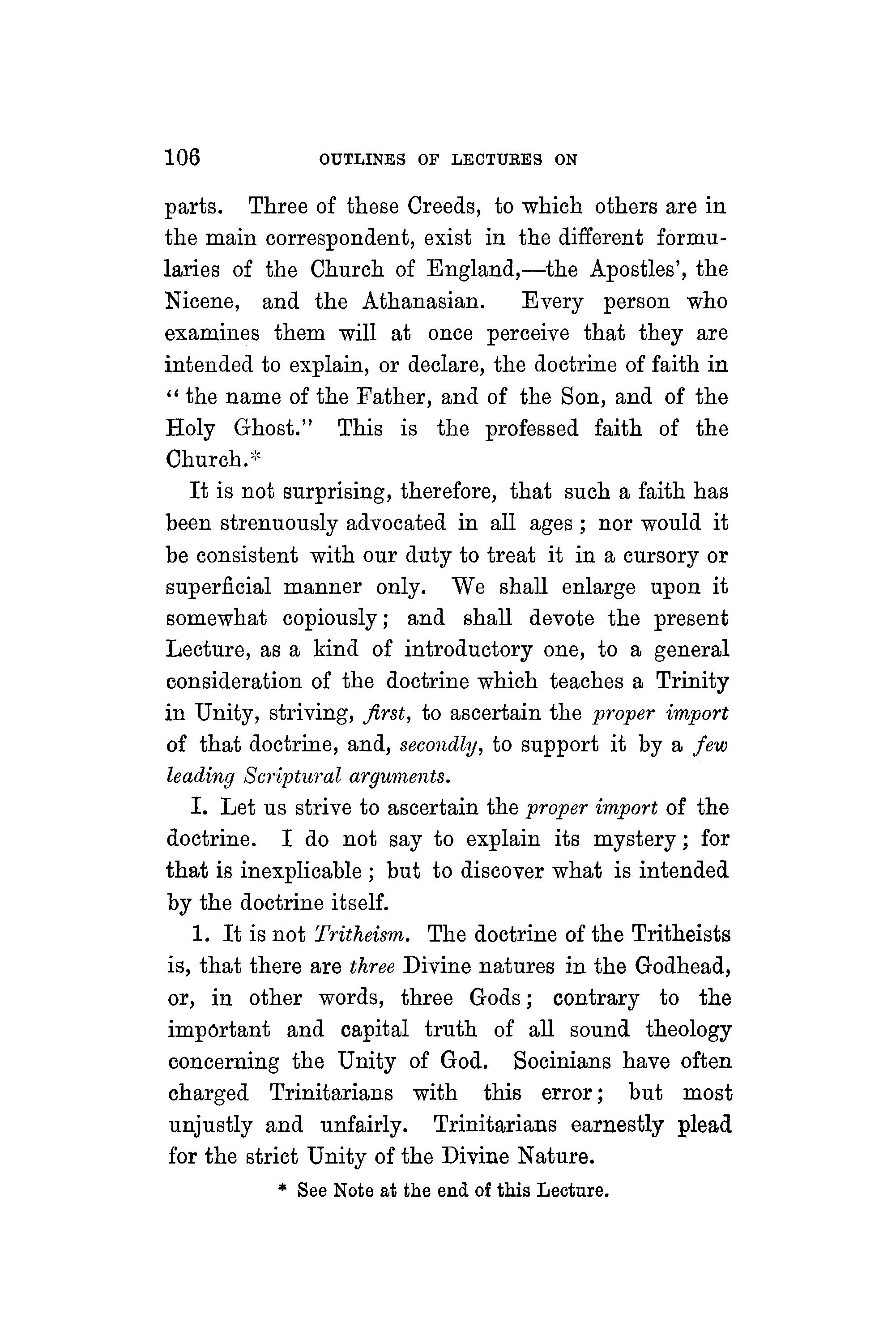
OUTLINES OF LECTURES ON parts. Three of these Creeds, to which others are in the main correspondent, exist in the different formularies of the Church of England,-the Apostles', the Nicene, and the Athanasian. Every person who examines them will at once perceive that they are intended to explain, or declare, the doctrine of faith in "the name of the Father, and of the Son, and of the Holy Ghost." This is the professed faith of the Church.':<
It is not surprising, therefore, that such a faith has been strenuously advocated in all ages; nor would it be consistent with our duty to treat it in a cursory or superficial manner only. We shall enlarge upon it somewhat copiously ; and shall devote the present Lecture, as a kind of introductory one, to a general consideration of the doctrine which teaches a Trinity in Unity, striving, first, to ascertain the proper import of that doctrine, and, secondly, to support it by a few leading Scriptural argunients.
I. Let us strive to ascertain the proper import of the doctrine. I do not say to explain its mystery ; for that is inexplicable ; but to discover what is intended by the doctrine itself.
1. It is not Tritheism. The doctrine of the Tritheists is, that there are three Divine natures in the Godhead, or, in other words, three Gods; contrary to the imp6rtant and capital truth of all sound theology concerning the Unity of God. Socinians have often charged Trinitarians with this error; but most unjustly and unfairly. Trinitarians earnestly plead for the strict Unity of the Divine Nature.
* See Note at the end of this Lecture.

2. It is not Sabellianism ; so called from Sabellius, an ancient heretic. The Sabellians go to an extreme directly opposite to that of the Tritheists, and Il}aintain that there is no distinction, either of Nature or Personal Subsistences in God,-that the terms, Father, Son, and Holy Spirit, represent the Divine Being to us, in Person as well as in Nature, under three different aspects or relations only,-and that the distinction is not eternal, but founded merely on the economy of Redemption. It is easy to see that this scheme utterly denies the proper doctrine of a Trinity in Unity in the Divine Nature.
3. Neither is it Arianism, which derives its name from the celebrated Arius, a Presbyter of the Church at Alexandria. The Arians plead for the Supreme Deity of the Father, and allow an inferior Deity to the Son and the Spirit ; but they deny their true and proper consubstantiality and co-eternity with the Father, and consequently all that constitutes peculiar and supreme Divinity.
4. But the doctrine for which we plead is contradistinguished from all these ; and it teaches us that in the entire and undivided Unity of the same Divine Nature there is a Trinity of Personal Subsistences, consubstantial, co-equal, and co-eternal. '' We worship One God in Trinity, and Trinity in Unity; neither confounding the Persons, nor dividing the Substance. For there is one Person of the Father, another of the Son, and another of the Holy Ghost. But the Godhead of the Father, of the Son, and of the Holy Ghost, is all one; the Glory equal, the Majesty co-eternal. Such as the Father is, such is the Son, and such is the Holy

Ghost. The Father uncreate, the Son uncreate, and the Holy Ghost uncreate. The Father incomprehensible, the Son incomprehensible, and the Holy Ghost incomprehensible. The Father eternal, the Son eternal, and the Holy Ghost eternal. And yet they are not three eternals, but one eternal. As also there are not three incomprehensibles, nor three uncreated ; but one uncreated, and one incomprehensible. So likewise the Father is Almighty, the Son Almighty, and the Holy Ghost Almighty. And yet there are not three Almighties, but one Almighty. So the Father is God, the Son is God, and the Holy Ghost is God. And yet there are not three Gods, but one God. So likewise the Father is Lord, the Son Lord, and the Holy Ghost Lord. And yet there are not three Lords, but one Lord. For like as we are compelled by the Christian verity to acknowledge every Person by himself to be God and Lord ; so are we forbidden by the Catholic religion to say, That there be three Gods, and three Lords.",:,
II. Let us now examine a few leading Scriptural arguments in support of this doctrine.
I. One may be drawn from the history of the Creation, in which the agency of three Persons, acting in inseparable unity, is not obscurely intimated; t more particularly when this history is compared with other passages, in which creation is ascribed to each of the three Persons in the Godhead.
2. A similar argument may be drawn from the Govermnent of all things, which is also attributed to each of the three Persons, acting in inseparable unity.
* Creed of St. Athanasius. t Gen. i., and especially verse 26.
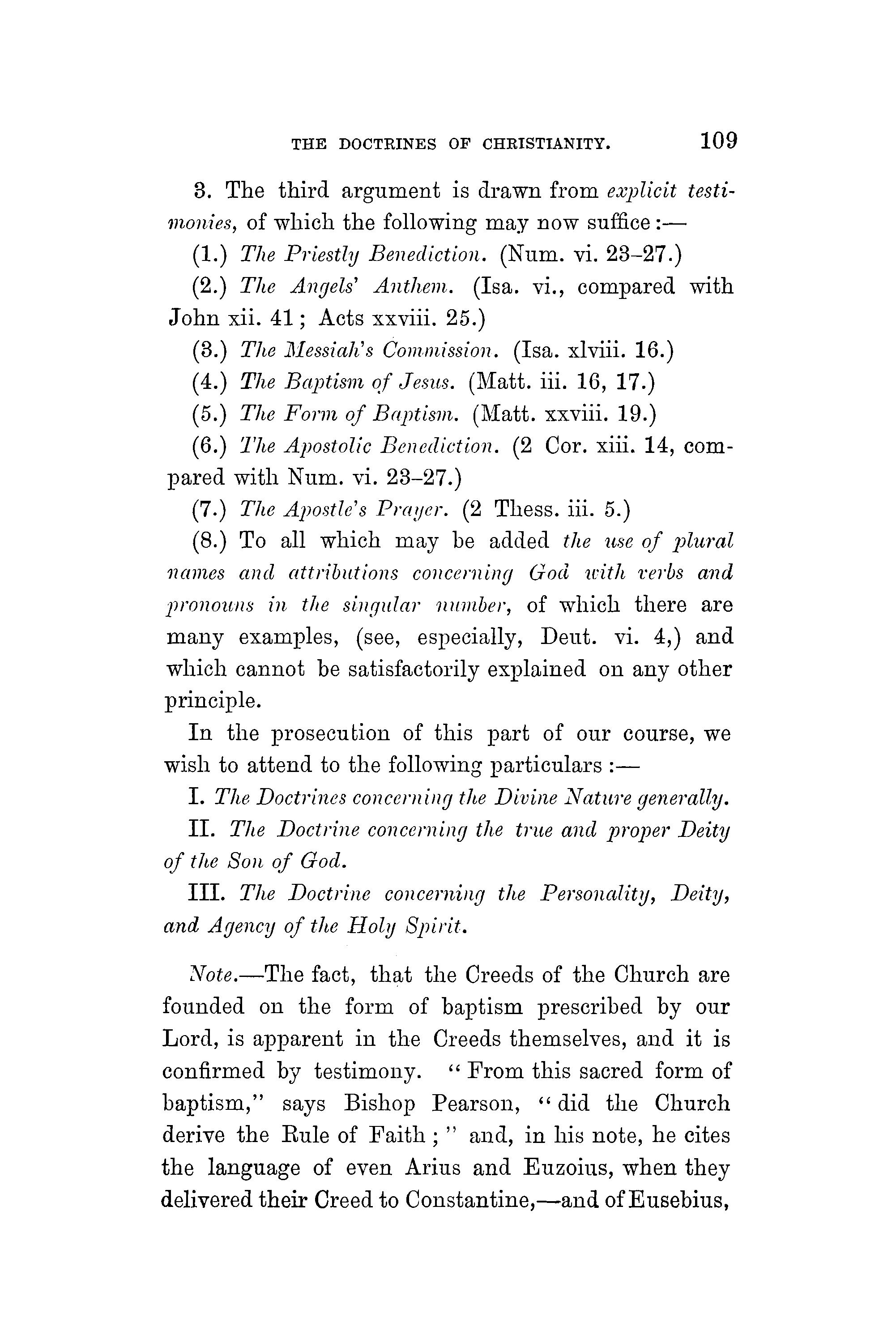
3. The third argument is drawn from explicit testi11wnies, of which the following may now suffice :-
(1.) The Priestly Benediction. (Num. vi. 23-27.)
(2.) The Angels' Anthem. (Isa. vi., compared with John xii. 41; Acts xxviii. 25.)
(3.) The Messiah's Commission. (Isa. xlviii. 16.)
(4.) The Baptism of Jesus. (Matt. iii. 16, 17.)
(5.) The Form, of Baptism,. (Matt. xxviii. 19.)
(6.) The Apostolic Benediction. (2 Cor. xiii. 14, compared with Num. vi. 23-27.)
(7.) The Apostle's Prayer. (2 Thess. iii. 5.)
(8.) To all which may be adcled the use of plural names ancl attributions concerning Goel with rerbs and pronouns in tlie singular 1111mber,of which there are many examples, (see, especially, Dent. vi. 4,) and which cannot be satisfactorily explained on any other principle.
In the prosecution of this part of our course, we wish to attend to the following particulars:-
I. The Doctrines conceming the Divine Nature generally.
II. The Doctrine concerning the true ancl proper Deity of the Son of God.
III. The Doctrine concerning the Personality, Deity, and Agency of the Holy Spirit.
Note.-The fact, that the Creeds of the Church are founded on the form of baptism prescribed by our Lord, is apparent in the Creeds themselves, and it is confirmed by testimony. "From this sacred form of baptism," says Bishop Pearson, " did the Church derive the Rule of Faith ; '' and, in his note, he cites the language of even Arius and Euzoius, when they delivered their Creed to Constantine,-and ofEusebius,

when he delivered his Creed to the Council of Nice. The same, he adds, is also alleged by the Council of Antioch, under the Emperor Constantius and Pope J u.lius. He refers, at the same time, to Athanasius and Basil. " So Vigilius Tapsensis, (Dial. l. i., § 3,) makes Arius and Athanasius jointly speak these words:-' ·we believe in God the Father Almighty, and in Jesus Christ His Son our Lord, and in the Holy Spirit. This is the Rule of our Faith, which the Lotd, by Flis heavenly authority, cleliveredto the Apostles, saying, Go ye, Baptize,' etc." ,r-_" In the first simPlicity of the Christian religion," writes Witsius, "no other Creed is found than that which Christ delivered. t This bare Creed is the foundation to which the ancient Fathers often appealed." 'Witsius cites two passages,-which had been alleged, with others, by his venerable preceptor Voetius :-" The sum and body of our wholefaith,'' says Athanasius, "is contained in the words of Baptism,, ancl founded in that Scripture, Go ye, and baptize," etc.-" This Rule of Faith," says Augustine, " our Lord Jesus Christ Himself furnished; and none but an ungodly man doubts of that Rule of the Catholic faith which HE dictated to whom faith itself is due. Our Lord Jesus Christ Himself, then, when He had now gloriously risen again from the dead, and was about to ascend into heaven to the Father, left these sacraments of faith to the disciplee. For He said, ' Go ye, and baptize all nations in the name of the Father, of the Son, and of the Holy Spirit.''' t
* Pearson on the Creed, Art. I. t Matt. xxviii. 19. t Exercitations on the Creed, i., sect. xiii.

THE TRUE NOTION OF GOD.
WHEN we attempt to form a right apprehension of God, we cannot fail to be deeply sensible of the weakness and imperfection of all our faculties. The subject passes immeasurably beyond the reach of our conceptions in their utmost efforts. Human limitations and restrictions facle away on every side. "\Ve are surrounded by infinity and eternity, and cannot but acknowledge the justice, as well as the force, of Zophar's sublime appeal, "Canst thou by searching find out God ? Canst thou find out the Almighty unto perfection?"* " Such knowledge is too wonderful for me; it is high, I cannot attain unto it." t
Yet we are permitted, with humility and reverence, to form some notion of the Great Supreme. His nature, indeed, is incomprehensible; but His name is known,-" a name," says Hilary, (cited by Pearson, Art. I.,) "of full and perfect divinity." He is JEHOVAH, The Being, Eternal and Immutable; or, to cite St. John's language, which our writers have regarded as an interpretation of the name JEHOVAH, He "which is, and which ivas, and which is to cmne." t
Confining ourselves at present to that true notion of God which this title suggests in its more general meaning, and reserving our inquiries concerning His particular attributes or perfections for a subsequent * Job xi. 7. t Psalm cxxxix. 6. t Rev. i. 4.

part of this Section, we advance the following propositions:-
I. God is the Self-Existent Being. To unfold this thought in some degree :-
1. God is the Being who is absolutely and essentially necessary,-deriving His existence from none, depending for it upon none, but having it, in the highest possible sense of the expression, in and of Himself alone. He "only hath immortality,",:, life in its eternal fulness, incapable of diminution or decay. He is "the only true God." t This is what writers intend when they say that God exists, not contingently but necessarily, or of Himself.
2. God is the Being who, as the schools speak, actually exists,-exists as an actual Being of Himself, not as any kind of being, not as belonging to any genus, class, or order, as created beings do ; and He for ever possesses in Himself, but with a reality and plenitude of which we can form no adequate conception, all the nature, attributes, and glories of Being.
8. God, the BEING,is the Fountain or Source of all other being, imparting to His creatures the several kinds and degrees of existence which they enjoy or have, and the several faculties or qualities with which they are endued,-Himself, from eternity to eternity, independent and supreme.
II. God is the Being who sustains all other beings, and on whom they constantly depencl. This proposition embraces:-
1. Not only the truth already indicated,-that God is the Author and Originator of all created e:ristence,-
* 1 Tim. vi. 16. t John xvii. 3.

DOCTRINES OF CHRISTIANITY. 113
which we are taught to regard as His offspring,-His production,-the emanation of His infinite agency ;
2. Nor a second truth only, which is nearly allied to this,-that He has established the mighty systern of the universe,-that He appoints and controls its ordina11ces, -that He inspects it with His own ceaseless vigilance;-
3. But, especially, that by His invisible and everpresent influence, He sustains, and supplies, and regu,lates all that is. "All" the " springs" of being, of life, of bliss, "are in" Him.':< Yea, as St. Paul declared to the Athenians, He is " not far from every one of us ; " He "giveth to all life, and breath, and all things,"Zife, for "in Him we Iive,"-breath, for "in Him we move, "-and all things, for " in Him we have our being," we are.+ The thought of Cyprian, as quoted by Bengel, is beautiful :-" In the Father we are, in the Son we live, in the Holy Spirit il'e move and make proficiency.''
III. God is the Being who governs all things; for,
1. He is the Proprietor or Owner of all things, which receive their existence from His power, and their support from His care.
2. He is the Head of all things,-" the King of eternity," to adopt Mr. Wesley's translation of this passage, who follows the reading now most approved, " immortal, invisible, the only God." t " The LoRD hath prepared His Throne in the heavens ; and His kingdom ruleth over all."§ And men are taught to know that He "whose name alone is JEHOVAH is the most High over all the earth." II
* See Psalm lxxxvii. 7. t See Acts xvii. 25, 27, 28.
t 1 Tim. i. 17. § Psalm ciii. 19. II Psalm lxxxiii. 18.
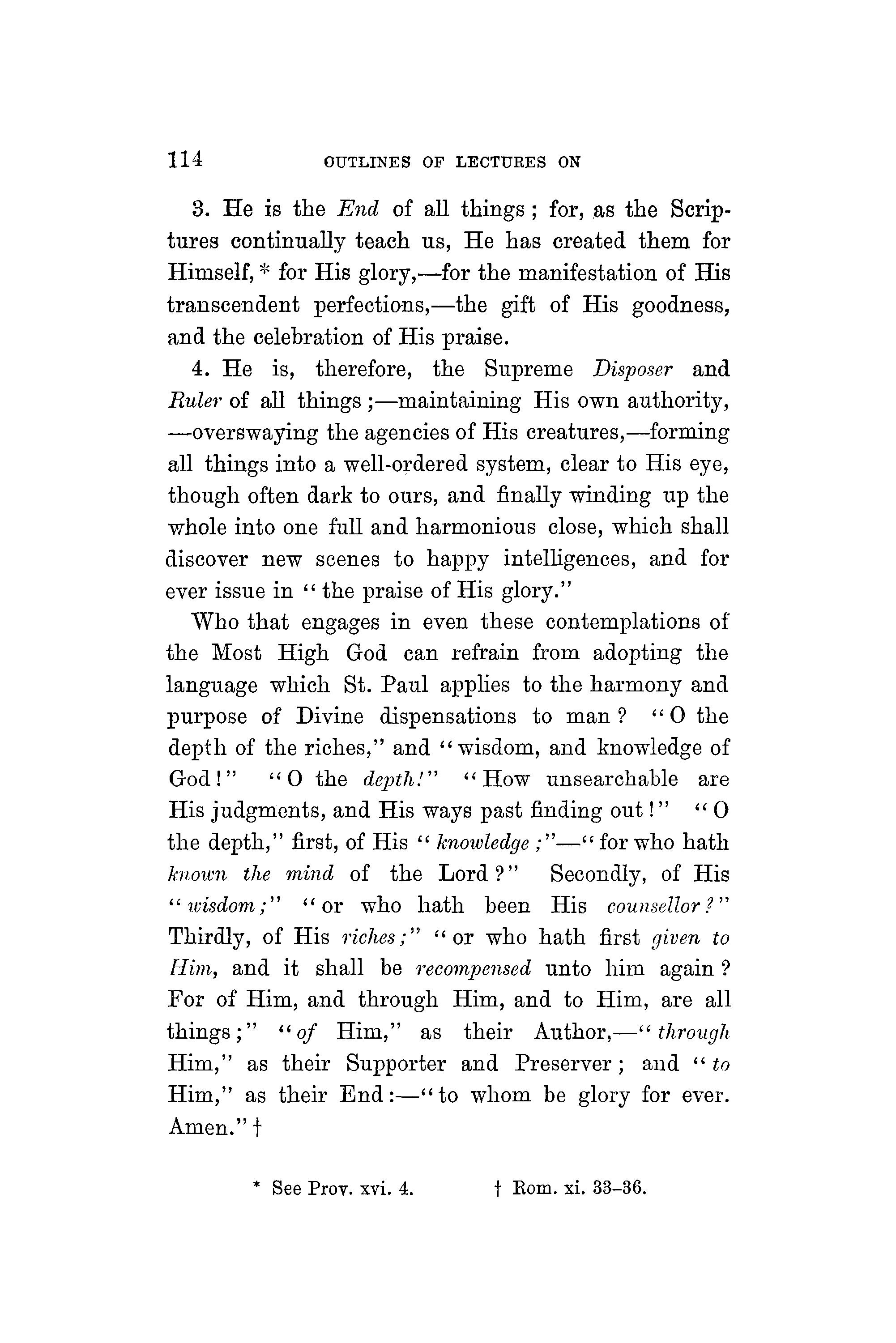
3. He is the End of all things ; for, as the Scriptures continually teach us, He has created them for Himself,* for His glory,-for the manifestation of His transcendent perfections,-the gift of His goodness, and the celebration of His praise.
4. He is, therefore, the Supreme Disposer and Ruler of all things ;-maintaining His own authority, -overswaying the agencies of His creatures,-forming all things into a well-ordered system, clear to His eye, though often dark to ours, and finally winding up the whole into one full and harmonious close, which shall discover new scenes to happy intelligences, and for ever issue in "the praise of His glory."
Who that engages in even these contemplations of the Most High God can refrain from adopting the language which St. Paul applies to the harmony and purpose of Divine dispensations to man ? " 0 the depth of the riches," and " wisdom, and knowledge of God!" "0 the depth!" "How unsearchable are His judgments, and His ways past finding out ! " " 0 the depth," first, of His" knowledge;"-" for who hath known the mind of the Lord?" Secondly, of His " wisdom;" " or who hath been His counsellor? " Thirdly, of His riches;" " or who hath first given to Him,, and it shall be recompensed unto him again? For of Him, and through Him, and to Him, are all things;" "of Him," as their Author,-" through Him," as their Supporter and Preserver ; and " to Him," as their End:-" to whom be glory for ever. Amen." t
* See Prov. xvi. 4. t Rom. xi. 33-36.
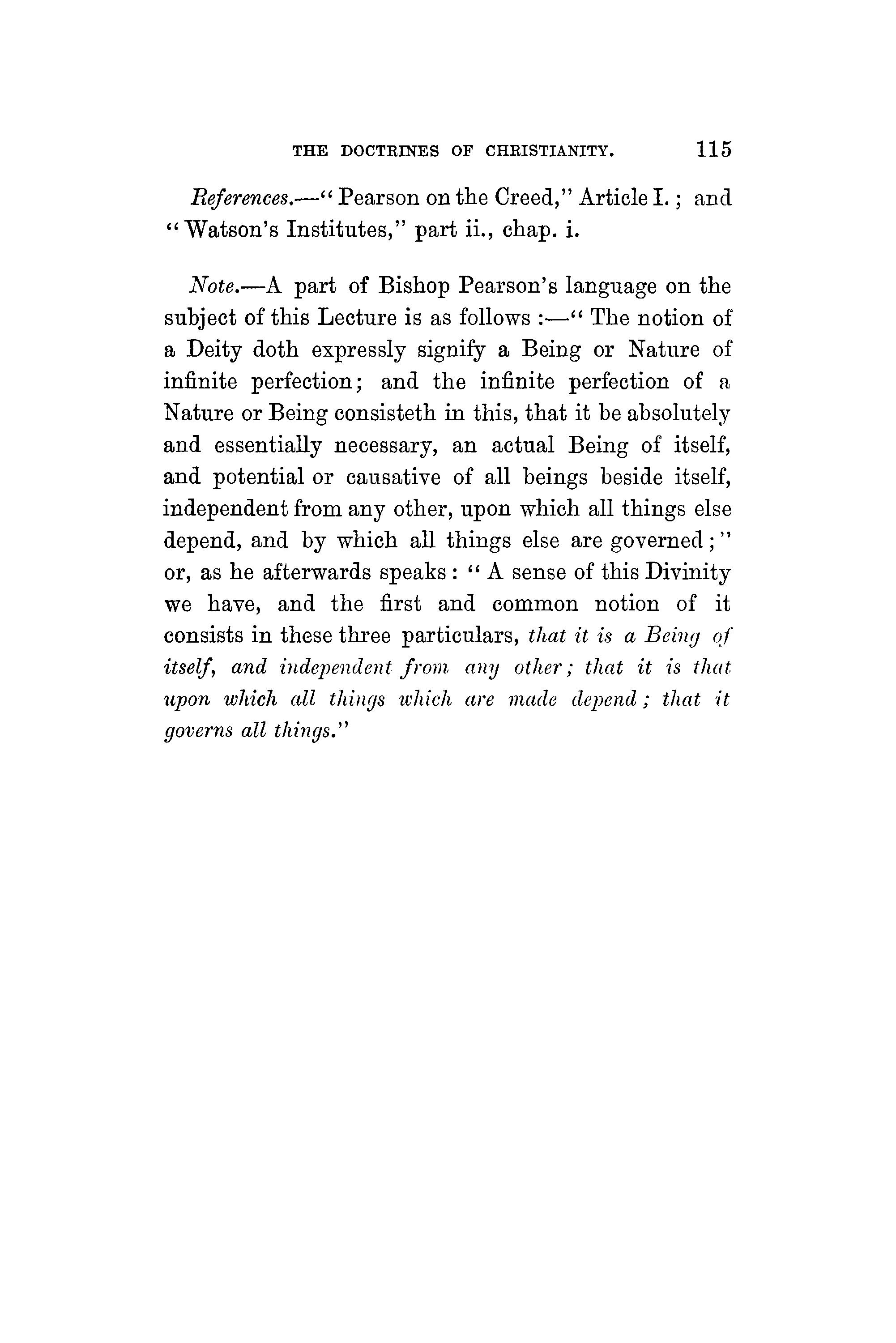
References.-" Pearson on the Creed," Article I. ; and "Watson's Institutes," part ii., chap. i.
Note.-A part of Bishop Pearson's language on the subject of this Lecture is as follows :-" The notion of a Deity doth expressly signify a Being or Nature of infinite perfection; and the infinite perfection of n Nature or Being consisteth in this, that it be absolutely and essentially necessary, an actual Being of itself, and potential or causative of all beings beside itself, independent from any other, upon which all things else depend, and by which all things else are governed ; " or, as he afterwards speaks: "A sense of this Divinity we have, and the first and common notion of it consists in these three particulars, that it is a Being of itself, and independent from any other; that it 1·s that upon which all things which are macle clepend; that 'it governs all things."
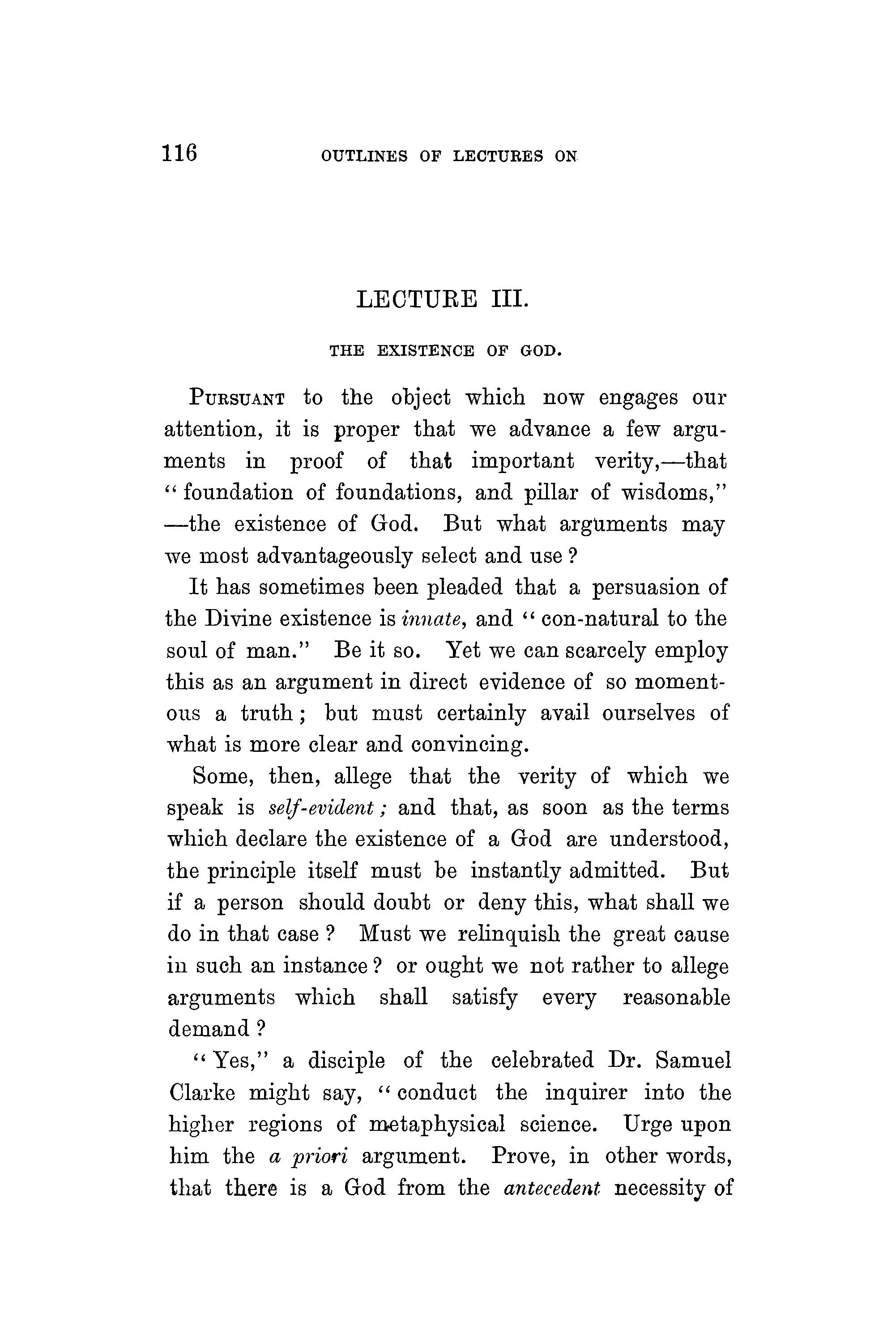
PuRSUANTto the object which now engages our attention, it is proper that we advance a few arguments in proof of that important verity,-that " foundation of foundations, and pillar of wisdoms," -the existence of God. But what arguments may we most advantageously select and use ?
It has sometimes been pleaded that a persuasion of the Divine existence is innate, and "con-natural to the soul of man." Be it so. Yet we can scarcely employ this as an argument in direct evidence of so momentous a truth ; but must certainly avail ourselves of what is more clear and convincing.
Some, then, allege that the verity of which we speak is self-evident ; and that, as soon as the terms which declare the existence of a God are understood, the principle itself must be instantly admitted. But if a person should doubt or deny this, what shall we do in that case? Must we relinquish the great cause in such an instance ? or ought we not rather to allege arguments which shall satisfy every reasonable demand?
"Yes," a disciple of the celebrated Dr. Samuel Clarke might say, "conduct the inquirer into the higher regions of meta physical science. Urge upon him the a priori argument. Prove, in other words, that there is a God from the antecedmt necessity of
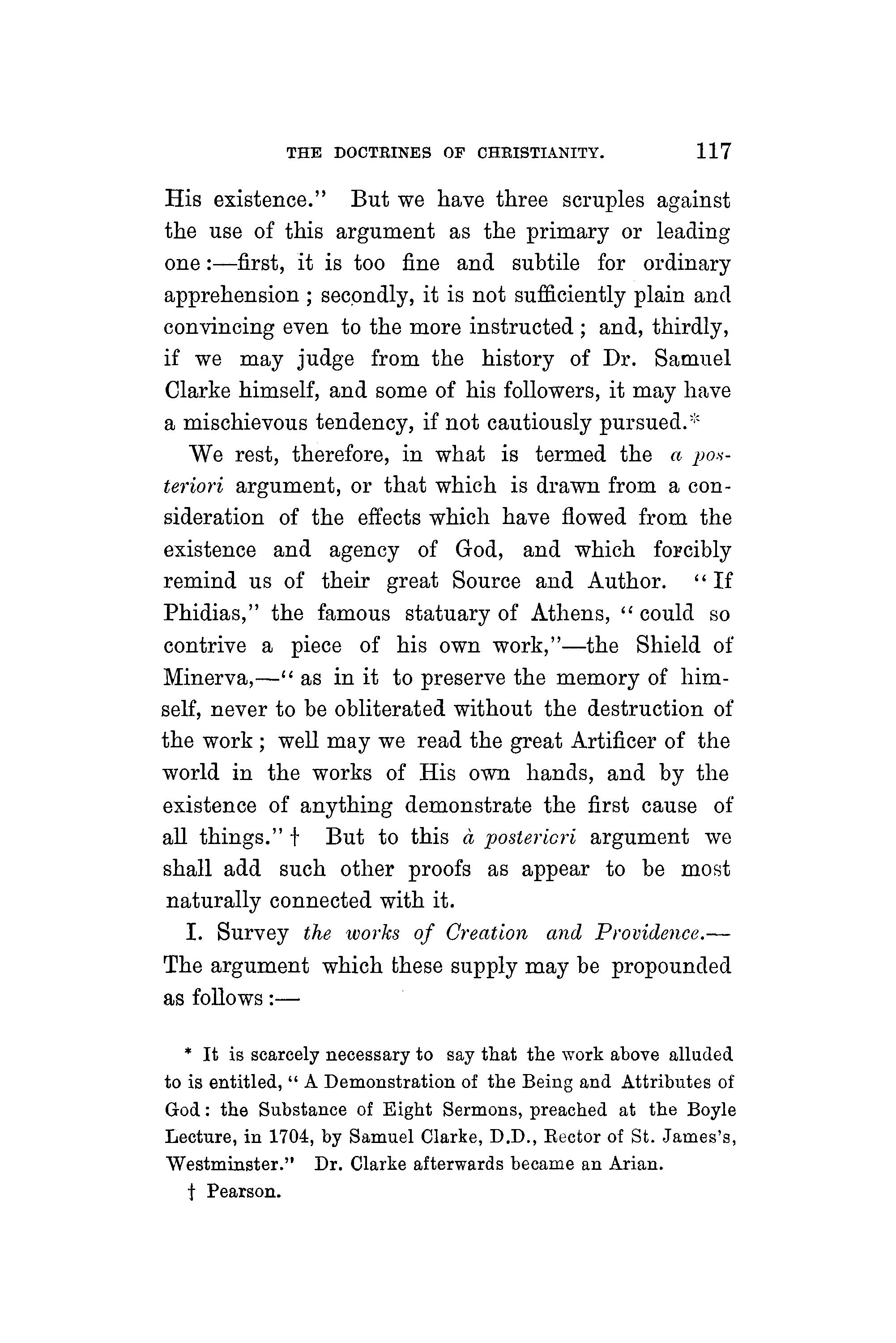
117
His existence." But we have three scruples against the use of this argument as the primary or leading one :-first, it is too fine and subtile for ordinary apprehension; secpndly, it is not sufficiently plain anc1 convincing even to the more instructed ; and, thirdly, if we may judge from the history of Dr. Samuel Clarke himself, and some of his followers, it may have a mischievous tendency, if not cautiously pursued. ,r-
We rest, therefore, in what is termed the ci posteriori argument, or that which is drawn from a consideration of the effects which have flowed from the existence and agency of God, and which fo11cibly remind us of their great Source and Author. " If Phidias," the famous statuary of Athens, "could so contrive a piece of his own work," -the Shield of Minerva,-" as in it to preserve the memory of himself, never to be obliterated without the destruction of the work; well may we read the great Artificer of the world in the works of His own hands, and by the existence of anything demonstrate the first cause of all things." t But to this a posteriori argument we shall add such other proofs as appear to be most naturally connected with it.
I. Survey the works of Creation and Providence.The argument which these supply may be propounded as follows :-
* It is scarcely necessary to say that the work above alluded to is entitled, " A Demonstration of the Being and Attributes of God: the Substance of Eight Sermons, preached at the Boyle Lecture, in 1704, by Samuel Clarke, D.D., Rector of St. James's, Westminster." Dr. Clarke afterwards became an Arian. t Pearson.
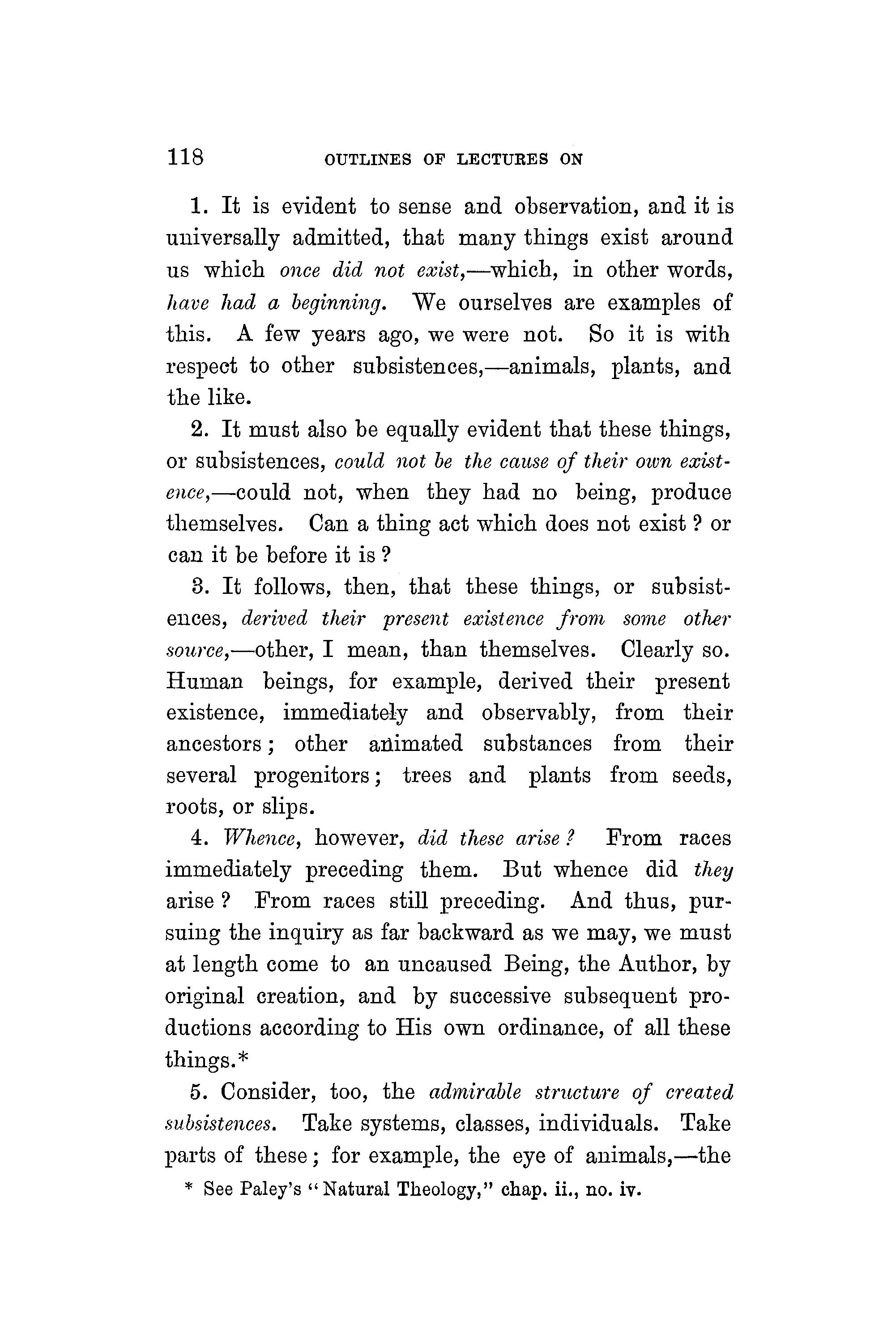
1. It is evident to sense and observation, and it is universally admitted, that many things exist around us which once did not exist,-which, in other words, have had a beginning. We ourselves are examples of this. A few years ago, we were not. So it is with respect to other subsistences,-animals, plants, and the like.
2. It must also be equally evident that these things, or subsistences, could not be the cause of their own existence,-could not, when they had no being, produce themselves. Can a thing act which does not exist ? or can it be before it is ?
3. It follows, then, that these things, or subsistences, derived their present existence frorn s01ne other source,-other, I mean, than themselves. Clearly so. Human beings, for example, derived their present existence, immediately and observably, from their ancestors ; other animated substances from their several progenitors; trees and plants from seeds, roots, or slips.
4. Whence, however, did these arise .2 From races immediately preceding them. But whence did they arise? From races still preceding. And thus, pursuing the inquiry as far backward as we may, we must at length come to an uncaused Being, the Author, by original creation, and by successive subsequent productions according to His own ordinance, of all these things.*
5. Consider, too, the admirable structure of created subsistences. Take systems, classes, individuals. Take parts of these ; for example, the eye of animals,-the
* See Paley's "Natural Theology," chap. ii., no. iv.

THE DOCTRINES OF CHRISTIANITY. 119
texture of plants,--nay, the very colour of grass. What skill and variety do they all discover! " 0 LoRD, how manifold are Thy works ! in wisdom hast Thou made them all."~'
6. Finally, observe the nice and exact adaptation of things to their several ends. Take, as an instance, the admirable system of the human body. And, combining all the parts of this argument together, do you not feel that, with one consenting testimony, they unequivocally evince that there is a God ?
" 'Tell them I AM,' Jehovah said To Moses, while earth heard in dread; And, smitten to the heart, At once above, beneath, around, All nature, without voice or sound, Replied, ' 0 LORD ! Thou art. ' "
IL So forcible is the preceding argument that it has gained the consent of all nations,-which may itself be regarded as a strong subsidiary proof. Nations, in things of human origin, differ extremely from each other; nay, in successive ages, they differ greatly from themselves. How is it that on this one point, with a few inconsiderable exceptions which cannot affect the general argument, they uniformly and always agree ?
III. Besides, have there never been prophecies in the world,-predictions of things long before they came to pass, and when they could not be foreseen by any human sagacity, but which, -as authentic history testifies, were duly accomplished in their season ? Whence came they ?
IV. And have there been no miracles,-departures
* Psalm civ. 24.

OUTLINES OF LECTURES ON
from the established ordinances of heaven and earth, which bespeak the interposition of a superhuman and omnipotent power? Whence came they?
V. Once more: mark the involuntary c01~fessions r~f Atheists theniselves, especially in seasons of danger, and at the approach of death. Why did Caligula dread a thunder-storm? Why did Volney tremble in a tempest? Why have many others quailed and shivered in nature's last strife? "A Deity," says Pearson, "will either be granted or extorted, and where it is not acknowledged it will be manifested."
1. Is it objected, that some persons have denied, or have professed to deny, the being of a Goel? Consider the paucity of their number,-their general character, -the incredible schemes which they have devised to elude the admission of a God,-and the instant rejection of their notions by others ;-consider these things, and you will perceive that their disbelief is attributable, not to the reason which is common to man, but to pitiable depravity and perverseness.
2. Is it objected that we cannot see Goel? Did the objector ever see his own soul, or that within him which thinks ?
3. Is it objected that we cannot comprehend Goel? And what inferior nature can comprehend that which is superior to itself?
References.-Particularly, to Pearson on the Creed, Article I. See also Young's "Night Thoughts," ix., 1449, etc.; and the singularly compact and forcible argument drawn from a "Chain," as contained in "The Religion of Nature Delineated," pp. 67, 68.

INTRODUCTORY REMARKS ON THE PROPERTIES OF THE DIVINE NATURE.
As we have now attempted to ascertain the true notion of God, and to weigh the arguments which most clearly prove His existence, our way is prepared for an examination of the more conspicuous properties of the Divine nature. To facilitate this part of our studies, I think it will not be amiss, with the reverence which such a subject ought always to inspire, to prefix a few general remarks, as introductory to our subsequent inquiries.
These remarks will especially relate to the titles by which the properties of the Divine nature are usually designated,-to the distribution qf them, into classes, so customary with theological writers,-and to the admirable harmony which subsists among them all.
I. The titles by which the properties of the Divine nature are distinguished might easily be multiplied. I confine myself to three, which are most common and important; and I name them in the order which appears to be the most correspondent to their relative significancy and force,-Attributes, Perfections, and Glories.
1. Attributes is a plain and simple title. As applied to the Divine properties, it denotes that they are properties which ought to be attributed to God, and affirmed concerning Him.

2. Pe1jections is a stronger title. It represents to us that the several properties of God are most pe1ject, both in kind and degree, and that they display that one absolute pe1jection which resides ineffably and eternally in Himself.
3. Glories is a still more expressive title. It exhibits the perfect attributes of God as disclosed in the several manifestations of Himself to His creatures,-as shining forth with a light which never decays or dies,-and as claiming from all created intelligences a constant revenue of praise.
II. The distribution of these properties into classes, as is customary with theological writers, may be explained in the following manner :--
1. An attentive student will perceive that some properties of the Divine nature exist irrespectively of any particular relation to the creature ;-such as Unity, Spirituality, Eternity, Immutability, Omnipotence, Omnipresence, Omniscience.
2. He will further perceive that some properties are particularly displayed in relation to the creature,-in the ways and government of God ;-such as Wisdom, Goodness, Sanctity, Justice, Truth.
8. He will then learn that, in virtue of this distinction, divines have made a distribution of the attributes of the Great Supreme into two classes,-natural and moral. A person may be excused who does not particularly dwell upon this classification. But as it is very common, I will arrange our following meditations with a reference to its intention, though without an adherence to its peculiar phraseology.
III. The admirable harnwny which subsists among

all the properties of the Divine nature is a subject which demands our closest attention. These properties are not separate from each other,-they are not contradictory to each other ; but they are wonderfully consistent with the entire simplicity of the Divine Essence.
Perhaps I may venture, with great 1·everence, to illustrate this point according to a thought which has been suggested by different writers, and which is briefly but ably propounded by Dr. Wardlaw, in his "Discourses on the Socinian Controversy."*
1. "God is light." t Light is His chosen and constant symbol, under which, in our present infirm and mortal state, we are taught to contemplate Him.
2. But when you survey the light, in its pure and unstained radiation, are you not struck, among other things, with the absence of all apparent colour ? So far as your eye can discern and distinguish it is perfectly colourless.
3. Do not, however, draw a hasty conclusion. If you transmit the purest ray of light through a prismatic glass, you will find that, perfectly colourless as it seems, it actually contains all the primary colours.
4. Yet these, as they are blended and mixed up in the light itself, ar 1 e wholly undistinguishable. They are harmonized together; they are attempered into one colourless emanation.
5. Let us apply this thought. We may contemplate the properties of the Divine nature severally and distinctly, and may sometimes inadvertently set them at variance with each other. But as they exist in
* Discourse vii. t 1 John i. 5.

God they exist in pe1f ect itnion and harmony ; they constitute His one itnclivided glory. He "is light; and in Him is no darkness at all." But I refrain from a more minute prosecution of this subject. "Dangerous it were for the feeble brain of man to wade far into the doings," or perfections, " of the Most High; whom although to know be life, and joy to make mention of His name ; yet our soundest knowledge is to know that we know Him not as indeed He is, neither can know Him ; and our safest eloquence concerning Him is our silence, when we confess without confession, that His glory is inexplicable, His greatness above our capacity and reach."*
* Hooker's "Ecclesiastical Polity," book i., ch;.p. ii.
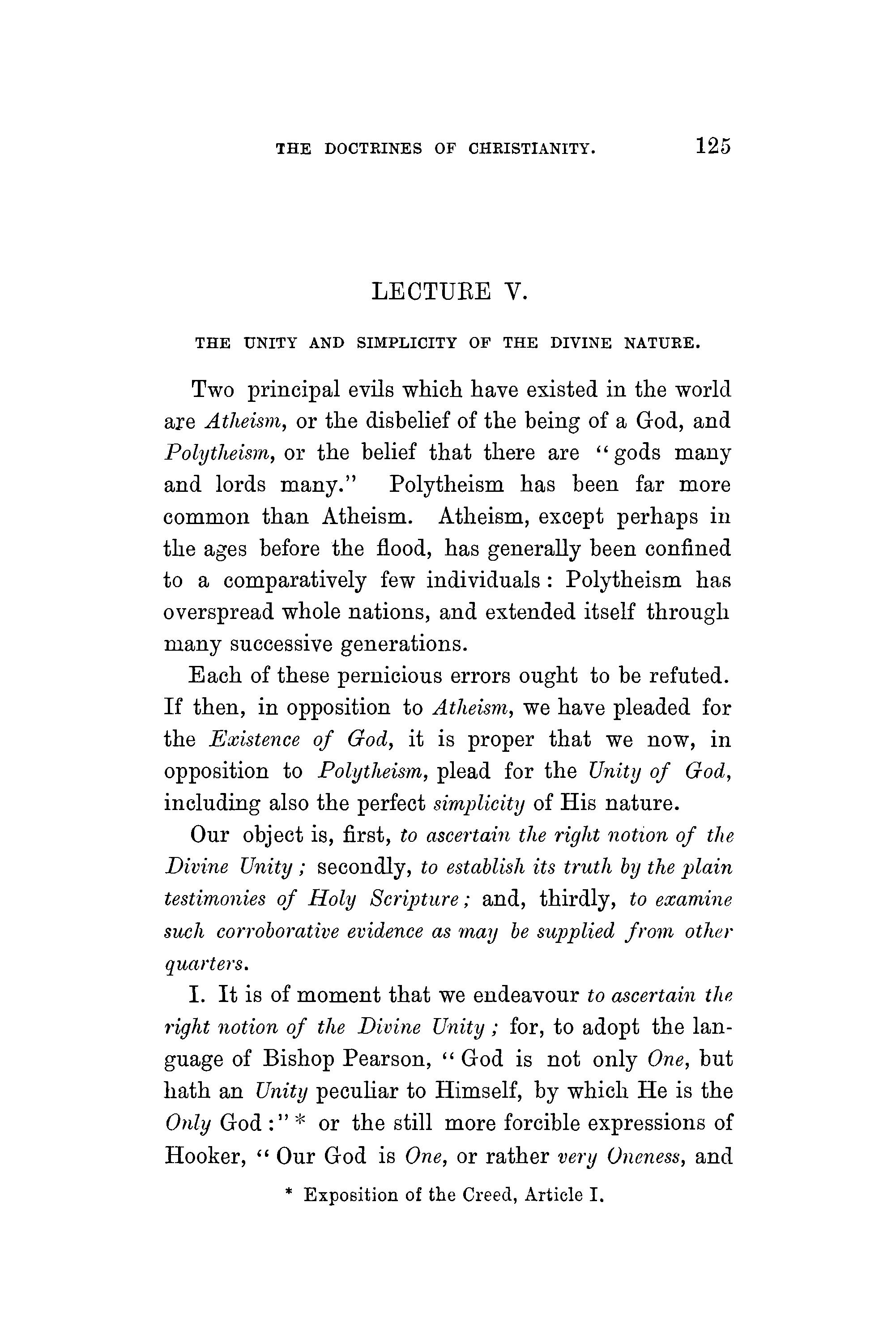
THE UNITY AND SIMPLICITY OF THE DIVINE NATURE.
Two principal evils which have existed in the world are Atheism,, or the disbelief of the being of a God, and Polytheism, or the belief that there are " gods many and lords many." Polytheism has been far more common than Atheism. Atheism, except perhaps in the ages before the flood, has generally been confined to a comparatively few individuals : Polytheism has overspread whole nations, and extended itself through many successive generations.
Each of these pernicious errors ought to be refuted. If then, in opposition to Atheism, we have pleaded for the Existence of God, it is proper that we now, in opposition to Polytheism, plead for the Unity of God, including also the perfect simplicity of His nature.
Our object is, first, to ascertain the right notion of the Divine Unity; secondly, to establish its truth by the plain testimonies of Holy Scripture; and, thirdly, to examine such corroborative evidence as may be supplied frorn other quarters.
I. It is of moment that we endeavour to ascertain the right notion of the Divine Unity; for, to adopt the language of Bishop Pearson, "God is not only One, but hath an Unity peculiar to Himself, by which He is the Only God : '' * or the still more forcible expressions of Hooker, "Our God is One, or rather very Oneness, and * Exposition of the Creed, Article I.
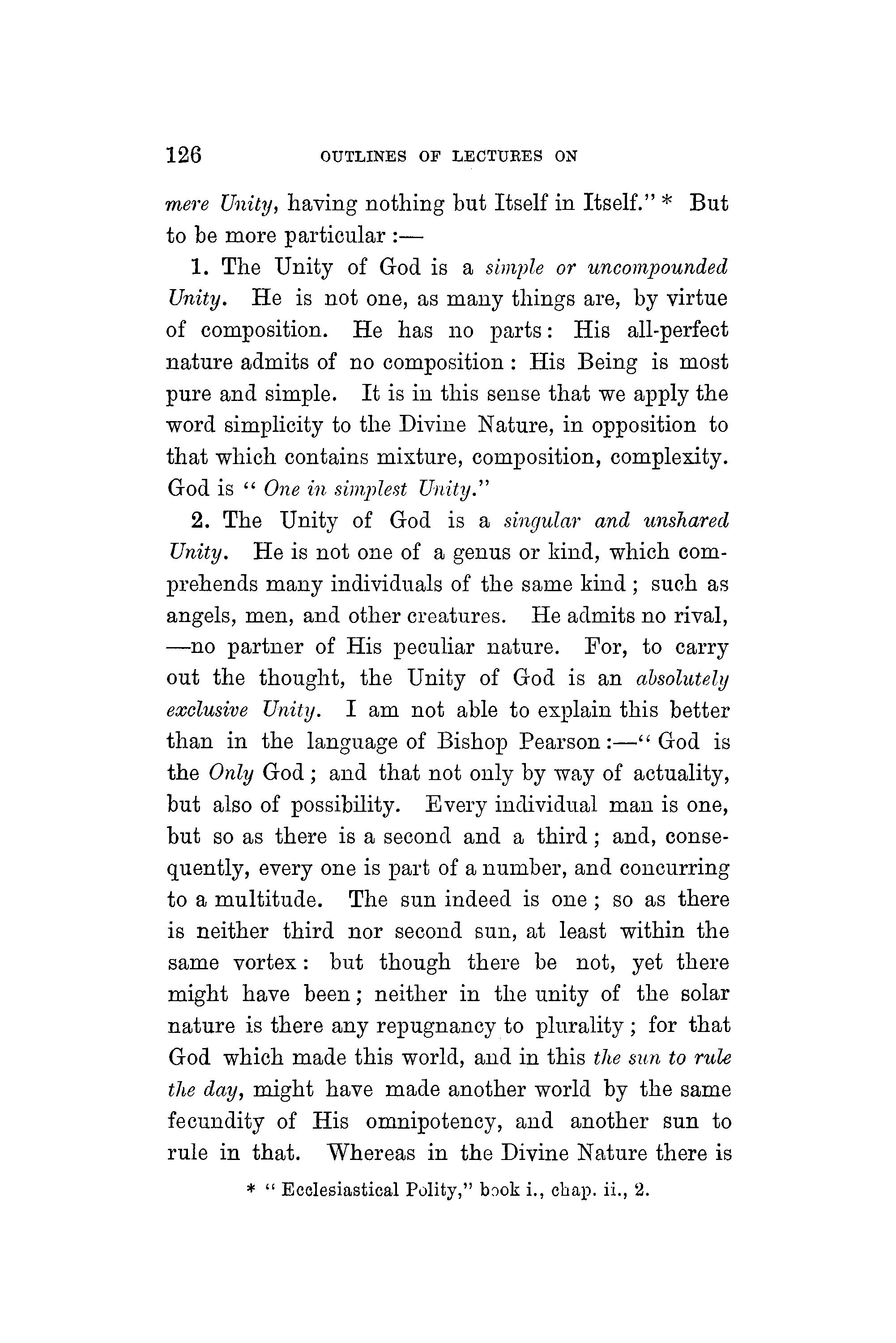
OUTLINES OF LECTURES ON
mere Unity, having nothing but Itself in Itself."* But to be more particular :-
1. The Unity of God is a simple or uncompounded Unity. He is not one, as many things are, by virtue of composition. He has no parts: His all-perfect nature admits of no composition : His Being is most pure and simple. It is in this sense that we apply the word simplicity to the Divine Nature, in opposition to that which contains mixture, composition, complexity. God is " One in simplest Unity."
2. The Unity of God is a singular and itnsharecl Unity. He is not one of a genus or kind, which comprehends many individuals of the same kind; such as angels, men, and other creatures. He admits no rival, -no partner of His peculiar nature. For, to carry out the thought, the Unity of God is an absolutely exclusive Unity. I am not able to explain this better than in the language of Bishop Pearson :-'' God is the Only God; and that not only by way of actuality, but also of possibility. Every individual man is one, but so as there is a seconcl and a third ; and, consequently, every one is part of a number, and concurring to a multitude. The sun indeed is one ; so as there is neither third nor second sun, at least within the same vortex : but though there be not, yet there might have been; neither in the unity of the solar nature is there any repugnancy. to plurality ; for that God which made this world, and in this the sun to mle the day, might have made another world by the same fecundity of His omnipotency, and another sun to rule in that. Whereas in the Divine Nature there is
* "Ecclesiastical Polity," b'.lok i., chap. ii., 2.

an intrinsical and essential singularity, because no other being can have any existence but from that; and whatsoever essence hath its existence from another is not God.",:,
II. Let us next attempt to establish the truth of the Divine Unity by the plain testinwnies of Holy Scripture. Of these we select the following :-
Deut. vi. 4.-" Hear, 0 Israel: the LoRDour God is one LoRD; " or, more literally, " Jehovah our God, Jehovah is One.''
Deut. iv. 35.-" Unto thee it was showed, that thou I mightest know that the LoRDHe is God ; there is none else beside Him."
Deut. xxxii. 39, 40.-" See now that I, even I, am He, and there is no god with, J.lle: I kill, and I make alive; I wound, and I heal : neither is there any that can deliver out of My hand. For I lift up My hand to heaven, and say, I live for ever."
1 Sam. ii. 2.-" There is none holy as the LoRD: for there is none beside Thee : neither is there any rock like our God.''
2 Sam. xxii. 32, and Psalm xviii. 31.-'' For who is God, save the Lord_? and who is a rock, save our God?"
Isai. xliv. 6.-'' Thus saith the LoRD, the King of Israel, .and His Redeemer the Lord of hosts ; I am the first, "-without beginning,-" and I am the last," -without end; "and beside Me there is no God.'' So, also, verse 8 : '' Is there a God beside Me ? yea, there is no God, ''-or " rock, "-beside Me, namely ; "I know not any." Thus, as Bishop Pearson observes,
* Pearson, as above. See the Extract from Maimonides at the end of this Lecture.

OUTLINES OF LECTURES ON
'' He who hath infinite knowledge knoweth no other God beside Himself."
Isai. xlv. 5, 6, 7, 18, 21, 22.-" I am the LoRD, and there is none else ; there is no God beside JJ1e: I girded thee, though thou hast not known Me : that they may know from the rising of the sun, and from the west," -that is, through all the earth,-'' that there is none beside Me."-" I form the light, and create darkness: I make peace, and create evil : I the LoRDdo all these things."-" For thus saith the LoRDthat created the heavens; God Himself that formed the earth and made it ; He hath established it, He created it not in vain, He formed it to be inhabited : I am the LoRD; and there is none else."-" Tell ye, and bring them near; yea, let them take counsel together: who hath declared this from ancient time ? who hath told it from that time? have not I the LoRD? and there is no God else beside JYie; a just God and a Saviour; there is none beside lrfe. Look unto Me, and be ye saved, all the ends of the earth : for I am God, and there is none else."
John xvii. 3.-" And this is life eternal, that they might know Thee, the only true God, and Jesus Christ, whom Thou hast sent."
1 Cor. viii. 4-6.-" As concerning therefore the eating of those things that are offered in sacrifice unto idols, we know that an idol is nothing in the world, and that there is none other God but one. For though there be that are called gods, whether in heaven or in earth, (as there be,"-so-called, namely, "gods many, and lords many,) but to us there is but one God, the Father, of whom are all things, and we in," or "for,"

"Him; and one Lord, Jesus Christ, by whom are all things, and we by Him." -These testimonies surely are most decisive.
III. We may now examine such corroborative evidence as is supplied from other quarters, and such as, when viewed in connection with the preceding testimonies, and in subordination to them, has great force.
1. One proof is drawn from the Self-Existence of Goel, as "the prime and original cause of all things, as an independent Being upon which all things else depend, and likewise the ultimate and final cause of all. But in this sense two prime causes are inimaginable, and for all things to depend of one, and to be more independent beings than one, is a clear contradiction." *
2. A second proof is drawn from the Infinite Pe,fections of God :-for " if there were more gods than one, then were not all perfections in one ; neither formally, by reason of their distinction ; nor eminently and virtually, for then one should have power to produce the other; and that nature which is producible is not Divine. But all acknowledge God to be absolutely and infinitely perfect, in whom all perfections imaginabie which are simply such must be contained formally, and all others which imply any mixture of imperf ection, virtually.'' t
8. A third proof is drawn from the Supreme Doininion of God :-for "if there were more supreme governors of the world than one, each of them absolute and free, they might have contrary determinations concerning the same things, than which nothing can be more prejudicial unto government. God is a God of order, * Pearson. t Ib'id.

OUTLINES OF LECTURES ON
not confusion ; and therefore of unity ; not admitting multiplication. If it be better that the universe should be governed by one than many, we may be assured that it is so, because nothing must be conceived of God but what i_s best. He therefore who made all things, by that right is Lord of all ; and because all power is His, He alone ruleth over all." *
4. A fourth proof is drawn from the Analogy of Nature. You everywhere discover signs of a Monarchy. There is one Sun in our system ;-there is one spirit m man.
5. A fifth proof, on which great stress is laid, is drawn from the Unity of Design observable in all the works of God ; and from which it is thought that we may safely infer the Unity of the Designer.t
The practical application of this subject is found in Deut. vi. 5, compared with Mark xii. 29, 30.
REFERENCEs.-Pearson, Artidle I.; Watson's "Institutes," part second, chapter ii. ;-to whom may be added T. H. Horne, Paley, and many others.
Note on the first division of this LeGture.-The language of Maimonides, which Bishop Pearson quotes and translates, is worthy of particular attention on the isubject of the Divine Unity. It is this:-" God is one, not two, or more than two, but only One: whose Unity is not like to that of the Individuals of this world, neither is He one by way of Species comprehend·ing many individuals, neither one in manner of a body which is divisible into parts and extremes : but He is so one as no Unity like His is to bef ouncl in the world."
* Pearson. t See Paley's "Natural Theology," chap. xxv.

THE Spirituality of the Divine Nature is a subject which we feel to be placed very far beyond the limits of our capacity. So connected are we with material substances, and so unable to think except through the medium of sensible imagery, that when we attempt to form an adequate conception of pure spirituality, we are at once confounded and lost. For this reason, it is especially needful that we should confine ourselves, on such topics, to the language of Scripture, plainly interpreted, and faithfully applied.
Let us, then, first, e.ramine the views which the Holy Scriptures Sllj)JJ7!f concerning this transcendent pe1fection of the Divine Nature; and, secondly, weigh the practical mes which fr clearl!Jsuggests.
I. The views which the Holy Scriptures supply concerning the Spiritnality of God, may perhaps be arranged as follows :-
1. They ascribe to Him an essential Spirituality. " God is a Spirit ; " * a Spirit in His very nature and essence. The word spirit designates what He is. Spirit is a title of His very nature. " God, a Spirit."
2. They ascribe to Him an absolute and exclusive Spirituality. What I mean is that, consistently with the ineffable simplicity to which we referred in our last Lecture, the Most High is a pure Spirit, imma-
* John iv. 24.
K 2
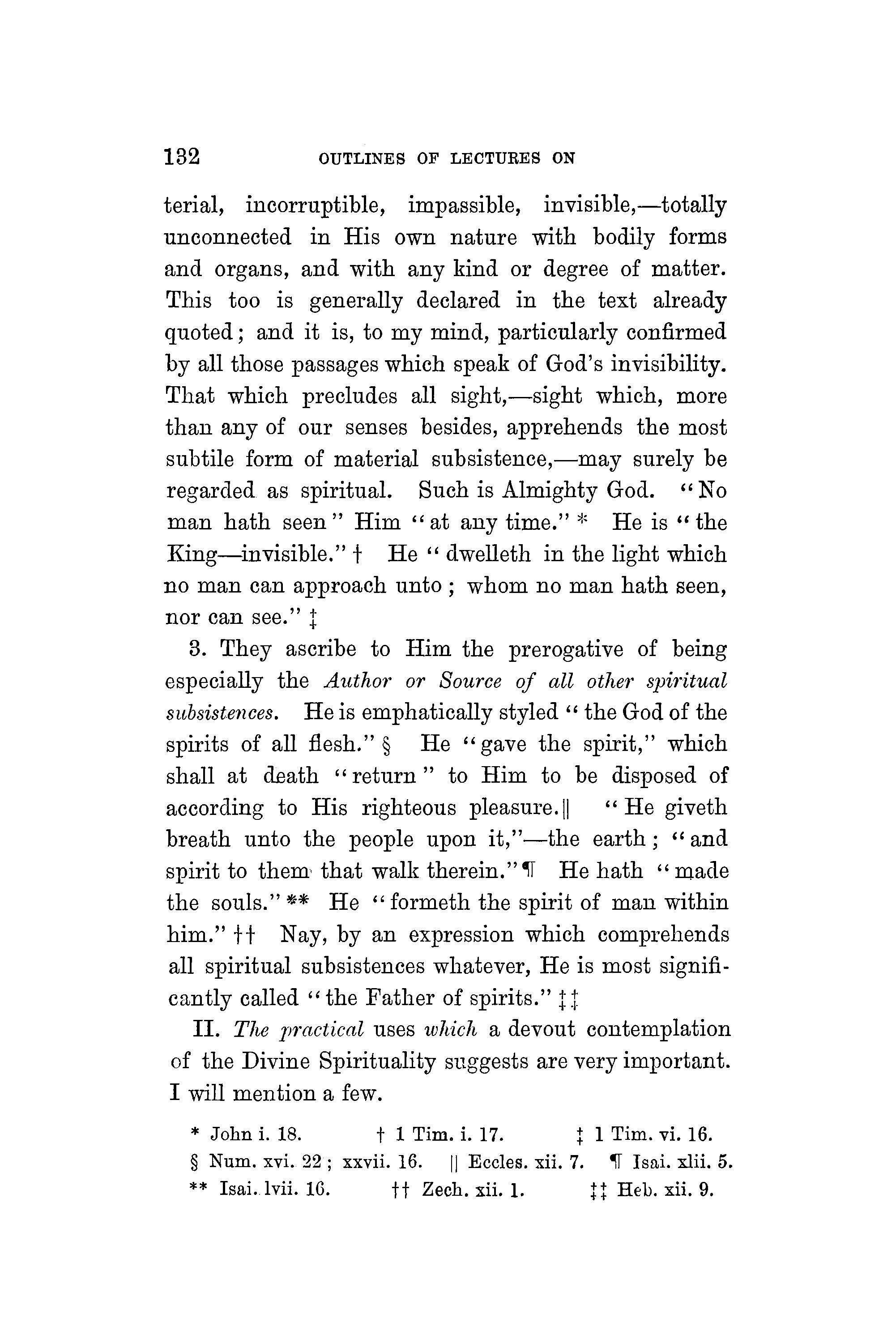
OUTLINES OF LECTURES ON
terial, incorruptible, impassible, invisible,-totally unconnected in His own nature with bodily forms and organs, and with any kind or degree of matter. This too is generally declared in the text already quoted; and it is, to my mind, particularly confirmed by all those passages which speak of God's invisibility. That which precludes all sight,-sight which, more than any of our senses besides, apprehends the most subtile form of material subsistence,-may surely be regarded as spiritual. Such is Almighty God. " No man hath seen" Him "at any time." * He is "the King-invisible." t He "dwelleth in the light which no man can approach unto; whom no man hath seen, nor can see.'' t
3. They ascribe to Him the prerogative of being especially the Author or Source of all other spiritual subsistences. He is emphatically styled" the God of the spirits of all flesh." § He "gave the spirit," which shall at death "return" to Him to be disposed of according to His righteous pleasure. II " He giveth breath unto the people upon it," -the earth ; " and spirit to them that walk therein."~ He hath " macle the souls." ** He " formeth the spirit of man within him." tt Nay, by an expression which comprehends all spiritual subsistences whatever, He is most significantly called "the Father of spirits." tt
IL The practical uses which a devout contemplation of the Divine Spirituality suggests are very important. I will mention a few.
* John i. 18. t 1 Tim. i. 17. ! 1 Tim. vi. 16.
§ Num. xvi. 22 ; xxvii. 16. II Eccles. xii. 7. Isai. xlii. 5.
** Isai. lvii. 16. tt Zech. xii. I. +t Heb. xii. 9.

1. It is certainly of consequence that, when we think of God, we should abstain from all gross ancl rnaterial conceptions,from every thing that would image Him to our minds in any way inconsistent with His proper spirituality, for "to whom will ye liken Goel? or what likeness will ye compare unto Him ? " " to whom shall" He "be equal?" "to whom will ye make " Him " equal, and compare " Him " that " they " may be like ? " * The Scriptures do indeed sometimes speak of God after the manner of men, and ascribe to Him human members and properties; but this is evidently done in condescension to our capacities, and is sufficiently guarded, in the same or in other passages, against all misapprehension and abuse.
2. It is, consequently, of the utmost importance that man should always most carefully shun the f abrication and worship of images, though they may be professedly regarded merely as signs, remembrancers, or representatives of God. The Scriptures are full of warnings against this. t " Take ye therefore good heed unto yourselves," said Moses to the children of Israel ; "for ye saw no manner of similitude on the day that the LoRDspake unto you in Horeb out of the midst of the fire : lest ye corrupt yourselves, and make you a graven image, the similitude of any figure, the likeness of any male or female, the likeness of any beast that is on the earth, the likeness of any winged fowl that flieth in the air, the likeness of any thing that creepeth on the ground, the likeness of any fish that is in the
• Isai. xl. 18, 25 ; xlvi. 5.
t See, as a specimen, Isai. xliv.-xlvi

OF LECTURES ON
waters beneath the earth: and lest thou lift up thine eyes unto heaven, and when thou seest the sun, and the moon, and the stars, even all the host of heaven, shouldest be driven to worship them, and serve them, which the LoRDthy God hath divided unto all nations under the whole heaven."*
3. It is further of the greatest moment that all the worship which we present to God should be spiritual and sincere. This is our Lord's own application of the subject. " God is a Spirit : and they that worship Him, must worship Him in spirit and in truth." t
4. Finally, we ought to aspire after a holy spirituality in our views, desires, and affections, a constant superiority over the mate-rial part of our nature, which should be kept in its proper place. Pagan wisdom itself suggests this to us. "All our ability," says Sallust, "is placed in the soul and the body. We more use the command of the soul, the service of the body. The one is common to us with the gods, the other with brutes." t Let that, then, to which God has assigned the dominion, possess its right, enlightened, sanctified, elevated by an influence which the pagan historian did not know.
* Deut. iv. 15-19. i· John iv. 24.
t '' Omnis nostra vis in animo et corpora sit a est. Animi imperio, corporis servitio magis utimur. Alterum nobis cum dis, alterum commune cum belluis est."-Bell. Gatil., cap. i.
I HAVE joined the Eternity and Immutability of God together, partly, because they are in their own nature inseparable, and, partly, because they are so generally united in the Holy Scriptures that the passages which declare the one, declare or imply the other also. Properly speaking, our present subject is God's Imm,utable Eternity,-a subject of stupendous import.
Pursuing the general plan which I adopted in the last Lecture, I purpose, first, to consider the representations which the Scriptures afford us of God's Immutable Eternity ; and, secondly, to mention a few, at least, of the practical lessons which this great subject teaches.
I. Let us survey the representations which the Scriptures afford us of this Divine perfection; proceeding, as usual, on the principle of selection.
1. It is an entire and proper eternity ;-an eternity, as the Schools speak, ct parte ante, and an eternity a parte post,-duration which never began, and duration which shall never end,-being unmeasured by any scale of succession, and therefore inappreciable by any finite mind. The Most High is " the LoRD," or Jehovah, and, as such, " the everlasting God." * He is " the eternal God," our " refuge." t He is " from everlast-
* Gen. :x:xi.33.
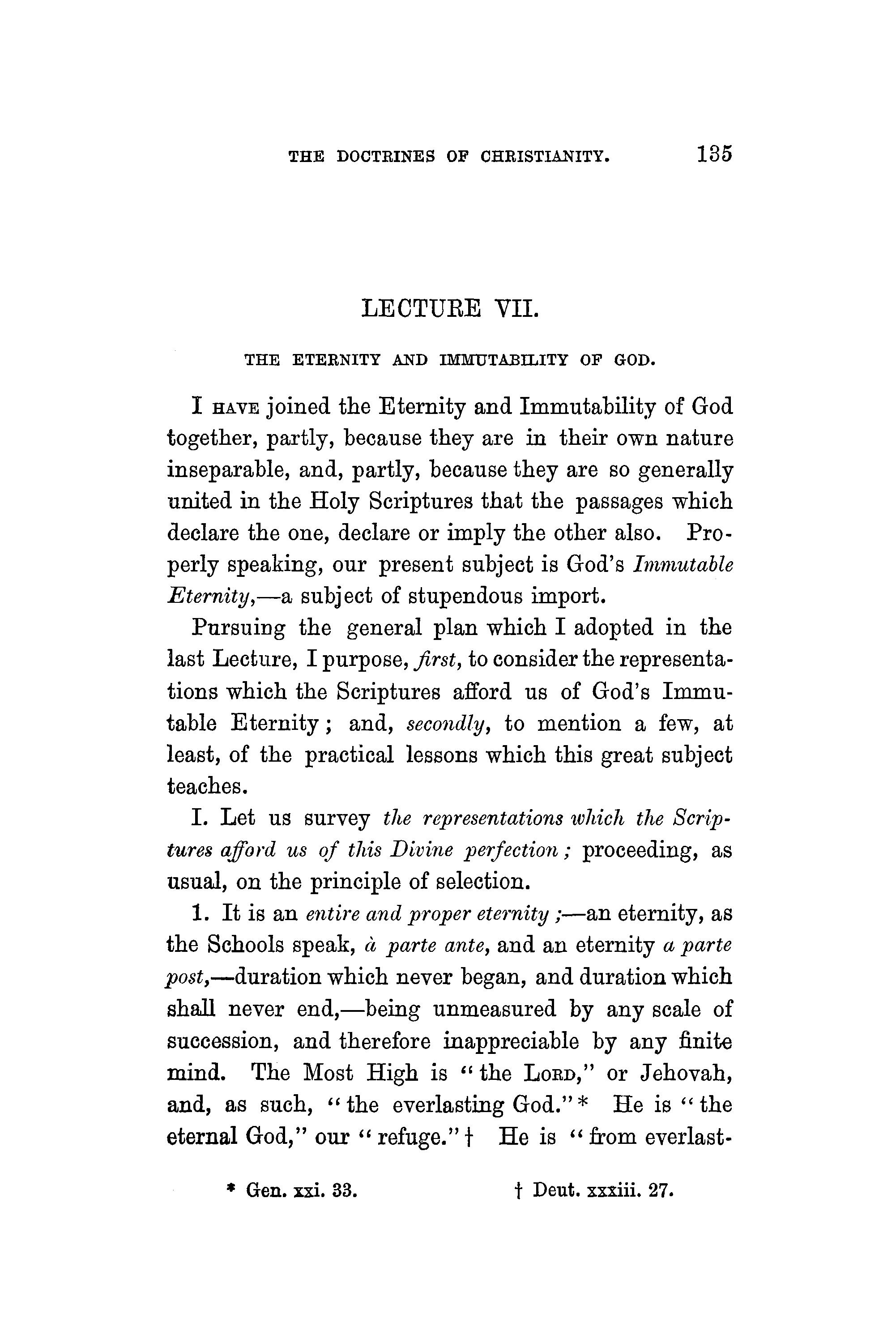
t Deut. xuiii. 27.

OUTLINES OF LECTURES ON
ing to everlasting."* His " power and Godhead" are "eternal." t He" hath life in Himself."t He" only hath immortality." § He " inhabiteth eternity." II He " is," and He " was," and He " is to come." 1
2. It is an eternity which knows no variation or change, -an eternity strictly inimutable. The Scriptures teach us to view this subject in connection with the Essential Existence and the Moral Administrations of Almighty God:
With His Essential Existence. " Thy years are throughout all generations. Of old hast Thou laid the foundation of the earth : and the heavens are the work of Thy hands. They shall perish, but Thou shalt endure : yea, all of them shall wax old like a garment ; as a vesture shalt Thou change them, and they shall be changed : but Thou art the same, and Thy years shall have no end."**
With His Moral Adniinistrations. "God is not a man, that He should lie ; neither the son of man, that He should repent," etc. tt "The Strength" (Margin, "Eternity, or Victory") "of Israel will not lie nor repent : for He is not a man, that He should repent." t t '' I am the LoRD,I change not ; therefore ye sons of Jacob are not consumed."§§ "The gifts," then, "and calling of God are without repentance." 1111 "Every good gift and every perfect gift is from above, and
• Psalm xc. 2. t Rom. i. 20. t John v. 26. § 1 Tim. vi. 16. II Isai. lvii. 15. , Rev. i. 4. See Note at the end of this Lecture.
** Psalm cii. 24-27. tt Num. xxiii. 19.
H 1 Sam. xv. 29. §§ Mal. iii. 6.
1111Rom. xi. 29.
THE DOCTRINES OF CHRISTIANITY, 137
cometh down from the Father of lights, with whom is no variableness, neither shadow of turning."*
3. It is an eternity which associcttes itself with the original gift of a future imniortality to all the creatures who shall enjoy that gift, and with its perpetual maintenance and support. With God is "the fountain of life," t-the fountain whence all the streams of life issue, and by which they are constantly supplied. " Thou wilt show me the path of life : in Thy presence is fulness of joy," etc.t God is "the fountain of living waters."§ Grace reigns "through righteousness unto eternal life ; " II for " this is the record, that God hath given to us eternal life, and this life is in His Son." 1 But passages on this subject might be multiplied almost without end.
II. Let us mention a few at least of the practical l,essonswhich this great subject teaches.
1. It satisfies us concerning the certainty of the Divine purposes and administrations. They cannot fail. God is "an everlasting King."** His "dominion is an everlasting dominion." tt He is " an everlasting light." t t
2. It encourages our personal confidence in God, amidst all the changes and decays of this mortal state. '' Trust ye in the LoRD for ever : for in the LoRD JEHOVAH is everlasting strength."§§ The light of that Uncreated Sun shines with a calm and steady ray amidst all the heavings and shiftings of life's rough sea.
* James i. 17.
§ Jer, ii. 13.
** Jer, x. 10.
§§ Isai. xxvi. 4.

t Psalm xxxvi, 9.
II Rom, v. 21.
tt Dan. iv. 34.
t Psalm xvi. 11.
1 John v. 11.
t t Isai. Ix. 19.

8. It sustains our expectations in the delay which may sometimes appear in the accomplishment of the Divine promises ;-a lesson which St. Peter has placed in a forcible light : " Be not ignorant of this one thing, that one day is with the Lord as a thousand years, and a thousand years as one day. The Lord is not slack concerning His promise," etc. *
4. May I not add that a consideration of God's Immutable Eternity should stimulate us to seek afreedom from all fickleness, a steadiness of principle, purpose, action l It is a good thing to be thus established, and to feel that our " heart is fixed." t
Note.-Two passages occur in these citations to the effect that God has life in HiJnself, and that He only has immortality. He is "of infinite life," to adopt an expression of Grotius, "that is, eternal." God's essential and independent life is, then, a proof of His proper eternity. The Scriptures abound in this proof. I refer especially to the title so often found of "the LIVINGGocl,"-and to the solemn forms of adjuration, "as truly as I live,"-" as I live, saith the LoRD,"-" I lift up my hand to heaven, and say, I live for ever,"'' as the LoRD liveth,'' -and others of a like kind. Opportunity may arise of our dwelling more particularly on this topic,-when we shall speak, for example, of the Deity of Christ.
* 2 Peter iii. 8, 9. t Psalm lvii. 7 ; cviii. 1.

THE OMNIPOTENCEOF GOD,
THE Omnipotence, or Almightiness, of God is declared in the Holy Scriptures with extraordinary frequency and force. It forms the subject of many sublime descriptions. A student who peruses the Book of Job, the Psalms, the writings of the Prophets, and the several parts of the New Testament, especially some of St. Paul's Epistles and the Apocalypse, can scarcely fail to be deeply impressed and affected with the manner in which the Inspired penmen dwell on this topic, while t~ey seek to place it before us in the most conspicuous and powerful light.
God is '' mighty in strength.'' He '' removeth the mountains, and they know not:" He "overturneth them in His anger." He " shaketh the earth out of her place, and the pillars thereof tremble." He '' commandeth the sun, and it riseth not ; and sealeth up the stars." He "alone spreadeth out the heavens, and treadeth upon the waves of the sea." He "doeth great things past finding out; yea, and wonders without number." * " H I speak of strength, lo, He is strong." t "Give," then, "unto the LoRD, 0 ye
* Job ix. 4- 8, 10.
t Job ix. 19. See also Job xii. 14-25; xxvi. 7-14; xxxviii. 4-41; xxxix.; xl. ; xli.; xlii. 2.
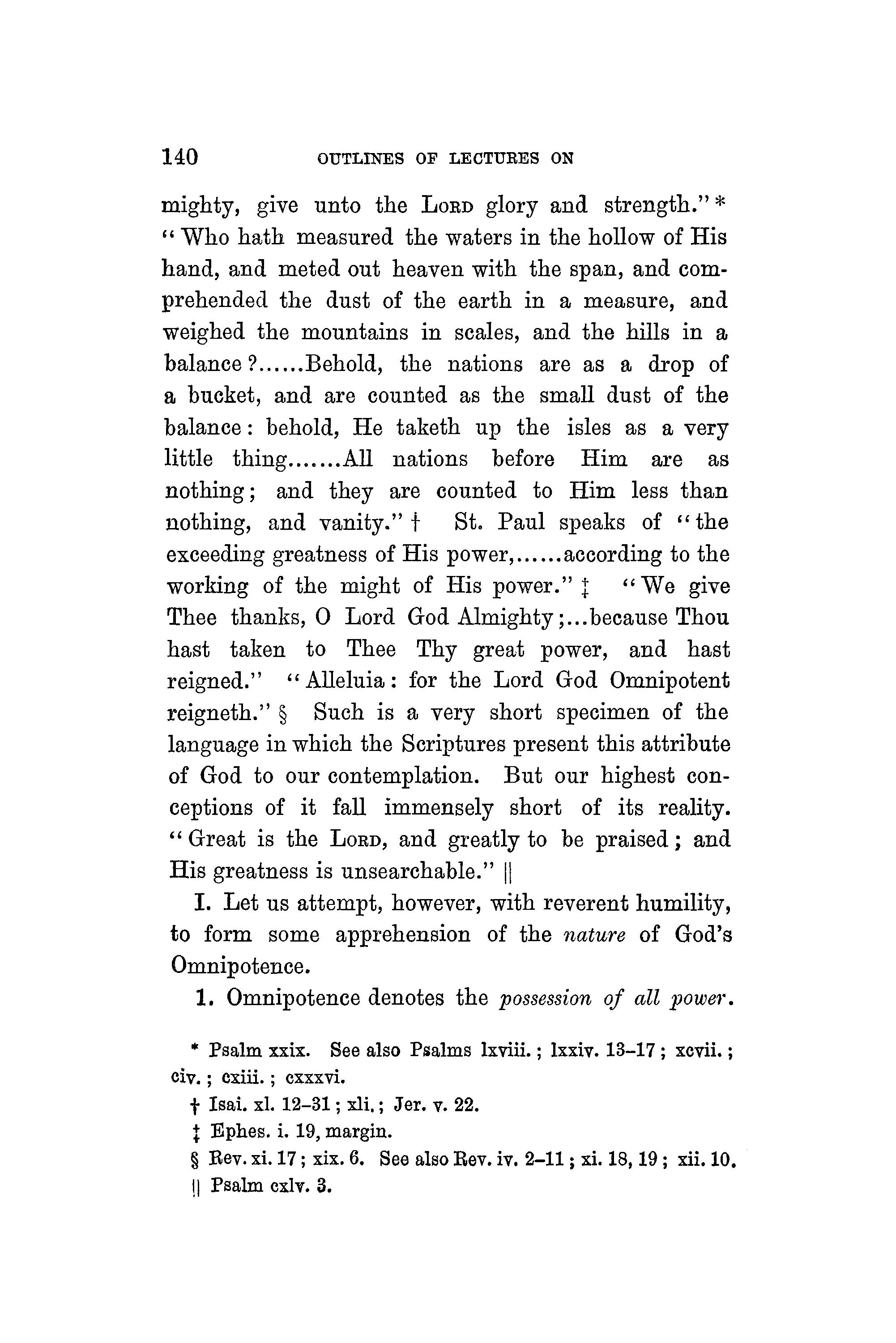
OUTLINES OF LECTURES ON mighty, give unto the LoRD glory and strength."*
" Who hath measured the waters in the hollow of His hand, and meted out heaven with the span, and comprehended the dust of the earth in a measure, and weighed the mountains in scales, and the hills in a balance? ...... Behold, the nations are as a drop of a bucket, and are counted as the small dust of the balance: behold, He taketh up the isles as a very little thing ....... All nations before Him are as nothing ; and they are counted to Him less than nothing, and vanity." t St. Paul speaks of "the exceeding greatness of His power, ...... according to the working of the might of His power." t "We give Thee thanks, 0 Lord God Almighty ; ... because Thou hast taken to Thee Thy great power, and hast reigned.'' '' Alleluia : for the Lord God Omnipotent reigneth." § Such is a very short specimen of the language in which the Scriptures present this attribute of God to our contemplation. But our highest conceptions of it fall immensely short of its reality. " Great is the LoRD, and greatly to be praised ; and His greatness is unsearchable." II
I. Let us attempt, however, with reverent humility, to form some apprehension of the nature of God's Omnipotence.
1. Omnipotence denotes the possession of all power.
* Psalm xxix. See also Psalms lxviii. ; lxxiv. 13-17 ; xcvii. ; civ. ; cxiii. ; cxxxvi.
t Isai. xi. 12-31; xli,; Jer. v. 22.
t Ephes. i. 19, margin.
§ Rev. xi.17; xix. 6. See also Rev. iv. 2-11; xi. 18, 19; xii.10.
!I Psalm ex.Iv.3.

DOCTRINES OF CHRISTIANITY. 141
This thought is expressed by the word itself. God is not only powerful,-not only supremely powerful,He is the Source, Centre, Assemblage, of all the might that is ; containing in Himself the unfathomable depths of Omnipotence, as of Being.
2. Omnipotence, accordingly, implies also the cornmunication of every kind and degree of power to the creatures, which they enjoy. It is true that a rational and accountable being may abuse the power which God imparts, as it may abuse His other benefits; but this is no proof that the power did not come from God, or that it is not, for wise purposes, maintained by His Providence.*
3. Omnipotence farther comprehends the pe1f ect control of all things,-above, around, beneath,-inanimate, animate, rational, angelical. God swathes the ocean as a helpless infant ; t He fastens His " hook " in the "nose," and His " bridle " in the " lips," of the haughtiest sovereign ; t Behemoth and Leviathan, untameable by man, submit to Him ; angels tremble amidst the glories of His love, fiends shrink beneath the terrors of His wrath.
II. Proofs of God's Omnipotence abound in all His works and ways.
1. View Creation. Examine individuals, systems, worlds beyond worlds, scattered, in boundless profusion, through the wide realms of space. They sprang forth at the voice, and they are sustained by the hand, of God. All are "vouchers of Omnipotence."
* See Note 1 at the end of this Lecture.
t Job xxxviii. 9. t IsaL :x:xxvii.29.

2. Think of Providence. Carry your meditations through the range of created existence, as far as it can be known by you. See the adaptation of parts in each individual,-the control of seasons and climates, -the ample provision incessantly supplied for all. With what silent energy, with what facility of power, does God daily order all things ! The '' still small voice " of His agency may be disregarded by "thoughtless, thankless, inconsistent man; " hut it is heard through the vast expanse of nature, and felt in her inmost depths.
3. Mark the interposition of Miracles. There the "hiding of" God's "power" appears.* Appointed ordinances are suspended and controlled at the command of the Almighty Sovereign. Submissive nature yields and obeys. "What ailed thee, 0 thou sea, that thou fleddest ? thou Jordan, that thou wast driven back? ye mountains, that ye skipped like rams ; and ye little hills, like lambs ? Tremble, thou earth, at the presence of the LoRD, at the presence of the God of Jacob." t
III. Of the practical lessons which this subject teaches I wi11mention four :-
1. The fear of God. " Fear ye not Me ? saith the LoRD," in a passage already noted ; t " will ye not tremble at My presence ? "
2. Confidence in God. '' Trust ye in the LoRD for ever : for in the LoRD JEHOVAH is everlasting strength." §
* Hab. iii. 4. t Psalm cxiv. 5-7. § Isai. xxvi. 4. + Jer. v. 22.
8. Expectation of all needful assistance from God. "I will cry unto God most high; unto God that performeth all things for me." *
4. Faith in the final accomplishment of all God's purposes. " Trust also in Him ; and He shall bring it to pass." t
Notes.-1. Grotius makes a distinction which is important, and which is expressed with clearness and brevity: "When we said that God is the Cause of all things, we added, of those things which truly subsu;t. For nothing hinders but that the things themselves which subsist may afterwards be the causes of certain accidents, such as actions. God created man, and intelligences higher than man, with a liberty of acting; which liberty of acting is not vicious, but it may, by its own force, produce something vicious. And to assert that God is the Author of evils of this kind, which are called nwral evils, is the greatest wickedness." t
2. Pearson observes that the word Tiavro1<.par(J)p (which occurs ten times in the New Testament,-nine of them in the Apocalypse,-and is always rendered " Almiglity" but once, and then it is rendered "Omnipotent") is used by the most ancient Greek interpreters, " sometimes for the title of God, the Lord of hosts, sometimes for His name, Shacldai, as generally in the Book of Job: by the first they seem to signify the Rule and Dominion which God hath over all; by
* Psalm lvii. 2.
t De Veritate, lib. i., cap. viii.
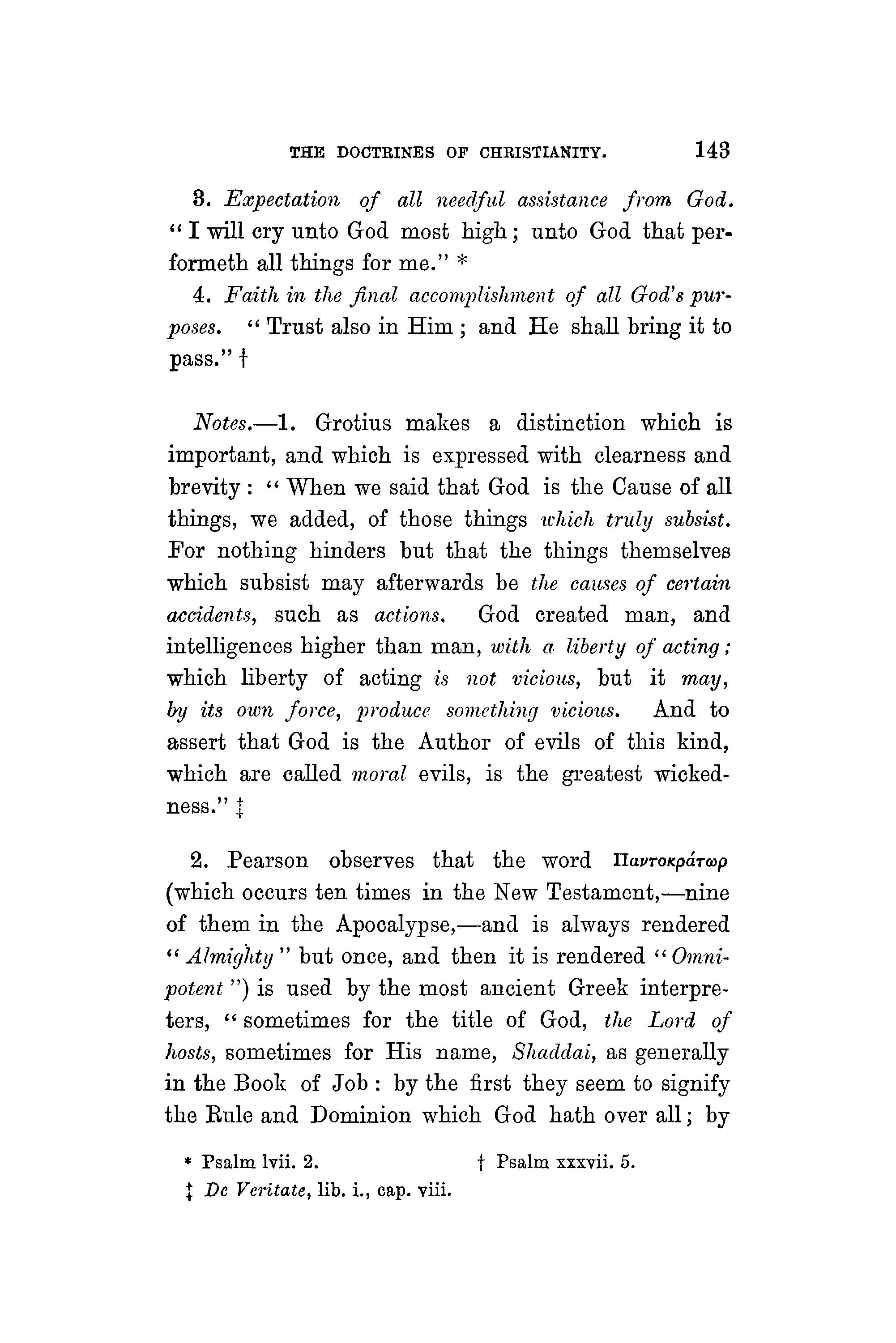
t Psalm xxxvii. 5.

the second, the strength, force, or power, by which He is able to perform all things."* On these two applications of the term the excellent prelate discourses with his wonted clearness and ability, partly in Article I., and partly in Article VI. You will see that I have briefly comprehended both these views under the first division of this Lecture.
* Exposition of the Creed, Article I.

THE OMNIPRESENCE OF GOD.
OuR plan now leads us to a contemplation of that attribute of God which is usually termed Omnipresence or Ubiquity; and our purpose is to proceed on this subject also according to the method which we have pursued in former Lectures.
I. The proz1a 11otio11of the Divine Omnipresence will first engage our attention.
1. God's Omnipresence denotes that He is intimately present in every part of the u11i1:erse. Hemanifests Himself, indeed, in various ways ; but through the immeasurable realms of being and of space HE IS.
2. God's Omnipresence also suggests the amazing thought that He is present ereryichere in the full possession of all His glorious beiny mul pe1:fectio11s,-present as God, the Spiritual, Simple, Immaterial, Indivisible, Eternal ONE.
8. This attribute likewise teaches us that God is thus universally and fully present in His pervmling, active, sustaini11g,controllin!J, awl guiding agency.*
IL The evidence of the Divine Omnipresence is amply supplied from the following sources :-
1. The testimonies of Holy Scripture, of which two may now suffice, especially as the texts which we
* See Note at the end of this Lecture.

shall quote under the head of the Omniscience of God will yield additional and corroborative proof.
Psalm cxxxix. 7-10.-" Whither shall I go from Thy Spirit? or whither shall I flee from Thy presence? If I ascend up into heaven, Thou art there: if I make my bed in hell," or in the invisible world of souls, "behold, Thou art there. If I take the wings of the morning," the expanding, swift, and powerful rays of the rising sun, "and dwell in the utterrnost parts of the sea; even there," as if I had not wandered in the smallest degree from the place where Thy presence now surrounds me, " shall Thy hand lead me, and Thy right hand shall hold me." The three great divisions of the universe, heaven, the invisible world of 'Unbodiedsouls, and earth, are all mentioned here. The presence of God occupies the whole.*
J er. xxiii. 24.-" Do not I fill heaven and earth? saith the LoRD;"-another and briefer description of the Universe, which the LoRDis emphatically said to fill.+
2. The government, regulation, and support of the nniverse, which clearly indicate God's ever-present agency. -Consider our own solar system.
3. The views which we have already taken of the perfections of God, and particularly of His Unity, Spirituality, and Simplicity.
4. To all which we may add, the frequent conscioiu-1ness which the creature feels of His presence, whether in His favour or His displeasure. t
* Compare, for this description of the universe, Philippians ii. 10; Rev. v. 13.
t Compare Gen. i. l ; Jer. li. 15; Zech. xii. 1.
t See the history of Jacob, Gen. xxviii. 16, 17.
III. The practical inferences which flow from the contemplation of the Divine Omnipresence, are such as these:-
1. That no creature can fail in strength or being without the permission of God. He is nigh who sustains us.
2. That he who ha8 made God his Friend needs never be solitary or alone. The deepest solitude is peopled with the living blessings of His presence.
3. That such a person can never be placed in circumstances in which he shall be destitute of his true protection and support.
Consider the case of Elisha.* When the king of Syria encompassed him by night in Dothan with "horses, and chariots, and a great host," and when his own servant said, " Alas, my master ! how shall we do ? " the prophet answered, " Fear not : for they that be with us are more than they that be with them. And Elisha prayed, and said, LoRD, I pray Thee, open his eyes, that he may see. And the LoRD opened the eyes of the young man ; and he saw : and, behold, the mountain was full of horses and chariots of fire round about Elisha." t
Consider the case of the three I1 ebreil's.t They were strangers and exiles, surrounded by enemies, and exposed to a vengeance apparently inevitable : but they trusted in God ever-present. It is true that they were cast into the burning fiery furnace. But what was the haughty monarch himself compelled to say? "Did not we cast three men bound into the
* 2 Kings vi. 13-18.
t Dan. iii, 24.-26. L 2

t Compare Psalm xxxiv. 7.

midst of the fire ? Lo, I see four men loose, walking in the midst of the fire, and they have no hurt; and the f onn of the fourth is like the Son of God.-Shadrach, Meshach, and Abednego, ye servants of the most high God, come forth, and come hither."
Consider the case of Daniel, when he was thrown into the den of lions.':' " 0 Daniel," cried Darius, " servant of the living God, is thy God, whom thou servest continually, able to deliver thee from the lions? Then said Daniel unto the king, 0 king, live for ever. My God hath sent His angel, and hath shut the lions' mouths, that they have not hurt me." "So Daniel was taken up out of the den, and no manner of hurt was found upon him, because he believed in his God."
Consider the case of Panl and Silas. t They were strangers, smarting from furious persecution, thrust into the inner prison, and made fast in the stocks. But they were happy in the presence of their God. Their dark dungeon was the Paradise of Philippi. " And at midnight Paul and Silas prayed, and sang praises unto God : and the prisoners heard them."
4. That a removal from the present state of being is but a renioval to ctnother part of the clomfriion where God reigns.
5. That the wicked, who reject the presence of God's favour, cclllnot escape the presence of His icrath.
Concluding remarks.
1. On the 1ncwffestations of God's presence, in Providence, Grace, and Glory.
2. On the language of Scripture, in which the presence of God is used to denote His favourable and
* Dan. vi. 20-23. t Acts xvi. 25, 26.

THE DOCTRINES OF CHRISTIANITY. 149 gracious presence, and an exclusion, or " destruction," from His presence, refers to an exclusion, or destruction, from that presence.*
(See Wesley's Sermon, "On the Omnipresence of God," No. cxi.; and Watson's "Institutes," part ii., chap. iii.)
Note on the first division of this Lecture.-To guard against every approach to Pantheism, it is necessary to keep in mind that God is everywhere present in His own proper Perso11ality,-distinguished from all His creatures. Here also it may be right to mention two interpretations which have been given to the word IT.avroKpcfrwp,or Almighty, in addition to the two noted at the end of the Lecture on Omnipotence: One is, that God holds, encircles, and contains all things,-a thought forcibly declarative of Omnipresence. He is "01nnium capax, et qui it nemine capiatur," +"comprehending all, and to be comprehended by none." Theophilus, Bishop of Antioch, tells us that God is called IT.avroKparwp,"because He holds and encircles all things ; for the heights of the heavens, and the depths of the abysses, and the extremities of the earth, are in His hand.'' The other interpretation is that God sustains, upholds, and continually preserves all things,-a great Scriptural thought, t and a thought which assures us of God's perpetual and active Omnipresence.§
* See, among other texts, Exod. xxxiii. 14, 15; Psalm xvi. 11; Ii. 11; Isai. !xiii. 9; 2 Thess. i. 9.
t Shepherd of Hermas, Command i.
t Compare Acts xvii. 28; Nehem. ix. 6 ; Col. i. 17; Heb. i. 3.
j See Pearson, Article I.

IT cannot fail to strike the attention of the observant 1·eader,as I have already noted, that, in Scripture, the 01nniscience of God is often mentioned along with His Omnipresence. He who is everywhere present, is present as the Suprerne Intelligence, intimately knowing all things in the universe which He fills. What can escape His eye ?
I. A general explanation of the meaning which we attach to the word Urnniscience as a title of one of the Divine Perfections, is first to be attempted.
1. The word Omniscience,-or, all-knowingness, if that term might be allowed,-as ascribed to God, denotes that His knowledge is universal and perpetual, -that it extends to all things, whether greater or more minute,-and that, in its illimitable range, it embraces all the parts of duration, past, present, and future. Omniscience is, in every respect, knowledge unbounded.
2. Omniscience is also employed to denote that the knowledge of God is most intimate and exact. He, and He only, views every substance in its essence, and every effect in its cause. Man's philosophy has essayed this, and has failed. Searching for essences, that philosophy has but discovered substances more concealed from general view: searching for causes, it has still been

occupied only with more remote effects.* Nor could man, in his present state, bear the discoveries which he has sometimes vainly sought to explore. Such knowledge is the prerogative of the Uncreated Essence, of the great First Cause.
3. Hence Omniscience yet further signifies that the knowledge of God is absolutely certain ancl infallible. It is not enough to say that He is not deceived: He can1wt be deceived. His all-perfect knowledge precludes the very possibility of error or mistake. God " is essentially truth and essentially knowledge." His "understanding is infinite in respect of comprehension; and not so only, but of certainty also and evidence." He "seeth without any obscurity." t
II. Proofs which establish the doctrine of God's Omniscience are as follow :-
1. The first and clearest proof is supplied by the declarations of Holy Scripture. Of these we shall give a somewhat larger number than we produced in our last Lecture, especially as most of them attest the Omnipresence as well as the Omniscience of God.
Job xxxiv. 21, 22.-" For His eyes are upon the ways of man, and He seeth all his goings. There is no darkness, nor shadow of death, where the workers of iniquity may hide themselves." t Psalm cxxxix. 1-4, 11, 12, 15, 16.-" 0 Lord, Thou hast searched me, and known me. Thou knowest my downsitting and mine uprising, Thou understandest my thought afar off. Thou compassest my path and
* "Causa latet; vis est notissima."-Ovid, Met., iv., 285,
t Pearson on the Creed, Article I.
t Compare 2 Chron. xvi. 9; Job xxxi. 4.

OUTLINES OF LECTURES ON
my lying down, and art acquainted with all my ways. For there is not a word in my tongue, but, lo, 0 Lord, Thou knowest it altogether. If I say, Surely the darkness shall cover me; even the night shall be light about me. Yea, the darkness hideth not from Thee; but the night shineth as the day : the darkness and the light are both alike to Thee. My substance was not hid from Thee, when I was made in secret, and curiously wrought in the lowest parts of the earth. Thine eyes did see my substance, yet being unperfect ; and in Thy book all my members were written, which in continuance were fashioned, when as yet there was none of them.''
Jer. xxiii. 24.-" Can any hide himself in secret places that I shall not see him ? saith the Lord."
Amos ix. 2, 3.-" Though they dig into hell, thence shall Mine hand take them ; though they climb up to heaven, thence will I bring them down: and though they hide themselves in the top of Carmel, I will search and take them out thence ; and though they be hid from My sight," as they may imagine, "in the bottom of the sea, thence will I command the serpent, and he shall bite them."
Acts xv. 18.-" Known unto God are all His works from the beginning of the world,"-or "from eternity.",:,
Heb. iv. 13.-" Neither is there any creature that is not manifest in His sight : but all things are naked and opened unto the eyes of Him with whom we have to do." t
* So Wesley.
t See also Dan. ii. 22; 1 John i. 5.

2. A second proof may be drawn from the vigilant care and arrangenients of Providence, which indicate, not only universal presence, but also universal knowledge.
8. A third proof is suggested by the history of God's administrations in the Church and in the icorld,-administrations which prove His knowledge of the heart, of secret circumstances and motives, and, in a word, of all the creature's purposes and agencies.
4. A fourth proof is found in the sudden and surprising conviction of individuals, of which you have a remarkable illustration in the case of Hagar, Gen. xvi. 13, 14.
III. General instructions which this subject conveys are such as these :-
1. The doctrine of God's Omniscience teaches the righteous to rejoice that there is One who knows all things that relate to them, and who can, with the utmost ease, adapt all circumstances and events to their good.
2. The doctrine warns the wickeclthat, secret as their crimes may seem, they are all discerned and known by Him who is their Judge.
8. The doctrine also provides a most salutary restraint when temptations to evil arise. How dare we sin in the presence of that God who is "of purer eyes than to behold evil," and cannot " look on iniquity ? " *
4. The doctrine constantly provides an animating and cheering lesson to the servants of God amidst all their toils, conflicts, and sufferings. They are still under their great Master's eye.
* Hab. i. 13.

5. Once more, the doctrine sheds additional Ught on the hopes which we entertain concerning the final issue of all God's dispensations. For "the counsel of the LoRD standeth for ever, the thoughts of His heart to all generations."*
Concluding remarks on the connection or agreement between God's foreknowledge and man's free agency.
1. That God is pe1jectly prescient or foreknowing cannot be denied or doubted. Otherwise, He would not be Omniscient. The doctrine of God's Prescience, then, clearly arises out of the subject now before us; and I may justly add, that it is sustained by undeniable Scripture testimonies, some of which have occurred in our citations. Weigh especially Isai. xlvi. 10, and Acts xv. 18.
2. That man is a creature of free agency appears most fully from his manifest responsibility,-from his conduct in every relation .and intercourse of life,-and from the constant tenor of Scripture, which addresses and treats him as a free agent. Without free agency man would be incapable of Religion or of Law.
3. That these two things are in perfect harmony with each other is what we may not be able clearly to apprehend, but what we have sufficient ground to believe. Sometimes our difficulty here is abated, if it is not removed, by an appeal to the plain distinction which subsists between foreknowledge and f oredetermination, necessity or fate. Look, too, at another point : How do you reconcile the salvation of sinful man with the justice of God ? You firmly believe both the one
• Psalm xxxiii. 11. Compare Prov. xix. 21 ; Isai. xlvi. 10.

DOCTRINES OF CHRISTIANITY. 15 5 and the other. But how do you reconcile them? By the doctrine of Redemption. Most true. The connecting link is supplied in this case,-and all is clear. If the connecting link were equally supplied in the other case, might not the harmony between the foreknowlege of God and the free agency of man be discerned in like manner? Enough for us, however, to be assured that He who is absolutely prescient, and who yet treats man as a free agent, Himself sees the admirable harmony between these two apparently contrary things, and that He will finally disclose that harmony to us, if He see that such a disclosure will contribute to our good. ~i:
* See Watson's "Institutes," part ii., chap. iv.
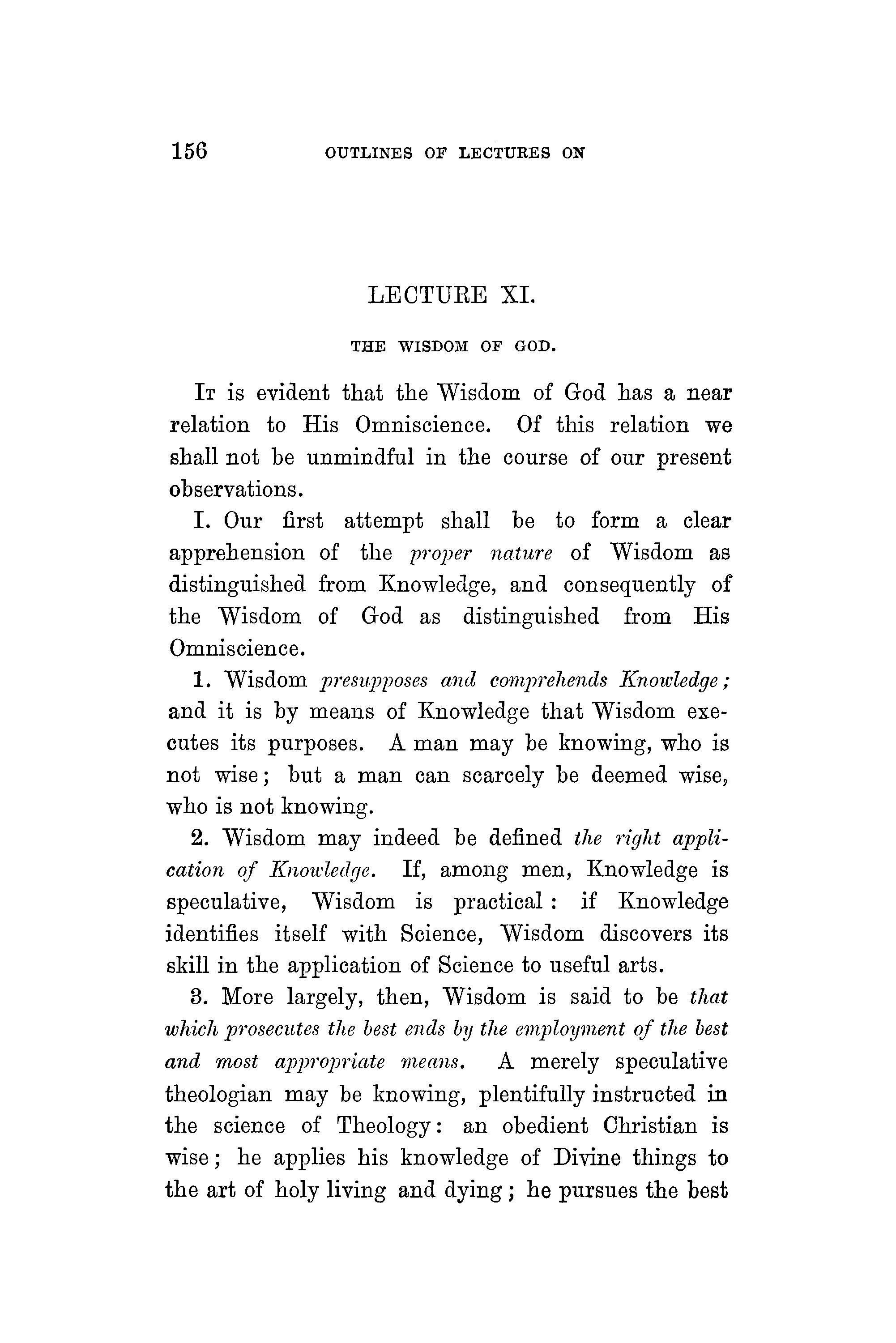
IT is evident that the Wisdom of God has a near relation to His Omniscience. Of this relation we shall not be unmindful in the course of our present observations.
I. Our first attempt shall be to form a clear apprehension of the proper nature of Wisdom as distinguished from Knowledge, and consequently of the Wisdom of God as distinguished from His Omniscience.
1. Wisdom presupposes and comprehends Knowledge; and it is by means of Knowledge that Wisdom executes its purposes. A man may be knowing, who is not wise ; but a man can scarcely be deemed wise, who is not knowing.
2. Wisdom may indeed be defined the right application of Knowledge. If, among men, Knowledge is speculative, Wisdom is practical : if Knowledge identifies itself with Science, Wisdom discovers its skill in the application of Science to useful arts.
3. More largely, then, Wisdom is said to be that which prosecutes the best ends by the employnient of the best and most appropriate rneans. A merely speculative theologian may be knowing, plentifully instructed in the science of Theology: an obedient Christian is wise; he applies his knowledge of Divine things to the art of holy living and dying ; he pursues the best

DOCTRINES OF CHRISTIANITY. 157
end,-eternal life with God,-by the employment of the best means,-the means which God Himself has appointed_,:,
4. Raising our thoughts from man to God, we may now say that the Wisdom of God presupposes and includes His 01nniscient Kno1cledge,-that it is the application of that Kno1cleclgeto all His administrations, -that it is, through every part of those administrations, the accomplishment of all that is best by means which Omniscience sees to be also best.
II. Argwnents which establish the truth of the Divine Wisdom are so numerous that they can scarcely be brought within the limits of the most carefully prepared classification.
1. Every created object, viewed in its own stmcture, displays the Wisdom of God.
2. All created objects, viewed in relation to each other, display that Wisdom yet more fully.
8. The admirable manner in which Divine Providence adapts its manifold contrivances ancl supplies to the several orders of creatures, is an astonishing proof of Wisdom.
4. The General Government of God declares His unerring Wisdom.
5. The History of Redemption is a most illustrious proof of its nature and agency.
6. God's work in the hearts of 1nen cannot fail, in the most striking light, to di'scover the same glorious perfection to the few who examine that momentous subject.
7. Accordingly, the Scriptures abound with testi-
* See Note at the end of this Lecture.
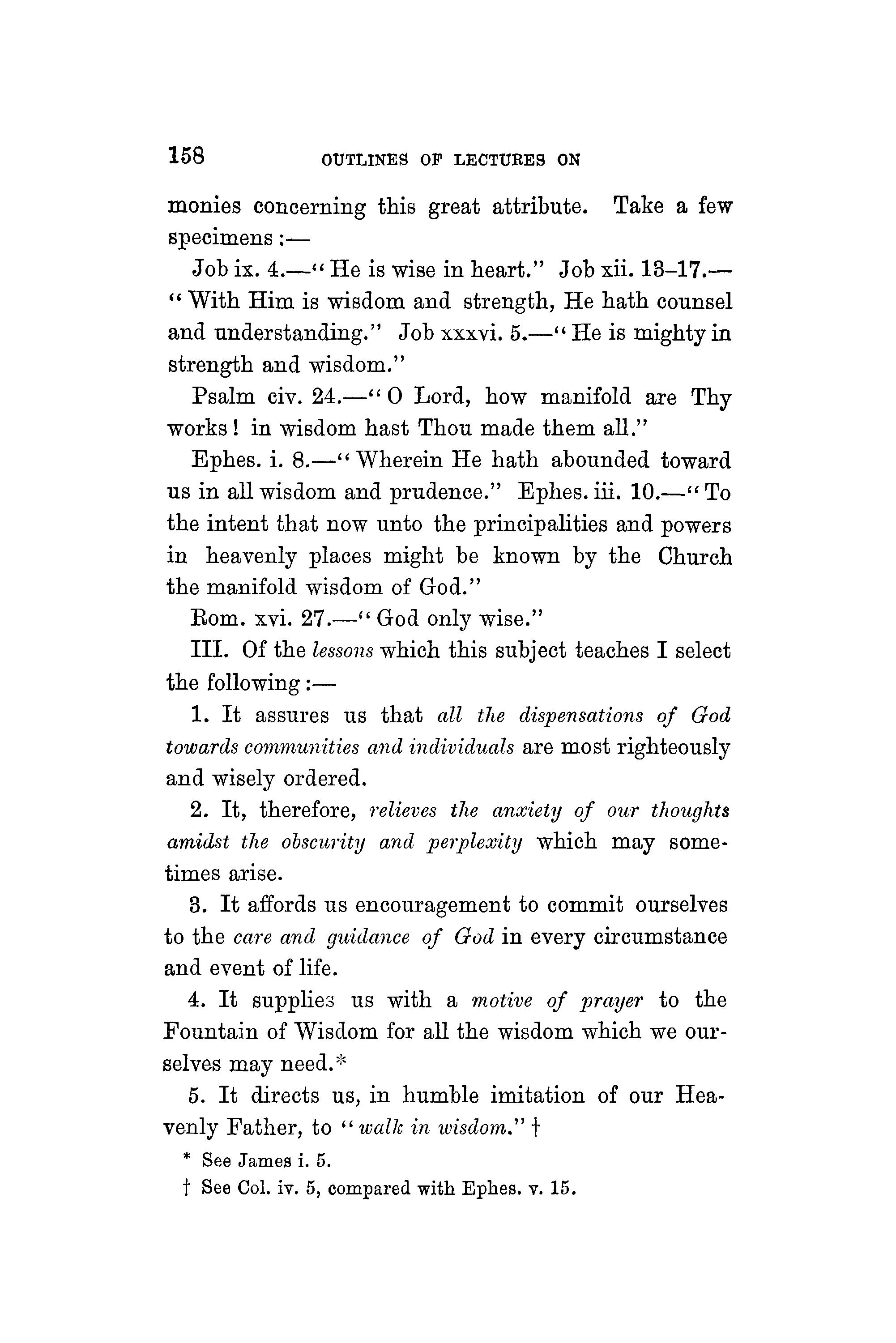
monies concerning this great attribute. Take a few specimens :-
Job ix. 4.-" He is wise in heart." Job xii. 13-17." With Him is wisdom and strength, He hath counsel and nnderstanding." Job xxxvi. 5.-" He is mighty in strength and wisdom."
Psalm civ. 24.-" 0 Lord, how manifold are Thy works! in wisdom hast Thou made them all."
Ephes. i. 8.-" Wherein He hath abounded toward us in all wisdom and prudence." Ephes. iii. 10.-" To the intent that now unto the principalities and powers in heavenly places might be known by the Church the manifold wisdom of God."
Rom. xvi. 27.-'' God only wise."
III. Of the lessons which this subject teaches I select the following:-
1. It assures us that all the dispensations of God towards co1n1nunities and ind'ividuals are most righteously and wisely ordered.
2. It, therefore, relieves the anxiety of our thoughts amidst the obscurity and perplexity which may sometimes arise.
3. It affords us encouragement to commit ourselves to the care and guiclance of God in every circumstance and event of life.
4. It supplies us with a motive of praye1· to the Fountain of Wisdom for all the wisdom which we ourselves may need.*
5. It directs us, in humble imitation of our Heavenly Father, to "walk in wisdom."+
* See James i. 5.
t See Col. iv. 5, compared with Ephes. v. 15.

Note.-The Greek word uocpla denotes "in general," says Schleusner, "wisdom, which consists in the knowledge of things Divine and human, and in its right use, when any one knows what things are good, what evil, what are to be done, what to be omitted and avoided, and acts suitably to that knowledge." But "specially," he adds, "prudence, the philosophy of life, a prudent way of acting, so that you always do that which is apt," or fitting, " to persons, time, and place."

To enter fully into the consideration of this transcendent attribute of God, would lead us far beyond any limits that we could reasonably assign to these our meditations. Yet the theme is most grateful to every devout feeling; it claims our deepest regard; and it cannot fail, even from the general view which we may take of it, to suggest instructions of the highest value. The largest examination of it would serve but the more to convince us how far it is beyond our utmost efforts of thought,-how unable the mind of man is to sound its depths, or comprehend its immensity. Such an examination would, after all, be partial and incomplete: the briefer one which we shall now pursue, needs not be unprofitable.
I. Survey the Goodness of God in its own proper characters. But let me premise that, in this connection, I take the word Goodness as especially denoting benignit!} or conirnunicatire love.
1. The Goodness of God is Goodness of natitre,Goodness which exists in His very essence or being ; for "God is love,'' ,:,_love in its fountain, its fulness, its eternity,-and love as constituting what He truly is.
2. The Goodness of God is Goodness of the 1night£est e.ificiencv in all its manifestations. Apply this to the Goodness of complacencv, which Divinely reposes on
* John iv. 8, 16.

THE DOCTRINES OF CHRISTIANITY, 161
all whom God approves; to the Goodness of e11couragement,-as we may venture to distinguish,-which sustains the hopes, and guides the efforts, of them whom God is drawing to Himself ; and to the Goodness of niercy, which descends, in its treasures of invitation and persuasive promise, even on them who as yet are " alienated from the life of God." ,;,
3. The Goodness of God is Goodness of most delightful e:rercise. " Love is of God: " " also, unto Thee, 0 LonD, belongeth mercy." "Thou, 0 LoRD, art a God full of compassion, and gracious, longsuffering, and plenteous in mercy and truth." He "deligltteth in mercy."+
4. The Goodness of God is, accordingly, Goodness of the richest possible benefaction. " The earth is full of the goodness of the LoRD." " 0 that men would praise the LoRD for His goodness !-for He 1:iatisfieth the longing soul, and filleth the hungry soul with goodness." St. Paul speaks of "the riches of His goodness and forbearance and long-suffering." t
II. l\.fark the Evidences of God's Goodness.
1. You see it in the rery g(ft of being.
2. You are constantly assured of it by the bounties of Providence.
3. You learn most deeply to feel it in the riches of Redemption.
4. You find it in the abundant testimonies of Holy Scripture. Thy glory. " I beseech Thee," said Moses, " show me And He said, I will make all My goodness
* Ephes. iv. 18.
t 1 John iv. 7; Psalm lxii. 12; lxxxvi. 15; Micah vii. 18.
f Psa~m xxxiii. 5 ; cvii. 8, 9 ; Rom. ii. 4.

OUTLINES OP LECTURES ON pass before thee." " And the LoRD passed by before him, and proclaimed, The Lono, the LoRDGod, merciful and gracious, long-suffering, and abundant in goodness and truth." "0 how great is Thy goodness, which Thou hast laid up for them that fear Thee; which Thou hast wrought for them that trust in Thee before the sons of men!" "Every good gift and every perfect gift is from above, and cometh down from the Father of lights." " He that loveth not knoweth not God ; for God is love," etc.*
III. The Lessons which the Goodness of God should particularly teach us, may be connected with all the abiding graces of the Christian life,-" faith, hope, love." t
1. How ought it to increase and strengthen our faith ! "How excellent is Thy lovingkindness, 0 God! therefore the children of men put their trust under the shadow of Thy wings." t
2. How ought it to raise and animate our hope ! "And now, LoRD, what wait I for? my hope is in Thee." "Happy is he-whose hope is in the LORD his God." "Thou art my hope in the day of evil." §
3. How ought it to augment and promote our love!-
To God.II
To our Christian brethren.~
To all mankind.**
* Exod. xxxiii.18, 19; xxxiv. 6; Psalm xxxi. 19; James i. 17; 1 John iv. 8-10.
t 1 Cor. xiii. 13. t Psalm xxxvi. 7.
§ Psalm xxxix. 7; cxlvi. 5; Jer. xvii. 17. See also Ephes. i. 18.
II 1 John ;v. 19. 1 John iv. 11.
** Gal. vi. 10; 1 Thess. iii. 12; v. 15; 2 Peter i. 7.

HoLINEss is ascribed to God, in Scripture, with amazing frequency, solemnity, and emphasis. The Seraphim in Isaiah's Vision* cried one to another, and said, " Holy, holy, holy, is the LoRDof hosts : the whole earth is full of His glory." The four living creatures in the Apocalypse, t with the consenting voice of "the four and twenty elders," t "rest not day and night, saying, Holy, holy, holy, Lord God Almighty, which was, and is, and is to come."§
But I wish particularly to direct your attention to those passages which speak of the holiness of God as a reason and pattern of our own. "As He which hath called you is holy," says St. Peter, \1" so be ye holy in all manner of conversation; because it is written, Be ye holy; for I am holy." It is written in the OldTestament Scriptures repeatedly, in the same, or nearly the same, terms, (as in Lev. xi. 44; xix. 2; xx. 26 ;) and repeatedly, also, in different but kindred forms of speech, (as in Exod. xix. 6 ; Lev. xx. 7 ; Deut. vii. 6 ; xxvi. 19 ; xxviii. 9 ; Isai. lxii. 12.) To the serious inquirer, therefore, it must be evident that there is a correspondency between the holiness of sanctified man and the holiness of God, and that an
* Isai. vi. 3. t Rev. iv. 8. t Rev. iv. 10, 11.
§ Compare Psalm xcix. 3, 5, 9. ii 1 Peter i. 15, 16.
M 2
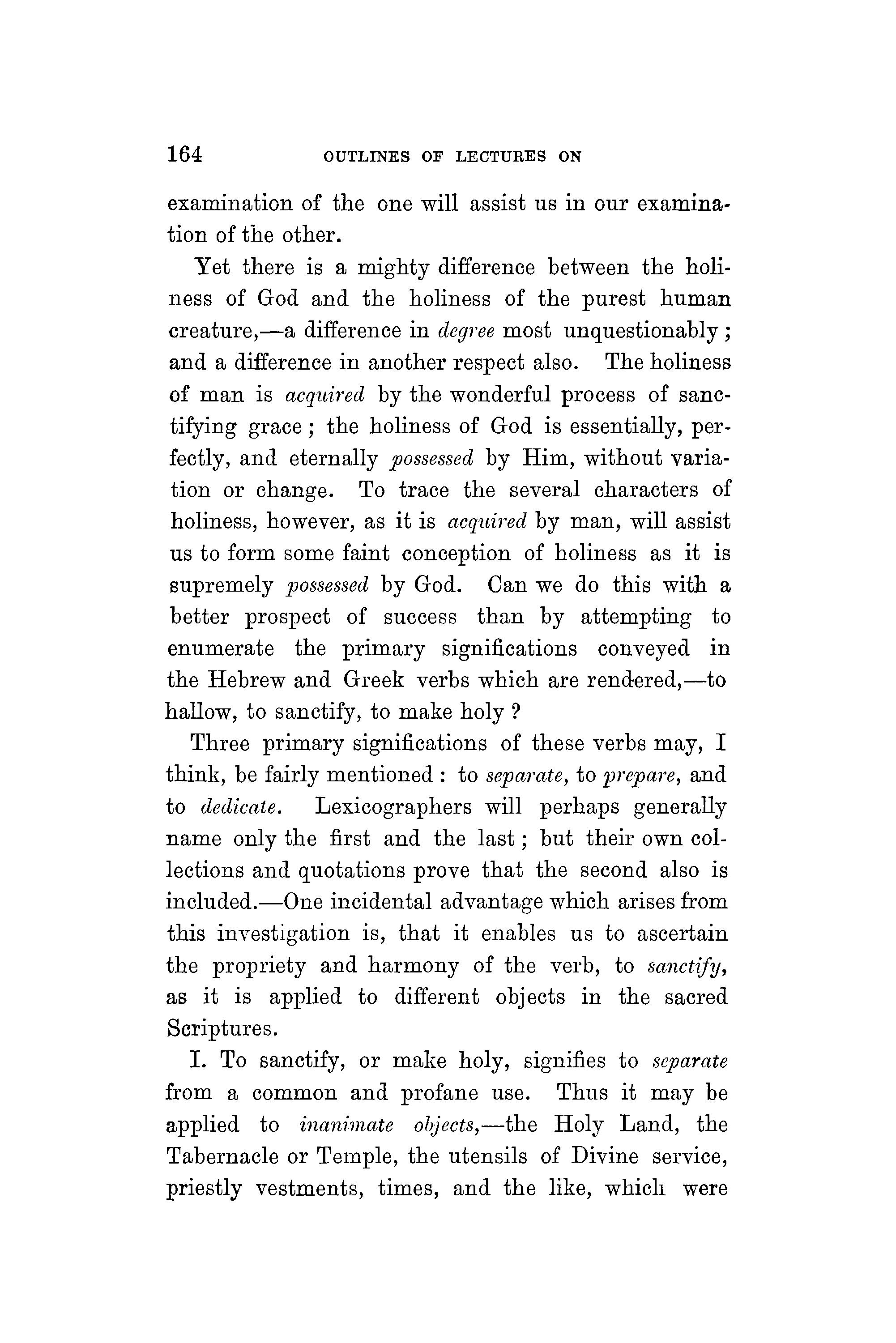
OF LECTURES ON
examination of the one will assist us in our examination of the other.
Yet there is a mighty difference between the holiness of God and the holiness of the purest human creature,-a difference in degreemost unquestionably; and a difference in another respect also. The holiness of man is acqilired by the wonderful process of sanctifying grace ; the holiness of God is essentially, perfectly, and eternally possessed by Him, without variation or change. To trace the several characters of holiness, however, as it is acqilired by man, will assist us to form some faint conception of holiness as it is supremely possessed by God. Can we do this with a better prospect of success than by attempting to enumerate the primary significations conveyed in the Hebrew and Greek verbs which are rend:ered,-to hallow, to sanctify, to make holy?
Three primary significations of these verbs may, I think, be fairly mentioned: to separate, to prepare, and to dedicate. Lexicographers will perhaps generally name only the first and the last ; but their own collections and quotations prove that the second also is included.-One incidental advantage which arises from this investigation is, that it enables us to ascertain the propriety and harmony of the verb, to sanctify, as it is applied to different objects in the sacred Scriptures.
I. To sanctify, or make holy, signifies to separate from a common and profane use. Thus it may be applied to inanimate objects,-the Holy Land, the Tabernacle or Temple, the utensils of Divine service, priestly vestments, times, and the like, which were

THE DOCTRINES OF CHRISTIANITY, 165
separated or set apart for what appertained to God;to animate but irrational creatures, which were separated as Divine sacrifices ;-to human beings as externally separated from others for purposes Divine, the Israelites, the Levites, the Priests ;-and to the true servants of God, viewed as spiritually and nwrally separated from sin. The first character, then, of holiness in man, is separation fr01n sin.*
II. To sanctify, or make holy, signifies to prepare what is thus separated for its appropriate uses. Thus inan-iniate objects, irrational anim.,als, and nien as externally sanctified to Goel, were prepared by various dispensations, observances, sacrifices, and ablutions, for the state or office in which they were to be placed; and thus God's true people are prepared for Himself by the manifold agency of His sanctifying Spirit. The second character, then, of holiness in man is preparation for Goel by the regenerating and hallowing work of the Holy Spirit, who applies to our nature the virtue of our Lord's atoning sacrifice, and, by His most gracious operations, moulds us anew, and prepares us for God. (See, in illustration of the two preceding principles, 2 Cor. vii. 1, and compare Ezek. xxxvi. 26.)
III. To sanctify, or make holy, signifies to dedicate what is thus separated and prepared to God. This is the crown and consummation of the whole. Inanimate objects, irrational animals, and persons regarded as externally sanctified, were thus, in their several orders and degrees, to be dedicated to God ; and, in like manner, God's truly separated and prepared worshippers
* See Ezekiel xxx.vi. 25.

are to be dedicated, in heart and life, in all their possibilities of thought, affection, and action, to His " blessed and beloved service."* The third character, then, of holiness in man is the constant dedication of all that he is and has to God. t
As these are the characters of the holiness which is acquired by man, may we not reverently say, that the holiness which for ever dwells in God, and which is the ground and pattern of man's holiness, corresponds to it inall these particulars? The mighty difference, as already noted, must indeed be kept in view; but the holiness of God implies an essential and eternal distance from all that is evil, the possession, in an ineffable degree, of all spiritual and moral excellencies and perfections, and a constant observance, in all His administrations or ways, of that which is most pure, righteous, and good.t
* See such texts as Rom. xii. 1, 2; xiv. 7-9; 2 Cor. v. 14, 15.
t See Ezekiel xxxvi. 27.
t See also Wesley's Notes on Rev. iv. 8.
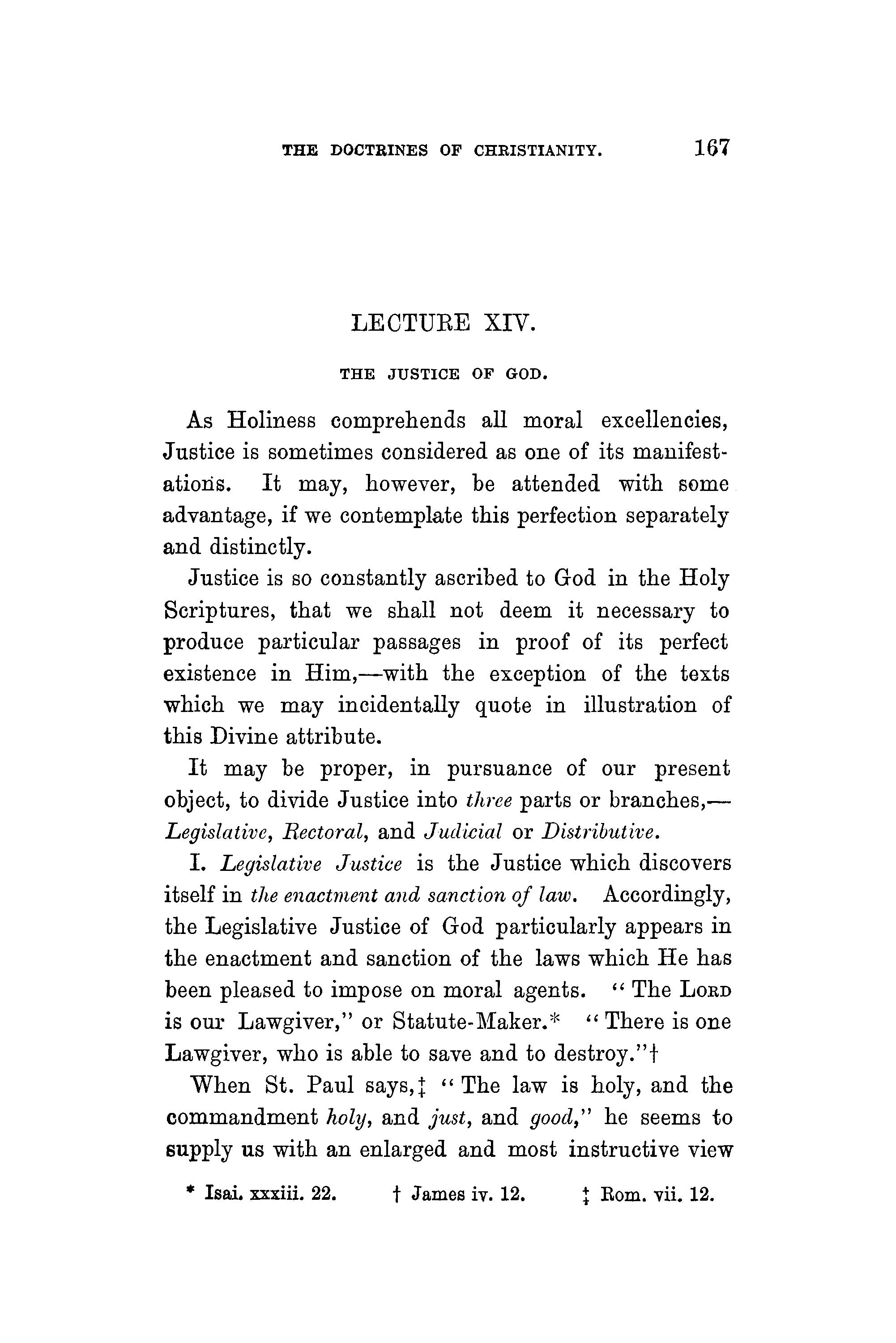
THE JUSTICE OF GOD.
As Holiness comprehends all moral excellencies, Justice is sometimes considered as one of its manifestations. It may, however, be attended with some advantage, if we contemplate this perfection separately and distinctly.
Justice is so constantly ascribed to God in the Holy Scriptures, that we shall not deem it necessary to produce particular passages in proof of its perfect existence in Him,-with the exception of the texts which we may incidentally quote in illustration of this Divine attribute.
It may be proper, in pursuance of our present object, to divide Justice into three parts or branches,Legislative, Rectoral, and Judicial or Distributive.
I. Legislative Justice is the Justice which discovers itself in the enactrnent and sanction of law. Accordingly, the Legislative Justice of God particularly appears in the enactment and sanction of the laws which He has been pleased to impose on moral agents. " The LoRD is our Lawgiver," or Statute-Maker.* "There is one Lawgiver, who is able to save and to destroy."+
When St. Paul says, t " The law is holy, and the commandment holy, and just, and good," he seems to supply us with an enlarged and most instructive view
* Isa.i. xx:x:iii. 22. t James iv. 12. t Rom. vii. 12.
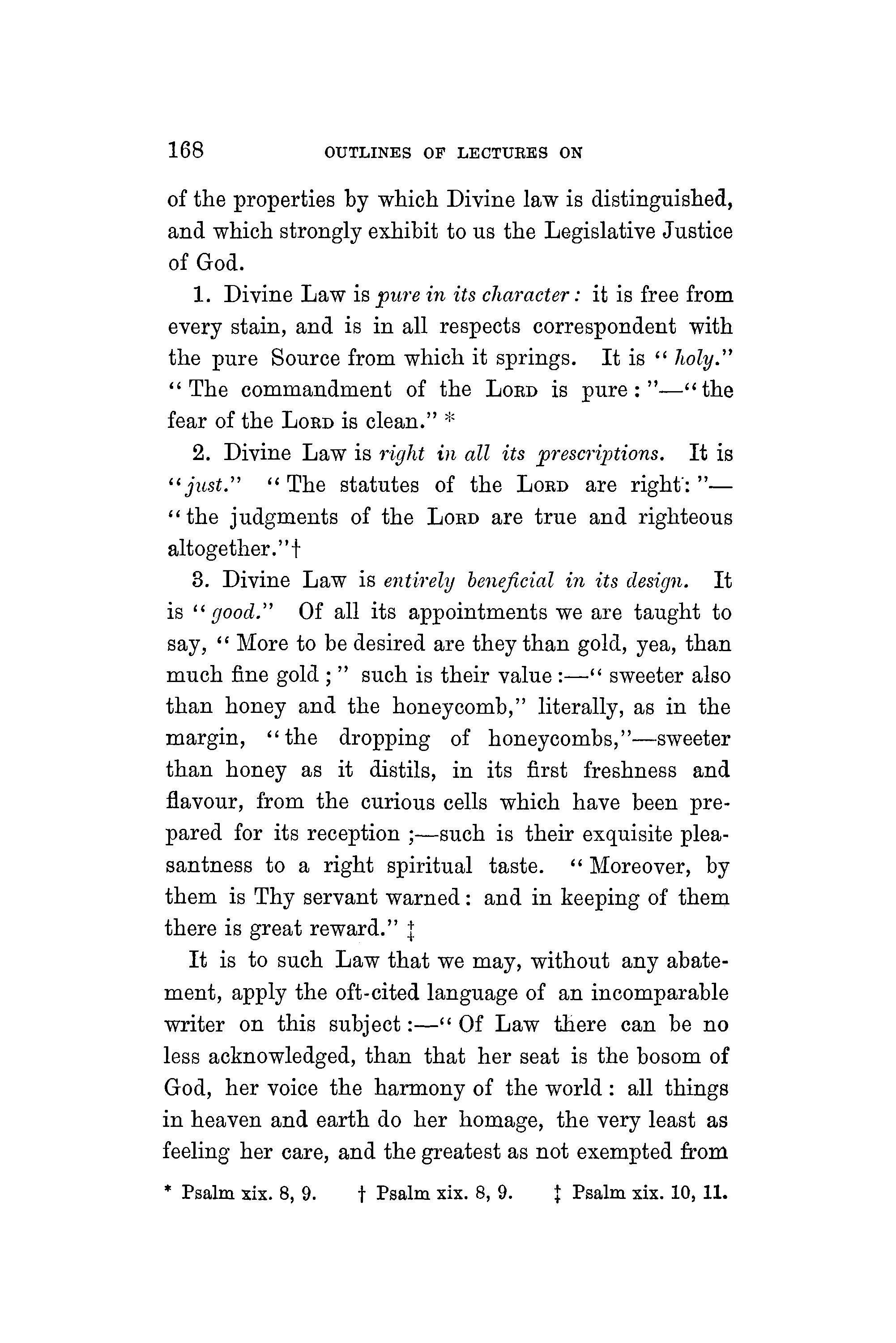
of the properties by which Divine law is distinguished, and which strongly exhibit to us the Legislative Justice of God.
1. Divine Law is pure in its character: it is free from every stain, and is in all respects correspondent with the pure Source from which it springs. It is " holy." "The commandment of the LoRD is pure:"-" the fear of the LoRDis clean." *
2. Divine Law is right in all its prescriptions. It is "just." "The statutes of the LoRD are right": "" the judgments of the LORDare true and righteous altogether." t
3. Divine Law is entirely beneficial in its design. It is "good." Of all its appointments we are taught to say, "More to be desired are they than gold, yea, than much fine gold;" such is their value:-" sweeter also than honey and the honeycomb," literally, as in the margin, " the dropping of honeycombs," -sweeter than honey as it distils, in its first freshness and flavour, from the curious cells which have been prepared for its reception ;-such is their exquisite pleasantness to a right spiritual taste. "Moreover, by them is Thy servant warned : and in keeping of them there is great reward." t
It is to such Law that we may, without any abatement, apply the oft-cited language of an incomparable writer on this subject:-" Of Law there can be no less acknowledged, than that her seat is the bosom of God, her voice the harmony of the world : all things in heaven and earth do her homage, the very least as feeling her care, and the greatest as not exempted from
* Psalm xix. 8, 9. t Psalm xix. 8, 9. ! Psalm xix. 10, 11.
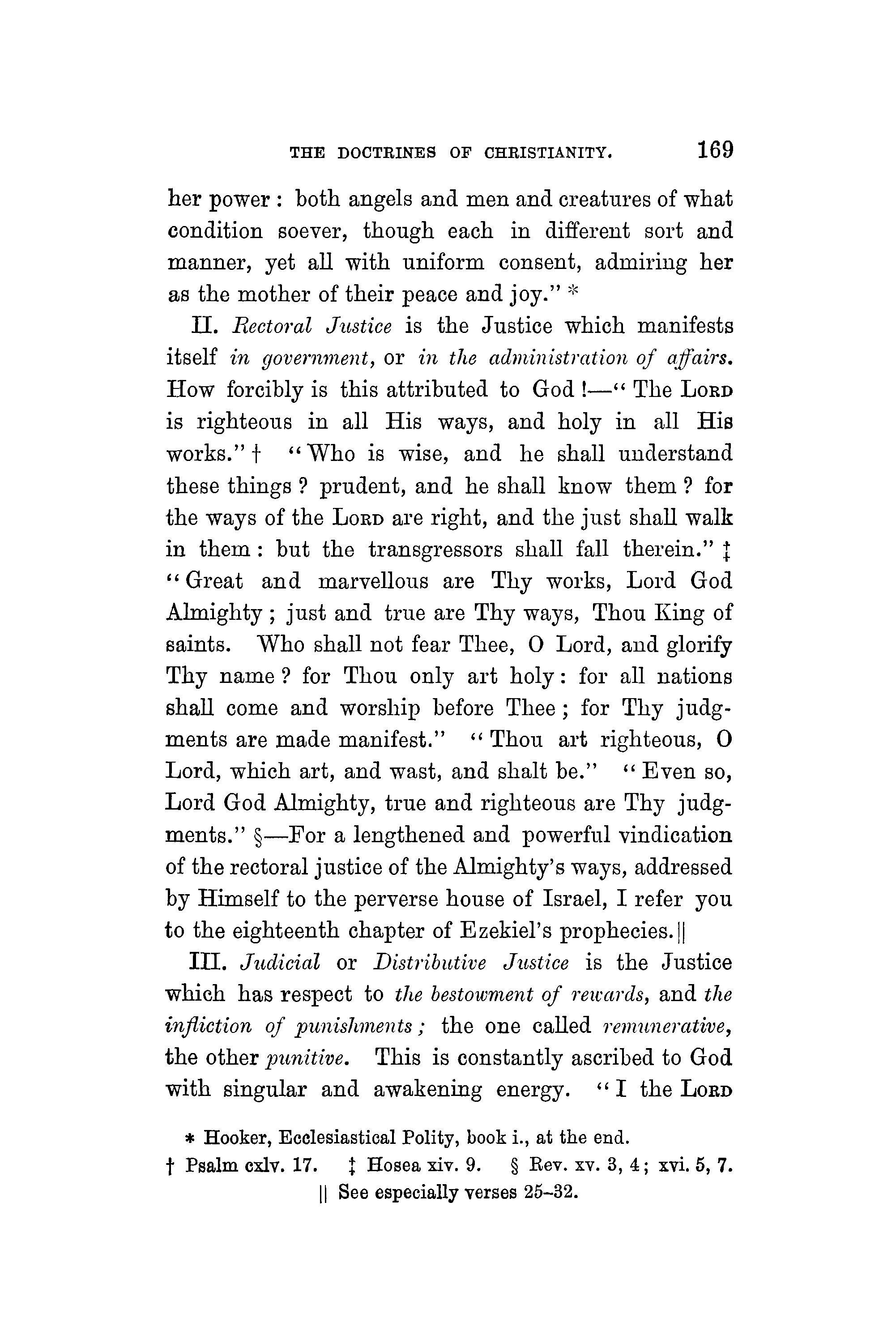
THE DOCTRINES OF CHRISTIANITY. 169 her power : both angels and men and creatures of what condition soever, though each in different sort and manner, yet all with uniform consent, admiring her as the mother of their peace and joy." ,:<
II. Rectoral Jitstice is the Justice which manifests itself in govern11ient,or in the administration of affairs. How forcibly is this attributed to God !-" The LoRD is righteous in all His ways, and holy in all His works." t " Who is wise, and he shall understand these things? prudent, and he shall know them? for the ways of the LoRDare right, and the just shall walk in them: but the transgressors shall fall therein." t "Great and marvellous are Thy works, Lord God Almighty; just and true are Thy ways, Thou King of saints. Who shall not fear Thee, 0 Lord, and glorify Thy name? for Thou only art holy: for all nations shall come and worship before Thee; for Thy judgments are made manifest." " Thou art righteous, 0 Lord, which art, and wast, and shalt be." "Even so, Lord God Almighty, true and righteous are Thy judgments." §-For a lengthened and powerful vindication of the rectoral justice of the Almighty's ways, addressed by Himself to the perverse house of Israel, I refer you to the eighteenth chapter of Ezekiel's prophecies. jj
III. Judicial or Distributive Jitstice is the Justice which has respect to the bestowrnent of reicards, and the infliction of punishnients ; the one called remunerative, the other punitive. This is constantly ascribed to God with singular and awakening energy. "I the LoRD
* Hooker, Ecclesiastical Polity, book i., at the end. t Psalm cxlv. 17. t Hosea xiv. 9. § Rev. xv. 3, 4; xvi. 5, 7.
II See especially verses 25-32.

OUTLINES OF LECTURES ON
search the heart, I try the reins, even to give every man according to his ways, and according to the fruit of his doings." * "The Great, the Mighty God, the LoRD of hosts, is His name,-Great in counsel, and Mighty in work: for Thine eyes are open upon all the ways of the sons of men : to give every one according to his ways, and according to the fruit of his doings." t '' So then every one of us shall give account of himself to God:" "who will render to every man according to his deeds : " " for there is no respect of persons with God." t Partiality is that which impairs distributive justice ; and partiality in man arises from three grand sources,-hope, fear, and caprice. But from whom shall the All-sufficient hope? Whom shall the Almighty fear? How can the All-perfect be moved by caprice? Reason corroborates the solemn testimonies of Scriptures: it teaches us the entire impartiality, and, therefore, the judicial or distributive Justice " of Him with whom we have to do."§
Note.-1. How powerfully does thi_s subject urge upon us an habitual cultivation of the reverence which is due to so just a God . 1
2. How ought it to satisfy us concerning the Divine equity of all His prescriptions, administrations, and decisions!
8. How should it. stimulate us to the maintenance of strict integrity in all our principles, words, and actions !
• Jer. xvii. 10. t Jer. xxxii. 18, 19.
t Rom. xiv. 12; ii. 6-11. See also Job xxxiv. 11 ; Psalm lxii. 12; Prov. xxiv. 12; Matt. xvi. 27; l Cor. iii. 8; 2 Cor. v. 10; Rev. ii. 23; xx. 12; xxii. 12.
§ Heb. iv. 13.
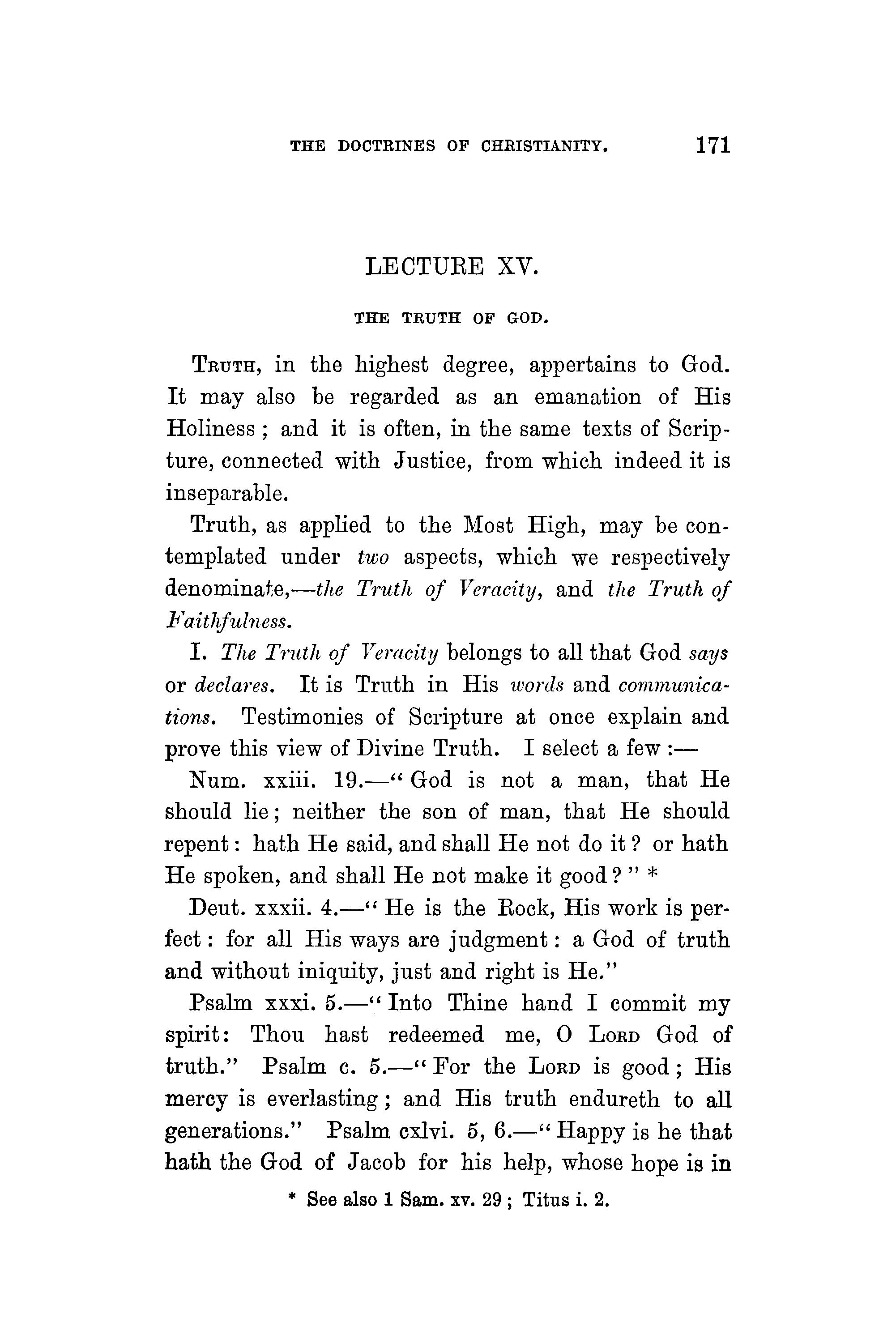
XV.
THE TRUTH OF GOD.
TRUTH,in the highest degree, appertains to God. It may also be regarded as an emanation of His Holiness ; and it is often, in the same texts of Scripture, connected with Justice, from which indeed it is inseparable.
Truth, as applied to the Most High, may be contemplated under two aspects, which we respectively denominate,-the Truth of Veracity, and the Truth of Faithfulness.
I. The Truth of Veracity belongs to all that God says or declares. It is Truth in His words and cornmun,icati"ons. Testimonies of Scripture at once explain and prove this view of Divine Truth. I select a few :-
N um. xxiii. 19.-" God is not a man, that He should lie ; neither the son of man, that He should repent: hath He said, and shall He not do it? or hath He spoken, and shall He not make it good?" *
Deut. xxxii. 4.-'' He is the Rock, His work is perfect : for all His ways are judgment : a God of truth and without iniquity, just and right is He."
Psalm xxxi. 5.-" Into Thine hand I commit my spirit: Thou hast redeemed me, 0 LoRD God of truth."
Psalm c. 5.-" For the LoRD is good; His mercy is everlasting ; and His truth endureth to all generations."
Psalm cxlvi. 5, 6.-" Happy is he that hath the God of Jacob for his help, whose hope is in
* See also 1 Sam. xv. 29 ; Titus i. 2.

OUTLINES OF LECTURES ON
the LoRD his God: which made heaven, and earth, the sea, and all that therein is: which keepeth truth for ever."
Heb. vi. 16-18.-" For men verily swear by the greater," that is, by God: "and an oath for confirmation is to them an end of all strife. Wherein God, willing more abundantly to show unto the heirs of promise the immutability of His counsel, confirmed it by an oath; "-or, as in the margin, "interposed Himself by an oath; "-" that by two immutable things, in which it was impossible for God to lie, we might have a strong consolation, who have fled for refuge to lay hold upon the hope set before us."
II. The Truth of Faithfulness relates more especially to the acts of God, or to what He does. A few Scripture testimonies will place this topic also in a clear and convincing light.
Psalm xxxvi. 5, 6.-" Thy mercy, 0 LoRD, is in the heavens; and Thy faithfulness reacheth unto the clouds. Thy righteousness is like the great mountains; " literally, (see margin,) "the mountains of God;" "Thy judgments are a great deep."
Isai. xlix. 7 .-'' Thus saith the LoRD, the Redeemer of Israel, and His Holy One, to Him whom man despiseth, to Him whom the nation abhorreth, to a servant of rulers, kings shall see and arise, princes also shall worship, because of the LoRDthat is faithful, and the Holy One of Israel, and He shall choose thee."
1 Cor. i. 9.-" God is faithful, by whom ye were called unto the fellowship of His Son Jesus Christ our Lord."
1 Cor. x. 13.-" There hath no temptation taken

DOCTRINES OF CHRISTIANITY. 173
you but such as is common to man : but God is faithful, who will not suffer you to be tempted above that ye are able ; but will with the temptation also make a way to escape, that ye may be able to bear it."
1 Thess. v. 24.-" Faithful is He that calleth you, who also will do it ; " will accomplish that entire and permanent renovation, of which the preceding verse speaks.
2 Thess. iii. 3.-" The Lord is faithful, who shall stablish you, and keep you from evil."
Heb. x. 23.-" Let us hold fast the profession of our faith "-Greek, "hope "-"without wavering: (for He is faithful that promised.")
1 John i. 9.-" If we confess our sins, He is faithful and just to forgive us our sins, and to cleanse us from all unrighteousness."
1. The Truth of God is friendly to a serious temper. It reminds us that He will strictly adhere to His holy threatenings and administrations.
2. The Truth of God lays a deep and immovable joundation for our trust and hope.
3. The Truth of God teaches us to cultivate truth, in all its forms and degrees, with diligent and scrupulous sedulity.
" What is Truth! " It is a conj onnity to that which really exists.
Philosophical Truth is a conformity to that which really exists in the worlds of matter and of mind.
Historical Truth is a conformity to that which has really existed and occurred in the circumstances and events which we profess to record.
Theological Truth is a conformity to that which

OF LECTURES ON
really exists in the nature, will, and administrations of the Most High God.
JJ1oral Truth is a conformity in our plans, words, and actions, to that which really exists in our minds and purposes.
Dare to be true. Temptations to falsehood and i;lisguise abound. Bold professions are encouraged ; modest sincerity is too often put to shame. Yet falsehood is fickle, uncertain, fleeting ; truth is calm, steady, and permanent. "Great is the earth, high is the heaven, swift is the sun in his course, for he compasseth the heavens round about, and fetcheth his course again to his own place in one day. Is HE not great that maketh these things ? therefore great is the truth, and stronger than all things. All the earth calleth upon," or praiseth, "the truth, and the heaven blesseth it : all works shake and tremble at it, and with it is no unrighteous thing. Wine is wicked, the king is wicked, women are wicked, all the children of men are wicked, and such are all their wicked works ; and there is no truth in them; in their unrighteousness also they shall perish. As for the truth, it endureth, and is always strong; it liveth and conquereth fo:iC evermore. With her there is no accepting of persons or rewards; but she doeth the things that are just, and refraineth from all unjust and wicked things ; and all men do well like of her works. Neither in her judgment is any unrighteousness; and she is the strength, kingdom, power, and majesty, of all ages. Blessed be the God of truth ! " And still let " all the people " shout, and say, " Great is truth, and mighty above all things ! " *
* 1 Esdras iv. 34·-41.
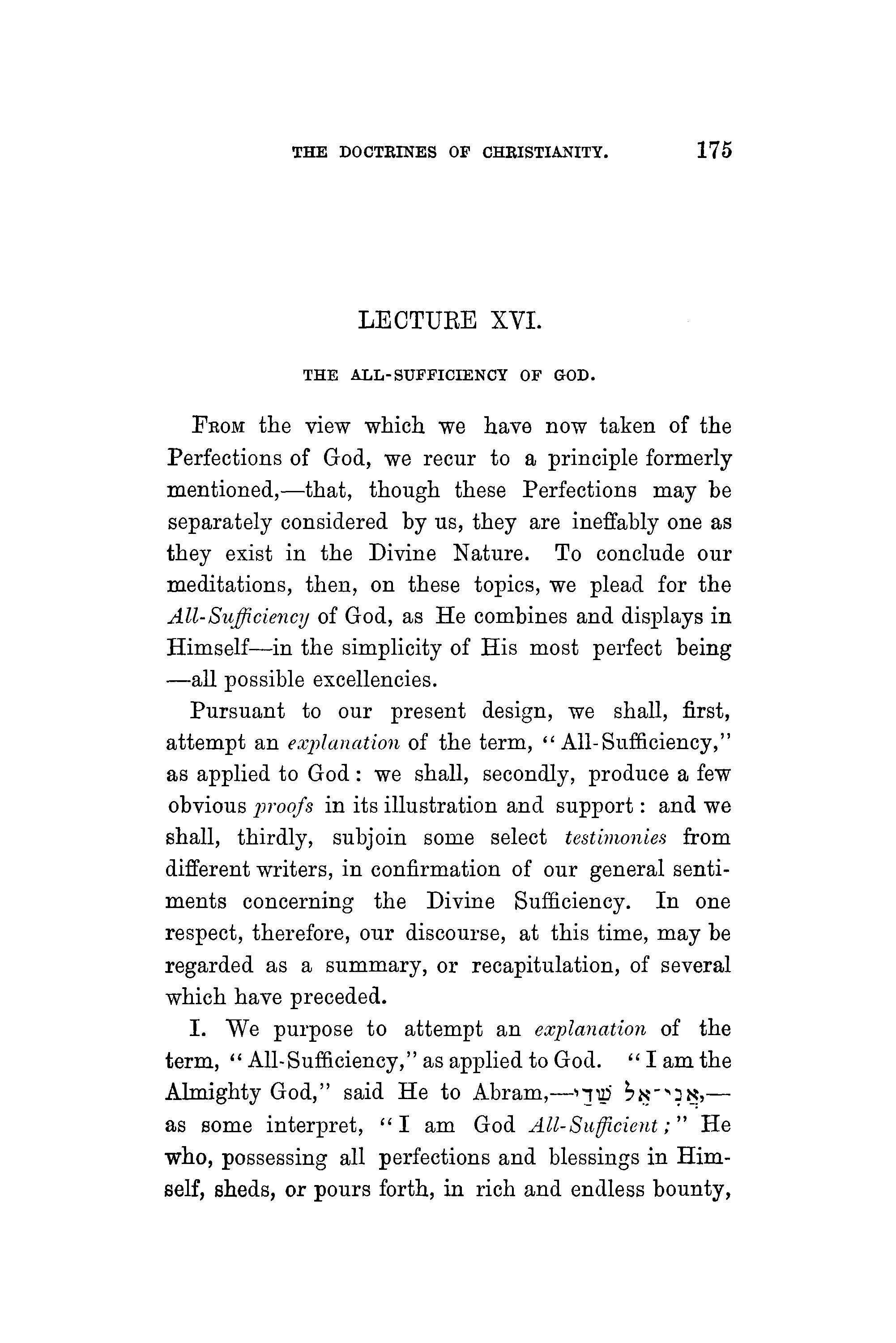
FRoM the view which we have now taken of the Perfections of God, we recur to a principle formerly mentioned,-that, though these Perfections may be separately considered by us, they are ineffably one as they exist in the Divine Nature. To conclude our meditations, then, on these topics, we plead for the All-Sufficiency of God, as He combines and displays in Himself-in the simplicity of His most perfect being -all possible excellencies.
Pursuant to our present design, we shall, first, attempt an explanation of the term, "All-Sufficiency," as applied to God: we shall, secondly, produce a few obvious proofs in its illustration and support : and we shall, thirdly, subjoin some select testimonies from different writers, in confirmation of our general sentiments concerning the Divine Sufficiency. In one respect, therefore, our discourse, at this time, may be regarded as a summary, or recapitulation, of several which have preceded.
I. We purpose to attempt an explanat'ion of the term, "All-Sufficiency," as applied to God. "I am the Almighty God," said He to Abram,-'11P ~~-.,~~,as some interpret, "I am God All-Sufficient;" He who, possessing all perfections and blessings in Himself, sheds, or pours forth, in rich and endless bounty,
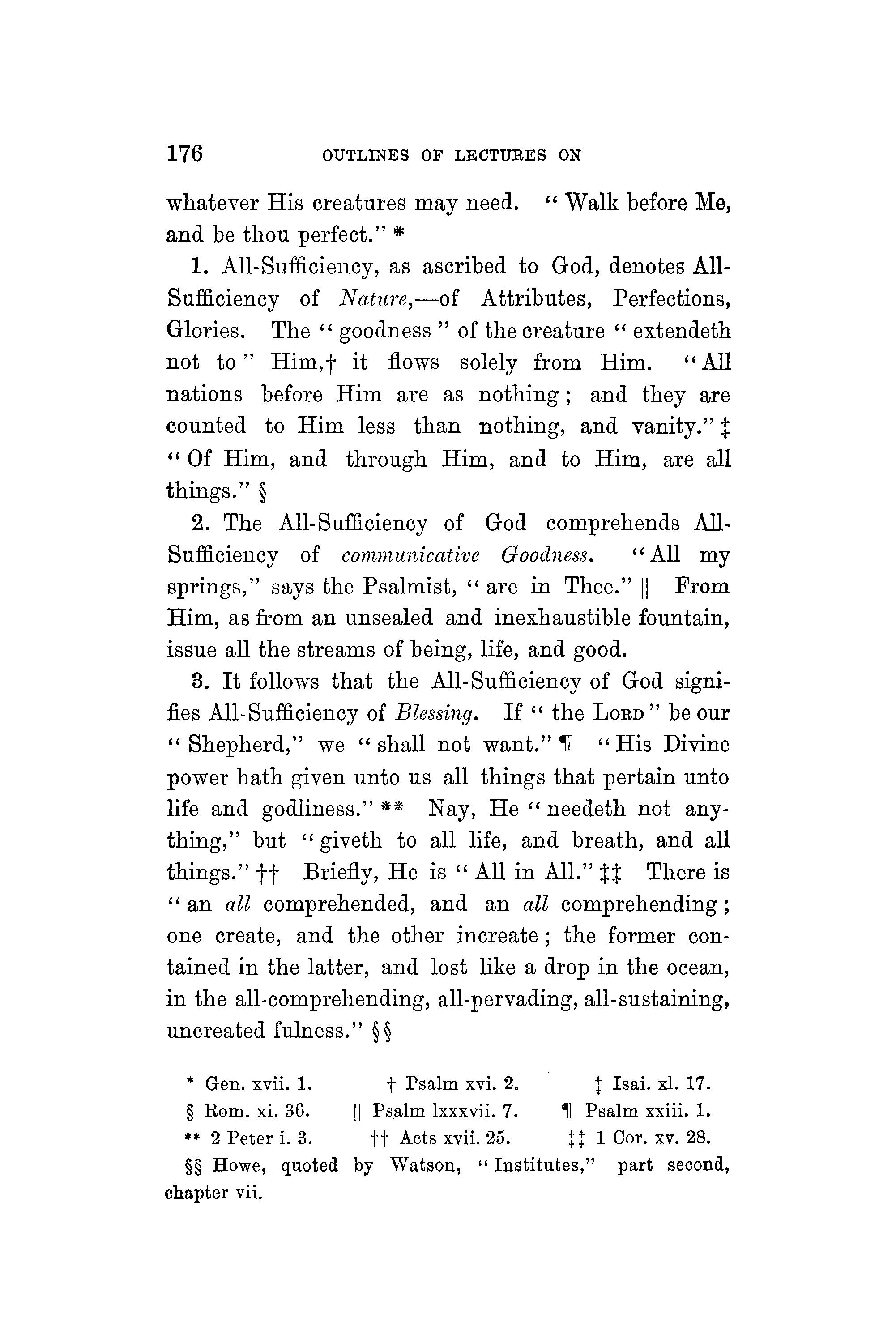
OUTLINES OF LECTURES ON whatever His creatures may need. "Walk before Me, and be thou perfect." *
1. All-Sufficiency, as ascribed to God, denotes AllSufficiency of N atnre,-of Attributes, Perfections, Glories. The "goodness" of the creature "extendeth not to " Him, t it flows solely from Him. " All nations before Him are as nothing ; and they are counted to Him less than nothing, and vanity." t " Of Him, and through Him, and to Him, are all things.''§
2. The All-Sufficiency of God comprehends AllSufficiency of co1n11utnicative Goodness. " All my springs," says the Psalmist, " are in Thee." II From Him, as from an unsealed and inexhaustible fountain, issue all the streams of being, life, and good.
3. It follows that the All-Sufficiency of God signifies All-Sufficiency of Blessing. If " the LoRD" be our " Shepherd," we " shall not want." " His Divine power hath given unto us all things that pertain unto life and godliness."** Nay, He "needeth not anything," but "giveth to all life, and breath, and all things." tt Briefly, He is "All in All." it There is '' an all comprehended, and an all comprehending ; one create, and the other increate; the former contained in the latter, and lost like a drop in the ocean, in the all-comprehending, all-pervading, all-sustaining, uncreated fulness." §§
* Gen. xvii. 1. t Psalm xvi. 2. t Isai. xl. 17.
§ Rom. xi. 36. !I Psalm lxxxvii. 7. ~I Psalm xxiii. 1.
** 2 Peter i. 3. tt Acts xvii. 25. H 1 Cor. xv. 28.
§§ Howe, quoted by Watson, " Institutes," part second, chapter vii.
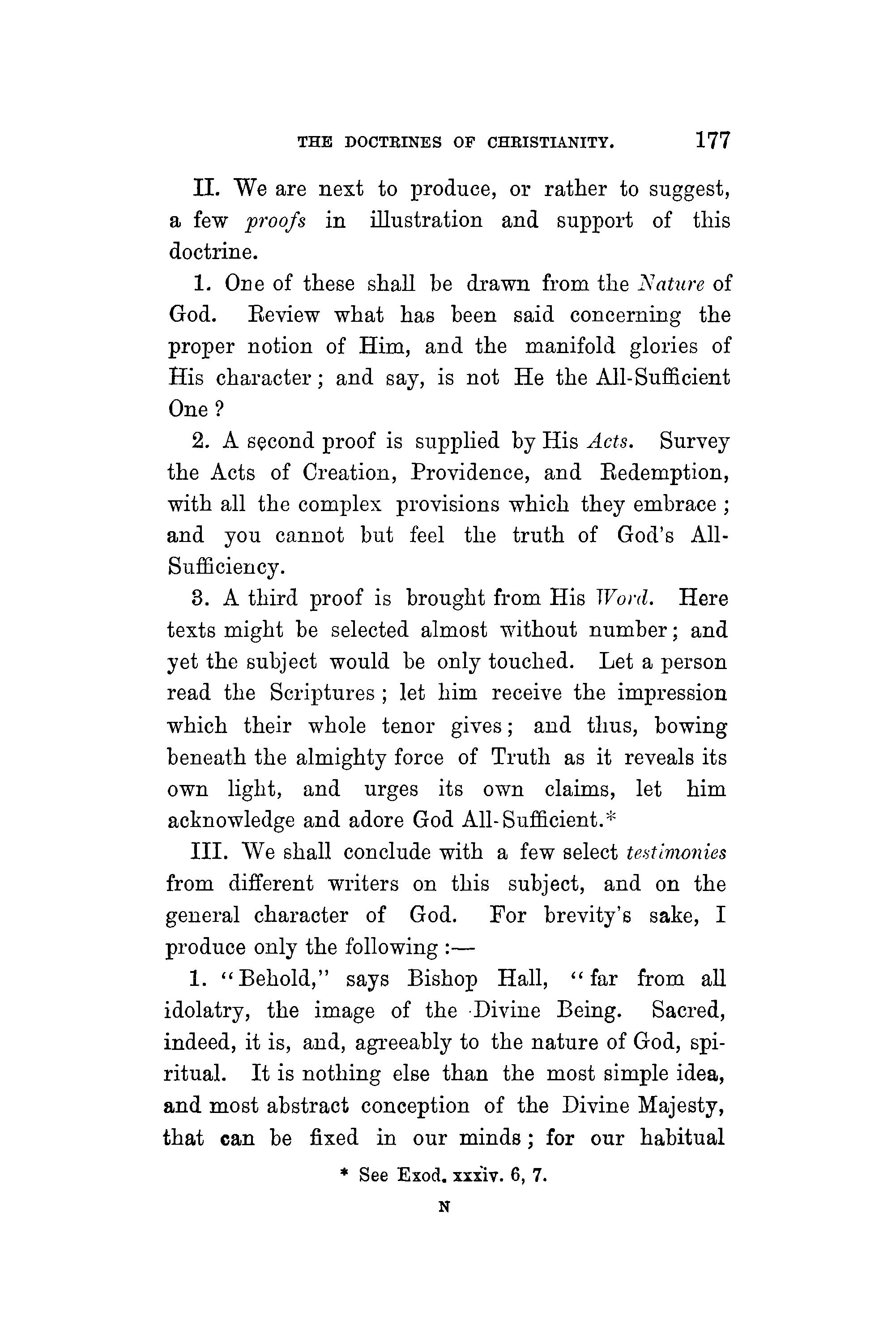
II. We are next to produce, or rather to suggest, a few proofs m illustration and support of this doctrine.
1. One of these shall be drawn from the Nature of God. Review what has been said concerning the proper notion of Him, and the manifold glories of Bis character; and say, is not He the All-Sufficient One?
2. A second proof is supplied by His Acts. Survey the Acts of Creation, Providence, and Redemption, with all the complex provisions which they embrace ; and you cannot but feel the truth of God's AllSufficiency.
3. A third proof is brought from His TVord. Here texts might be selected almost without number; and yet the subject would be only touched. Let a person read the Scriptures; let him receive the impression which their whole tenor gives; and thus, bowing beneath the almighty force of Truth as it reveals its own light, and urges its own claims, let him acknowledge and adore God All-Sufficient.*
III. \Ve shall conclude with a few select testinwnies from different writers on this subject, and on the general character of God. For brevity's sake, I produce only the following:-
1. " Behold," says Bishop Hall, " far from all idolatry, the image of the -Divine Being. Sacred, indeed, it is, and, agreeably to the nature of God, spiritual. It is nothing else than the most simple idea, and most abstract conception of the Divine Majesty, that can be fixed in our minds ; for our habitual
* See Exod. u:iiv. 6, 7.
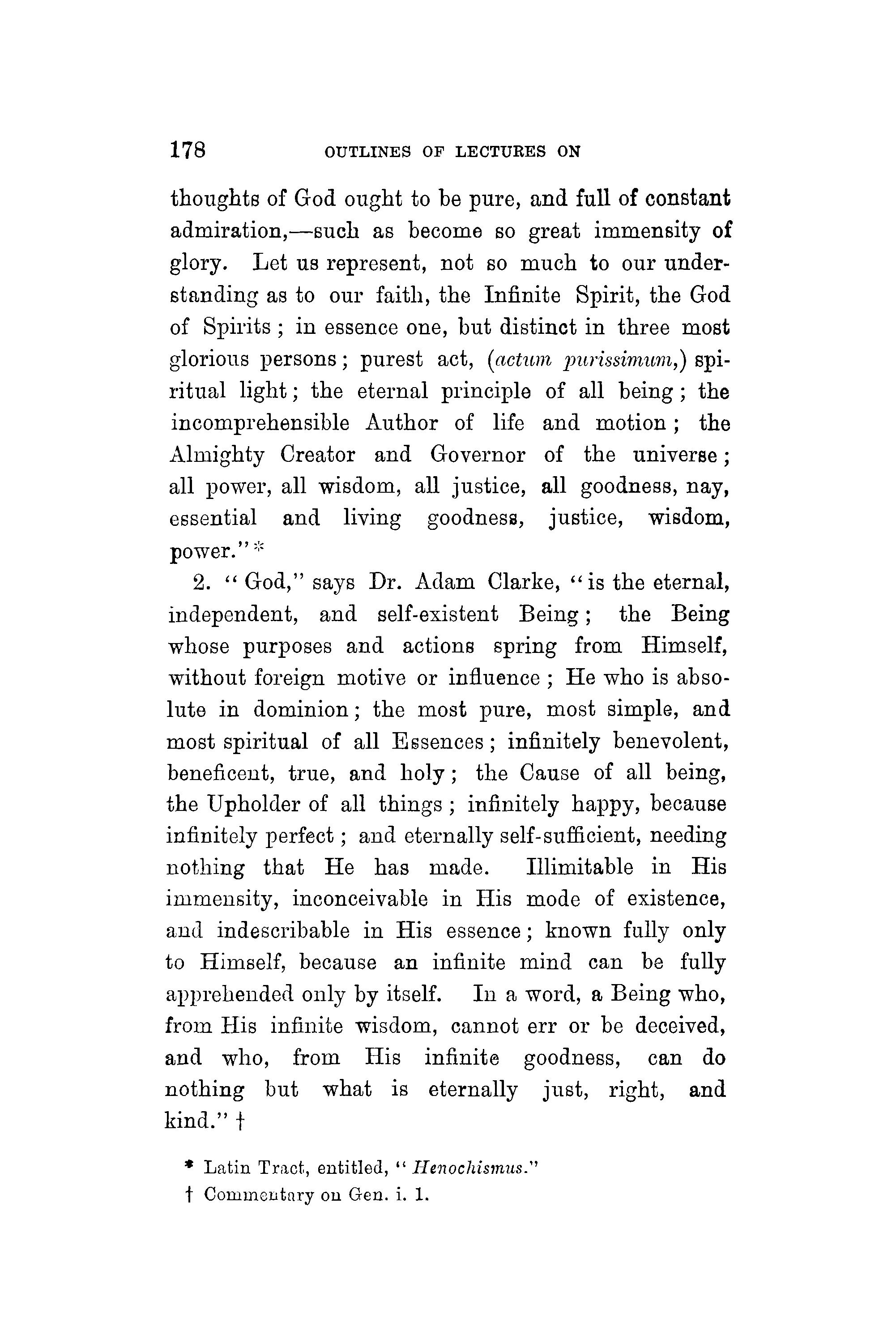
OF LECTURES ON
thoughts of God ought to be pure, and full of constant admiration,-such as become so great immensity of glory. Let us represent, not so much to our understanding as to our faith, the Infinite Spirit, the God of Spirits ; in essence one, but distinct in three most glorious persons ; purest act, (actwn purissirniim,) spiritual light ; the eternal principle of all being ; the incomprehensible Author of life and motion ; the Almighty Creator and Governor of the universe ; all power, all wisdom, all justice, all goodness, nay, essential and living goodness, justice, wisdom, power.",:,
2. "God," says Dr. Adam Clarke, "is the eternal, independent, and self-existent Being; the Being whose purposes and actions spring from Himself, without foreign motive or influence; He who is absolute in dominion; the most pure, most simple, and most spiritual of all Essences; infinitely benevolent, beneficent, true, and holy ; the Cause of all being, the Upholder of all things; infinitely happy, because infinitely perfect ; and eternally self-sufficient, needing nothing that He has made. Illimitable in His immensity, inconceivable in His mode of existence, and indescribable in His essence ; known fully only to Himself, because an infinite mind can be fully apprehended only by itself. In a word, a Being who, from His infinite wisdom, cannot err or be deceived, and who, from His infinite goodness, can do nothing but what is eternally just, right, and kind." t
" Latin Trnct, entitled, "I-Ienochismus.'' t Commeutary on Gen. i. 1.

8. "God," says Mr. Watson, "is unsearchable. All we see or hear of Him is faint and shadowy manifestation. Beyond the highest glory, there is yet an unpierced and unapproached light, a track of intellectual and moral splendour untravelled by the thoughts of the contemplating and adoring spirits who are nearest to His throne. The manifestation of this nature of Goel, never fully to be revealed because infinite, is represented as constituting the reward and the felicity of heaven. This is 'to sec God.' This is ' to be for ever with the Lord.' This is to behold His glory as in a glass, with unveiled face, and to be changed into His image, from glory to glory, in boundless progression and infinite approximation. Yet, after all, it will be as true, after countless ages spent in heaven itself, as in the serpent state, that none by ' searching can find out God,' that is, ' to perfection.' He will then be 'a God that hideth Himself; ' and widely as the illumination may extend, ' clouds and darkness will still be round about Him.' 'His glorious name 1s exalted t1bove all blessing and praise.' 'Thine, 0 LoRD, is the great:u.ess, and the power, and the glory, and the victOTy, and the majesty; for all that is in the heaven and in the earth is Thine; Thine is the kingdom, 0 LoRD, and Thou art exalted as Head over all.' ' Blessed be the LORD God of Israel, who only doeth wondrous things ; and blessed be His glorious name for ever, and let the whole earth be filled with His glory. Amen and Amen.'''*
* "Institutes," part second, chapter vii., at the end.
N 2
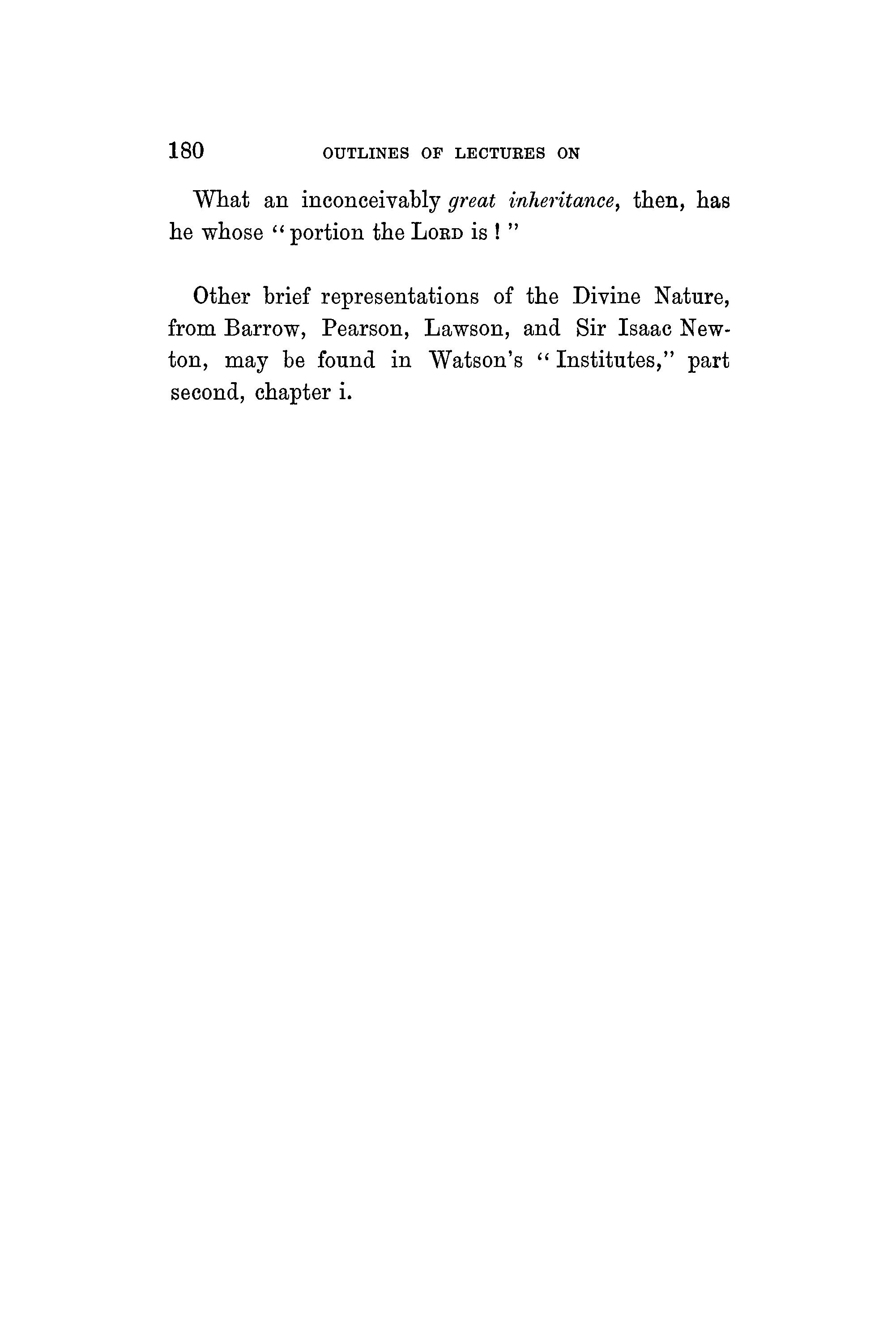
What an inconceivably great inheritance, then, has he whose " portion the LoRDis ! "
Other brief representations of the Divine Nature, from Barrow, Pearson, Lawson, and Sir Isaac Newton, may be found in Watson's "Institutes," part second, chapter i.

THE DIVINE SONSHIP OF OUR LORD.
THE form of baptism not only expresses the Deity of the three Persons in the Trinity, but also the relations in which these three Persons stand to each other. It is necessary to keep this observation in mind. The first person is denominated FATHER,with particular reference to the second Person, who is called SoN,the Son of that Father in the Unity of the Divine Nature ;-not by His miraculous conception or official designation,-but in His Divine Nature, as one of the Persons in the eternal and undivided Trinity.
A controversy arose on this subject, in our own Connexion, several years ago, the history of which it is not necessary to review. Happily, the issue of that controversy was to confirm us more fully in this essential part of the primitive faith. It gave occasion, also, to some able works among us, of which I would particularly mention the Rev. Richard Watson's "Remarks on the Eternal Sonship of Christ ; and the Use of Reason in Matters of Revelation," ,:, and the elaborate and invaluable treatise of the Rev. Richard Treffry, Jun., entitled, "An Inquiry into the Doctrine of the Eternal Sonship of our Lord Jesus Christ." I shall satisfy myself at this time with a general view of the doctrine, but one which I hope will be Scriptural and convincing.
* Works, vol. vii., pp. 1-86.

I. Let us consider the proper import of the title, " Son of God " in itself, or in the signification which it most immediately suggests. Son of God is evidently a name of nature; and it is plainly distinguishable from such titles as " The Christ," " The King of Israel," and the like, which are obviously names of office. When persons affirm that the former title is sufficiently explained by the latter, they certainly speak with great inaccu-racy : they lose sight of one of the clearest distinctions imaginable. I venture to assert, that it would be extremely difficult to prove that names of nature and names of oJfice are ever thus confounded in Holy Scripture.,:,
II. Let us attentively observe the sense in which the title, Son of God, was used by our Lord, and understood by the Jews whom He addressed. On this point the following passage is decisive : " But Jesus answered them, My Father worketh hitherto, and I work. Therefore the Jews sought the more to kill him, because He not only had broken the Sabbath, but said also that God was His Father,"-1rarJpa Wwv rov 0Eov,-His own, His proper or peculiar Father,-" making Himself equal 1.cith God."t This certainly shows the Jewish notion of the expression,-a notion amply confirmed by Mr. Treffry's collections from other quarters.t
III. Let us also note the current language of the New Testa11ient on this subject, as it would be apprehended by every candid and unprejudiced mind : " God so
* Show the proper meaning of such texts as Matt. xvi. 16; xxvi 63; John i. 49; xi. 27; xx. 31.
t John v. 17, 18.
t See his "Inquiry," chap, ii., sec. i., ii., pp. 56 102.

183
loved the world, that He gave His only-begotten Son."* Can this possibly mean, gave Him icho aftenrnrds became His only-begotten Son? Besides, the word "only-begotten" is not used except in the case of one who is partaker of the same nature. t "He spared not His own Son,"-Tov lalov vfou,t-spared not Him who, before He was delivered up, was the proper or peculiar Son of the Father. So likewise m other kindred texts.
IV. Let us remark the especial argument whfrh arises mlt of the history of Olli' Lord's death and resurrection :-
1. He claimed to be the Son of God.
2. He was persecuted to death especially on this groulld. § Two charges were indeed alleged : treason against Ca:sar, and blasphemy against God; but the latter was evidently the chief one.
3. Yet by His resnrrectiun He triumphantly proved the truth of this claim. II
V. Let us not overlook the particular design of certain entire books of the Xnc Testament: such as the Gospel according to St. John, the First Epistle of St. John, and the Epistle to the Hebrews; and mark, in the execution of that design, the views which are taken of our Lord as the Son of God.
* J ohu iii. 16.
t See Luke vii. 12; viii. 42; ix. 38; Heb. xi. 17. The word is appliedfive times to our Lord: John i. 14; L 18; iii. 16; iii. 18; 1 John iv. 9.
t Rom viii. 32.
§ See l\1att. xxvi. 63-65; Mark xiv. 61-64; Luke xxii. 70, 71.
I! See Rom. i. 4.
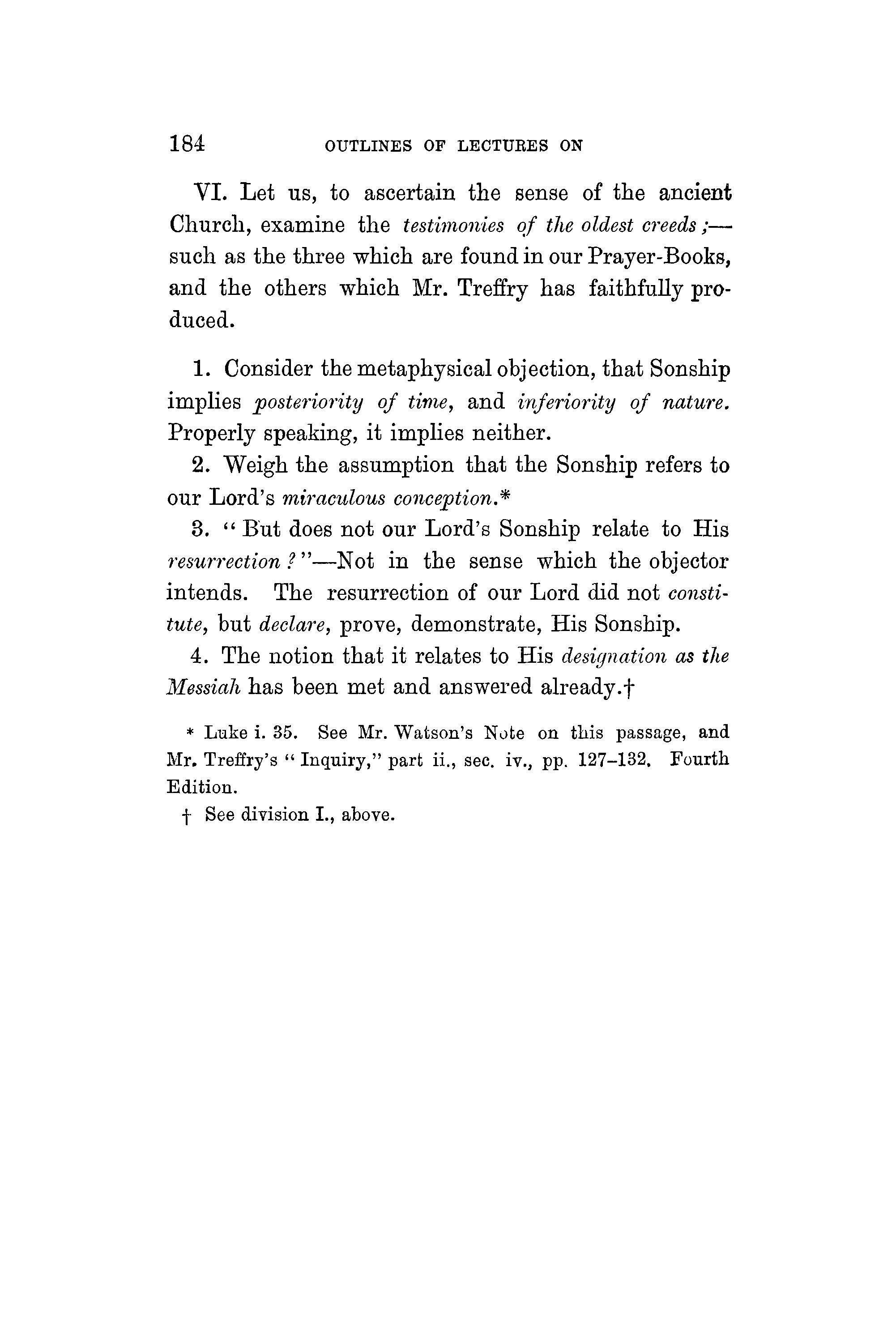
VI. Let us, to ascertain the sense of the ancient Church, examine the testimonies of the oldest creeds;such as the three which are found in our Prayer-Books, and the others which Mr. Treffry has faithfully produced.
1. Consider the metaphysical objection, that Sonship implies posteriority of time, and inferiority of nature. Properly speaking, it implies neither.
2. Weigh the assumption that the Sonship refers to our Lord's miraculous conception.*
3. "But does not our Lord's Sonship relate to His resurrection? "-Not in the sense which the objector intends. The resurrection of our Lord did not constitute, but declare, prove, demonstrate, His Sonship.
4. The notion that it relates to His designation as the Messiah has been met and answered already. t
* Luke i. 35. See Mr. Watson's Note on this passage, and Mr. Treffry's "Inquiry," part ii., sec. iv., pp. 127-132, Fourth Edition.
t See division I., above.
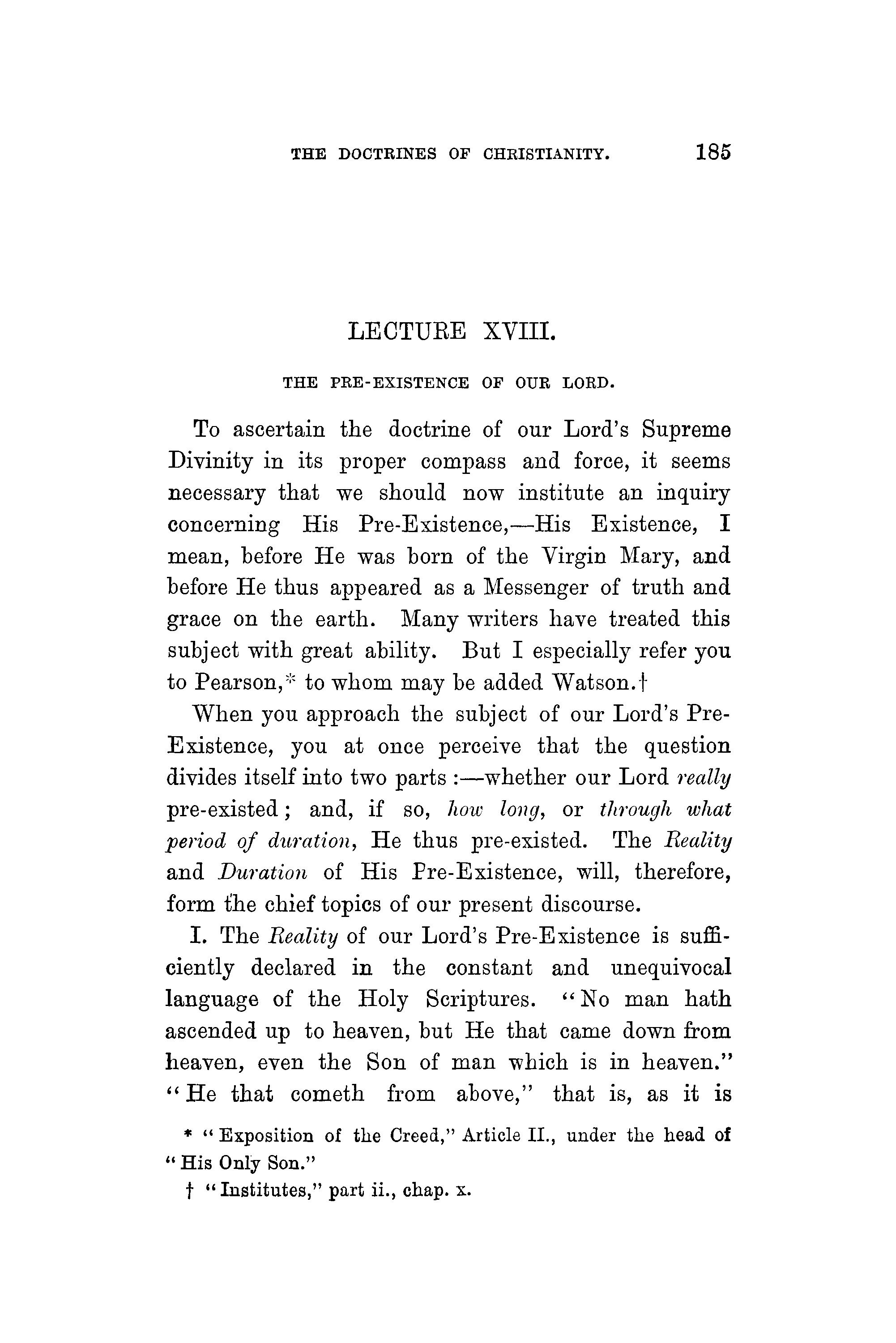
THE PRE-EXISTENCE OF OUR LORD.
To ascertain the doctrine of our Lord's Supreme Divinity in its proper compass and force, it seems necessary that we should now institute an inquiry concerning His Pre-Existence,-His Existence, I mean, before He was born of the Virgin Mary, and before He thus appeared as a Messenger of truth and grace on the earth. Many writers have treated this subject with great ability. But I especially refer you to Pearson,':" to whom may be added Watson.+
When you approach the subject of our Lord's PreExistence, you at once perceive that the question divides itself into two parts :-whether our Lord really pre-existed ; and, if so, how long, or through what period of duration, He thus pre-existed. The Reality and Duration of His Pre-Existence, will, therefore, form the chief topics of our present discourse.
I. The Reality of our Lord's Pre-Existence is sufficiently declared in the constant and unequivocal language of the Holy Scriptures. " No man hath ascended up to heaven, but He that came down from heaven, even the Son of man which is in heaven." "He that cometh from above," that is, as it is
* "Exposition of the Creed," Article II., under the head of " His Only Son."
t "Institutes," part ii., chap. x.

OUTLINES OF LECTURES ON
explained in the same verse, " He that cometh from heaven," "is above all." '' The bread of God is He which cometh down from heaven." "I came down," says our Lord in the same discourse, "from heaven." " What and if ye shall see the Son of man ascend up where He was before ? " " I am from Him," the Father,•" and He hath sent Me." "Say ye of Him, whom the Father hath sanctified, and sent into the world, Thou blasphemest ? " " I am come a light into the world." "I came forth from the Father, and am come into the world." "And now, 0 Father, glorify Thou Me with Thine own self with the glory which I had with Thee before the world was." "Thou lovedst Me before the foundation of the world." "God sent forth His Son :-He brought the :first-begotten into the world." ,:, These passages are but a small part of what the Scriptures teach on this subject. Can anything more explicitly declare the reality of our Lord's Pre-Existence as the Son of God? I can scarcely imagine aught that could add to the native weight of such testimonies, except it were the vain and absurd attempts which have sometimes been made to escape from their force.
II. The Duration of our Lord's Pre-Existence will perhaps be most clearly apprehended by the examination of a short series of proofs which carry the mind backward, and yet further backward, until its thoughts are lost in the inscrutable depths of a pre-eternity. But let us proceed by regular degrees.
1. Our Lord existed bejore John the Baptist, though
• John iii. 13, 31; vi. 33, 38, 62; vii. 29; x. 36; xii. 46; xvi. 28; xvii. 5, 24; Gal. iv. 4; Heb. i. 6.
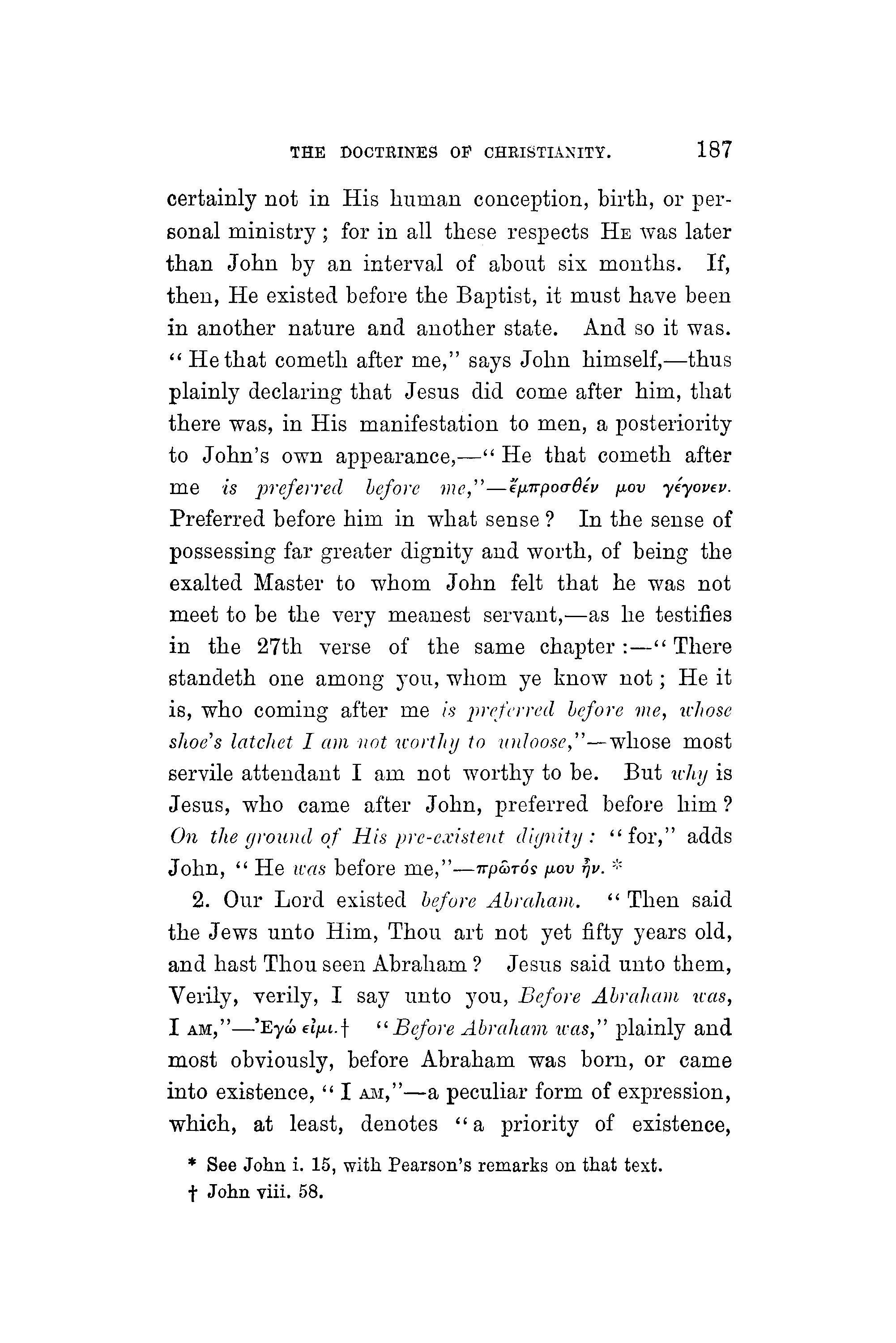
certainly not in His human conception, birth, or personal ministry ; for in all these respects HE was later than John by an interval of about six months. If, then, He existed before the Baptist, it must have been in another nature and another state. And so it was. " He that cometh after me," says John himself,-thus plainly declaring that Jesus did come after him, that there was, in His manifestation to men, a posteriority to John's own appearance,-" He that cometh after me -is preferred before me,"-tµrrpocr0[v µov yiyo11E11. Preferred before him in what sense ? In the sense of possessing far greater dignity and worth, of being the exalted Master to whom John felt that he was not meet to be the very meanest servant,-as he testifies in the 27th verse of the same chapter :--" There standeth one among you, whom ye know not; He it is, who coming after me is prr.(Nrecl before me, ichose shoe's latchet I am not 1rortli!Jto wiloose,"-whose most servile attendant I am not worthy to be. But ich!J is Jesus, who came after John, preferred before him?
On the ground of His prc-e:ciste11tdiu11itv: "for," adds John, " He was before me," -rrp&ir6sµov ~11. ,:,
2. Our Lord existed before Abmham. " Then said the Jews unto Him, Thou art not yet fifty years old, and hast Thou seen Abraham? Jesus said unto them, Verily, verily, I say unto you, Before Abraham iras, I AM,"-'Eyw dµt.f "Before Abmham was," plainly and most obviously, before Abraham was born, or came into existence, " I A11:r,"-a peculiar form of expression, which, at least, denotes '' a priority of existence,
* See John i. 15, with Pearson's remarks on that text.
t John viii. 58.
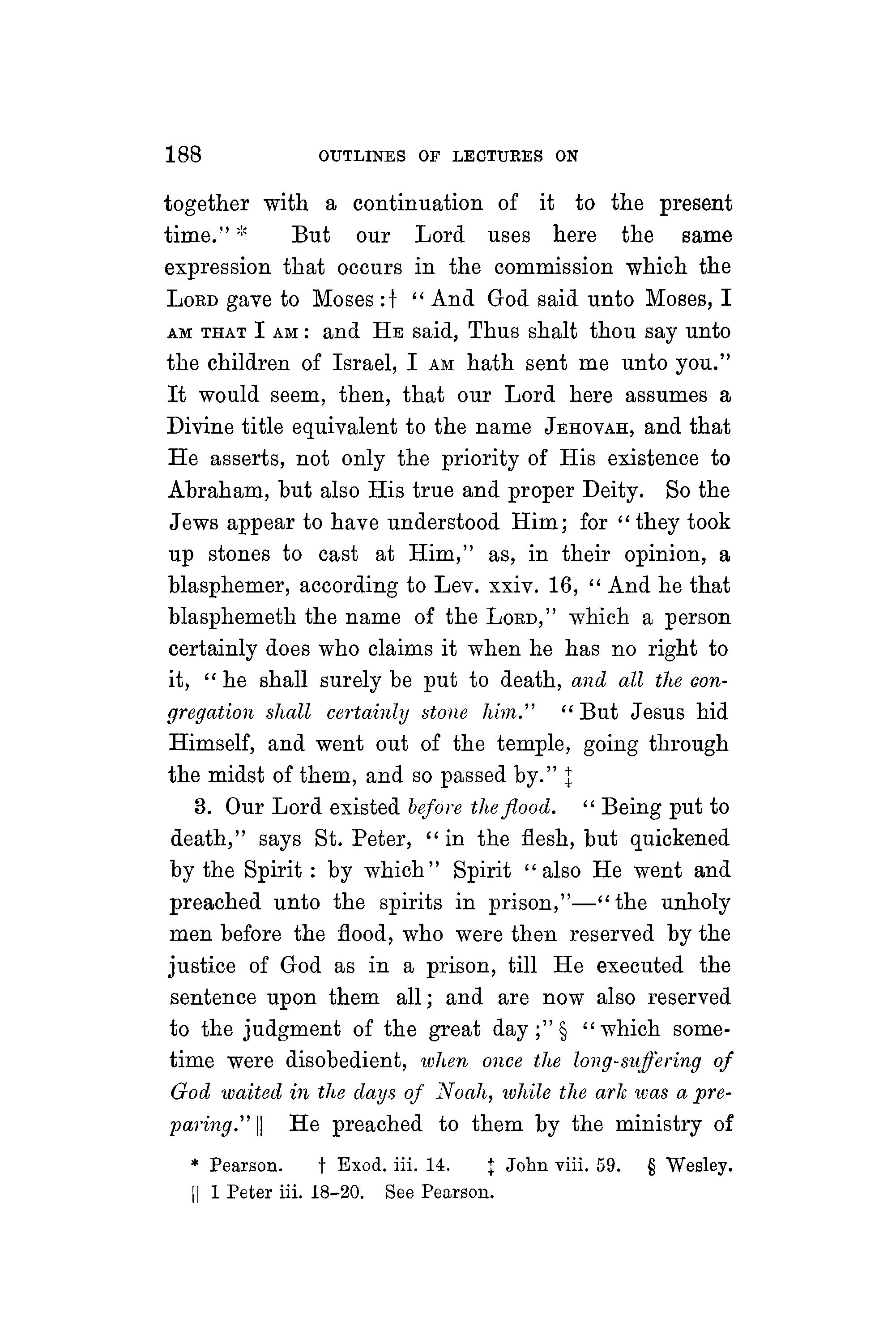
188 OUTLINES OF LECTURES ON
together with a continuation of it to the present time.'',:, But our Lord uses here the same expression that occurs in the commission which the LoRDgave to Moses :t "And God said unto Moses, I AMTHAT I AM : and HE said, Thus shalt thou say unto the children of Israel, I AM hath sent me unto you." It would seem, then, that our Lord here assumes a Divine title equivalent to the name JEHOVAH,and that He asserts, not only the priority of His existence to Abraham, but also His true and proper Deity. So the Jews appear to have understood Him; for "they took up stones to cast at Him," as, in their opinion, a blasphemer, according to Lev. xxiv. 16, "And he that blasphemeth the name of the LoRD," which a person certainly does who claims it when he has no right to it, " he shall surely be put to death, and all the congregation shall certainly stone hini." "But Jesus hid Himself, and went out of the temple, going through the midst of them, and so passed by.'' t
3. Our Lord existed before the flood. "Being put to death," says St. Peter, "in the flesh, but quickened by the Spirit : by which" Spirit "also He went and preached unto the spirits in prison,"-" the unholy men before the flood, who were then reserved by the justice of God as in a prison, till He executed the sentence upon them all ; and are now also reserved to the judgment of the great day ; " § "which sometime were disobedient, when once the long-suffering of God waited in the days of Noah, while the arlc was a preparing.'' II He preached to them by the ministry of
* Pearson. t Exod. iii. 14. t John viii. 59. § Wesley.
ii 1 Peter iii. 18-20. See Pearson.
DOCTRINES OF CHRISTIANITY. 189
His servant Noah, and the strivings of His Spirit. He, therefore, existed at that early period, and existed as God. Was it not HE who said, "My Spirit shall not always strive with man, for that he also is flesh : yet his days shall be an hundred and twenty years ? "*
4. Our Lord ,existed bqfore the creation of the world : for He was "in the beginning,"-" from the begin-, ning, "-" before all things." t
5. Our Lord existed from, eternity. "But thou, Bethlehem Ephratah, though thou be little among the thousands of Judah, yet out of thee shall He come forth unto Me,"-there is our Lord's birth in the human nature,-" that is to be ruler in Israel; whose goings forth," in the in4fable and eternal generation of His Divine Nature, "have been from of old, from everlasting ;"-or, literally, as in the margin, fr01n "the days ,-r • "+ (!; eternity. +
I may confidently assert that the arguments of the last two Lectures refute both the Socinian and the Arian schemes, and contain most convincing proofs of our Lord's true Divinity. But I will pursue the subject at yet greater length, until, I trust, these proofs shall become exceedingly copious and clear. The order in which I think that I shall most naturally arrange my remaining arguments, is the following:-
I. I will, first, show that Divine Names and Titles are ascribed, in the most unqualified sense, to our Lord, and that He is thus declared to be truly God.
II. I will, secondly, show that Divine Attributes,
* Gen. vi. 3.
t Micah v. 2.

t John i. 1; 1 John i. 1; Col. i. 17.

Pe1jections, and Glories, are ascribed, m the same unqualified sense, to our Lord, and that He is thus proved to be truly God.
III. I will, thirdly, show that Divine Works are, in the same sense, ascribed to our Lord, and that He is thus exhibited to us as truly God.
IV. I will, fourthly, show that the Worship of the Supreme God is most unequivocally ascribed to our Lord, and that He is thus solemnly acknowledged and adored as truly God.
V. I will, fifthly, show that there is the indirect ascription to our Lord of all Divine Honours in passages which are wrought into the very texture of Revelation, and which cannot be fairly eluded while that Revelation remains.
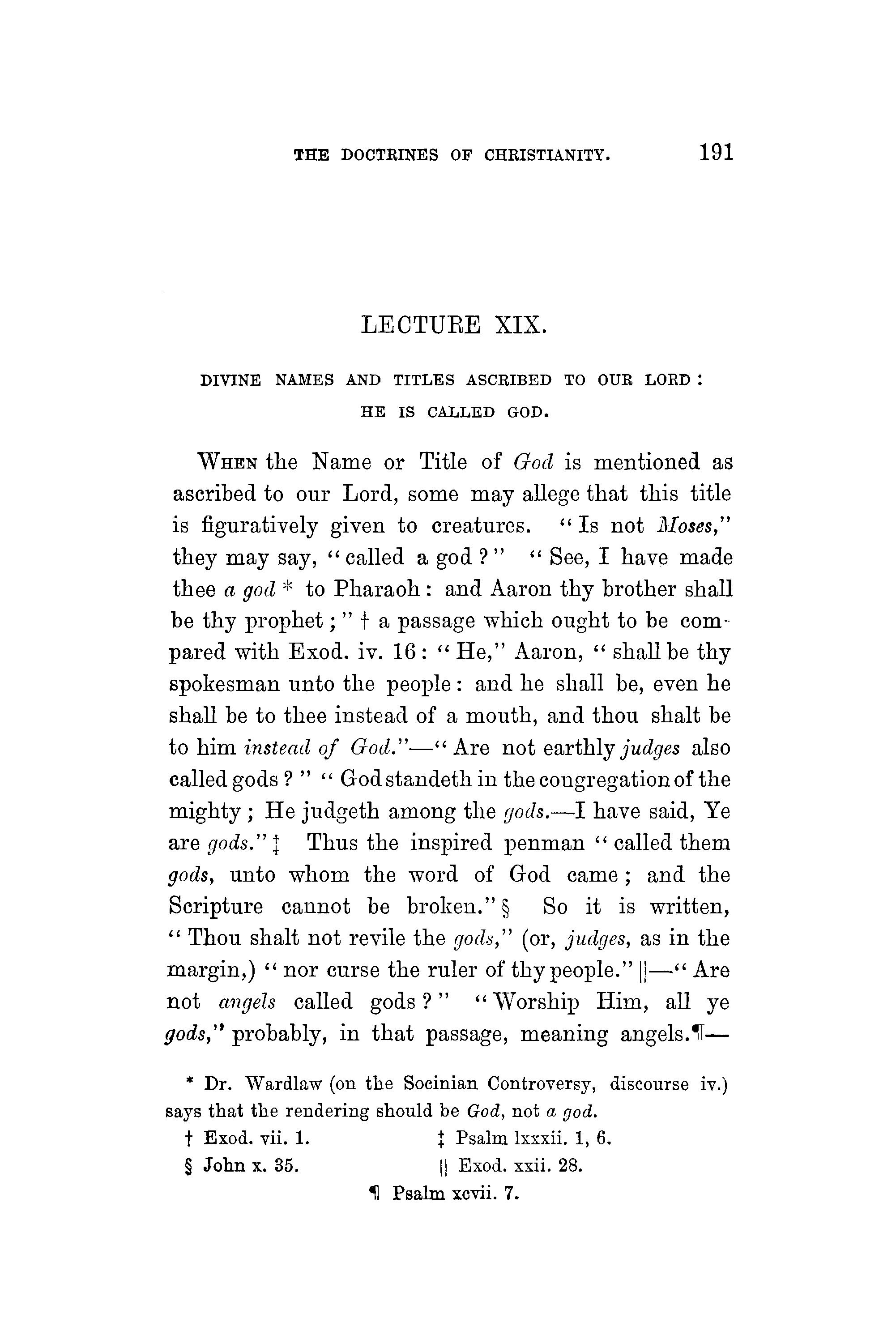
LECTURE XIX.
DIVINE NAMES AND TITLES ASCRIBED TO OUR LORD: HE IS CALLED GOD,
WHEN the Name or Title of Goel is mentioned as ascribed to our Lord, some may allege that this title is figuratively given to creatures. "Is not ]loses," they may say, "called a god?" " See, I have made thee a gocl* to Pharaoh : and Aaron thy brother shall be thy prophet ; " t a passage which ought to be compared with Exod. iv. 16: "He," Aaron, " shall be thy spokesman unto the people: and he shall be, even he shall be to thee instead of a mouth, and thou shalt be to him insteaclof God."-" Are not earthly juclges also called gods ? '' '' God standeth in the congregation of the mighty; He judgeth among the gods.-I have said, Ye are gods." t Thus the inspired penman "called them gods, unto whom the word of God came ; and the Scripture cannot be broken." § So it is written, " Thou shalt not revile the gocls," (or, judges, as in the margin,) "nor curse the ruler of thy people." II-" Are not angels called gods ? " " ·worship Him, all ye gods,'' probably, in that passage, meaning angels.~-
* Dr. Wardlaw (on the Socinian Controversy, discourse iv.) says that the rendering should be God, not a god.
t Exod. vii. 1. t Psalm lxxxii. 1, 6.
§ John x. 35. II Exod. xxii. 28. Psalm xcvii. 7.

" Are not pagan idols called gods ? " *-" Is not Satan styled ' the god of this world ? ' " t Now it is inquired whether, as the title of god is thus figuratively given to creatures, it may not be given in a like manner to our Lord; or, at least, whether the ascription of that name to Him really be a convincing evidence of His true Divinity.
Yes ; it is :-for we shall entirely preclude the objection above noted by producing passages in which the name of God is evidently used of our Lord in its peculiar and most eminent application,-in its highest and most imqualffied sense,-as it is never given to a creature, but as it appertains only to Supreme Deity. This is the peculiar design of our present argument,to prove, namely, that the title of God is ascribed to our Lord in its most exalted signification.
I. He is "The Mighty God." "For unto us a Child is born, unto us a Son is given : and the government shall be upon His shoulder : and His Name shall be called,"-He shall be devoutly acknowledged to be, what He really is,-" Wonderful, Counsellor, The Mighty God, The Everlasting Father, The Prince of Peace." t I need not stay to prove that this passage is intended of our Lord. § He is " The Mighty God." Is that title ever given to a creature? II
II. He is "Emmanuel,"-" God with us." 1 Observe, the name Jesus properly signifies, Jah, or Jehovah, the Saviour. Our Lord sustains this title,
• See 1 Cor. viii. 5. t See 2 Cor. iv. 4.
t Isai. ix. 6. § Compare the next verse.
II See chap. x. 21.
, Matt. i. 23, compared with Isai. vii. 14.
THE DOCTRINES OF CHRISTIANITY. 193
because He saves froni sins,-because He Himself, (aln·os,)saves from sins, not merely as the instrument of another, but by His own power and mercy,-and because He saves His people, to whom He stands in a covenant-relation, from their sins. "Now all this was done, that it might be fulfilled which was spoken of the Lord by the prophet, saying, Behold, a virgin shall be with child, and shall bring forth a son, and they shall call His name Emmanuel, which being interpreted is, God with us." Emmanuel, therefore, corresponds to Jesus ; and as Jesus denotes Jehovah the Saviour, who Himself saves His people from their sins, Emmanuel is of like import, and can never be given to a creature.
III. He is " the Lord God of the children of Israel : " -" the Lord," which evidently answers to Jehovah," God of the children of Israel," which declares a Divine covenant-relation. "And many of the children of Israel shall he," John the Baptist, "turn to the Lord their God. And he shall go before Him," that is, "the Lord their God." But he went before Jesus, as His harbinger or forerunner. Therefore, Jesus is " the Lord their God." Is this title ever assigned to a creature? *
IV. He is " God," viewed a~ the Universal and Eternal Creator. " In the beginning was the Word, and the Word was with God, and the Word was God. The same was in the beginning with God. All things were made by Him ; and without Him was not any thing made that was made." t Where is language like this used of any creature ?
* See Luke i. 16, 17.

t John i. 1-3.
V. He is called by Thomas, "l,fy Lord and my God." "And Thomas answered and said unto Him," -as a profession of faith corresponding to what Jesus Himself had just said and done,-" My Lord and my God," literally, " The Lord of me and the God of me," according to the proper force of the Greek article, which is here twice used. '' And let Him be the Lord of me, and the God of me; who was the Lord and the God of an Apostle."* Had an Apostle, then, a creature only for the Lord whom he served, and the God whom he adored ? t
VI. He is "over all, God blessedfor ever." "My kinsmen according to the flesh : who are Israelites ; to whom pertaineth the adoption, and the glory, and the covenants, and the giving of the law, and the service of God, and the promises; whose are the fathers, and of whom as concerning the flesh Christ came, who is over all, God blessed for ever. Amen." t Socinians cannot get over this passage ; and they prove that they cannot by the multitude of strange and distorted interpretations which they have suggested.
VII. He is "the Great God and our Saviour." " Looking for that blessed hope, and," to translate with literal exactness, "the appearing," or manifestation, "of the glory of the great God and Saviour of us," that is, "of our great God and Saviour," "Jesus Christ." § So St. Peter speaks of " the righteousness of God and our Saviour Jesus Christ," where the marginal reading, literally from the Greek, is, "of our God and Saviour." II
"' Pearson. t See John xx. 28. t Rom. ix. 3-5.
§ Titus ii. 13.

II 2 Peter i. 1.

THE DOCTRINES OF CHRISTIANITY. 195
VIII. He is the " God," whose " throne is for ever and ever." *
IX. He is " the True God." " And we know that the Son of God is come, and hath given us an understanding, that we may know Him that is true, and we are in Him that is true, even in His Son Jesus Christ. This," or He, namely, "This Son Jesus Christ," "is the true God, and eternal life." t
Is it possible that language can more fully declare that the title of God is ascribed to our Lord in the highest possible sense, than is declared in these nine selected examples?
Note.-! formerly quoted, as a tenth example, Jude 24, 25, in which, as some think, the title of " ONLY WisE GoD" is ascribed to our Lord. But, as I seek only for clear and indisputable testimonies, I would not lay stress on this application of the text in Jude, -and especially as I find that another reading is more approved by critics,-by Griesbach, for example, and Tischendorf: t-" To the only God our Saviour, through Jesus Christ our Lord, be glory," etc.
But one signal testimony of our Lord's supreme Godhead, in conjunction also with "the mystery of His holy Incarnation," I will here put down :-" For in Him DWELLETH ALL THE FULNESS OF THE GODHEAD BODILY,"§
• Heb. i. 8. t 1 John v. 20.
t Compare also Scholz and Lachmann.
§ Col. ii. 9.
DIVINE NAMES AND TITLES ASCRIBED TO OUR LORD: HE IS CALLED JEHOVAH.
WHENwe allege that the name JEHOVAH is ascribed to our Lord, it would seem that no one can speak of this name as figuratively given to creatures. The Psalmist's language on the subject appears to be very strong and decisive :-" That men may know that Thou, whose name alone is JEHOVAH,art the Most High over all the earth."*
Yet objectors signify that even this name is found in titles assigned to remarkable places, things, and per~ sons. Thus Abraham "called the name of that place," where he had prepared to offer his son Isaac, '' Jehovahjireh. t Thus also Moses " called the name " of the altar which he built on the discomfiture of Amalek, "Jehovah-nissi," t as Gideon, in like manner, "built an altar unto the LoRD" in Ophrah, " and called it Jehovah-shalom;"§ "And," says Ezekiel, "the name of the city,"-the glorious city which he has so largely described,-" from that day shall be, Jehovah-shammah." II Thus the word Jehovah, usually abbreviated, is found in the composition of many Hebrew proper names; of which one example may suffice:-" The LoRD loved him," Solomon. " And He sent by the
* Psalm lxxxiii. 18.
t Gen. xxii. 14.
II E:iiek. :tlviii. 35.
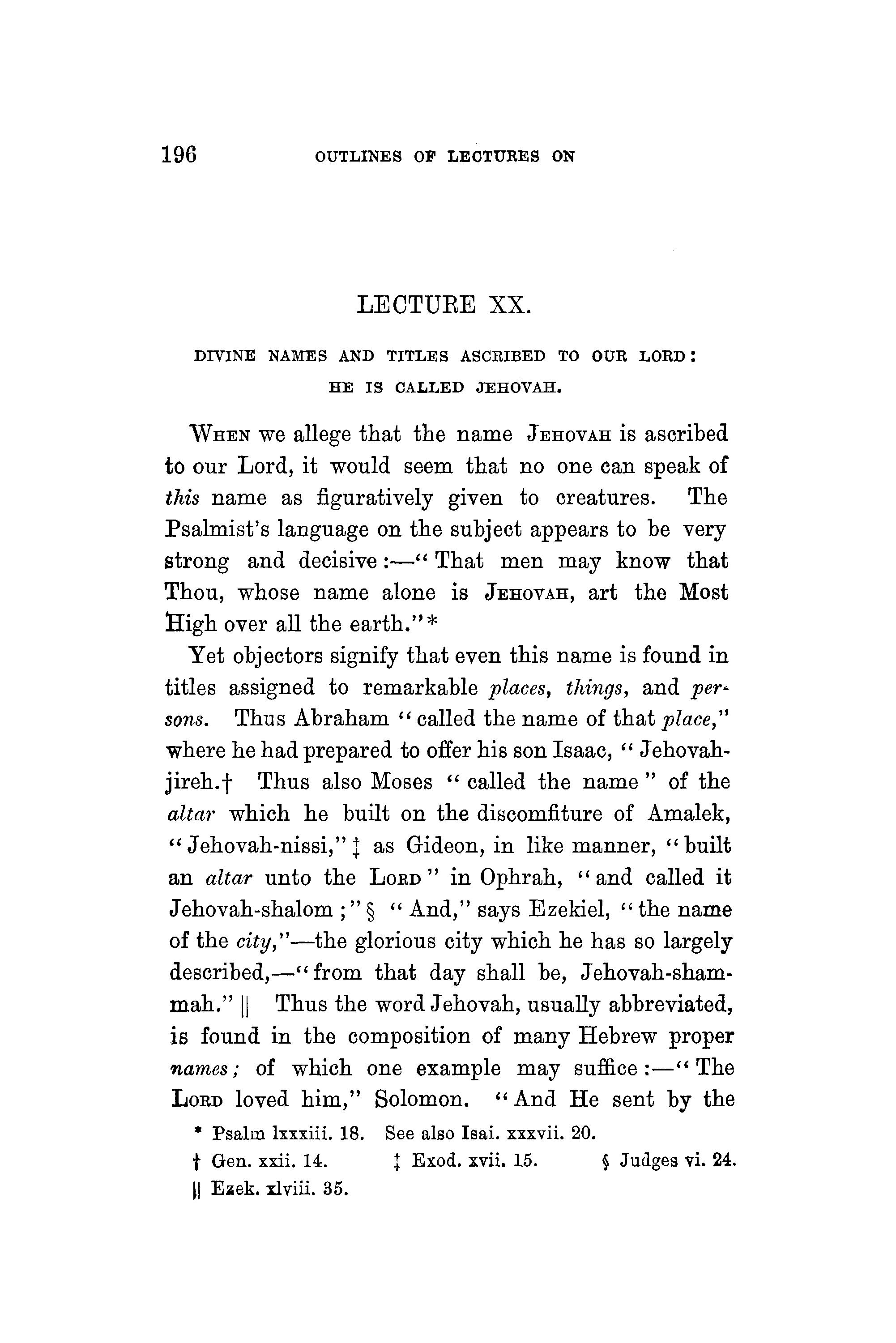
See also Isai. xxxvii. 20.
t Exod. xvii. 15. § Judges vi. 24.

THE DOCTRINES OF CHRISTIANITY, 197 hand of Na than the prophet ; and He called his name Jedidiah," beloved of J ah, or Jehovah, " because of the LoRD."* But it shall be the object of our quotations to prove that the name Jehovah is ascribed to our Lord in a far higher sense than this,-in a sense which ascertains Him to be Himself Jehovah.
One other introductory remark I wish to make,that our venerable translators have seldom retained the word Jehovah in their version, but have rendered it oftenest by the name LoRD, and not unfrequently by the name GoD. For the sake of distinction, when they translate Jehovah by these words in the Old Testament, they invariably put them into small capitals. I could wish that they had done the same in the New Testament also, where the word Kupios evidently answers to Jehovah. We may, however, supply this omission by inserting a few explanatory notes.
I. Consider Isai. viii. 13, 14. " Sanctify the LoRD," that is, JEHOVAH,"of hosts Himself; and let Him be your fear, and let Him be your dread. And He shall be for a sanctuary; but for a stone of stumbling and for a rock of offence to both the houses of Israel, for a gin and for a snare to the inhabitants of Jerusalem." Is not the name JEHOVAH used here in its highest application,-as the proper. name of the Being of beings ? No one can doubt it.
Turn now to 1 Peter ii. 7-9. " Unto you therefore which believe He is precious : but unto them which be disobedient, the stone which the builders disallowed,"-that is, "Jesus Christ," t-the "chief corner stone, elect, precious," which God has "laid in * 2 Sam. xii. 25. t l Peter ii. 5.

OUTLINES OF LECTURES ON
Sion,"*-" the same is made the head of the corner, and a stone of stumbling, and a rock of offence, even to them which stumble at the word, being disobedient: whereunto also they were appointed," according to the prophecy which the Apostle most evidently quotes. "But ye "-ye who believe-" are a chosen generation, a royal priesthood, an holy nation, a peculiar people; that ye should show forth the praises of Him who hath called you out of darkness into His marvellous light." To you, in brief, He " shall be for a sanctuary. 11
Observe, the prophet informs us what "JEHOVAH of hosts Himself" will be to believers and to unbelievers ; but the inspired Apostle, quoting and commenting on this very pasRage, informs us what " Jesus Christ " is to believers and to unbelievers : therefore, according to the Apostle, Jesus Christ is "JEHOVAH of hosts Himself."
II. Weigh that passage, Isai. vi. 5, 9, 10. " Then said I, Woe is me ! for I am undone ; because I am a man of unclean lips, and I dwell in the midst of a people of unclean lips: for mine eyes have seen the King, the LoRn," that is, JEHOVAH, "of hosts: "-I have seen Him in His glory, "sitting upon a throne, high and lifted up," while "His train filled the temple," t and the attendant " seraphims one cried unto another, and said, Holy, holy, holy, is the LoRD," that is, JEHOVAH, "of hosts: the whole earth is full of His glory."+ Isaiah, then, saw the glory of JEHOVAH of hosts, in one of its highest and most sacred manifestations. " And He said, Go, and tell this people, Hear ye indeed, but understand not ; and see ye indeed, but
* 1 Peter ii. 6, t Isai. vi. 1. t Isai. vi. 2, 3.

perceive not. Make the heart of this people fat, and make their ears heavy, and shut their eyes; lest they see with their eyes, and hear with their ears, and understand with their heart, and convert, and be healed."
Compare with this John xii. 39-41. " Therefore they," the Jews, "could not believe, because that Esaias said again, He hath blinded their eyes, and hardened their heart; that they should not see with their eyes, nor understand with their heart, and be converted, and I should heal them. These things said Esaias, when be saw His glory,"-that is, the glory of Jesus, * who " had done so many miracles before them," t-" and spake of Him."
This argument forms and applies itself. Isaiah saw the undoubted and most manifest glory of "the King, JEHOVAHof hosts:" but St. John testifies that he saw " the glory of Jesus, and spake of Him : " therefore, according to St. John, Jesus is "the King, JEHOVAH of hosts."
III. Examine Isai. xliv. 6. "Thus saith the LoRD," that is, J EHovAH, '' the King of Israel, and His Redeemer the LoRD," that is, JEHOVAH, " of hosts ; I am the first, and I am the last ; and beside Me there is no God."
Look now at Rev. xxii. 18. "I," that is, "I Jesus," t " am Alpha and Omega, the beginning and the end, the first and the last."
Not only is the LoRn's Redeemer styled JEHOVAHby the Prophet, which is a direct proof of our argument; but a strong evidence is also supplied by a comparison
• John xii. 36. t John xii. 37. t Rev. xxii. 16.

OUTLINES OF LECTURES ON
of these two texts, which may be propounded thus :It is the pecitliar prerogative of "JEHOVAH, the King of Israel," as the only God, to be " the first and the last:" but Jesus is "Alpha and Omega, the beginning and the end, the first and the last:" therefore Jesus is "JEHOVAH, the King of .lsrael."
IV. Read Isai. xlv. 22-25. "Look unto Me, and be ye saved, all the ends of the earth : for I," that is, "I the LoRD,or JEHOVAH"*" am God, and there is none else. I have sworn by Myself, the word is gone out of My mouth in righteousness, and shall not return, That unto JJ1e every knee shall bow, every tongue shall swear. Surely, shall one say, In the LoRD," that is, in JEHOVAH, "have I righteousness," literally, "righteousnesses," or most abundant and manifold righteousness, "and strength : even to Him shall men come ; and all that are incensed against Him shall be ashamed. In the LoRD," or JEHOVAH,"shall all the seed of Israel be justified, and shall glory."
Now refer to Rom. xiv. 10-12. "But why dost thou judge thy brother ? or why dost thou set at nought thy brother ? for we shall all stand before the judgmentseat of Clirist. + For it is written, As I live, saith the Lord,"-a word here which plainly answers to the Hebrew JEHOVAH, and which ought to have been printed in small capitals,-" every knee shall bow to Me, and every tongue shall confess to God. So then every one of us shall give account of himself to God."
* Isai. xlv. 21.
t But it is right to say, that some copies read here "of God," and that Tischendorf and Lachmann adopt this reading,-a reading which also occurs in the " Codex Sinaitic1ts."

This passage yields pregnant proof of our Lord's Deity. 1. It shows that the whole text in Isaiah, of which the Apostle quotes but a part, is applicable to Him. 2. It ascribes to Him the name of God, viewed as Universal Judge. 3. It assigns to Him the name JEHOVAH.The Prophet declares what JEHOVAHwill do: but the Apostle asserts that Christ will do this: therefore, Christ is JEHOVAH.
V. Observe that text, Jer. xxiii. 5, 6. "Behold, the days come, saith the LoRD,that I will raise unto David a righteous Branch, and a King shall reign and prosper, and shall execute judgment and justice in the earth." All this plainly refers to the promised Christ. "In His days Judah shall be saved, and Israel shall dwell safely: and this is His name,"-not a name given to mark a place, thing, or ordinary person, but His peculiar and exclusive name,-" whereby He shall be called, THE LoRD," that is, JEHOVAH,"Ou:a RIGHTEOUSNESS.''
VI. Reconsider Luke i. 16, 17, which was quoted in our last Lecture, and compare it with Malachi iv. 5, 6.
VII. " The voice of him that crieth in the wilderness," says Isaiah, chap. xl. 3, " Prepare ye the way of the LoRn," that is, of JEHOVAH,"make straight in the desert a highway for ow· God." " And thou, child," said Zacharias to the infant Baptist, "shalt be called the prophet of the Highest : for thou shalt go before the face of the Lord," a word answering to J EHovAH," to prepare His ways.",:< Therefore, Jesus, whose harbinger John was, is JEHOVAH,-asthe same quotations also prove that He is "the HIGHEST,"and "our God,"
* Luke i. 76.
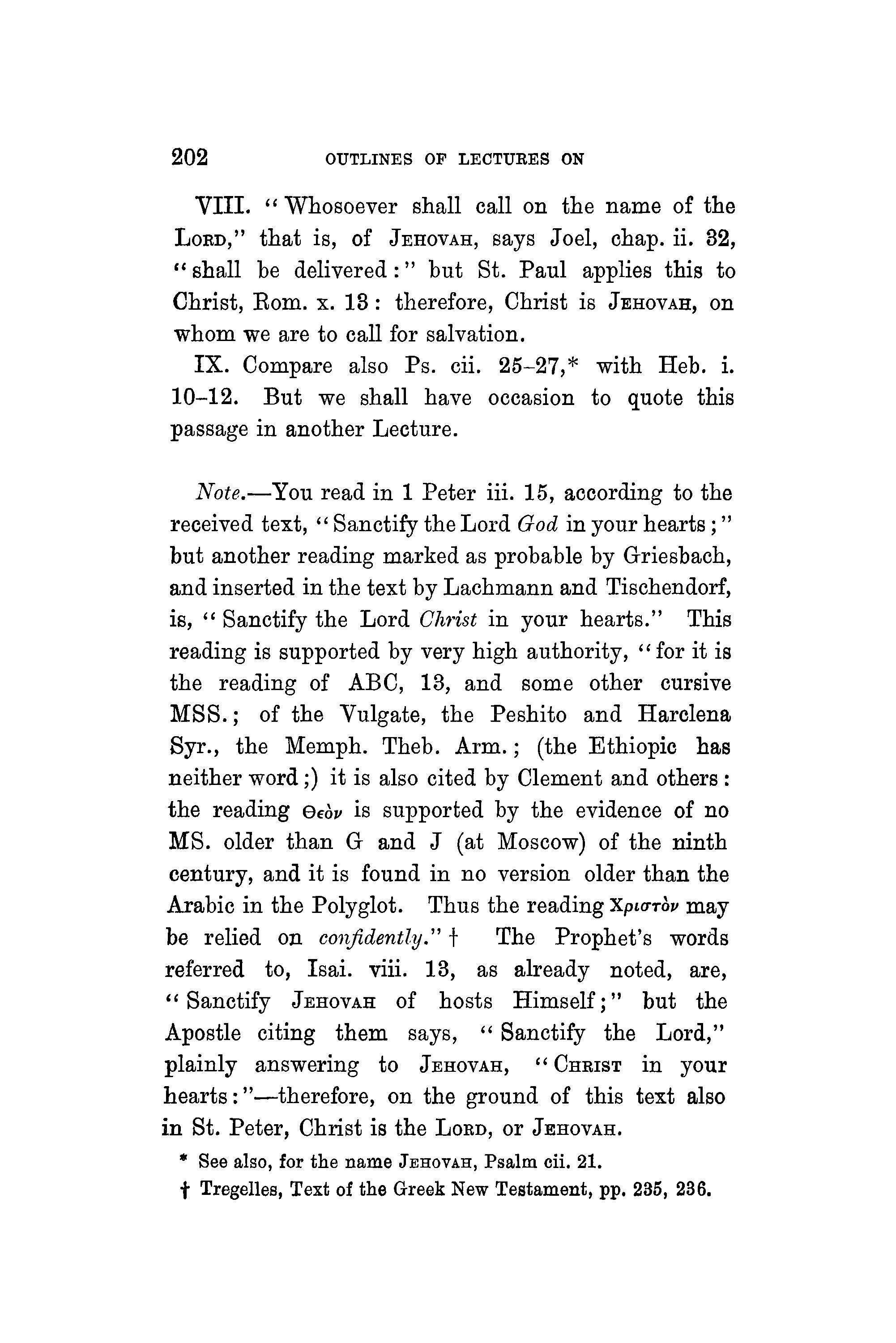
VIII. '' Whosoever shall call on the name of the LoRD," that is, of JEHOVAH,says Joel, chap. ii. 32, " shall be delivered : " but St. Paul applies this to Christ, Rom. x. 13: therefore, Christ is JEHOVAH,on whom we are to call for salvation.
IX. Compare also Ps. cii. 25-27, * with Heb. i. 10-12. But we shall have occasion to quote this passage in another Lecture.
Note.-You read in 1 Peter iii. 15, according to the received text, " Sanctify the Lord God in your hearts ; " but another reading marked as probable by Griesbach, and inserted in the text by Lachmann and Tischendorf, is, " Sanctify the Lord Christ in your hearts." This reading is supported by very high authority, "for it is the reading of ABC, 13, and some other cursive MSS.; of the Vulgate, the Peshito and Harclena Syr., the Memph. Theb. Arm.; (the Ethiopic has neither word;) it is also cited by Clement and others: the reading 0£ov is supported by the evidence of no MS. older than G and J (at Moscow) of the ninth century, and it is found in no version older than the Arabic in the Polyglot. Thus the reading Xpt<Trov may be relied on confidently." t The Prophet's words referred to, Isai. viii. 13, as already noted, are, " Sanctify JEHOVAHof hosts Himself;" but the Apostle citing them says, " Sanctify the Lord," plainly answering to JEHOVAH,'' CHRIST in your hearts : "-therefore, on the ground of this text also in St. Peter, Christ is the LoRD, or JEHOVAH.
* See also, for the name JEHOVAH, Psalm cii. 21.
t Tregelles, Text of the Greek New Testament, pp. 235, 236.

DIVINEATTRIBUTESASCRIBEDTO OURLORD : OMNIPO· TENCE,OMNIPRESENCE,OMNISCIENCE.
I. OMNIPOTENCE, as well as Eternity, is ascribed to our Lord. This glorious perfection shines forth in all His Miracles ; and it will again claim our attention when we treat of those Divine works, as wrought by Him. But we shall now select a few particular testimonies.
1. Think again of the title in Isaiah ix. 6,-" The Mighty God,"-and compare that text with another in the writings of the same inspired prophet : ,:, " The remnant shall return, even the remnant of Jacob, unto the Mighty God ; " that is, as you learn from the context, " the LoRD, the Holy One of Israel ; " " the Lord GoD of hosts," who, by the might of His Omnipotence, can subdue all His people's foes, and save themselves, when they " return unto Him," and " stay upon Him in truth." " The Mighty God : "-" There can be no doubt," says Dr. Wardlaw, "that it is a characteristic designation of the true God; in which, by the attribute of omnipotence, He is distinguished from the idols of the heathen, which could 'neither do good nor do evil; which were all vanity, and their work of nought.' " t
* Isaiah x. 21.
t Discourses on the Socinian Controversy, Discourse iv., pp. 130, 131, edition of 1837.
2. And what can be more explicit than the following testimony? "For our conversation is in heaven," says St. Paul ; " from whence also we look for the Saviour, the Lord Jesus Christ : who shall change our vile body, that it may be fashioned like unto His glorious body, according to the working whereby He is able even to subdue all things unto Himself."* Is not that a description of the very energy of Omnipotence? How its force, as declarative of our Lord's Omnipotence, can be eluded, I am utterly unable to discover.
3. To these testimonies we will add yet another. " I am Alpha and Omega, the beginning and the ending, saith the Lord,"-or, according to a more approved reading, "saith the Lord God,"-" which is, and which was, and which is to come, the Almighty." t Weigh the connection in which this passage stands; and consider, too, that another title which it contains,-" I am Alpha and Omega,"-is explicitly assumed by our Lord in at least two t other passages of this same Book ; § and then say why it should not be regarded as applicable to our Lord. It has already been proved that He is God, and that He also is the LoRD, in the sense of Jehovah; and why,
* Phil. iii. 20, 21.

t Rev. i. 8.
t In three, if chapter i. 11 were included. But there the critics om.it the entire clause, ·• I am Alpha and Omega, the first and the last." The title in the received text of chapter i. 8, "the beginning and the ending," occurs, without dispute, in chapters xxi. 6, xxii. 13. But I do not dwell upon it in this place, because it is omitted by the critics in chapter i. 8,-the text now immediately under consideration.
§ Rev. xxi. 6 ; xxii. 13.

then, may He not be reverently regarded as speaking here under the title of " the LoRD," or Jehovah " God," who, as Jehovah, " is, and was, and is to come,"-" the Alpha and the Omega,"-and, in harmony with these several titles, " the Almighty l " *
II. Omnipresence is ascribed· to our Lord. On this point take the following proofs :-
1. "For where two or three are gathered together in My Name, there am I in the midst of them." t Who does not see that this, of necessity, implies the fact of His Omnipresence ?
2. " And, lo, I am with you alway, even unto the end of the world." t Does not this as plainly imply the same?
8. " And no man hath ascended up to heaven, but He that came down from heaven, even the Son of man which is in heaven." § " Therefore," as Mr. Wesley observes in his note on the passage, "He is Omnipresant; else He could not be in heaven and on earth at once." Mr. Wesley adds: "This is a plain instance of what is usually termed the communication of properties between the Divine and human nature: whereby what is proper to the Divine nature is spoken concerning the human; II and what is proper to the human is, as here, spoken of the Divine."
III. Omniscience is ascribed to our Lord, by which farther evidence is supplied of His Omnipresence.
"' See Wardlaw, Discourse iv.
t Matt. xviii. 20. Compare Exod. xx. 24.
t Matt. xxviii. 20. § John iii. 13.
II S9e 1 Cor. ii. 8: "Crucified the Lord of glory."
1 See also Hooker, Eccles. Pol., book v., ch1pter liii., 4:. [4.]
1. He knew who Simon was.* He saw Nathanael under the fig-tree. t He was fully acquainted with the Samaritan woman's past history.+ of the perfidy of Judas and others.§ He was aware He saw that Lazarus was dead, when at a distance, and without intelligence from others; II and many other things of a like kind, which plainly indicate Omniscience.
2. It is expressly declared that, "when He was in Jerusalem at the Passover, ...... many believed in His Name, when they saw the miracles which He did. But Jesus did not commit Himself unto them, because He knew all men, and needed not that any should testify of man: for He knew what was in man."~ So He "knew the thoughts " of the Scribes,** " perceiving in His spirit " what they " reasoned within themselves." H
3. The disciples were at length constrained to say, "Now are we sure that Thou knowest all things." t+ And when He had so marvellously discovered to Thomas His intimate knowledge of what had passed between that disciple and the others, did not this serve, with other things, to call forth that noble profession of faith, " My Lord and my God ? " § §
4. And what can be more plain and convincing than St. Peter's testimony, when he appeals also to
* John i. 42. t John i. 48.
t John iv. 17, 18, compared with verse 29.
§ John vi. 64, 70. I\ John xi. 11, 14. John ii. 23-25.
** Matt. ix. 4.
tt Mark ii. 8. See also Luke v. 22; vi. 8; ix. 47; xi. 17; Matt. xii. 25 ; xvi. 8 ; and other like passages.
tt John xvi. 30.

§§ John xx. 27, 28.

our Lord's intimate and infallible acquaintance with the love which dwelt in his heart ?-" Lord, Thou knowest all things; Thou knowest that I love Thee!"
5. One testimony more: "All the churches shall know that I am He which searcheth the reins and hearts ; ''-not simply, " I search," but, " I am He which searcheth; "-a title declarative of one of the peculiar and distinctive prerogatives of Omniscience."*
So Solomon says to the LoRD, '' Thou, even Thou only, knowest the hearts of all the children of men." t
So also in Jeremiah, '' I, the LoRD,search the heart, I try the reins." t
Note.-lf other particulars were enumerated m reference to the ascription of Divine attributes to our Lord, it might be proved :
That Divine Wisdom belongs to Him,-who is " the Wisdom of God ; '' §
That Divine Sanctity, or Holiness, belongs to Him, who is " the Holy One of God ; " II
That Divine Justice belongs to Him, who is emphatically called "The Just One;"~
* Rev. ii. 23.
t 1 Kings viii. 39. Compare 2 Chron. vi. 30. t Jer. xvii. 10. Compare also 1 Sam. xvi. 7; 1 Chron. xxviii. 9 ; xxix. 17 ; Psalm vii. 9 ; Prov. xvii. 3 ; J er. xi. 20 ; xx. 12 and other texts.
§ 1 Cor. i. 24; Col. ii. 3; Prov. viii.
II Psalm lxxxix. 19; Mark i. 24; Luke iv. 34; Acts iii. 14. Acts iii. 14; vii. 52; xxii. 14. Compare also 2 Tim. iv. 8; 1 Peter iii. 18 ; 1 John ii. 1.

That Divine Truth belongs to Christ, who is Himself '' THE Truth;'' *
That Divine All-Sufficiency belongs to Him. t
The subject may indeed be pursued to the greatest extent. But enough has been advanced to establish the great point now before us. Every student should fill up and enrich each scheme of proof for himself.
* John xiv. 6. t See and weigh 2 Cor. xii. 9.

To confirm the views which we have taken of our Lord's Divine Sonship and pre-existence, and of the ascription to Him of the proper names and titles of Supreme Deity, we now further assert that Divine attributes, Perfections, Glories, are also, in the most unqualified sense, assigned to Him.
When we discoursed on the subject of these Divine properties, we ventured particularly to enumerate Unity and Simplicity,-Eternity,-Immortality,Omnipotence, -Omnipresence, -Omniscience,-Wisdom,-Goodness,-Sanctity or Holiness,-J ustice,Truth,-All-Sufficiency. All these belong to the Father ; and all these belong likewise to the Son. One text alone affords ample proof of this assertion. " ·when He, the Spirit of truth, is come, He will guide you into all truth ....... He shall glorify Me: for He shall receive of Mine, and shall show it unto you. All things that the Father hath are Mine : therefore said I, that He shall take of Mine, and shall show it unto you."* This single testimony is decisive. But we will proceed to particulars, though it shall be on the principle of selection. From the Divine properties above mentioned, we, therefore, select these four, or five :-Eternity, including Immutability, " John xvi. 13-15.
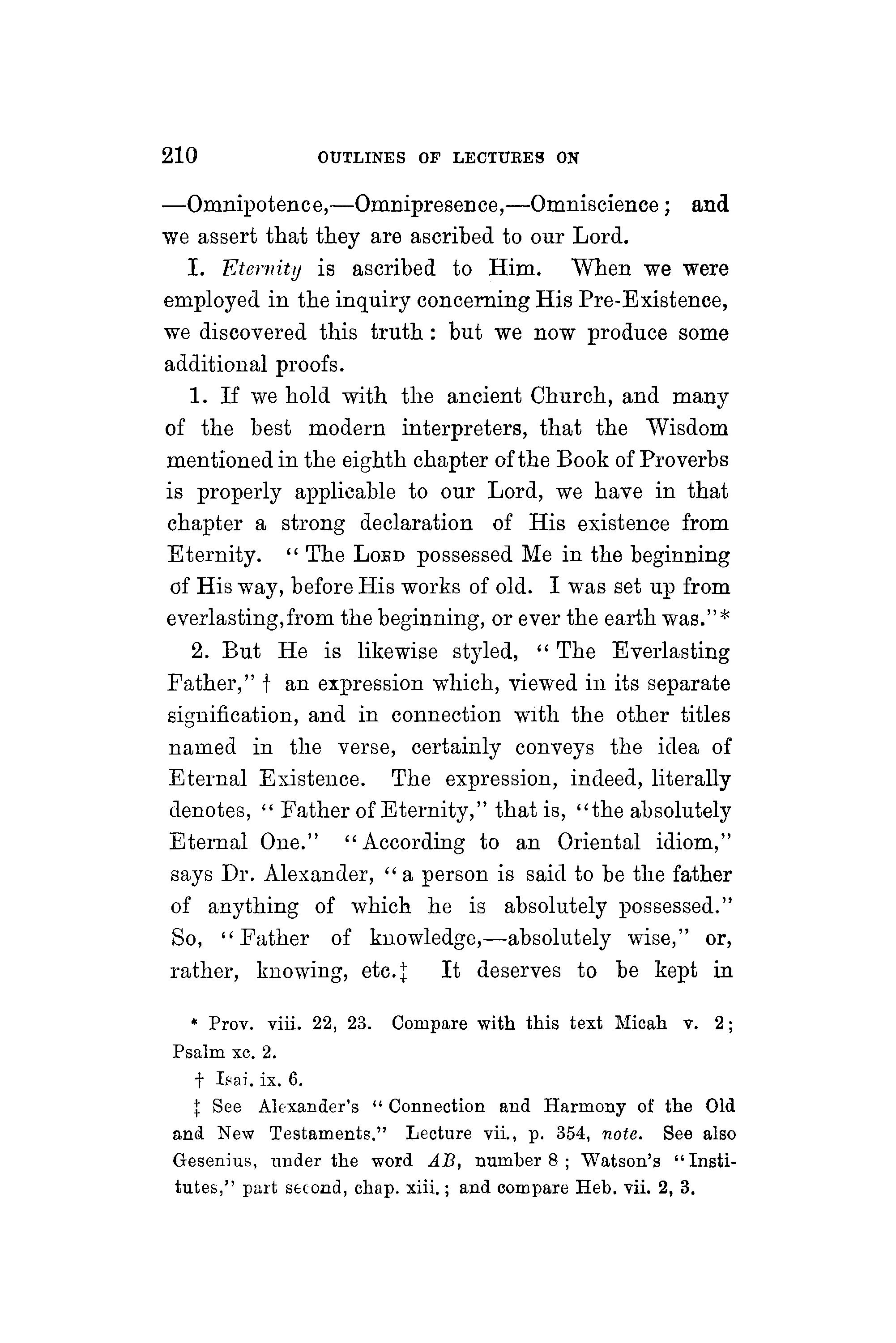
-Omnipotence,-Omnipresence,-Omniscience; and we assert that they are ascribed to our Lord.
I. Eternity is ascribed to Him. When we were employed in the inquiry concerning His Pre-Existence, we discovered this truth : but we now produce some additional proofs.
1. If we hold with the ancient Church, and many of the best modern interpreters, that the Wisdom mentioned in the eighth chapter of the Book of Proverbs is properly applicable to our Lord, we have in that chapter a strong declaration of His existence from Eternity. "The LoRD possessed Me in the beginning of His way, before His works of old. I was set up from everlasting,from the beginning, or ever the earth was."*
2. But He is likewise styled, " The Everlasting Father," t an expression which, viewed in its separate signification, and in connection with the other titles named in the verse, certainly conveys the idea of Eternal Existence. The expression, indeed, literally denotes, "Father of Eternity," that is, "the absolutely Eternal One." "According to an Oriental idiom," says Dr. Alexander, "a person is said to be the father of anything of which he is absolutely possessed." So, '' Father of knowledge,-absolutely wise," or, rather, knowing, etc.t It deserves to be kept m
"' Prov. viii. 22, 23. Compare with this text Micah v. 2; Psalm xc. 2.
t If;ai. ix. 6.
t See Alexander's " Connection and Harmony of the Old an<l New Testaments." Lecture vii., p. 354, note. See also Gesenius, under the word AB, number 8 ; Watson's "Institutes," part second, chap. xiii.; and compare Heb. vii. 2, 3.

211
mind that the title now before us immediately follows the title, "The Mighty God," and immediately precedes the title, "The Prince of Peace."
3. Further, He is represented as "having neither beginning of days, nor end of life."* He is said 10 have "life in Himself, "t and to be "the Living One.'·:~ All these phrases imply or express Eternity.
4. He is also "the First and the Last."§
5. And, by a full declaration of Immutable Eternity, He is described as for ever the same. The passage, li which we formerly cited as a testimony of the LORn's Immutable Eternity, is expressly applied to the Son: "And,"-" to the Son He saith," from verse 8," Thou, Lord, in the beginning hast laid tho foundation of the earth ; and the heavens are the works of Thine hands : they shall perish ; but Thou remainest ; and they all shall wax old as doth a garment ; and as a, vesture shalt Thou fold them up, and they shall be changed : but Thou art the same, and Thy years shall not fail." ~r So, in the same Epistle, it is said with significant emphasis,-the Great Master remaining unchanged and unchangeable, while the servantF; reach " the enc1 of their conversation," or course of life,-" Jesus Christ" is "the same yesterday, and to-day, and for ever." How seasonable, then, ancl weighty is the admonition which immediately follows :
• Heb. vii. 3. t John v. 26, compared with i. 4.
t Job xix. 25, Dr. J. P. Smith's translation; Rev. i. 18: "I am He that liveth," o (wv, "the Living One."
§ Rev. i. 17, compared with Isaiah xli. 4 ; xliii. 10 ; xli v. G; xlviii. 12.
II Psalm cii. 25-27. -r Heb. i. 10-12. p 2

" Be not carried about with divers and strange doctrines ! '' *
Jesus is the Eternal Word. From the depths of eternity, and when Creation first arose, "in Him was life,"-for He was then "that Eternal Life, which was with the Father." "And the Life" which He eternally possesses, " was the light of men," in the original state of innocence and integrity. "And the light shineth in darkness,"-the darkness of man's ignorance, sin, and misery ;-" and the darkness comprehended it not." But there is now a brighter revelation of Him who is Eternal Light and Eternal Life, and who, as "the Sun of Righteousness," sheds forth "the light of life " in all its healing grace; for, as the holy apostle teaches, the Eternal Life "was manifested unto us.'' That Life is manifested still. " The darkness is past, and the true light now shineth ; " and it shall shine, the light of all our future eternity. "The Lamb is the light" of the celestial city ; " and there shall be no night there." t
* See Heb. xiii. 7, 8, 9.
t See John i. 4, 5; 1 John i. 1, 2; Mal. iv. 2; John viii. 12; l John ii. 8; Rev. xxi. 23; xxii. 5.

DIVINE WORKS ASCRIBED TO OUR LORD,
To place this argument before you in its proper force, it will be necessary that I direct your attention to such Works as are truly Divine ; and that I farther show, by indubitable testimonies of Scripture, that these Works are performed by our Lord, not as a Delegate only, but as an Original Author; not as an Instrument, but as a powerful Agent.
I. Creation-the Creation of all things which exist -is acknowledged on all hands to be a ·work truly and exclusively Divine, and to be an irrefragable evidence of Supreme Deity. "In the beginning God created the heaven and the earth." " The everlasting God, the LoRD," or Jehovah, is "the Creator of the ends of the earth." *
But this Work is explicitly attributed to Jesus Christ. " All things were made by Him," the Word; " and without Him was not anything made that was made." "The world was made by Him." For" by the Word of the Lo RDwere the heavens made ; and all the host of them by the Breath," or Spirit, " of His mouth."
"God ...... created all things by Jesus Christ," "who is the image of the invisible God, the firstborn of every creature," 1rpwror0Kos 1rau71~ Kricuws, born or begotten
* Gen. i. 1; Isai. xl. 28. See also Psalm cxlvi. 6; Isai. :x:liv.24 Jer. x. 12; Zeeb. xii. 1; .A.ctsxiv. 15, etc., etc.

OUTLINES OF LECTURES ON
before every creature: "for by Him. were all things created, that are in heaven, and that are in earth, visible and invisible, whether they be thrones, or dominions, or principalities, or powers : all things were created by Him, and for Him : and He is before all things, and by Him all things consist."-" By whom, also, He made the worlds." Accordingly, "unto the Son He saith, Thou, Lord, in the beginning hast laid the foundation of the earth ; and the heavens are the works of Thine hands."*
Jesus Christ is, therefore, the Author of this Divine ,Vork, and is thus proved to possess Supreme Deity.
IL Providential Government-the Government of all things created-is likewise a truly Divine Work. "Thine, 0 LoRD, is the greatness, and the power, and the glory, and the victory, and the majesty : for all that is in the heaven and in the earth is Thine; Thine is the kingdom, 0 LoRD, and Thou art exalted as Head above all. Both riches and honour come of Thee, and Thou reignest over all ; and in Thine hand is power and might ; and in Thine hand it is to make great, and to give strength unto all." t
But this Work is also most plainly ascribed to Jesus Christ. "All power," He Himself testifies, "is given unto Me in heaven and in earth." "All things are delivered to Me of My Father." " The Father loveth the Son, and hath given all things into His hand."
* John i. 3, 10, compared with Psalm xxxiii. 6; Ephes. iii. 9; Col. i. 15-17 ; Heb. i. 2, compared, for the meaning of the word translated "worlds," with xi. 3; i. 10. Consider also Rev. iv. 11.
t 1 Chron. xxix. 11, 12.

THE DOCTRINES OF CHRISTIANITY, 215
"Thou hast given Him power over all flesh." He is "Lord of all; " "Lord both of the dead and living." "He hath put all things under His feet." "By Him all things consist." "He is Lord of lords, and King of kings." *
Jesus Christ is therefore, on this ground also, declared to be God.
III. Miracles, viewed as the effects of Divine Omnipotence, are the peculiar "\Vorks of the Most High God.t
But they are described as wrought by Jesus Christ, in His own Name, and by His own authority. "I will ; be thou clean." " ·what manner of man is this, that even the winds and the sea obey Him? " "Young man, I say unto thee, Arise." So He "gave " His disciples " power and authority over all devils, and to cure diseases." t
Jesus Christ is, therefore, the Most High God.
IV. The Forgiveness of Sins is a proper Work of God; for "who can forgive sins but God only?"§
But this is ascribed to Jesus Christ ; for, "The Son of man hath power on earth to forgive sins," II and has both exercised and proved that power.
* Matt. xxviii. 18; Luke x. 22; John iii. 35, compared with xiii. 3; xvii. 2; Acts x. 36; Rom. xiv. 9; 1 Cor. xv. 27, compared with Ephes. i. 22; Col. i. 17 ; Rev. xvii. 14, compared with xix. 16.
t See the Lecture on Miracles.
t See Matt. viii. 3, 27; Luke vii. 14; ix. 1, compared with x. 19, and Acts iii. 16. See Pearson on the Creed, Article II., on the title " Christ."
§ Mark ii. 7.
JI Mark ii. 10, and other texts.

Jesus Christ is, therefore, God.
V. The Final Dissolittion and Renewal of all things is a Work strictly Divine ; for He who created the beautiful fabric of the Universe can alone dissolve it, and renew it in a form still more glorious than that which it possessed at the original Creation.
But this Work, also, is assigned to Jesus Christ. " As a vesture shalt Thou fold them up, and they shall be changed." "He is able even to subdue all things unto Himself." "He that sat upon the throne said, Behold, I make all things new."*
Jesus Christ is, therefore, God.
VI. The Universctl Judgment is undoubtedly the Work of God. t
But this Work is constantly ascribed to Jesus Christ.t
For this reason, also, Jesus Christ must be God.
It is proper to add that other Works might be mentioned, of which I should be disposed particularly to select,-The Abrogation of Divine Laws ;-The Enactment of Divine Laws ;-The Entire Salvation of Believers ; and others of a like kind. Indeed, the argument might be made exceedingly comprehensive. But the six instances which I havQ given above are amply sufficient for our present purpose. I cannot but remind you, however, that there is an
* See Heb. i. 12; Phil. iii. ~1; Rev. xxi. 5.
t Eccles. xii. 14.
t See, among other passages, John v. 22, 23, 27; Acts xvii. 31; Rom. xiv. 10; Acts x. 42 ; 2 Tim. iv. 1; and, especially, Matt. XXV.31-46.

amazing fulness in Scriptural Truth ; that it opens upon us like the diffusive light of the morning ; and, farther, that when we employ arguments in support of some one verity, we often find that treasures of Scriptural knowledge are unexpectedly discovered to us,-so that we thus receive a double benefit.
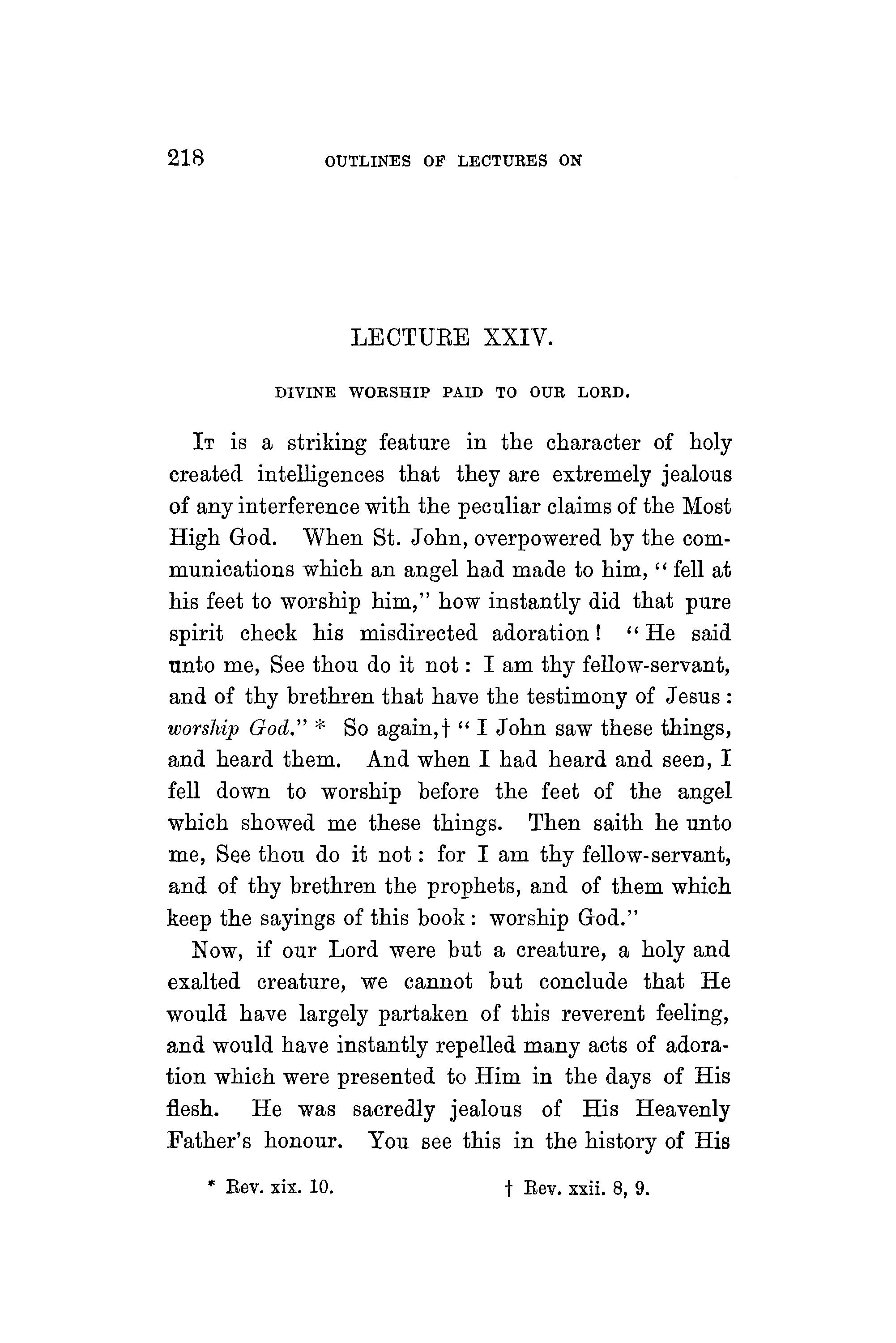
DIVINE WORSHIP PAID TO OUR LORD.
IT is a striking feature in the character of holy created intelligences that they are extremely jealous of any interference with the peculiar claims of the Most High God. When St. John, overpowered by the communications which an angel had made to him," fell at his feet to worship him," how instantly did that pure spirit check his misdirected adoration ! " He said nnto me, See thou do it not : I am thy fellow-servant, and of thy brethren that have the testimony of Jesus : worship God." * So again, t " I John saw these things, and heard them. And when I had heard and seen, I fell down to worship before the feet of the angel which showed me these things. Then saith he unto me, See thou do it not : for I am thy fellow-servant, and of thy brethren the prophets, and of them which keep the sayings of this book : worship God."
Now, if our Lord were but a creature, a holy and exalted creature, we cannot but conclude that He would have largely partaken of this reverent feeling, and would have instantly repelled many acts of adoration which were presented to Him in the days of His flesh. He was sacredly jealous of His Heavenly Father's honour. You see this in the history of His
* Rev. xix. 10. t Rev. xxii. 8, 9.

temptation in the wilderness. When Satan tempted Him to distrust and presumption, He replied with singular yet decisive calmness ; but when Satan tempted Him to creature-worship,-when he said, " All these things will I give Thee, if Thou wilt fall down and worship me,'' He immediately changed His manner, and replied, with holy indignation, " Get thee hence, Satan : for it is written, Thou shalt worship the Lord thy God, and Him only shalt thou serve." ,:, After this, if Jesus were not God, how could He, without let or restraint, have received many acts of homage which were undoubtedly paid to Him ? They who deny that He is God are compelled, if they would be consistent in their unhappy disbelief, to deny that He was even a good man.
I will select more particular evidence that Divine worship is, without question, rendered to Him by holy human beings, by angels, and by all creatures whatever. The argument can scarcely be more comprehensive, or more complete.
I. The worship of holy human beings is paid to Him. Here consider,-
1. The adoration of the apostles at the time of His ascension. "And He led them out as far as to Bethany, and He lifted up His hands, and blessed them. And it came to pass, while He blessed them, He was parted from them, and carried up into heaven. And they worshipped Him, t and returned to Jeru-
* Matt. iv. 9, 10.
t This clause is marked as doubtful by Griesbach, and omitted by Tischendorf,-I think on insufficient grounds. The " Codex Sinaiticus " has it.
OUTLINES OF LECTURES ON
salem with great joy: and were continually in tha temple, praising and blessing God. Amen.''*
2. The prayer of the same apostles, when they proceeded to elect one in the place of Judas, and which prayer seems to have been especially addressed to the Lord Jesus, whose prerogative it was to choose and appoint apostles. " They prayed, and said, Thou, Lord, which knowest the hearts of all men,"-a plain declaration of Omniscience,-" show whether of these two Thou hast chosen, that he may take part of this ministry and apostleship, from which Judas by transgression fell, that he might go to his own place." t
3. The invocation of dying Stephen. "And they stoned Stephen, calling upon [God ;] "-the word "God" is inserted by our translators. If any insertion were made, one cannot but think that it ought to have been " Jesus," who is immediately addressed. But, indeed, no insertion seems necessary. The passage may be exactly rendered thus :-'' And they stoned Stephen, invoking, and saying, Lord Jesus, receive my spirit. And he kneeled down, and cried with a loud voice, Lord, lay not this sin to their charge. And when he had said this, he fell asleep." t
4. St. Paul's prayer concerning the " thorn in the flesh." "For this thing I besought the Lord thrice," -I prayed to Him earnestly and repeatedly,-" that it might depart from me. And He,"-the Lord whom I thrice besought,-" said unto me, My grace is sufficient for thee : for My strength (Svvaµ.is)is made perfect in weakness. Most gladly, therefore, will I rather
* Luke xxiv. 50- 53.
t Acts vii. 59, 60.

t Acts i. 24, 25.
glory in my infirmities, that the power"-or strength, (Mvap,is,)the same word as before-" of Christ may rest upon me." * Christ, therefore, is the Lord to whom the apostle prayed.
5. The same apostle's prayer for the Thessalonians. "Now God Himself and our Father, and our Lord Jesus Christ, direct our way unto you." t
6. His prayer for the same Thessalonians. "Now our Lord Jesus Christ Himself, and God, even our Father, which hath loved us, and hath given us everlasting consolation and good hope through grace, comfort your hearts, and stablish you in every good word and work." t
7. The many examples of calling on the Name of Jesus,-which denotes the habitual worship of Him. " Whosoever shall call on the Name of the Lord shall be saved." § "He hath authority from the chief priests to bind all that call on Thy Name." II That Ananias here meant the Lord Jesus is plain from verse 17 : " Is not this he that destroyed them which called on this Name?"~ "Wash away thy sins, calling on the Name of the Lord.",:":' "Unto the Church of God which is at Corinth, ... with all that in every place call upon the Name of Jesus Christ our Lord, both theirs and ours." tt Re-consider, also, Rom. x. 11-13.
8. The forms of benediction with which the Epistles generally open and conclude, and of which I need not give particular examples. But see 2 Cor. xiii. 14.
• 2 Cor. xii. 8, 9.
t 2 Thess. ii. 16, 17.
, Acts ix. 21.

t 1 Thess. iii. 11.
§ Acts ii. 21. !i Acts ix. 14.
** Acts xxii. 16. tt 1 Cor. i. 2.

9. St. John's language in Rev. i. 5, 6, which ascribes to Jesus supreme and eternal adoration.
II. The worship of angels is paid to Him. "Rejoice, ye heavens, with Him; and let all the angels of God worship Him." * " Worship Him, all ye gods." t In the Version of the Seventy, who number that ·Psalm xcvi., it is, "All His angels." But St. Paul's language is most decisive. "When He bringeth in the First-begotten into the world, He saith, And let all the angels of God worship Him." t
III. The worship of all creatures whatever is paid to Him. " And I beheld, and, lo, in the midst of the throne," etc.§
1. The above are selected as instructive and guiding examples.
2. They throw light on many acts of reverence performed to Jesus Christ, which are not usually produced as separate proofs.
3. They are in full accordance with the frequent ascription of praise to the Holy Trinity.
4. [Remarks on the fact that Jesus Christ is usually intended by the title Lord in the New Testament.]
* Deut. xxxii. 43, according to the Version of the Seventy. t Psalm xcvii. 7. t Heb. i. 6. § Rev. v. 6-14.

LECTURE XXV.
MISCELLANEOUS PROOFS OF OUR LORD'S DIVINITY.
WHEN we have surveyed the direct proofs which the Scriptures supply in support of our Lord's Divinity, we can scarcely fail to arrive at the conclusion, that such a doctrine must give a cast and colour to the whole scheme of Revelation, and discover itself, incidentally, but most forcibly, in the current sentiments and language which that Revelation may employ.
My purpose is to give a few examples of the proofs which arise from this source, arranging them in such an order as seems most natural. For more copious details, I refer you to a very valuable part of Dr. Ward.law's "Discourses on the Socinian Controversy,"* where he alleges most of the instances which I shall select, and examines them with great ability and serious feeling.
I. Consider the views which the Scriptures continually present to us of the unparalleled love of Goll as displayed in the Mission or Gift of Jesus Christ; and, as an example of these views, study what is said in such familiar texts as these :-" God so loved the world, that He gave His only-begotten Son, that whosoever believeth in Him should not perish, but have everlasting life." t " For scarcely for a righteous man " -a man of stern and uncompromising justice only-
* Discourse III. t John iii. 16.
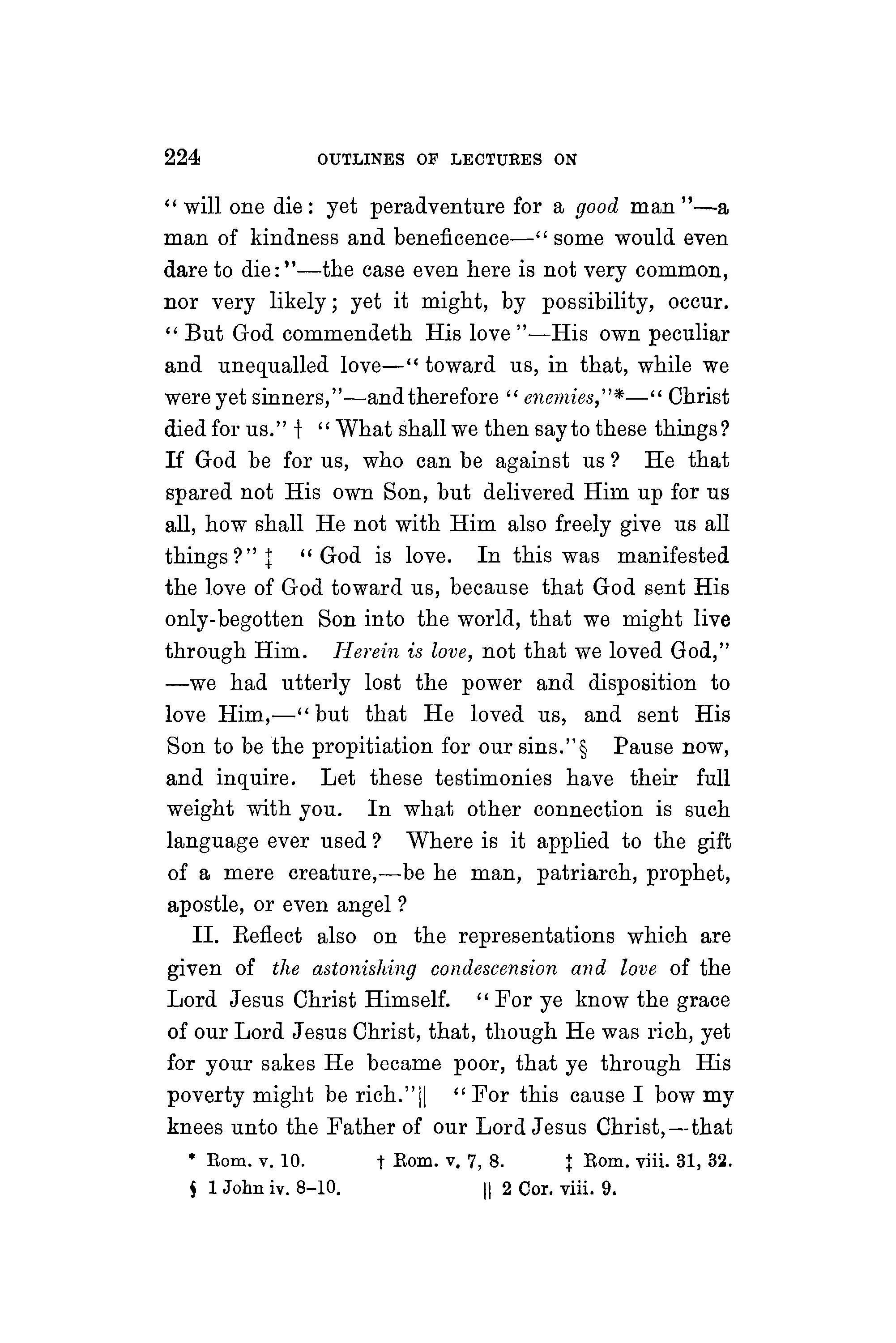
OUTLINES OF LECTURES ON
"will one die: yet peradventure for a good man "-a man of kindness and beneficence-'' some would even dare to die:''-the case even here is not very common, nor very likely; yet it might, by possibility, occur. " But God commendeth His love "-His own peculiar and unequalled love-" toward us, in that, while we were yet sinners," -and therefore "enemies,"*-" Christ died for us." t "What shall we then say to these things? If God be for us, who can be against us ? He that spared not His own Son, but delivered Him up for us all, how shall He not with Him also freely give us all things ? " t " God is love. In this was manifested the love of God toward us, because that God sent His only-begotten Son into the world, that we might live through Him. Herein is love, not that we loved God," -we had utterly lost the power and disposition to love Him,-" but that He loved us, and sent His Son to be the propitiation for our sins."§ Pause now, and inquire. Let these testimonies have their full weight with you. In what other connection is such language ever used? Where is it applied to the gift of a mere creature,-be he man, patriarch, prophet, apostle, or even angel?
II. Reflect also on the representations which are given of the astonishing condescensfon and love of the Lord Jesus Christ Himself. '' For ye know the grace of our Lord Jesus Christ, that, though He was rich, yet for your sakes He became poor, that ye through His poverty might be rich."11 "For this cause I bow my knees unto the Father of our Lord Jesus Christ,--that
* Rom. v. 10. t Rom. v, 7, 8. + Rom. viii. 31, 32.
S 1 John iv. 8-10. II 2 Cor. viii. 9.

225
Christ may dwell in your hearts by faith ; that ye, being rooted and grounded in love,"-rooted as a tree, grounded as a building,-" may be able to comprehend with all saints what is the breadth, and length, and depth, and .height ; and to know the love of Christ, which passeth knoicledge, that ye might be filled with all the fulness of Goel."* What other benefactor is thus celebrated? How would St. Paul have felt, if such language had been used of him ? t III. Think further of the interest, transport, and gratitude, with which the contemplation of this subject never failed to inspire the hearts of the New-Testament writers. "Who shall lay anything to the charge of Gocl's elect? Shall God that justifieth? Who is he that condemneth ? Is it Christ, that died, yea rather, that is risen again, who is even at the right hand of Goel, who also maketh intercession for us ? Who shall separate us from the love of Christ ? shall tribulation or distress, or persecution, or famine, or nakedness, or peril, or sword ? As it is written, For Thy sake we are killed all the day long ; we are accounted as sheep for the slaughter. Nay, in all these things we are more than conquerors through Him that loved us. For I am persuaded, that neither death, nor life, nor angels, nor principalities, nor powers, nor things present, nor things to come, nor height, nor depth, nor any other creature, shall be able to separate us from the love of God, which is in Christ Jesus our Lord." t Re-examine also that passage,
* Ephes. iii. 14, 17-19. t Refer to Acts xiv. 14, 15. t Rom. viii. 33-39.

Philip. m. 7-9. Does the love of a creature, how exalted soever he may be, ever excite such sentiments as these?
IV. Attend likewise to the account which is given in the New Testament of the exaltation of Jesus at the right hand of God; and on this subject particularly weigh the following texts :-Ephes. i. 20-23; Philip. ii. 6-11. Who else is so exalted?
V. Mark too the high claim,sof Jesus on the love and obedience of His followers. "He that loveth father or mother more than Me is not worthy of Me : and he that loveth son or daughter more than Me is not worthy of Me. And he that taketh not his cross, and followeth after Me, is not worthy of Me."* " If any man come to Me, and hate not his father, and mother, and wife, and children, and brethren, and sisters, yea, and his own life also, he canno~ be My disciple." t '' If any man serve Me, let him follow Me ; and where I am, there shall also My servant be : if any man serve Me, him will My Father honour." t "For the love of Christ constraineth us," etc. § "Grace be with all them that love our Lord Jesus Christ in sincerity." II But " if any man love not the Lord Jesus Christ, let him be Anathema Maran-atha." Who else possesses or advances such claims as these?
VI. To all the preceding particulars we may add the apparently undesigned and incidental manner in which the sacred writers sometimes vary their language, so as to discover how familiar the thought of our
• Matt. x. 37, 38. t Luke xiv. 26. t John xii. 26.
§ 2 Cor. v. 14, 15. II Epheis. vi. 24. ~rA Cor. xvi. 22.

Lord's Divinity was to their minds. So, Acts xvi. 31, "Belie-Ve on the Lord Jesus Christ," is, in verse 34, expressed, apparently without any set purpose or design, by "believing in God."-2 Cor. v. 20: " Now then we are ambassadors for Christ," -{nrip Xpurrov,-an expression which, in the original, begins the sentence, and which is afterwards exactly repeated,-though it is rendered in our version with some variation, "for Christ," "in Christ's stead." It is evidently a very leading part of the Apostle's declaration. He proceeds :-" As though Goll did beseech you by us." " The usefulness of this text to our present subject," says Jones on the Trinity, "lies in these words-' In Christ's stead we pray, as though God did beseech '-where the interchanging of the nawes God and Christ shows the same Person to be entitled to both."
Weigh also the following two sayings of our Lord: Luke xvii. 15-18: "One of them,"-the ten lepers,-" when he saw that he was healed, turned back, and with a loud voice glorified God, ancl fell down on his face at His," Jesus', "feet, giving Him thanks: and he was a Samaritan. And Jesus answering said, Were there not ten cleansed? but where are the nine? There are not found that returned to give glory to Goel, save this stranger." John xi. 4 : " This sickness is not unto death, but for the glory of God, that the Son of God may be glorified thereby,"-where Bengel has one of his short full notes :-" Gloria Dei et gloria Filii Dei, 'Una gloria, "-" The glory of God and the glory of the Son of God, one glory."
Q 2
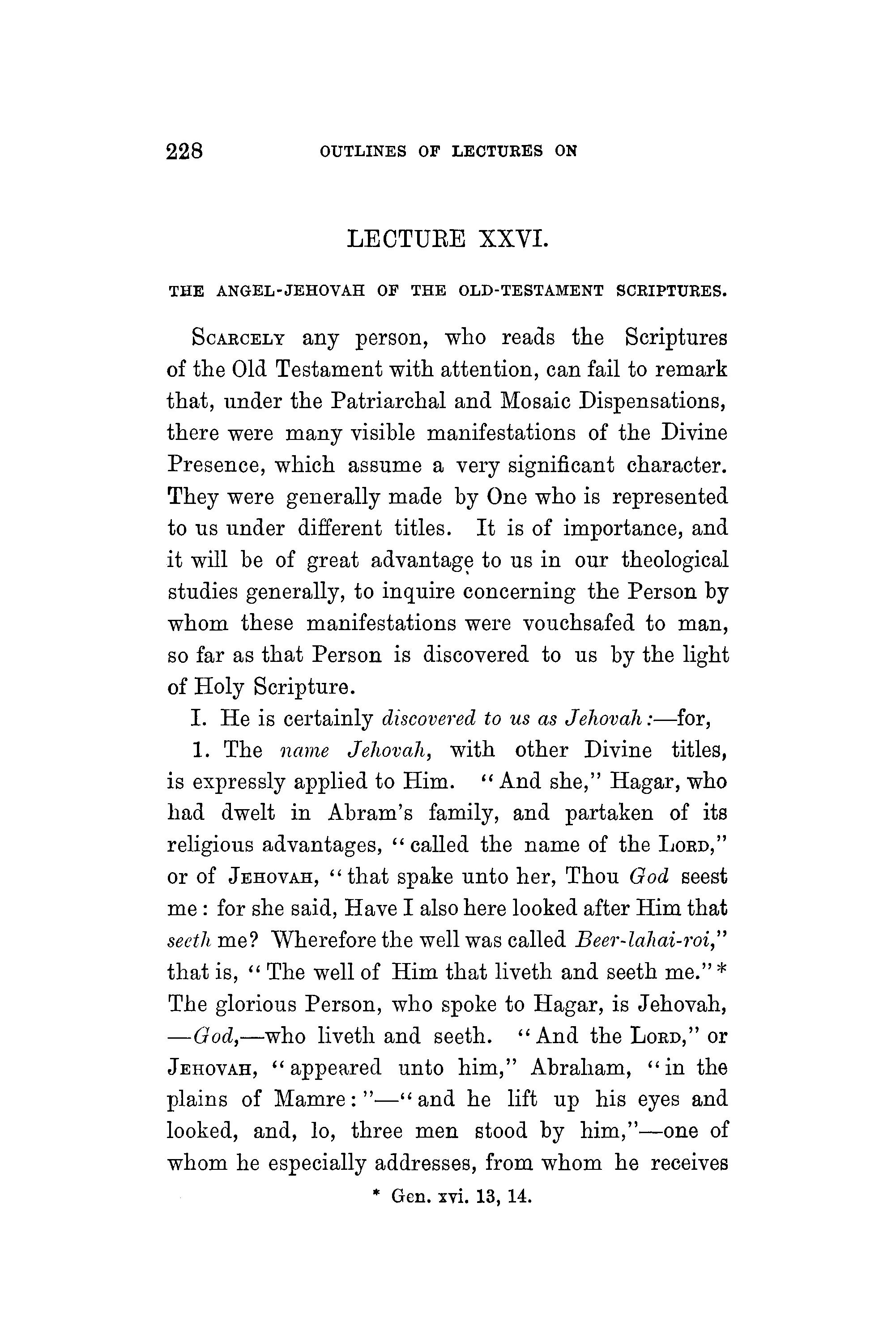
THE ANGEL-JEHOVAH OF THE OLD-TESTAMENT SCRIPTURES.
ScARCELYany person, who reads the Scriptures of the Old Testament with attention, can fail to remark that, under the Patriarchal and Mosaic Dispensations, there were many visible manifestations of the Divine Presence, which assume a very significant character. They were generally made by One who is represented to us under different titles. It is of importance, and it will be of great advantag~ to us in our theological studies generally, to inquire concerning the Person by whom these manifestations were vouchsafed to man, so far as that Person is discovered to us by the light of Holy Scripture.
I. He is certainly discovered to us as Jehovah :-for, 1. The nmne Jehovah, with other Divine titles, is expressly applied to Him. "And she," Hagar, who had dwelt in Abram's family, and partaken of its religious advantages, "called the name of the LoRD," or of JEHOVAH,"that spake unto her, Thou God seest me: for she said, Have I also here looked after Him that seeth me? Wherefore the well was called Beer-lahai-roi," that is, "The well of Him that liveth and seeth me."* The glorious Person, who spoke to Hagar, is Jehovah, -God,-who liveth and seeth. "And the LoRD," or JEHOVAH,"appeared unto him," Abraham, "in the plains of Mamre:"-" and he lift up his eyes and looked, and, lo, three men stood by him," -one of whom he especially addresses, from whom he receives
* Gen. xvi. 13, 14.
THE DOCTRINES OF CHRISTIANITY. 229
promises, to whom he makes intercession, and who, in the space of the same chapter, is denominated JEHOVAHnot fewer than eight or ten times.* "And the LoRD," or JEHOVAH,"visited Sarah as He had said, and the LoRD," or JEHOVAH,"did unto Sarah as He had spoken." t But the LoRD who appeared to Abraham had thus said and spoken. + " And the Angel of the LoRD called unto him out of heaven, and said, Abraham, Abraham : and he said, Here am I. And He said, Lay not thine hand upon the lad, neither do thou anything unto him : for now I know that thou fearest God, seeing thou hast not withheld thy son, thine only son from 1\fe.... And Abraham called the name of that place Jehovah-jireh." §" There wrestled a man with him," Jacob, and that man in the history which records the event is twice called God, [[-and by Hosea, God, and Jehovah God of hosts. " Jehovah," he adds, " is His memorial." 1
2. The attributes of J elwvah are ascribecl to Him ; such as, Omnipotence. " Is any thing too hard for the LORD?''**
O1nniscience, plainly acknowledged in the language of Hagar already quoted. t t
3. The worship of Jehovah also appertains to Him. Think of the Intercessory Prayer which Abraham addressed to Him. H ·weigh the meaning of Jacob's
* See Gen. xviii.
t See Gen. xviii. 10, 14.
II Gen. xxxii. 28, 30.

t Gen xxi. 1.
§ Gen. xxii. 11, 12, 14.
~I Hosea xii. 3-5.
** Gen. xviij. 14: compare Jer. xxxii. 17; Matt. xix. 26; Luke i. 37. tt Gen. xvi. 13, 14. H Gen. xviii. 23-32.

OUTLINES OF LECTURES ON wrestling, and determined purpose not to "let" Him with whom he wrestled "go," " except" He "blessed" him, * as interpreted by the Prophet Hosea : " By his strength he had power with God : yea, he had power over the angel, and prevailed: he wept, and made supplication unto Him." t Call to mind the admonition addressed to Moses, "Draw not nigh hither: put off thy shoes from off thy feet, for the place whereon thou standest is holy ground ; " t and the similar command given to Joshua. §
II. But He is farther designated by titles which denote commisswn,-a comm1ss10n received from another :-He is Angel and Captain.
1. Angel,-" the Angel of Jehovah," as four times in the narrative concerning Hagar which we have already mentioned; (see Gen. xvi. 7, 9-11 ;) and elsewhere; (as Gen. xxii. 11, 15; Exod. iii. 2;) "the Angel of God;" II the "Angel" in whom Jehovah's "name" is; f and, emphatically, "the Angel."**
2. Captain,-" the Captain of the host of the LORD."tt
III. He is announced as the promised JJies.,iah. "The LoRD,'' or JEHOVAH,"whom ye seek, shall suddenly come to His Temple, even the Messenger,'' or Angel, " of the covenant, whom ye delight in : behold, He shall come, saith the LoRDof hosts." t t
* Gen. xxxii. 24, 26.
§ Joshua v. 15. t Hosea xii. 3, 4. + Exod. iii, 5. \I Gen. xxxi. 11. Exod. xxiii. 21. ** Hosea xii. 4.
tt Joshua v. 14: compare Dan. x. 13, 21; xii. 1; Heb. ii. 10; Rev. xii. 7; xix. 11, 14.
t t Mal. iii. 1.

IV. Now our conclusions are,
1. That this Glorious Person is truly and properly God.'~
2. That He is not God the Father, who is never represented as receiving a commission, or as being sent, t but God the Son, who is the Eternal Word,-the Oracle of all Divine communications. t
3. And that, by tracing the progressive light and harmony of the Divine Revelations, we thus obtain a most rich and copious proof of our Lord's Deity, as "the Everlasting Son of the Father."
So thought the earlier Christian writers. A person who examines their works will be struck with the confident manner in which they frequently apply these Divine appearances under former dispensations to the Son of God. The English reader may find examples of this argument of theirs very distinctly given, or referred to, in Dr. "\Vaterland's Vindication of our Lord's Divinity, and in the other works of that able writer on the Arian controversy.
"We live in Messiah's world. The Divine Personage who is here§ called 'the LoRD God,' and who spoke to Adam in the garden, was the Angel-Jehovah, who afterwards appeared to the Patriarchs, led the Israelites through the wilderness, tabernacled among men in the form of a man, is still the Head of His Church, and will again appear to the world. The Angel Jehovah had been the Guide and Protector of man before his fall, and He afterwards becomes his
" See the evidence under di vision I.
t See divisions II., III. t See John i. 18; also xiv. 8-11.
§ Gen. iii. 21.

Mediator and Judge. The Angel-Jehovah commences a new dispensation, which, when it has passed through its three forms, Patriarchal, Levitical, and Christian, will be terminated by reviving and perfecting the primeval happiness of mankind, in that future Paradise, of which the garden of Eden was but an emblem.''*
" See note on Gen. iii. 21, in Townsend's "Arrangement of the Old Testament."

I DO not think it necessary to advert to more than two classes of objections which have been alleged against the doctrine of our Saviour's proper Deity,the one drawn from His true Humanity, and the other from particular texts of Scripture.
I. The one which is drawn from our Lord's true Humanity is exceedingly unfair. When persons deny His Deity, they are wont to acCl'llmulatepassages in which He is spoken of as a Man, and to regard these as evidence of what they allege; while they cannot but know that Trinitarians plead, as freely and fully as they themselves can do, that our Lord is Man, really possessed of the human nature. The question, however, is, Are we not continually taught, by an astonishing mass of Scripture proof, that, though He is truly and properly Man, He is also something more,-the Supreme and Eternal God ? Let us keep close to this question, and not suffer it to be eluded. But, in relation to the above-named objection, let us attend to the following remarks:-
1. Our Lord, as the New-Testament Scriptures constantly testify, is Man, "of a reasonable soul and human flesh subsisting."
2. He has united the Humanity to the Divinity in His Person, in a way which we do not attempt to

explain, but concerning the fact of which we are fully assured.
8. Neither of these Natures suffers any diminution, impediment, or loss, from the union ; but our Lord is at once " perfect God, and perfect Man."
4. It is this doctrine which enables us to give a clear and satisfactory explanation of those passages which might otherwise appear incongruous and contradictory.
5. And it is this, also, which assures us of His power and sympathy, of His eternal relation to God the Father, and of His intimate relation also to us; and it thus teaches us that He is the object of supreme reverence and confidential trust ;-the Son of God, and the Son of Man ;-the Lord whom we adore, and the elder Brother to whom we are united.
IL The particular texts of Scripture which are sometimes alleged in the way of objection are, chiefly, the following. Let them be examined:-
1. 1 Cor. viii. 6. "To us there is but one God, the Father, of whom are all things, and we in Him." If the objector plead that this part of the text denies the Son to be God, he ought, for consistency's sake, to plead that the next part of it denies the Father to be Lord; for it is added, '' And one Lord, Jesus Christ, by whom are all things, and we by Him." But examine the entire passage :-" There is none other God but one. For though there be that are called gods, whether in heaven or in earth, (as there be "-so called, namely-" gods many, and lords many,")-where the two words gods and lords are used, instead of the one word gods, which occurs
THE DOCTRINES OF CHRISTIANITY. 235
before. " But to us there is "-in opposition to the "gods many"-" but one God, the Father, of," or from, " whom (lt oi) are all things, "-as the Creating Source,-" and we in (ds')Him; "-much better, as in the margin, "and we for Him," the Author of all things, and our End ;-" and," in opposition to the "lords many," "one Lord," (Griesbach inserts the comma,) "Jesus Christ, by whom (8L' o-D)are all things,"-from the Father by, or through, the Son," and we by Him."
2. Ephesians iv. 4-6. "There is one body," etc., "one God and Father of all," etc. The objection might with as good reason allege that the Father is not a Spirit, because it is said, " There is one Spirit ; " and that He is not Lord, because it is said, " One Lord." But this text contains a sublime declaration of the Trinity, corresponding in an inverted order to the Form of Baptism. The Form of Baptism suggests that " the Father " descends to His Church through "the Son," and by "the Holy Ghost;" and this passage shows that the Church ascends by " one Spirit," through " one Lord," to " one God and Father."
3. John xvii. 3. " And this is life eternal, that they might know Thee the only true God, and Jesus Christ," etc. But St. John himself applies the language of this very passage to declare the Divinity of the Son.*
4. John xiv. 28. " My Father is greater than I ; " not in nature, for the nature of Father and Son must be the same; not in contravention of that other text, t
* 1 John v. 20.
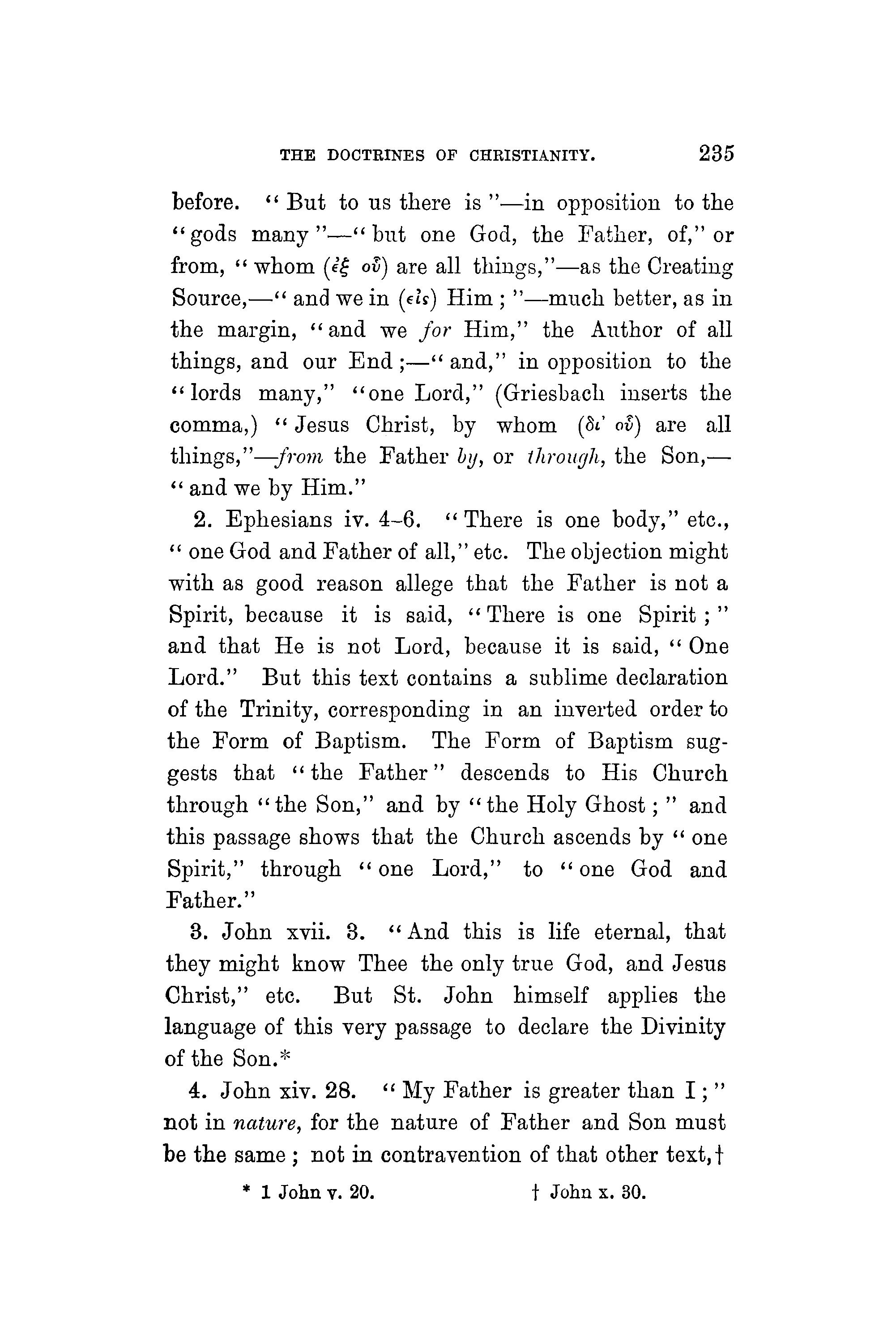
t John x. 30.

"1 and ]Iy Father are one;" (;v:)-but either in refer" ence to our Lord's hurnan nature, viewed especially in the state of humiliation on earth, as many explain the text; or in reference to the relation of the Persons in the Holy Trinity to each other,-The Father of none, the Son of the Father; as some of the early Christian writers did not hesitate to interpret the expression.
5. Mark x. 17, 18. "Good Master," etc. "Why callest thou Me good ? there is none good but One, that is God." The emphasis lies on the word " why .2" and our Lord's purpose was, not to deny His Deity, and therefore His goodness, but to search out whether this applicant approached Him in the language of unexamined compliment, or of truth.*
Writers recommended :-Jones on the Trinity, Pearson, Watson, Wardlaw, Dr. J. P. Smith, Treffry, Bull, Horsley, Fletcher, or Benson, and, above all, on this subject, Waterland.
* Compare Matt. xxii. 42-45.

THE PROCESSION OF THE HOLY SPIRIT.
As the relation of the first and second Persons in the ever-blessed Trinity to each other is expressed by the terms Father and Son; so the relation of the third to both the former appears to be expressed by the term Spirit, which suggests the notion of Spiration, or Brea thing.
But as our Lord elsewhere uses the phrase, "The Spirit of truth, which proceedeth from the Father," ,,. the Church has commonly declared the relation of the Holy Spirit to the Father and the Son by the word Procession. So, in the Nicene Creed as now inserted in our Prayer-Book, it is said, '' I believe in the Holy Ghost, the Lord and Giver of life, who procee<leth from the Father and the Son." So also, in what is generally called the Creed of St. Athanasius, "The Holy Ghost is of the Father and of the Son, neither made, nor created, nor begotten, but proceeding."" The Holy Ghost proceeding from the Father and the Son." t
The earlier Greek Fathers scrupled to use the expression, "proceedeth from the Father and the Son," simply, it would seem, because the latter clause is not found in the text above recited; but they did
• John xv. 26.
t Fifth Article of the Church of England.

not scruple to use expressions of an equivalent meaning,-such as that the Spirit is of or from the Son, as He is of or from the Father, and that He receiveth of the Son, referring to another text_,:, "Afterwards divers of the Greeks expressly denied the procession from the Son ; and several disputations did arise in the Western Church, till at last the Latins put it into the Constantinopolitan Creed, and being admonished by the Greeks of that, as of an unlawful addition, and refusing to rase it out of the Creed again, it became an occasion of the vast schism between the Eastern and the Western Churches." t
Our particular object is to prove that the Holy Spirit proceedeth from the Son, as well as from the Father; and we shall endeavour to do this by alleging, first, a general argument on this subject; to which we shall, seconclly, subjoin such as are more special.
I. The general argument is supplied by passages which, like the Form of Baptism to which we still refer as most explicit, speak of the Holy Trinity. "Baptizing them in the name," not names, "of the Father, and of the Son," the Son of that Father, " and of the Holy Ghost," proceeding, by what is represented under the notion of Spiration, from both. I must still plead that three things are taught in this important text :-first, the Unity of the Divine Nature, the name of which is one; secondly, the Distinction of Personal Subsistences in that Unity; and, thirclly, the Relations in which these Personal Subsistences stand to each other. Weigh also that text, l which seems
* John xvi. 14, 15. t Pearson, whom see, Article VIII.
+ John xvi. 14, 15.
THE DOCTRINES OF CHRISTIANITY. 289
to have been a kind of sheet-anchor to the first and most venerable of the Greek Fathers :-" He shall glorify Me : for He shall receive of Mine, and shall show it unto you. All things that the Father hath are Mine: therefore said I, that He shall take of Mine, and shsJll show it unto you." What a view does this passage afford us of the Holy Trinity in its Unity, Persons, and Relations !
IL More special arguments on this subject are such as these :-
1. As the Spirit, proceeding from the Father, is, therefore, called the Spirit of God, and the Spirit of the Father,* so is He also called the Spirit of the Son. "Because ye are sons, God hath sent forth the Spirit of His Son into your hearts, crying, Abba, Father." + So He is likewise called the Spirit of Christ, and of Jesus Christ. " If any man have not the Spirit of Christ, he is none of His." t " Searching what, or what manner of time the Spirit of Christ which was in them did signify." § " For I know that this shall turn to my salvation through your prayer, aud the supply of the Spirit of Jesus Christ." ii "If then the Holy Spirit be called the Spirit of God and the Father, because He proceedeth from the Father, it followeth that, being calleJ also the Spirit of the Son, He proceedeth also from the Son." ~T
2. As the Holy Spirit, proceeding from the Father, is, therefore, sent by the Father, ,:co:,so is He also sent
* See 1 Cor. ii. 10, 11, 14; Matt. x. 20.
t Rom. viii. 9.
11 Phil. i. 19. ~i Pearson.
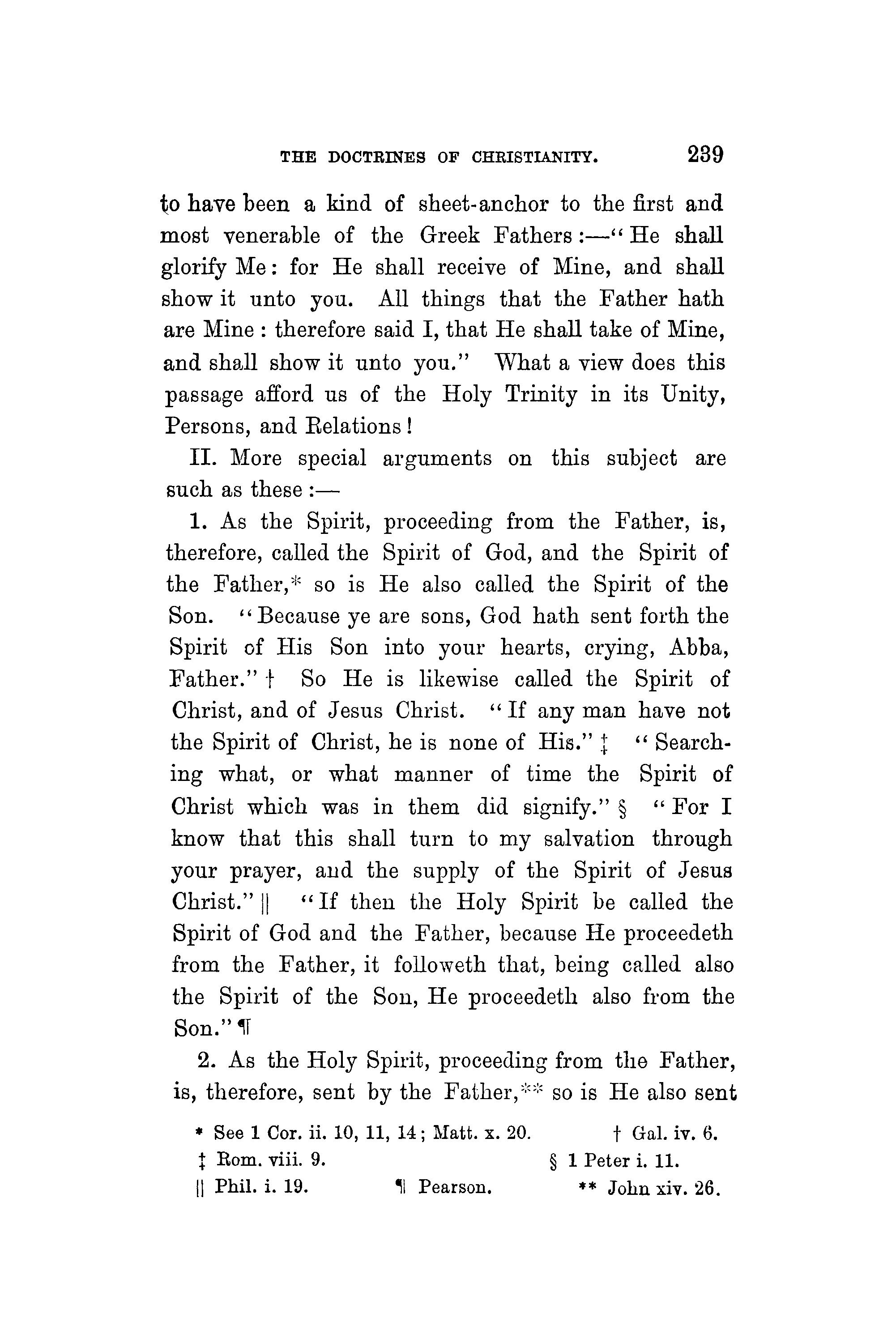
t Gal. iv. 6.
§ 1 Peter i. 11.
** John xiv. 26.
by the Son. Not only does our Lord say, in the passages just noted, "Whom the Father will send in My Name," but elsewhere, "The Comforter,-whom I will send unto you from the Father.",:, "Behold, I send the promise of My Father upon you." t "If I depart, I will send Him," the Comforter, " unto you." t "Therefore," said St. Peter on the day of Pentecost, " being by the right hand of God exalted, and having received of the Father the promise of the Holy Ghost, He hath shecl forth this, which ye now see and hear."§ "Therefore," says Bishop Pearson, '' the Son hath the same right of mission with the Father, and consequently must be acknowledged to have communicated the same essence. The Father is never sent by the Son, because He received not the Godhead from Him; but the Father sendeth the Son, because He communicated the Godhead to Him. In the same manner, neither the Father nor the Son is ever sent by the Holy Spirit, because neither of them received the Divine Nature from the Spirit; but both the Father and the Son send the Holy Ghost, because the Divine Nature common to both the Father and the Son was communicated by them both to the Holy Ghost."
3. Weigh also what is related in John xx. 22 :" When He had said this, He breathed on them, and saith unto them, Receive ye the Holy Ghost."-" As from My mouth, He says, ye receive the breath, so from My fulness receive the Spirit." II
* John xv. 26.
t John xvi. 7.

t Luke xxiv. 49.
§ Acts ii. 33.
ii "Sicut ex ore meo, inquit, accip'itis ajj1atum, sic e,T med plenitudine accipite Spiritum."-Bengel in Zoe.: also Wesley.

THE PERSONALITY OF THE HOLY SPIRIT.
vVHEN we examine the evidences which prove the Divinity of our Lord Jesus Christ, we do not find it necessary to establish the fact of His Personality; for that is not denied. Every one admits that He is a. Person; so that the main question on that subject is, Whether He be a Person truly Divine, as well as human.
But when we proceed to an inquiry concerning the Holy Spirit, we are often met with the objection, that He is not a Divine Person, but only a Divine quality, energy, or mocle of operation. We are therefore compelled to open our investigation of this subject with remarks on the nature and proofs of the Holy Spirit's Personality.
I. The nature of the Holy Spirit's Personality. What is a Person ? A Person is one who possesses personal properties. But what are personal properties ? Such as indicate the possession of mind or intelligence. A Person is an intelligent agent. "That which can contrive," says Dr. Paley,* "which can design, must be a person. These capacities constitute personality; for they imply consciousness and thought. They require that which can perceive an end or purpose ; as well as the power of providing means
* "Natural Theology," chap. xx.iii., par. 1.

OUTLINES OF LECTURES ON
and of directing them to their end. They require a, centre in which perceptions unite, and from which volitions flow ; which is mind. The acts of a mind prove the existence of a mind ; and in whatever a mind resides, is a person. The seat of intellect is a person." Consistently with these well-weighed definitions, though we still feel and acknowledge the imperfection of human language, we affirm that the Holy Spirit is a Person.
II. The proofs of the Holy Spirit's Personality may be conveniently arranged under three comprehensive divisions :-Personal Qualities, Personal Acts, and Personal Designations, are all ascribed to Him.
1. Personal Qualities are ascribed to Him.
Active Intelligence is a prime personal quality. But this appertains to the Holy Spirit. '' For what man knoweth the things of a man, save the spirit of man which is in him ? even so the things of God knoweth no man, but the Spirit of God " knoweth them. "Now we have received, not the spirit of the world, but the Spirit which is of God; that we might know the things that are freely given to us of God.",:, Thus it is proved, as before asserted, that " God hath revealed them unto us by His Spirit : for the Spirit searcheth all things, yea, the deep things," or, the depths, "of God." t
Volition is another personal quality, which is also attributed to the Holy Spirit. " All these worketh that one and the self-same Spirit, dividing to every man severally as He will." t " It seemed good to the Holy Ghost, and to us, "-who certainly were persons,
exercising their volition under the Spirit's direction," to lay upon you no greater burden than these necessary things."*
Capabilities which can properly belong only to a person, are assigned to the Holy Spirit. Thus He is said to be resisted: "Ye do always resist the Holy Ghost; as your fathers did, so do ye:" t-to be vexed and grieved: " They rebelled, and vexed His Holy Spirit;" t " Grieve not the Holy Spirit of God:" §-to be blasphenied against : " The blasphemy against the Holy Ghost shall not be forgiven unto men;"-" Whosoever speaketh against the Holy Ghost, it shall not be forgiven him:" II-to be lied to: "Ananias, why hath Satan filled thine heart to lie to the Holy Ghost?" ~-to be tempted: "How is it that ye have agreed together to tempt the Spirit of the Lord ? " ** -and other such like things, of which a person can alone be capable.
2. Personal Acts are ascribed to the Holy Spirit ; such as,
Hearing and receiving : " Whatsoever He," the " Spirit of Truth," " shall hea,·, that shall He speak :He shall receive of Mine." tt
Speaking, testifying, showing, teaching: " That shall He speak," as just quoted;-" The Spirit of Truth ... shall testify of Me ; " H-" He will show you things to come ; "-" He shall take of Mine, and show it unto you ; " §§-'' He shall teach you all things, and bring
* Acts xv. 28.
§ Ephes. iv. 30.
** Acts v. 9.

t Acts vii. 51.
11 Matt. xii. 31, 32.
tt John xvi. 13, 14.
§§ John xvi. 13, 15. n 2
t Isai. lxiii. 10. , Acts v. 3.
tt John :x.v.26.
all things to your remembrance, whatsoever I have said unto you."*
Calling and sending forth messengers : " The Holy Ghost said, Separate Me Barnabas and Saul for the work whereunto I have called them." " So they, being sent forth by the Holy Ghost, departed unto Seleucia.'' t
Connnanding, forbidding, svjfering: " Separate Me Barnabas and Saul," as before ;-" They were forbidden of the Holy Ghost to preach the Word in Asia ; '' -" They assayed to go into Bithynia; but the Spfrit suffered them not." t
Distributing gifts.§
Convincing, sealing, sanctifying : " He will reprove," or " convince," " the world of sin, and of righteousness, and of judgment;" II-" Ye were sealed with that Holy Spirit of promise;" ~r-" Ye are sanctified ... by the Spirit of our God,"** who is thence especially called "Holy," not only as supremely so in Himself, but as so in His offices and gifts.
3. Personal Designations are given to the Holy Spirit: for example,
The masculine personal pronoun, he, is assigned to Him, though the word translated "Spirit" is in the neuter gender. In the original, the neuter pronoun is sometimes used, as in John xiv. 17; and in other instances, it may be said that the masculine pronoun refers to 1rapaKA.1Jros, not to 1rvEvµa : but consult such an
* John xiv. 26. t Acts xiii. 2, 4. t Acts xvi. 6, 7.
§ 1 Cor. xii. 7-11.

ii John xvi. 8.
, Ephes. i. 13, compared with iv. 30, and 2 Cor. i. 22.
** 1 Cor. vi. 11.

expression as that which occurs in John xvi. 13 : " When He," l1<£'ivos, " the Spirit," TO1rvfvµa, " of Truth is come, He will guide you into all the truth."
But, not to depend on a grammatical construction merely, the title Comforter is so given to Him as to bring Him into comparison with Christ, who is acknowledged to be a person : " I will pray the Father, and He shall give you another Comforter, that He may abide with you for ever ; even the Spirit of Truth." *
Accordingly, He is repeatedly designated, in that same discourse, by the masculine pronoun.
1. The several passages in which the Holy Trinity is mentioned, and in which the Spirit is associated with the Father and the Son, who are certainly persons, are themselves abundant proofs of the Spirit's personality.
2. If it be objected that things not really persons are sometimes personified, we admit the fact ; but we plead that such cases occur in the use of :figurative language which cannot be misunderstood, and that they do not apply in the use of such plain language as the Scriptures employ, in their simplest instructions, concerning the Holy Spirit. If that language do not express proper personality, it is impossible that proper personality should be expressed in any human language.
3. Sometimes, it may be said, the word " Spirit" is used when personality cannot be immediately intended. This is true. The word " Spirit" is sometimes used for
* John xiv. 16, 17.

the gifts, or communications, of the Spirit,-the name of the Cause is applied to the Effects which flow from that Cause. But this does not in the least impair the proofs which we have advanced. When the word Spirit is employed to denote the gifts of the Spirit, that meaning is easily ascertainable from the context.

LECTURE XXX.
THE DIVINITY OF THE HOLY SPIRIT :-DIVINE NAMES
ASCRIBED TO HIM,
FROM a consideration of the Holy Spirit's proper Personality, we next proceed to an examination of the proofs which establish His true Divinity. These p:roofs are of the same class with those which we have produced in evidence of our Saviour's Divinity; but they scarcely need to be pursued so much in detail. They who admit the Divinity of Christ, do not usually deny the Divinity of the Holy Spirit. Besides, as they who deny the Spirit's Personality, acknowledge His Divinity, as an Attribute, Energy, or Mode of operation, if His Personality be clearly and fully ascertained, they ought to acknowledge His Personal Divinity. The evidence of His Personality ought, accordi~g to their own language, to be inseparably connected with the evidence of His Divinity.
If I can plainly, and beyond all fair dispute, evince from most unequivocal declarations of Scripture, that Divine names, Divine perfections, Divine works, and Divine worship, are ascribed to the Holy Spirit, I trust that I shall advance what will satisfy the demands of our present argument.
I. Divine Names are ascribed to the Holy Spirit.
1. He is called God.-" Why hath Satan filled thine heart to lie to the Holy Ghost ?... Thou hast not
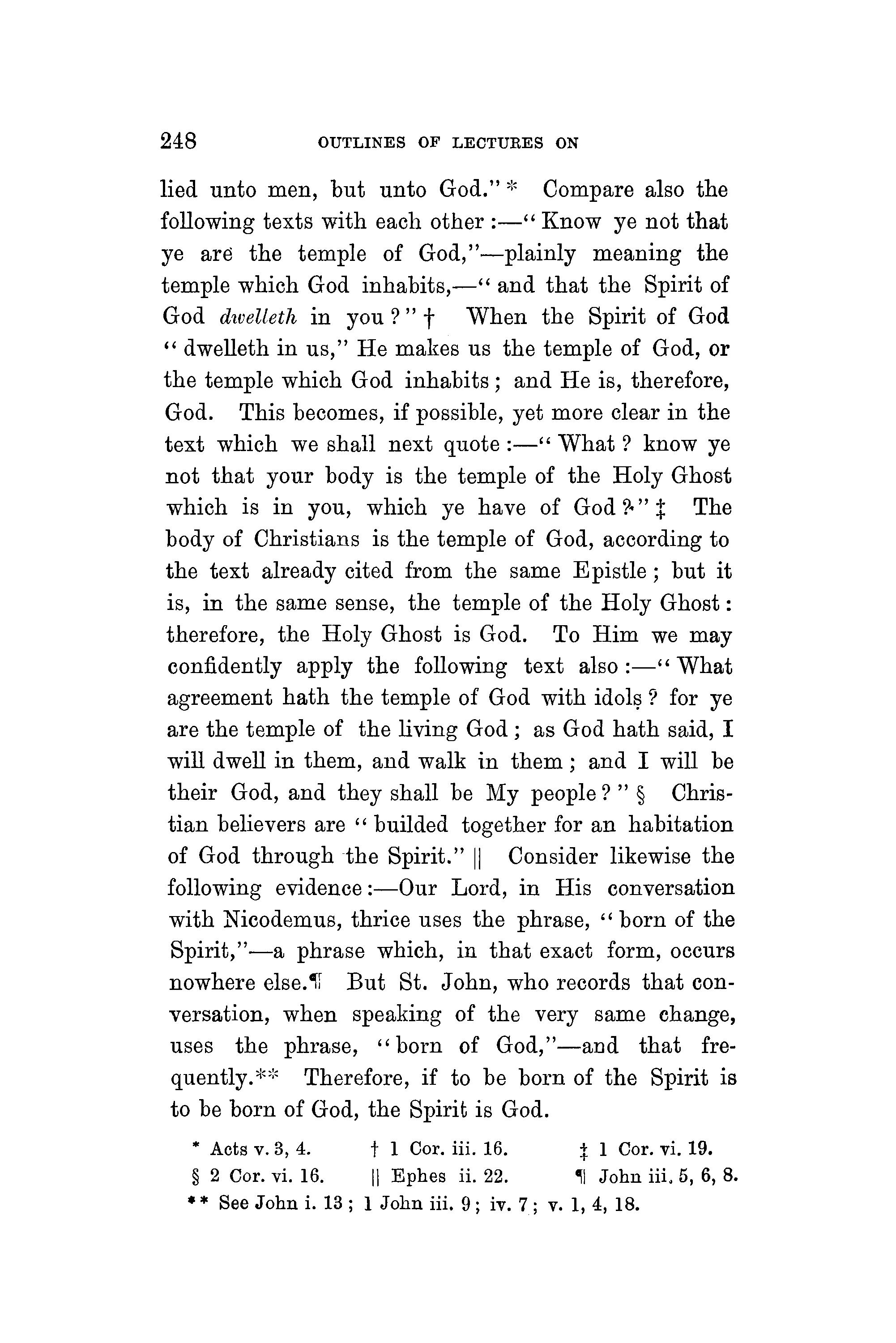
lied unto men, but unto God." * Compare also the following texts with each other :-" Know ye not that ye are the temple of God,"-plainly meaning the temple which God inhabits,-" and that the Spirit of God dwelleth in you ? " t When the Spirit of God "dwelleth in us," He makes us the temple of God, or the temple which God inhabits; and He is, therefore, God. This becomes, if possible, yet more clear in the text which we shall next quote :-" What ? know ye not that your body is the temple of the Holy Ghost which is in you, which ye have of God?•" t The body of Christians is the temple of God, according to the text already cited from the same Epistle; but it is, in the same sense, the temple of the Holy Ghost: therefore, the Holy Ghost is God. To Him we may confidently apply the following text also :-" What agreement hath the temple of God with idol~ ? for ye are the temple of the living God ; as God hath said, I will dwell in them, and walk in them ; and I will be their God, and they shall be My people ? " § Christian believers are "builded together for an habitation of God through the Spirit." II Consider likewise the following evidence :-Our Lord, in His conversation with Nicodemus, thrice uses the phrase, "born of the Spirit,"-a phrase which, in that exact form, occurs nowhere else.-,-r But St. John, who records that conversation, when speaking of the very same change, uses the phrase, "born of God,"-and that frequently.*,:, Therefore, if to be born of the Spirit is to be born of God, the Spirit is God.
* Acts v. 3, 4.
§ 2 Cor. vi. 16. t 1 Cor. iii. 16. 11 Ephes ii. 22. :j: 1 Cor. vi. 19. 41'1John iiL 5, 6, 8.
• * See John i. 13; 1 John iii. 9; iv. 7; v. 1, 4, 18.

2. He is called Jehovah.-" Mine eyes have seen the King, Jehovah of hosts .... And He said, Go, and tell this people, Hear ye indeed, but understand not ; and see ye indeed, but perceive not. Make the heart of this people fat, and make their ears heavy, and shut their eyes ; lest they see with their eyes, and hear with their ears, and understand with their heart, and convert, and be healed."-" Well spake the Holy Ghost by Esaias the prophet unto our fathers, saying, Go unto this people, and say, Hearing ye shall hear, and shall not understand ; and seeing ye shall see, and not perceive : for the heart of this people is waxed gross, and their ears are dull of hearing, and their eyes have they closed; lest they should see with their eyes, and hear with their ears, and understand with their heart, and should be converted, and I should heal them."*
The Holy Ghost, then, as well as the Son, is Jehovah of hosts, whose glory Isaiah saw.
"And he called the name of the place Massah," that is, "Temptation,"" and Meribah," that is, "Chiding" or " Strife," "because of the chiding of the children of Israel, and because they tempted Jehovah, saying, Is Jehovah among us, or not ? "-" The Holy Ghost saith, To-day if ye will hear His voice, harden not your hearts, as in the Provocation, in the day of Temptation in the wilderness: when your fathers tempted Me, ... and saw My works forty years." t The Holy Ghost, then, is Jehovah, whom the Israelites provoked and tempted, whose works they saw forty years, and who, I may add, " sware in His wrath,"-
* lsai. vi. 5, 9, 10, compared with Acts xxviii. 25 27.
t Exod. xvii. 7, compared with Hebrews iii. 7-9.
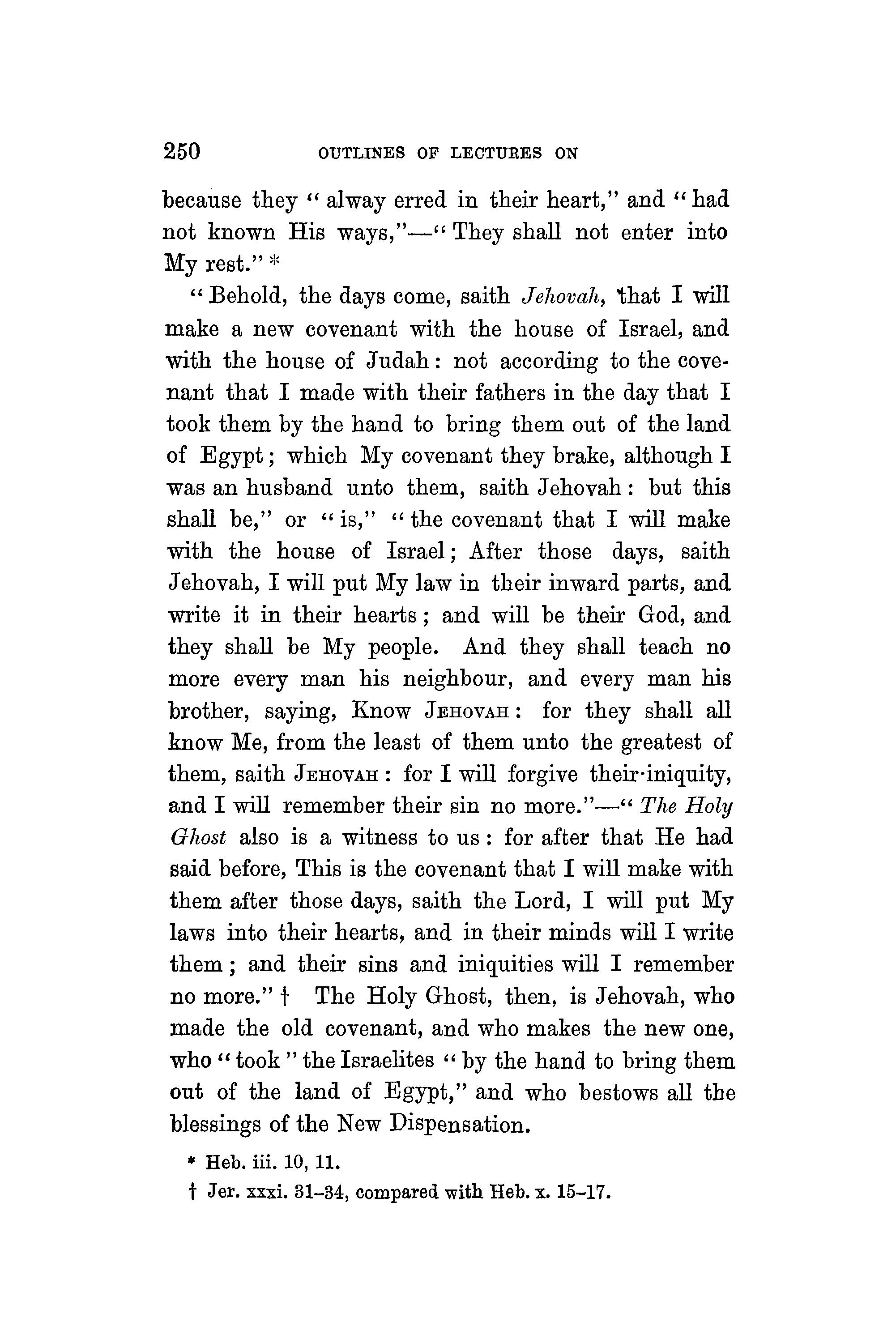
OUTLINES OF LECTURES ON
because they " alway erred in their heart," and "had not known His ways,"-'' They shall not enter into My rest."*
"Behold, the days come, saith Jehovah, 'that I will make a new covenant with the house of Israel, and with the house of Judah : not according to the covenant that I made with their fathers in the day that I took them by the hand to bring them out of the land of Egypt; which My covenant they brake, although I was an husband unto them, saith Jehovah : but this shall be," or " is," " the covenant that I will make with the house of Israel ; After those days, saith Jehovah, I will put My law in their inward parts, and write it in their hearts ; and will be their God, and they shall be My people. And they shall teach no more every man his neighbour, and every man his brother, saying, Know JEHOVAH:for they shall all know Me, from the least of them unto the greatest of them, saith JEHOVAH:for I will forgive their-iniquity, and I will remember their sin no more."-" The Holy Ghost also is a witness to us : for after that He had said before, '11his is the covenant that I will make with them after those days, saith the Lord, I will put My laws into their hearts, and in their minds will I write them ; and their sins and iniquities will I remember no more." t The Holy Ghost, then, is Jehovah, who made the old covenant, and who makes the new one, who'' took'' the Israelites '' by the hand to bring them out of the land of Egypt," and who bestows all the blessings of the New Dispensation.
* Heb. iii. 10, 11.
t Jer. xxxi. 31-34, compared with Heb. x. 15-17.

DOCTRINES OF CHRISTIANITY. 251
"When Moses went in before Jehovah to speak with Him, he took the vail off, until he came out."-" Even unto this day," says St. Paul, alluding to this entire transaction, "when Moses is read, the vail is upon their heart. Nevertheless when it "-their heart" shall turn to the Lord,"-that is, to Jehovah, as Moses did, " when he went in before Jehovah to speak with Him,"-" the vail shall be taken away,"-in allusion to Moses' " taking the vail off." " Now," adds the Apostle, by way of explanation, " the Lord," -obviously answering to Jehovah,-" is that Spirit," -or, rather, "is the Spirit; " (ro ITvEvµa·) "and where the Spirit of the Lord is, there is liberty." *
* Exod. xxxiv. 34, compared with 2 Cor. iii. 15-17.

THE DIVINITYOF THE HOLYSPIRIT:-DIVINE PERFECTIONS ASCRIBEDTO HIM.
II. DIVINEPe1jections are also ascribed to the Holy Spirit :-such as Omniscience,-Omnipresence,Omnipotence,-and Eternity.
1. Omniscience.-" Who hath directed the Spirit of the Lord, or being His counsellor hath taught Him? With whom took He counsel, and who instructed Him, and taught Him in the path of judgment, and taught Him knowledge, and showed to Him the way of understanding ? " ,:, This is not only a declaration of omniscience, but a sublime challenge in its defence; and a part of it is quoted by St. Paul, in his Epistle to the Romans, where he is speaking of the amazing perfections of the Most High God, t whence another proof arises of the Spirit's Deity; for that which the Prophet speaks of Him the Apostle applies to "God," contemplated in His matchless glory. Re-consider that text also : t " The Spirit searcheth all things, yea, the depths of God." What a description of Omniscience ! And here it ought not to be omitted that prophecy, which clearly implies Omniscience, 1s expressly attributed to the Holy Spirit. " The Spirit of the Lord," says David, "spake by me, and His * Isai. xl. 13, 14. t Rom. xi. 34. t 1 Cor. ii. 10.
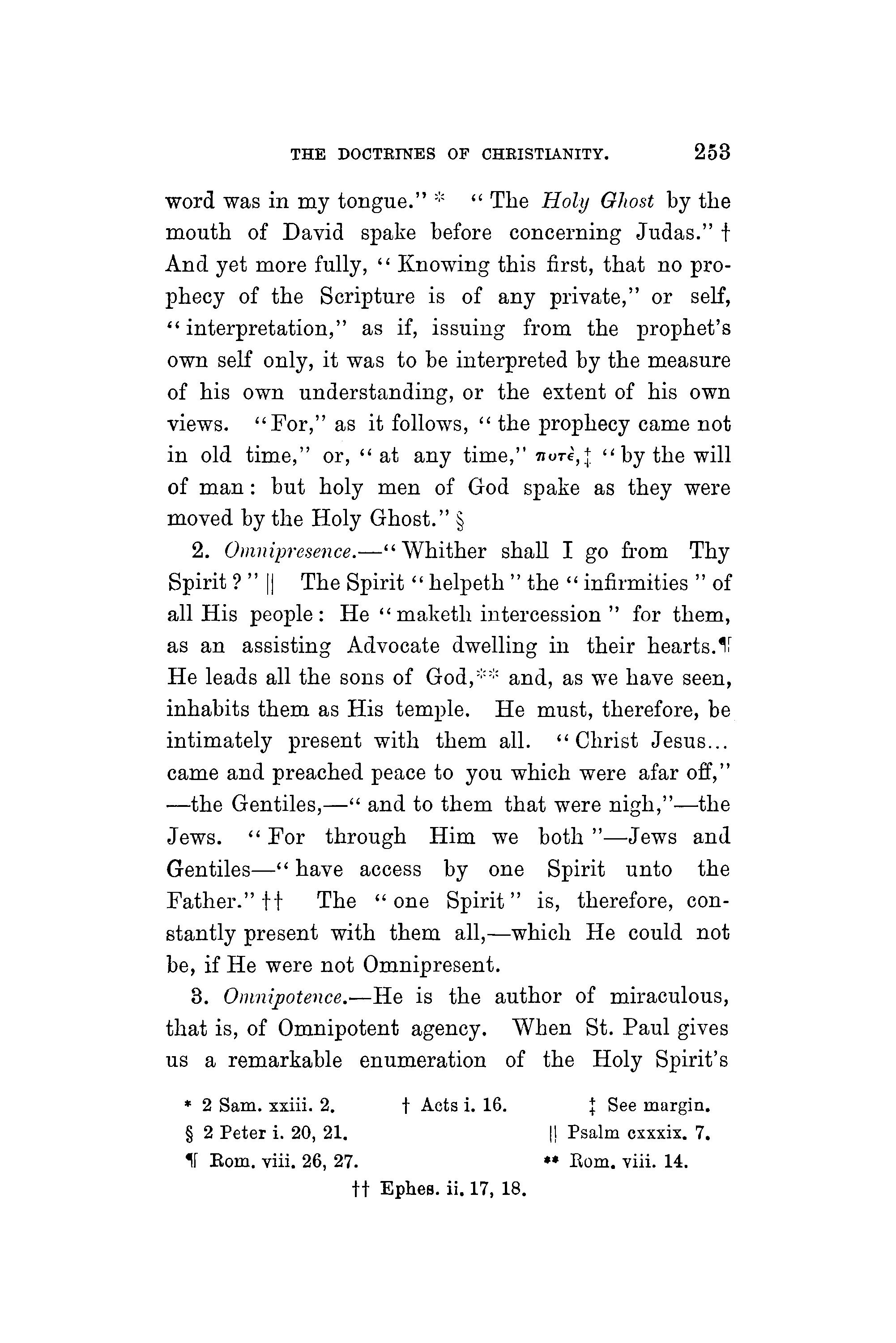
THE DOCTRINES OF CHRISTIANITY. 253 word was in my tongue." ,:, " The Holy Ghost by the mouth of David spake before concerning Judas." t And yet more fully, "Knowing this first, that no prophecy of the Scripture is of any private," or self, "interpretation," as if, issuing from the prophet's own self only, it was to be interpreted by the measure of his own understanding, or the extent of his own views. "For," as it follows, "the prophecy came not in old time," or," at any time,'' 11uri,t "by the will of man : but holy men of God spake as they were moved by the Holy Ghost." §
2. Omnipresence.-" Whither shall I go from Thy Spirit?" II The Spirit" helpeth" the" infirmities" of all His people: He "maketh intercession " for them, as an assisting Advocate dwelling in their hearts. ~r He leads all the sons of God,':":' and, as we have seen, inhabits them as His temple. He must, therefore, be intimately present with them all. "Christ Jesus ... came and preached peace to you which were afar off," -the Gentiles,-" and to them that were nigh,"-the Jews. " For through Him we both "-Jews and Gentiles-" have access by one Spirit unto the Father." tt The " one Spirit " is, therefore, constantly present with them all,-which He could not be, if He were not Omnipresent.
3. Omnipotence.-He is the author of miraculous, that is, of Omnipotent agency. When St. Paul gives us a remarkable enumeration of the Holy Spirit's
* 2 Sam. xxiii. 2. t Acts i. 16. + See margin.
§ 2 Peter i. 20, 21. I! Psalm cxxxix. 7.
~f Rom. viii. 26, 27. ,.. Rom. viii. 14.
tt Ephes. ii.17, 18.
OUTLINES OF LECTURES ON
extraordinary manifestations, among which he places " the working of miracles," he adds, " All these worketh that one and the self-same Spirit." * So our Lord promised to His disciples,t "Ye shall receive power, after that the Holy Ghost is come upon you," or, "the Holy Ghost being come upon you." The Apostle speaks, in kindred language, of " mighty signs and wonders " wrought" by the power of the.Spirit of God," t-and of " signs and wonders, and divers miracles, and gifts," or "distributions," "of the Holy Ghost." §To all this may be added the Spirit's general agency, of which we shall hereafter speak, and which is the agency of Omnipotence.
4. Eternity, as also comprehending Irnrnutability.This is in full harmony with all the evidence which has been produced :-it is thought to be particularly suggested by the title, " one and the self-same Spirit," II with which you may compare the repeated expression, " One Spirit ; " ~f-it is sustained by all the testimonies of His Pre-Existence, as before the flood,*,:: before the creation; tt-it appears, as we shall see, from the Works which are ascribed to Him in conjunction with the Father and the Son ;-and it is expressly declared where the Apostle says, tt that " Christ-through the Eternal Spirit offered Himself without spot to God," -a weighty passage this, which may justly be ranked among the plain Scriptural testimonies to the doctrine of the Trinity in Unity.
* See 1 Cor. xii. 7-ll.
t Acts i. 8. t Rom. xv. 19.
§ Heb. ii. 4. II l• Cor. xii. 11; see also verse 4.
~1 As in 1 Cor, xii. 13 ; Ephes. ii. 18; iv, 4.
** Gen. vi. 3, tt Gen. i, 2.
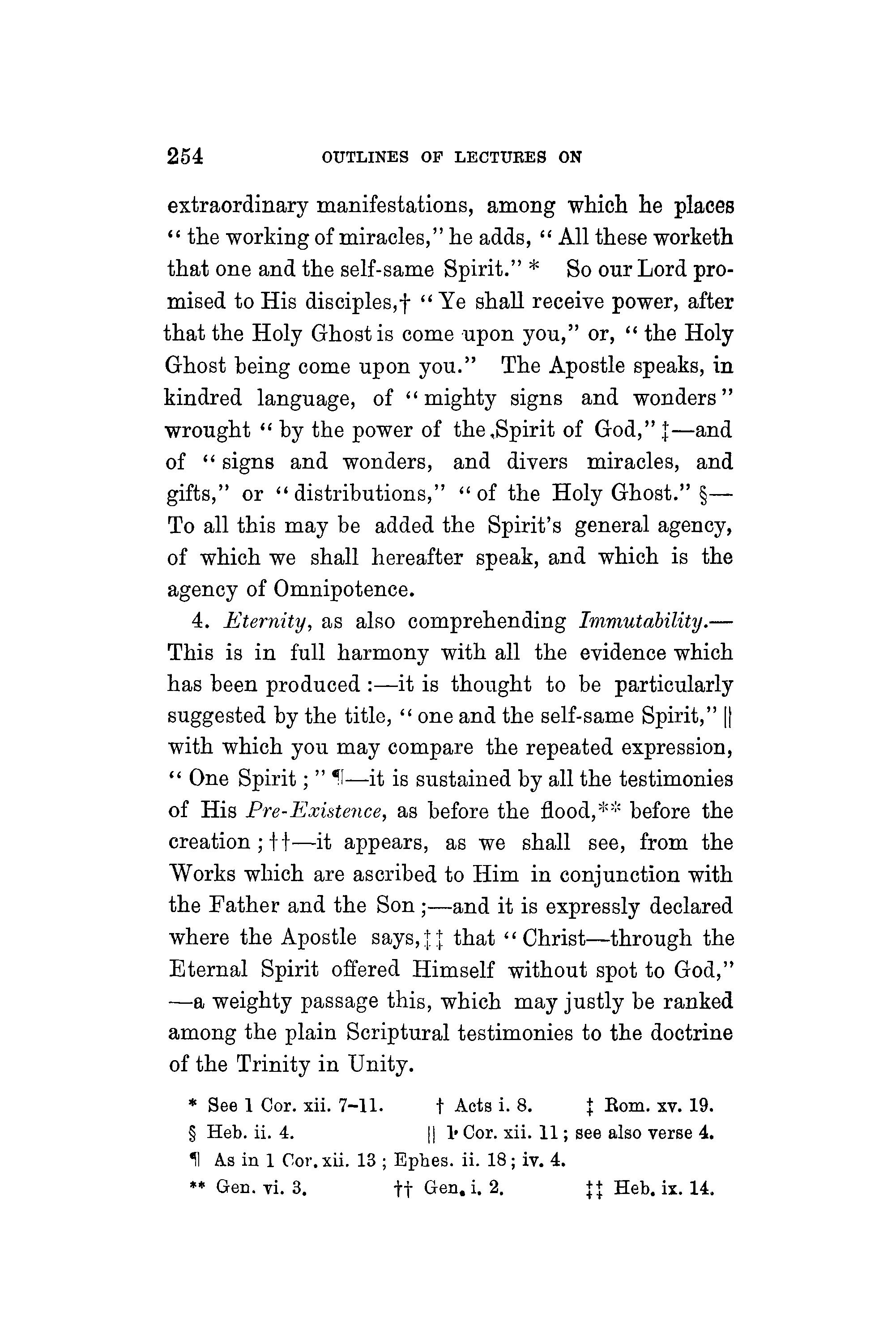
t t Heb, ix:. 14.
Many other particulars might be introduced in this part of our subject: such as that the Spirit is the "Good Spirit," *-the "Spirit of Grace," t-the " Spirit of Glory," t-the "Spirit of Wisdom," §-the " Spirit of Truth," II-the " Spirit of Life,"~ with other appellations, all of which are in accordance with the Spirit's true and proper Deity.
* Nehem. ix. 20; Psalm cxliii. 10.
t 1 Peter iv. 14.

t Heb. x. 29.
§ Exod. xxviii. 3, compared with xx.xi. 3; Deut. xxxiv. 9; Isai. xi. 2, where " the Spirit of the Lord " is designated by the several titles of "the Spirit of Wisdom and Understanding, the Spirit of Counsel and Might, the Spirit of Knowledge and of the Fear of the Lord."
II John xiv. 17; xv. 26; xvi. 13. ~rRom. viii. 2.

LECTURE XXXII.
THE DIVINITY OF THE HOLY SPIRIT :-DIVINE WORKS
ASCRIBED TO HIM.
III. DIVINE Works are ascribed to the Holy Spirit; and they serve yet further to confirm the evidence which has already been advanced.
l. Creation is ascribed to Him, in conjunction with the Father and the Son :-'' The Spirit of God moved upon the face of the waters," when all as yet was dark and confused chaos, out of which, under His plastic agency, Creation acquired its form and beauty.* "By His Spirit He hath garnished the heavens." t-" By the Word of the Lo RDwere the heavens made ; and all the host of them by the Breath," or "Spirit," "of His mouth." t-Man is particularly included, as Elihu emphatically says, "The Spirit of the LoRDhath made me, and the breath of the Almighty hath given me life."' §-Remember, too, that Isaiah has just given a sublime description of the Creator in the powerful appeal: "Who hath measured the waters in the hollow of His hand, and meted out heaven with the span, and comprehended the dust of the earth in a measure, and weighed the mountains in scales, and the hills in a balance?" and that he immediately adds, in connection with the same great work : "Who hath
* Gen. i. 2. t Job xxvi. 13. t Psalm xxxiii. 6. § Job xniii. 4: compare Gen. ii. 7.
directed the Spirit of the LoRD? "-annexing other particulars which tell of Supreme Deity.':< Creation is from the Father, through the Son, by the Spirit, Three in One, acting in inseparable unity, and represented as joined in council when it is said, "Let us make man." t
2. Providential Government, as it causes things to fade and to re-flourish, is ascribed to Him.-" The grass withereth, the flower fadeth : because the Spirit of the LoRD bloweth upon it : surely the people is grass." t-" Thou takest away their breath, they die, and return to their dust. Thou sendest forth Thy Spirit, they are created : and Thou renewest the face of the earth."§ With what facility does the Spirit work in the beautiful renovations of spring I and what striking analogies do these supply of His other agencies! When "the Spirit is poured upon us from on high," " the wilderness " shall " be a fruitful field, and the fruitful field " shall " be counted for a forest." II When the breath of the Spirit's Inspiration passes over the slain, they rise into new life, and ·prove the truth of the LoRn's promise,-" And shall put My Spirit in you, and ye shall live."~ And as Creation is from the Father, through the Son, by the Spirit, may we not, in the way of clear analogy, expect that from the Father, through the Son, by the Spirit, all things, as well as man, shall gain their renovation ?
3. Agencies in the transactions of man's Redemption
* See Isai. xl. 12-18.
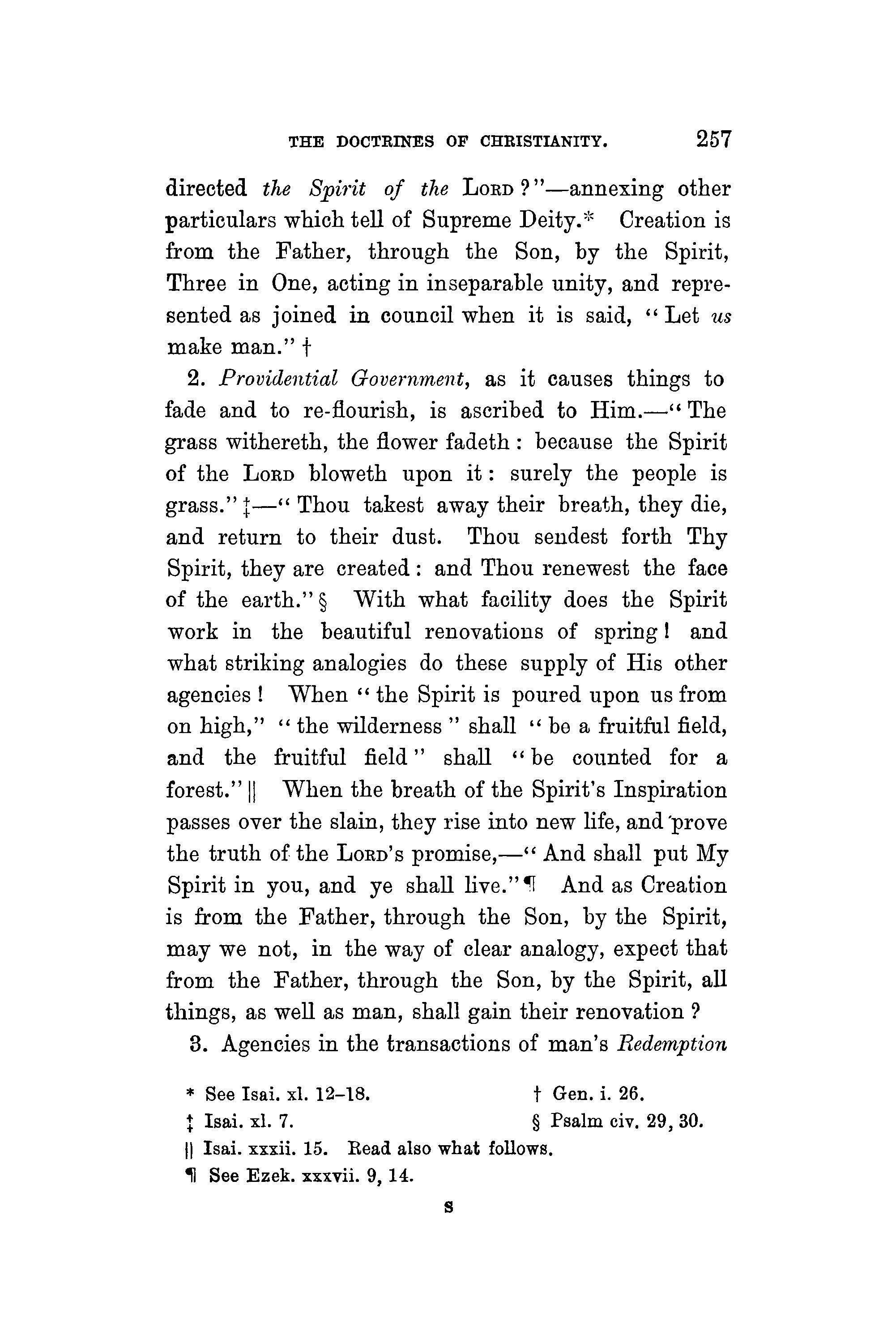
t Gen. i. 26.
t Isai. xl. 7. § Psalm civ. 29, 30.
II Isai. xxxii. 15. Read also what follows.
, See Ezek. xxxvii. 9, 14.
OUTLINES OF LECTURES ON
are ascribed to Him. Consider here the Miraculous Conception of Jesus ; *-the Descent of the Ho:13 Spirit upon Him at His Baptism, t in consequence of which He was "full of the Holy Ghost," and " returned in the power of the Spirit into Galilee ; "t -the agency of the Spirit in the Miracles of Jesus ; for "God anointed Jesus of Nazareth with the Holy Ghost and with power; who went about doing good, and healing all that were oppressed of the devil ; for God was with Him,"§ and He "cast out devils by the Spirit of God;" II-the Spirit's part in the sacrificial death of Jesus; for, as we saw in the last division of this Lecture, He, "through the Eternal Spirit, offered Himself without spot to God ; "~-and the power which the Holy Spirit exerted in our Saviour's resurrection ; for He was " put to death in the flesh, but quickened by the Spirit,"-the Spirit "by which also He went and preached unto the spirits in prisop. ; which sometime were disobedient, when once the longsuffering of God waited in the days of Noah.'' **-If it be alleged that miracles were wrought by the Father and by the Son,-that the sacrificial death of Jesus is attributed to the Father, who "spared not His own Son, but delivered Him up for us all," tt and to the Son, who "laid down" His life "of Himself," Hand that His resurrection is also attributed to " the
* Matt. i. 20 ; Luke i. 35.
t Matt. iii. 16; Mark i. 10; Luke iii. 22; John i. 32, 33.
t Luke iv. 1, 14.
II Matt. xii. 28.
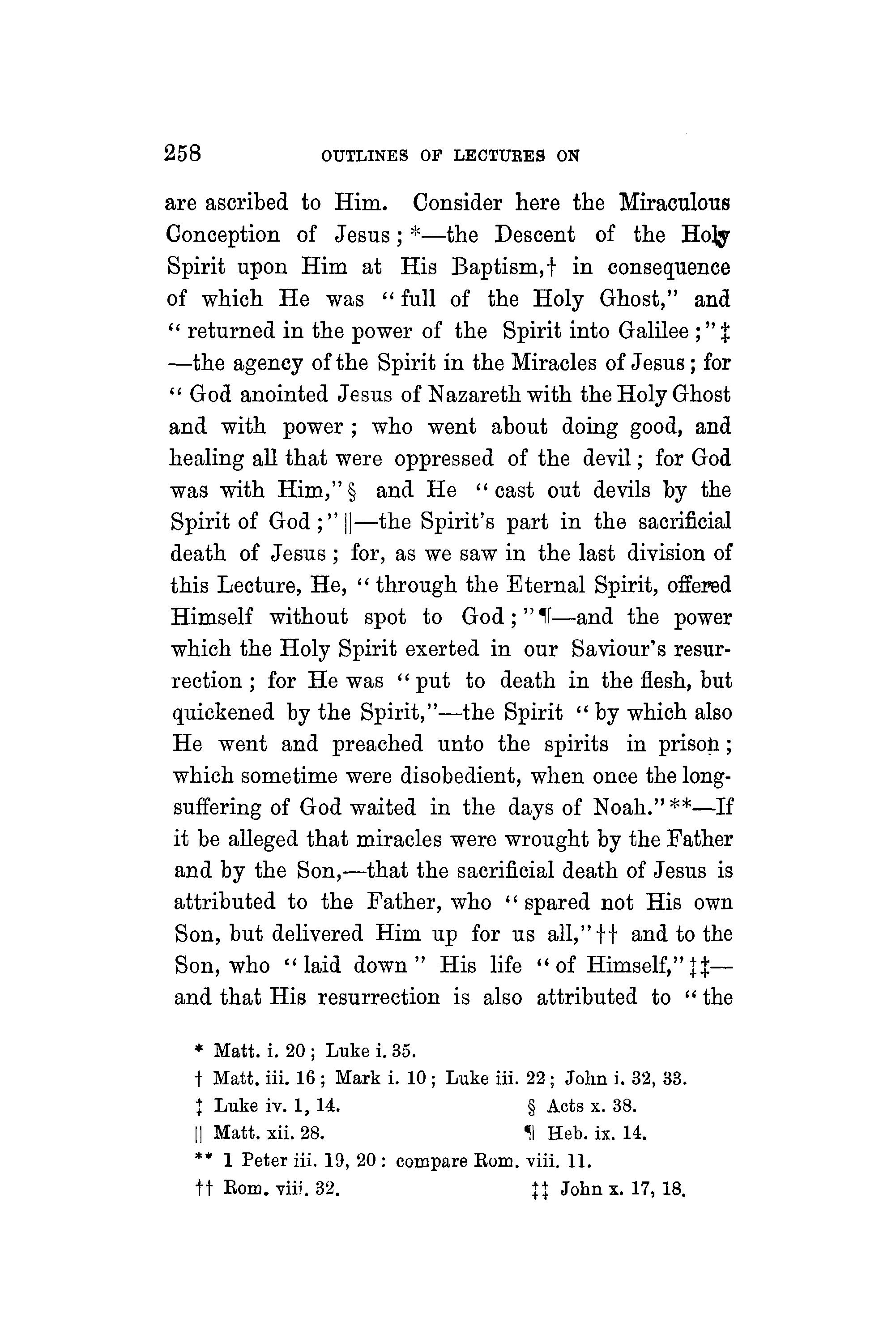
§ Acts x. 38.
~I Heb. ix. 14.
*"' l Peter iii. 19, 20: compare Rom. viii. 11.
tt Rom. viii. 32.
H John x. 17, 18.

259
glory of the Father,"* and to the Son, who '' tuok again the life which He laid down," t-all this, we reply, is most true ;-and it is confirmatory of the great system which we are now reverently attemptiug to explore·; for what the Scriptures ascribe to the Father, and to the Son, they also explicitly ascribe to the co-equal Spirit.
4. Agencies of Grace are ascribed to the Holy Spirit. But these we shall hereafter more particularly enumerate. Suffice it now to say, that if the Spirit, as the promised Paraclete, vindicates all the claims of Jesus, and " reproves the world of sin, and of righteousness, and of judgment/' t so that Jesus is "justified in the Spirit;"§ if He is the Author of Regeneration, II and of Renewing, including " the Sanctification of the Spirit;"~[ -if He is the Source of con~fort, and of co11stant guidance; ,::::,_if the future resurrection of the saints is assigned to His agency ; for "He that raised up Christ from the dead shall also quicken your mortal bodies by His Spirit that dwelleth in you;" tt-if, finally, not now to mention yet other evidences which we might readily gather around us, He is represented as yielding Eternal Life to man; for "he that soweth to the Spirit shall of the Spirit reap life everlasting," t t that life which is "the gift of God ...... through Jesus Christ our Lord; § §-can we doubt, on these important grounds, that the Holy Spirit is truly and properly God?
* Rom. vi. 4. t John x. 17, 18, § 1 Tim. iii. 16.
** Acts ix. 31 ; Rom. viii. 14; Gal. v. 18. t John xvi. 8.
11 John iii. 5, G, 8.
Titus iii. 5; 2 Thess. ii. 13 ; l Peter i. 2.
tt Rom. viii. 11. tt Gal. vi. 8. §§ Rom, vi. 23. s 2

LECTURE XXXIII.
THE DIVINITYOF THE HOLYSPIRIT:-DIVINE WORSHIP PAID TO HIM.
IV. DIVINE Worship is paid to the Holy Spirit, as will appear from the following selected instances:-
1. When the Seraphim, in Isaiah's Vision, "cried ..... . and said, Holy, holy, holy, is the LORDof hosts,"* did they not perform a solemn act of worship? That worship was directed, not to the Father only, but also to the Son; t and not only to the Father and the Son, but also to the Holy Spirit. t
2. When the priestly benediction was pronounced, " The LoRDbless thee, and keep thee : the LoRD make His face shine upon thee, and be gracious unto thee: the LoRDlift up His countenance upon thee, and give thee peace," § was not worship offered,-the worship of prayer for all these blessings ? Regarding this passage, as we have done, in the light of a testimony to the doctrine of the Holy Trinity in Unity, we conclude that it supplies an example of the worship of prayer,-as the text above-cited supplies an example of the worship of praise,-addressed not only to the Father and the Son, but also to the Holy Spirit.
3. When St. Paul pronounces what we have called an Apostolical Benediction, "The grace of the Lord
• Isai. vi. 3. t John xii. 41. t See Acts xx:viii. 25. § N um. vi. 24-26.
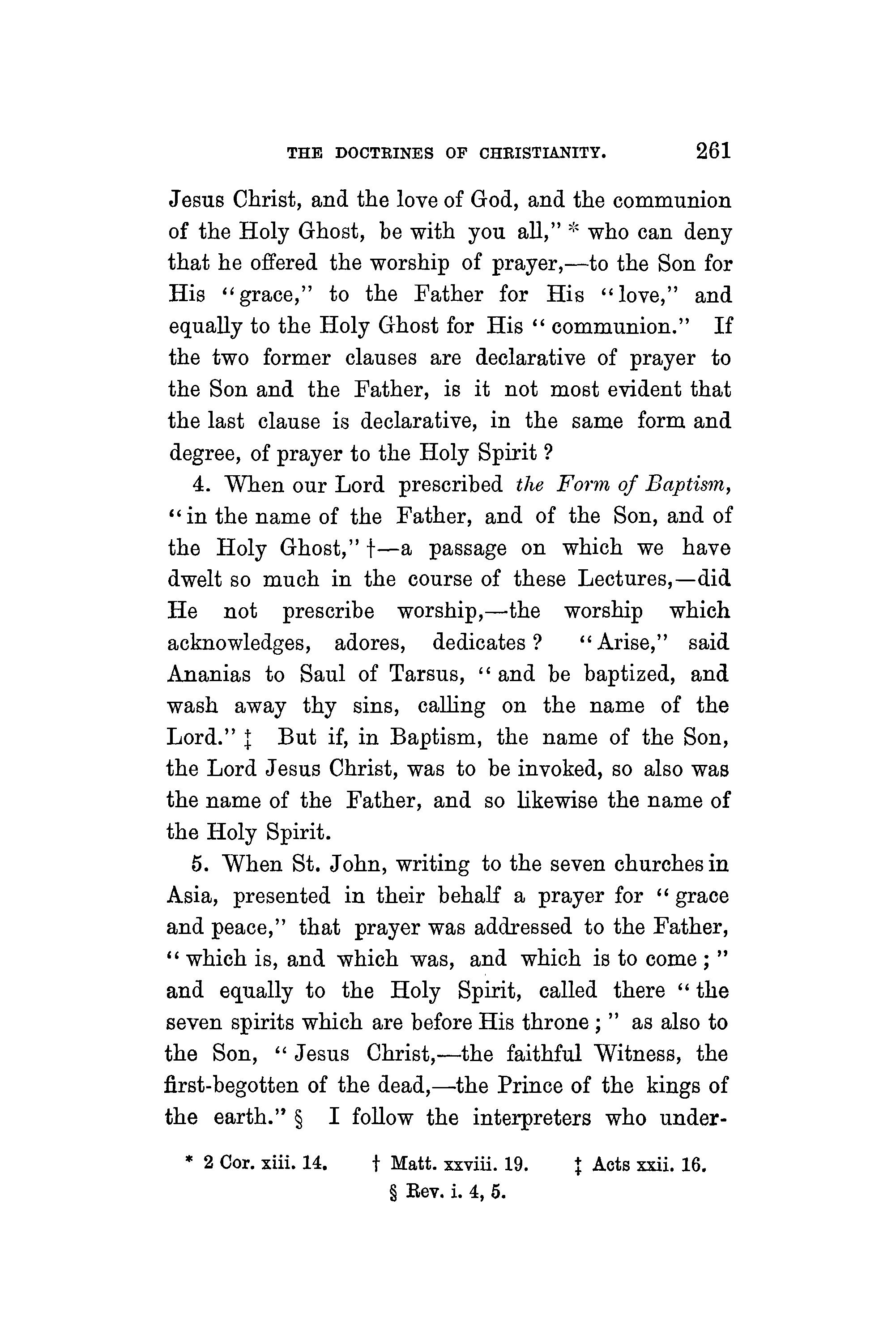
Jesus Christ, and the love of God, and the communion of the Holy Ghost, be with you all,"* who can deny that he offered the worship of prayer,-to the Son for His "grace," to the Father for His "love," and equally to the Holy Ghost for His "communion." If the two former clauses are declarative of prayer to the Son and the Father, is it not most evident that the last clause is declarative, in the same form and degree, of prayer to the Holy Spirit ?
4. When our Lord prescribed the Form of Baptism, "in the name of the Father, and of the Son, and of the Holy Ghost," t-a passage on which we have dwelt so much in the course of these Lectures,-did He not prescribe worship,-the worship which acknowledges, adores, dedicates? "Arise," said Ananias to Saul of Tarsus, "and be baptized, and wash away thy sins, calling on the name of the Lord." t But if, in Baptism, the name of the Son, the Lord Jesus Christ, was to be invoked, so also was the name of the Father, and so likewise the name of the Holy Spirit.
5. When St. John, writing to the seven churches in Asia, presented in their behalf a prayer for "grace and peace," that prayer was addressed to the Father, '' which is, and which was, and which is to come;" and equally to the Holy Spirit, called there " the seven spirits which are before His throne ; " as also to the Son, "Jesus Ohrist,-the faithful Witness, the first-begotten of the dead,-the Prince of the kings of the earth." § I follow the interpreters who under-
* 2 Cor. xiii. 14. t Matt. xxviii. 19. § Rev. i. 4, 5. t Acts xxii. 16.

OF LECTURES ON
stand " the seven spirits " as denoting the Holy Spirit in His manifold and perfect gifts and agencies. " By these seven spirits," as you read in Mr. Wesley's Note on the passage, " not seven created angels, but the Holy Ghost is to be understood ....... He is called 'the seven spirits,' not with regard to His essence, which is one, but with regard to His manifold operations."
6. When St. Paul says to the Thessalonians, " The Lord direct your hearts into the love of God, and into the patient waiting for Christ,"* he is thought to offer this prayer especially to the Lord the Spirit, whose office it is to lead, guide, direct. With this may be compared a kindred text, occurring in the First Epistle to the same Thessalonians: t '' And the Lord''meaning here, also, as we understand it, the Lord the Spirit-" make you to increase and abound in love one toward another, and toward all men, even as we do toward you : to the end He may stablish your hearts unblamable in holiness before God, even our Father, at the coming of our Lord Jesus Christ with all His saints."-The testimonies, indeed, concerning the doctrine of the Trinity in Unity, which yon may note in the course of your own Scripture-reading, will furnish you with very striking examples of worship paid to the Holy Spirit, in conjunction with the Father and the Son.
Note.-! would direct your thoughts, for further examination, to a remarkable text, t which some of our writers have urged in connection with the present inquiry: " We are the circumcision, which worship
* 2 Thess. iii. 5. t 1 Thess. iii. 12, 13. t Philip. iii. S.

God in the Spirit."
A various reading, which Bishop Middleton admits is supported by "the majority of MSS., with some of the fathers," though that learned writer does not appear to me to give the weight to this external evidence which it deserves,-which has received the approbation of able critics,-and which has been inserted in the text by Scholz, Lachmann, and Tischendorf, is oI TrVEvµ.an ernv (instead of 0cf) AarpEvovn~. I do not see how this can be translated otherwise than either, "who worship the Spirit of God;" or, "who worship in the Spirit of God." The latter seems most in harmony with the context,* and it would seem also with the order of the words.
* Compare Ephes. vi. 18 with Jude 20.
THE AGENCY OF THE HOLY SPIRIT.
THE agency of the Holy Spirit is represented to us as pre-eminently benign and gracious,-in harmony with the expressions, " Thy Spirit is good," '~-" Thy good Spirit," t-" The love of the Spirit," t-" Where is He," asks Isaiah, " that brought them up out of the sea with the Shepherd of His flock ? where is He that put His Holy Spirit within him ?...... The Spirit of the LoRDcaused him to rest."§ All this is declarative of free and communicative goodness. I wish to keep this character of the Spirit's agency in view, while I proceed to consider the subject which now comes especially before us.
I. Review the agency of the Holy Spirit in the creation of the world, and in the peculiar endowments which He bestows on His intellectual creature man. Is not all this an agency of Almighty Love ?
1. When you advert to the former of these topics,the Spirit's agency in the creation of the world,-as in texts which we have already cited, II you perceive that His agency is the immediate agency which imparts being, life, and good,-and that, as the Church from age to age believes and declares, He is " the Lord and
* Psalm cxliii. 10. t N ehem. ix. 20.
t Rom. xv. 30.
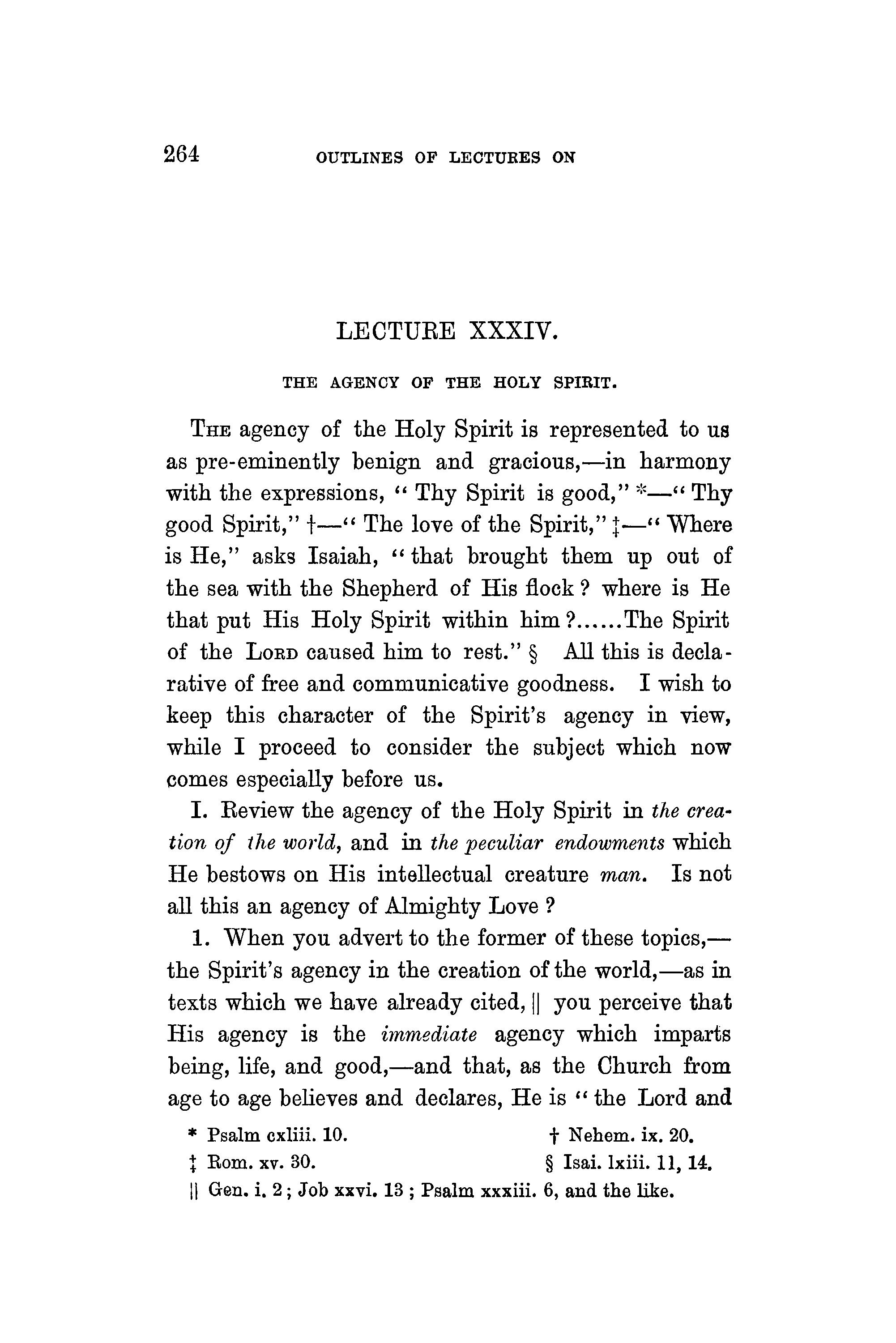
§ Isai. lxiii. 11, 14.
II Gen. i. 2; Job xxvi. 13; Psalm xxxiii. 6, and the like.

Giver of life." He " moved upon the face of the waters." He " garnished the heavens" with beauty, and made '' the earth full of the goodness of the LORD." ,:~
2. The same remark applies also to the second topic which we have now named,-the peculiar endowments of man.-'' There is a spirit in man,"some appear to think that by this word the Holy Spirit is directly intended, the " Spirit itself," t" and the inspiration of the Almighty giveth them understanding." t-" See, I have called by name Bezaleel the son of Uri, the son of Hur, of the tribe of Judah: and I have filled him with the Spirit of God, in wisdom, and in understanding, and in knowledge, and in all manner of workmanship." §-Was it not from the same source that Hiram likewise was " filled with wisdom and understanding ? " II-So of the ploughman and sower it is said that " his God doth instruct him to discretion, and doth teach him."~
IL Call to mind the Spirit's agency in the Providential maintenance and renovation of the u·orld around us. Is not this too the agency of Love? and does it not supply us with most beautiful images of the Spirit's agency in renewing and strengthening grace? -He breathes on scenes of death and desolation, and
* See Psalm xxxiii. 5.
t See Dr. Adam Clarke's note on the passage.
t Job xxxii. 8: compare also Gen. ii. 7.
§ Exod. xxxi. 2, 3, and xxxv. 30, 31.
II 1 Kings vii. 13, 14.
, Isai. :x.xviii.26, compared with verse 29.

OUTLINES OF LECTURES ON
creates life.':'-He descends in "showers of blessing," t and makes all fruitful, or more fruitful.t " Then," says the Prophet,§ leading our thoughts more fully to the hope of spiritual and moral renovation, "juclgnient shall dwell in the wilderness, and righteousness remain in the fruitful :field."-He Rheds His copious, reviving, fruitful influences, " as the dew." II Does not Job speak of the same most kindly agency, when he says, "Thou hast granted me life and favour, and Thy visitation hath preserved my spirit ? " When the Psalmist, using language which indicates a reference to Creation and Renewal, says, '' Create in me a clean heart, 0 God ; and renew a right spirit within me," he immediately adds, significantly teaching us who is the Author of that creation and renewal, " Cast me not away from Thy presence; and take not Thy Holy Spirit from me."** All that we have now recited speaks of an agency or influence of benignant love.
III. Attend in this view also to the Spirit's agency in the transactions of our Redemption :-all are benign. The Miraculous Conception of Jesus, in which He assumed our nature, that He might "dwell among us, full of grace and truth; " t+-the Mighty Works of Jesus,-works of Omnipotence and Love, nay, works in which Omnipotence ministers to Love ;-the Offering of Jesus, by which man's eternal redemption was wrought ;-the Resurrection of Jesus, by which life
• Psalm civ. 30; Ezek. xxxvii. 9; John iii. 8.
t Ezek. xxxiv. 26. t See again Isai. xxxii. 15.
§ Isai. xxxii. 16. II Hosea xiv. 5. Job x. 12.
0 Psalm Ii. 10, 11. tt John i. 14.
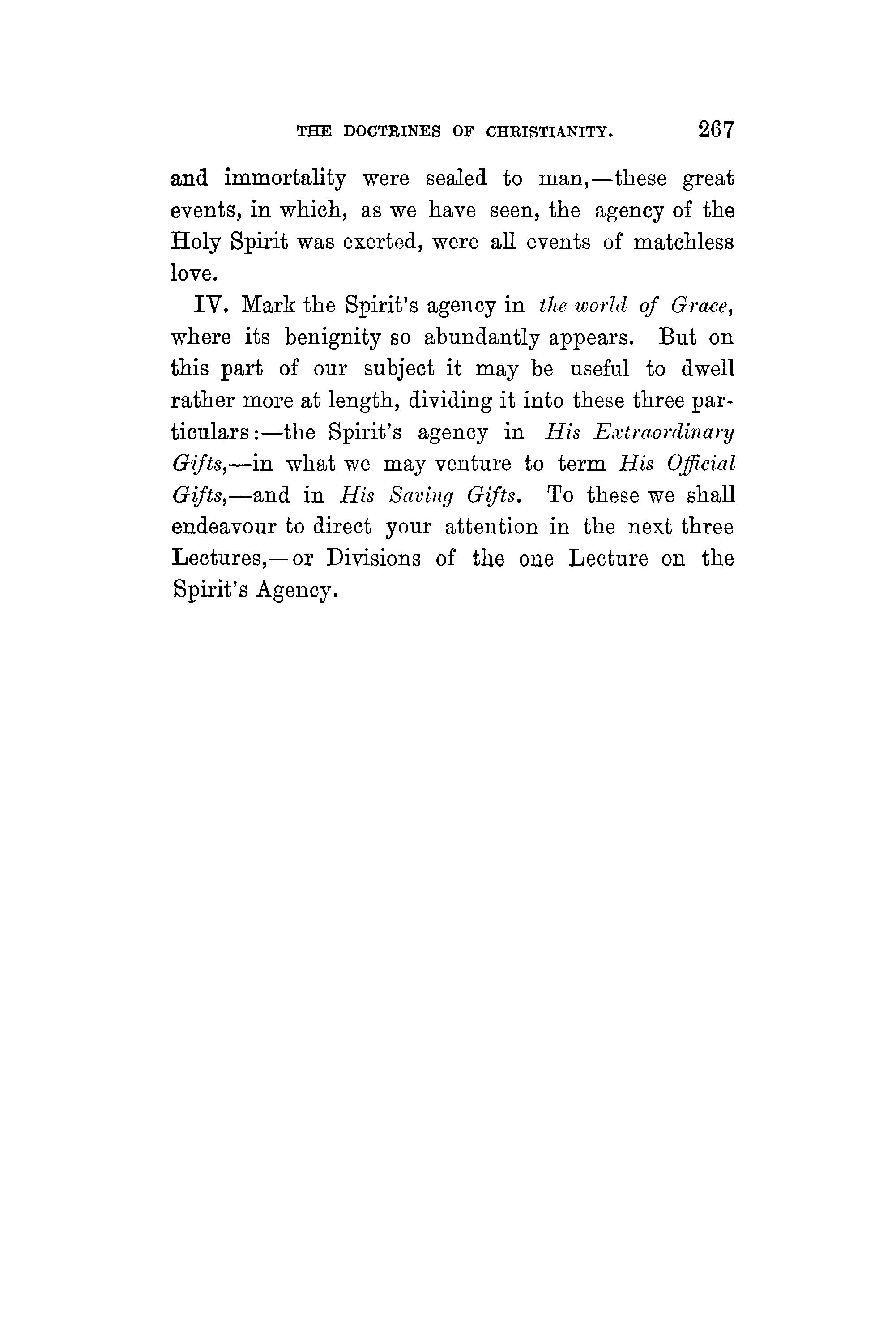
THE DOCTRINES OF CHRISTIANITY. 267 and immortality were sealed to man,-these great events, in which, as we have seen, the agency of the Holy Spirit was exerted, were all events of matchless love.
IV. Mark the Spirit's agency in the world of Grace, where its benignity so abundantly appears. But on this part of our subject it may be useful to dwell rather more at length, dividing it into these three particula,rs :-the Spirit's agency in His E.l;traorclinary Gif ts,-in what we may venture to term His Official Gifts,-and in His Saving Gifts. To these we shall endeavour to direct your attention in the next three Lectures,-or Divisions of the one Lecture on the Spirit's Agency.

THE AGENCY OF THE HOLY SPIRIT :-EXTRAORDINARY GIFTS,
THE extraordinary Gifts which the Holy Spirit, in the economy of His grace, bestowed on Apostles, Prophets, Evangelists, and others, were signal tokens of His love. I call your attention to the following remarks concerning them.
I. The Gifts of which we now speak are called extraordinary, partly, because they were confined to the early ages, and, partly, because, even in the early ages, they were not bestowed on Christian believers univertmlly. "Are all apostles?" says St. Paul, addressing himself to a Church that was rich in spiritual gifts, ,:c" are all prophets ? are all teachers ? are all workers of miracles? have all the gifts of healing ? do all speak with tongues ? do all interpret ? " t These extraordinary Gifts are often named in the New Testament; and, in the twelfth chapter of St. Paul's First Epistle to the Corinthians, they are, to a great degree, enumerated. The Apostle there refers to "diversities of gifts, but the same Spirit,"-to "the manifestation of the Spirit" which "is given to every man to profit withal ; "-and he then proceeds, " For to one is given by the Spirit the word of wisdom ; to
See l Cor. i. 5; 2 Cor. viii. 7. t 1 Cor. xii. 29, 30.
another the word of knowledge by the same Spirit; to another faith by the same Spirit ; to another the gifts of healing by the same Spirit; to another the working of miracles ; to another prophecy ; to another discerning of spirits; to another divers kinds of tongues; to another the interpretation of tongues : but all these worketh that one and the selfsame Spirit."* Observe with what significant emphasis these gifts are ascribed to the Holy Spirit; and observe too what evidences they supply of His benignity.
IL The uses of the extraordinary Gifts may be said to have been great and manifold.
1. They were convincing evidences of the truth of the Gospel. The Apostles " went forth, and preached everywhere, the Lord working with them, and confirming the word with signs following." t When Paul and Barnabas " abode long time " at Iconium, "speaking boldly in the Lord," He "gave testimony unto the word of His grace, and granted signs and wonders to be done by their hands." t " God bore witness, both with signs and wonders, and with divers miracles, and gifts of the Holy Ghost."§
2. Were they not also striking representations of the Gospel, in its power, its love, and its impartiality? What a power of truth, wisdom, healing energy, did they disclose !-what love did they exhibit in reference to the mind, the heart, the state of man !-what impartiality in bestowing benefits on all that would accept them! How fitly did they set forth that Gospel which is " the power of God," -the power of
* l Cor. xii. 4, 7-11.
t Acts xiv. 3.

t Mark xvi. 20.
§ Heb. ii. 4:.
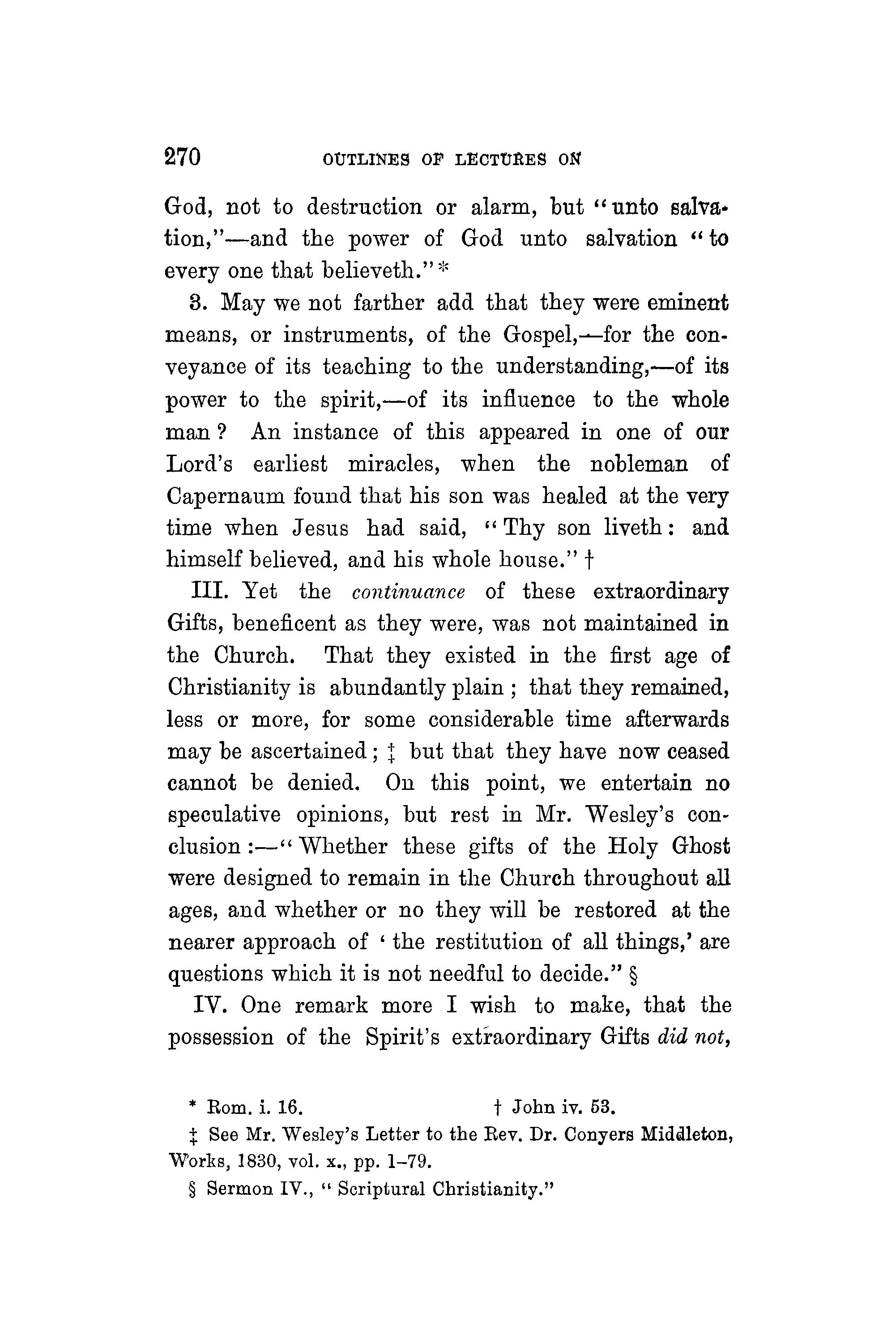
God, not to destruction or alarm, but "unto salva• tion,"-and the power of God unto salvation "to every one that believeth." *
3. May we not farther add that they were eminent means, or instruments, of the Gospel,-for the conveyance of its teaching to the understanding,-of its power to the spirit,-of its influence to the whole man ? An instance of this appeared in one of our Lord's earliest miracles, when the nobleman of Capernaum found that his son was healed at the very time when Jesus had said, " Thy son liveth: and himself believed, and his whole house." t
III. Yet the continuance of these extraordinary Gifts, beneficent as they were, was not maintained in the Church. That they existed in the first age of Christianity is abundantly plain ; that they remained, less or more, for some considerable time afterwards may be ascertained; t but that they have now ceased cannot be denied. On this point, we entertain no speculative opinions, but rest in Mr. Wesley's conclusion:-" Whether these gifts of the Holy Ghost were designed to remain in the Church throughout all ages, and whether or no they will be restored at the nearer approach of 'the restitution of all things,' are questions which it is not needful to decide." §
IV. One remark more I wish to make, that the possession of the Spirit's extraordinary Gifts did not,
* Rom. i. 16. t John iv. 53.
t See Mr. Wesley's Letter to the Rev. Dr. Conyers Middleton, Works, 1830, vol. x., pp. 1-79.
§ Sermon IV., " Scriptural Christianity."

THE DOCTRINES OF CHRISTIANITY. 271
of necessity, imply the possession of His sai;ing grace.* "Many will say to Me in that day, " Lord, Lord, have we not prophesied in Thy name ? and in Thy name have cast out devils ? and in Thy name done many wonderful works ? " None of this is denied. But what follows? "And then will I profess unto them, I never knew you: depart from Me, ye that work iniquity." t Does not St. Paul proceed on this principle in the beginning of the thirteenth chapter of his First Epistle to the Corinthians? What shall we say of Balaam in the Old Testament, who, sometimes at least, had the Spirit of prophecy ?-and what of Judas in the New, to whom, as well as to the rest of the Apostles, Jesus "gave power against unclean spirits, to cast them out, and to heal all manner of sickness and all manner of disease ? " + We do not, by this remark, disparage the extraordinary gifts. They were good ;-they proceeded from the Good Spirit ; and they were signal evidences of His love. Accordingly, St. Paul, in reference to them, says, '' Covet earnestly the best gifts : and yet," he adds, " show I unto you a more excellent way.'' §
* See Wardlaw's "Discourses on the Socinian Controversy," Discourse XI., at the beginning.
t Matt. vii. 22, 23. t Matt. :x. 1. § 1 Cor. xii. 31.
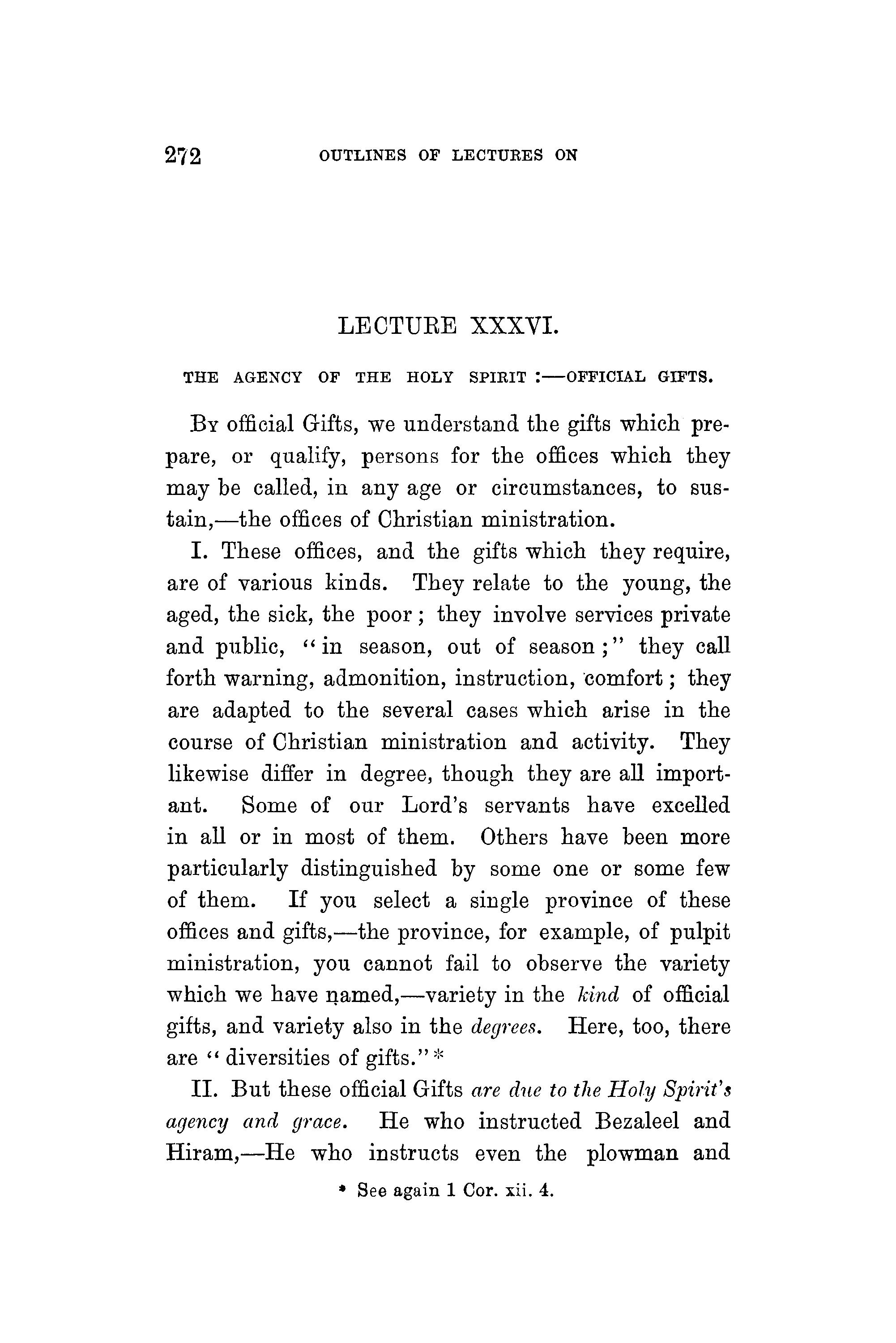
XXXVI.
BY official Gifts, we understand the gifts which prepare, or qualify, persons for the offices which they may be called, in any age or circumstances, to sustain,-the offices of Christian ministration.
I. These offices, and the gifts which they require, are of various kinds. They relate to the young, the aged, the sick, the poor; they involve services private and public, " in season, out of season ; " they call forth warning, admonition, instruction, Mmfort ; they are adapted to the several cases which arise in the course of Christian ministration and activity. They likewise differ in degree, though they are all important. Some of our Lord's servants have excelled in all or in most of them. Others have been more particularly distinguished by some one or some few of them. If you select a single province of these offices and gifts,-the province, for example, of pulpit ministration, you cannot fail to observe the variety which we have :qamed,-variety in the kind of official gifts, and variety also in the degrees. Here, too, there are " diversities of gifts."*
II. But these official Gifts are due to the Holy Spirit'~ agency and grace. He who instructed Bezaleel and Hiram,-He who instructs even the plowman and
• See again 1 Cor. xii. 4.

THE DOCTRINES OF CHRISTIJ,.NITY. 273 sower,-He who furnishes all with the endowments suitable to their providential stations and duties,-He imparts to His servants the gifts which their several provinces require. And He also discovers the gifts which He has imparted,-He inspires the feeliri_gsand desires which correspond with them,-He opeJlS and facilitates paths of manifold usefulness,-He conducts the person who places himself under His guidance to a cheerful surrender of his time, his talents, his all, in the works which may be assigned to him, to his Redeemer and Lord. Gifts are sanctified, directed, blest.
III. The design of the Holy Spirit's official Gifts is, along with the glory of Christ, to promote the true good of man, bodily and spiritual, temporal aml eternal. Beneficence discloses itself in all these distributions of love. ·when St. Paul speaks of our ascended Saviour's gift of ministers and ministerial endowments, he significantly traces their purpose and design,-'' for the perfecting of the saints,"-'' the completing them both in number and their various gifts and graces,"-" for the work of the ministry,"'' the Rerving God and His Church in their various ministrations,''-'' for the edifying of the body of Christ,''" the building up this His mystical body in faith, love, holiness.",:, In agreement with this is the design of all the official Gifts which the Spirit conveys to the Church from age to age.
IV. The gifts which the Spirit thus bestows are never to be despised.
* Ephes. iv. 12; with Mr. Wesley's Notes.

1. They are indeed of different kinds, (as noted Division I.,)-and are therefore more adapted to the different capacities, circumstances, and wants of man. If all the servants of Christ possessed one kind of talent only, how could the variety of human cases be met? Many a form of ignorance, error, and misery might be left untouched.
2. They may seem, when compared together, to be of uneq1lal value. But of this we really are not competent judges. We are struck with what dazzles,-we pass unnoted what pursues a silent and perpetual course of good. Yet if these gifts were of unequal value, they all proceed from the same Source,-they all form parts of the same great system of edification. "The body," says St. Paul, "is not one member, but many. If the foot shall say, Because I am not the hand, I am not of the body ; is it therefore not of the body? and if the ear shall say, Because I am not the eye, I am not of the body; is it therefore not of the body?",:,
3. They are all, therefore, to be prized, for the sake of their Donor, and of their own manifold use. Despise not, and do not countenance others when they despise, any faithful man's gifts. They may differ from your own, or from those which you have been wont most to esteem; and yet they may, by the blessing of God, be of equal service. They may, by comparison, be inferior in degree ; yet they are capable of improvement, and may be made extensively bene-
* See the whole passage, 1 Cor. xii. 14-31.

ficial to others who need such assistance as they yield. Far from us be the spirit of envy, jealousy, disdain. Let us, with unselfish generosity, rejoice in the usefulness of others, and honour the Giver of all good in them,-whatever may or may not be allotted to ourselves.

THE Spirit's saving Gifts, comprehending all the agencies which have reference to salvation, may perhaps be divided into three parts :-such as precede a sinner's conversion, and are preparatory to it,such as accompany a sinner's conversion, and properly appertain to it,-and such as follow a sinner's conversion, proving its reality, and marking all Christian progress.
I. Such as precede a sinner's conversion. Here we may select and name the three following :-
1. Striving :-" My Spirit shall not always strive with man." * Regarding this passage as of general application, may we not say that the Spirit does strive with man,-that He strives with patience and long-suffering,-but that, if man persist in his refusal to yield, He will not strive always ?
2. Convincing:-" When He,"-" the Comforter," -" is come, He will reprove,"-or "convince," (margin,)-" the world of sin, and of righteousness, and of judgment : of sin, because they believe not on Me ; of righteousness, because I go to My Father, and ye see Me no more; of judgment, because the prince of this world is judged." t The agency of conviction is plainly declared in this most weighty and comprehensive passage. When
• Gen. vi. 3. t John xvi. 8-11.
THE DOCTRINES OF CHRISTIANITY, 277
man receives the gift of conviction, he receives,-for that too is received,-" the spirit of bondage to fear." *
3. Drawing to Christ :-" No man can come to Me, except the Father which hath sent Me draw him,"or, as it is afterwards expressed, except it be "given unto him of My Father,''-when he "hath heard, and hath learned of the Father." t Now, from the whole economy of Divine grace we conclude that the Father draws,-gives disposition and power to come to Christ,-causes His truth to be heard and learned, -by the Holy Spirit.
II. Such as accompany a sinner's conversion. Here also you may note three important particulars:-
1. Working faith :-for "faith" is "of the operation ri God," by His Spirit, namely,t-lt "is given,"lxapla·071,"graciously given," so Macknight translates," to believe." § ·whence faith is called " the gift of God." II
2. Witnessing onr acceptance,-when we "receive the Spirit of adoption, whereby we cry, Abba, Father. The Spirit itself beareth witness with our spirit, that we are the children of God." 4;f " After that ye believed," writes the apostle to the Ephesians, "ye were sealed with that Holy Spirit of promise." **
8. Regenerating :-whence our Lord's language, "Born of the Spirit." tt St. Paul's language is in harmony with this,-" the washing of regeneration, and renewing of the Holy Ghost." tt Regenerate persons
* Rom. viii. 15.
t Col. ii. 12.
Rom. viii. 15, 16.

§ Phil. i. 29. 11 Ephes. ii. 8.
*" Ephes. i. 13.
tt John iii. 5, 6, 8. t Compare John vi. 44, 65, 45.
H Titus iii. 5.

are also said to be "born of God,"-whence, as we have seen, a proof arises that the Spirit of God is Gc,d,-and whence, also, a view is given, as we may now see, of the economy of Divine grace, to which we have already referred in this Lecture ;-for God regenerates man by the agency of His Spirit.
III. Such as follow a sinner's conversion. Here I will briefly mention these six:-
1. Sanctifying, in the full sense of that word, sanctifying wholly, carrying out the work, which was begun in Regeneration, to its maturity ;-for, from first to last, we are " sanctified ... by the Spirit of our God." * All " sanctification " is " of the Spirit." t
2. Teaching :-This "anointing teacheth of all things, and is truth, and is no lie." How can they do otherwise than " know," as the fruit of most blessed teaching, who "have an unctio·n from the Holy One?" t He taught the apostles "all things,"§ and He still teaches to our true, and He only to our true, spiritual profit. He opens and applies the Word.
3. Guiding :-The sons of God are " led by the Spirit of God." II They "live in the Spirit,''-and they are, therefore, to "walk in the Spirit."~ Theirs is the "minding" of the Spirit,** and they, accordingly, "walk after the Spirit,•· tt and are " after the Spirit." t t
4. Helping :-whence it is so beautifully and * 1 Cor. vi. 11. t See 1 Peter i. 2. t 1 John ii. 27, compared with verse 20.
§ John xiv. 26. II Rom. viii. 14 ; Gal. v. 18.
~I Gal. v. 25. "'* Rom. viii. 6. tt Rom. viii. 4. ++Rom. viii, 5.
DOCTRINES OF CHRISTIANITY. 279 forcibly said, " Likewise the Spirit also helpeth our infirmities." *
5. Comforting :-'' The churches, ... walking in the fear of the Lord, and in the comfort of the Holy Ghost, were multiplied." t
6. Giving the foretaste of hem.:en:-for He is " the earnest,"-pledge and antepast,-'' of our inheritance until the redemption of the purchased possession.'' t He grants the "first-fruits" of the heavenly harvest.§
Our attention, in the ordinary ministrations of Divine truth, is especially directed to the particulars named in this Lecture, and to others of a kindred description. It is of the greatest moment that we should entertain the most reverential and grateful sentiments concerning the Holy Spirit's agency;that we should seek it, with exemplary devotion, for ourselves ;-and that we should faithfully rely upon it for all success. It is likewise of the highest consequence that we should most distinctly acknowledge the Spirit's agency in our public prayers, and that we should often preach upon it. The more we honour the Holy Spirit, the more may we humbly expect that He will honour us. And blessed are they who still preach the Gospel with the Holy Ghost sent down from heaven, and who prove that, in these our days also, He gives testimony to the vVord of His grace !
* Rom. viii. 26.
t Ephes. i. 14.
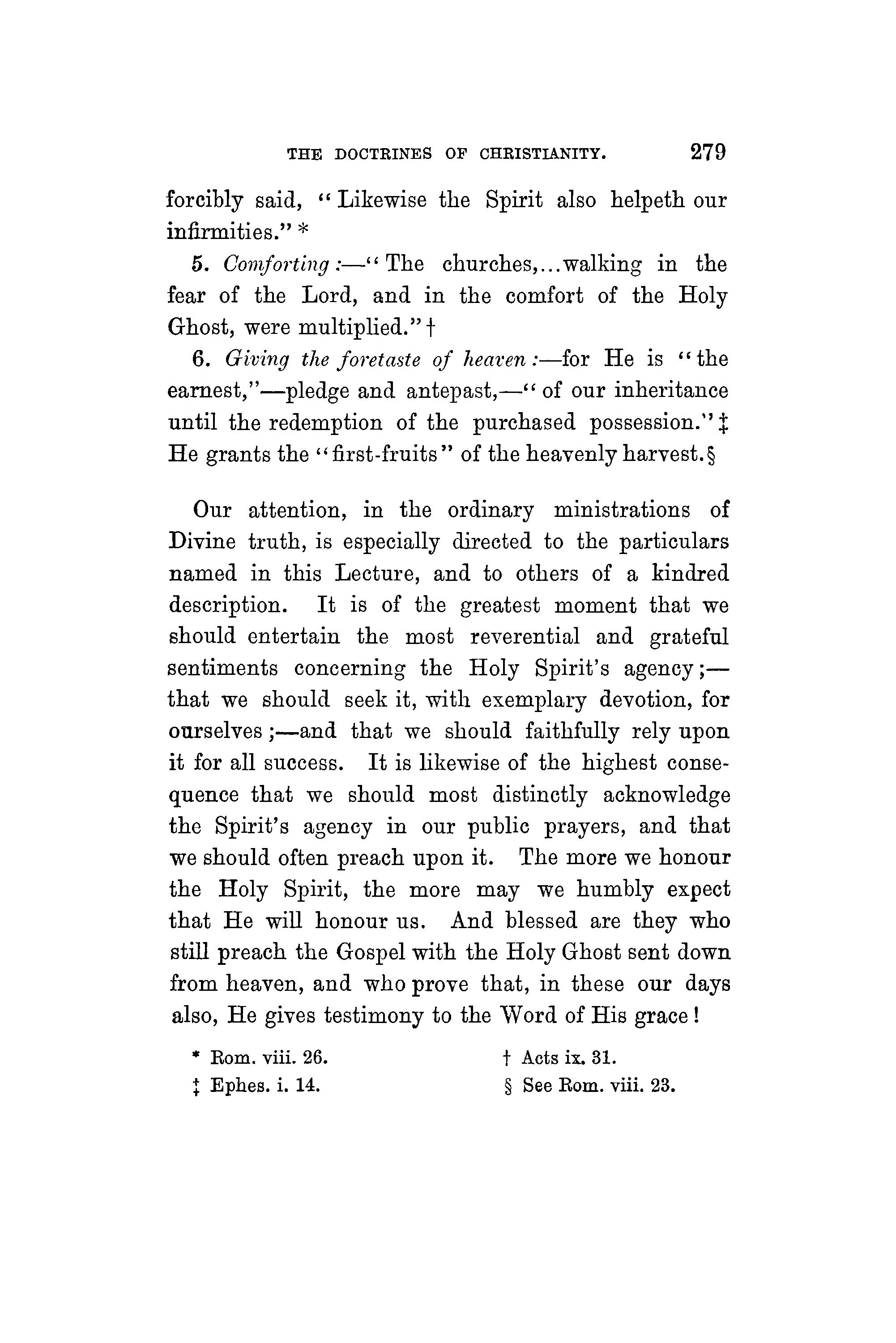
t Acts ix. 31.
§ See Rom. viii. 23.

THE MORECONSPICUOUSWORKSOF GOD : - CREATION.
AFTERwe have employed our meditations on the doctrine of the Holy Trinity in Unity, comprehending a view of the properties of the Divine Nature, it seems to come next iu order that we should survey the more conspicuous Works of God, or such as are usually arranged under the titles of Creation, Providence, and Redemption. But the Work of Redemption will be more fitly reserved for the next division of our Course. Here, then, we shall confine ourselves chiefly to the Works of Creation and Providence.
When we direct our attention to the Work of Creation, we may take occasion to consider its Nature, its Extent, and its Author.
I. The Nature of Creation is not to be ascertained from any peculiar and exclusive meaning of the term rendered Creation, whether in Hebrew, Greek, or Latin; for that term, in each language, is sometimes applied to the formation "of one substance out of another pre-existing: "-but it is to be collected from testimony,-the testimony of Scripture. Creation,-the creation of all things,-is defined by Bishop Pearson to be "the production of their total being; so that whatsoever entity they had when made, had no real existence before they were so made. And

this manner of production," he adds, "we usually term Creation, as excluding all concurrence of any material cause, and all dependence of any kind of subject, as presupposing no privation, as including no motion, as signifying a production out of nothing ; that is, by which something is made, and not anything preceding out of which it is made. This is the proper and peculiar sense of the word Creation." ,:, To support this definition, the following quotations are particularly made:-
2 Mac. vii. 28. " I beseech thee, my son, look upon the heaven and the earth, and all that is therein, and consider that God made them of things that were not,"-" which," as Pearson justly observes, " is a clear description of Creation, that is, production out of nothing." It is true that this passage is taken out of one of the apocryphal books ; but it occurs in a deeply affecting narrative, and is evidently declarative of the faith which the Jews entertained on this subject, and to which they adhered in the most painful exigencies; for the mother who uttered it, with her seven sons, was then brought by Antiochus Epiphanes to the trial of most cruel martyrdom. Six of the sons had already died. It was the seventh and youngest whom the mother thus addressed, and who also nobly died,-" died undefiled, and put his whole trust in the Lord. Last of all, after the sons, the mother died."
Rom. iv. 17. "God, who quickeneth the dead, and calleth,"-that is, causeth to be,t-" those things which be not as though they were." Here there appears to be a description of two great works of God,-Renova-
• Exposition of the Creed, Article I. t See Pearson.

OUTLINES OF LECTURES ON tion,-" who quickeneth the dead,"-and Creation,who "calleth those things which be not as though they were,"-" who maketh those things which were not," says Pearson on this clause, "to be, and produceth that which hath a being out of that which had not, that is, out of nothing." " This reason" is " generally persuasive unto faith ; " and it is, in the text next to be cited, '' more peculiarly applied by the apostle to the belief of the Creation."
Heb. xi. 8. " Through faith we understand that the worlds were framed by the Word of God, so that things which are seen were not made of things which do "-or "did '' *-"appear,"-" those 'things which are seen,' that is, which are," says Pearson, "were made of those 'which did not appear,'-equivalent to the lE ov1<.ovTwv of the Maccabees,-" that is, which were not." t
II. The Extent of Creation reaches to " all beings whatsoever beside God."
Creation comprehends the heavens and the earth,the two great divisions of the universe, in which the whole is contained. These God " created in the beginning,"-these He "made in six days,"-to these, as comprising all Creation, He appeals in His controversy with His people,-and of these He is "Lord," -as He is Creator.+
Creation comprehends all things that were made ;-for
* Macknight's Translation.
t Compare the two expressions, µr, J,c cpcu11oµe11w11, " of things which did not appear," and i! ou,c l>11Tw11,"of things which were not."
t See Gen. i. 1 ; Exod. xx. 11 ; Isai. i. 2 ; Acts xvii. 24.

by the Word " all things were made ;-and without Him was not anything made that was made,"-where our attention is significantly pointed to every object of Creation,-every thing that was made,-omitting only what was not made.*
Creation,-the whole Creation,-comprehends '' all things" made, "that are in heaven, and that are in earth, visible and invisible," in their several ranks and relations. t
III. The .Author of Creation is God the Father. " Thus saith God the LoRD, He that created the heavens, and stretched them out; He that spread forth the earth, and that which cometh out of it ; He that giveth breath unto the people upon it, and spirit. to them that walk therein : I the Lo RD have called Thee in righteousness, and will hold Thine hand, and will keep Thee, and give Thee for a covenant of the people, for a light of the Gentiles." t Here the Father is distinguishable from the Son,-the promised Messiah,-whom He addresses. "Lord, Thou art God, which hast made heaven, and earth, and the sea, and all that in them is ....... Of a truth against Thy holy Child Jesus, whom Thou hast anointed, both Herod, and Pontius Pilate, with the Gentiles, and the people of Israel, were gathered together." § Here also the Father is acknowledged and adored as the Universal Creator.
But it is plain,-and it has been proved in preceding Lectures by indubitable testimony of Scripture,-that the Work of Creation is also ascribed to God the Son, * See John i. 3. t See Col. i. 16. t Isai. xlii. 5, 6. § Acts iv. 24, 27,
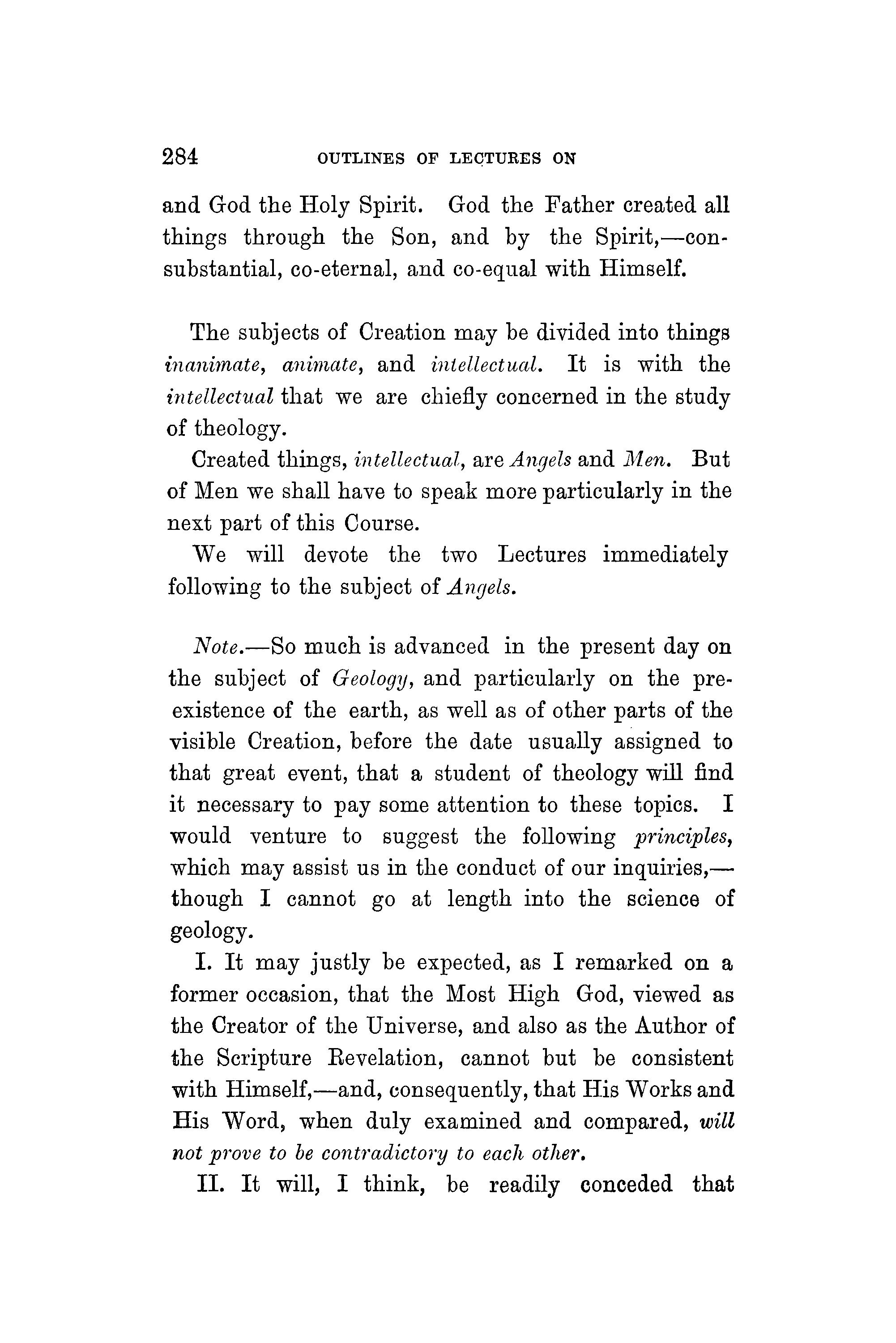
and God the Holy Spirit. God the Father created all things through the Son, and by the Spirit,-consubstantial, co-eternal, and co-equal with Himself.
The subjects of Creation may be divided into things inanimate, aniniate, and intellectual. It is with the intellectual that we are chiefly concerned in the study of theology.
Created things, intellectual, are Angels and Men. But of Men we shall have to speak more particularly in the next part of this Course.
We will devote the two Lectures immediately following to the subject of Angels.
Note.-So much is advanced in the present day on the subject of Geology, and particularly on the preexistence of the earth, as well as of other parts of the visible Creation, before the date usually assigned to that great event, that a student of theology will find it necessary to pay some attention to these topics. I would venture to suggest the following principles, which may assist us in the conduct of our inquiries,though I cannot go at length into the science of geology.
I. It may justly be expected, as I remarked on a former occasion, that the Most High God, viewed as the Creator of the Universe, and also as the Author of the Scripture Revelation, cannot but be consistent with Himself,-and, consequently, that His Works and His Word, when duly examined and compared, will not prove to be contradictory to each other.
II. It will, I think, be readily conceded that

geological investigations, like all other philosophical investigations in the provinces of matter and of mind, ought to proceed according to the following plan:-
1. To collect undeniable facts,-facts which furnish the proper materials for the study of geology.
2. To arrange these facts into their appropriate classes, according to the relations which they may evidently bear to each other.
3. To draw inductions, or conclusions, from them,with a most cautious avoidance, lwicever, of every thing like unproved assumption,-of every thing which is not philosophically, or scientifically, ascertained.
III. It must, further, be laid down as a settled point, that Holy Scripture,-which we receive on the surest evidence as a Revelation from God,-is not to be tampered with, but jg to be explained according to its most obvious meaning, and in harmony with the oldest, soundest, and most tried rules of interpretation.
Keeping these principles in mind, a Christian theologian discovers, or thinks that he discovers, a discrepancy between the facts of geology and the interpretation which he has been accustomed-and which the Church itself has been accustomed from the earliest ages-to give to certain important parts, or passages, of Scripture. What is he to do ? A philosophical infidel discards Scripture at once. But what is a Christian student to do ? Perhaps he is directed to apply a novel mode of interpretation to certain texts of Scripture, that he may thus remove the apparent or real discrepancy. But would he have applied that mode of interpretation-would he even have thought of it-if it had not been to serve a

particular purpose,-to reconcile texts of Scripture to the present theories of geology ? Would it not be better to institute a new search into the truth of these theories ?-to inquire if they do not proceed, in some measure, at least, on y,nproved assumptions, especially with respect to the time necessary for the formation of different stratifications ?-and to wait l That may be dignified with the name of science, which is not strictly scientific ; and that with the name of Philosophy, which is not very philosophical.
I have adverted, in some of my miscellaneous observations, to a text in the Gospel according to St. Mark. That text I will now quote, with Bengel's and Mr. Wesley's Notes upon it. It occurs in chap. x. 6: "But from the beginning of the creation God made them male and female." Coverdale translates, "from the first creacion." Bengel's note is, '' Ergo ante creationem ineunte Genesi descriptam non fuit y,[la creatio." This Mr. Wesley expands thus :-" Therefore Moses, in the first of Genesis, gives us an account of things from the beginning of the creation. Does it not clearly follow, that there was no creation previous to that which Moses describes ? "-no creation, at least, of man ?
CuRious and unwarrantable speculations have sometimes been indulged concerning the Holy Angels. A tendency to "those things" appears to have discovered itself even in the age of the Apostles ; for St. Paul says to the Colossians, " Let no man beguile you of your reward in a voluntary humility and worshipping of angels, intruding into those things which he hath not seen, vainly puffed up by his fleshly mind." * Where this caution became necessary, there was certainly danger ;-danger of prying into hidden and inscrutable matters with regard to created celestial intelligences, and thus of "not holding the Head." t
Speculations of this kind proceeded afterwards to a greater length. About the end of the fourth century, -as is probably conjectured,-a spurious book appeared under the name of" Dionysius the Areopagite,''-of whom we read in Acts xvii. 34,-" On the Celestial Hierarchy,''-" wherein," to use the words of Bishop Bull, " the author speaks so sublimely, so punctually, with so much assurance of the things above, as if he had himself surveyed the heavenly mansions, and, (as a learned man expresseth it,) taken an exact inventory of all that is there." t It
* Col. ii. 18.

t Col. ii. 19.
+ Sermon XI., in Bull's English Works.

can scarcely be doubted that this counterfeit workwith others, perhaps, of a like kind-gave rise, or at least encouragement, to many of the reveries of the schoolmen on this subject. To these we surely need not pay any particular attention.
But we would not go into an opposite extreme. The Scriptures supply us with information on this topic; and to that information we may lawfully and profitably turn our thoughts. With the Scriptures, then, for our guide, we purpose briefly to inquire concerning the Nature, the Condition, and the Office of those celestial intelligences who are styled " Good Angels." Our remarks will be founded especially on Heb. i. 14: "Are they not all ministering spirits, sent forth to minister for them who shall be heirs of salvation ? "
I. Consider the Nature of Good Angels. I need not say that the word "Angel,"-which signifies Messenger, -is declarative rather of official commission than of nature. But "are not all" the heavenly Angels " spirits ? " That word expresses their nature. They are spirits.
Are they spirits, however, in the same sense and degree in which " God is a Spirit ? " * Certainly not. They are not of the same nature and essence with God. They are creatures, not divinities. Yet they are not clad like man in flesh and blood, but are fitted in their embodied, spiritual, and exalted nature, for the pure heaven in which they dwell. Let us survey some of their properties as spiritual creatures.
1. They are spirits eminently intelligent and wise.
* John iv. 24.

Hence the woman of Tekoah said to David, " As an angel of God, so is my lord the king to discern good and bad." And again : " My lord is wise, according to the wisdom of an angel of God, to know all things that are in the earth." * To this, also, Mephibosheth seems to refer, when he says to David, "My lord the king is as an angel of God: do therefore what is good in thine eyes." t
2. They are spirits exceedingly mighty and active. They '' excel in strength.'' t The LoRD '' maketh '' them, as His "ministers," "a flaming fire." § Was not the " mountain full" of angels, as of " horses and chariots of fire," round about Elisha ? II Did not angels, as the LoRD's powerful and swift messengers, attend His presence on ]\fount Sinai ?-and likewise attend our Lord, when He " ascended on high ? " And will not " the Lord Jesus " be at last " revealed from heaven with His mighty angels,"-literally, as in the margin, "with the angels of His power,"-" in flaming fire ? " ,:"r-
8. They are spirits of transcendent purity and sanctity. For this reason, they are emphatically called " holy." " The Son of Man shall come in His glory; and all the holy angels with Him." H He will come " in the glory of His Father with the holy angels ; " t t or, as St. Luke expresses it, "He shu,11come in His own glory, and in His Father's, and of the holy angels." § § So the messengers of Cornelius said to
* 2 Sam. xiv. 17, 20. t 2 Sam. xix. 27. t Psalm ciii. 20.
§ Psalm civ. 4. II 2 Kings vi. 17. Psalm lxviii. 17, 18. "* 2 Thess. i. 7, 8: compare also Rev. v. 12 ; xviii. 21. tt Matt. xxv. 31. :j:t Mark viii. 38. §§ Luke ix. 26. u
Peter, "Cornelius the centurion ...... was warned from God by a holy angel to send for thee." *
4. Does it not follow from all this that they are most happy spirits? Endued, as they are, with the hi~hest faculties and gifts ; placed in the immediate presence of God, where they " always behold His face; " t filled with the truest sanctity, and employed in the most delightful service ; how can they be otherwise than blessed ?-blessed beyond all the conceptions that we can yet form of bliss serene, unalloyed, deep, and perpetual ? A literal testimony concerning the bliss of angels is not necessary. All things prove it. They are " angels of light." t
5. They are spirits of unwearied benevolence,-as their prompt and benign ministry for the " heirs of salvation," and even for the "little ones " whom man would despise, sufficiently declares.§
6. '11hey are immortal spirits. "Neither can they" -who "shall be accounted worthy to obtain that world, and the resurrection from the dead "-" die any more: for," in proof of this, "they are equal unto the ang~ls," who thus become bright patterns of immortality to man ; '' and are the children of God, being the children of the resurrection." 11
II. Attend to the condition of Good Angels ; they are " all ministering spirits."
1. From the emphatic insertion of the word " all," may we not take occasion to think of angels, not as existing or acting separately, but as all united in the same happy condition, as all forming one great
* Acts x. 22. t See Matt. xviii. 10.
'§ Look also at Luke xv. 7, 10.
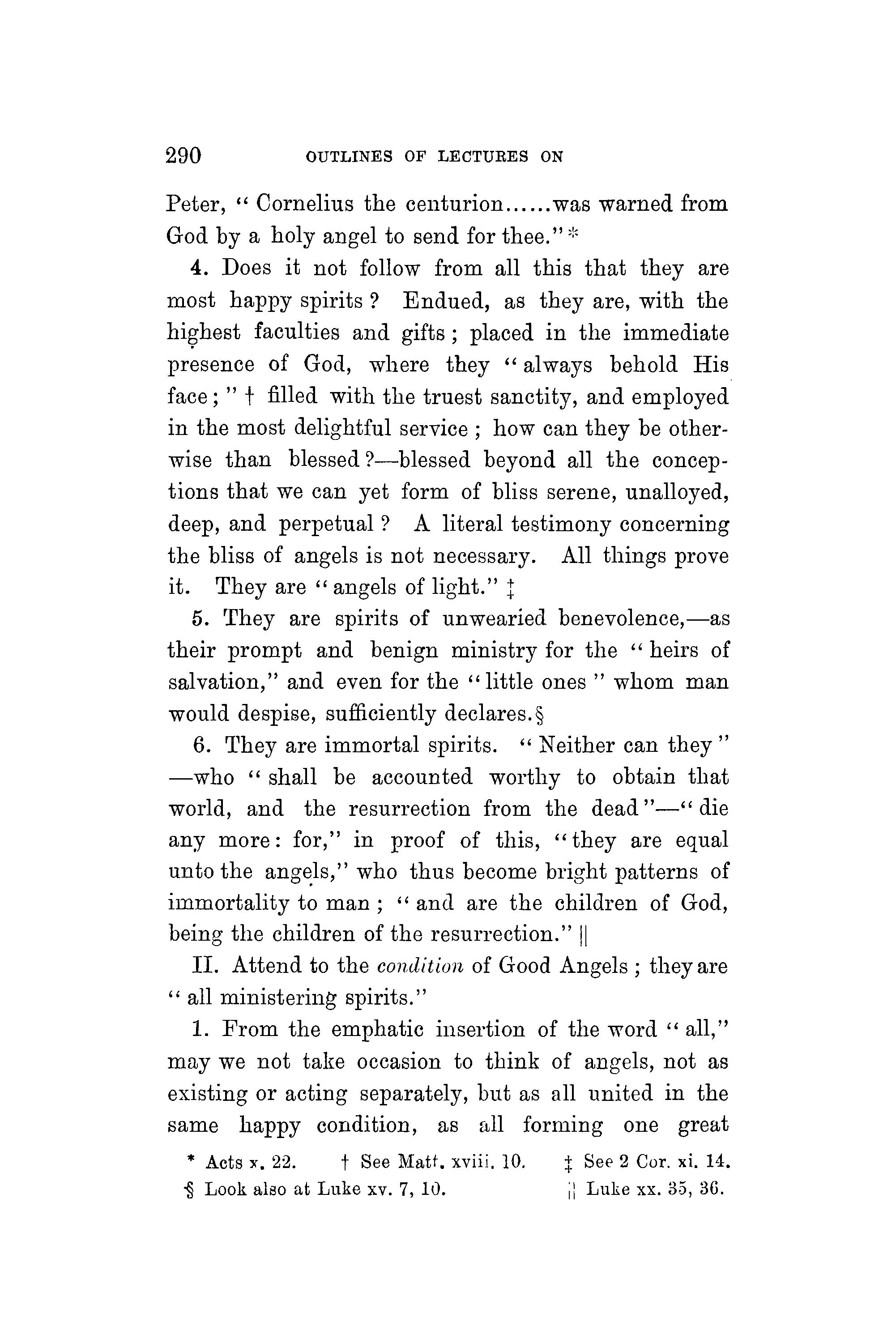
t See 2 Cor. xi. 14.
il Luke xx. 35, 36.
THE DOCTRINES OF CHRISTIANITY, 291
society, company, or army,-" the host of heaven," which " worshippeth "the LORD? ,:, "Bless the LonD, ye His angels: ... blessyetheLoRD,allyeHis hosts."+ They exist in due ranks and orders, "principalities, powers, mights; dominions," t and they are marshalled under the Great Commander. "The Most High .. doeth according to His will in the army of heaven," and "the armies in heaven follow" Him whose "Name is called the vVord of God.'' 11
2. It is to be remarked that they are all "ministering," or serving, " spirits."
They are the ministers, or servants, of God. They " do His commandments, hearkening unto the Yoice of His word ; " they are " ministers of His, that do His pleasure." •~
They are "fellow-servants" with Christi:1n ministers, and of their " brethren the prophets." ,:":'
They are most exemplary in their service, and are, therefore, made a pattern of doing the will of God. H
III. Observe the ojftce of Good Angels. They are " sent forth to miniRter for them who shall be heirs of salvation ; " for them especially. This may be illustrated by,
1. Their office in the affairs of Divine Providence ; --as you may gather particularly from the Book of Daniel.
* Nehem. ix. 6.
t See Ephes. i. 21, and like texts.

t Psalm ciii. 20, 21. § Dan. iv. 34-,35.
II Rev. xix. 13, 14: compare also Dan. vii. 10; Matt. xxvi. 53; Heb. xii. 22 ; Luke ii. 13.
'Ii Psalm ciii. 20, 21.
tt Matt. vi. 10.
** Rev. xxii. 8, 9.
u 2

2. Their office in the especial care of the righteous.*
3. Their office in connection with the great events of our redemption. t
4. Their office at the last day.t
Examine Hooker's beautiful and comprehensive discourse on Good Angels, in "Ecclesiastical Polity," book i., chapter iv.
1. The doctrine of an angelic ministry is sufficiently ascertained from the testimonies of Scripture ; but the notion of a particular guardian angel as assigned to each individual is certainly not so clear. I think the following are the chief texts quoted in favour of this notion :-
Eccles. v. 6. "Suffer not thy mouth to cause thy flesh to sin ; neither say thou before the angel, that it was an error." I cannot see how this text proves the notion. Inquire whether "the angel " here may not mean the priest, as in Malachi ii. 7.
Matt. xviii. 10. "In heaven their angels do always behold the face of My Father which is in heaven;"their angels generally ; the angels who minister for them, as well as for other heirs of salvation.
Acts xii. 15. "It is his angel." A difficult passage; but, interpret it as you may, you can scarcely draw from it the notion that every person has his particular guardian angel.
* Psalm xxxiv. 7 ; xci. 9-12, and similar texts.
t See Matt. i. 20 ; ii. 13; iv. 11 ; Luke i. l l-20, 26--37; ii. 9, 10; xxii. 43 ; xxiv. 4, 5; Acts i. 10, 11.
! See Matt. xiii. 39, 4 l, and the parallel p.1ssages.

2. Mention is made of "Michael the archangel." * Who is He ? Weigh the import of the name, '' Who is like God ? " Consider that He is called, " one of the chief Princes," and, "your Prince." Remember, too, that the term " archangel" occurs only twice in the whole Scriptures, t and both times in the singular number. In one of these passages it is expressly given to Michael. t
* See Daniel x. 21, compared with verse 13; Jude 9; Rev. xii. 7.
t 1 Thess. iv. 16; Jude 9.
t Consult Horsley's Sermon on Dan. iv. 17.
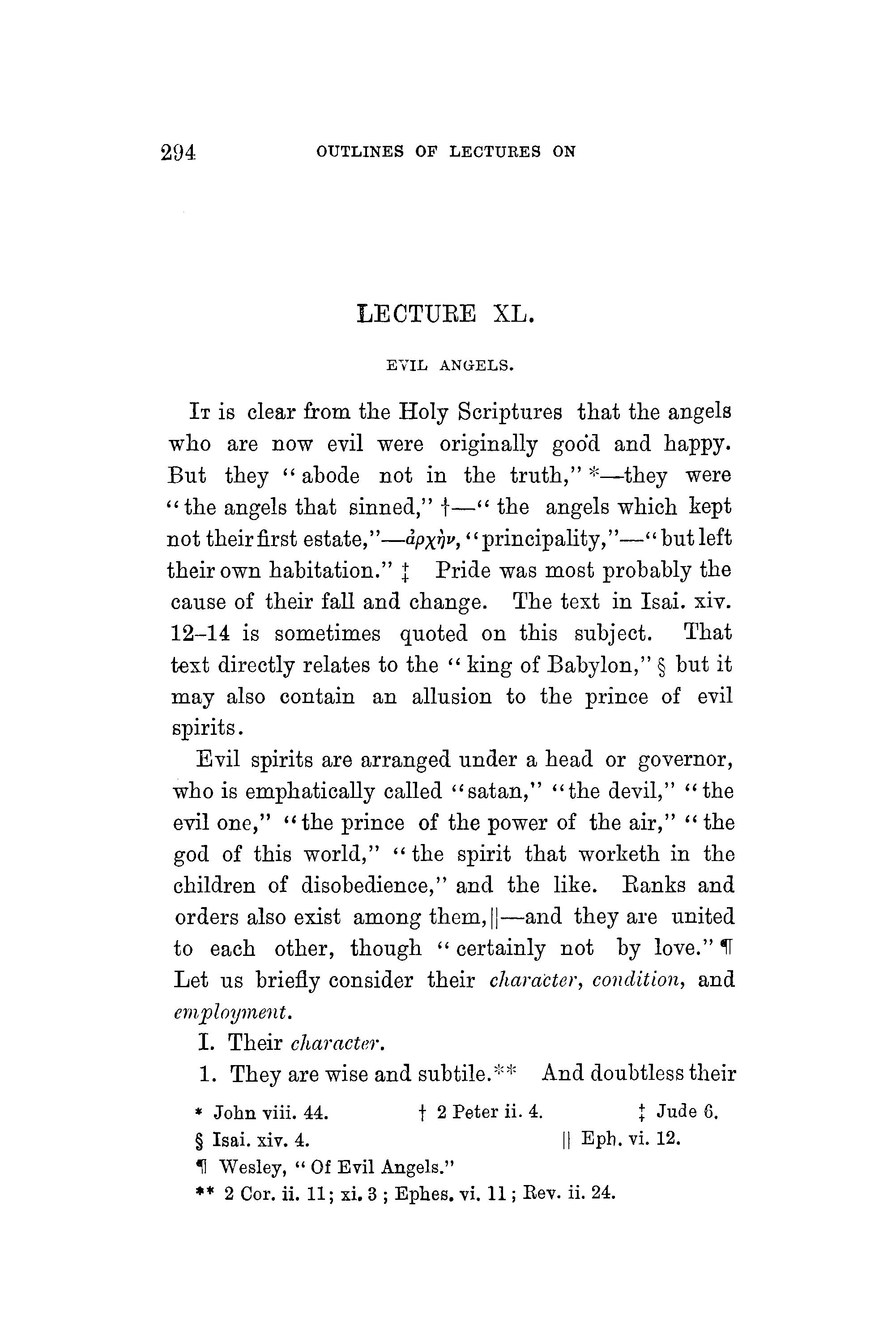
IT is clear from the Holy Scriptures that the angels who are now evil were originally good and happy. But they "abode not in the truth," *-they were "the angels that sinned," t-" the angels which kept not their first estate,'' -apx~v, ' 'principality,'' -'' but left their own habitation." t Pride was most probably the cause of their fall and change. The text in Isai. xiv. 12-14 is sometimes quoted on this subject. That text directly relates to the "king of Babylon,"§ but it may also contain an allusion to the prince of evil spirits.
Evil spirits are arranged under a head or governor, who is emphatically called "satan," "the devil," " the evil one," " the prince of the power of the air," " the god of this world," " the spirit that worketh in the children of disobedience," and the like. Ranks and orders also exist among them, II-and they are united to each other, though " certainly not by love." 1 Let us briefly consider their character, condition, and ernploym,ent.
I. Their character.
1. They are wise and subtile.** And doubtless their
* J obn viii. 44.
§ Isai. xiv. 4. t 2 Peter ii. 4. + Jude 6. 11 Eph. vi. 12. Wesley, " Of Evil Angels."
** 2 Cor. ii. 11; xi. 3 ; Ephes. vi. 11; Rev. ii. 24.

skill is increased by long experience in the work of temptation.
2. They are powerful, though restrained.'"
3. They are extremely aotive. t
4. They are most envious and malignant,-corrupt and wicked; whence the frequent epithets of "evil," "wicked," " unclean," etc.
5. They are distinguished by hatred to truth, and love of falsehood. t
II. Their condition.
1. They are most unhappy.§
2. They are under restraint as condemned criminals, II
3. They are nevertheless permitted to range about the habitations of men, as appears from the texts already cited.
4. And they are reserved for a severer punishment.~
III. Their employment.
1. To resist all that is good.**
2. To promote all that is evil,-in the bodies, Hin the souls,-and in the circumstances, of men.
3. To distress,-as in the case of our Lord,-even where they are not permitted to destroy.
• Matt. iv. 5-8; xii. 29; Mark v. 4-13 ; Eph. ii. 2 ; vi. 12.
t Job i. 7; ii. 2; Matt. xii. 43-45; 1 Peter v. 8.
+ See 1 Kings xxii. 22 ; John viii. 44.
§ See Matt. xii. 43. II See 2 Peter ii. 4; Jude 6. ~rMatt. viii. 29; and the texts quoted from St. Peter and St. Jude.
** See Acts xiii. 10.
tt See the case of Job and the Demoniacs.

1. The subject teaches us a lesson of holy vigilance.
2. It also reminds us of the power by which all evil agency may be subdued.
3. And it ought to fill us with the most cheerful hope of the final subjugation of Satan and his angels.
See, on this subject also, Hooker's "Ecclesiastical Polity," book i., chapter iv., [3".J
Mr. Wesley's Sermons on Good and Evil Angels ought to be par~icularly consulted. They are the Seventy-first and Seventy-second, vol. vi., pp. 361380. Edition, 1829.
THE limits of a Lecture will allow me to take only a general survey of the doctrine concerning Divine Providence. But it is a doctrine which merits our constant and reverent attention; and it is also one which cannot fail to awaken deep interest in the minds of all serious and thoughtful persons. Our faith is to rest in the Providence, as well as in the Grace of God; and that faith is greatly invigorated by a just apprehension of the Reign of Providence. Christ's disciples are particularly taught to contem" plate Divine Providence as extending to their most minute concerns, and as over-ruling all things whatever for their advantage. " Are not two sparrows," says our Lord Himself, " sold for a farthing ? and one of them shall not fall on the ground without your Father. But the very hairs of your head are all numbered."* "And we know," adds St. Paul, "that all things," like the ingredients in a well-prepared medicine, or the several springs and wheels in a complex piece of machinery, '' work together for good to them that love God." t But our present inquiry has respect to the Providence of God in its more general manifestations.
Pursuant to this design, we shall endeavour, first, to define the nature of Divine Providence; secondly,
• Matt. x. 29, 30.

t Rom. viii. 28.

to illustrate its truth ; and, thirdly, to consider a few of its practical lessons.
I. The nature of Divine Providence may perhaps be briefly defined as follows :-It is that superintending care and control which God, the great Proprietor of all, continually exercises in subserviency to the counsels of His own will; and it evidently comprehends, or supposes, such things as these :-
1. Rightful and absolute possession. God, as the Universal Creator, Benefactor, and Preserver, owns a things. They are His. " All," says David, "that is in the heaven and in the earth is Thine." *
2. Uncontrollable dominion. '' The LORD hath prepared His throne in the heavens ; and His kingdom ruleth over all." t "Thine is the kingdom, 0 LORD, and Thou art exalted as head above all : ... thou reignest over all." t This particular includes direction, provision, especial appointments, the over-ruling of events, and other such like interpositions. Mention is sometimes made of a three-folcl circle of Divine Providence as surrounding man ; and the thought appears to be just. One encompasses the whole human family ; the next and narrower one, the visible Church of God ; and the innermost or narrowest one, the faithful servants of the Most High. The sentiment itself may be profitably entertained, even if some doubt were to arise as to the particular manner in which it is expressed.
3. Wise ancl gracious purposes; all of which shall be accomplished, and shall issue in the praise of God's
* 1 Chron. xxix. 11. t Psalm ciii. 19. t 1 Chron. xxix. 11, 12.

glory. He will be His own interpreter, and will wincl up all His dispensations into one full and harmonious close, which shall display His perfections to the whole host of rejoicing intelligences, and for ever augment the revenue of His praise.
II. The truth of Divine Providence may be illustrated by various arguments.
1. By the general support of all things. The mighty fabric of the Universe rests on the hand of God. "By Him all things consist." *
2. By the government of our world, which we can more exactly trace, and every part of which is a voucher of Eternal Providence.
8. By the history contained in all the Scriptures, which are faithful records of the universal and perpetual government of God.
4. By particular cases; of which I should perhaps select, the history of Joseph ; the history of Moses ; and, above all, the history of Man's Redemption,first, as wrought out, and, secondly, as applied.
III. A few of the practical lessons which the doctrine of Divine Providence teaches, are,-
1. To acquaint ourselves with God.
2. To confide in God.
8. To submit to God.
4. To rejoice in God.
1. But, if such be the Providence of God, why is moral evil permitted ? Because it pleases God to treat man as a rational and responsible being, endued with the tremendous power of choice, which he may, and does, unhappily abuse.
* Col. i. 17.

2. Yet why is there so much suffering? Because man has sjnned ; because he needs to be humbled and subdued; and because in the case of God's faithful ones suffering is made the instrument of great, diffusive, and lasting good.
3. Some things, however, seem too trivial and minute for the interposition of Divine Providence. "Vain man would be wise."* Yet he cannot judge of what is trivial and of what is important. The peculiar power of God appears in His making the most momentous consequences apparently to depend on small and unequal occasions.
4. Well, but is it not better to rest in the notion of a General Providence, without supposing that it descends to every particular? No; because this would be inconsistent with the plainest language of Scripture ; because it is also inconsistent with reason itself, inasmuch as all generals must be composed of particulars; and thus because, while such a notion professes to be philosophical, it is, in reality, grossly unphilosophical and absurd.
5. " Still," some one may say, "it is hard to conceive that the watchful eye of God is upon one so mean and despicable as I am." Why so ? Are you not His creature ? His redeemed creature ? His creature destined to a future immortality ? The eye of God follows Hagar in the wilderness ; and His mercy encourages the most forlorn and destitute to say, "Thou tellest," that is, "numberest," "my wanderings: put Thou my tears into Thy bottle: are they not in Thy book ? " t
* Job xi. 12. t Psalm lvi. 8.

THE IMAGE OF GOD, IN WHICH MAN WAS ORIGINALLY CREATED.
ONE circumstance which deserves our attention in the history of man's creation, as narrated in the first chapter of the Book of Genesis, is, that of all the creatures in this lower world, he wasjornie(l last. The edifice was raised, and then its chief inhabitant entered ; the temple was furnished, and then its appointed priest appeared. Even this circumstance conveys no obscure intimation of man's primitive dignity.
But another circumstance, which more particularly strikes every serious reader, is, that the creation of man presents itself to us as especially the work of the Holy Trinity in council. '' And God said, Let Us make man in Our image, after Our likeness." '" This form of expression never occurs before. It is Gen. i. 26.
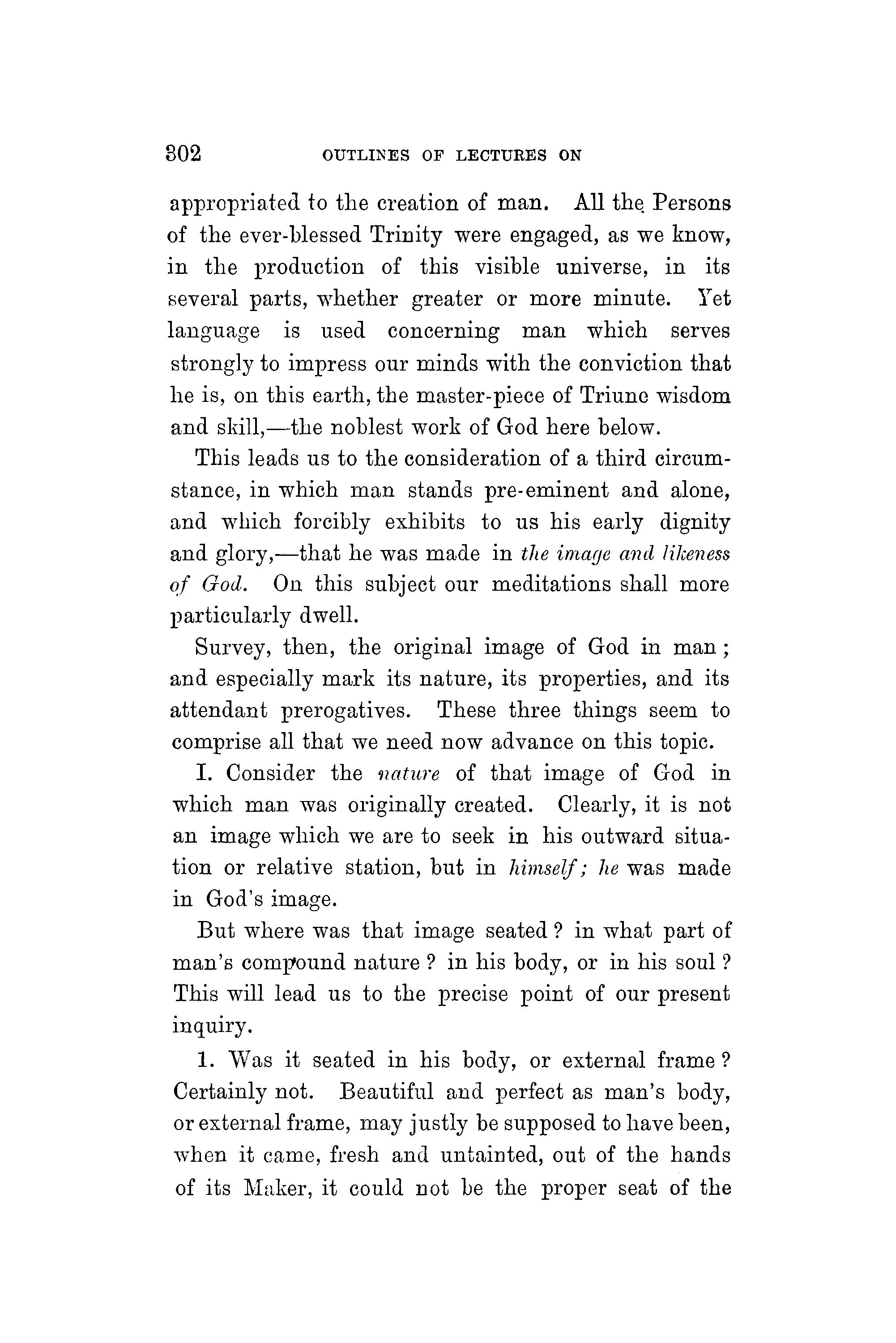
appropriated to the creation of man. All th~ Persons of the ever-blessed Trinity were engaged, as we know, in the production of this visible universe, in its several parts, whether greater or more minute. Yet language is used concerning man which serves strongly to impress our minds with the conviction that he is, on this earth, the master-piece of Triune wisdom and skill,-the noblest work of God here below.
This leads us to the consideration of a third circumstance, in which man stands pre-eminent and alone, and which forcibly exhibits to us his early dignity and glory,-that he was made in the image and likeness of God. On this subject our meditations shall more particularly dwell.
Survey, then, the original image of God in man; and especially mark its nature, its properties, and its attendant prerogatives. These three things seem to comprise all that we need now advance on this topic.
I. Consider the 11ature of that image of God in which man was originally created. Clearly, it is not an image which we are to seek in his outward situation or relative station, but in himself; he was made in God's image.
But where was that image seated ? in what part of man's compound nature? in his body, or in his soul? This will lead us to the precise point of our present mqmry.
1. Was it seated in his body, or external frame? Certainly not. Beautiful and perfect as man's body, or external frame, may justly be supposed to have been, when it came, fresh and untainted, out of the hands of its Maker, it could not Le the proper seat of the
Divine Image. For " God is a Spirit," * and impresses the image of Himself, strictly speaking, only on a nature resembling His own.
2. The image of God, then, was seated in man's soul, or spirit; and its nature ought to be regarded as spiritual. All other things relating to the primitive constitution of man's nature were doubtless in accordance with this. They were not, however, essentially of it. It was on man's soul, or spirit, that the glory of his original excellency rested; it was there that the image of God was stamped. Who can estimate the treasures which were thus poured upon our race ?
II. Observe the properties of that image. May they not, with a reference to the several parts of man's spiritual nature, and in agreement with the language of St. Paul, be distributed as follows?-
1. Divine light in the understanding. "Ye have put off the old man with his deeds," writes St. Paul to the Colossians, " and have put on the new man, which is renewed in knowledge after the image of Him that created him." t. Did not He, then, who at first created man, create him in knowledge, in light, in the image of His own understanding and truth ?
2. Divine rectitude in the will. " Be renewed," says the same apostle to the Ephesians, "in the spirit of your mind. Put on the new man, which after Goel is created in righteousness." t So " God hath made man upright." §
3. Divine sanctity in the purposes and affections. Thus you are taught, in the conclusion of the text just
* John iv. 24.
+ Eph. iv. 23, 24.

t Col. iii. 9, 10.
§ Eccles. vii. 29.

quoted, that the "new man" is also "created after God" in "true holiness," or, as the margin read~, in " holiness of tritth."
III. Mark the attendant prerogatives of that image; such as,
1. Dominion over the inferior creatures.*
2. Happiness; for every source of misery was absent, and every source of happiness was present.
8. Immortality ;-not obscurely suggested by the "tree of life." t
4. The prospect, as we may fairly conclude, of a continual "rise in blessing."
[Remarks on the expression, sometimes used by theologians, of " the natural, moral, and political image of God."] t
Note.-The texts in which the image, or likeness, of God is more expressly named are the following:-
Gen. i. 26. " Let Us make man in Our image, after Our likeness."
Gen. i. 27. " So God created man in His Own image, in the image of God created He him ; male and female created He them."
Gen. v. 1. ,: In the day that God created man, in the likeness of God made He him."
Gen. ix. 6. "Whoso sheddeth man's blood, by man shall his blood be shed : for in the image of God made He man."
1 Cor. xi. 7. "For a man indeed ought not to
* Gen. i. 26, 28.
t See also Wisdom of Solomon ii. 23.
t See Wesley's Works, vol. vi., pp. 66, 67, 269-271.
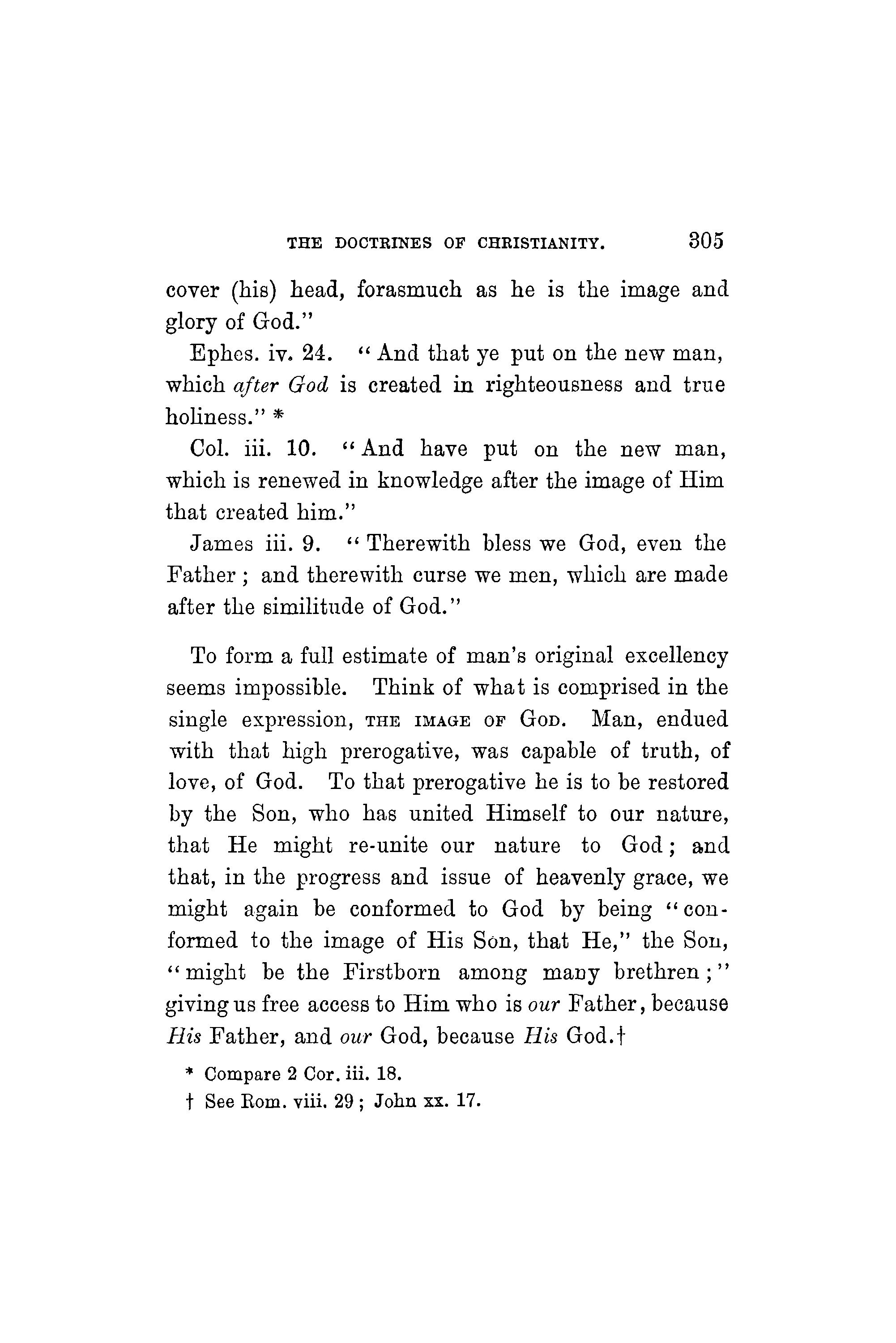
THE DOCTRINES OF CHRISTIANITY. 305 cover (his) head, forasmuch as he is the image and glory of God."
Ephcs. iv. 24. " And that ye put on the new man, which after God is created in righteousness and true holiness." *
Col. iii. 10. "And have put on the new man, which is renewed in knowledge after the image of Him that created him."
James iii. 9. "Therewith bless we God, even the Father ; and therewith curse we men, which are made after the similitude of God."
To form a full estimate of man's original excellency seems impossible. Think of what is comprised in the single expression, THE IMAGE OF Gon. Man, endued with that high prerogative, was capable of truth, of love, of God. To that prerogative he is to be restored by the Son, who has united Himself to our nature, that He might re-unite our nature to God; and that, in the progress and issue of heavenly grace, we might again be conformed to God by being "conformed to the image of His Son, that He," the Son, " might be the Firstborn among many brethren ; " giving us free access to Him who is our Father, because His Father, and our God, because His God. t
* Compare 2 Cor. iii. 18.
t See Rom. viii. 29; John xx. 17.

THE STATE OF MAN BEFORE THE FALL, COMPREHENDING A VIEW OF HIS COVENANT-RELATION TO GOD.
FRoMthe preceding Lecture it clearly appears that, when we consider the Image of God, in which man was originally created, we cannot but form an exalted estimate of his primitive excellency as a creature.
But it is also desirable to contemplate him with reference to the state in which he was first placed, especially as that state supposes and embraces the Covenant-relation in which he stood to God, his great Creator and Benefactor.
Our object shall be to examine the origin, the conditions, and the appointed tendencies of that state, as inseparable from its Covenant-provisions and warnings.
I. The origin of that state and Covenant-relation is to be sought in the most free and undeserved love or grace of God. "All the blessings which God hath bestowed upon man," says Mr. Wesley,* "are of His mere grace, bounty, or favour; His free, undeserved favour ; favour altogether undeserved; man having no claim to the least of His mercies. It was free grace that' formed man of the dust of the ground,' and breathed into him' a living soul;' and stamped on that soul the image of God, and put all things under his feet." I would draw out the principle of this valuable quotation somewhat more particularly.
* Sermon i., at the beginning.

1. It is plain that it was the love or grace of God which gave man his being ; for, from what other source could He receive that gift ?
2. It was this, too, which endued him with his peculiar faculties, and placed him in the happy circumstances of Paradise.
8. It was this which bestowed on him the supernatural aids of the Holy Spil'it, and thus made him a, partaker, not only of natural and intellectual, but also of spiritual life.*
II. The condition of that state and Covenant may be summed up in oue word,-obedience.
1. Prompt and filial obedieuce.
2. Universal and complete obedience.
3. Constant and uninterrupted obedience.
4. An obedience the most active and vigorous in all its parts.
"To man, thus upright and perfect," agaiu to use the language of l\fr. Wesley, t '' God gave a perfect law, to which He required full and perfect obedience. He required full obedience in every point, and this to be performed withuut any intermission, from the moment man became a living soul, till the time of his trial should be ended. No allowance waa made for auy falling short. As, indeed, there was no need of any ; man being altogether equal to the task assigned, and thoroughly furnished for every good word and work."
III. The appointed tendenciesof that state and Covenant must be viewed in connection with man's eonduct in it~
• See Gen. ii. 7. t Sermon v., division i., sect. 2. X 2

1. If he continued obedient, the tendency and result would be a preservation of all his blessings, with an exaltation of his nature to a higher state, in which probation should cease, and he should be with God. ,:, The first Covenant, then, was a Covenant of life.
2. If he proved disobedient, the tendency and result were to be, the loss of all his blessings, which can be restored only by the provisions of another Covenant, and the infliction of condign punishment. t
1. The first Covenant, as well as the second, was a Covenant of Grace.
2. But the conditions of the first Covenant were unsinning obedience ; the conditions of the latter are '' faith which worketh by love." t Instead, therefore, of calling them the Covenant of Works, and the Covenant of Grace, I would rather choose to call them, the Covenant of Grace by Works, and the Covenant of Grace by Faith; or, more briefly, "the Law of "\Vqrks," and" the Law of Faith."§
3. The grand design of both may be said to be the same,-everlatting life with God.
Note.-There is a useful tractate in Bishop Bull's English Works, " Concerning the First Covenant, and the State of Man before the Fall." It contains several important explanations, and abounds with testimonies of Christian antiquity on this subject.
* See Gen. ii. 9, 17 ; iii. 22.
t Gal. v. 6.
t See Gen. ii. 17.
§ See Rom. iii. 27.

To a thoughtful reader there is something exceed-· ingly instructive and affecting in the brevity of man's early history. Scarcely have we perused the records of his creation, and of the happy circumstances in which he was originally placed, when we are summoned to the recital of his fall from God and bliss. Within the compass of three chapters we are informed of the origin, the glory, and the ruin of our race. It is impossible to ascertain the space of time during which our first parents remained in their primitive purity and perfection; but, in all probability, that space was not long. The bright hemisphere of man was soon clouded and darkened by sin.
When we apply our attention to the narrative of man's fall, as it is contained in the third chapter of the Book of Genesis, we are particularly led to consider the tempter by whose agency that fall was accomplished, the temptation by which he sought to effect his purpose, and the success which attended his malignant artifice.
I. The te11ipter by whose agency man's fall was accomplished is partly discovered to us in the chapter which narrates that mournful event, but is more fully declared in other parts of Holy Scripture.
1. He is partly discovered to us in the chapter which
OUTLINES OF LECTURES ON
narrates the history of our fall. It is there said that " the serpent was more subtile than any beast of the field which the LoRDGod had made;"* that he held a discourse with the woman, which plainly argues the possession of intelligence and speech; t and that he received from God the following sentence : " Thou art cursed above all cattle, and above every beast of the field ; upon thy belly shalt thou go, and dust shalt thou eat all the days of thy life: and I will put enmity between thee and the woman, and between thy seed and her Seed ; it shall bruise thy head, and thou shalt bruise His heel." t Let a serious inquirer consider these passages ; and, while he is sensible of the obscurity with which they are shaded, he will perceive that, though the real body of a serpent was used, or its appearance assumed, a mysterious being of another class was also present; a being of intelligence, artifice, and fearless daring ; a being who was to maintain an active enmity against one emphatically called " the Seed of the woman," who was to " bruise His heel," but whose "head" should by Him be '' bruised." Dark images of fallen greatness appear. An agent far higher than the serpent forces himself on our thoughts. ·who was he? To this question we seek a more particular answer elsewhere.
2. The real tempter of the first human pair is more fully declared in subsequent parts of Holy Scripture. He is there called " satan," " the devil," " the evil one ; " and is represented as the chief of the fallen angels, "which kept not their first estate, but left
* Gen. iii. 1.
:j: Gen. iii. 14, 15.
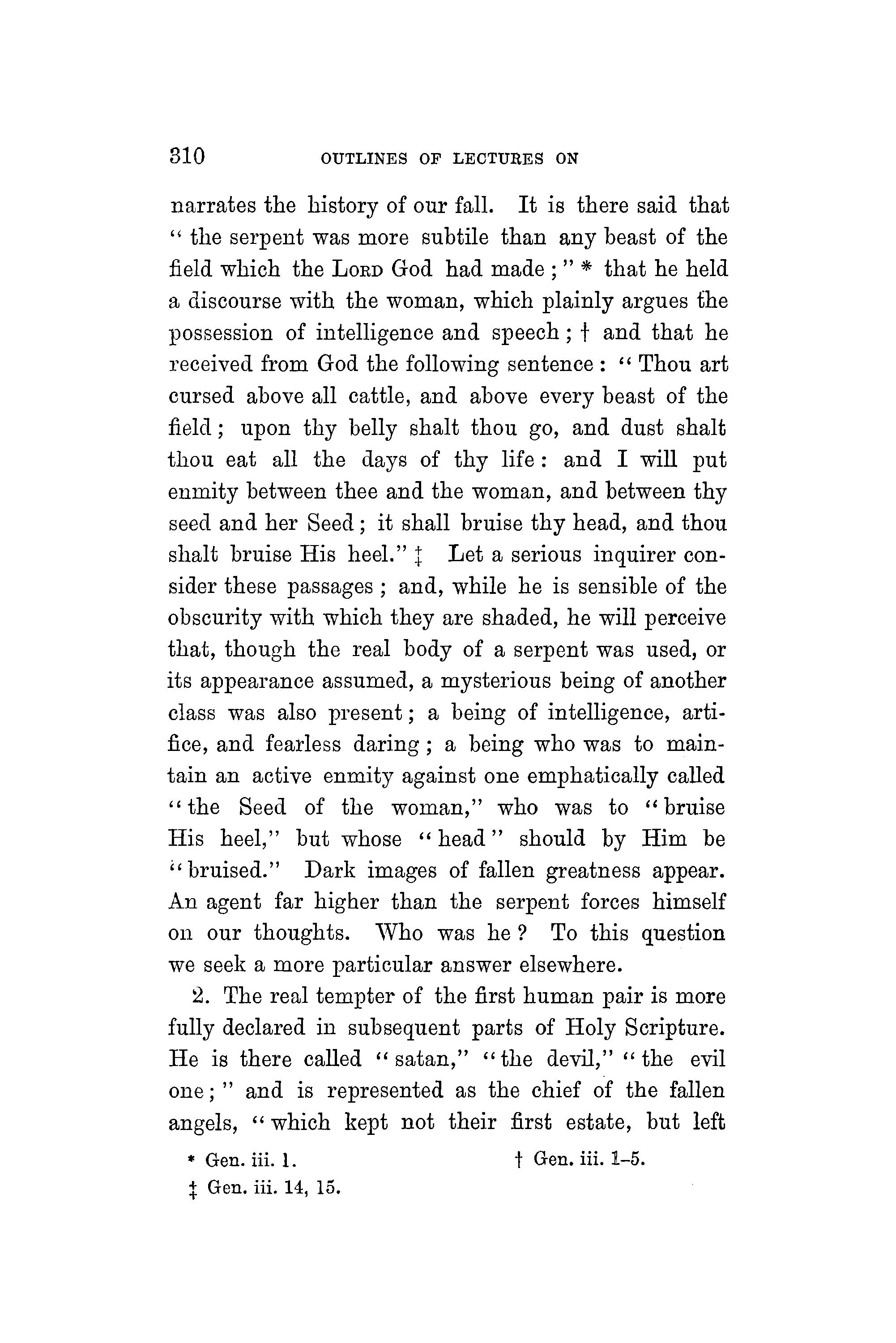
t Gen. iii. 1-5.

their own habitation." * He is described, in evident allusion to the history of man's fall, as "the great dragon, that old serpent, called the Devil, and Satan, which deceiveth the whole world;" t and elsewhere, as " the dragon, that old serpent, which is the Devil, and Satan." t He was the tempter.
II. The temptation by which he sought to effect his purpose is clearly unfolded in Genesis iii. 1-5.
1. It was an opportune temptation, or a temptation artfully timed. The serpent " said unto the woman." The probability is, that Eve was now alone, or apart from her husband. But why did not the tempter assail Adam ? Without admitting any disparaging inferiority on the part of Eve, it may be supposed that, as she was formed after Adam, and had not received the injunction, which forbade the eating of the interdicted tree, directly from God, he might imagine that she was more assailable than Adam. At all events, his artifice sufficiently appears in this circumstance.§
2. It was a plausible and insinuating temptation. The serpent uses at first an apparently modest inquiry : "Yea, hath God said, Ye shall not eat of every tree of the garden ? " By this means he strives to throw Eve off her guard, to silence her scruples and apprehensions, and to prepare the way for what follows. II
3. It was a temptation distinguished by the most direct and palpable falsehood. The tempter expressly contradicts the God of truth. God had said, " Thou " Jude 6. t Rev. :x:ii.9. t Rev. xx. 2.
§ Compare his first temptation of our Lord, Matt. iv. 2, 3.
ll Compa·reagain our Lord's first temptation, Matt. iv. 3.
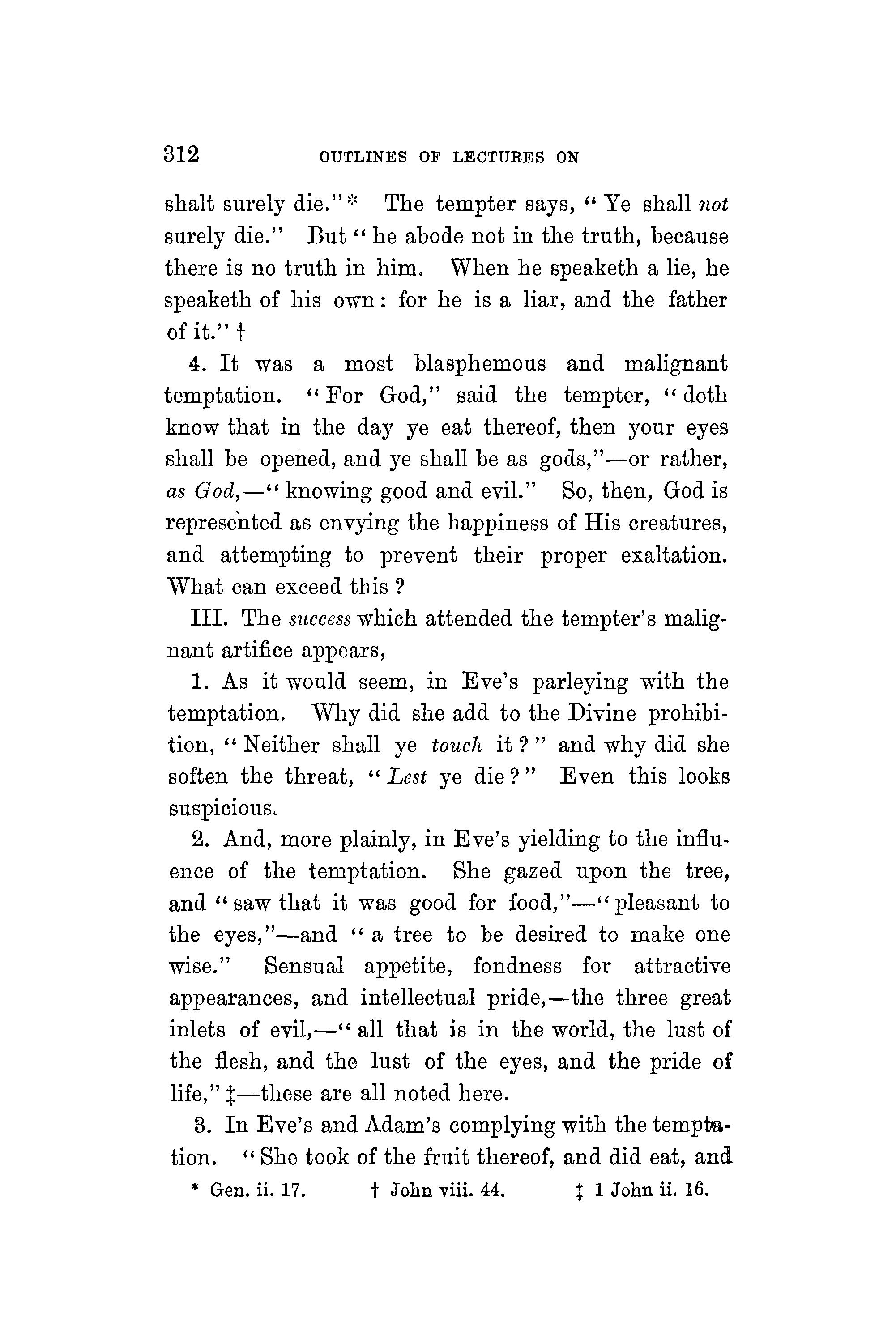
OUTLINES OF LECTURES ON shalt surely die.",:, The tempter says, "Ye shall not surely die." But " he abode not in the truth, because there is no truth in him. When he speaketh a lie, he speaketh of his own for he is a liar, and the father of it." t
4. It was a most blasphemous and malignant temptation. "For God," said the tempter, "doth know that in the day ye eat thereof, then your eyes shall be opened, and ye shall be as gods,"-or rather, as God,-" knowing good and evil." So, then, God is represented as envying the happiness of His creatures, and attempting to prevent their proper exaltation. What can exceed this ?
III. The successwhich attended the tempter's malignant artifice appears,
1. As it would seem, in Eve's parleying with the temptation. ,Vhy did she add to the Divine prohibition, "Neither shall ye touch it?" and why did she soften the threat, " Lest ye die?" Even this looks suspicious,
2. And, more plainly, in Eve's yielding to the influence of the temptation. She gazed upon the tree, and "saw that it was good for food,"-" pleasant to the eyes," -and '' a tree to be desired to make one wise." Sensual appetite, fondness for attractive appearances, and intellectual pride,-the three great inlets of evil,-" all that is in the world, the lust of the flesh, and the lust of the eyes, and the pride of life," t-these are all noted here.
3. In Eve's and Adam's complying with the temptiation. '' She took of the fruit thereof, and did eat, and
* Gen. ii. 17. t John viii. 44. t 1 John ii. 16.
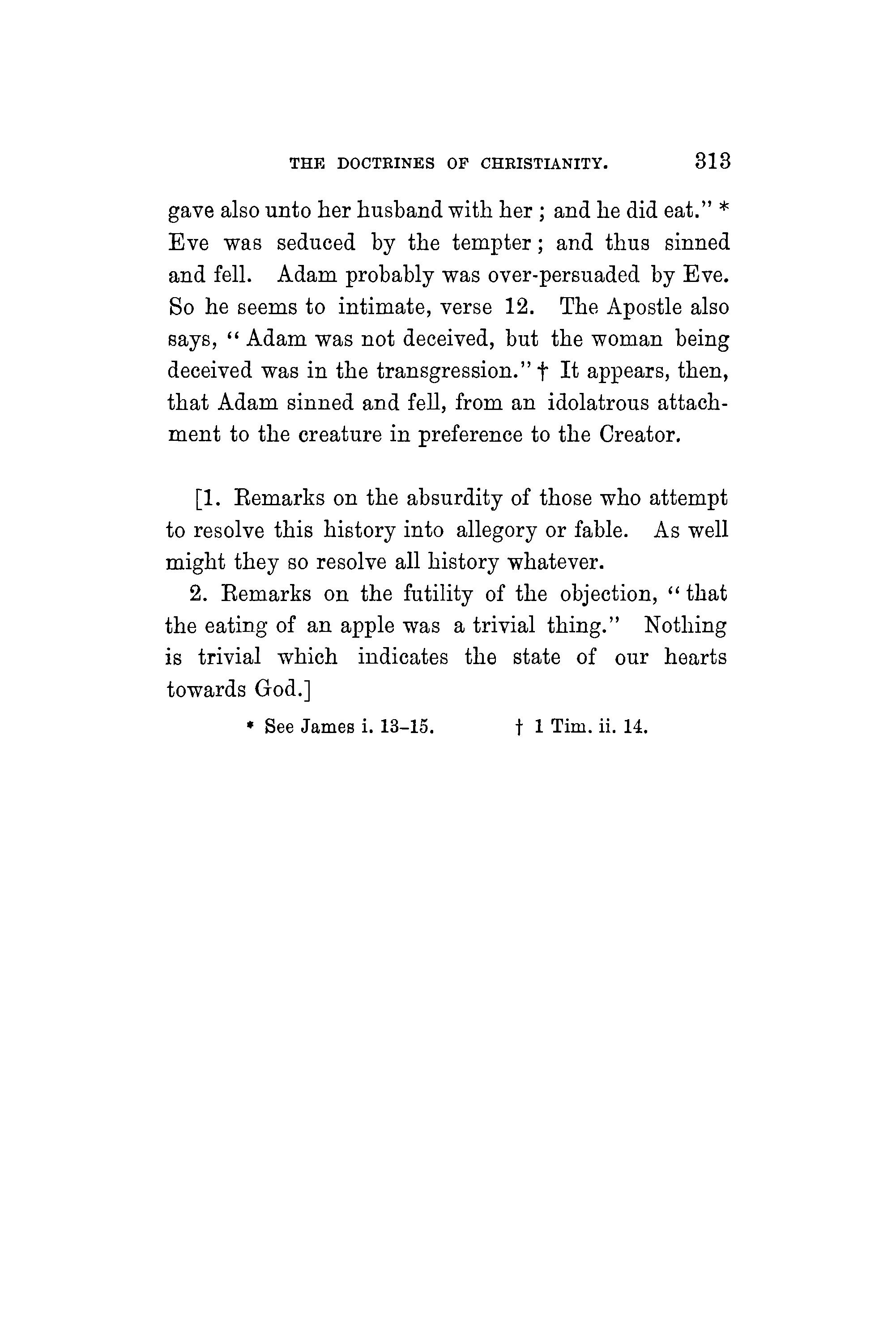
THE DOCTRINES OF CHRISTIANITY. 313 gave also unto her husband with her; and he did eat."* Eve was seduced by the tempter; and thus sinned and fell. Adam probably was over-persuaded by Eve. So he seems to intimate, verse 12. The Apostle also says, " Adam was not deceived, but the woman being deceived was in the transgression." t It appears, then, that Adam sinned and fell, from an idolatrous attachment to the creature in preference to the Creator.
[1. Remarks on the absurdity of those who attempt to resolve this history into allegory or fable. As well might they so resolve all history whatever.
2. Remarks on the futility of the objection, " that the eating of an apple was a trivial thing." Nothing is trivial which indicates the state of our hearts towards God.]
• See James i. 13-15. t 1 Tim. ii. 14.

THE effects of our first parent's fall may be summed up in three particulars: the guilt, the depravity, and the death, to which he became immediately subject. I do not know that there is anything in this part of our inquiries, which does not properly come within the limits of one or other of these three comprehensive topics.
But as Adam stood in a representative capacity,the head and father of the whole human race,-he has transmitted the effects of his fall to all his posterity. The particulars, therefore, which we have enumerated, extend, through the sin of Adam, to the entire family of man. To explain and establish this position, is the design of our present Lecture.
I. The transmission of hereditary guilt descends to all Adam's offspring, as naturally proceeding from him.
1. But it is necessary, at the very outset, to ascertain the proper meaning of the phrase,-hereditary guilt.
Guilt sometimes refers immediately to the fact of transgression. A person is said to be guilty of a misdeed who has actually committed it. Scarcely anything is more common than this form of speech. But

it is not in this sense that the expression is here used. Children newly-born have not "i:;inned after the similitude of Adam's transgression." * They are not actually, not in the sense of the term now under our consideration, guilty of the primitive offence. Let this be carefully noted.
Guilt appears sometimes to mark the consciousness of actual transgression. Thus we speak of a guilty conscience,-that is, a conscience sensible of the reality and evil of a misdeed committed by a person who is thus inwardly convicted of it. But it is evidently not in this sense that we are to understand the phrase in its present application. New-born infants are not inwardly conscious of misdeeds.
Guilt, however, also and properly denotes, a just liability to punishment in consequence of transgression. "What is guilt," says Dr. Jennings, "but an obligation to suffer punishment for sin ? " t So in the sentence, "He is guilty of death," t the word is clearly used in this sense. Now, we so intend it in the phrase before us. Hereditary guilt, then, is an obligation to suffer punishment for the primitive sin of our first parents ; it is condemnation ; it is exposure to punishment in consequence of that sin.
2. Our next business is to examine the evidence
• Rom. v. 14.
t See Wesley's Works, vol. ix., p. 243.
+ Matt. xxvi. 66. See also Lev. v. 17; Num. xxxv. 31; Rom. iii. 19 ; and, in the two latter texts, compare the margin. See also Pearson on " The Forgiveness of Sins : " " Guilt consisteth in a debt or obligation to suffer a punishment proportionable to the iniquity of the sin."
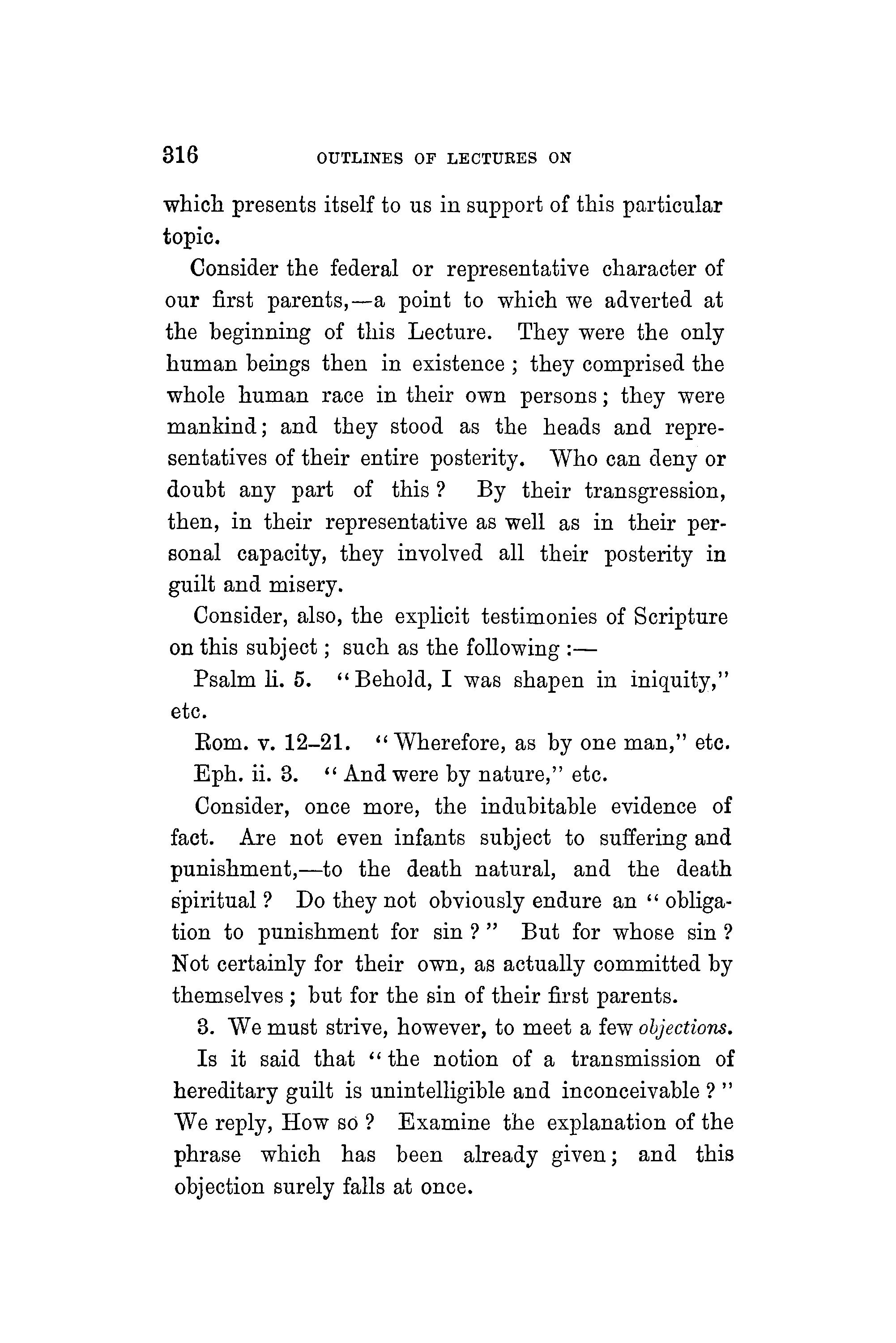
which presents itself to us in support of this particular topic.
Consider the federal or representative character of our first parents,-a point to which we adverted at the beginning of this Lecture. They were the only human beings then in existence ; they comprised the whole human race in their own persons ; they were mankind; and they stood as the heads and representatives of their entire posterity. Who can deny or doubt any part of this ? By their transgression, then, in their representative as well as in their personal capacity, they involved all their posterity in guilt and misery.
Consider, also, the explicit testimonies of Scripture on this subject; such as the following:Psalm li. 5. "Behold, I was shapen in iniquity," etc.
Rom. v. 12-21. "Wherefore, as by one man," etc. Eph. ii. 3. " And were by nature," etc.
Consider, once more, the indubitable evidence of fact. Are not even infants subject to suffering and punishment,-to the death natural, and the death spiritual? Do they not obviously endure an "obligation to punishment for sin ? " But for whose sin ? Not certainly for their own, as actually committed by themselves ; but for the sin of their first parents.
3. We must strive, however, to meet a few objections. Is it said that " the notion of a transmission of hereditary guilt is unintelligible and inconceivable ? " We reply, How so? Examine the explanation of the phrase which has been already given; and this objection surely falls at once.
"But," say isome, "it seems to us to be unjust." Yet, we reply, you admit the transmission of hereditary depravity. Is that also unjust?
"It places man, however, in a most hopeless state." So it does,-if it were not for the gracious interposition of the Second Adam.
"What, then, becomes of infants that die in infancy ? '' They are '' accepted, sanctified, and saved," not through their relation to the first Adam, or their exemption from the calamities consequent on his transgression,-calamities which their dying proves that they share,-but through the merits and mercies of their Great Restorer.,:,
II. The transmission of hereditary depravity, which is proved by all Scripture and fact, discovers itself especially in the following particulars. They stand in striking contrast with the properties of the Divine Image, named in the second part of Lecture xlii.
1. Darkness of the understanding, chiefly with relation to the things of God.
2. Perverseness and rebellion of the will.
3. Unholiness of the desires and affections, with a corresponding iniquity of life.
For illustration and proof of all these particulars, I refer you especially to Fletcher's "Appeal." t
III. The transmission of hereditary death.
1. Death spiritual, as denoting the loss of the favour, image, and fellowship of God, in which the life of the soul pre-eminently consists.
2. Death temporal, with its long train of diseases and sufferings.
* Rom. v. 18.

t Part i.
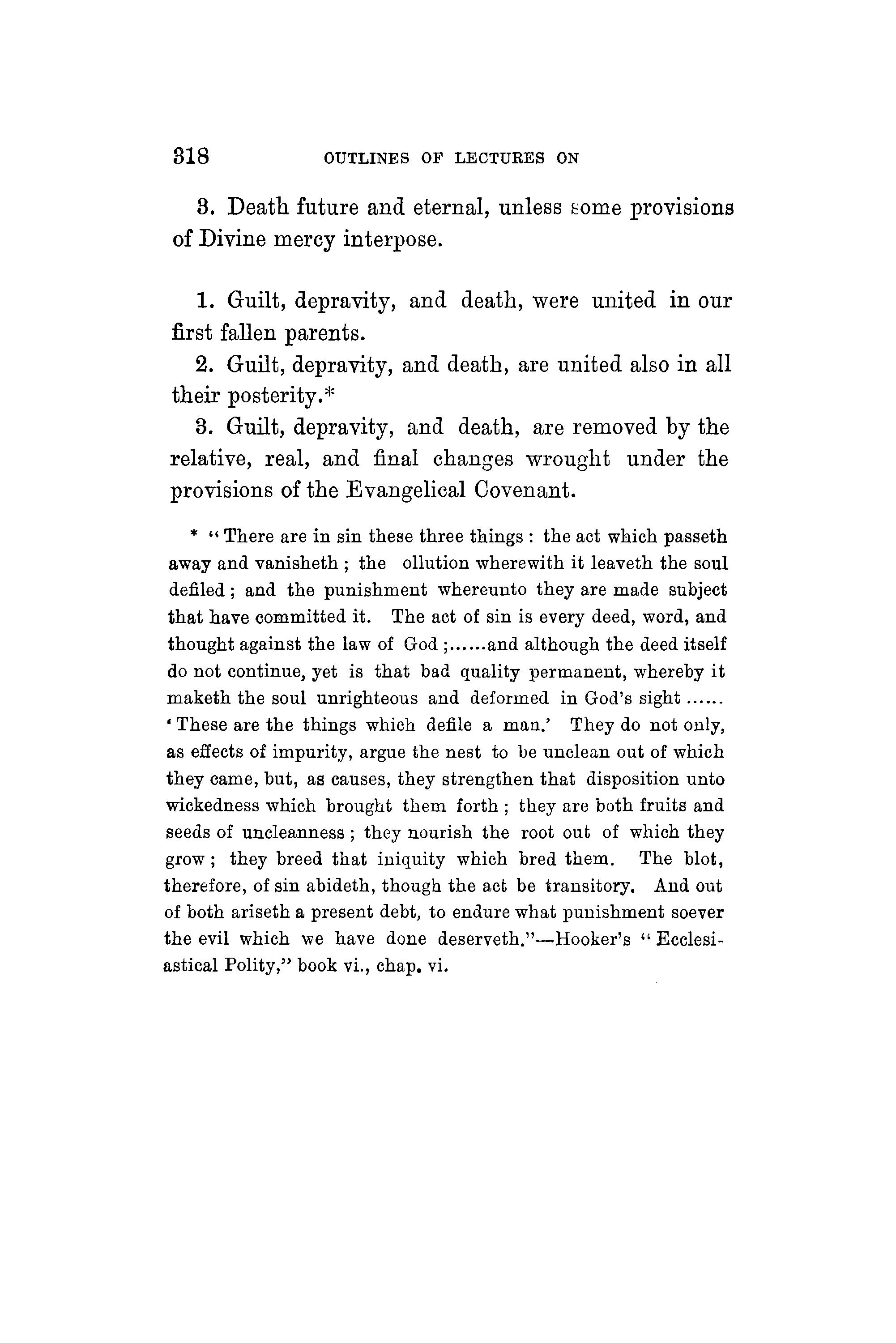
8. Death future and eternal, unless rnme provisions of Divine mercy interpose.
1. Guilt, depravity, and death, were united in our first fallen parents.
2. Guilt, depravity, and death, are united also in all their posterity.*
3. Guilt, depravity, and death, are removed by the relative, real, and final changes wrought under the provisions of the Evangelical Covenant.
* " There are in sin these three things : the act which passeth away and vanisheth ; the ollution wherewith it leaveth the soul defiled; and the punishment whereunto they are made subject that have committed it. The act of sin is every deed, word, and thought against the law of God ; ...... and although the deed itself do not continue, yet is that bad quality permanent, whereby it maketh the soul unrighteous and deformed in God's sight ..... . • These are the things which defile a man.' They do not only, as effects of impurity, argue the nest to be unclean out of which they came, but, as causes, they strengthen that disposition unto wickedness which brought them forth ; they are both fruits and seeds of uncleanness ; they nourish the root out of which they grow; they breed that iniquity which bred them. The blot, therefore, of sin abideth, though the act be transitory. Aud out of both ariseth a present debt, to endure what punishment soever the evil which we have done deserveth."-Hooker's "Ecclesiastical Polity," book vi., chap. vi.

THE NECESSITY OF REDEMPTION.
MAN'S proper inquiry, viewed as a creature fallen and sinful, is, "What must I do to be saved?"* He ought most carefully to search for the means of recovery ; and the more he searches, the more deeply will he be convinced that the provisions of a true recovery are of God, not of himself. The language of the Most High by the prophet is applicable, not only to Israel, but to man universally. " Thou hast destroyed thyself; but in Me is thine help." t
Yet there is a strong propensity in our nature to devise schemes of restoration for ourselves. To examine the chief of these, and severally to show their utter insufficiency, will tend to prove the necessity of a Redemption, or mode of rescue and recovery, which can come only from God. Such an investigation will illustrate St. Paul's declaration that "God hath concluded all "-or, as in the margin, hath "shut all up together"-" in unbelief, that He might have mercy upon all." t
I. Repentance, as denoting especially sorrow for sin, is the first thing to which man usually directs his thoughts.
1. But can he really soften his own heart into
* Acts xvi. 30.
t Rom. xi. 32. See also Gal. iii. 22, 23.
t Hosea xiii. 9.
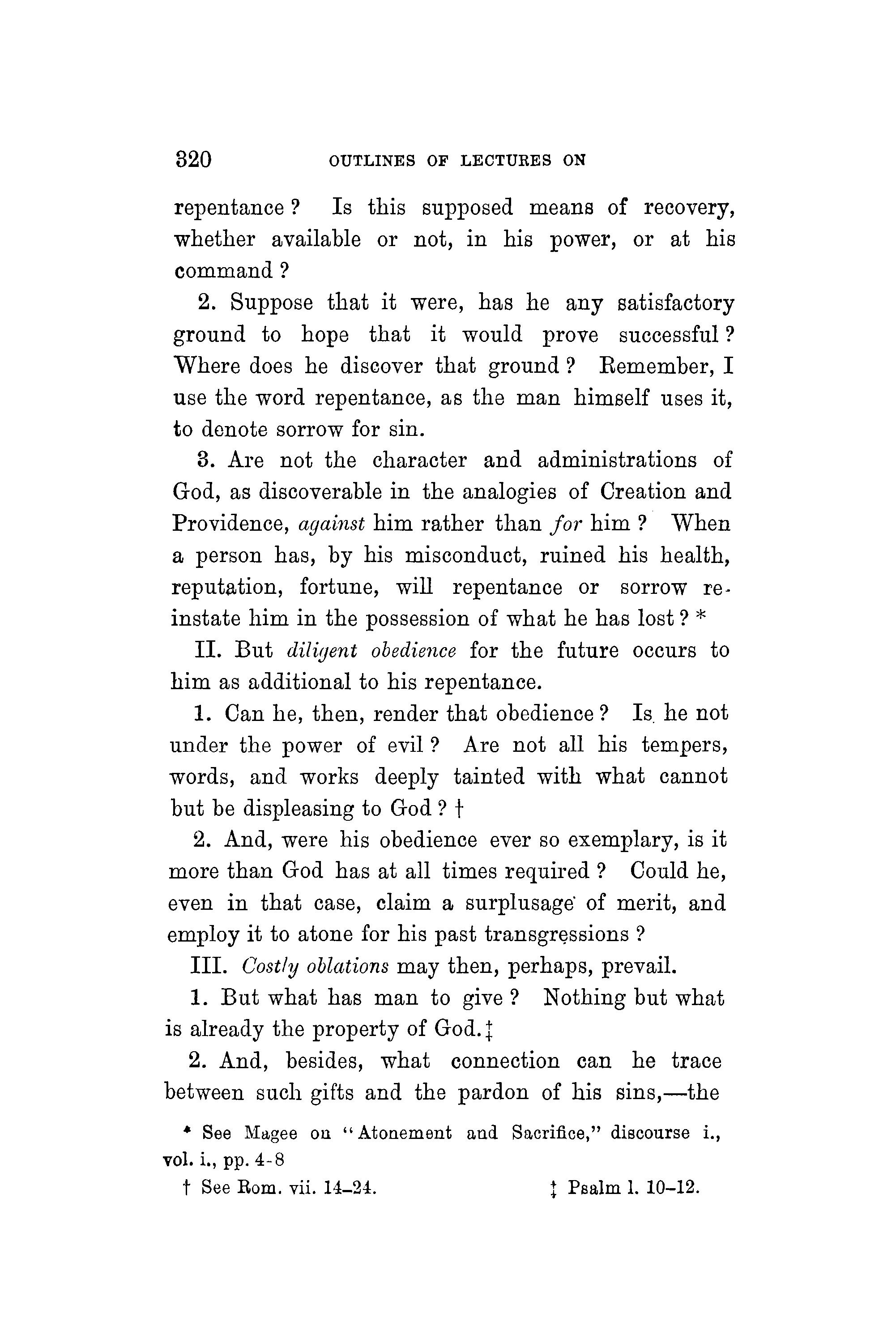
repentance? Is this supposed means of recovery, whether available or not, in his power, or at his command?
2. Suppose that it were, has he any satisfactory ground to hope that it would prove successful ? Where does he discover that ground ? Remember, I use the word repentance, as the man himself uses it, to denote sorrow for sin.
3. Are not the character and administrations of God, as discoverable in the analogies of Creation and Providence, against him rather than for him? When a person has, by his misconduct, ruined his health, reputation, fortune, will repentance or sorrow re. instate him in the possession of what he has lost? *
IL But diligent obedience for the future occurs to him as additional to his repentance.
1. Can he, then, render that obedience? Is. he not under the power of evil? Are not all his tempers, words, and works deeply tainted with what cannot but be displeasing to God ? t
2. And, were his obedience ever so exemplary, is it more than God has at all times required? Could he, even in that case, claim a surplusage· of merit, and employ it to atone for his past transgr~ssions?
III. Costly oblations may then, perhaps, prevail.
1. But what has man to give? Nothing but what is already the property of God.+
2. And, besides, what connection can he trace between such gifts and the pardon of his sins,-the
• See M!l.gee on "Atonement and Sacrifice," discourse i., vol. i., pp. 4- 8
t See Rom. vii. 14-24. t Psalm. 1. 10-12.

DOCTRINES OF CHRISTIANITY.
renewal of his nature,-and the resumption of his forfeited blessings.
IV. Seif-inflicted penances remain. But what ground has he to hope that these will succeed ?
1. Are they appointed?
2. Can they be of themselves available?
3. Is there any real merit in them ?
Man cannot find a provision for his recovery in reason or nature. The attempt has been made times without number, and has always failed. Guilt is timid. He who is sensible of its weight feels that he must have, not conjecture merely, but convincing evidence, -satisfactory assurance,-or he cannot have comfort. Here, then, we are entirely in the hands of God. He, and only He, can provide the remedy for us. A process of restoration, as devised and accomplished by Himself, is indispensably necessary. What that process is, or, in other words, what is the nature of the Redemption proyic1ed for us, we shall next inquire.

SPECULATIVEmen have sometimes inquired whether God could, or could not, have devised another way for our recovery than that which is presented to us in the Holy Scriptures. Not unfrequently such an inquiry has been intended to establish the truth of the doctrine which it is the object of this Lecture to explain. The attempt is made, in other words, to prove that man could not, by any possibility, have been recovered from his fall, except on the ground of a Redemption accomplished by atoning sacrifice.
But from speculations of this kind we feel it right to abstain. They seem to proceed on the supposition that man is competent to form a just estimate of all the resources of Divine wisdom and power. Surely it is enough for us to know what God has done; nor is it very humble or reverential to attempt to explain what He rnight have done. " The secret things belong unto the LoRD our God : but those things which are revealed belong unto us and to our children for ever.'' * From the method which God has been pleased to employ, we may indeed venture to infer that He saw that method to be the best, and perhaps the only one ;-but there our speculations ought to stop. The way of our recovery is that of Redemption by * Deut. xxix. 29.

DOCTRINES OF CHRISTIANITY.
the sacrificial death of the promised :Messiah, our Lord Jesus Christ. To ascertain the true nature of this provision it is desirable that we should contemplate it just as it is discovered to us in the successive revelations of Scripture. There you may see it clearly unfolded in Emblematical Sacrifices, Typical Events, and Explicit Declarations.
I. Emvlematical Sacrifices disclose this provision to us. Ancl here I invite your attention to the following remarks:-
1. Sacrifices were originally of Divine institution. How else shall we account for their introduction, for their general prevalence, for the light in which they are constantly regarded as atonements or expiations for sin ? and for the significn,nt allusions to them in the earliest records of Divine Revelation ? *
2. Sacrifices were always viewed as of signal importance in the ancient worship of God. They occupy a large space in the institutions of the patriarchal and Mosaic dispensations ; they are guarded by especial prescriptions and rites, and they are treated as things exceedingly significant.
3. Sacrifices are recognised in the Old, and particularly in the New Testament, as types of the Messiah's death, considered as an atonement for the sins of mankind. t
II. Typical Events, narrated in the Old-Testament
* See, for the antediluvian world, Gen. iii. 21 ; iv. 4; vii. 2, 3, 8.
t See Isai. liii., the Epistle to the Hebrews, and other kindred parts of Scripture.
y 2

history, lead us to the contemplation of the same wonderful provision. Take the following as examples :-
1. Abraham's intended sacrifice of his son Isaac.*
2. The Manna which descended in the wilderness. t
3. The water which issued from the smitten rock.t
III. Explicit Declarations confirm the same doctrine. These so abound in the Scriptures that it is difficult to make a reference to them, except in the way of specimen. Weigh the following passages :-
Psalm -xxii., with its parallel texts ; Isai. liii., with its parallel texts;
Heb. v. to x., ith the manifold references. These will be sufficient to prove, that what might be obscure in sacrifices and events, is clearly explained by testimony.
Thus, in various ways, the Scriptures perpetually place before us the provisions of Redemption. They are accordingly represe t ed as indispensably necessary on the ground of Divine appointment.§ Redemption, then, is wrought by our Lord's Atoning Sacrifice. But such a sacrifice must be distinguished by its purity, its vicarious character, and its efficacy; all which things most· fully exist in the sacrifice of Christ.
What now is Redemption? It is the provision made for manas recovery to the knowledge, love, and enjoyment of God, by the all-atoning sacrifice which
* Compare the history in Gen. xxii. with Heb. xi. 17-19.
t Compare Exod. xvi. with John vi. and 1 Cor. x. 3.
:I:Compare Exod. xvH. with 1 Cor. x. 4.
§ See, on this subject, John iii. 14, 15; xii. 24; Luke xxiv. 25-27, 45-!7; Acts xvii. 3.

our Lord offered for us on the cross ; a sacrifice most pure, vicarious, and sufficient.,:,
[1. It may not be amiss to mention here the useful distinction often made by the older divines between Redemption by Price and Redemption by Power. 2. We should also remark that the provision of the Christian Redemption teaches man two lessons especially, which it most concerns him to learn ; the evil of sin, and the mercy of Goel.]
* See 1 Peter ii. 24.
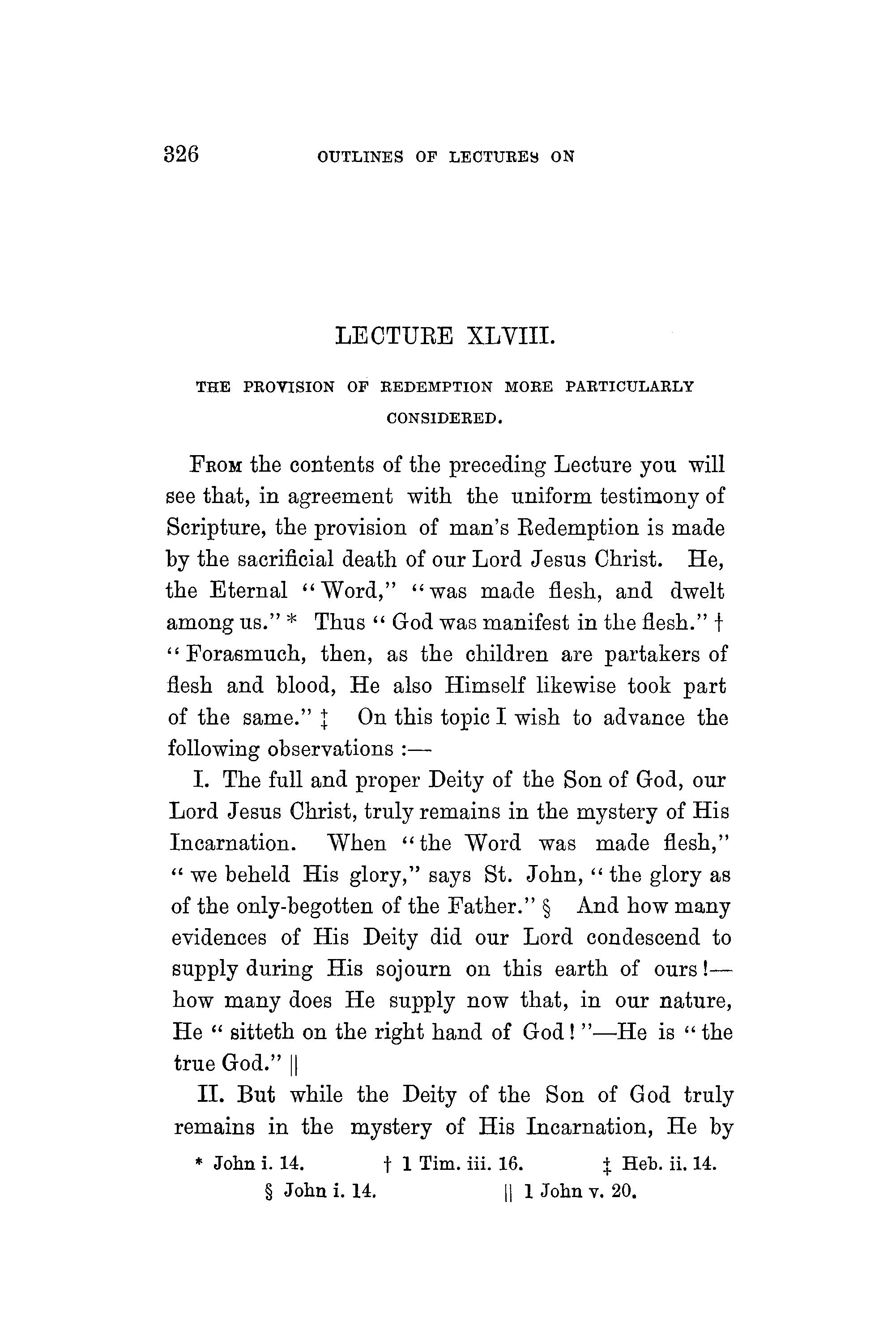
THE PROVISION OF REDEMPTION MORE PARTICULARLY CONSIDERED.
FROMthe contents of the preceding Lecture you will see that, in agreement with the uniform testimony of Scripture, the provision of man's Redemption is made by the sacrificial death of our Lord Jesus Christ. He, the Eternal " Word," " was made flesh, and dwelt among us."* Thus "God was manifest in the flesh." t '' Forasmuch, then, as the children are partakers of flesh and blood, He also Himself likewise took part of the same." t On this topic I wish to advance the following observations :-
I. The full and proper Deity of the Son of God, our Lord Jesus Christ, truly remains in the mystery of His Incarnation. When " the Word was made flesh," "we beheld His glory," says St. John," the glory as of the only-begotten of the Father."§ And how many evidences of His Deity did our Lord condescend to supply during His sojourn on this earth of ours !how many does He supply now that, in our nature, He "sitteth on the right hand of God! "-He is "the true God." 11
II. But while the Deity of the Son of God truly remains in the mystery of His Incarnation, He by
* John i. 14. t 1 Tim. iii. 16. t Heb. ii. 14. § John i. 14. II 1 John v. 20.
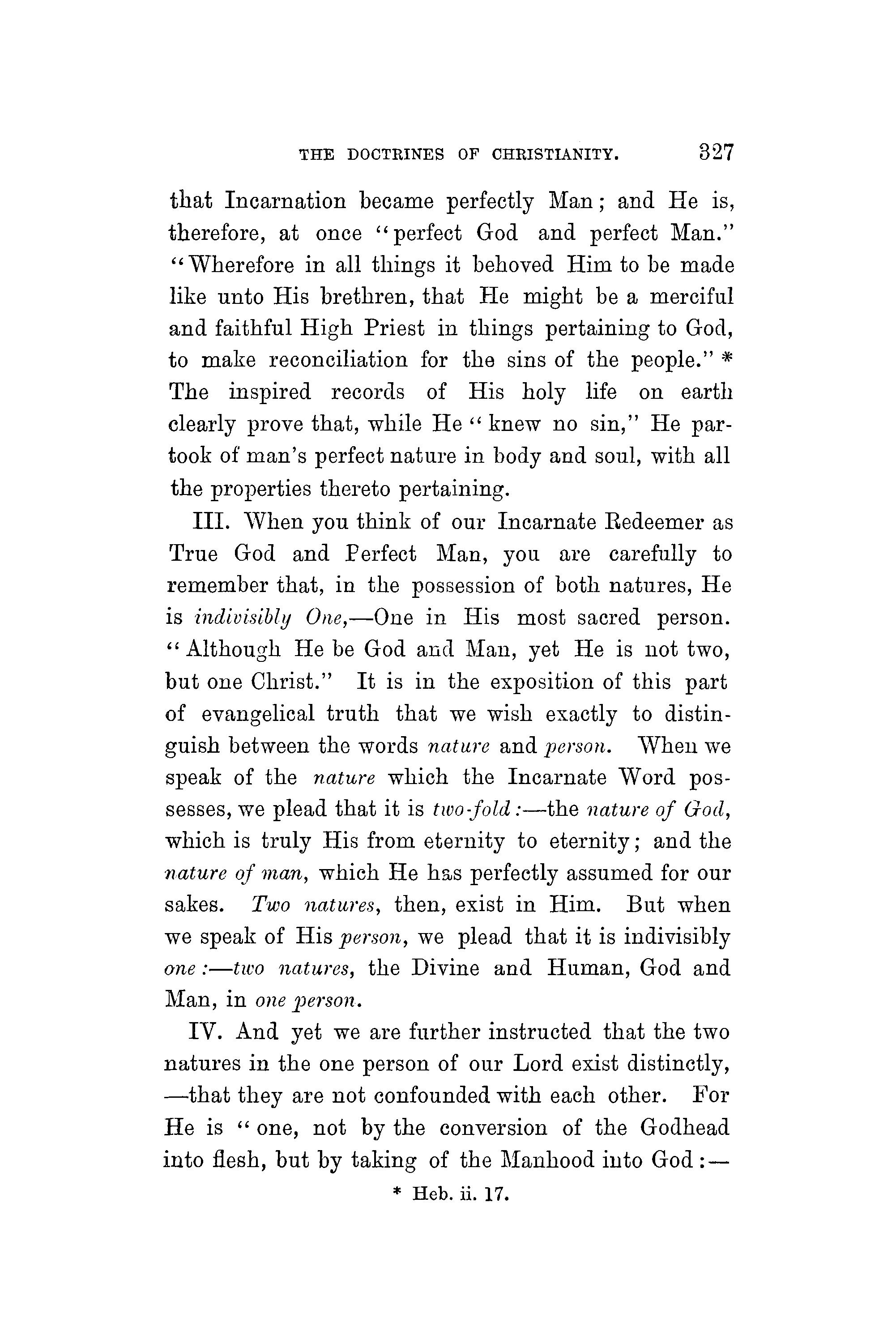
THE DOCTRINES OF CHRISTIANITY. 327 that Incarnation became perfectly Man ; and He is, therefore, at once "perfect God and perfect Man." "Wherefore in all things it behoved Him to be made like unto His brethren, that He might be a merciful and faithful High Priest in things pertaining to Goel, to make reconciliation for the sins of the people." * The inspired records of His holy life on earth clearly prove that, while He " knew no sin," He partook of man's perfect nature in body and soul, with all the properties thereto pertaining.
III. When you think of our Incarnate Redeemer as True God and Perfect Man, you are carefully to remember that, in the possession of both natures, He is indivisibly One,-One in His most sacred person. '' Although He be God and Man, yet He is not two, but one Christ." It is in the exposition of this part of evangelical truth that we wish exactly to distinguish between the words nature and person. ·when we speak of the nature which the Incarnate Word possesses, we plead that it is two-fold :-the nature of God, which is truly His from eternity to eternity; and the nature of 1nan, which He hais perfectly assumed for our sakes. Two natures, then, exist in Him. But when we speak of His person, we plead that it is indivisibly one :-two natures, the Divine and Human, God and Man, in one person.
IV. And yet we are further instructed that the two natures in the one person of our Lord exist distinctly, -that they are not confounded with each other. For He is "one, not by the conversion of the Godhead into flesh, but by taking of the l\.fanhood i11toGod :-
* Heb. ii. 17.

OF LECTURES ON
one altogether, not by confusion of substance, but by unity of person." Passages of Scripture speak sometimes, as we have seen at large, with especial reference to our Lord's Divine nature,-sometimes with an especial reference to His human nature,-sometimes in testimony of the conjunction of both in one person, -and sometimes in the use of what our writers call "the communication of properties between the Divine and human nature: whereby what is proper to the Divine nature is spoken concerning the human ; and what is proper to the human is spoken of the Divine.",:, A serious and devout examination of these things cannot fail to render us important aid in the interpretation of the language of Scripture, and of its great system of truth.
At the close of a profound and able discourse on this subject, th0 venerable Hooker uses the following recapitulation : " To gather therefore into one sum all that hitherto hath been spoken touching this point, there are but four things which concur to make co:inplete the whole state of our Lord Jesus Christ: His Deity, His Manhood, the conjunction of both, and the distinction of the one from the other being joined in one. Four principal heresies there are which have in those things withstood the truth: Arians, by bending themselves against the Deity of Christ; Apollinarians, by maiming and misinterpreting that which belongeth to His human nature ; N estorians, by rending Christ asunder, and dividing Him into two persons ; the followers of Eutyches, by confounding
* See Wesley's Note on John iii. 13; and compare Hooker, book v., chap. liii. [4].
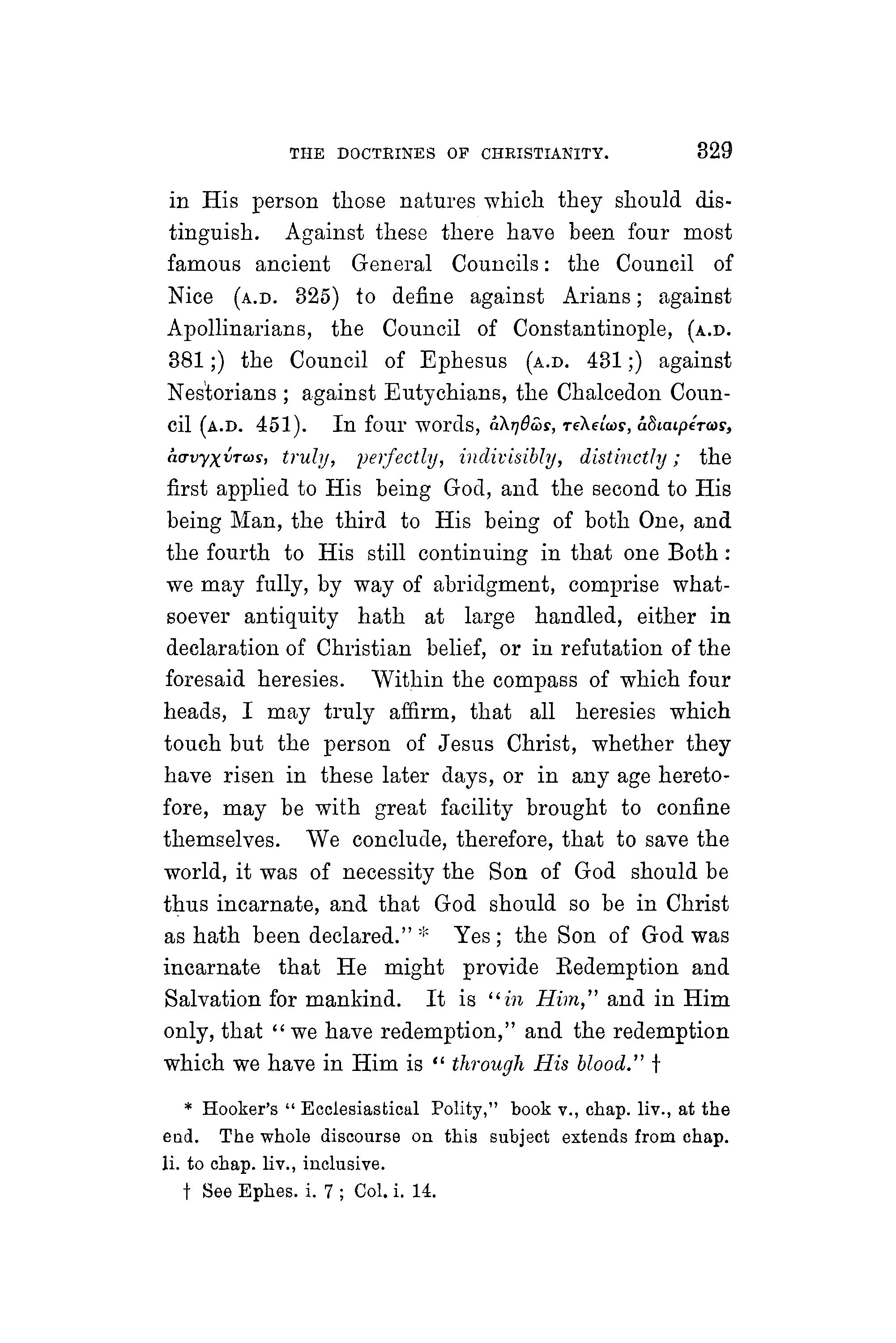
in His person those natures which they should distinguish. Against these there have been four most famous ancient General Councils : the Council of Nice (A.D. 325) to define against Arians; against Apollinarians, the Council of Constantinople, (A.D. 381 ;) the Council of Ephesus (A.D. 431 ;) against Nestorians; against Eutychians, the Chalcedon Council (A.D. 451 ). In four words, aAry0ws,nA,dws, a.8,mpfrror, aa-vyxvTws, truly, zmjectly, indivisibly, distinctly; the first applied to His being God, and the second to His being Man, the third to His being of both One, and the fourth to His still continuing in that one Both: we may fully, by way of abridgment, comprise whatsoever antiquity hath at large handled, either in declaration of Christian belief, or in refutation of the foresaid heresies. Within the compass of which four heads, I may truly affirm, that all heresies which touch but the person of Jesus Christ, whether they have risen in these later days, or in any age heretofore, may be with great facility brought to confine themselves. \Ve conclude, therefore, that to save the world, it was of necessity the Son of God should be thus incarnate, and that God should so be in Christ as hath been declared." * Yes ; the Son of God was incarnate that He might provide Redemption and Salvation for mankind. It is "in Him," and in Him only, that "we have redemption," and the redemption which we have in Him is "through His blood." t
* Hooker's "Ecclesiastical Polity," book v., chap. liv., at the end. The whole discourse on this subject extends from chap. Ii. to chap. liv., inclusive.
t See Ephes. i. 7; Col. i. 14.

lT is our persuasion that Redemption, in its merciful contrivances and provisions, extends to the whole human race; though its saving benefits are actually bestowed on them only who " repent and believe the Gospel."* All are redeemed by price; they only are redeemed by power who comply with the conditions of Redemption. Our object is to prove the extent of Redemption as thus understood.
Three kinds of argument may be properly used on this subject; and they may be respectively termed, Presumptive, Direct, and Collateral.
I. Presumptive arguments may be produced in support of this doctrine ; such, for example, as are drawn,
1. From the universal rrtin of the human race by sin, which renders all that race a fit object for redeeming mercy.
2. From the impartiality of God, which encourages us to believe that what He provides for one, He will provide for all who are placed in the same circumstances of destitution and misery.
3. From the infinite efficacy of our Saviour's sacrifice, which is certainly available with God for all the myriads of our race.
II. Direct arguments, taken from the plain testi* Marki. 15.
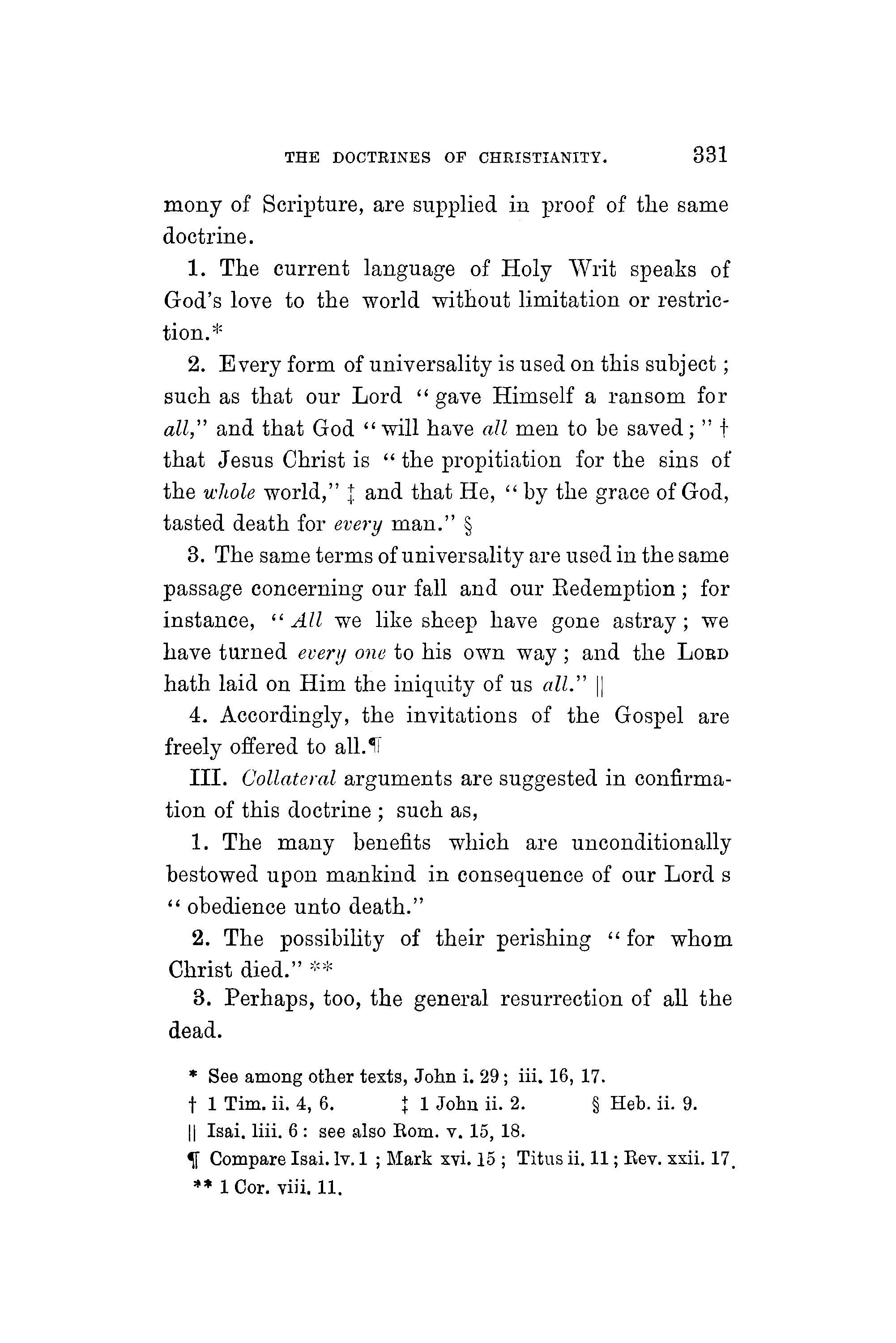
mony of Scripture, are supplied in proof of the same doctrine.
1. The current language of Holy ·writ speaks of God's love to the world without limitation or restriction.*
2. Every form of universality is used on this subject; such as that our Lord "gave Himself a ransom for all," and that God "will have all men to be saved;" t that Jesus Christ is " the propitiation for the sins of the whole world," t and that He, "by the grace of God, tasted death for every man." §
3. The same terms of universality are used in the same passage concerning our fall and our Redemption ; for instance, "All we like sheep have gone astray; we have turned every one to his own way; and the LoRD hath laid on Him the iniquity of us all." II
4. Accordingly, the invitations of the Gospel are freely offered to all. '1T
III. Collateral arguments are suggested in confirmation of this doctrine ; such as,
1. The many benefits which are unconditionally bestowed upon mankind in consequence of our Lord s "obedience unto death."
2. The possibility of their perishing " for whom Christ died." ,:,*
3. Perhaps, too, the general resurrection of all the dead.
* See among other texts, John i. 29; iii. 16, 17.
t 1 Tim. ii. 4, 6. + 1 John ii. 2. § Heb. ii. 9.
11 Isai. liii. 6 : see :;i,lsoRom. v. 15, 18.
Compare Isai. lv.1 ; Mark xvi. 15 ; Titus ii. 11; Rev. xxii. 17.
0 1 Cor. viii. 11.

1. If the word " election " be objected against us, we reply, that this word, rightly interpreted according to its customary meaning and application, refers not to a secret and unconditional decree, but to an actual choice of persons by a true conversion.*
2. If the term "fore-knowledge" should be mentioned, it is obvious to say that, while we do not attempt to trace the connection between God's foreknowledge and man's free agency,-though we are assured of the existence of both,-it is yet very clear that fore-knowledge is distinguishable from foredetermination.
3. If the word " predestination " be urged against us, we desire it to be remarked that predestination particularly relates to the following important truth, -that God predestinates all who shall be saved "to the adoption of children," t and to a " conformity to the image of His Son." t
4. If particular texts of Scripture be quoted in opposition to the views now given, we would request 'that these texts may be examined according to the true rules of interpretation, and their proper meaning impartially ascertained. But, for a specimen of such texts, as so examined, I refer you to Watson's "Institutes," part ii., chapter xxvii. Consult also the whole of that very able part of the " Institutes " which relates to this subject :-part ii., chapters xxv .-xxviii.
* Compare such texts as 2 Peter i. 10; Rev. xvii. 14. t Epbes. i. 5. t Rom. viii. 29.

THE duty of Repentance is strongly enforced in every part of the New Testament. By John the Baptist, who was the immediate herald of the Evangelical Dispensation ; ,:, by our Lord, who carried on that Dispensation to its completion; + and by the apostles, who published the ample provisions of that Dispensation, as so completed. t Repentance is, therefore, a duty clearly appointed in the commencement, the progress, and the maturity of the Christian system, emphatically and peculiarly so callec1.
But there is one passage which places this subject in the clearest light, and which may be most usefully selected as a text for a discourse on Repentance.
'' And the times of this ignorance God winked at ; but now commandeth all men every irltere to repent." § Our purpose is to consider the nature, the necessity, and the especial design of Repentance.
I. Let us consider the nature of Repentance. Repentance is briefly defined by Mr. Wesley, " conviction of sin;" but then it is conviction of sin to which the penitent yields and submits.\\
* Matt. iii. 2. t 1\Iatt. iv. 17; Luke xiii. 3, 5.
t Acts ii. 38 ; xx. 21. § Acts xvii. 30.
II See, particularly, Wesley's Sermon on "The Way to the Kingdom," Works, vol. v., pp. 82-85.

It will not, therefore, be amiss if we draw out this definition somewhat more at large, and test its truth by an appeal to the examples of Repentance which are recorded in the New Testament ; such as, the penitent publican,,:, the penitent Jews, t and the penitent Saul of Tarsus. t Repentance, then, includes,
1. Conviction of sin.
2. Compunction for sin, as arising out of that conviction.
3. Departure from sin, with earnest desires to be delivered from its power.
4. Humiliation of heart before God.
II. Let us also consider the necessity of Repentance.
1. It is indispensably necessary. mandeth " it. God "com-
2. It is universally necessary. "God commandeth all men every where to repent."
3. It is immediately necessary, without delay; "Now God commandeth it."
III. Let us finally attend to the especial design of Repentance.
1. Its design is doubtless to subdue our perverse and rebellious hearts, and thus to dispose us for the humble reception of God's most unmerited mercy.
2. Its design is also to embitter all our sins, how pleasing, profitable, or habitual soever they may have been.
3. Its design is, farther, to fill us with earnest desires after God, and His forgiving love.
4. And thus its design is to prepare the way for * Luke xviii. 13. t Acts ii. t Acts ix.
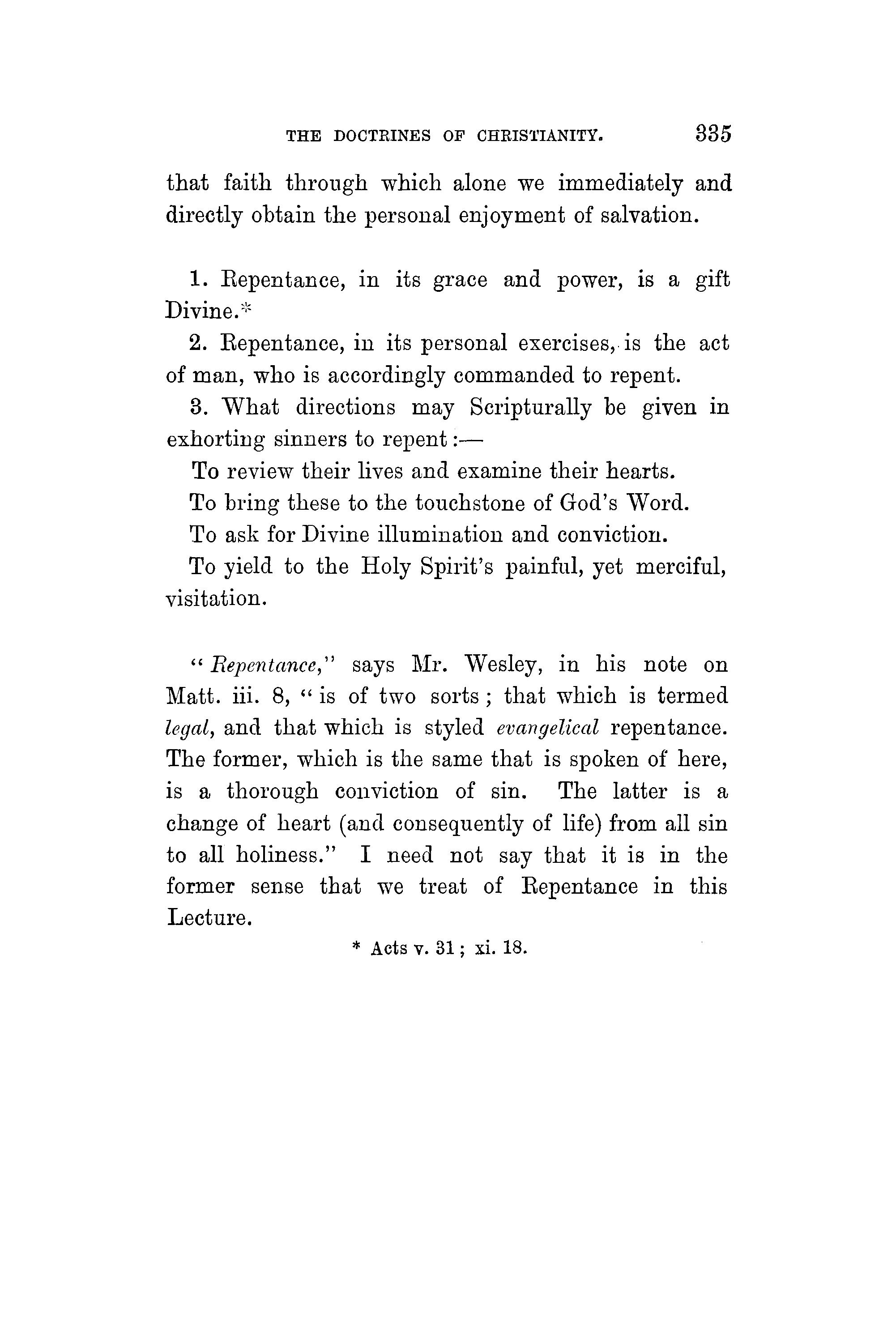
DOCTRINES OF CHRIS1'IANITY. 335
that faith through which alone we immediately and directly obtain the personal enjoyment of salvation.
1. Repentance, in its grace and power, is a gift Divine.':<
2. Repentance, in its personal exercises, is the act of man, who is accordingly commanded to repent.
3. What directions may Scripturally be given m exhorting sinners to repent :-
To review their lives and examine their hearts.
To bring these to the touchstone of God's Word.
To ask for Divine illumination and conviction.
To yield to the Holy Spirit's painful, yet merciful, visitation.
"Repentance," says l\fr. Wesley, in his note on Matt. iii. 8, " is of two sorts ; that which is termed legal, and that which is styled evangelical repentance. The former, which is the same that is spoken of here, is a thorough conviction of sin. The latter is a change of heart (and consequently of life) from all sin to all holiness." I need not say that it is in the former sense that we treat of Repentance in this Lecture.
* Acts v. 31; xi. 18.

FAITH IN JESUS CHRIST.
As repentance towards God is continually enjoined in the New Testament, so also is faith in our Lord Jesus Christ. ·when the Jews said, "What shall we do, that we might work the works of God? Jesus answered, and said unto them, This is the work of God, that ye believe on Him whom He hath sent."* They said " works; " He says " icork; " He emphatically sums up the requirements of God in this one comprehensive duty of faith in Himself,-a duty with which all others are intimately connected.
Faith may be regarded in two lights :-as the .A.ct by which we receive Jesus Christ, and become united to Him,-and as the subsequent Habit by which we abide in Him, and continue to live the life spiritual and Divine. One is the faith of a penitent sinner, who "flees for refuge to lay hold upon the hope set before him." t And the other is the faith of a believer, who can say with St. Paul, "The life which I now live in the flesh I live by the faith of the Son of God, who loved me, and gave Himself for me." t Yet the faith itself is one :-its act is the commencement of its habit.
It is of faith, as the act by which we receive Jesus
* John vi. 28, 29. t Heb. vi. 18. t Gal. ii. 20.
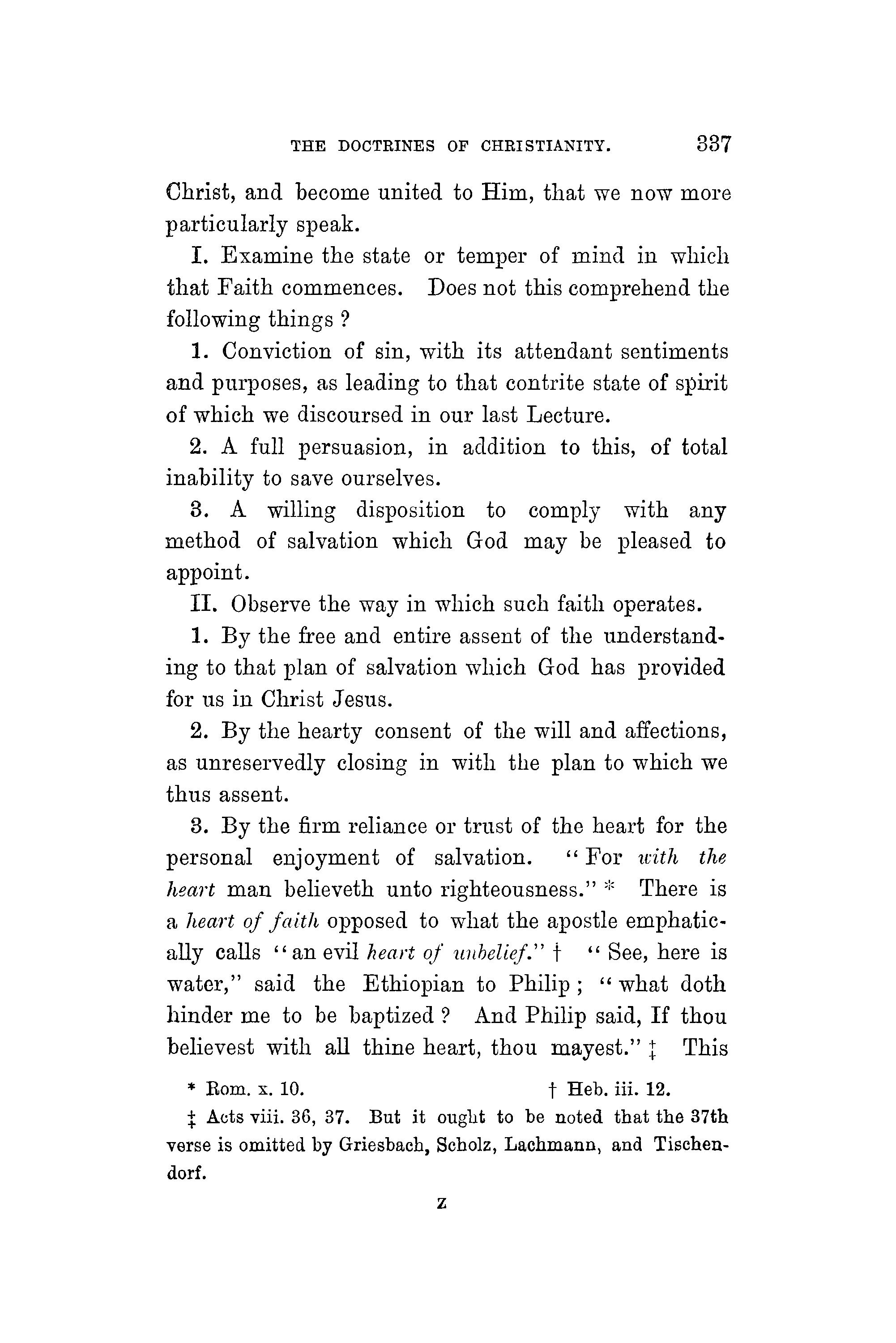
Christ, and become united to Him, that we now more particularly speak.
I. Examine the state or temper of mind in which that Faith commences. Does not this comprehend the following things ?
1. Conviction of sin, with its attendant sentiments and purposes, as leading to that contrite state of spirit of which we discoursed in our last Lecture.
2. A full persuasion, in addition to this, of total inability to save ourselves.
3. A willing disposition to comply with any method of salvation which God may be pleased to appoint.
II. Observe the way in which such faith operates.
1. By the free and entire assent of the understanding to that plan of salvation which God has provided for us in Christ Jesus.
2. By the hearty consent of the will and affections, as unreservedly closing in with the plan to which we thus assent.
3. By the firm reliance or trust of the heart for the personal enjoyment of salvation. "For icith the heart man believeth unto righteousness." * There is a heart of faith opposed to what the apostle emphatically calls '' an evil heart of w1helief.'' + '' See, here is water," said the Ethiopian to Philip; "what doth hinder me to be baptized ? And Philip said, If thou believest with all thine heart, thou mayest." t This
* Rom. x. 10. t Heb. iii. 12.
t Acts viii. 36, 37. But it ought to be noted that the 37th verse is omitted by Griesbach, Scholz, Lachmann, and Tischendorf.

trust of the heart is the especial quality and act of justifying faith. Such faith " is a sure trust and confidence." It is thus distinguished from all other kinds of belief ;-for example, from the liistorfral belief of facts simply, and from the merely speculati1;ebelief of doctrines. It may be compared to the flight of Noah's dove to the ark of safety,-to the escape of the manslayer to the city of refuge,-and to wounded Israel's looking to the brazen serpent.* "Christian faith is then," to use the words of Mr. Wesley, t "not only an assent to the whole Gospel of Christ, but also a full reliance on the blood of Christ ; a trust in the merits of His life, death, and resurrection; a recumbency upon Him as our atonement and our life, as given for us, and living in its; and, in consequence hereof, a closing with Him, and cleaving to Him, as our ' wisdom, righteousness, sanctification, and redemption,' or, in one word, our salvation." Faith operates in all the spiritual faculties of man, but especially in his heart. t
III. Consider the efficacy of such a Faith. It is the means of our salvation,
1. As it embraces its great Object,-Christ. And,
2. As it thus makes the merits and mercies of Christ our own.
I conclude this Lecture with a few observations, which appear to me to be of considerable importance.
* See John iii. 14, 15, and weigh the particular expressions there used.
t Sermon i.
t See Dr. Bunting's Sermon on" Justification by Faith."

DOCTRINES OF CHRISTIANITY. 331)
1. Ought not proper caution to be used in exhorting persons to believe ? Is it not necessary to ascertain that they really are in the right state of mind to exercise faith? Otherwise, what do our exhortations avail?
•2. Is it not of great consequence to maintain that faith, in its grace and power, is the gift of God, though, in its exercise, it is the act of man ?
Review the state of a penitent believer's heart. ·while he feels that he deserves nothing, he claims all things. Could he do this of himself ?
Examine the declarations of Scripture ; such as, Matt. xvi. 17: "Blessed art thou, Simon Bar-jona: for flesh and blood hath not revealed it unto thee, but My Father which is in heaven." John vi. 44, 65: "No man can come to l\Ie, except the Father which hath sent l\Ie draw him,"-that is, as afterwards repeated and explained, "except it were given unto him of l\Iy Fa,ther." Ephes. ii. 8 : " By grace are ye saved through faith; a,nd that not of yourselves: it is the gift of God." If it were said that, in this passage, the word ,uv,o, rendered " that," cannot grammatically agree with 1r[crTl~, " faith," the one being in the neuter, the other in the feminine gender, it may be replied, first, that, if -rvvTo refer to "the whole preceding clause," this plainly implies that faith is the gift of God; ,:, or, secondly, that rov,o may, after all, belong to 1rlcrnr, by a change of gender in the pronoun, such as clearly occurs in Phil. i. 28 ; Ephes. vi. 18; + or, thirdly, that TovTo may agree
* See Wesley's note, first Sermon, under division iii., ancl Benson's note.
t See Doddridge's excellent paraphrase and note. z 2

grammatically with Mpov, "gift," mentioned afterwards. It is well known that an adjective, pronoun, or the like, occurring between two nouns, both of which relate to the same thing, but which are of different genders, may grammatically agree with either, but that it usually agrees with that on which the greatest stress is meant to be laid. "Unto you it is given in the behalf of Christ ... to believe on Him."* "Ye are risen with Him through the faith of the operation of God." t
Mark a proof which is suggested by analogy. Repentance, though most important, is less immediately and fully connected with our salvation than faith. Yet Repentance is expressly said to be the gift of Christ, our "exalted Prince and Saviour." + May we not even hence infer that Faith is His gift also ? Would He give the less, and leave us to give ourselves the greater ?
3. Are we not bound to urge upon Christian believers the duty of cultivating habitual faith? of making it their constant character ? " These things," says St. John, "have I written unto you that believe on the name of the Son of God ; that ye may know that ye have eternal life, and that ye may believe on the name of the Son of God.'' § The briefer reading of our critics on this passage is, " These things have I written mito you ... that ye may know that ye have eternal life, ... who believe in the name of the Son of God." 11
* Phil. i. 29. t Col. ii. 12. t Acts v. 31. § 1 John v. 13.
II So Griesbach, Scholz, Lachmann, and Tischendorf.
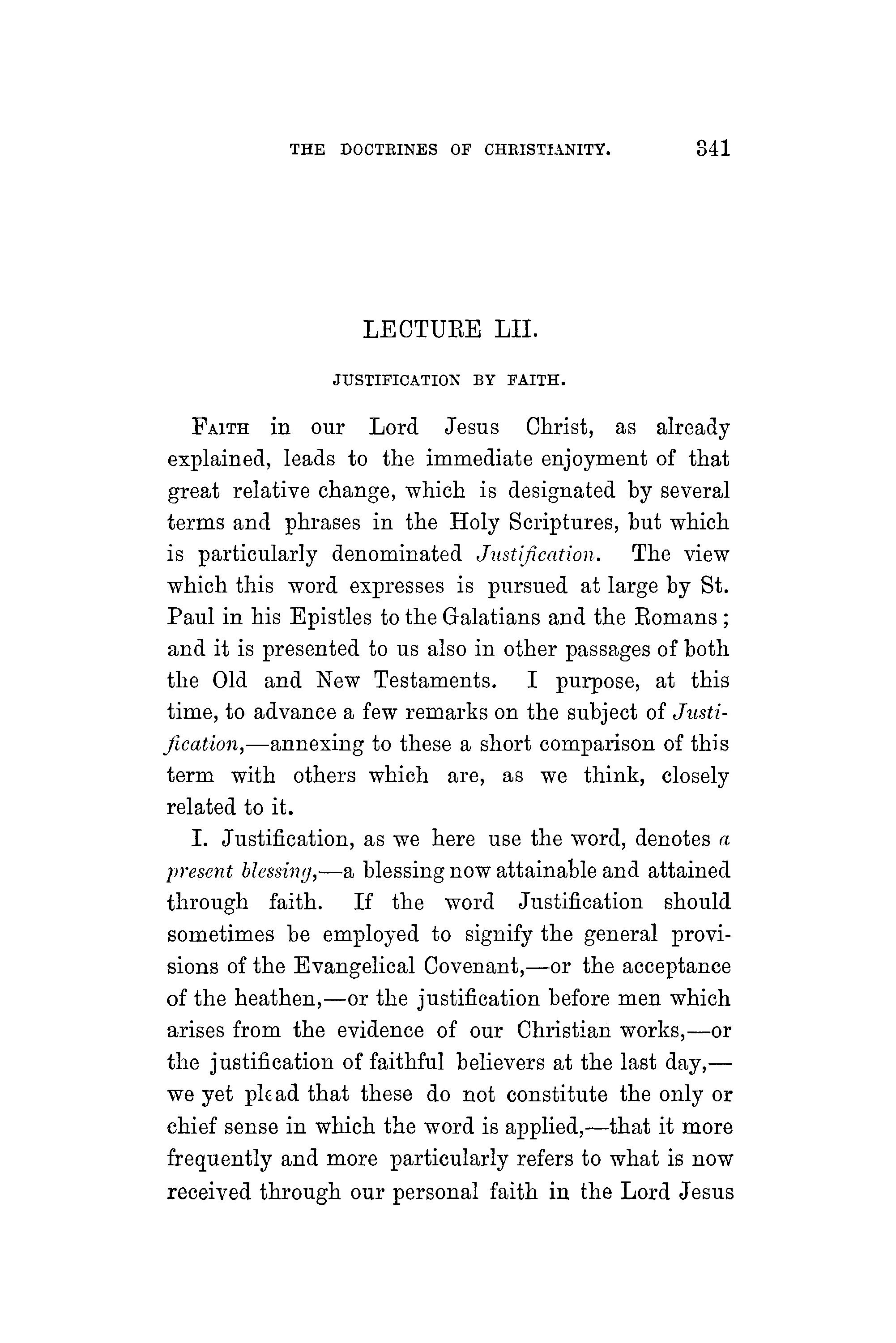
JUSTIFICATION BY FAITH.
FA.ITH in our Lord Jesus Christ, as already explained, leads to the immediate enjoyment of that great relative change, which is designated by several terms and phrases in the Holy Scriptures, but which is particularly denominated Justification. The view which this word expresses is pursued at large by St. Paul in his Epistles to the Galatians and the Romans ; and it is presented to us also in other passages of both the Old and New Testaments. I purpose, at this time, to advance a few remarks on the subject of Justijication,-annexing to these a short comparison of this term with others which are, as we think, closely related to it.
I. Justification, as we here use the word, denotes a present blessing,-a blessing now attainable and attained through faith. If the word Justification should sometimes be employed to signify the general provisions of the Evangelical Covenant,-or the acceptance of the heathen,-or the justification before men which arises from the evidence of our Christian works,-or the justification of faithful believers at the last day,we yet plead that these do not constitute the only or chief sense in which the word is applied,-that it more frequently and more particularly refers to what is now received through our personal faith in the Lord Jesus

Christ,-that it means, in fact, a penitent sinner's present justification before God.*
II. Justification, as denoting a present blessing, is a forensic term, and marks idiat Goel does for us, " as sustaining the person of a Judge according to law, namely, the law of grace." t
"To justify a sinner," says Dr. Bunting, (in the Sermon ah·eady noted,) His to account and consider him relatively righteous, and to deal. with him as such, notwithstanding his past actual unrighteousness; by clearing, absolving, discharging, and releasing him from various penal evils, and especially from. the wrath of God, and the liability to eternal death, which, by that past unrighteousness, he had deserved ; and by accepting him as if just, and admitting him to the state, the privileges, and the rewards of righteousness. ' To be justified,• say the Minutes o:f the :Methodist Conference in the year 17 44, ' is to be pardoned and received into God's favour; into such a state, that, if we continue therein, we shall be finally saved.' "
A briefer definition may perhaps be this :-Justification is that act of God, viewed as our :righteous, and yet merciful, Judge; by which, for the sake of the satisfaction and merits of Christ, embraced and applied to the heart by faith, He discharges the criminal at His bar, and treats him as a just person, in full accordance with the untarnished holiness of His own nature, and the inviolable rectitude of His
* See the Preliminary Observo.tions in Dr. Bunting's Sermon on Justification by Faith. t Howe.
administrations.-The latter part of this definition seems to me to be of real importance; and it particularly corresponds to that passage which speaks of God's "declaring His righteousness" in the matter of a sinner's justification,-" that," as it follows, " He might be just, and the justifier of him that believeth in Jesus." ,:,
Justification, then, is not acquittal, or cleclamtion of innocence ; nor ought we to use expressions which convey, or which may be fairly interpreted as conveying, such a notion.
III. Justification, as above considered, is "revealed," or " manifested," in the Gospel of Christ ; + that is, it has received in the Gospel a fuller revelation,-a manifestation more distinct and clear :-but it was known from the beginning; ancl it can be actually traced up nearly to the period of man's fall.
Take, for example, the case of Abel,-the second man that was born, and the first that died. Compare his brief history t with the Apostle's comment upon it,§ and you will find it a remarkable instance of this blessing.
Take, also, the case of Abraham, II which the Apostle him.self alleges in the fourth chapter of his Epistle to the Rom.ans, when he is expressly and largely discoursing on this very subject. May we not say that the promise made at different times to Abraham was personal, national, and evangelical ?-that it was personal, in order to its being national; and both personal and national, in order to its being ernnuelical .?-that
• Ro,m. iii. 26. t Rom. i. 17; iii. 21. t Gen. iv. 2-5.
§ Heb. xi. 4.

II Gen. xv. 6.

OUTLINES OF LECTURES ON its evangelical character is, therefore, its main character, and the one to which Abraham had chief respect ?and that, accordingly, when it is said, Abraham '' believed in the LoRD, and He counted it to him for righteousness," that testimony has distinct reference to Abraham's faith as embracing the evangelical promise ?-Abraham was justified by faith in the Saviour promised, as we are justified by faith in the same Saviour given.
Take, farther, the description of David/' which St. Paul employs to illustrate the doctrine of J ustification. t
And take the comprehensive maxim of Habakkuk,! which the Apostle cites no fewer than three times : § "The just shall live by faith; " or, "The just by faith shall live."
To this Lecture I will append the following observations, which may, I hope, render some assistance in the investigation of what the Scriptures teach us on this most important subject.
JUSTIFICATION COMPARED WITH OTHER SCRIPTURAL TERMS, AND PARTICULAHLY WITH PARDON AND ADOPTION.
Justification appears to be the same as Acceptance or Reconciliation with Goel, though these expressions may perhaps be regarded as more general, and not quit@ so determinate. " The Spirit of the Lord ... anointed " Jesus-'' to preach the acceptable year oi
* Psalm xxxii. 1, 2. t R ;ID, iv. G-8. t Hab. ii. 4.
§ Rom. i. 17; Gal. iii. 11; Heb. x. 38.
the Lord," or, as Dr. Campbell renders the passage, '' the year of acceptancewith the Lord," *-called also in 2 Cor. vi. 2, compared with Isai. xlix. 8, a "time accepted," that is, as immediately explained, a "day of salvation." God "hath made us accepted (lxapl-rwcuv)in the beloved." + So, in the use of the other word, reconciliation, St. Paul says, " We were reconciled to God by the death of His Son;"-" by whom we have now received the atonement," or, much more properly, as in the Margin, the" reconciliation." t Again, " all things are of God, who hath reconciled us to Himself by Jesus Christ, and hath given to us the mini~try of reconciliation." He "was in Christ, reconciling the world unto Himself, not imputing their trespasses unto them; and hath committed unto us," or, literally, (see margin,) "hath put in us the word of reconciliation." Accordingly, the apostles' message and entreaty to man was, "Be ye reconciled to God."§ Pursuant to the great design which our Lord contemplated,-" that He might reconcile both "-Jews and Gentiles-" unto God in one body by the cross,"-He " came and preached peace to you which were afar off, and to them that were nigh;" II for "it pleased the Father, ... having made peace through the blood of His cross, by Him to reconcile all things unto Himself ... And you, that were sometime alienated and enemies in your mind by wicked works, yet now hath He reconciled in the body of His flesh through death. ,,,r These expressions are, as I said, more general than
* Luke iv. 18, 19.
§ 2 Cor. v. 18-20.
~I Col. i. 19-22.
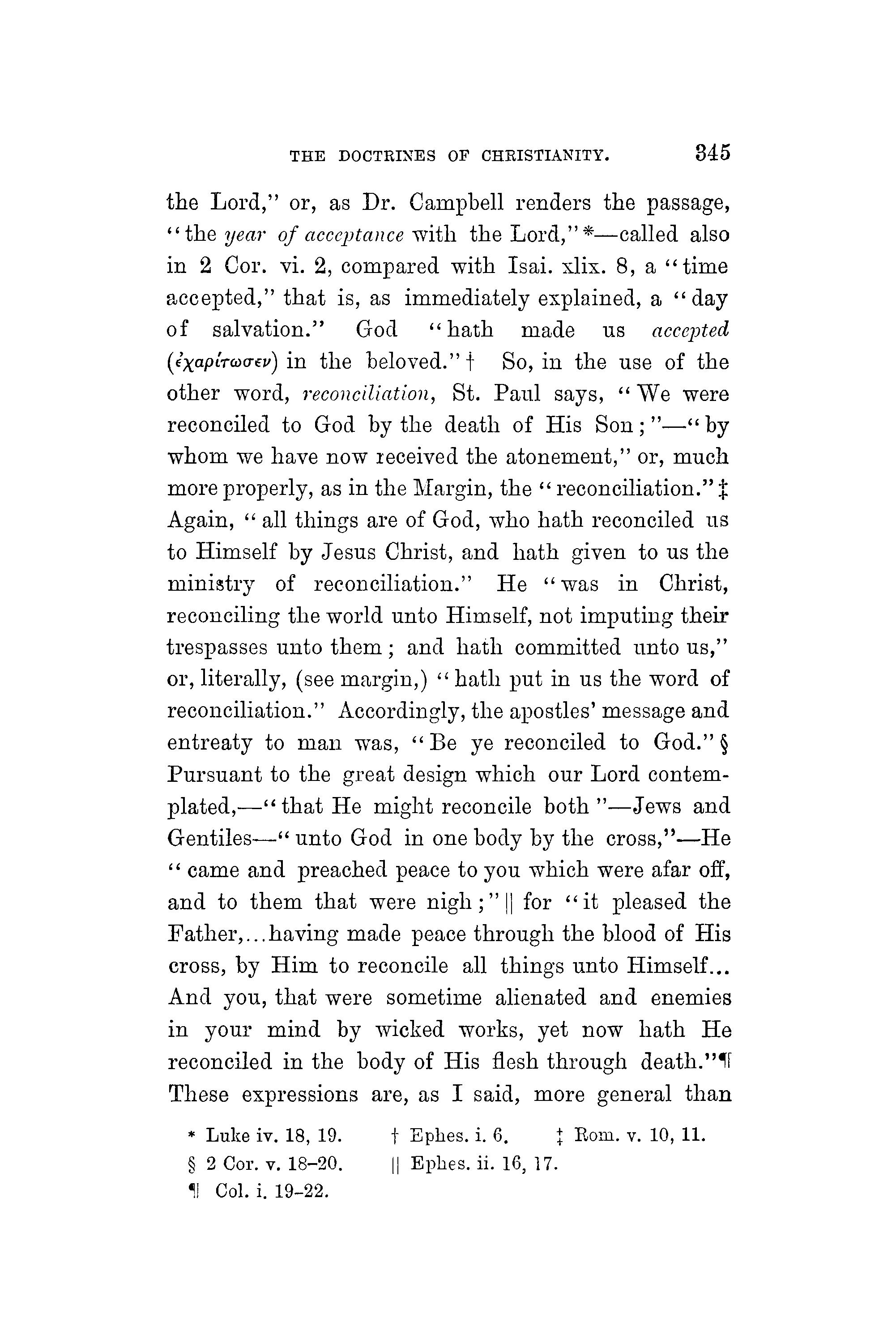
i- Ephes. i. 6. t Rom. v. 10, 11.
II Ephes. ii. Hi, 17.

the word" Justification," and they may also, in some of their applications, be more comprehensive; but they are nearly related to Justification, and they are declarative of the same great blessing.
Justification is, however, more frequently compared with Pardon, and perhaps also with Adoption. These we will more attentively consider. To facilitate our inquiries, I would ask, Are there not three aspects, or characters, under which we are especially-I do not say exclusively-taught to contemplate Almighty God in His relation to His intelligent creatures,-Sovereign, Judge, and Father ? Does not Pardon represent Him under the aspect, or character, of a Sovereign,Justification, as we have seen, of a Judge,-and Adoption, of a Father? And is it not possible that these three terms may, substantially, announce the same blessing, though in different lights? But let us proceed.
I. Is Justification, then, the same blessing, substantially, as Pardon or Forgiveness?
1. Pardon, or Forgiveness, is a present blessing, now attainable, and actually attained, by all that truly believe. So the Scriptures constantly teach. " In Him we have redemption through His blood, the forgiveness of sins."* It is also a Divine blessing, graciously bestowed by God Himself, who alone can forgive sins. It is "with Him" that " there is forgiveness." t "I, even I," He says, "am He that blotteth out thy transgressions for Mine own sake, and will not remember thy sins.''t "Who can forgive sins but God only?" -a question which involves a great * Epbes. i. 7. t Psalm cxxx. 4. t Isai. xliii. 25.
THE DOCTRINES OF CHRISTIANITY, 347 truth, though that truth was misapplied, or was not rightly applied, by the Scribes who put the question.,:, And it is a full or complete blessing. God "forgiveth all our iniquities."+ ·Pardon, or Forgiveness, may, then, be regarded as comprehending the remission of all our past transgressions,-the removal of our penal forfeiture,-and our reception into the favour of God; -and it is the merciful act of God viewed as our gracious Sovereign.
2. That Pardon, or Forgiveness, as thus considered, is substantially the same as Justification, we firmly maintain on the authority of such texts as these :" God be merciful to me a sinner," said the penitent publican, asking for the mercy which a sinner needs, namely, pardon, or forgiveness ;-and "this man," in the reception and enjoyment of that mercy, "went down to his house justified."t "Be it known unto you therefore, men and brethren, that through this Man is preached unto you the forgiveness of sins : and by Him all that believe are justified from all things." § " Whom God hath set forth to be a propitiation, through faith in His blood, to declare His righteousness for the remission of sins that are past, through the forbearance of God; to declare, I say, at this time His righteousness: that He might be just, and the justifier of him which believeth in Jesus." II "To him that worketh not, but believeth on Him that justifieth the ungodly, his faith is counted for righteousness. Even as David also describeth the blessedness of the
* Mark ii. 7.
t Luke xviii. 13, 14.
Ii Rom. iii. 25, 26.

t Psalm ciii. 3.
§ Acts x:ii. 38, 3!).
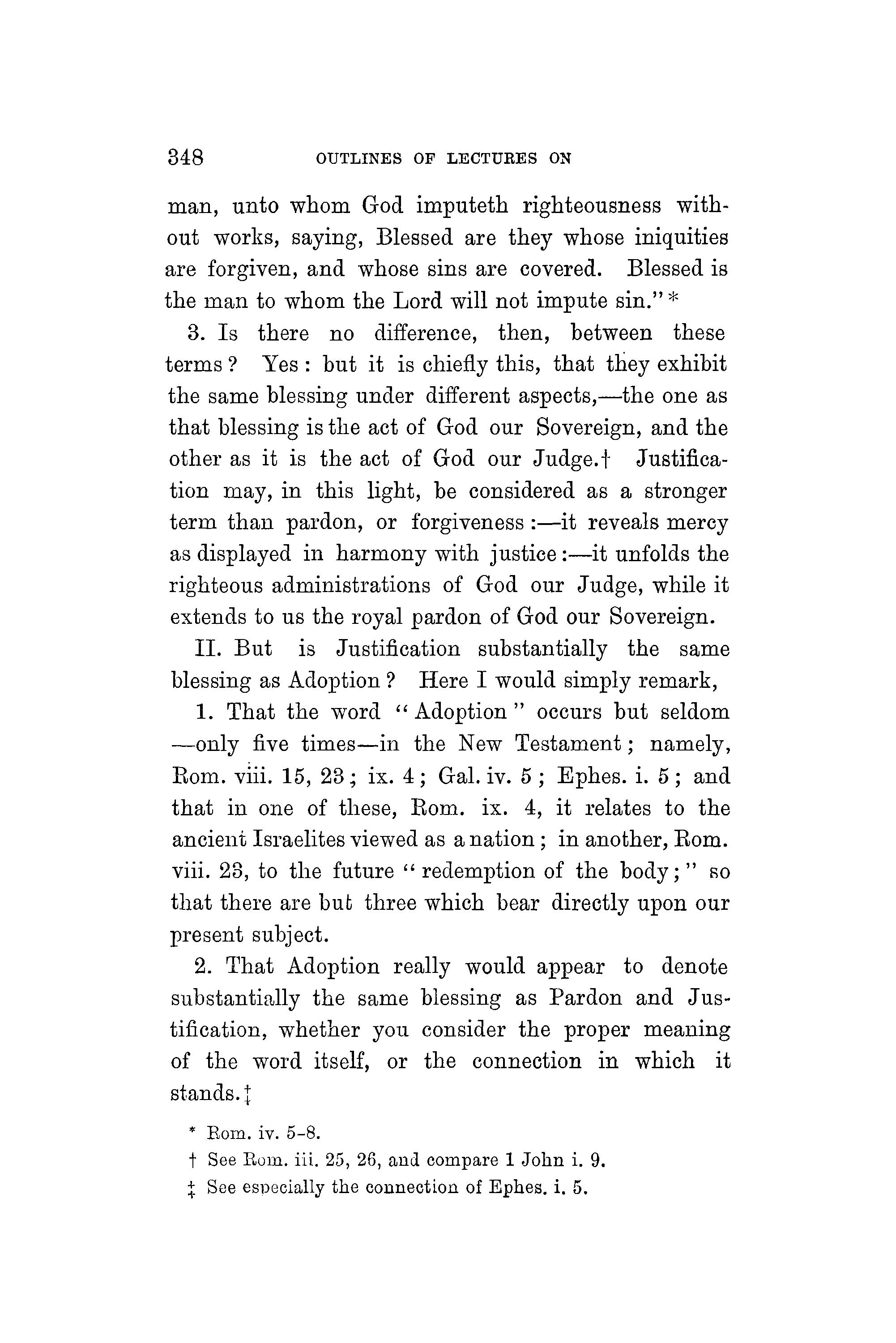
man, unto whom God imputeth righteousness without works, saying, Blessed are they whose iniquities are forgiven, and whose sins are covered. Blessed is the man to whom the Lord will not impute sin."*
3. Is there no difference, then, between these terms? Yes: but it is chiefly this, that they exhibit the same blessing under different aspects,-the one as that blessing is the act of God our Sovereign, and the other as it is the act of God our Judge.+ Justification may, in this light, be considered as a stronger term than pardon, or forgiveness :-it reveals mercy as displayed in harmony with justice :-it unfolds the righteous administrations of God our Judge, while it extends to us the royal pardon of God our Sovereign.
II. But is Justification substantially the same blessing as Adoption ? Here I would simply remark,
1. That the word "Adoption" occurs but seldom -only five times-in the New Testament; namely, Rom. viii. 15, 23; ix. 4; Gal. iv. 5; Ephes. i. 5; and that in one of these, Rom. ix. 4, it relates to the ancient Israelites viewed as a nation; in another, Rom. viii. 23, to the future " redemption of the body ; " so that there are bub three which bear directly upon our present subject.
2. That Adoption really would appear to denote substantially the same blessing as Pardon and J ustification, whether you consider the proper meaning of the word itself, or the connection in which it stands.t
* Rom. iv. 5-8.
t See Rom. iii. 25, 26, and compare 1 John i. 9.
t See es1)ecially the connection of Ephes. i. 5.

3. That Adoption represents Almighty God under another character ,-the character of a compassionate Father, who accepts the returning prodigal, admits him to filial communion, and reinstates him in the possession of all the privileges of His house and family.
4. That, consequently, Adoption 1s, m some respects, the strongest term of the three; which may serve to explain the fact, that some have considered it as additional to our reconciliation or acceptance, rather than as essentially and formally of it.

[ The following seems to have been the original form from which Dr. Hannah expanded LECTURE LII, and its Appendix.]
ACCEPTANCE OR RECONCILIATION WITH GOD.
F AITII in our Lord Jesus Christ, as already explained, leads to the immediate enjoyment of that great relative change, which is, in general terms, denominated acceptance or reconciliation with God, and of which mention is made, under one or other of these representations, in such texts as the following :-Luke iv. 19; Ephes. i. 6; Rom. v. 10; 2 Cor. v. 18, 19; Ephes. ii. 16; Col. i. 20, 21.
But acceptance or reconciliation with God is more particularly expressed by several other phrases in the New Testament. Of these we may select three :Pardon, or the forgiveness of sins,-Justification,-and Adoption. The inquiry, which we now purpose to institute, is, 'What do these phrases mean, and how far do they correspond to each other ?
Pursuant to this inquiry, I would ask, Are there not three aspects, or characters, under which we are especially-I do not say exclusively-taught to contemplate Almighty God in His relation to His intelligent creatures,-Sovereign, Judge, and Father? Reflect on these comprehensive characters ; and then proceed in your investigation.
I. Punlull, or the forgiveness of sins, is an expres-

sion so often used in the Old and New Testaments, that I need not cite particular passages.
1. It is a present blessing, now attainable, and actually attained, by all that truly believe. So the Scriptures constantly teach. "In Him we have redemption through His blood, the forgiveness of sins." ,:,
2. It is a Divine blessing, graciously bestowed by God Himself, who alone can forgive sins. t It is also bestowed by Him in His character of Sov®reign.
3. It is a full or complete blessing. God "forgiveth all our iniquities." t Forgiveness may, then, be regarded as comprehending the remission of all our past transgressions,-the removal of our penal forfeiture,-and our reception into the favour of God.
II. Just[fication is a term very frequently and emphatically used, especially by St. Paul.
1. Justification is s11bsta11tiall!f the same blessing as Pardon. This clearly appears from the following texts :-Acts xiii. 38, 39; Rom. iv. 5-8: compare also Luke xviii. 13, 14.
2. But Justification evidently represents Almighty God to us under another character,-the character of Judge, righteous and yet merciful, who, for the sake of the satisfaction and merits of Christ, embraced and applied to the heart by faith, discharges the criminal at His bar, and treats him as a just person.
3. Justification may, then, be considered as a stronger term than pardon or forgiveuess. It signifies that God exercises His mercy, in full accordance with
* Ephes. i. 7.
t Psalm cxxx. 4; Isai. xliii. 25; Mark ii. 7.
t Psalm ciii. 3,

the untarnished holiness of His own nature, and the inviolable rectitude of His administrations.,:<
III. Adoption next demands our attention. Let it be remarked,
1. That the word " Adoption" occurs but seldomonly five times-in the New Testament; namely, Rom. viii. 15, 23; ix. 4; Gal. iv. 5; Ephes. i. 5 ; and that in one of these, Rom. ix. 4, it relates to the ancient Israelites viewed as a nation; in another, Rom. viii. 23, to the future " redemption of the body;" so that there are but three which bear directly upon our present subject.
2. That it appears to denote substantially the same blessing as Pardon and Justification, whether you consider the proper meaning of the word itself, or the connection in which it stands. t
3. That it represents Almighty God under another character,-the character of a compassionate Father, who accepts the returning prodigal, admits him to filial communion, and reinstates him in the possession of all the privileges of His house and family.
4. That, consequently, Adoption is, in some respects, the strongest term of the three; which may serve to explain the fact, that some have considered it as additional to our reconciliation or acceptance, rather than as essentially andformally of it.
* See Rom. iii. 25, 26; and compare 1 John i. 9.
t See especially the connection of Ephes. i. 5.

THE doctrine of the Holy Spirit's witness to the fact of our acceptance or reconciliation with God is expressly taught in Rom. viii. 16 : " The Spirit itself beareth witness with our spirit, that we are the children of God." It is also confirmeclby such texts as the following:-" God hath sealed us, and given the earnest of the Spirit in our hearts." * "And because ye are sons, God hath sent forth the Spirit of His Son into your hearts, crying, Abba, Father." t "In whom after that ye believed, ye were sealed with that Holy Spirit of promise." t " He that believeth on the Son of God hath the witness in himself." § And it is exemplUied in all those passages which speak of a Christian's confidence in the fatherly mercy of Goel, as that confidence results from the simple and direct exercise of faith in our Lord Jesus Christ. "For ye are all the children of God by faith in Christ Jesus." II It may, therefore, be asserted that this doctrine is, in different forms, of very frequent occurrence in the Scriptures of the New Testament.
Our object, in the present Lecture, is to inquire into the Nature, the Properties, and the Design of this witness, or testimony, of the Holy Spirit.
"' 2 Cor. i. 22. t Gal. iv. G. t Ephes. i. 13. § l John v. 10. 11 Gal. iii. 26. A A

I. The ;{ature of the Holy Spirit's testimony may be ascertained by an enumeration of the following particulars :-
1. That the penitent sinner, by the assistance of the Holy Spirit, believes in our Lord Jesus Christ, and thus complies with the great evangelical condition of salvation. On this we have already discoursed.
2. That, through this faith, it pleases God, in His most abundant grace, to perform that act of mercy, by which the sinner, as so believing, is accepted, reconciled, or, in other words, is pardoned, justified, adopted,-as we endeavoured to show in our last Lecture.
8. And that the Holy Spirit, by His witness or testi~ mony, immediately ascertains this to the believer,conveys to him an attestation of the fact of his acceptance.'~ "The testimony of the Spirit," says Mr. "\Vesley,t "is an inward impression on the soul, whereby the Spirit of God directly witnesses to my spirit, that I am a child of God ; that Jesus Christ hath loved me, and given Himself for me ; and that all my sins are blotted out, and I, even I, am reconciled to God." I cannot but remark, by the way, that this well-weighed definition comports with the views which we took in our last Lecture, and indirectly signifies the substantial identity which subsists between our being the children of God, our having all our sins blotted out, and our being reconcilecl to God.
II. The Properties of the Holy Spirit's testimony ma,y, perhaps, be named as follows :-
1. It is a direct testimony,-direct, I me:1n, in oppo-
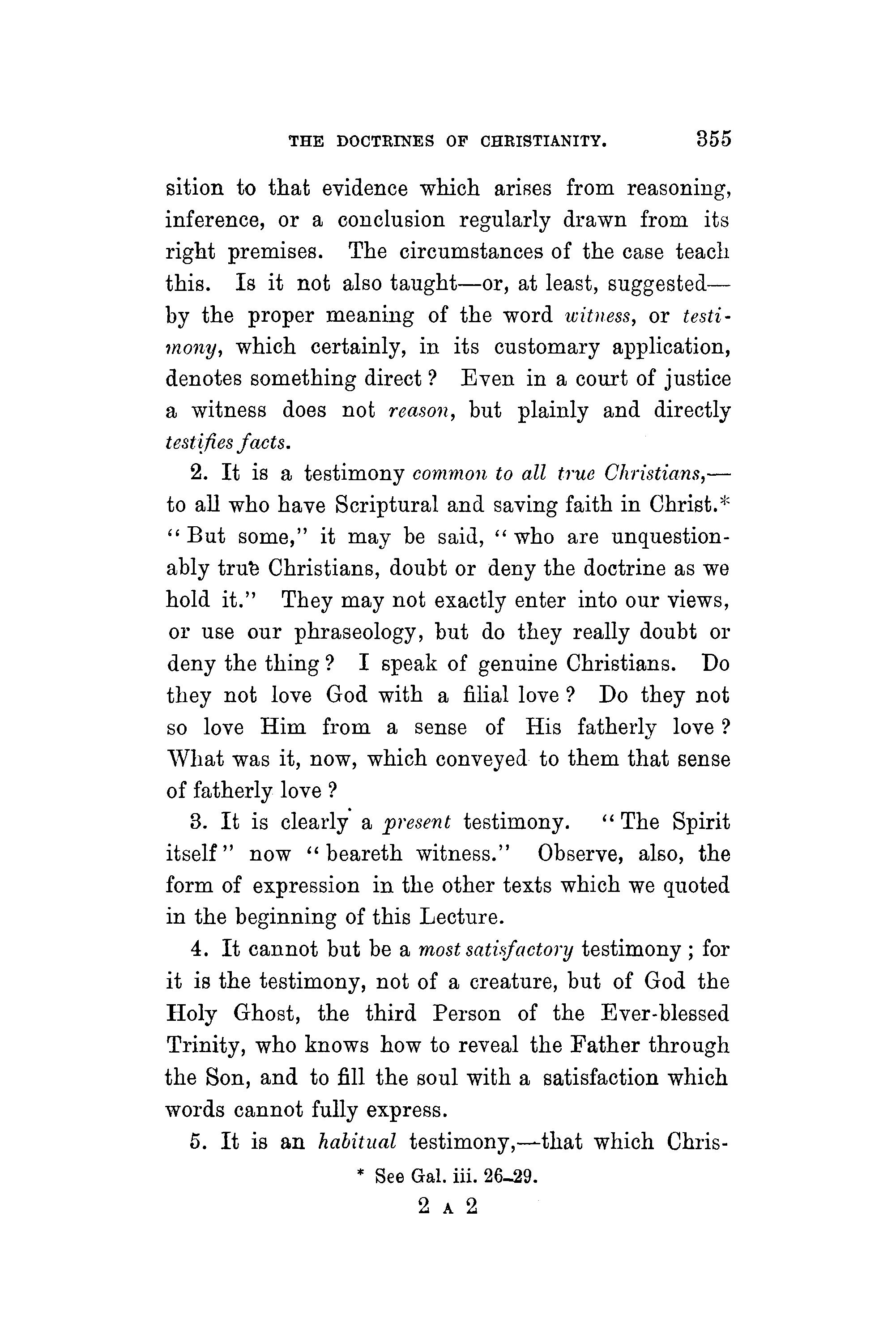
355
sition to that evidence which ariRes from reasoning, inference, or a conclusion regularly drawn from its right premises. The circumstances of the case teach this. Is it not also taught-or, at least, suggestedby the proper meaning of the word witness, or testimony, which certainly, in its customary application, denotes something direct? Even in a court of justice a witness does not reason, but plainly and directly test(fi,esfacts.
2. It is a testimony common to all true Christians,to all who have Scriptural and saving faith in Christ.* "But some," it may be said, "who are unquestionably tru~ Christians, doubt or deny the doctrine as we hold it." They may not exactly enter into our views, or use our phraseology, but do they really doubt or deny the thing? I speak of genuine Christians. Do they not love God with a filial love ? Do they not so love Him from a sense of His fatherly love ? What was it, now, which conveyed to them that sense of fatherly love ?
3. It is clearly· a present testimony. "The Spirit itself" now "beareth witness." Observe, also, the form of expression in the other texts which we quoted in the beginning of this Lecture.
4. It cannot but be a most satisfactory testimony ; for it is the testimony, not of a creature, but of God the Holy Ghost, the third Person of the Ever-blessed Trinity, who knows how to reveal the Father through the Son, and to fill the soul with a satisfaction which words cannot fully express.
5. It is an habitual testimony,~that which Chris-
* See Gal. iii. 26-29.
2 A 2

tians are daily to maintain ;-and " blessed " are they who thus "know the joyful sound: they shall walk, 0 LORD, in the light of Thy countenance. In Thy Name shall they rejoice all the day."*
6. Finally, it is a testimony which may be weakened, -interrupted, and lost. Hence such injunctions as Ephes. iv. 30: "Grieve not the Holy Spirit of God, whereby ye are sealed unto the day of redemption."
III. The Design of the Holy Spirit's testimony is,
1. To satisfy us concerning our acceptance with God.
2. And, by this means, through the accompanying agency of the same Blessed Spirit, to create filial love to God in our hearts,-to give 'Us powd, in this way, over sin,-and thus to put us in possession of a new nature; in other words, to regenerate or renew. Does it not, then, plainly appear that the Holy Spirit " worketh all in all ? " that His testimony is concerned, as a uniting link, with the relative and real changes of believing man? that, by the Spirit's working, the selfsame testimony ascertainsthe one, and, instrumentally, produces the other ?
Note.-Bishop Pearson's definition of the Spirit's ·witness may be ascertained from the following important passage :-" It is the office of the Holy Ghost to assure us of the adoption of sons, to create in us a sense of the paternal love of God toward us, to give us an earnest of our everlasting inheritance." t The texts which Pearson cites in proof of this, are Rom. v. 5; viii. 14 ; Gal. iv. 6 ; ~om. viii. 15, 16.
* Psalm lxxxix. 15, 16.
t Exposition of the Creed, Article VIII.
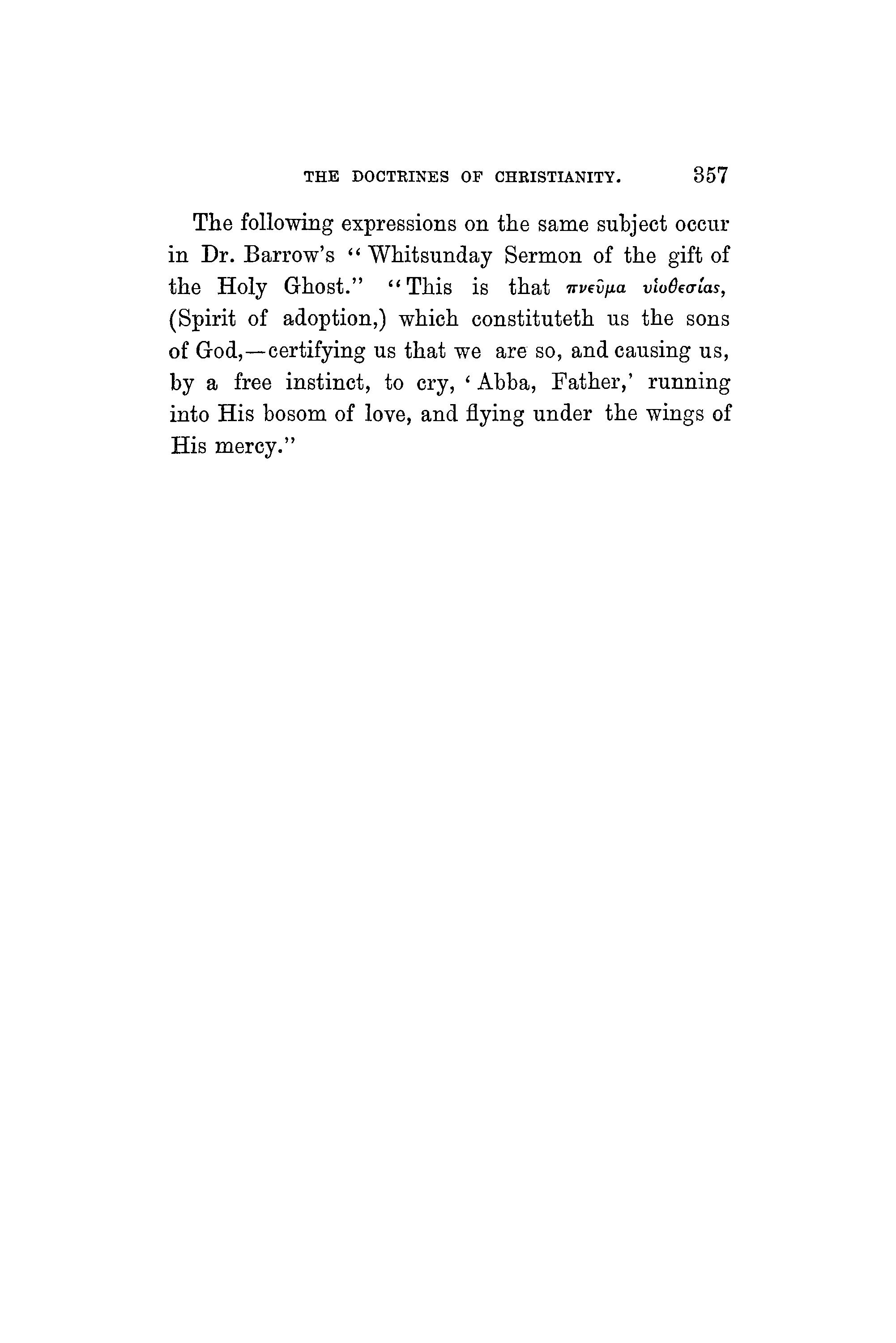
The following expressions on the same subject occur in Dr. Barrow's "Whitsunday Sermon of the gift of the Holy Ghost." "This is that 1Tv£vµ,a vfo8Hrias, (Spirit of adoption,) which constituteth us the sons of God,-certifying us that we are so, and causing us, by a free instinct, to cry, 'Abba, Father,' running into His bosom of love, and flying under the wings of His mercy.''

REGENERATION, OR THE NEW BIRTH: ITS IMPORT,
WHEN a penitent sinner, through faith in our Lord Jesus Christ, receives the gift of pardon, justification, or adoption, and the Holy Spirit's testimony to that gift, he is, at the same time, regenerated, or born again. The word Regeneration occurs only in Matt. xix. 28, and Titus iii. 5.
To ascertain the proper characters or marks of this great blessing, we wish carefully to weigh the language which our Lord Himself has used in His conversation with Nicodemus,* comparing that language, as occasion may require or allow, with parallel texts of Holy Scripture.
Let us, first, consiaer the true Import of Regeneration; secondly, its Necessity; and, thirdly, its Relation to the other parts of that spiritual system by which we are recovered and restored.
I. Regeneration, in its true import, may perhaps be briefly defined thus :-It is that spiritual change which is wrought in believing man by the Holy Spirit of God ; and which, though it may be mysterious and inexplicable in its process, is sufficiently plain and obvious in its effects. }3ut let us weigh each part of this definition.
1. Regeneration, we say, is a spiritual change. And * John iii.

THE DOCTRINES OF CHRISTIANITY. 35!)
is not this most explicitly declared by our Lord ? "That which is born of the flesh is flesh; and that which is born of the Spirit is spirit." ,:, Regeneration, then, is not a change merely in our opinions, professions, or observances; but in our spirit ;-in our inward perceptions 1 feelings, and enjoyments: for these three things seem to be comprehended in the proper meaning of the word "spirit." Regeneration is, in other words, the infusion of new life into the spirit, with its essential qualities of light, emotion, and joy.
2. Regeneration is a spiritual change wrought in believing man by the Holy Spirit of God. Is not this also fully apparent from our Lord's di1:woursewith Nicodemus? He thrice uses the phrase, '' born of the Spirit." t Compare this now with John i. 12, 13 :" As many as received Him, to them gave He power to become the sons of God, even to them that believe on His name : which "-as so believing-" were born, not of blood, nor of the will of the flesh, nor of the will of man, but of God." " Born of God," is a phrase which this holy evangelist elsewhere uses,t but uses as equivalent in meaning to "born of the Spirit." For the Spirit of God is God. The spiritual change of Regeneration, then, is wrought, through faith in Jesus, by God the Holy Spirit.
Baptism is the emblem,, or sign, of Regeneration. When our Lord employed the expression, " born again," Nicodemus asked, with surprise, .. How ua:u a man be born when he is old ? can he enter the second time into his mother's womb, and be born ? "
* John iii. 6: review the whole context. t John iii. 5, 6, 8. t 1 John iii. 9; iv. 7; v. 1, 4, 18.
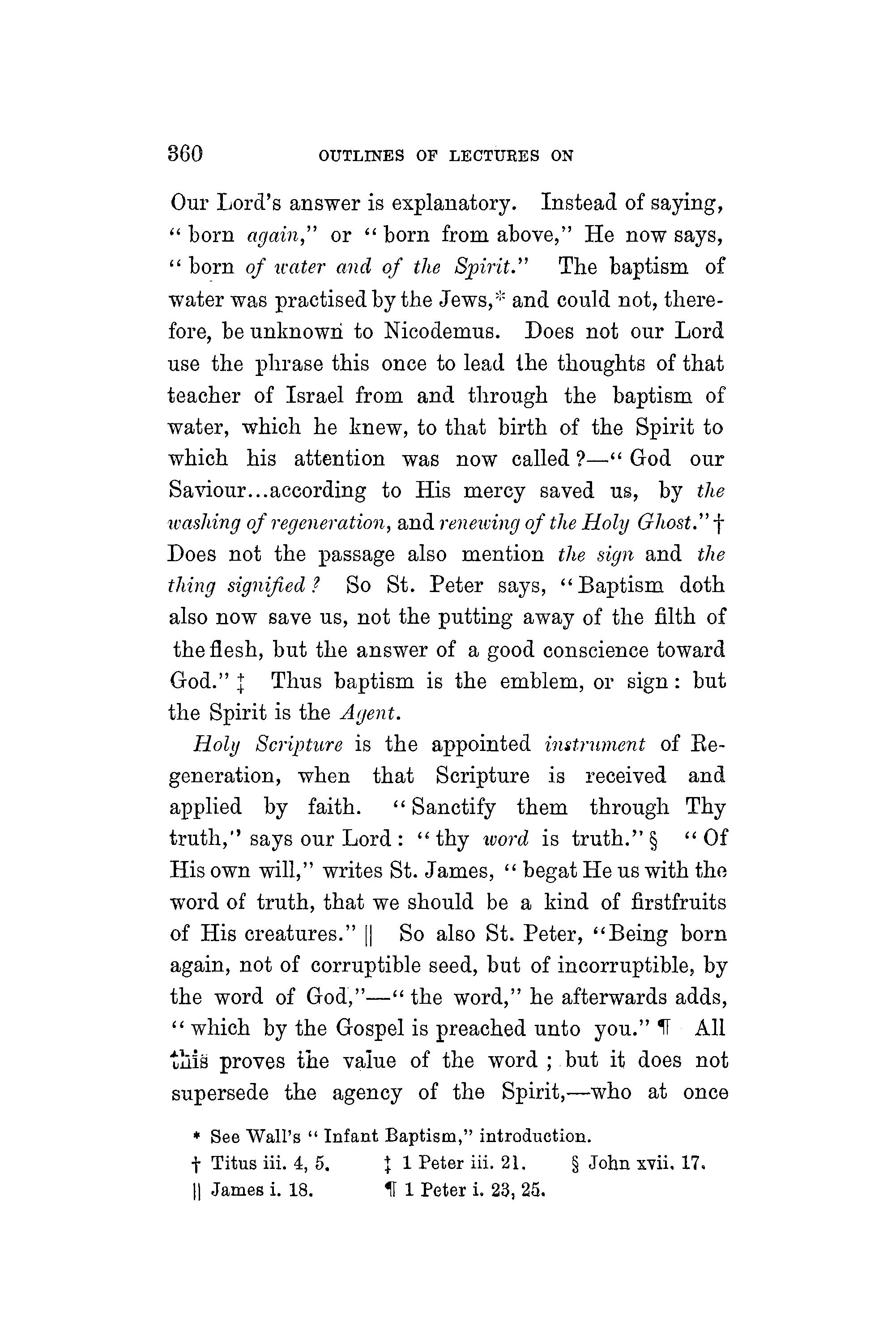
Our Lord's answer is explanatory. Instead of saying, "born again," or "born from above," He now says, " born of icater and of the Spirit." The baptism of water was practised by the Jews,* and could not, therefore, be unknown to Nicodemus. Does not our Lord use the phrase this once to lead ihe thoughts of that teacher of Israel from and through the baptism of water, which he knew, to that birth of the Spirit to which his attention was now called ?-" God our Saviour ... according to His mercy saved us, by the washing of regeneration, and renewing of the Holy Ghost." t Does not the passage also mention the sign and the thing signified _? So St. Peter says, "Baptism doth also now save us, not the putting away of the filth of the flesh, but the answer of a good conscience toward God." t Thus baptism is the emblem, or sign: but the Spirit is the Agent.
Holy Scripture is the appointed in.trwnent of Regeneration, when that Scripture is received and applied by faith. " Sanctify them through Thy truth,'' says our Lord : " thy word is truth.'' § " Of His own will," writes St. James, " begat He us with the word of truth, that we should be a kind of firstfruits of His creatures." II So also St. Peter, ''Being born again, not of corruptible seed, but of incorruptible, by the word of God,"-" the word," he afterwards adds, "which by the Gospel is preached unto you." All t::iis proves the vaiue of the word ; but it does not supersede the agency of the Spirit,-who at once
* See Wall's" Infant Baptism," introduction.
t Titus iii. 4, 5. t 1 Peter iii. 21. § John xvii. 17.
II James i. 18. 1 1 Peter i. 23, 25.

THE DOCTRINES OF CHRISTIANITY, 361 gives reality to the sign, and efficacy to the instrument, each of which must be utterly unavailing without Him.
3. Regeneration-a spiritual change wrought in believing man by the Holy Spirit-though it may be mysterious and inexplicable in its process, is sufficiently plain and obvious in its effects. " JJ1arvelnot that I said unto thee, Ye must be born again. The wind " (ro 1rvEv11-a) '' bloweth where it listeth, and thou hearest the sound thereof, but canst not tell whence it cometh, and whither it goeth : so is every one that is born of the Spirit," (l1<rov 'lI'vEv11-aro~.)
The analogy here is singillarly exact :--the same word being used as applicable to the natural wind and the Spirit. Our language requires us to use two words,-which may, perhaps, to an English reader, make the analogy somewhat less vivid and .striking.
The analogy is drawn from what is most obvious and acknowledged,-the existence and operations of the wind,-which we hear ; and which it may also be said that we see in its effects, and feel. We have not the slightest doubt that the wind exists and blows: yet we never saw the wind; nor do we know, and therefore cannot tell, "whence it cometh, and whither it goeth."
The analogy is forcibly applied : " So is every one that is born of the Spirit,"-equally ignorant of the way, the manner, the process,-but equally satisfied, by the evidences which spring from the signs presented, and the effects produced, that the Holy Spirit exists and operates,-that He produces this wonderful change in man.

REGENERATION, OR THE NEW BIRTH: ITS NECESSITY AND RELATION.
IL THE necessity of Regeneration appears from three expressions which our Lord Himself has used on this subject, and which claim our best attention.
1. Regeneration is necessary to a right apprehension of the spiritual nature and excellency of the kingdom of God. When Nicodemus said, "We know that Thou art a Teacher come from God," he implied more than he expressed. " The antecedent," says Bengel on the passage, " is put by Nicodemus :the consequent "-plainly understood, though not declared-is, " Therefore I would confer with Thee. He wished to hear of things heavenly and of things sublime." "Jesus answered "-and it really was an answer to what existed in the querist's mind-" and said unto him, Verily, verily, I say unto thee, Except a man be born again, he cannot see the kingdom of God,"-cannot spiritually see and understand; for that appears to be the proper interpretation of the word here.,:, So St. Paul: t "The natural," or animal, " man "-as opposed to the spiritual man" receiveth not the things of the Spirit of God : for they are foolishness unto him : neither can he know
* See Campbell's Note,-who translates the word, "cannot discern."
t 1 Cor. ii. 14, 15.

them, because they are spiritually discerned. But he that is spiritual judgeth,"-or much rather, as in the margin, '' discerneth all things.'' It deserves notice that, in each case, the matter is placed on the ground of the man's incapacity or inability,-not he shall not, -though that, also, is true,-but he cannot,-he "cannot see, ... neither can he know." Nicodemus was an instance.
2. Regeneration is necessary to our admission into the Kingdom, and participation of its privileges. "Verily, verily, I say unto thee, Except a man be born of water and of the Spirit, he cannot enter into the kingdom of God,"-cannot enter into the possession or enjoyment of it.
He cannot enter into the kingdom of grace, and partake of its spiritual light and joys. Regeneration must introduce us to these. Is it surprising that unregenerate man should sometimes despise these heavenly realities, and account them "foolishness?" He has not yet the eye to perceive, the taste to relish, the heart to feel.
Neither can he enter into the kingdom of glory. What, indeed, could unregenerate man do there, where all is spiritual,-all holy,-all Divine? If it were even possible that he should be admitted into heaven,-which it is not,-heaven itself would be no heaven to him: he could have no eye for its glories; no relish for its pleasures ; no harmony of feeling with its joys and triumphs. But nothing defiled shall enter there.
3. Regeneration is necessary to our escape from future death and aestruction. "Ye must"- as com-
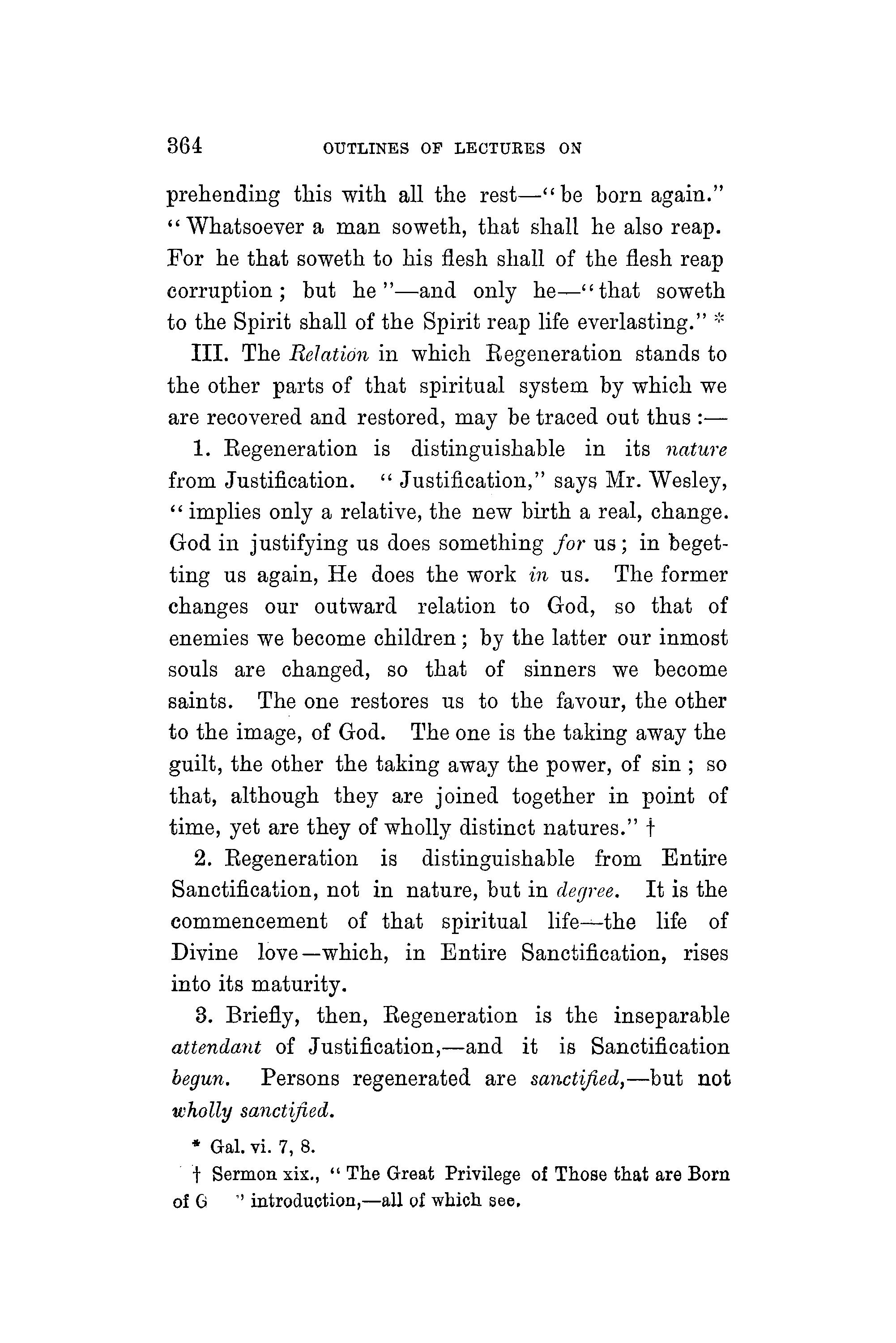
OUTLINES OF LECTURES ON
prehending this with all the rest-'' be born again." "Whatsoever a man soweth, that shall he also reap. For he that soweth to his flesh shall of the flesh reap corruption ; but he "-and only he-" that soweth to the Spirit shall of the Spirit reap life everlasting." ,:,
III. The Relation in which Regeneration stands to the other parts of that spiritual system by which we are recovered and restored, may be traced out thus:-
1. Regeneration is distinguishable in its nature from Justification. "Justification," says Mr. Wesley, "implies only a relative, the new birth a real, change. God in justifying us does something for us; in begetting us again, He does the work in us. The former changes our outward relation to God, so that of enemies we become children; by the latter our inmost souls are changed, so that of sinners we become saints. The one restores us to the favour, the other to the image, of God. r_rheone is the taking away the guilt, the other the taking away the power, of sin; so that, although they are joined together in point of time, yet are they of wholly distinct natures." t
2. Regeneration is distinguishable from Entire Sanctification, not in nature, but in degree. It is the commencement of that spiritual life_;_the life of Divine love-which, in Entire Sanctification, rises into its maturity.
3. Briefly, then, Regeneration is the inseparable attendant of J ustification,-and it is Sanctification begun. Persons regenerated are sanctijied,-but not wholly sanctijied.
* Gal. vi. 7, 8.
+Sermon xix., " The Great Privilege of Those that are Born of G '' introduction,-all of which see,

THE WITNESS OF OUR OWN SPIRIT,
IT is probable that the phrase which I have placed at the head of this Lecture, is immediately drawn from Rom. viii. 16, according to the interpretation which supposes that two witnesses are mentioned in that passage,-the Spirit of God, and "our spirit."
But other texts are also thought to warrant the use of that expression, or of some one equivalent to it. " Their conscience also bearing witness." ,:, " My conscience also bearing me witness in the Holy Ghost." t "Our rejoicing is this, the testimony of our conscience." t It is true that, in these passages, conscience is the word used. But this word, in such a connection, is regarded as nearly, or partly, synonymous with the other expression,-our spirit.
As the evidence, however, of which I am now to speak, proceeds likewise from the Holy Spirit, and is grounded on what He works in the heart, it is sometimes, and that too, as I think, with just discrimination and great accuracy, called thet Holy Spirit's indirect evidence,-to distinguish it from His direct testimony to the fact of our acceptance with God.Its Origin, Nature, and Use, shall now engage our attention.
* Rom. ii. 15. t Rom. ix. 1. t 2 Cor. i. 12.

I. Consider its origin.-Now it deserves remark,
1. That this evideli.ce arises from something which is actually wrought within us, and that it is thus plainly distinguishable from that direct evidence of which I have already spoken.
2. That it must, therefore, follow, not precede, that other evidence,-or the Spirit's testimony to the fact of our acceptance.
3. And, accordingly, that it connects itself with our Regeneration, and pre-supposes the new nature which, in Regeneration, is communicated to us.
IL Examine its nature. It is a scheme of argument and inference inseparable from the change which we find in our own hearts. Certain marks are attributed in Scripture to the children of God : we find, on a careful self-examination, that these marks exist in us: and we therefore conclude that we are the children of God. Thus, for example :-
1. We learn from the Scriptures that "the fruit of the Spirit is love, joy, peace," etc.,,:, and we perceive that the word used is "fruit," not "fruits," thus suggesting to us the one undivided effect of the Spirit's agency; we also perceive that, in the enumeration which follows, "love" is first and paramount-the mother-principle of all the rest.
2. But, on a diligent self-scrutiny, we discover that we possess love" to God, and to all others for His sake, as arising from a sense of His love toward us ; and that we also possess a measure of all the other graces mentioned in the text above cited.
3. And, therefore, we conclude that we are '' born of
* Gal. v. 22, :.l3.
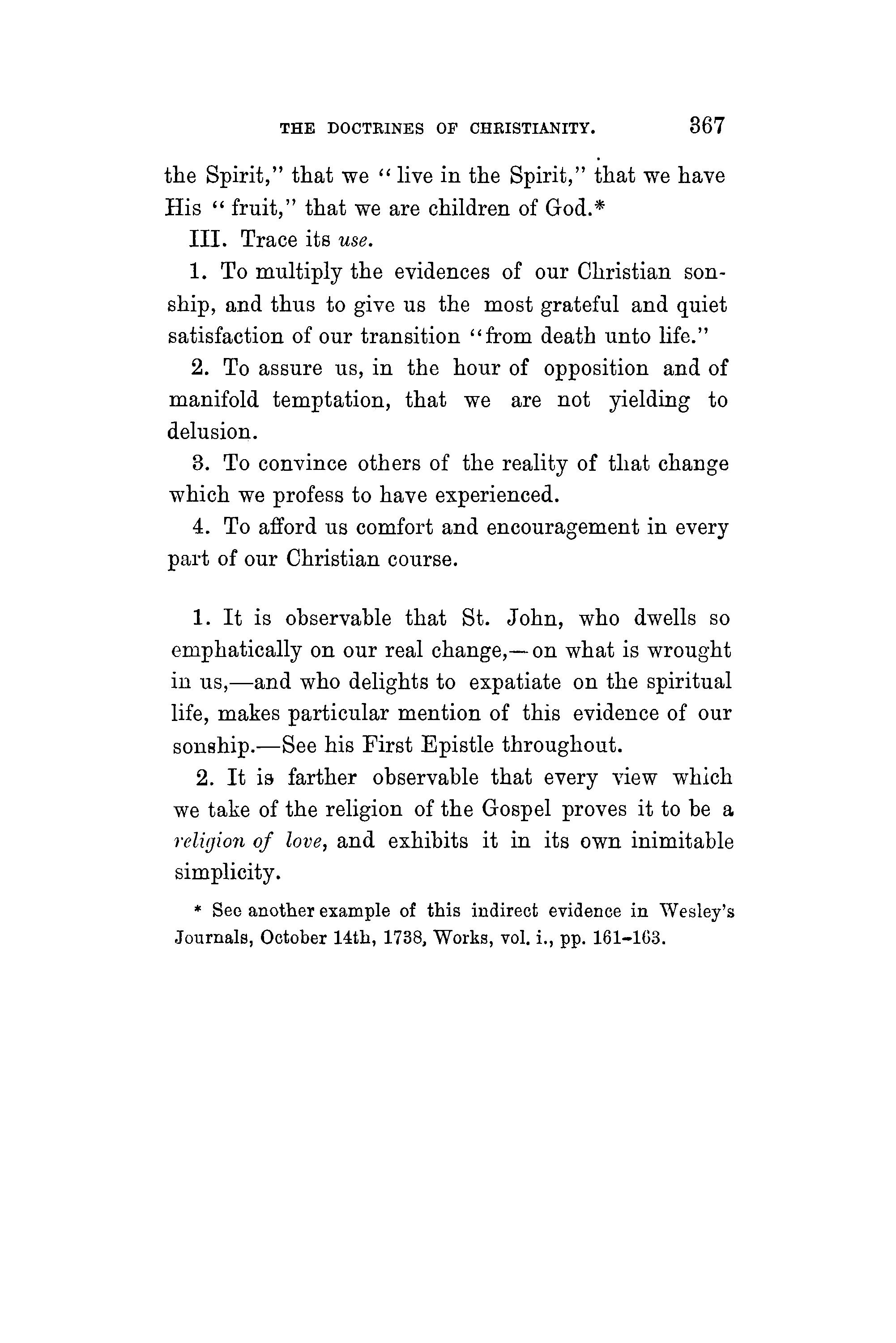
the Spirit," that we " live in the Spirit," that we have His " fruit," that we are children of God.*
III. Trace its use.
1. To multiply the evidences of our Christian sonship, and thus to give us the most grateful and quiet satisfaction of our transition "from death unto life."
2. To assure us, in the hour of opposition and of manifold temptation, that we are not yielding to delusion.
3. To convince others of the reality of that change which we profess to have experienced.
4. To afford us comfort and encouragement in every part of our Christian course.
1. It is observable that St. John, who dwells so emphatically on our real change,-on what is wrought in us,-and who delights to expatiate on the spiritual life, makes particular mention of this evidence of our sonship.-See his First Epistle throughout.
2. It is farther observable that every view which we take of the religion of the Gospel proves it to be a religion of love, and exhibits it in its own inimitable simplicity.
* Sec another example of this indirect evidence in Wesley's Journals, October 14th, 1738, Works, vol. i., pp. 161-Hi3.

THE DEGREE OF CHRISTIAN SANCTIFICATION ATTAINABLE IN THIS LIFE,
As I explained the nature of Sanctification generally in the Lecture on the Holiness of God, I do not think it necessary to devote a separate Lecture now to that particular topic. It may suffice to refer you to the Lecture just named. But I would strive to ascertain how far, or to what degree, the blessing of Sanctification is attainable, in connection with the more advanced and matured state of the Christian life. As in all our investigations, so also in this, we would most carefully follow the teaching and guidance of Holy Scripture.
Three phrases are commonly used among us on this subject :-Entire Sanctification, Christian Perfection, and Perfect Love. Are these phrases strictly Scriptural? What do they import? And how far do they agree in expressing the same thing ?
I. Entire Sanctification is the first of these phrases, as above enumerated.
1. Is this phrase strictly Scriptural ? Yes ; it is obviously drawn from Scripture, and is especially founded on 1 Thess. v. 23: "The very God of peace sanctify you wholly," or entirely,-as Doddridge indeed renders the word.
2. But what does it import ,2 Clearly, a matured or

perfected degree of Sanctification extending to every part,-Sanctification carried through the whole man, so as to make him '' unblameable in holiness before God." * As it follows in the same passage, " And I pray God your whole spirit and soul and body be preserved blameless "-literally, t "May the whole of you, the spirit and the soul and the body, be preserved blameless"-" unto the coming of our Lord Jesus Christ." Then comes the assurance, "Faithful is He that calleth you, who also will do it." t
Entire Sanctification, according to the principles of our Lecture on the Holiness of God, should denote entire separation from sin, an entire preparation for God, and an entire dedication to His service. Can this distribution of the subject be supported 'by plain warrant of Scripture ? Let us see.
An entire separation fr01n sin:-" Then will I sprinkle clean water upon you, and ye shall be clean: from all your filthiness, and from all your idols, will I cleanse you.'' §
An entire preparation for God:-" A new heart also will I give you, and a new spirit will I put within you : and I will take away the stony heart out of your flesh, and I will give you an heart of flesh." II
An entire dedication to the service of God:-" And I will put My Spirit within you, and cause you to walk in My statutes, and ye shall keep My judgments, and do them."~
* See 1 Thess. iii. 13.
t See Wesley's Translation, and compare Macknight's.
t 1 Thess. v. 24. § Ezek. xxxvi. 25.
II Ezek. xxxvi. 26. Ezek. xxxvi. 27.

8. Under what particular aspect, then, may this blessing be said to be presented to us by the title, Entire Sanctification ? It is negative, as signifying the total removal of what is contrary to its own nature ; and positive, as comprehending the enjoyment of what conforms us to God. It is, therefore, pre-eminently the maturity of holy love. Let this be carefully remembered·.
II. Christian Perfection is the second phrase which we have mentioned, and which our fathers often used.
1. Is this phrase, also, strictly Scriptural ? The word "perfection " is plainly and emphatically Scriptural. '' And this also we wish, even your perfection," KaTCzpnow.* "Charity, which is the bond of perfectness," Tijs nXH6n7Tos-. t " Let us go on unto perfection," f7rl TiJv TEAH0T17m. t So also it is said, " Be ye perfect,"-" if thou wilt be perfect,"-" them that are perfect,"-" be perfect,"-" a perfect man,"-" as many as be perfect,"-" perfect in Christ Jesus,"" perfect and complete in all the will of God,"-" that ye may be perfect." § The perfection thus mentioned is placed before us as the attainment of Christian man; and it is, therefore, for the sake of convenient distinction, styled Christian Perfection. But the reason why we use that epithet will more fully appear from what follows.
* 2 Cor. xiii. 9. t Col. iii. 14. t Heb. vi. 1. § Matt. v. 48; xix. 21 ; 1 Cor. ii. 6; 2 Cor. xiii. 11; where the original word is ,ca:raprE(Eu0E.See also Heb. xiii. 21 ; 1 Peter v. 10; Ephes. iv. 13; Philip. iii. 15; Col. i. 28; iv. 12; James i. 4; iii. 2. In all these passages, except 2 Cor. xiii. 11, Heb. xiii. 21, 1 Peter v. 10, as above noted, the word ri'1.Eios is used.

2. What, then, does this phrase properly import .? Let us attend to a few obvious principles. All perfection is either absolute or relative. None can dispute this.
Absolute perfection d'5lnotes the possession of all possible excellencies, without the slightest degree of infirmity or defect; and it therefore appertains only to the Most High God.
Relative perfection is that which has relation to the class and powers of the being to whom it is ascribed ; and it therefore appertains to the creature. But then, when we wish to speak exactly, we use some epithet or phrase to signify the relation intended, and to prevent mistakes.
Thus we may discourse of Angelic perfection, A.clamic perfection, and the perfection of the saints in the future life. All these kinds of perfection are relative ; but they evidently differ from each other.
ChriBtian Perfection is also relative; that is, it has relation to the state, privileges, and growth of Chris~ tians in the present life :-it denotes that maturity of spiritual and practical Christianity which 1s now attainable.
3. How far, then, does it express the same thirtg as Entire Sanctification .'I The phrases evidently accord in their meaning and design. Entire Sanctification is, especially, the maturity of holy love, as we have already remarked. Christian Perfection is that which constitutes the maturity of the Christian life. And what is the true maturity of the Christian life ,but the maturity of Divine and holy love .'t
III. Perj,ct Love is the phrase which we named last. 2 :s 2
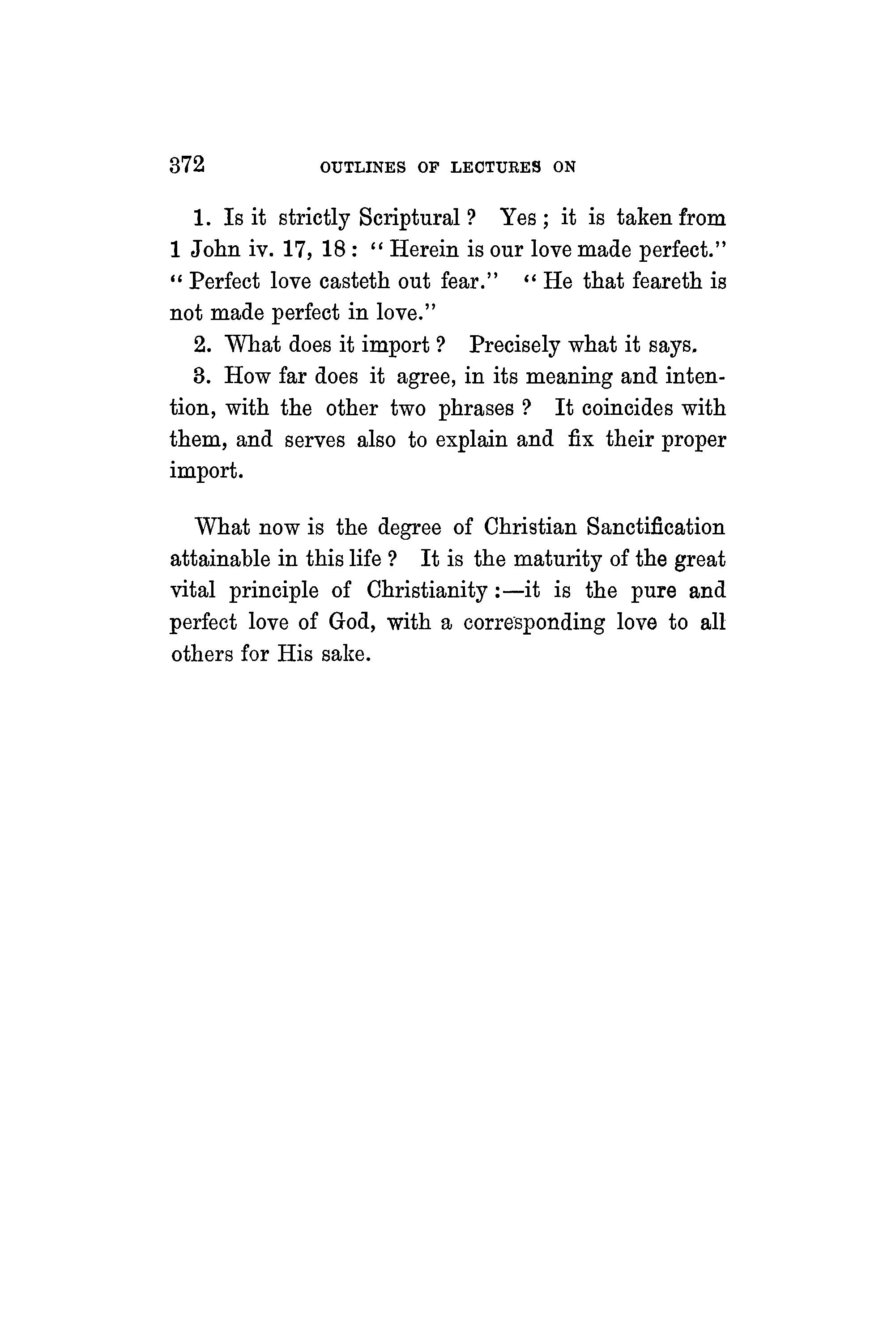
1. Is it strictly Scriptural? Yes ; it is taken from 1 John iv. 17, 18: "Herein is our love made perfect." "Perfect love casteth out fear." "He that feareth is not made perfect in love."
2. What does it import ? Precisely what it says.
3. How far does it agree, in its meaning and intention, with the other two phrases ? It coincides with them, and serves also to explain and fix their proper import.
What now is the degree of Christian Sanctification attainable in this life? It is the maturity of the great vital principle of Christianity :-it is the pure and perfect love of God, with a corre-sponding love to all others for His sake.

THE WAY IN WHICH CHRISTIAN SANCTIFICATION IS OBTAINED, WITH SOME OTHER PARTICULARS RELATING TO THIS SUBJECT.
OuR next inquiry is, By what means, or instrumentality, may we obtain the enjoyment of Christian Sanctification, not only in its commencement, but in its promised degree ?
I. To this inquiry the direct answer is, By faith in our Lord Jesus Christ,-by, through, or in consequence of that faith, as the appointed condition: for,
1. All our salvation is "through faith."* This is the fixed condition, or whatever else it may be termed, on which all spiritual blessings are granted to fallen and unworthy man.
2. God is expressly said to "purify the heart by faith." "God," as St. Peter pleads before the Apostles and Elders in the Council of Jerusalem, when he i3 referring to the case of Cornelius and his friends, " God, which knoweth the hearts, bare them witness, giving them the Huly Ghost, even as He did unto us ; and put no difference between us and them, purifying their hearts by faith." t
8. The conclusion, therefore, is, that the blessing of Christian Sanctification is attainable through faith.
• Ephes. ii. 8. t Acts xv. 8, 9.

Faith, in its principle and object, always remains the same.
But it evidently differs in its degrees: sometimes it is weak,-sometimes strong.
It is a faith, too, which "worketh by love."*
IL But while we assign faith as the great means, instrumentality, or condition of our Christian Sanctification, we do not overlook that spiritual discipline which the Lord is pleased to employ,-the discipline which is carried on in action and in suffering,-which, in action, trains us " by patient continuance in well doing '' to '' seek for glory and honour and immortality," t-and which, in suffering, reminds us tha~ "tribulation worketh patience; and patience, experience; and experience, hope,"-that "tl;i.e trying of our faith worketh patience,"-that "no chastening for the present seemeth to be joyous, but grievous,"-and that " nevertheless afterward it yieldeth the peaceable fruit of righteousness unto them which are exercised thereby." t But this discipline promotes the faith which it tries and exercises; it is a means of great spiritual improvement, because it is so excellent a means of carrying out the principle and efforts of faith ;-while faith still remains the grand appointed condition and means of our spiritual progress.
A few questions yet remain on the general subject of Christian Sanctification ; and to these we will now briefly attend.
1. When is the blessing of entire Christian Sancti-
* Gal. v. 6. t Rom. ii. 7.
t Rom. v. S, 4; James i. 3; Heb. xii. 11.

fieation attainable? Now,-in the present life. When, therefore, St. Paul had prayed for the Thessalonians, that " the very God of peace " would "sanctify" them" wholly," he subjoins the prayer also that their "whole spirit and soul and body" might "be preservedblameless unto the coming of our Lord Jesus Christ." * But is not a person wholly sanctified when he is justified ? Certainly not,-except it may be in some extraordinary cases. When a person is justified, he is also regenerated,-his sanctification is begun; but it is not finished. The very mention of " babes in Christ," t and of "little children," in conjunction with "young men " and "fathers/' t indicates a Divine life begun, but not yet matured. So also the description of Christians as yet imperfect, though in Christ,-the exhortations addressed to them to "grow in grace," and "go on unto perfection,"-and the views which are afforded of their successive and more complete attainments in personal Christianity, teach us that when the Lord" hath begun a good work in us," we should pray, in confidence and hope, that He may " perform," or " finish " it, §-but teach, at the same time, that it is not performed or finished, when it is begun. To say that the notion of a work begun, but not yet finished, supposes a want of adaptation in Christ's scheme of mercy, appears to be very groundless; for Christ's scheme of mercy recovers as by a regular and gracious process; whence we are instructed to "look for the mercy of our Lord Jesus Christ unto eternal life." II To allege that the doctrine which we
* 1 Thess. v. 23.
t I Cor. iii. 1, 2, compared with Heb. v. 13, 14. ; l John ii. 12-14. § See Philip. i. 6. II Jude 21,

are now advancing, argues that the penitent and believing sinnen. does not receive what he seeks, except he receives what extends to every part of his nature, and entirely prepares him for heaven, seems, to say the least of it, to be very crude. He does receive what extends to every part of his nature,-though not yet in the fullest degree,-and what gives him at once a title and meetness for heaven, which latter the Lord can speedily complete, if He call the believer speedily hence. To urge that, when the Scriptures direct believers to '' cleanse themselves from all filthiness of the flesh and spirit," this does not prove that the work was originally otherwise than entire, is so gratuitous, -nay, so obviously opposed also to the plainest meaning of the Scriptural injunction,-that it really merits no formal refutation. To attribute the failures of newly-converted persons-such failures as too frequently occur-to the infancy or weakness of the Christian life, but apart from any remains of evil in the heart, is so purely a supposition, and so ill-accordant with the constant representations of Scripture, that it may, I think, be fairly left to answer itself. Let us never forget that we are to follow the simple teachings of Scripture, and not the dreams of men, whatever professions they may make; nor let us lose sight of the fact that Christian man is yet in a probationary state,-in a course of trial and training for a better world,-and that he is treated accordingly.*
2. How may a Christian believer know that the
* For a history of the controversy above referred to, as it existed in the earlier days of Mr. Wesley, see his Journals, No. iv., from November 1st, 1739, to September 3rd, 1741.

blessing of Entire Sanctification is attained ? Our answer is, By the witness and fruit of the Spirit ; both of which seem to be included in that saymg, "Hereby we know that He abideth in us, by the spirit which He hath given us."*
3. Is Entire Christian Sanctification an instantaneous or a gradual work? And why may it not be both?instantaneous, when the person, by a vigorous act of faith, finds himself brought to love the Lord with all his heart ?-and yet gradual, as that more immediate attainment of the blessing is of necessity preceded, as it will also be followed, by a gradual work ?
4. Does Entire Sanctification exclude infirmity ? No. Infirmity, in many respects, must cleave to us so long as we carry infirm and mortal bodies, and dwell in our present infirm state. But infirmity is plainly distinguishable from sin. Sin is voluntary ; infirmity is involuntary. Great care ought, however, to be taken lest we excuse sin under the name of infirmity. On the other hand, care ought also to be taken lest we magnify inevitable infirmity into sin.
* 1 John iii. 24:.

b is a source of regret that the doctrine of the Christian's perseverance in the ways of holiness, into which he is now happily introduced, should have been made the subject of so much angry and perplexing controversy. Our object shall be to explain this topic as briefly and clearly as we can, with a careful abstinence from unnecessary and vexatious disputation. Two questions naturally arise before us:- first, What are the views which the Scriptures teach us to entertain on this subject; and, secondly, What are the arguments which they suggest in its support?
I. What are the views which the Scriptures teach us to entertain on this subject?
1. They certainly do not teach us that it is unconditional, or irrespective of our personal fidelity. Its very name denotes that it is a perseverance in the path on which we have entered,-a perseverance in the possession and exercise of "faith, hope, charity," the three constituent and permanent principles of the Christian life.* To speak of an unconditional perseverance is to pass into a perilous and unwarrantable extreme.
2. But neither do the Scriptures teach us that a
• See l Oor. xiii. 13.

THE DOCTRINES OF CHRISTIANITY. 379
Christian's perseverance is utterly uncertain and insecure. He is placed in a new relation to his God ; he is favoured with the gift of a new heart and nature; he has free and unforbidden access to the fountain of all good. Shall these advantages yield him no comfort, -no confidence ? " Hear ye me, Asa, and all Judah and Benjamin," said Azariah the son of Oded ; " The LoRDis with you, while ye be with Him." * May not a Christian adopt the same sentiment? To speak of the entire and constant uncertainty of our perseverance in the ways of God, is to go into an extreme directly opposite to the former one, and itself also prejudicial and injurious.
8. What the Scriptures teach is that a true Christian's perseverance is hopeful, but conditional:hopeful, in opposition to the last extreme which we mentioned; conditional, in opposition to the former one. " Confident " he may be that "He which hath begun a good work will perform it until the day of Jesus Christ." t But if, through his own unfaithfulness, that work cease, his perseverance ceases too. When St. Paul t enumerates the enemies who shall not be " able to separate us from the love of God, which is in Christ jesus our Lord," he omits ourselves. We may dissolve the union :-we may do what all others, without our concurrence, could not do.
II. What are the arguments which the Scriptures suggest in support of the doctrine of the saints' perseverance, viewed especially as conditional?
1. One is drawn from the probationary state in which man is placed during the whole course of
• 2 Chron. xv. 2. t Phil. i. 6. t Rom. viii. 38, 39.
380

ON his present existence, and which necessarily implies trial, danger, and the possibility of failure.*
2. A second is supplied by the constant admonitions to " abide in Christ ; " t to " continue in the faith grounded and settled; " t to "resist ...... your adversary the devil ; " § to " make your calling and election sure; " II to be "faithful unto death ; " with other similar passages which abound in both the Old Testament and the New.
3. A third is urged in the solemn warnings which are interspersed through the sacred volume :-such as Ezek. xviii. 24, 26. Compare the texts noted in the margin, Ezek. iii. 20 ; xxxiii. 12, 13, 18 ; see also 2 Peter ii. 20 ; 1 Tim. i. 18, 19 ; John xv. 2.
4. A fourth is found in the affecting descriptions which are often given of final apostasy :-such as Matt. xii. 43-45 ; 2 Peter ii. 20, 21 ; Heb. vi. 4-8 ; x. 38, compared with verses 26-29.
5. A fifth may be brought, by way of analogy, from the case of the "angels who sinned," and of our first parents,-all of whom were in a state of probation, and were placed in circumstances less perilous than ours ; yet they fell. May not we also fall ?
1. It is admitted that many appear to be apoBtates, who, in reality, never enjoyed the saving grace of God.
2. They who do enjoy that grace ought to "rejoice with trembling," because they may fall away.
3. But, if they continue faithful, they may assure themselves of the constant presence and help of God.
* See 1 Cor. ix. 24-27.
§ 1 Peter v. 8, 9.
t John xv. 4-7. II 2 Peter i. 10.
t Col. i. 23. ~I Rev. ii. 10.

THEbodies of the righteous dead are represented as "sleeping in Jesus."* They "sleep,"-they re5t in a state of quiet repose, from which they shall finally awake: they "sleep in Jesus,"-they rest under the especial care of Him who is "Lord both of the dead and living." t "Precious," therefore, "in the sight of the LoRD is the death of His saints," t even with respect to the regard which He bestows on their lifeless dust, as well as in a yet higher sense.
But the souls of the righteous dead are, in the mean time, in a state of conscious and happy existence, where they continue between death and the resurrection, waiting for the promised consummation of all "joy and felicity." This is commonly called the intermediate or separate state. It is our purpose to consider the reality, the happiness, and the comparative imperfection of that state.
I. The reality of the separate state appears to be clearly and fully evinced by such testimonies of Holy Scripture as the following :-
1. Eccles. xii. 7, compared with chap. iii. 21.
2. Matt. x. 28. " And fear not them which kill the body," etc.
* 1 Thess, iv. 14. t Rom. :riv. 9. "' t Psalm c:x:vi.15.

3. Luke xxiii. 42, 43. "And he said unto Jesus," etc.
4. Luke xxiii. 46. "Father, into Thy hands," etc.
5. Acts vii. 59. " Lord Jesus, receive my spirit."
6. 2 Cor. v. 6-9. "Therefore we are always confident," etc.
7. 2 Cor. xii. 2, 3. "I knew a man in Christ," etc.
8. Heb. xii. 23. "The spirits of just men made perfect."
9. Matt. xxii. 31, 32.
10. Luke xvi. 19-31. "Have ye not read," etc. The case of Dives and Lazarus.
11. Many of the visions in the Book of Revelation.
II. The happiness of the separate state comprehends,-
1. A release from all toil and danger.*
2. Inexpressible joy with Christ. t
3. A calm expectation of future glories. t
III. The comparative -irnpe1jectionof the separate state is,-
1. Probable, as it regards the soul itself, which can scarcely be supposed, in its state of separation from the body, to enjoy its full measure of bliss.
2. Certain, as it regards the whole man; for, during the separate state, an essential part of man's nature-the body-rests in the silence and insensibility of death, incapable of joy and activity.
The wicked also pass, at death, into a separate state, -a state of conscious and wretched exclusion from God, with a fearful expectation of still more complete misery.
* Rev. xiv. 13. t Phil. i. 21, 23. t See Rev. vi. 9-11.

THE DOCTRINES OF CHRISTIANITY. 883
See, on the subject of this Lecture, Bishop Bull's Sermons, ii., iii., and Campbell's "Preliminary Dissertations," Diss. vi., part ii. Also Watts's "Death and Heaven."
Note on 1 Thess. iv. 14 :-TOVSKoiµ:YJ0EVTUSa,aTOV'I17<Tov. The customary interpretation is that the preposition Sui in this clause has the meaning of lv, and that the clause itself is equivalent with " the dead in Christ," lv XptcrTce, * or with them that " are fallen asleep in Christ," ol 1<.otµ,7J8i11uslv XptuT4i.t But it is suggested that the clause may mean "them that have fallen asleep, have been soothed and composed to sleep, by Jesus." The editor of Bengel, in the English translation, says in a note, "Literally, 'Those lulled to sleep by Jesus.'"
* 1 Thess. iv. 16. r 1 Cor. xv. 18.
THE doctrine of the Saints' future Resurrection is a subject of pure revelation ; and it ought, therefore, to be contemplated in the light which Revelation can alone supply.
Our present design is to consider its Nature, its Certainty, and the Prerogatives with which it will be attended.
I. Its nature. " It is," says Bishop Pearson, " a substantial change, by which that which was before, and was corrupted, is reproduced the same thing again."*
1. It supposes, then, the death and corruption of the body, which is, for this reason especially, styled by St. Paul "our vile body," the body of our humiliation, or our humbled body. t
2. It denotes the substantial, not the accidental, change of that body, by which change that same body is restored to life :-" Who shall change our vile body." t
B. It implies the peculiar exertion of Omnipotent Power, to which all things are possible:-" According to the working whereby He is able even to subdue all things unto Himself." §
* Exposition of the Creed, Article V. t Phil. iii. 21.

t Phil. iii. 21. § Phil. iii. 21.
II. Its certainty. This will appear,
1. From the express declarations of Scripture : such as,
Job xiv. 7-14. "For there is hope of a tree," etc.
Job xix. 23-27. "0 that my words were now written ! 0 that," etc.
Dan. xii. 2. " And many of them that sleep in the dust of the earth shall awake," etc.
John v. 28, 29. " Marvel not at this: for the hour is coming, in the which," etc.
2. From the fact of our Lord's resurrection, which is eminently urged as a proof, a pattern, and a pledge of ours.*
3. From the other examples of a resurrection, which have already taken place:-
The widow's son of Sarepta. t
The, Shunammite's son. t
The dead man in the sepulchre of Elisha.§
Jairus's daughter. JI
The widow of Nain's sonJT Lazarus. ,:"1 "
The saints who arose with our Lord.tt
4. From the scheme of our redemption, viewed in its full meaning and design. t t
III. The prerogatives with which the future Resurrection will be attended. I refer particularly to the properties of the raised body of the saint.
* See 1 Cor. xv. 20.
t 2 Kings iv. 18, etc.
II Mark v. 41, 42.
tt Matt. xxvii. 52, 53.

t 1 Kings xvii. 22.
§ 2 Kings xiii. 21. Luke vii. 14, ]5. ** John xi,
tt See Rom. viii. 23; 1 Cor. i. 30; Ephes . .i. 14; iv. 30.
C C
886

1. "It is sown in corruption; it is raised m incorruption.
2. " It is sown in dishonour; it is raised in glory.
3. "It is sown in weakness; it is raised in power.
4. "It is sown a natural body; it is raised a spiritual body." ,:,
1. The change which shall take place in the bodies of the saints who shall be found alive at the last day, is particularly mentioned by St. Paul. t '\Vas it not foreshown in the translation of Enoch and Elijah ? Or, rather, was not such translation a pre-intimation of it?
2. The wicked, too, shall rise. But they will not partake of the prerogatives and benefits of the Resurrection. To them what was intended as a blessing shall prove a curse. The Resurrection is the saint's full and glorious recovery to life; it marks the consummation of his bliss; and it is ever the object of his hope, and joy, and triumph. But when the wicked shall rise, it will be to " shame and everlasting contempt."
3. Yet, as we saw in the Lecture on the "Extent of Redemption," the Resurrection of the wicked is itself a J>roof of the doctrine that Christ died for all. The R_esurrection of the dead is a precious consequence of His interposition. It could not have existed but for Him. But, alas! the wicked tum that wonderful provision, as they turn all othern, to their bane.
* 1 Cor. xv. 42-44. i" 1 Cor. xv. 51-53.
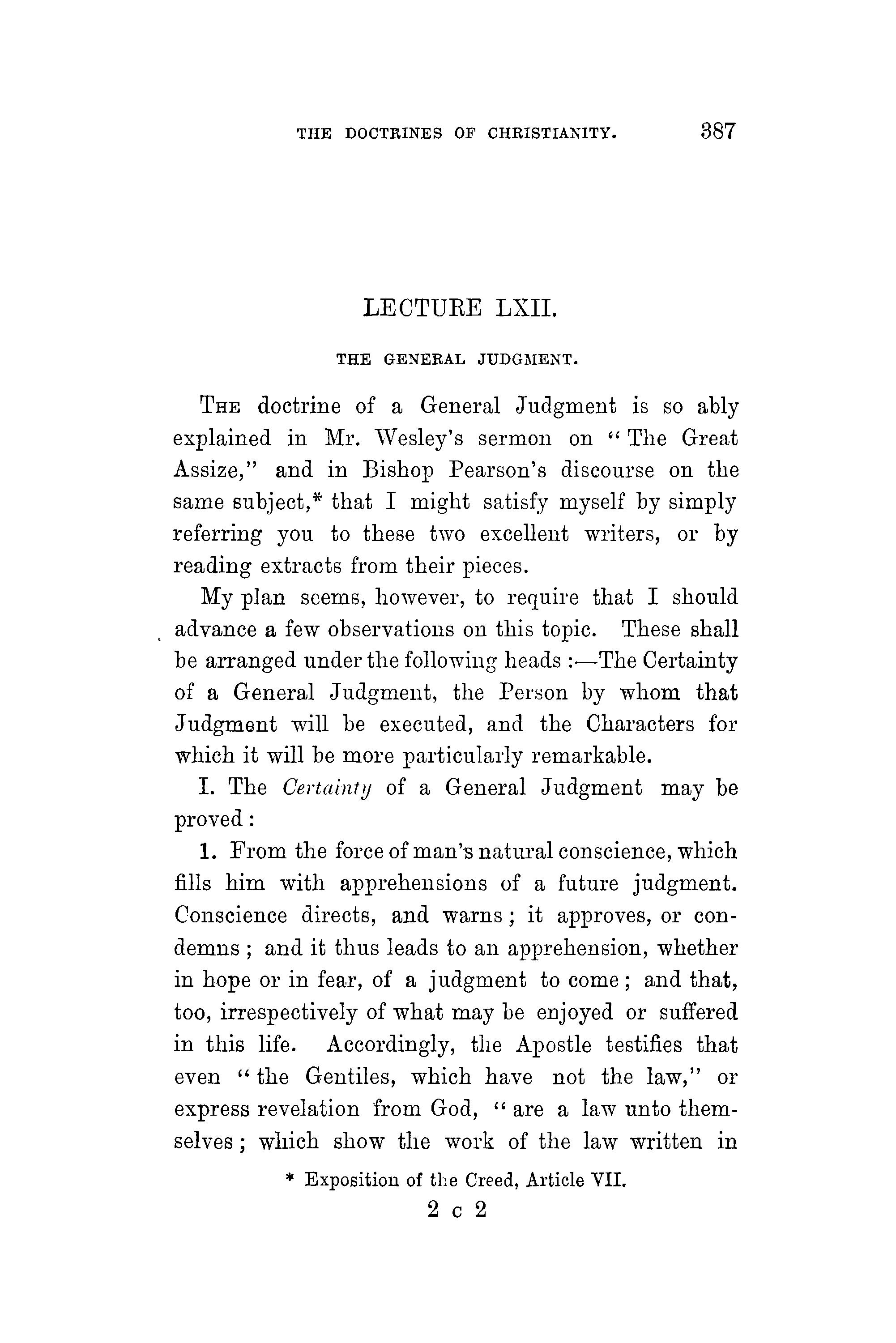
THE doctrine of a General Judgment 1s so ably explained in Mr. ·wesley's sermon on H The Great Assize," and in Bishop Pearson's discourse on the same subject,* that I might satisfy myself by simply referring you to these two excellent writers, or by reading extracts from their pieces.
My plan seems, however, to require that I should advance a few observations on this topic. These shall be arranged under the following heads :-The Certainty of a General Judgment, the Pen,on by whom that Judgment will be executed, and the Characters for which it will be more particularly remarkable.
I. The Certainf!J of a General Judgment may be proved:
1. From the force of man'-s natural conscience, which fills him with apprehensions of a future judgment. Conscience directs, and warns ; it approves, or condemns; and it thus leads to an apprehension, whether in hope or in fear, of a judgment to come; and that, too, irrespectively of what may be enjoyed or suffered in this life. Accordingly, the Apostle testifies that even "the Gentiles, which have not the law," or express revelation from God, "are a law unto themselves ; which show the work of the law written m
* Exposition of the Creed, Article VII.
2 C 2

888 OUTLINES OF
ON their hearts, their conscience also bearing witness, and their thoughts the meanwhile accusing or else excusing one another;" and that, also, in silent anticipation of the day which the Apostle proceeds to describe as" the day when God shall judge the secrets of men"of men universally, whether "in the law" or "without law," whether Jews or G.entiles-" according to my Gospel." ::~
2. From the claims of Divine Justice. Such Justice must put a difference between the evil and the good,must punish the one, and reward the other,-either in the present, or in a future state. But that difference is not put, those punishments and rewards are not inflicted or bestowed,-at least, not fully, not proportionably,-in the present state. It follows, therefore, that there is a future state, with a future judgment, in which Divine Justice shall be wholly vindicated, and its righteous retributions awarded. So even heathens believed. t " Wilt Thou also destroy the righteous with the wicked?" said Abraham to the LoRD. " That be far from Thee to do after this manner, to slay the righteous with the wicked : and that the righteous should be as the wicked, that be far from Thee. Shall not the Judge of all the earth do right ? " t Abraham applies this great truth to a particular visitation of Divine Justice. But it is applicable to all its visitations, and all its economy ; and we so apply it.
3. From the explicit testimonies of revelation,
* See Rom. ii. 14-16, with the contex~-.
t See-Pearson, as also on the preceding paragraph.
+ Gen, xviii. 23, 25,
THE DOCTRINES OF CHRISTIANITY, 389 which may be traced from the earliest patriarchal times to the full Christian dispensation. For " Enoch, the seventh from Adam, prophesied, saying, Behold, the Lord cometh with ten thousands of His saints, to execute judgment upon all, and to convince all that are ungodly among them of all their ungodly deeds which they have ungodly committed, and of all their hard speeches which ungodly sinners have spoken against Him."* Abraham, as we have seen, speaks of the Lo RD as " the Judge of all the earth." " Be ye afraid of the sword," says Job ; " for wrath bringeth the punishments of the sword, that ye may know there is a judgment." t "Verily," says the Psalmist, '' He is a God that judgeth in the earth ; ''-He shall '' judge the people righteously ; "-" for He cometh, for He cometh to judge the earth : He shall judge the world with righteousness, and the people with His truth." t "God," says Solomon, " will brjng thee into judgment : "'' for God shall bring every work into judgment, with every secret thing, whether it be good, or whether it be evil."§ "The judgment," says Daniel, "was set, and the books were opened." II The New Testament abounds with testimonies on this momentous point. It assures us that " we must all appear before the judgment-seat of Christ,"~ who Himself solemnly describes the process of the judgment.~'*
II. The Person by whom the General Judgment will be executed, is our Lord Jesus Christ. All the Persons
• Jude 14, 15.
! Psalm lviii. 11; lxvii. 4; xcvi. 13.
§ Eccles. xi. 9 ; xii. 14.
~I 2 Oor. v. 10; Rorr. xiv. 10,

t Job xix. 29.
See also xcviii. 9.
11 Da~. vii. 10.
*" Matt. xxv. 31-46.
390
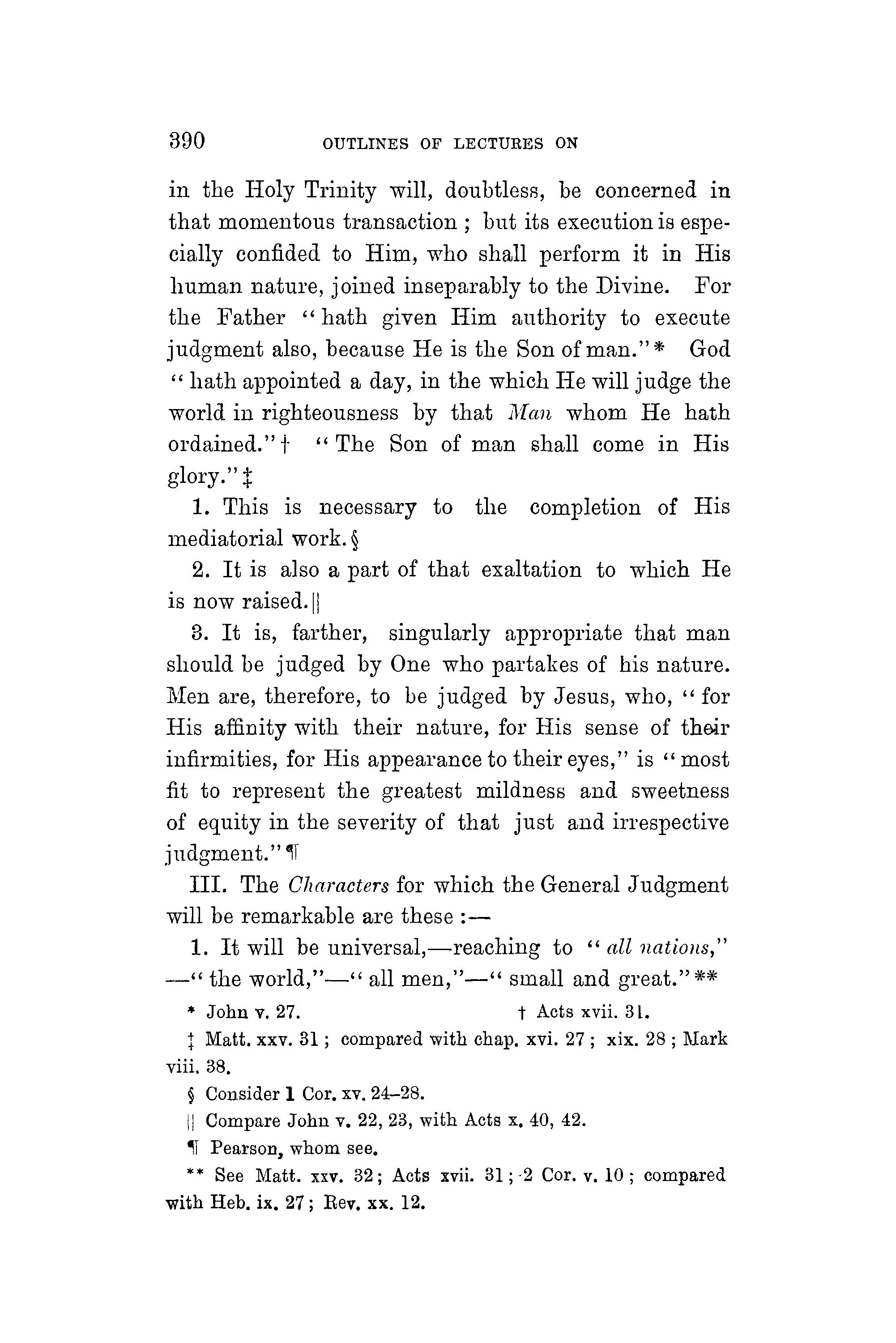
OUTLINES OF LECTURES ON
in the Holy Trinity will, doubtless, be concerned in that momentous transaction; but its execution is especially confided to Him, who shall perform it in His human nature, joined inseparably to the Divine. For the Father " hath given Him authority to execute judgment also, because He is the Son of man."* God "hath appointed a day, in the which He will judge the world in righteousness by that JYlan whom He hath ordained.'' + '' The Son of man shall come m His glory." t
1. This 1s necessary to the completion of His mediatorial work.§
2. It is also a part of that exaltation to which He is now raised. II
3. It is, farther, singularly appropriate that man should be judged by One who partakes of his nature. Men are, therefore, to be judged by Jesus, who, "for His affinity with their nature, for His sense of their infirmities, for His appearance to their eyes," is "most fit to represent the greatest mildness and sweetness of equity in the severity of that just and irrespective judgment." ~T
III. The Characters for which the General Judgment will be remarkable are these:-
1. It will be universal,-reaching to " all nations," -" the world,"-" all men,"-" small and great."**
* John v. 27. t Acts xvii. 3L.
! Matt. xxv. 31 ; compared with chap. xvi. 27 ; xix. 28 ; l\Iark viii. 38.
§ Consider 1 Cor. xv. 24-28.
II Compare John v. 22, 23, with Acts x. 40, 42. Pearson, whom see.
** See Matt. xxv. 32; Acts xvii. 31; -2 Cor. v. 10; compared with Heb. ix. 27; Rev. xx. 12.

2. It will be most minute and exact,-comprehending the scrutiny of '' every work," and '' every secret thing,"-" idle words," - " the secrets of men," -our "words" generally,-" the hidden things of darkness,"-" the counsels of the hearts."*
3. It will be most just: for "the Father ... without respect of persons judgeth according to every man's work." t
4. It will be irreversible,-with respect both to the righteous and the wicked. But this point we shall more fully establish in the next two Lectures.
: See Eccles. xii. 14; ::\fatt. xii. 30, 37; Rom. ii. 16; 1 Cor. iv. 5. t 1 Peter i. 17.

THE FUTURE HAPPINESS OF THE RIGHTEOUS.
"BELOVED,"says St. John,* "now are we the sons of God, and it doth not yet appear "-or, "it hath not yet been manifested '' (ovrrco l¢avEpw8TJ)-" what we shall be : but we know that, when He shall appear,"or, "shall be manifested," (¢avfp(i)Bfl,)-" we shall be like Him ; for we shall see Him as He is." This language restrains our curiosity concerning the future happiness of the righteous ; but, at the same time, it assists our meditations. "It doth not yet appear what we shall be;,,, and we ought, therefore, to be cautious and modest in our inquiries : " but we know that, when He shall appear, we shall be like Him; for we shall see Him as He is : " and we, therefore, may inquire.
" We shall see Him as He is." This clause contains a beautiful representation of the happiness of heaven, and it finds a parallel in many other texts. The sight of God in Christ is heaven; for this will comprehend three things :-the clearest perceptions, the most intimate communion, and the most exact assimilation and resemblance. But it is our present purpose to suggest a few thoughts of a more general description on this subject.
* 1 Jolin iii. 2.

I. The future happiness of the righteous will extend to their whole nature ;-to the soul with its various faculties of understanding, will, and affections ; to the body with all its powers and activities ; and to these constituent parts of man as re-united to each other in glorious and inseparable fellowship. The happiness of the righteous will be entire. To this branch of our subject the three former Lectures have conducted us.
II. The future happiness of the righteous will also be raised to the highest degree of which the glorified man is capable ;-it will be complete: and it will be associated with all the delights of ceaseless worship, celestial society, and Divine manifestation. "Fulness of joy " is in the LORD's "presence;" "pleasures for evermore" are at "His right hand." Saints "awaking" from the sleep of death shall be" satisfied" with His " likeness." " They shall be abundantly satisfied: " for•,, they shall see God; "-shall see "face to face," and " know even as also they are known." *
III. The future happiness of the righteous will, accordingly, be perfectly pure and unalloyed,-utterly incapable of taint, interruption, or decay. "He will swallow up death in victory; and the LoRD GoD will wipe away tears from off all faces." "They shall hunger no more, neither thirst any more ; neither shall the sun light on them, nor any heat," etc ;-for, though thrs passage may relate directly to the happiness of the separate state, it is, of course, most
* See Psalm xvi. 11 ; xvii, 15; xxxvi. 8; :Matt. v. 8; 1 Cor. xiii. 12; and many other passages.

3D4
OUTLINES OF LECTURES ON forcibly applicable also to the happiness of the saints after the resurrection.*
IV. The future happiness of the righteous will, therefore, be strictly and properly everlasting. Hence one of the most familiar phrases employed to represent it to us is " eternal life," viewed in connection with kindred expressions, which are so frequent and wellknown that particular citation seems unnecessary. t
V. We may farther add that the future happiness of the righteous will, as we are encouraged to expect, be for ever growing and increasing. This may appear:
1. From the improvement of which man's nature is evidently capable.
2. From the mighty advantages of improvement which he will enjoy in the heavenly state; such as freedom from all impediments,-the unclouded manifestation of God,-and the society of saints and angels. t
3. From intimations of Scripture; such as may, it is thought, be drawn from the following and similar texts :-Psalm xxxvi. 7-9; Jer. ii. 13, "Fountain of living waters," compared with Rev. vii. 17; 2 Cor. iii. 18; 2 Cor. iv. 17. omitting the " and" in the last clause, which appears to be inserted without necessity; Ephes. iii. 19; Rev. xxii. 1-5.
1. Our knowledge of heavenly happiness is, after all, very imperfect. We '' see through a glass, darkly," and " know " but " in part." t
* Isai. xxv. 8; Rev. vii. 16, 17. See also Isai. xxxv. 10; Rev. xxi. 4 ; 1 Peter i. 4, 5, and other texts.
t See, however, Rom ii. 7; 1 Cor. ix. 25; James i. 12; 1 Peter i. 4; Rev. ii. 10.
t 1 Cor. xiii. 12.

2. But we have good evidence that it will correspond to the saint's attainments here.
3. And it ought, therefore, to be our care to secure those attainments in the highest promised degree. "Every man that hath this hope in Him purifieth himself, even as He is pure.",:,
* 1 John iii. 3.

THE FUTURE MISERY OF THE WICKED.
THE future misery of the wicked forms an awful contrast to the future happiness of the righteous; and it may be considered accordingly. But as the perpetual duration of that misery is sometimes called in question, I shall dwell more particularly on this branch of the subject.
I. Future misery will extend to the sinner's whole nature; to the soul, and to the body,-as re-united. And as the body is a material substance, what difficulty is there in the belief that it will suffer the torment of material fire?
II. Future misery will be raised to the highest degree of which the sinner has, by his sins, rendered himself capable; and it will especially comprehend :
1. The loss of all good. 1*
2. The endurance of all evil. t
III. Future misery will admit of no abatement or respite, no intermixture of comfort; but will be heightened by all the circumstances and society of that unhappy state.:~
IV. Future misery will be everlasting.
1. Will suffering necessarily produce repentance? We have no reason, either from Scripture or from fair analogy, to believe that it will.
* See 2 Thess. i. 9. t Ibid. + See Matt. xxv. 41.

2. Can the sinner, by his own sufferings, atone for his sins ? Where is the proof, or even the probability, of this?,:,
3. Can the sinner purge away his depravity in penal fire ? Not except suffering is, in its own nature, and irrespectively of the grace of God, purifying. And who can prove that it is?
4. Will he not rather aggravate both his sin and depravity in that state of utter destitution and misery? t
5. What Scripture speaks of a termination of his misery? This is a strong point. If future misery were appointed to terminate, why do not the Scriptures inform us of it? The advocates of the limited duration of that misery do not usually, as they certainly ought to do, produce Scripture testimonies in support of their own tenet; but they employ themselves chiefly, by the most tortuous arts of criticism, in attempting to show that the passages which we quote may, by possibility, mean less than we attribute to them. Is this the way to investigate and ascertain truth?
6. How many Scriptures speak, in the plainest and most explicit terms, of the endless duration of future misery ! Of these we adduce the following :Matt. xviii. 8; xxv. 41, 46.
Mark ix. 43-49, compared with Isai. Ix.vi. 24.
2 Thess. i. 9, compared with Philip. iii. 19 ; 2 Peter iii. 7.
* See Psalm xlix. 8, compared with Job xxxvi. 18, 19.
t See Matt. viii. 12, and the parallel texts.
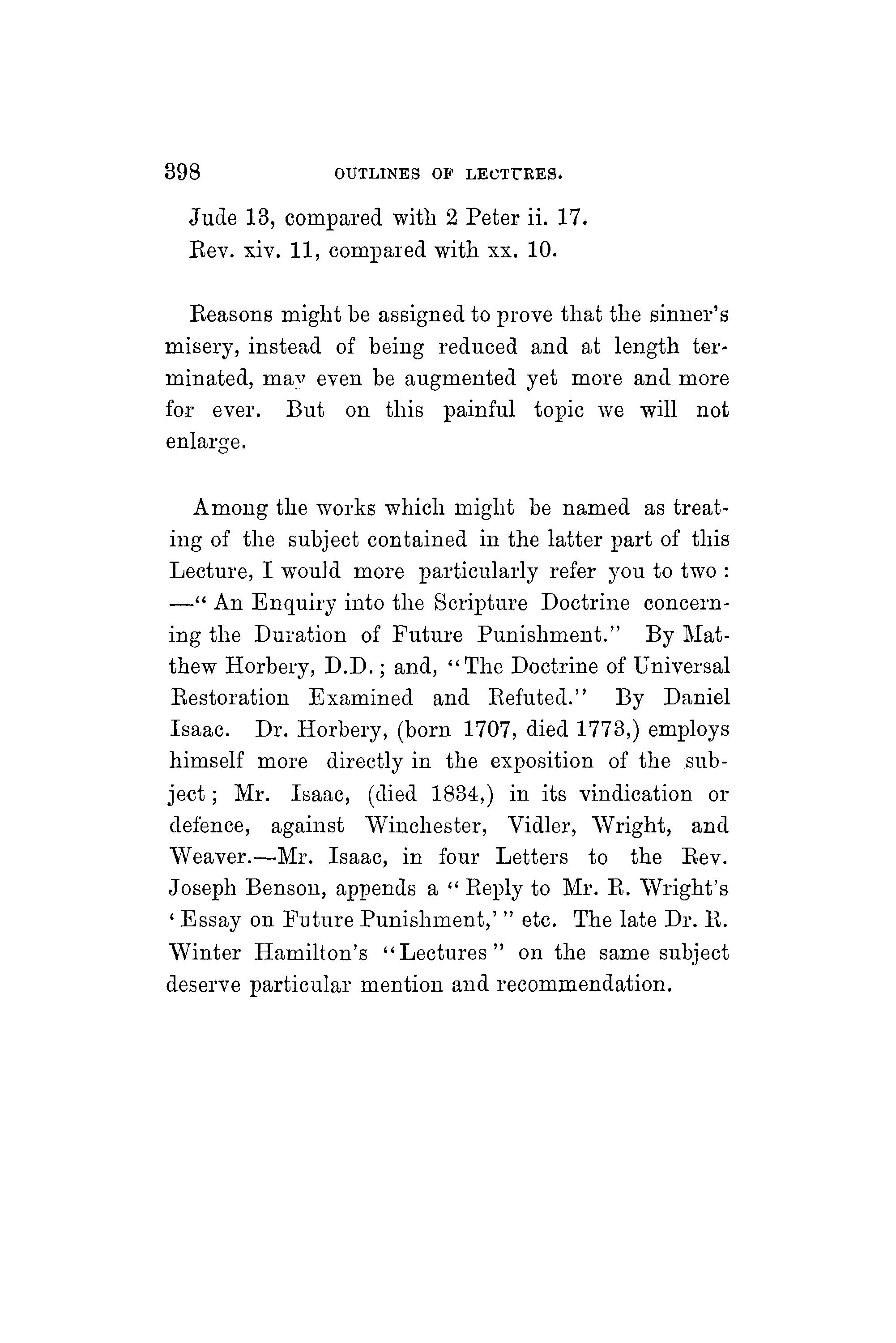
398
OUTLINES OF LEt::Tt'RES, Jude 13, compared with 2 Peter ii. 17. Rev. xiv. 11, compared with xx. 10.
Reasons might be assigned to prove that the sinner's misery, instead of being reduced and at length terminated, may even be augmented yet more and more for ever. But on this painful topic we will not enlarge.
Among the works which might be named as treating of the subject contained in the latter part of this Lecture, I would more particularly refer you to two : -" An Enquiry into the Scripture Doctrine concerning the Duration of Future Punishment." By l\Iatthew Horbery, D.D.; and, "The Doctrine of Universal Restoration Examined and Refuted.'' By Daniel Isaac. Dr. Horbery, (born 1707, died 1773,) employs himself more directly in the exposition of the subjed; Mr. Isaac, (died 1834,) in its vindication or defence, against Winchester, Vidler, ·wright, and vVeaver.-Mr. Isaac, in four Letters to the Rev. Joseph Benson, appends a "Reply to Mr. R. Wright's 'Essay on Future Punishment,'" etc. The late Dr. R. vVinter Hamilton's "Lectures" on the same subject deserve particular mention and recommendation.


Under the auspices of B. L. Fisher Library, First Fruits Press is an online publishing arm of Asbury eological Seminary. e goal is to make academic material freely available to scholars worldwide, and to share rare and valuable resources that would not otherwise be available for research. First Fruits publishes in ve distinct areas: heritage materials, academic books, papers, books, and journals.
In the Journals section, back issues of The Asbury Journal will be digitized and so made available to a global audience. At the same time, we are excited to be working with several facultymembersondevelopingprofessional,peer-reviewed,onlinejournalsthatwouldbe made freely available.
Much of this endeavor is made possible by the recent gift of the Kabis III scanner, one of the best available. The scanner can produce more than 2,900 pages an hour and features a special book cradle that is speci cally designed to protect rare and fragile materials. The materials it produces will be available in ebook format, easy to download and search.
First Fruits Press will enable the library to share scholarly resources throughout the world, provide faculty with a platform to share their own work and engage scholars without the di culties often encountered by print publishing. All the material will be freely available for online users, while those who wish to purchase a print copy for their libraries will be able to do so. First Fruits Press is just one way the B. L. Fisher Library is ful lling the global vision of Asbury Theological Seminary to spread scriptural holiness throughout the world.


